










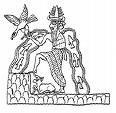



































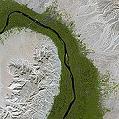


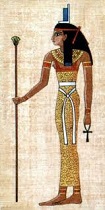
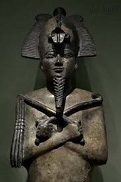

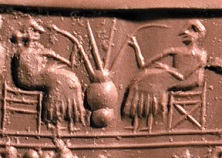
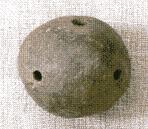

-4000 World pop.: 7M; it now begins doubling every thousand years; pop. of India: 1M. This is the date of Creation according to Sir Isaac Newton. The Neolithic Period ends, and the Chalcolithic Period begins (ends -3500). The sea level, which has been rising since the end of the Ice Age reaches modern-day levels; Mesopotamia develops a rich, fertile delta, and the Near East becomes a wet warm Eden; the Saharan grasslands turn to desert (-3200?); ice cover in the Arctic Ocean is nearly ice-free?; the Alps are ice-free. City-states begin to rise along the banks of the leisurely Euphrates River (Persian "ufratu" = good to cross over, Sumerian for fruitful) and swift Tigris River (Persian "tigra" = pointed, Sumerian "idigna" = swift river), and along the Nile River in Egypt; the Egyptians (Remetch, meaning "people") enjoy a lack of natural enemies, giving them the longest period of political stability in human history; the Nile is neat because it not ony floods once a year and leaves a couple of miles of fertile silt on each bank, but it flows from S to N while the wind always blows from N to S because of the Mediterranean Sea, so that you can sail S and then turn around and float back N with the current. The Amratian Culture (Naqada I) in Upper Egypt around El-Amra begins (until -3.5K), known for mud-brick bldgs., white cross-line pottery, and cosmetic palettes. Migration begins from the Aegean Sea and Anatolia ("sunrise") to the Broken Balkans (Turkish for mountains) and the E Mediterranean. The Michelsberg Culture from the Rhineland settles in Belgium and the Netherlands. The Funnel Breaker Culture, ranging from S Norway to the Czech-Austrian border and from the Ukraine to the Netherlands reaches NW France and England. The Middle Archaic Period in North Am. Archeology ends, and the Late Archaic Period in North Am. Archeology begins (ends -3000). Migrants from Asia settle in islands close to New Guinea. About this time the Salisbury Plain (Gael. "Sulis" = Sun") in SC England becomes the center of a funky Stone Age religious cult with huge burial mounds and graves. The oasis of Ghadames in modern-day NW Libya is first settled. By this time the horse and camel, AKA dromedary ("running") are domesticated in the Middle East, while the llama and alpaca are domesticated in Peru. Farming begins in Ulster. domesticated millet is raised in N China. Domesticated animals incl. pigs, chicken, and dogs are domesticated in China. Barley beer is brewed in Sumeria; it is drunk through straws. Copper is worked in the Balkans and the Fertile Crescent. A temple is built near modern-day Nebelivka, Ukraine. Glazed ceramic Faience is invented in Mesopotamia to imitate lapis lazuli from Afghanistan; the Egyptians later copy the process. In this millennium the jackass is domesticated in Africa (Somalia?). Tombs at Loughcrew in County Meath, Ireland align with the rising Sun at the spring and autumn equinoxes. About this time the Sumerian storm goddess-demon Lilith (Akkadian "Lilitu" = night") is worshiped, becoming known for appearing to men in erotic dreams and having sex with them, although she is sterile and has no milk; she is later claimed to be the mythological real first wife of the Bible's Adam. About this time Ancient Egyptian religion begins, with a vast pantheon of gods who control the forces of Nature, requiring priests to propitiate them, and the pharaoh acting as intermediary between them and the people, causing enormous resources to be dedicated to rituals and temple construction; the Egyptian god Min is first worshipped as the god of reproduction, usually represented as a man holding his erect penis in one hand and a fail in the other - the original cracker? They also worshipped the mutter, er, mother goddess Mut (Maut) (Mout) AKA World Mother, Lady of Heaven, Mother of the Gods, Queen of the Goddesses, Eye of Ra, and She Who Gives Birth But Was Herself Not Born of Any; another early god worshipped by early Egyptians is the lunar deity Yah (Jah) (Iah) (Aah) ("Moon"), which is gradually assimilated into Osiris, god of the dead and Thoth, god of knowledge; origin of the Hebrew god Yahweh?; too bad for modern Christians, Jews, and Muslims, the ancient Egyptians happily lived and died and never worried about being saved by Christ, Moses, or Muhammad. About this time the human race reaches its emotional-intellectual peak, with civilization going on to make it less and less intelligent? About -4000 to -3000 if the Bible's Adam and Eve story is true, giant Nephilim (Heb. "those causing others to fall or fail") inhabit the Earth until Noah's Flood (Gen. Ch. 6); "Now it came about, when men began to multiply on the face of the land, and daughters were born to them, that the sons of God saw that the daughters of men were beautiful; and they took wives for themselves, whomever they chose. Then the LORD said, 'My Spirit shall not strive with man forever, for he is indeed flesh; nevertheless his days shall be one hundred and twenty years.' The Nephilim were on the Earth in those days, and also afterward, when the sons of God came in to the daughters of men, and they bore children to them. Those were the mighty men who were of old, men of renown" - the origin of the Greek gods? Inventions: The Egyptians develop sailing vessels (feluccas) for use near the mouth of the Nile River, along with the Sundial, and Leavened Bread. The Chinese make Cheese and Yogurt using mold. Chiles, originally from Bolivia are used from the Bahamas to Peru, according to Linda Perry of the Smithsonian Nat. Museum of Natural History and Deborah M. Pearsall (1950-) of the U. of Mo. A hard-to-play ocarina-type globular ceramic flute is used for religious purposes near the N Macedonian city of Veles; discovered in 1989.
-3992 The date of Creation according to Johannes Kepler.
-3952 The date of Creation according to the Venerable Bede.
-3949 The date of Creation according to Joseph Justus Scaliger.
-3942 The North Star is Thuban (Alpha Draconis) until -1900; in modern times the two inner stars of the Big Dipper end up pointing to it, while the two outer stars point to the new pole star Polaris.
-3900 The 5.9 Kiloyear Eventbegins (ends -3400), bringing five cents. of colder climate in northernly latitudes, launching the modern dessication of the Sahara and triggering human migration to the Nile River Valley.
-3880 The Rujm el-Hiri("stone heap of the wild cat") mound monument (AKA Gilgal Refaim = "wheel of spirits) on the Golan Heights is built; the central mound is added about -1550.
-3874 Adam ("son of the red earth") (b. -4004) is 130 years old; Cain (Heb. "spear") slays Abel (Gen. 4:8), and utters the immortal soundbyte: "Hashomer akhi anoki" (Am I my brother's keeper?); Adam and Eve's 3rd son Seth (Heb. "substitute") is born, continuing the line leading to Jesus Christ (Luke 3:23-38); sometime later Jubal, son of Lamech and Adah, and brother of Jabal (a descendent of Cain) becomes a musician and/or musical instrument inventor (Gen. 4:19-21).
-3800 The Ubaid Period in Mesopotamia (begun -6500) ends. Iapetus' daughter Anchiale's son Cydnus' son Parthenius (Adam and Eve's 3rd son Seth?) founds the city of Tarsus in S Asia Minor. The 1.8km wooden Sweet Track Walkway modern-day Somerset Levels, England is built about this time.
-3769 Adam (b. -4004) is 235 years old; Enos ("mortal man, sick"), son of Seth (son of Adam) is born.
-3679 Adam (b. -4004) is 325 years old; 90-y.-o. Enos' son Kenan (d. -3591) (Heb. "possession"), son of Enos (grandson of Seth) and his wife-sister Noam is born (Gen. 5:9-14).
-3761 Oct. 7 (Mon.) is the date of creation in the Jewish (Hebrew) Calendar, based on the work of Rabbi Hillel II in the 4th cent. C.E., and called 1 Tishri Anno Mundi 1; according to the Seder Olam of Rabbi Jose (Yose) Ben Halafta of the 2nd cent. C.E., Creation was on 25 Elul Anno Mundo 1 (about 1 year before 1 Tishri), and others place it at 25 Adar Anno Mundi 1 (6 mo. after 1 Tishri); either way, to get the Jewish year for any Gregorian year after 1 C.E., add 3760 unless it's autumn, in which case add 3761.
-3700 Puppis A suddenly appears in the Earth night sky, then slowly dims out of sight. Evidence of domesticated cats in Hierakonpolis, Egypt.
-3650 About this time the Bronze Age Minoan Kingdom (ends -1450) in Crete (Creta) (Candia) (which has a great natural harbor in Suda Bay on the N side but is inaccessible to shipping on the S side) is founded by (legendary?) king Minos (son of Zeus and Europa, who ends up as a judge of the dead in Hades?), known for (90?) well-planned towns with skilled craftsmen, and producing ships that go on trade journeys to the coasts of Europe; in 2013 the Minoans are traced to Crete; their bull-worshiping religion uses bull's head rhytons for pouring yummy libations to their gods; a favorite sport is bull-hopping (flipping onto a charging bull's back via the horns).
-3641 Feb. 10 is the date of creation in the Mayan Calendar.
-3609 Adam (b. -4004) is 395 years old; Kenan's son Mahalalel (Mahalaleel) (d. -2714) is born (Gen. 5:12-17).



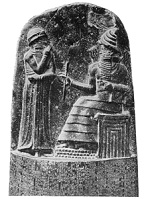
-3600 From this year to the year 1990 C.E. (5,555 years) there are a total of 14,531 known wars that kill 3.64B people, and only 292 years of peace? :) About this time (-5000 to -4000?) the Ubaidian people found the civilization of Sumer (Ki-engir) (Shumerum) in Mesopotamia along the Lower Euphrates River in modern-day S Iraq (ends -1900), becoming the first civilization in the region, complete with writing ca. -3200; the chief cities are Eridu (Eridug) ("Sum. "mighty place) (home of Enki) (oldest city on Earth?), Adab (modern-day Bismya), Isin, Kish Island (in the Persian Gulf), Kullab, Lagash, Larsa, Nippur (on the Euphrates River), and Ur (at the mouth of the Euphrates River), which becomes a city-state ca. -2600; they worship the triad of Baal (Bel) (Sum. "lord") (AKA Beelzebub), Anu (An) (Sum. "sky", "heaven") (king of the gods, spirits, demons, and constellations), and Enki (Ea) (Sum. "lord of the Earth") (lord of water and intellect, associated with the Square of Pegasus S band of constellations), depicted with the head of a man on the body of a fish, dwelling in the nether sea of Apsu; also the Moon good Sin (Nanna) (son of Enlil and Ninlil), his son Shamash (Utu), god of the Sun and justice, and Anu's descendants the Anunnaki (Anunaki) (Ananaki) (Anunna) (they are really aliens from outer space who created humans and domestic animals via genetic engineering?); the four elements of heaven, earth, air, and water were created by the utterance of the divine word, and man was fashioned of clay, and created to serve the gods with food, drink, and shelter so that they can live in leisure; they leave hundreds of thousands of cuneiform script clay tablets incl. "The Epic of Gilgamesh", some with cylinder seals (signatures). The Gerzeh (Girza) (Jirzah) (Naqada II) predynastic Egyptian culture along the W bank of the Nile River E of Al Fayyum begins (until -3.2K), known for pottery featuring stylized animals incl. ostriches, and large tombs. A Bronze Age culture begins in Ban Chiang near Udon in NE Thailand, becoming the first Bronze Age culture, known for handsome red-painted pottery; discovered in 1966. A relict pop. of Woolly mammoths on St. Paul Island in the Bering Sea becomes extinct. The tall, long-necked Tutsi set up a monarchy in Rwanda, intermixing with Bantu peoples. The first aborigines move into California. Megaliths are constructed in Malta, becoming the oldest known free-structures on Earth until the discovery of Gobekli Tepe. The first use of iron by Egptians is in making jewelry from meteorites at Gerzeh 40 mi. S of Cairo.
-3544 Adam (b. -4004) is 460 years old; Mahalalel is 65 years old; his son (by Dinah?) Jared (Jered) (d. -2582) (Heb. "descend") (Gen. 5:15) is born.

-3500 European climate reaches a temperature max, and begins a downward turn for the next 5K years; the Sahara region begins to expand beyond its original boundaries; the sea level around Britain reaches its maximum since the last Ice Age. The Chalcolithic Period (begun -4.5K) ends, and the Early Bronze Period of archaeology begins (-3300?) (ends -2100), featuring the Jemdet Nasr Culture in Sumeria (-3100 to -2900), which incl. clay tablets with economic texts, the use of bronze, and extensive overseas trade; the ziggurat ("built on a raised area") stepped pyramidal mud brick tower with rectangular shrine on top, and cylinder seal (which can be rolled over a clay tablet to reveal a scene) are developed; Predynastic Egypt is stimulated by the Mesopotamian culture, and the cultures of Nubia and Egypt begin to diverge. The Phoenician city of Gath is settled, becoming the home of Goliath in the Bible. The earliest Chinese cities are founded. About this time (-2750?) (-2500?) the Saqqaqs migrate from Siberia to Greenland (until -500), but aren't ancestors of modern-day Inuits or Native Ams. About this time the village of Maadi ("the ferries") on the E bank of the Nile River 9 mi. S of modern-day Cairo is founded as a trade center at the end of the overland trade route to Palestine; in modern times it because a leafy upscale neighborhood popular with diplomats, and home of Cairo Am. College and the Egyptian supreme court, with no bridge across the Nile. Armageddon town Megiddo on the plain of Esdraelon is founded. The city of Troy in NW Asia Minor is founded? Cotton is cultivated in the Nanchoc Valley of N Peru. The Duzdagi Salt Deposits in the Araxes Valley in Azerbaijan are intensively mined for salt. About this time the Mesopotamians discover bronze. The oldest known wheel is used on vehicles in Sumeria and Syria. The potter's wheel is developed in the Middle East. Gold mining is pioneered in Mesopotamia and Africa. The harp is first used in Sumer (Ur), along with the lyre, spreading to Egypt by -3000. The first tall 4-sided narrow tapering Egyptian obelisks (tekhenu) (Gr. "obelos" = pointed pillar) are constructed, with a pyramidion on top; they represent Osiris' erect phallus? Megalithic tombs are constructed in NW Europe. The oldest known leather shoe comes from Armenia, complete with leather eyelets and laces.
-3400 About this time the Gebelein predynastic mummies near Gebelein (modern-day Naga el-Gherira), Egypt are buried, and excavated in the 1890s C.E. by Wallis Budge of the British Museum; natural mummication caused by the hot Sun gave the Egyptians ideas, but it takes until -2600 for the Egyptians to practice true mummification. The opium poppy is cultivated in lower Mesopotamia - set the Time Machine lower limit here please?
-3382 Adam (b. -4004) is a hefty 622 years old; Big-Eyed Goldberg, er, Righteous Enoch (d. -3017) (Heb. "dedicated") (d. -3039?) ("seventh in line from Adam"), son of Jared and father of Methuselah is born, and his example of "walking with the true God" condemns sinner Adam (Gen. chs. 4-5, Jude 14).
-3317 Adam (b. -4004) is 687 years old; Enoch (b. -3382) is 65 years old; birth of longevity champ (969 years) Methuselah (Metuschelach) (Heb. "man of the dart", "when he dies it will be sent", "man of Babylonian god Shelah") (d. -2392), son of Enoch, and father of Lamech, father of Noah (Gen. 5:21-7).
-3300 By this time Egypt is organized into the two kingdoms of Upper and Lower Egypt. A Chalcolithic culture settlement in Harappa in Punjab, E Pakistan (Land of Five Rivers) (named after the Ravi River) in the Indus Valley contains evidence of connection between Indian and Sumerian cultures; a main city is Dholavira, which is abandoned then reoccupied until ca. -1450, when the river dries up and the Meghalayan Drought (begun -2200) forces them to move. Otzi (Ötzi) is dug up on the Tisenjoch Pass of the Otzal Alps in N Italy in Sept. 1991, complete with yew longbow, chamois quiver with 14 arrows, a copper axe, and a flint-bladed dagger in a woven sheath. Evidence of domesticated cats in N China. The earliest known example of writing is in Mesopotamia? The first Hieroglyphs appear on labels and pottery in Egypt, along with the first scrolls of Papyrus.
-3250 The Great Shock of 3250 B.C.E. begins 1K years of wet stormy weather (ends -1500). Isolated Egypt begins trading with Mesopotamia, which influences them in architectural techniques, materials, and writing.
-3228 The advent of Radha and Krishna, the pinnacle of service and pleasure, and the supreme enchanter.
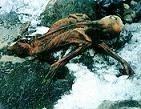

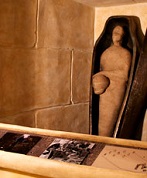

-3200 A major world warming event turns the habitable Sahara region into a desert and causes peoples in Edenic settings such as the Fertile Crescent to resort to irrigation; Quelccaya Ice Cap in the Andes Mts. of Peru is formed; Alpine man Oetzi (Ötzi) is trapped in a glacier in Ötztal Alps on the Austrian–Italian border, and found by hikers in 1991 C.E.; he has leather shoes with bearskin soles, deerskin panels, tree bark netting, and grass socks, becoming the oldest known natural human mummy, and oldest known person with a tattoo. About this time the Scorpion King I rules in Thinis in Upper Egypt, during which the Naqada III culture begins (until -3,150); meanwhile Scorpion King II (Selk or Weha?) rules in Nekhen in Upper Egypt - he's bragging? A system of city-states develops in Mesopotamia; several hundred Sumerian cuneiform clay tablets are inscribed with writing (economic documents) in Uruk; the first known tablet is a limestone tablet from Kish. Egyptians and Mesopotamians develop sail-powered boats. About this time pottery is left on the Ophel (hill) in the oldest part of future Jerusalem. About this time a bronze tablet with a carved face of a women is made, found at El-Ahwat near Katzir in C Israel, part of a wheel linchpin for a battle chariot; is this Harosheth Haggoyim, home town of Sisera, as in Judges chs. 4-5? A child's grave in Egypt contains objects used for a crude form of bowling, as discovered in 1930 by Sir William Matthew Flanders Petrie (1853-1942). About this time the 200K-ton Newgrange Tomb in County Meath, Ireland is built; each winter solstice the Sun shines through an opening above the entrance for about 15 min., illuminating a 60-ft.-long passage; discovered in 1699 C.E. Wheeled vehicles are used in Uruk. Stone circles (henges) are built in NW Europe. Pottery is made in Ecuador.
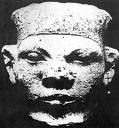
-3150 About this year King Narmer (Catfish) (AKA Menes) of the Thinite Confederacy becomes the first king to unite Upper and Lower Egypt, becoming the first to use the title of pharaoh ("great house"), founding the Egyptian First Dynasty (ends -2909), and the Early Dynastic Period (ends -2686), with capital at Thinis (This) (Tjenu) (near Abydos?); he goes on to build the city of Memphis at the apex of the Nile Delta in Lower Egypt, and improves and enlarges the site by constructing a dam to divert the Nile River, beginning the basin system of agriculture in the Nile Valley; Memphis becomes the center of worship of Ptah, the god of creation; the city of Sais on the upper W side of the Nile Delta is an important cult center; all the pharaohs of this dynasty have retainers sacrified and buried near their tombs, along with animals in Abydos (Abdju); in succeeding dynasties the humans are replaced by ushabtis (figurines); the earliest depiction of a sailboat (made of bundled papyrus reeds) dates to this dynasty - catfish beats scorpion? The first temples are built in Tarxien, Malta.
-3130 Adam (b. -4004) is 874 years old; Enoch (b. -3382) is 252 years old; Methuselah (b. 3317) is 187 years old; birth of Methuselah's son Lamech (Gen. 5:25).
-3125 The first wine discovered in Egypt in modern times is produced in Jordan and buried in the Scorpion King's tomb.
-3114 Aug. 13 is the moment of the fourth creation in the Mayan Calendar.
-3113 This year marks year zero in the Mayan Calendar.
-3125 The first wine in Egypt, buried in the Scorpion King's tomb dates to about this time.
-3114 On Aug. 12 the current Mesoamerican Calendar Cycle (5th Sun) begins.
-3100 About this time Narmer's son Aha (Hor-Aha) (Horus-Aha) becomes king #2 of the Egyptian First Dynasty, enjoying a long reign. About this time Skara Brae stone village in the Orkneys is built. By this year there are about 40 stable agricultural communities on the Nile, which always floods in Sept. and recedes by the end of Nov., and doesn't need ploughing or hoeing to produce crops. Antigua (Sp. "Ancient") in the Leeward Islands is first settled. Hieratic script, a cursive form of hieroglypics written with a blunt reed pen on papyrus is invented in Egypt about this time, but doesn't become common for six cents. (-2500). About this time Kali Yoga is founded. The earliest known chemical evidence of barley beer (along with wine) is in Level V of Godin Tepe in the Zagros Mts. of W Iran. Board game pieces are manufactured in Basur Hoyuk in SE Turkey.
-3074 Enoch (b. -3382) is 308 years old; death of Adam (b. -4004) at age 930 (Gen. 5:5).
-3050 About this time the climate of North Am., along with vegetation cover and sea levels achieve modern levels.
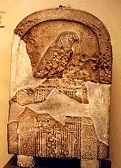
-3049 Djer becomes king #3 of the Egyptian First Dynasty, and rules 41 years; 338 people are buried with him.
-3017 365-y.-o. Enoch (b. -3382) is transferred by Jehovah to ? (Gen. 5:24, Jude 14).

-3008 Djet (Zet) (Wadj) (Euadji) ("Serpent of Horus") (Uenephes?) (Atothis?) becomes king #4 of the Egyptian First Dynasty (until -2998), carrying on intense trade with Syria and Palestine, incl. pottery.

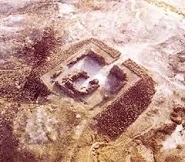


-3000 World pop.: 14M; Syria-Palestine: 250K - wild and crazy guys? The pop. of North Am. peaks, and stays constant until the arrival of Europeans in 1492 C.E., when it halves, then rebounds. The African Human Period (begun -9K) ends. The hunter-gatherer lifestyle dies out in C Europe after coexisting with farming for 2K years. About this time Ireland is inhabited by Neolithic farmers originally from Anatolia, who leave stone circles, dolmens, and great monuments in the Boyne Valley. The Delaware and Chesapeake Bays are formed. About this time post-Deluge king Etana of Kish, "the shepherd who ascended to heaven and consolidated all the foreign countries", "the man who stabilized all the lands" founds the Early Dynastic I Period (ends -2800) (-2900 to -2700?) in Sumeria (Ki-engir) in the S Fertile Crescent, becoming the first high civilization, with temple communities controlled by Sumerian priest-bureaucrats pandering kinder-gentler Sumerian gods, led by Enlil ("lord of the wind"); chariots first appear in Sumer; the Sumerian King List names eight antediluvian kings reigning for tens of thousands of years; the Royal Tombs of Ur contain the graves of Meskalamdug and Akalamdug. About this time the non-Semitic Elamites, with capital at Susa in SW Iran begin a long conflict with Sumer in the S Fertile Crescent and Akkad in the N Fertile Crescent - the original Sunni-Shiite civil war? About this time the city of Konya is first settled, going on to be controlled by the Hittites around 1,500 B.CE.., followed by the Sea Peoples around 1,200 B.C.E., and the Phrygians around 800 B.C.E., who call it Iconium, "the last city of Phrygia" (Xenophon); in 690 B.C.E. it is taken by the Cimmerians, and is absorbed into the Persian Empire until Macedonian king Alexander the Great captures it in 333 B.C.E., after which Seleucus I Nicator and the kings of Pergamon rule it until its last king Attalus III gives it to the Romans, who incorporate it into the Roman Empire under Emperor Claudius, who renames it Claudiconium; in 1084 C.E. the Seljuks conquer it, making it the capital of the Seljuk sultanate of Rum in 1097-1243. About this time the licentious Baal, Ashtoreth, and Car (Moon godess) worshiping Semitic Phoenicians (Phenicians) (Kena'ani or Canaanites = "merchants") (Gr. "phoinix" = red-purple) settle the E Mediterranean coast, a long narrow (5 to 15. mi.) strip of land from the Orontes River or Eleutherus River in the N to Mt. Carmel in the S, bounded on the E by the Lebanon Mts.; they worship the Moon because it rules the tides, and they want to rule the seas?; the city-states of Arvad (Arwad) (Rouade), Gubal (Djebeil) (Byblos), Marathus, Ecdippa, Acco (Akko) (Acre), Simyra (Sumra) (Tell Kazel), Dor (Dora) (southernmost), Zarephath (Sarafind) (Sarepta), Tripolis (Tripoli), Berytus (Beirut) and Sidon (Saida) (25 mi. S of Beirut) (first mentioned in the 15th cent. B.C.E. Tell el Amarna Letters), and Tyre (Sur) (Zor) ("rock") (from a double rock off the coast) ("daughter of Sidon") (50 mi. S of Beirut) are founded - white sidewall tire below the root? In this millennium the Bell-Beaker (Strijdhamer) (Standvoetbeker) Culture (who make pot-shaped upside down bells) arises in Iberia, bringing bronzemaking to backward white Europe incl. the Netherlands, Denmark, and S Scandinavia. About this time the Neolithic Age begins in S India (ends -1400). People in Xincun, China practice agriculture before the arrival of domesticated rice. About this time irrigation is developed in Nubia (modern-day Sudan), using the flood waters of the Nile River with a waterwheel-like device called the sakia. About this time the Bouar Megaliths, about 70 groups of megaliths are built in W Central African Repub. (CAR). About this time the Ness of Brodgar, 100+ Stone Age bldgs. are built in Orkney, becoming the center of British Neolithic culture, more important than Stonehenge? About this time the earliest known fountain is located in Mesopotamia, consisting of a series of basins fed by a natural spring, which is later copied by the Greeks and Romans. About this time the great stone circle Callanish Stones on the Isle of Lewis in the Outer Hebrides of Scotland are built, along with the Stenness Stones, aligned to the movements of the Sun and Moon. The Map Stones of Bornholm Island in Denmark are maps of local fields, fences, and plants?; found in June 2016. About this time Lothagan North Pillar Monumental Cemetery is built Lake Turkana in modern-day Kenya, becoming the earliest and largest in E Africa. The earliest known milk protein is found on human teeth in Mongolia. By this time turmeric, cardamom, black pepper and mustard are being harvested in India. About this time the Caucasian Hattians settle C Asia Minor (Anatolia), with capital at Hatti (modern-day Bogazkoy or Hattushash in Cappadocia) 150 mi. S of Sinop, worshiping the Sun goddess Wurusemu and the storm god Taru. About this time the Egyptians build two temples to ibis-headed Thoth ("he who is like the ibis") (god of wisdom and inventor of writing, the heart and tongue of Ra, whose curved beak represents the crescent Moon) on Thoth Hill in W Thebes; he is sometimes portrayed with a baboon head instead. The Celts begin fighting for their free-ee-ee-dom? About this time the Celts (from the Greek word Keltoi, meaning hidden people), a fusion of Mediterranean, Alpine, and Nordic strains, incl. a dark Iberian and a blonde stock, and known, like Slavs, for big beards (compared to Chinese who have stubble beards, Ethiopians who have curly beards, and Am. aborigines, who are bare-faced) appear in N Europe; their Indo-European Gaelic Language drops the p sound in the initial or medial position (Lat. porcus becomes Gael. orc); they eventually form more than 150 distinct tribes, incl. the Britons in Britain, the Gauls in France, and the Goidels (Gaels) (Gael. "gwyddel" = savages) in Ireland, Scotland, and the Isle of Man; Goidelic Gaelic splits from Brythonic Galic by preserving the hard c sound, which turns into p in Brythonic (Irish mac becomes Welsh map); they practice the Druid Religion (Gr. "drus" = oak tree), which worships trees (rowans), practices magical ceremonies, and believes in the Sun god Belenus (Beli Mawr) ("the shining one"), the goddess of victory Andraste (Andrasta) (Andred), tree genies, Earth gods, and elfin demons; they fail to develop a written lit., relying on oral transmission by bards, filid (poets), scelaige (narrators), and entertainers; although they have no alphabet, symbols they use incl. the cross, swastika (fylfot), and trefoil (trivet), plus the colors and weaves later used in Scottish tartans; the Britons are cannibals; the social org. is tribal and clannish, preventing consolidation into a central govt., which proves their weakness and undoing? The San Huang (Three Emperors) (Three Sovereigns and Five Emperors) Dynasty is founded, ruling China for the next three cents.; the earliest known silk comes from Henan about this time? Hunter-gatherers inhabit the Japanese islands, and make pottery. About this time the earliest known industrial scale brewery is built in Abydos, Egypt. Beer is paid to workers in Uruk, Sumer as wages, about 4-5l/day. The Kushites (Cushites) enter the interior of E Africa in this millennium, raising cattle and grain. About this time the Malays from S Indochina settle in Indonesia, and Austronesians migrate to the Philippines. The city of Rhagae (Rhages) (Rages) (Rai) (called Europus by the Greeks) is founded by the Medes 5 mi. SE of modern-day Tehran in N Iran, becoming the capital of the Median Empire and going on to become one of the great cities of antiquity along with Nineveh and Ecbatana. Cairns and portal tombs are built in N Ireland. The Late Archaic Period in North Am. ends. Olives, grapes, and grains are cultivated in the Aegean islands. Sheep, cattle, and water buffalo are domesticated in China. Glassmaking originates in Mesopotamia about this time. Ma Huang, containing Ephedrine, closely resembling amphetamine is used by Chinese doctors. The people of Tehuacan, Mexico cultivate maize. The Iceman lives in the Austria-Italy border region (discovered in Sept. 1991). The earliest writing in China is in the E province of Zhejiang. The Hanshan Jade is carved with a design akin to modern Feng Shui compasses. Nearly 75% of human gene mutations occur from this time forward. A 20-y.-o. woman in a farming community in Gokhem, Sweden supplies the oldest known sample of plague bacteria. Inventions: Draft oxen and the Potter's Wheel are used in Mesopotamia. Beeswax Candles begin to be used in ?. Nail Polish is invented in China. The first permanent copper shaving razors appear in Egypt and India. The Dust Abacus is invented, probably in Babylonia. The board game of Senet (ancestor of backgammon) is invented in Egypt.

-2998 Djet dies, and his sister-wife Merneith (Meritneith) (Meryt-Neith) ("Beloved by Neith") becomes king #5 of the Egyptian First Dynasty as regent for their son Den, becoming the first pharaoh of ancient Egypt.
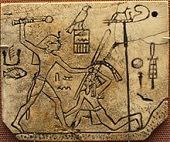
-2970 Merneith's son Den (Hor-Den) (Denen) (Udimu) reaches the age of majority and becomes king #6 of the Egyptian First Dynasty, ruling 42 years (until -2928), becoming the first to use the title "King of Lower and Upper Egypt" and the first depicted wearing the red-white double crown, establishing many patterns of court ritual and royalty and being held in high esteem by his immediate successors; his tomb in Umm el-Qa'ab (near Abydos) has a red-black granite floor, becoming the first hard stone used as building material in Egypt. About this time unsealed wine jars are buried in Queen Merneith's tomb.
-2968 The Chinese discover ink.
-2953 Fu Xi Shi (d. -2852) becomes the first San Huang emperor of China.
-2948 Adam would have been 1,056 years old if he hadn't done that no no in Eden; Methuselah (b. -3317) is 369 years old; birth of Noah (d. -1998) (Heb. "comfort", "rest") (Gen. 5:28-29), 10 generations from Adam; the Flood is 600 years ahead, and Abraham is 952 years (another 10 generations) ahead (-1996); the meaning of the names of Adam and his descendants all the way to Jesus make a coherent prophecy, starting with "The God-man is appointed, a mortal man of sorrow is born, the glory of God shall come down from heaven and teach men that by means of his death he shall bring rest and comfort to those who mourn." (Adam to Noah)
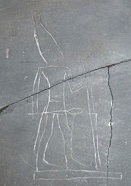
-2928 Den dies, and his son Anedjib (Hor-Anedjib) (Adjib) (Hor-Adjib) (Enezib) becomes king #7 of the Egyptian First Dynsty, ruling 10 years (until -2918).
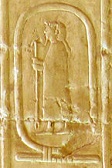
-2918 Anedjib dies, and his son Smerkhet ("companion of the divine community") becomes king #8 of the Egyptian First Dynasty, ruling only 8.5 years (until -2909) after a great pestilence strikes his kingdom.

-2909 Semerkhet dies, and his son Qa'a (Ka'a) becomes king #9 (last) of the Egyptian First Dynasty, ruling for 33 years (until -2876); too bad, a dynastic war begins after his death, with Horus Bird and Sneferka fighting for power until Hot and Sexy wins.
-2900 About this time the Early Helladic Period of Greece begins (ends 2000 B.C.E.), with prosperity caused by the use of metals along with growth in technology, economy, and social org. The SW (Elamite) Persians begin using a hieroglyphic Proto-Elamite Script. About this time the Chinese domesticate the wild boar, A gay caveman is buried near modern-day Prague, Czech. in a way normally reserved for women. Science: Sus cristatus - and Jews say nooo-thanks, alright? Egyptian doctors a drill hole in the lower jaw to drain an abcessed tooth - the first dentists?
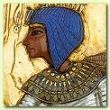
-2890 Hotepsekhemwy ("the two powers are reconciled") becomes king #1 of the Egyptian Second Dynasty (ends -2672), with capital at Thinis (This) (Tjenu) (near Abydos) (modern-day Girga), going on to rule 29 years (until -2861).
-2879 The legendary founding of the feudal Van Lang Kingdom in the Red River Delta of Vietnam by the first Hung Vuong (Hung King) (ends -258); the pop. consists of the Chams, a Caucasoid people from India who end up as Muslims.
-2861 Nebra (Raneb) ("lord of the Sun of Horus") (Weneg?) becomes king #2 of the Egyptian Second Dynasty, reigning 14 years (until -2847).

-2852 Fu Xi decrees the use of surnames (family names), causing each Chinese person to have three names, the surname listed first and coming from one of the 438 words in the sacred poem Po-Chia-Hsing, then the generation name taken from a poem of 30 characters adopted by each family, followed by the given name; Fu Xi dies, and Shen Nong (Nung) Shi (Yan Di) (d. -2737) becomes San Huang emperor #2, the alleged father of Chinese agriculture and first herbal doctor, writing Shen Nong's Herbal Classic, the first Chinese herbal, declaring the five sacred plants to be rice, wheat, barley, millet, and soybeans.
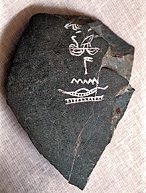
-2847 Nynetjer (Ninetjer) (Banetjer) becomes king #3 of the Egyptian Second Dynasty, reigning 45 years (until -2802).
-2807 On May 10 a total scolar eclipse mentioned by several ancient flood myths indicates a meteor impact in the Indian Ocean, according to Am. archeologist Bruce Masse.

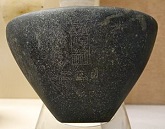
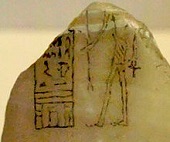
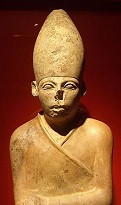
-2802 Senedj (Sened) (Sethenes) becomes king #4 of the Egyptian Second Dynsty, ruling unknown years, after which king #5 Seth-Peribsen (Perabsen) (Ash-Peribsen) and king #6 Sekhemib-Perenmaat (Sekhemib) rule for unknown years while the War between Seth and Horus (worshippers) rocks the nation, and Seth wins, after which in -2690 Khasekhemy (Kasekhemui) ("the two powerful ones appear") becomes king #7 (last) of the Egyptian Second Dynasty, ruling for 18 years (until -2672), leaving the 14 brick-enclosed plank-and-rope Abydos Boats (discovered in 2000 C.E.) along with the mud brick Shunet ez-Zebib funeral structure, marking the start of the Egyptian belief in the afterlife being a place to take their stuff and live forever?


-2800 About this time the Early Dynastic II Period begins in Sumeria (ends -2550), which according to the Sumerian King Lists begins after the Great Flood of Utnapishtim in Shuruppak (described in the Gilgamesh Epic), starting with the First Dynasty of Kish (ends -2700?); the Sumerian word for king is lu-gal ("big man"); Sumerian king Ziusudra ("long-lived") of Shuruppak saves livestock stuck on a barge on a hill in the great flood of the Euphrates River, and makes a sacrifice to his god; about this time the Instructions of Shuruppak is written, becoming the oldest known work of literature to survive to modern times; "In those days, in those far remote times, in those nights, in this faraway nights, in those years, in those far remote years"; "You should not play around with a married young woman: the slander could be serious"; "You should not make a well in your field: people will cause damage on it for you." About this time the Uruk (Erech) Dynasty way S of Kish based in the city of Ur ("Aur" = light) is founded by Meskiaggasher after Etana dies, ruling from the Mediterranean to the Zagros Mts., and becoming the rival of Kish; Meskiaggasher's son Enmerkar attacks neighboring Aratta (NE of Mesopotamia) to capture its art treasures, taking along his eight sons; youngest son Lugalbanda is left behind in the remote mountains and falls ill, and receives help from the Anzu bird, who helps him reuinite with his father, going on to become king; the army of Aratta keeps them at bay for more than a year because their god is punishing them; the whole Epic Cycle of Enmerkar and Lugalbanda is described in cuneiform tablets. About this time the Qa'a Stele is erected at the burial site of Egyptian king Qa'a in Abydos, the cult center for Osiris, the original resurrected Christ with a paradise called the Field of Reeds, but also a hell with 42 demons? About this time (-3000 to -2200?) construction (by Celts or just Stone Age Sun-Moon worshipers?) of Stonehenge begins (ends -1800) on the Salisbury Plain in Wiltshire, S England near the Avon River 2 mi. W of modern-day Amesbury, starting with a circular earth bank and ditch (ca. -3100), followed by a wooden henge (ring of posts), which is replaced 50 years later by a network of stone posts forming a roofed circular temple, becoming the largest cemetery in Britain (cremations); the pillars support a raised platform used to get closer to the heavens?; the first bluestones are erected in -2400 to -2200 (-3000?); it was first built 500 years earlier in Wales?; two of the largest stones were already there for millions of years?; in 2020 20 shafts are discovered in Durrington 2 mi. away. About this time Fah Shen-Chih pub. a text on farming, listing the Five Sacred Chinese Grains, soybeans, rice, wheat, proso millet, and foxtail millet.
-2772 The 365-day calendar is introduced in Egypt.

-2737 Tea is allegedly discovered when some leaves accidentally blow into Chinese emperor Shen Nong's pot of boiling water; hen Nong dies, and Sui Ren Shi (d. -2697) becomes San Huang emperor #3, the alleged inventor of Chinese cooking along with Shen Nong.
-2714 Mahalalel (b. -3609) dies at age 895.



-2700 In this cent. the non-Semitic matrilinear succession ("son of a sister") kingdom of Elam at the head of the Persian Gulf E of Babylonia is founded, with the capital at Susa, and prominent cities Awan, Anshan, and Simash. The First Dynasty of Kish ends with king Enmebaragesi, who rules after the end of Lugalbanda's reign and becomes the leading ruler of Sumer, and "carried off the arms of the land of Elam as booty"; he builds the Temple of Enlil in Nippur, making it the spiritual center of Sumer; his son Agga (last ruler of the Etana dynasty) is defeated by Mesannepadda, founder of the First Dynasty of Uruk (Ur), based in the city of Ur, whose successor Gilgamesh becomes a legendary hero; Queen Puabi (Nin-Puabi) (Akkadian "word of my father") (AKA Shubad), a Semitic Akkadian becomes an important figure among the Sumerians. About this time the First Dynasty of Mari and the First Dynasty of Awan (Elam) (ends -2550?) flourish in Mesopotamia. Grakliani Hill in Georgia has written inscriptions on a fertility goddess altar. Inventions: About this time the Sumerians invent the Abacus, followed by the Persians in -600, the Greeks in -500, and the Chinese in -200; the earliest known abacus dates to -300, the Salamis Tablet, discovered on the Greek island of Salamis in 1846.
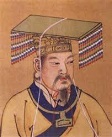
-2697 Sui Ren Shi dies; beginning of the reign of Huang Di (Ti) (Gongsun) (Xuan Yuan Shi) (d. -2597), AKA the Yellow Emperor, who allegedly founds the nation of China; he makes his capital at You Xiong; he orders his officer Can Ji to create Chinese Characters (kanji).
-2691 Radiocarbon dating of 211 plants released in 2010 C.E. by the U. of Oxford and U. of Cranfield gives this year as the beginning of Pharaoh Djoser's reign.

-2686 Khasekhemwy (Khasekhemui) ("the two powerful ones appear") becomes king #5 of Egypt's Second Dynasty, uniting Upper and Lower Egypt.
-2680 The Partholon (Partholón) (Parthalán) settle in Ireland 300 years after Noah's Food, multiply from 1K to 4K, then all die of plague in a single week.

-2670 The Egyptian Third Dynasty is founded after a civil war by Zanakht (Sanakhte) (Nebka) (d. -2630); the Old Kingdom (Age of the Pyramids) (3rd through 6th Dynasties) begins (ends -2200), worshiping the Ogdoad (Gr. "8-fold") of eight deities in Hermopolis, made of of four male-female pairs, with the males associated with frogs and the females with snakes, incl. Nu and Naunet, Amun and Amaunet, Kuk and Kauket, Huh and Hauhet.
-2665 The earliest known yew longbow is made in Somerset, England.
-2640 Chinese Empress Hsi-ling Chi (Shi) discovers Sericulture after a cocoon falls from a mulberry tree into her tea cup, and it unravels as she tries to remove it; divulging the secret of sericulture becomes a treasonable death penalty offense, and the Chinese monopoly eventually makes it worth its weight in gold; the best silk comes from Bombyx mori moths, which each lay up to 500 pinhead-sized eggs, which hatch in 20 days, and begin munching mulberry leaves, growing 70X in 18 days after shedding their skin 4X and increasing their weight by 10KX; they then begin spinning, secreting double strands of fibroin coated with gumlike sericin before coming out of the spinneret at the rate of 10-15 in. per min., or up to 1 mi. in 48 hours; it takes 100 cocoons to make a silk scarf, 140 to make a tie, and 9K to make a kimono - ooh, bite your tongue? Chinese royal astronomers Hsi and Ho are executed for dereliction of duty when they get drunk and fail to predict a solar eclipse; luckily, the dragon eating the Sun gets his fill and departs, even though the required noisemakers with gongs are not assembled to drive it away. A rival to Stonhenge 2 mi. to the NE is suddenly discontinued.
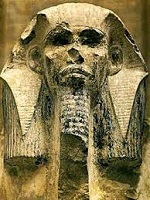

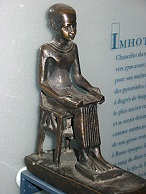
-2630 Zanakht dies, and his younger brother Djoser (Zoser) (Netjerykhet = "divine of body") (d. -2610) becomes king #2 of Egypt's Third Dynasty, ruling for 29 years, building the Step Pyramid in Saqqara 12 mi. S of modern-day Cairo, becoming the first pyramid in Egypt, launching the Age of the Pyramids (3rd thru 6th Dynasties, AKA the Old Kingdom) (ends -2200); Djoser's painted limestone statue in Saqqara becomes the oldest life-sized Egyptian statue to survive to modern times; chancellor Imhotep ("one who comes in peace"), architect of the Step Pyramid and high priest of Ra in Heliopolis thrives during the Third Dynasty at the court of King Djoser, later becoming the center of a cult in Memphis in the 30th Dynasty (380-343 B.C.E.), worshiped as the "god of medicine" and "prince of peace", becoming the only Egyptian commoner to be deified after his death other than Amenhotep, son of Hapu.

-2610 Djoser dies, and his son Sekhemkhet (Djoser Teti) becomes king #3 of Egypt's Third Dynasty, rulng for seven years.

-2603 Sekhemkht dies, and Khaba (d. -2599) becomes king #4 of Egypt's Third Dynasty, going on to build the Layer Pyramid 5 mi. SW of Giza.
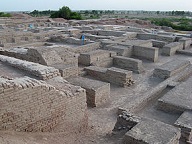

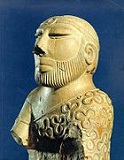


-2600 The pop. in the Indus Valley and Sarasvati River regions begins to mushroom due to farming (ends -2000), building two large cities by -2500 at Harappa on the Indus River S of Lahore in W Punjab, Pakistan, and Mohenjo-Daro near Larkana in S Sindh, Pakistan, with public bldgs. and sanitation, leaving the sculptures Dancing Girl and Priest-King; discovered in the 1920s; India's original jackpot lotto game, Hinduism, oldest religion in the world was developed, based on Shruti (Sruti) (Sansk. "that which is heard"), with the theme that gods are a dime a dozen and they must all ultimately be one, and the goal of life is to transcend them all; too bad, starting about 2500 B.C.E. a climate change begins, causing summer monsoon rains to gradually dry up, causing the Harappa culture to abandon their cities and move to smaller villages in the Himalayan foothills by -1800. About this time the Canaanite city of Jericho ("reah" = fragrant) ("Yareah" = Moon) is founded on the W bank of the Jordan River (modern-day pop. 20K), becoming known for its extensive walls with rectangular towers, and extensive cemetery with vertical shaft-tombs and underground burial chambers, with the nickname "City of Palms". About this time the Taino people from E Venezuela arrive on the island of Hispaniola in large dugout canoes. About this time the Mayan Culture begins in Mesoamerica (Yucatan), beginning the Early Pre-Classical Period of farming villages in the Soconusco region of the Pacific coast (ends 250 C.E.). About this time Caral in the modern-day Lima desert region of Peru is founded, becoming the oldest known urban center in the Americas, containing a temple complex, amphitheatre, and houses; discovered in 1948 by Am. explorer Paul August Kosok (1891-1959); in 2001 Peruvian archeologist Ruth Martha Shady Solis (1946-) pub. radiocarbon dates of 2627 B.C.E. to 1977 B.C.E. About this time 5-ton Preseli Bluestones (not really blue, but kind of blue-gray when wet?) from Preseli in SW Wales are floated on rafts by sea and the Avon River, hauled overland and added to Stonehenge. Houses dated to this time are excavated at 500m-diam. Durrington Walls, 2 mi. ENE of Stonehenge, where a wooden henge is located, oriented to face the midwinter sunrise and midsummer sunset. Vanilla is found in a royal tomb in Megiddo, Canaan.

-2599 Khaba dies, and Huni (d. -2575) becomes king #5 of Egypt's Third Dynasty; his wife is Meresankh I.
-2597 Huang Di dies, and Shao Hao (Jin Tian Shi) (d. -2513) becomes Wu Di king of China; his capital is at Qiu Fu.
-2582 Jared (b. -3544) dies at age 962.
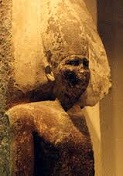

-2575 Huni dies, and his son Sneferu (Snefru) (Snofru) (d. -2551) becomes king #6 (last) of the Egyptian Third Dynasty, building the Pyramids of Dhashur in the royal necropolis of Dahshur (40 km S of Cairo) incl. the Red Pyramid and the Bent Pyramid, establishing commerce with Phoenicia.
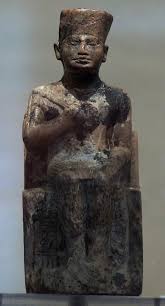

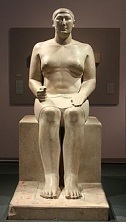
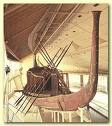


-2551 Sneferu dies (-2589?), and his son Khufu (Cheops) (d. -2528) becomes king #2 of the Egyptian Fourth Dynasty; his mother is Hetepheres (Hetapheres) I; Khufu builds the 450-ft.-high Great Pyramid of Khufu (Cheops) (Giza) at Al Jizah (Giza Plateau), 0.25 mi. W of the Nile River, becoming the tallest bldg. in the world until the 19th cent. C.E.; Pliny the Elder mentions it in his Natural History, saying that it is worshipped as a "divinity", and that "King Harmais was buried in it"; it incl. a tablet explaining how Thoth, god of the night gambled with the Moon and won five days to add to the 360-day calendar outside the jurisdiction of Sun god Ra; the architect is man-breasted Hemon (Hemiunu), son of Snefru and cousin of Khufu; the work takes 100K workers 20 years, and uses 3M 2.5-15-ton stone blocks from Giza, the E bank of the Nile, and Aswan (600 mi. downstream) (only source of granite in Egypt), impoverishing the country and using up the entire male pop.; in 1954 C.E. the 125-ft. Solar Funeral Barque (Ship) of Khufu is discovered near the Great Pyramid; it was really built between -5K and -7K, as proved by the water weathering on the limestone? - John Anthony West (1932-); it was really built on an island, and originally had a gigantic statue of Anubis the watchdog?; the water weathering came from Noah's Flood? :); in 2007 C.E. Jean-Pierre Houdin (1951-) claims to have discovered how they built it, using an outer ramp for the first 140 ft. and a corkscrew-shaped inner ramp for the next 310 ft.; in 2010 the existence of dried mud brick tombs nearby are claimed to prove that the workers were not slaves - gaining the whole world and losing his soul?
-2550 Nin-Kisalsi becomes king of Adab and vassal of Ur. The Early Dynastic II Period in Sumeria (begun -2550) ends. The Second Dynasty of Awan (ends -2230) is founded by Peli, who rules from Susa through a viceroy (his brother?), with an elective monarchy and provincial governors with considerable independence.
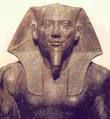

-2528 Khufu dies, and his son Djedefre (Djedefra) (Radjedef) (Ratoises) (d. -2520) becomes king #2 of Egypt's Fourth Dynasty, becoming the first to style himself Son of Ra; his wife is his sister Hetepheres II, mother of Meresankh II, who marries King Khafre.

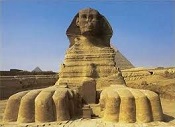
-2520 Djedefre dies, and his brother Khephren (Khafre) (Khafre) (Chephren) (d. -2494) becomes king #3 of Egypt's Fourth Dynasty, going on to build the Great Sphinx of Giza and the Pyramid of Khafre (Second Pyramid of Giza).
-2513 Shao Hao dies, and Zhuan Xu (Gao Yang Shi) (d. -2435) becomes Wu Di king of China; his capital is at Diqiu.


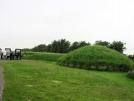


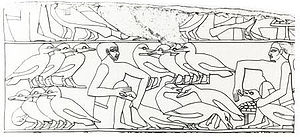
-2500 About this time the Aryan Hurrians (Khurrites) (Hivites or Horites in the Bible) from the Armenian and Cacucasus mountains invade and occupy N Mesopotamia, and areas to the E and W incl. Syria, causing the Egyptians to start calling Canaan Huru (Hurrian Land). About this time the Semitic-speaking Assyrians from Iran-Iraq settle upper Mesopotamia under king (-2450 to -2400) Tudia (Tudiya) (Du-udia), founding the city of Assur (Ashur) (Qal'at Sherqat) on the W bank of the Tiger River N of the its confluence with the Little Zab in modern-day Iraq; they speak the Akkadian Language, which becomes the lingua franca of Mesopotamia (Assyria, Akkad, Babylonia, Isin, Larsa) until Akkadian-influenced Old Aramaic replaces it by the 8th cent. B.C.E.; in the mid-14th cent. C.E. Tamerlane's forces massacre Assur's pop. About this time the Ebla ("white rock") civilization (built over limestone bedrock to take advantage of natural springs) flourishes in N Syria, with a pop. of 200K, incl. 20K in the town of Ebla, with a library of 1.8K+ clay cuneiform Ebla Tablets, discovered in 1974-5 C.E. by Italian archeologist Paolo Matthiae (1940-); the tablets refer to the town of Ha-lam, identified with Aleppo (Halab) (modern-day pop. 1.8M), known for it white marble. About this time the genetic composition of the first pan-European culture suddenly changes as the Yamna (Pit Grave) nomadic herders sweep into Europe from the steppes of Ukraine and Russia, bringing horses, wheeled carts, kurgan burial mounds, and the Proto-Indo-European language, along with marijuana, ending up dominating the gene pool. About this time the Celts of Britain have contact with the Iberian Peninsula, trading flint, bronze, and obsidian. About this time Bronze Age Bell Beaker people arrive in Ireland from E Europe, who were descended from horse herders on the Pontic Steppe; they go on to wipe out the Neolithic pop. with infection diseases? About this time the first Bedouins (Arab. "desert dweller") venture into desert C Arabia, becoming known for their loyalty hierarchy based on proximity of kinship, with the slogan: "I am against my brother, my brother and I are against my cousin, my cousin and I are against the stranger." The Corded Ware Culture and Beaker Culture begin spreading in N Europe (until -2000). The Longshan (Chin. "Dragon Mountain") Period begins in the Yellow River Valley in China (until -1900), where farmers are better organized and raise cattle, sheep, goats, chickens, and water buffalo, building rammed earth walls and producing highly polished black egg-shell pottery. The Bush Barrow royal grave is discovered near the site of Stonehenge, England in 2003, containing the most richly furnished prehistoric grave found in Europe, complete with a skeleton of a Central European and cool golden bling, which must have been worn in the hair over the ears to give the wearer a commanding look among the skin-wearing pop., and thus elevate him to great status and power; is this the king who organized the construction of Stonehenge? Passage Graves are built in Ulster, Ireland. Maes How (Maeshowe), a huge burial mound (tumulus) is built in Orkney. Loughcrew Cairns burial mound in Ireland contains carvings which could be attempts to evoke trances. Neolithic ashmounds are built in Karnataka in S India, and are later expanded to Tamil Nadu. The Okefenokee (Okefinokee) Swamp ("trembling earth") in North Am. (modern-day SE Ga. and N Fla.) is inhabited by aborigines. Cotton is grown in China and India. The Arabian horse originates in the Arabian Peninsula. Animal skins are first used for scrolls in W Asia. Bronze-working is developed in Mesopotamia. About this time the ox-drawn plow (ard) is invented in Egypt. The first illustration of a cat with a collar in a tomb in Saqqara, Egypt. Kites are used in China. Stone arches are invented in the Indus Valley. Lipstick About this time Lipstick is first is used by Sumerians in Mesopotamia, made of crushed gemstones; by -2000 women in the Indus Valley use dyes, and Egyptian women use crushed carmine beetles, with fish scales for a pearlescent effect; Cleopatra VII becomes a big fan. About this time the Egyptians begin the practice of producing foie gras by force-feeding geese and other birds.

-2494 Khephren dies, and Bakare (Bikheris) (Baka) (d. -2490) becomes king #4 of Egypt's Fourth Dynasty; the Egyptians begin sending ships to the Land of Punt (Pwene) (Pwenet) on the African coast of modern-day Eritrea and Somalia (which gets as close as 15 mi. to the coast of Arabia), collecting myrrh to go with the frankincense (olibanum) from the Dhofar (modern-day Oman) region of S Arabia (obtained from the resin of trees of the genus Boswellia) - oh man, that incense is frank? Ur-Nanshe (Ur-Nina) (d. -2465) founds the First Dynasty of Lagash at the confluence of the Tigris and Euphrates Rivers, and throws off domination by Ur.

-2490 Bakare dies, and Menkaura (Menkaure) (Menhaure) (Mycerinus) (d. -2472) becomes king #5 of Egypt's Fourth Dynasty, building the 3rd pyramid at Al Jizah (Giza); his main wife is Khamerernebty II; his other wife is Rekhetre.

-2472 Menkaura dies, and Shepseskaf (d. -2467) becomes king #6 (last?) of Egypt's Fourth Dynasty.
-2469 Methuselah (b. -3317) is 870 years old; Noah (b. -2948) is 501 years old; birth of Noah's youngest (eldest?) son Japheth (Heb. "enlargement") (Gen. 5:32).
-2467 Shepseskaf dies, and (imaginary?) Thamphthis (Djedefptah) (d. -2465) becomes king #7 (last?) of the Egyptian Fourth Dynasty.
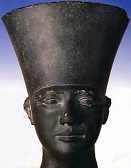
-2465 Thamphthis dies, and Userkaf ("His ka or soul is powerful") (d. -2458) (r. -2494 to -2487?) becomes king #1 of the Egyptian Fifth Dynasty, starting the tradition of building Sun temples in Abusir ("House of Osiris"); his wife is Khentkaues; he builds the Pyramid of Userkaf in Saqqara S of modern-day Cairo; in 2006 after arrested tomb robbers lead archaeologists to the graves, royal dentists Iy Mry, Kem Msw, and Sekhem Ka are discovered near the Step Pyramid of Djoser, complete with a warning that anyone violating the grave will be eaten by a crocodle and a snake; the first mention of the god Osiros (Asiri) (Ausar) (Ausir), "Foremost of the Westerners" (Khenti-Amentiu), "King of the Living", "Lord of the Dead" "Lord of Love", "Ever-Benign and Youthful", "Lord of Silence" (son of Ra and Nut, brother-husband of Isis, brother of Set, Nephthys, and Horus the Elder, and posth. father of Horus the the Younger) (known for rising from the dead) is made in the middle of this dynasty, becoming associated with the heliacal rising of Orion and Sirius during the new year, with pharaohs and later all Egyptians seeking eternal life through him; his main symbol is the 4-banded Djed ("pillar"), representing his spine. Ur-Nanshe dies, and his son Akurgal (d. -2455) becomes king of Lagash.
-2459 The traditional date of Noah's Great Flood; 489-y.-o. Noah (b. -2948) saves all air-breathing life on his Ark, incl. his four sons and their wives; after landing on Mt. Ararat in Turkey (highest mountain in the Middle East), the ramps come down and the Earth is repopulated; Ireland is populated by Magog, son of Japheth? - there must have been land bridges to all continents, right? Mt. Ararat is in the Caucasus Mts., so that's where White (Caucasian) is Right came from?
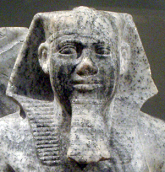
-2458 Userkaf dies, and his son (by Neferhetepes) Sahure (Sahureh) ("He who is close to Ra") (d. -2446) becomes king #2 of Egypt's Fifth Dynasty, going on to establish trade relations with the Levantine coast, sending several naval expeditions to Lebanon to procure cedars, slaves, etc., to the land of Punt to procure myrrh, malachite, and electrum, and to Sinai to procure copper and turquoise, and building the Pyramid of Sahure in Abusir, which introduces the palm leaf capital, adorned by 110K sq. ft. of fine reliefs; he becomes the only pharoah to be shown in a relief doing gardening work (tending a myrrh tree).
-2455 Akurgal dies, and Eannatum (d. -2425) (grandson of Ur-Nanshe) becomes king of Lagash, raiding Elam and extending his rule throughout Sumer and neighboring territories.
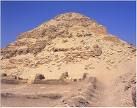
-2446 Sahure dies, and his son Neferirkare (Neferirkara) Kakai ("Beautiful is the soul of Ra") (d. -2426) becomes king #3 of the Egyptian Fifth Dynasty, becoming known for his kind and gentle rule, incl. pardoning elderly royal hairdresser Rawer for accidentally touching his mace during a religious ceremony; his wife is Khentkaus II. Methuselah (b. -3317) is 871 years old; Noah (b. -2948) is 502 years old; birth of Noah's eldest son Shem (d. -1847) (Heb. "name") (Gen. 7:11).
-2440 The Early Dynastic III Period in Sumeria begins (ends -2334).
-2435 Zhuan Xu dies, and Di Ku (Gao Xin Shi) (d. -2365) becomes Wu Di king of China; he makes Haojing his capital in the Yanshi country of Henan.
-2432 En-Shakush-Anna (En-Shag-Kush-Ana) (d. -2403) becomes king of Uruk, founding Second Dynasty of Uruk (Ur).
-2430 Enbi-Ishtar becomes king of Kish.
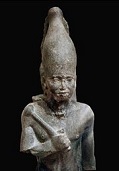
-2426 Neferirkare Kakai dies, and his son Neferefre (Raneferef) ("Beautiful is Ra") (d. -2424) becomes king #4 of the Egyptian Fifth Dynasty, ruling only 2-3 years, leaving an unfinished pyramid in Abusir; his wife is Khentkaus (Khentakawess) III.
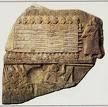
-2425 Eannatum dies after leaving the Stele of the Vultures (oldest historical document known, and oldest evidence of a standing professional army), and his brother Enannatum II (d. -2405) becomes king of Lagash.

-2424 Neferefre dies, and Sahure's son Shakespeare, er, Shepseskare (Shepseskara) Isi (Sisiris) ("Noble of the throne of Ra") (d. -2424) becomes king #5 of the Egyptian Fifth Dynasty, reigning only a few mo. and leaving an unfinished pyramid in Abusir.
-2420 Noah begins to build the gopher wood (whatever that is) Ark (Gen. 6:14).
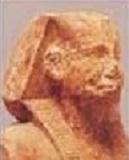
-2416 Shepseskare dies, and Neferirkare Kakai's youngest son (by Khentkaus II) (brother of Neferefre) Nyuserra (Nyuserre) (Neuserre) ("Possessed of Ra's power") Ini (d. -2392) becomes king #6 of the Egyptian Fifth Dynasty.
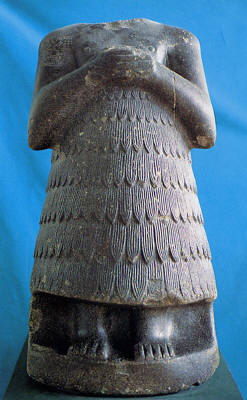
-2405 Enannatum II dies, and his son Entemena (d. -2375) becomes king of Lagash.
-2403 En-Shakush-Anna dies.
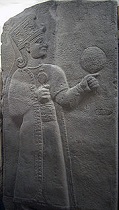



-2400 Lugal-Anne-Mundu (Lugalannemundu) of Adab becomes king of Sumeria, extending his empire to "the four quarters of the universe" (entire fertile crescent from the Persian Gulf to the Mediterranean, and from the Zagros Mts. to the Taurus Mts.); he rules for 90 years. King Enmetana of Lagash in modern-day S Iraq erects the Sumerian cuneiform marble stele to settle a border dispute with King Gishakidu of Umma, becoming the first known record of a border dispute and the term "no man's land". Tavern keeper Kubaba (Ku-Bau) (Kug-Bau) becomes queen of Kish, becoming the only woman to rule in Sumer and Akkad, reigning for 100 years. About this time the city of Carchemish (Karkemish) in N Syria is first mentioned, going on to be ruled by the Mitanni, Hittite, and Neo-Assyrian Empires, and become the location of an important battle in 605 B.C.E. between the Babylonians and Egyptians (Jer. 46:2). About this time the city of Kirkuk in modern-day Iraq near the Khasa River 150 mi. N of Baghdad (modern-day pop. 850K) is mentioned in cuneiform records, becoming part of the Akkadian Empire of Sargon of Akkad in 2335 B.C.E.; about 2150 B.C.E. it becomes Arraphka, capital of the kingdom of Gutium, which is destroyed by the Neo-Sumerian Empire about 2090 B.C.E., going on to become part of the Old Assyrian Empire in 2025 B.C.E. to 1750 B.C.E., and Assyria in 1725 B.C.E. About this time a pottery workshop in Aswan, Upper Egypt near Kom Ombo Temple is operated, becoming the oldest Egyptian workshop known. About this time an erotic dancer's bead-net dress from this era (Old Kingdom period) is made, and later restrung by students of Sir W.M.F. Petrie from a box of beads and shells found in the tomb of a 10-y.-o. girl. About this time the 5th Dynasty relief painting Ti Watching a Hippopotamus Hunt is painted in Egypt. About this time the 17 in. x 9.5 in. x 2 in. black diorite Palermo Stone, inscribed with annals of the Egyptian kings from predynastic times to the first half of the Fifth Dynasty is created.
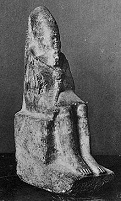
-2392 Nyuserra dies, and Khentkaus III's son Menkauhor (Ikauhor) Kaiu (Mencheres) (d. -2388) becomes king #7 of the Egyptian Fifth Dynasty, sending an expedition to Sinai and building the Akhet-Ra ("Horizon of Ra") Temple in Abusir (the last Sun temple to be built) before being buried in the Headless Pyramid in Saqqara.

-2388 Menkauhor Kaiu dies, and Djedkare (Djedkara) Isesi (Tancheres) (d. -2356) becomes king #8 of the Egyptian Fifth Dynasty.
-2380 Lugal-Kinishe-Dudu (Lugalure) becomes king of Uruk.
-2375 Entemena dies, and his son Enannatum III (d. -2365) becomes king of Lagash.

-2371 Semitic warrior Sargon (Sharru-Kin) ("true king") I (the Great) (d. -2316) (who was floated in a reed basket on the Euphrates as a baby?) stages a coup and becomes king of Kish (until -2316) (56 years); he attacks Hishap-Resher of Awan and sacks Susa.
-2365 Di Ku dies, and Zhi Di (d. -2357) becomes Wu Di king of China. Enannatum III dies, and the usurper priest Enetarzi (d. -2359) becomes king of Lagash.
-2361 In his 11th year Sargon I the Great of Akkad conquers Sumer with infantry archers, and becomes king of Assyria in N Mesopotamia (Sumer and Akkad), the region's first Semitic dynasty (ends -2193), with capital at Agade (Akkad) in N Sumer, making it the richest and most powerful city on Earth, and spreading the Akkadian Language and culture; too bad, his empire lasts for less than a cent.
-2360 Ku-Bau dies, and her son Puzur-Sin (d. -2340) becomes king of Kish, going on to drive out Asinum the Amorite vassal king of Babylon from Assyria, allowing native usurper Ashur-dugul to seize the throne.
-2359 Enetarzi dies, and Lugalanda (d. -2352) becomes king of Lagash.
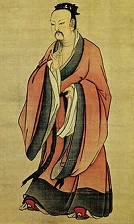
-2357 Zhi Di dies, and Yao Di (Tang Yao) (d. -2255) becomes Wu Di king of China, making his capital at Qi, and allegedly inventing the game of Weiqi (Go) for his son Dan Zhu.

-2356 Kjedkara Isesi dies, and Wenis (Unis) (Unas) (Usas) (Oenas) (Onnos) (d. -2323) becomes king #9 (last) of the Egyptian Fifth Dynasty; his wives are Queen Nebet and Queen Khenut - my wenis needs some nebet and khenut?
-2354 A severe global environmental downturn is caused by comets?
-2352 Lugalanda dies, and the usurper Urukagina (Uruinimgina) (d. -2342) becomes king of Lagash, then becomes the first reformer in history when he tries to throw off the oppression of the priests?
-2350
Another traditional date of Noah's Flood - Moo oink cluck gobble? Go ahead, let it snow?
When you guys go to the mall you'll have the network?
The Nemedians ("holy", "privileged")
arrive in Ireland in one of 44 ships that set out from the Caspian Sea a year and a half earlier, and defeat the semi-divine
Fomorians; later they are defeated by the
Fir Bolg ("bag men", "bright ones"),
who are defeated by the Tuatha De Danann
(People of the Goddess Dana or Danu), who are defeated by the Sons of Mil Espaine (Milesians)
from the NW Iberian Peninsula, after which they are led underground into the Sidhe (Shee) Mounds
by the god Dagda ("good god"), assuming invisibility, with the power to reappear in human form, becoming the Fairy Folk, with their goddess
Eriu giving Ireland its name; thus, modern-day Ireland contains two races, one visible, the other invisible? - depending on how much whiskey
you've drunk?
The largest known obelisk in Egypt's Old Kingdom.
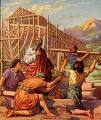
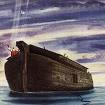
-2348 Methuselah (b. -3317) dies at age 969 (Gen. 5:27); 600-y.-o. Noah (b. -2948) finishes Noah's Ark, 300 cubits long x 50 cubits wide by 30 cubits high (438 ft. x 73 ft. x 44 ft.) (Gen. 6:15-16), which has 1.4M cubic ft. of cargo space and 96K sq. ft. of floor space on 3 floors (same as the Titanic) and holds at least the bare minimum of 43 kinds of mammals, 74 kinds of birds, and 10 kinds of reptiles necessary to restock the Earth; the waters of the Great Flood of Noah (Noah's Flood) (Genesis Flood) (Deluge) begin to fall in Nov. (Gen. 7:11); allegedly a protective water canopy hovering over Earth falls, at first drowning everything that breathes air, then part of it freezes, leaving a permanently raised ocean level with a new continental configuration (avg. ocean depth 2.5 mi., avg. land elev. 0.5 mi.) (incl. the 277-mi.-long 18-mi.-wide 6,093-ft.-deep Grand Canyon, the world's largest gorge?); since then we get too much direct radiation, causing the life span to plummet (and also conveniently causing all the hereditary skin colors?); whether the Great Flood happened or not, glaciers end up occupying 5.8M sq. mi. of the world's land surface, about 10%, an area the size of South Am.; if the Earth were to be flattened out, water would cover it to a depth of 2 mi.; if the Antarctic ice were melted, the ocean level would rise 240 ft., submerging one-quarter of the world's land mass; computer simulations by Nat. Center for Atmospheric Research in Boulder, Colo. in 2010 show how a land bridge could be created by a strong E wind at the junction of an ancient river and a submerged coastal lagoon along the Mediterranean Sea. The human Y-chromosome genetic clock backs-up the Bible's dating of Noah's Ark?
-2347 Noah's Flood wipes out all but eight humans (Noah, his three sons and their very fecund wives) and a homemade wooden ark full of zoological specimens; there being no water canopy anymore, the rainbow first appears, big J's promise of no more global floods - absolute truth, or a fairy tale? Coincidence or not, the Chinese character for ship consists of the characters for eight + persons + vessel.
-2346 Noah (b. -2948) is 602 years old; Shem (b. -2446) is 100 years old; Arpachshad (d. -1909), son of Shem is born, and lives 438 years (Gen. 10:22-24; 11:10-13; 1 Chron. 1:17-27); meanwhile Noah and his three sons and their wives get to work reproducing like rabbits, founding 70 main families, which spread out from Mount Ararat between the Black and Caspian Seas; "From these the nations were spread about in the Earth" (Gen. 10:32); Noah's son Japheth (Heb. "he expands") founds the 14 Indo-European families (Aryan speech): Ham (Heb. "heat") founds the 30 Afro-Asiatic families (Hamitic speech) through his four sons Cush (Ethiopians), Canaan (Canaanites), Mizraim (Egyptians), and Uncle Nasty, er, Phut (Put) (Libyans); Egypt is called the "land of Ham", and their deity Ammon is really Ham-on (Rye?); Shem (Heb. "fame") founds the 26 Asiatic families (Semitic speech); Japheth Branch: Gomer (Cimmerians N of Black Sea), Ashkenaz (SE of Black Sea), Riphath (Paphlagonians), Togarmah (Armenians), Magog, Madai (Medes S of Caspian Sea), Javan (Ionians), Elishah (near Greece), Tarshish (SW Europe and Spain), Kittim (Cyprus), Dodanim (Rodanim) (Rhodes and adjacent islands), Tubal (Tibareni in Asia Minor), Meshech (Phyrians in Asia Minor), Tiras (Tyrrhenians in the Aegean); Ham Branch: Cush (Ethiopians in E Africa and Arabia), Seba (E Africa), Havilah (SW Arabia), Sabtah (S Arabia), Raamah (SW Arabia), Sheba (SW Arabia), Dedan (Arabia), Sabteca (S Arabia/Ethiopia), Mizraim (Egyptians), Ludim (N Africa), Anamim (Egypt), Lehabim (Libyans), Naphtuhim (N Egypt), Pathrusim (Upper Egypt), Casluhim, Philistines (Palestine) (Heb. "Plishtim" = invaders), Caphtorim (Cretans), Put (N Africa), Canaan (W of Jordan River), Sidon (Canaan's son) (Sidonians or Phoenicians), Heth (Canaan's son) (Hittites), Jebusite (Jerusalem), Amorite (Palestine), Girgashite (W of Jordan River), Hivite (Central Palestine), Arkite (W of Lebanon Mts.), Sinite, Arvadite (Syrian coast islands), Zemarite (N of Phoenician Coast), Hamathite (N of Palestine); Shem Branch: Elam (SE of Mesopotamia), Asshur (Assyrians), Arpachshad, Shelah, Eber (Arabia, Mesopotamia), Peleg, Joktan (Arabians), Almodad, Sheleph, Hazarmaveth, Jerah, Hadoram, Uzal, Diklah, Obal, Abimael, Sheba, Ophir, Havilah, Jobab, Lud (Lydians of Asia Minor), Aram (Aramaeans and Syrians), Uz, Hul (near Armenia), Gether, Mash (Syro-Arabian Desert or N Mesopotamia).
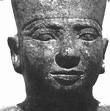
-2345 Teti (Othoes) (d. -2333) becomes king #1 of the Egyptian Sixth Dynasty (ends -2181); his mother Queen Sesheshet helps reconcile the two warring factions of the family and get him raised to the throne; in Nov. 2008 her pyramid is discovered in Saqqara (brand new sneakers and clothing, all dressed up for first grade?); in 2000 C.E. the mummy of a physician from the Egyptian Sixth Dynasty (24th cent. B.C.E.) is discovered in Saqqara (12 mi. S of Cairo); there are 82 types of specialists in Egypt, plus one who removes the evil eye; lion's fat is used as a remedy for baldness (and since it's so expensive, who can afford it?). About this time the Kingdom of Yam flourishes in Upper Nubia?
-2342 Lugal-Zage-Si (Lugalkisalsi) (Argandea) (d. -2316), king of Umma defeats Urukagina of neighboring Lagash, and becomes king of Uruk and #1 ruler in the Middle East, founding the Third Dynasty of Uruk; too bad, the Sumerian empire has exhausted itself with internecine strife, so it is ripe for outside conquest.
-2340 Puzur-Sin dies, and his son Ur-Zababa becomes king of Kish.
-2334 About this time the Akkadian Empire in S Iraq in the Tigris-Euphrates River region is founded by Sargon of Akkad via union of independent city-states, with capital in the city of Akkad, becoming the first empire in Mesopotamia, uniting Akkadian and Sumerian speakers under one rule, and exercizing influence across Mesopotamia, the Levant, and Anatolia, sending military expeditions as far S as Dilmun (modern-day Bahrain) and Magan (modern-day Oman) in the Arabian Peninsula.
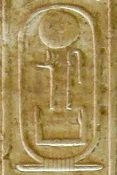
-2333 Teti is murdered by his usurper son Userkare (Woserkare) ("Powerful is the soul of Ra") (d. -2332) becomes king #2 of the Egyptian Sixth Dynasty, ruling only 1 (5?) year.
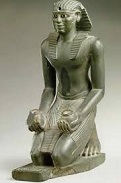
-2332 Userkare is killed by Teti's other son Pepi (Pepy) I (Meryre) ("Beloved of Ra") (Neferdjahor) (d. -2255), who becomes king #3 of the Egyptian Sixth Dynasty, going on to aggressively expand into Nubia and expand trade to Lebanon and the Somalian coast; his wives are sisters Ankhesenpepi (Ankhenesmeryre) I and II; too bad, the regional nobility begins to gain power, causing the Old Kingdom to decline.
-2311 Noah (b. -2948) is 637 years old; Judah's 3rd son Shelah is born (Gen. 38:2-14).
-2316 Sargon I of Akkad defeats and captures bad little nipper Lugal-Zage-Si of Uruk, parading him around "in a dog collar to the gate of Enlil" in Nippur, and dismantling the walls of Uruk; he then heads E to Lagash and Umma, conquering all the way to the Persian Gulf, symbolically washing his weapons in it to celebrate conquering all of Sumer; Sargon I dies, and his son Rimush (Rimus) (d. -2270) becomes king #2 of Sumer and Akkad, going on to suppress widespread revolts.

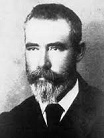
-2300 About this time the city of Babylon on the Euphrates River in Mesopotamia is founded, becoming a major city under Amorite king Hammurabi in the 18th cent. B.C.E., becoming the largest city on Earth from -1770 to -1670 and from -612 to -320, becoming the first city to reach 200K pop.; it is abandoned about 1000 C.E. About this time (-2800?) the Millennium Fever mother city of Jerusalem (Salem) ("peace") (Arabic "al-Quds" = the holy) (Yiddish "Yerushalayem" = teaching of peace) (modern-day pop. 883K/1.25M) 35 mi. from the E shore of the Mediterranean Sea is founded by the Canaanite (Hittite?) (Hurrian?) (Amorite?) Jebusites (Shem and Eber, ancestors of Abraham?) on the ridge of the Judean Mts. between the N edge of the Dead Sea and the Mediterranean Sea, on the hard limestone Ophel (Heb. "fortified hill") above the Gihon (Heb. "to gush forth") Spring, which emerges from the Kidron (Heb. "dark, mourn") Valley to the E; the city was originally surrounded by thick green forests of almond, olive, and pine trees. About this time there is a gen. Indo-European migration into Anatolia (Asia Minor), incl. the Hittite (Nesite)-speaking Hittites, who cross the Bosporus and settle on the Euphrates around the city of Kussar, worshiping the sky-storm god Teshub (Teshup) (Hadad), and the Luwians, who settle in S Anatolia E of the Halys River, worshiping the storm god Tarkhunt - everybody worships that god? About this time the Shiva Linga (phallic pillars) representing the Hindu deity Shiva in Shaivism are first created, often mounted inside a lipped disc-shaped platform called a yoni that symbolizes the goddess Shakti. The genes for lactose tolerance become widespread in Europe. The temple records of Lagash mention an Elamite raid on Sumer. About this time King Ur-Nanshe of Lagash mentions the kingdom of Dilmun, later mentioned in the Epic of Gilgamesh as an Eden-like island of everlasting life (Bahrain?), which leaves many burial mounds that survive to modern times; discovered by British archaeologist Thomas Geoffrey Bibby (1917-2001). Permanent farming villages are established in Mexico about this time. Woodhenge AKA the German Stonehenge is built of 1.2K locust tree logs near Pommelte on the Elbe River, becoming known for human sacrifice. The 5-ton bluestones at Stonehenge are moved and replaced by 25-to-45-ton Sarsen ("Saracen Stone") sandstones from the nearby (20 mi.) Marlborough Downs, then turned upright to become menhirs ("long stones") and trilithons (two vertical stones and a horizontal stone on top, forming the Greek letter pi); the pale green sandstone Altar Stone (discovered in 1620 C.E.) is erected; the total effort spend on Stonehenge amounts to 30M man-hours?; the Amesbury Archer, an archer from the Alps is buried in Amesbury near Stonehenge, becoming the oldest known burial site in England; discovered in May 2002.
-2297 The Chinese record the Yellow River flooding its banks.
-2296 The Chinese record a comet sighting.
-2283 Yao Di orders his officer Yu to combat a flood of the Yellow River.
-2281 Noah (b. -2948) is 667 years old; 30-y.-o. Shelah's son Eber (Heber) (d. -1839) (Heb. "opposite side", "passage") is born, refusing to help build the Tower of Babel, keeping his language from being confused, and retaining the pure lingua humana of Hebrew, named after him (Gen. 10:21, Luke 3:35).
-2270 Rimush is assassinated by a clay tablet to the head, and is succeeded by his brother Manishtushu (d. -2255) as king #3 of Sumer and Akkad.
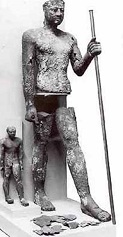


-2255 Pepi I dies; his pyramid mortuary complex Mennefer Pepy (Men-nefer) ("Enduring and beautiful") in Lower Egypt is so impressive it gives its name to the area, which the Greeks later call Memphis; he is succeeded by his eldest surviving son Merenre Nemtyemsaf I (d. -2246) as king #4 of the Egyptian Sixth Dynasty. Manishtushu dies, and his son Naram-Sin of Akkad (d. -2218) becomes king #4 of Sumer and Akkad, expanding to the Zagros Mts. and destroying the city of Ebla in NW Syria (later rebuilt); his soldiers first use the composite bow, which is able to penetrate leather armor and has 2x the range of simple bows is developed; he makes the first known treaty in history with the king of Elam, who becomes his vassal; an inscription mentions Aram (Damascus) as a place along the Upper Euphrates River. Yao Di dies, and Shun Di (Yu Shun) (d. -2205) becomes Wu Di king of China, making his capital at Qi.
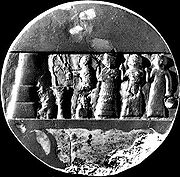

-2250 The earliest recorded solar eclipse (China). Ptolemy records the heliacal rising of Sirius (brightest star in the sky, 8.8 l.y. from Earth) on the 4th day after the summer solstice this year; the 2nd brightest star is Canopus in the S, which is only half a magnitude fainter, but is 300 l.y. from Earth and is invisible at latitudes N of Norfolk, Va. About this time Enheduanna (-2285 to -2250) ("lady ornament of heaven"), daughter of Sargon I (a feminist?) leaves some songs (hymns) in cuneiform to the Sumerian harvest goddess Inanna (Iananna), the Venus star. Portal tombs incl. the Kempe Stones in Newtownards are built in Ulster, Ireland.
-2247 Noah (b. -2948) is 701 years old; Shelah is 64 years old; 34-y.-o. Eber has son Peleg, during whose time "the Earth was divided" (Gen. 10:25).

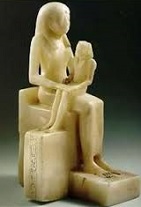
-2246 Merenre I dies, and his 4-y.-o. son (by Ankhesenpepi II) Pepi (Pepy) II (Neferkare) ("Beautiful is the Ka of Re") (d. -2184) becomes king #5 of the Egyptian Sixth Dynasty, ruling over a crumbling kingdom, and becoming known for being kind to dwarves; Merenre I is really his elder brother, and he rules 96 years?
-2240 Kutik-in-Shushinak (d. -2230) becomes the last king of the Second Dynasty of Awan, and throws off the yoke of Akkad, taking the title "King of the Four Quarters", then doing a lot of building in the sacred acropolis in Susa.
-2230 Kutik-in-Shushinak dies during an attack by the semi-barbaric Gutians (Guteans) (Guti) (Quti) from the Zagros Mts., ending the Second Dynasty of Awan (begun -2250). The Old Elamite Kingdom begins (ends -1400). The Simashki Dynasty in Elam N of Susa begins (ends -1925); royal succession is through the reverend mother (amma hashtuk), the king's sister-wife. The Elamite (SW) Persians adopt a cuneiform script; still undeciphered?

-2218 The Gutians sack and destroy Agade, and subjugate and waste the entire empire of Sumer; Naram-Sin dies, and his son Shar-Kali-Sharri (d. -2193) ("king of all kings) becomes king #5 of Sumer and Akkad.
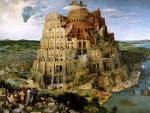

-2217 Noah (b. -2948) is 731 years old; Shelah is 94 years old; Eber is 64 years old; Peleg is 30 years old; Peleg's son Reu (Ragau) is born. Construction begins on the Tower of Babel (Gen. 11:4), an attempt to disobey Jehovah's order to populate the entire Earth and instead build New York, New York, it's my kind of town, which Big J foils by confounding the workers' languages, rewiring their language circuits so that what they have here is a failure to communicate, and they do a Cool Hand Luke and ditch their own U.N. Bldg. (no translators), and go their own ways, forever at war while spreading all over the Earth? Was Babylon the original source of magic, divination, and astrology, and was the Tower of Babel built on the Dark Isle (al-Djezair) between the Tigris and Euphrates, containing eight tiers in an attempt to attain to immortality, becoming the source of the Eightfold Path of Buddha, the figure-8 twined serpents on the Caduceus (Staff of Hermes, AKA Mercury, AKA Thoth, AKA Prince of Tricksters, Joker, Jester, Fool), the I-Ching, Tarot Cards, the Game of Kings (Chess) and the Knights' Tour, the marriage of the Red King and White Queen, the secret of the peacock's tail, the sideways-8 figure for infinity, and the alchemical quest for the Philosopher's Stone, a cake made from a reddish-black powder, which is mixed with Aqua Philosophia, "heavy water" gathered from dew when the Sun is between the Bull and the Ram (when the water falling from the Moon is heaviest), creating the Elixir of Life (al-Iksir), which gives immortality if made correctly, but death if made incorrectly?
-2185 Noah (b. -2948) is 763 years old: Shelah is 126 years old; Eber is 96 years old; Peleg is 62 years old: 32-y.-o. Reu's son Serug (great-grandfather of Abraham) is born.

-2205 Shun Di dies, and Xia Yu Di (Yu the Great) (d. -2197) founds the Xia (Hsia) Dynasty in China (ends -1783) (-2070 to -1600?) after he becomes a hero by controlling a catastrophic flooding of the Yellow River by dredging.
-2200 About this time shifts in ocean and atmospheric circulation cause the 4.2 Kiloyear Aridification Event to begin (ends -2100), causing the 200-year Meghalayan mega global drought that devastates civilizations from Egypt to China, causing the collapse of the Old Kingdom in Egypt, the Akkadian Empire in Mesopotamia, and the Liangzhu Culture in the Lower Yangtze River Basin, also probably causing the collapse of the Indus River Valley civilization, s purring migration of Indo-European speaking people into India, plus mass migrations from Egypt, Greece, Syria, Palestine, Mesopotamia, the Indus River Valley, and the Yangtze River Valley; a drought begins in the Akkadian Empire, causing migration away from urban centers followed by a collapse of the govt. known as the Third Millennium Mesopotamian Urban Crisis; the Meghalayan Age in modern-day Meghalaya, India begins. Queen Semiramis of Babylon builds a tunnel under a river. A rich man is buried near the modern-day village of Dabene, 75 mi. E of Sofia, Bulgaria along with 15K tiny gold rings of fine craftsmanship; discovered in 2004-2005 C.E. An inscription in the Dendera Temple Complex in Egypt 37 mi. N of Luxor reads: "The mouth of a perfectly contented man is filled with beer." Inventions: iron anchor chains on ships are first used by the Chinese under Emperor Yu, two fore and two aft.
-2197 Xia Yu Di dies, and his son Xia Qi (d. -2188) becomes Xia king #2 of China.
-2193 The city of Agade falls to Elam, the Akkadian empire under Shar-Kali-Sharri collapses, and the Gutian period of anarchy begins (ends -2123); Elulu (Elul-Dan) becomes king of the Akkadians; did an abrupt shift to drought in Mesopotamia about -2200 doom the Akkadian culture?
-2189 Dudu (d. -2168) becomes king of Akkad.
-2188 Xia Qi dies, and Xia Tai Kang (d. -2159) becomes Xia king #3 of China, ruling from Zhen Xun (Gong Xian, Henen); the throne becomes hereditary.

-2184 Pepi II dies an old man, and his old son Merenre Nemtyemsaf II becomes king #6 (last) of the Egyptian Sixth Dynasty, ruling 13 mo.; the Old Kingdom of Egypt (founded -2650) collapses, and an intermediate period begins.

-2183 The First Intermediate Period (Egyptian Dynasties 7-11) (ends -2050), a troubled time for Egypt begins, with scrambling for power and overlapping reigns of rival kings; Netjerkare (Netiqerty) Siptah (Nitocris) becomes king #1 of the combined Egyptian Seventh and Eighth Dynasties (ends -2160), in which 70+ fools-for-ya-baby claim the Egyptian throne - look at me, no hair, no eyelashes, no boobs?
-2168 Dudu dies, and Shudurul (Shu-turul) (d. -2154) becomes the last king of Akkad before it is conquered by Uruk.
-2160 Achthoes of Heracleopolis (Herakleopolis) seizes control of Middle Egypt; the Eighth Dynasty ends, and the Egyptian Ninth Dynasty begins (ends -2025), based in Herakleopolis Magna, with up to 18 kings; meanwhile about this year the Egyptian Tenth (10th) Dynasty begins, based in Herakleopolis (ends -2025), with several kings incl. Wahkare Khety and Merikare (Merykare) (Merykara).
-2159 Xia Tai Kang dies, and Xia Zhong Kang (d. -2146) becomes Xia king #4 of China.
-2155 Ur-Bau (Ur-Baba) (d. -2142) founds the pro-Gutian Dynasty in Lagash. Noah (b. -2948) is 793 years old; Shelah is 156 years old; Eber is 126 years old; Peleg is 92 years old; Reu is 62 years old: Serug is 30 years old; Serug's son Nahor (grandfather of Abraham) is born.
-2154 Agade (Akkad) is sacked and destroyed, allowing the Gutians (Guteans) (Guti) people of the Zagros Mts. in Iraq to overrun S Mesopotamia, ending the Akkadian Empire (founded -2334); its fall was caused by climate change?
-2153 Urnigin (Ur-Nigina) (d. -2147) becomes king of Uruk, founding the Fourth Dynasty - does ur-vigina smell like fish?
-2152 Death of Pepi II?



-2150 The Age of Taurus ends, and the Age of Aries begins (ends 1 C.E.). About this time the Ziggurat of Nana (Nanna) (Ur) is built near Nasiriya in Ur (modern-day Dhi Qar Province, Iraq), dedicated to the Sumerian Moon god Nana (Nanna) (Sin); discovered in 1850 by William Kennett Loftus; excavated by Sir Leonard Woolley in the 1920s.
-2147 40-y.-o. Virgin, er, Urnigin dies, and Urgigir (Ur-Gigira) (d. -2141) becomes king of Uruk.
-2146 Xia Zhong Kang dies, and Xia Xiang (d. -2079) becomes Xia king #5 of China, moving his kingdom to Shang.

-2142 Ur-Bau dies, and his son-in-law (by Ninalla) Gudea (d. -2122) becomes king of Lagash, making the city-state #1 in Sumeria, and becoming known for his piousness and ability, getting numerous statues of him erected, many of which survive to modern times, making him the best known Sumerian king - gud idea?
-2141 Urgigir dies, and Kudda (Kuda) becomes king of Uruk.
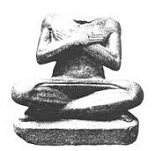
-2140 About this time Intef the Elder (the Great), son of Iku becomes king #1 of the Egyptian Eleventh (11th) Dynasty (ends -1991), which eventually refunifies Egypt; its capital is in the city of Thebes on the bend of the Nile in Upper Egypt; it consists of the cities of Karnak in the N half (right or E bank), and Luxor in the S half (right or E bank); the last pyramid tombs are built in this period; the Valley of the Kings is later situated on the left or W bank.
-2134 Mentuhotep (Tepyaa) I (the Great) (d. -2120) becomes king #2 of the Egyptian 11th Dynasty in Thebes.
-2126 Noah (b. -2948) is 822 years old; Shelah is 185 years old; Eber is 155 years old; Peleg is 121 years old; Reu is 91 years old: Serug is 59 years old; Nahor is 29 years old; Nahor's son Terah (Terach) (father of Abraham) is born (Gen. ch. 11); his daughter (Abraham's half-sister) is Sarah; other sons incl. Haran and Nahor.
-2123 Utuhegal (Utuhengal) (d. -2113) rebels and defeats the Gutians and kicks their butts out of Sumeria after putting his foot on the neck of defeated Gutian king Tiragan, then becomes king of Uruk and founder of the Fifth (5th) Uruk Dynasty.

-2122 Gudea dies, and his son Ur-Ningirsu (d. -2118) becomes king of Lagash and the last vassal of the Gutians.
-2120 Mentuhotep I dies, and his son (by Neferu I) Sehertawy ("Pacifier of the two lands") Intef I (d. -2118) becomes king #3 of the Egyptian 11th Dynasty, becoming the first member of the dynasty to claim a Horus name, going go war with Coptite nomarch Tjauti and expanding the kingdom's border 150 mi. northward to Abydos.
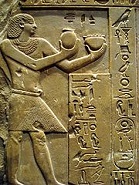
-2118 Intef I dies, and his brother Wahankh Intef (Inyotef) (Antef) II (d. -2069) becomes king #4 of the Egyptian 11th Dynasty, reigning for almost 50 years. Ur-Ningirsu dies, and his brother Ugme (Pirig-Me) (d. -2115) becomes king of Lagash.
-2114 Ugme dies, and Ur-Bau's son-in-law Namhani (d. -2111) becomes king of Lagash and Umma.

-2113 The Neo-Sumerian Empire (Third Dynasty of Ur) in Sumeria is founded by Utuhegal's gen. Ur-Nammu (d. -2095), who unites Sumer and Akkad (ends -2004), and creates the Law Code of Ur-Nammu, the oldest known human law code, which precedes Hammurabi's Code by three cents.

-2100 The Early Bronze Period ends, and the Middle Bronze Period begins (ends -1500). About this time the Kingdom of Kush of dark-skinned negroids is established in S Egypt, centered around Kerma above the Third Cataract (of seven) on the Nile, flourishing during Egypt's Second Intermediate Period (-1750 to -1570), giving the Egyptians up north somebody to invade and kick around? (ends -1524); a brick palace and large burial mounds (tumuli) are constructed in Kerma. Alleged date of the birth of Abraham (Abram) in Ur of the Chaldees(modern-day Tell el-Muqayyar near Nasiriyah) in S Iraq, or Sanliurfa (Urfa) (Edessa) in SE Turkey to Terah (Heb. "wild goat"); the age of the Biblical Patriarchs begins (ends -1400). About this time Sumerian cylinder seals begin to focus on the presentation scene, where a worshiper is presented to a god by his good angel. The Hymn to the Nile is composed.

-2095 Ur-Nammur dies, and his son Shulgi (d. -2047) becomes king #2 of the Third Dynasty of Ur, conquering Susa and doing considerable building, incl. the the Temple of Inshushinak, going on to become a patron of lit. and found schools and academies.
-2090 Ur-Ninsuna (d. -2080) becomes king of Lagash and vassal of BMOC Ur.
-2080 Ur-Ninsuna dies, and Ur-Nikimara (d. -2070) becomes king of Lagash and vassal of Ur.
-2079 Xiao Xiang is assassinated by Han Zu, who is executed by Xia Shao Kang (d. -2057), who becomes Xia king #6 of China, awarding the Kingdom of Zeng to his youngest son Qu Lia.
-2070 Ur-Nikimara dies, and Lu-Kirilaza (d. -2050) becomes king of Lagash and vassal of Ur.
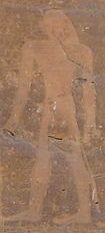
-2069 Intef II dies, and his son Intef (Inyotef) III (d. -2061) becomes king #5 of the Egyptian 11th Dynasty, extending his kingdom's border N against the Egyptian 10th Dynasty, and doing some building in Elephantine; his wife is Iah (Yah) (Jah) (Aah) ("Moon"), who becomes the mother of Mentuhotep II and Queen Neferu.
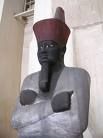
-2061 Intef III dies, and his son (by Iah) Mentuhotep (Mentuhope) II (Nebheptre) (d. -2010) becomes king #6 of the 11th Egyptian Dynasty, becoming the first to build his tomb in Deir al-Bahri (al-Bahari) ("the Northern Monastery") in the Theban necropolis on the W bank of the Nile River opposite Luxor.
-2057 Xia Shao Kang dies, and Xia Zhu (d. -2040) becomes Xia king #7 of China.
-2050 Lu-Kirilaza dies, and Ir-Nanna becomes king of Lagash and vassal of Ur. The Alulu Beer Receipt from Ur acknowledges the receipt of 5 Silas (4.5 l) of the best beer from brewer Alulu.
-2047 Shulgi dies, and Amar-Sin (d. -2038) becomes king of Ur.
-2040 Xia Zhu dies, and Xia Huai (d. -2014) becomes Xia king #8 of China.
-2038 Amar-Sin dies, and his brother Shu-Sin (d. -2029) becomes king of Ur.
-2029 Shu-Sin dies, and his son Ibbi-Sin (d. -2004) becomes the last king of Ur, who has the problem of the pesky Amorites to the W, who begin invading and rocking the boat.
-2028 Eshhunna breaks away from Ur.
-2027 Elam begins breaking away from Ur.
-2023 Lashan declares independence from Ur.
-2021 Enpi-luhhan, 5th king of Simashki attacks Elam and takes Susa, then Ibbi-Sin of Ur counterattacks and captures him.
-2017 Ibbi-Sun of Ur invades Susa, but is unable to maintain control of Elam. Ishbi-Erra (d. -1985) becomes king of Simashki.
-2014 Xia Huai dies, and Xia Man (d. -1996) becomes Xia king #9 of China.

-2010 Mentuhotep II dies after reigning 51 years and reuiniting Egypt in his 39th year on the throne, founding the Middle (Reunified) Kingdom of Egypt (ends -1650), known for boasting about campaigning against the Nubian region of Kush, becoming the earliest Egyptian reference to them; his son Nebhepetre Mentuhotep III (d. -1998) becomes king #7 of the Egyptian 11th Dynasty.
-2007 Taking advantage of the confusion caused by the on-the-make Amorites, the Elamites under Hutran-tempti, allied with tribes from the Zagros Mts. capture and sack Ur, and capture Ibbi-Sin.
-2004 Ibbi-Sin dies in captivity in Elam.
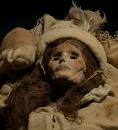



-2000 World pop.: 27M; Sudan region: 500K (1M by -1500). Super-freak? About this time the long-headed (dolichocephalic) super-tall fair-skinned blonde-blue Amorites (from Europe or possibly the Arabian Peninsula, having a unique agglutinative language) migrate to S Mesopotamia and intermarry with the pop. of the old city-states there, founding the Uruk Culture in Sumer (pop. 300K-500K), containing Semitic elements from Akkad N of Sumer on the W bank of the Euphrates in modern-day Iraq (which derives its name from Uruk) about 30 mi. SW of Baghdad, taking over the cities of Isin and Larsa and beginning the Semitic-dominated Isin/Larsa Period in Sumeria and Akkad (ends -1763), with Isin and Larsa fighting for control; the Amorites also invade Phoenicia, whose port city of Ptolemais (Acre) (Acco) commands the only natural harbor on the Mediterranean coast; some end up in Canaan in the time of Israelite Gen. Joshua, according to the Bible; the Lament of Ur mentions an "evil wind" which destroys Ur about this time - Semite becomes right? Shut up old ladies, I'm coming for you at 3 o'clock? About this time the Hittites are pushed (hurried by the Hurrians?) W through Cappadocia ("beautiful horses") in the Anti-Taurus Mts. in SE Anatolia (Asia Minor), where they build underground cities (later enlarged by Christians), becoming integrated into the Land of Hatti and absorbing the Hattians into their kingdom, based in Hattusa(s) (Pteria?) near modern-day Boghazkoy (Boghaz Keui) 200 km. W of Ankara, and worshiping the Sun goddess Arinna along with every other god they can get their hands on?; ethnicity doesn't matter as long as you learn to speak Hittite and dump the berries in?; women warriors are welcome; they join the new Old Assyrian Trade Network (ends -1750); the Bible mentions the Hittim, descended from Canaan's son Heth (Gen. 10:15), which are really the Khatti in Syria, kin to the Phoenicians and Amorites? About this time the Early Helladic Period of Greece ends, and the Middle Helladic Period of Greece begins (ends -1650), characterized by a slower pace of development along with the evolution of megaron-type cist graves. About this time the city of Hazor (Hatzor) (Asour) in the Upper Galilee on the trade route between Egypt and Babylon has a pop. of 20K, making it the largest city in the region and head of the Canaanite settlements (Joshua 11:10); it is ruled by Egypt as the holy city for Hathor until Joshua destroys it ca. 1200 B.C.E. (Joshua 11:13, 21); in 2019 seven large basalt staircases are excavated at Tel Hazor. About this time Bantu farms spread throughout Africa, causing the Khoisan and other groups to go into a pop. decline. About this time settlers from New Guinea settle in Polynesia. About this time the Chaluka Site in the Aleutian Islands is inhabited, lasting 3.5K years before being abandoned, and leaving a large midden that is excavated in 1909, 1938, and 1962. About this time there is human gene flow from India to Australia. A relict pop. of Woolly mammoths on Wrangel Island off the coast of Siberia goes extinct, becoming the last pop. to go extinct. About this time the earliest known mention of Jerusalem in written records is by the Egyptians in the Egyptian Execration Texts (Proscription Lists), where it is called Urusalimum or Rusalimum, referring to the Canaanite god of dusk Shalim (Shalem) (Salim) (Salem) (Salam), the root of the Semitic word Shalom or Salam, with is identified with Venus AKA the Evening Star, which constrasts with his brother deity Shahar AKA the Morning Star, both offspring of El; around 1700 B.C.E. the Jebusites fortify it. About this time the first Palace of Knossos (Cnossus) is built by the Minoans in Knossos, Crete, becoming the oldest city in Europe, beginning the First Palace Period (ends -1700), which also produces the palaces of Malia (on the N coast) and Phaistos (Phaestus) in SC Crete; the Labyrinth of Knossos is allegedly built by Daedalus for King Minos of Crete; discovered in 1878 by Minos Kalokairinos, and excavated in 1900-35 by Sir Arthur John Evans (1851-1941). About this time the city of Troy in Asia Minor where the Aegean Sea meets the Hellespont is founded by Greeks, who go on to create nine levels of habitation (Early Bronze Age to Roman times) for later archeologists to dig through; excavated in 1871-2 by German archeologist Heinrich Schliemann (1822-90). About this time the city of Sodom in S Jordan comes to an abrupt end? About this time the Fremont People settle on the Colorado Plateau in North Am. (130 mi. SE of modern-day Salt Lake City) (until 1000 C.E.). In this cent. the first Italic Tribes settle in Italy (Vitalia) ("calf") young cow, not part of the leg, even though Italy is shaped like a boot?), which is washed by five seas, the Adriatic, Ionian, Ligurian, Tyrrhenian, and Mediterranean; the earliest known olive oil is found in Castelluccio. In this cent. the fierce warlike nomadic pastoral Kurganes (Kurgan) Culture from the Black Sea area spreads to C Europe, the Balkans, Carpathians, and Danube, leaving elaborate burial mounds. About this time Genoa ("knee") on the Ligurian Sea is founded by Sea People from Tyre, settling with the Celtic Ambrones and becoming pirates, which the Greeks call Tyrrenoi. About this time mysterious Stonhenge-like earthworks ae built in the Amazonian rainforest of modern-day Acre, Brazil. About this time rock art paintings in the Limari Valley in Chile in the Coquimbo Region S of the Atacama Desert begin to be made to mark territory (until 500 C.E.). About this time Dingos arrive in N Australia; the earliest known dingo fossil dates to -1,450 - and start eating buy-bees? About this time the last woolly mammoths die on Wrangel Island in the Arctic Ocean. About this time the well-watered highlands of S Arabia (Yemen), AKA Arabia Felix ("Happy Arabia") between the Red Sea and the Rub'al Khali Desert make use of terraced agriculture to support permanent settlement. People in the Andean coast of Peru and Chile begin growing maize and cotton, making pottery, and working metal. Date of Phoenician prince Cadmus (Kadmos) (Gr. "from the east"), son of King Agenor of Tyre, brother of Europa, Phoenix, and Cilix, founder of the Greek city of Thebes and inventor of the Phoenician alphabet - according to Herodotus. About this time Leprosy first arises in India. By this time Play is already an important part of people's lives in Pakistan. Cuneiform texts from Drehem in S Mesopotamia name Aram as a city in the upper Euphrates River region. The Unetice (Aunjetitz) Culture of bronzemakers spreads from Bohemia to Hungary and the Rhine, then as far as Britain and Scandinavia. The first people settle in the Arctic. Horses and wheeled vehicles are in use in E Europe. About this time the dry climate of the North Am. Southwest is formed; Bristlecone pines (the world's oldest trees, which can live 4K years) date to this era; the Giant Bald Cypress of Mexico dates to this era. About this time the Egyptians domesticate the rat-eating cat, eventually deifying it. About this time a sacred burial ground is built in Shrewsbury, England, becoming the oldest known continuously used sacred ground in the British Isles. About this time Egyptian astronomers can predict the annual flooding of the Nile - astronomer = moon starer? About this time horses arrive in N Africa from the Iberian Peninsula. Greenland Saqqaq male Inuk has brown eyes and thick dark receding hair, and his ancestors migrated from Siberia, as proved by his genome by Eske Willerslev et al. of the U. of Copenhagen in 2010. The Beauty of Xiaohe, a mummy with Caucasian features lives in Tarim Basin in Xinjiang, W China. Inventions: About this time the Chinese begin cultivating the apricot, which is native to NE China, although later it is given the scientific name Prunus Armeniaca. Nonfiction: About this time the Epic of Gilgamesh, the earliest known work of fiction is written on 12 clay tablets, and deposited in the royal library of Assyria in Nineveh; the Babylonian (Gilgamesh) Story of the Deluge is in tablet #11. About this time citrus fruits begin to be cultivated.

-1998 Mentuhotep III dies, and Queen Imi's son Nebatwyre Mentuhotep IV becomes king #8 (last) of the Egyptian 11th Dynasty. Death of Noah (b. -2948) at age 950 (Gen. 9:28-29).
-1996 Xia Man dies, and Xia Xie (d. -1980) becomes Xia king #10 of China. Birth of Abraham (Abram) (d. -1822) (Heb. "Father of a Multitude") (Gen. 11:26) in the Moon god Sin-worshiping Chaldean city of Ur in the land of Shinar in N Mesopotamia near the modern-day junction of the Tigris and Euphrates Rivers, 150 mi. SE of Babel (Babylon); the son (not the firstborn) of 130-y.-o. Terah (b. -2126), who is also the father of his wife Sarah (Sarai) by a 2nd wife; born 952 years after Noah in the 10th generation through Shem (352 years after the Flood); son (not the firstborn) of 130-y.-o. Terah (b. -2126); "The father of all those having faith while in uncircumcision" (Romans 4:11); may have learned about Jehovah from Shem; David is 14 generations ahead (-1085), and the Babylonian Captivity (-587/-585) is 28 generations ahead.
-1993 Ishbi-Erra of Simashki drives the Elamites from Ur, ruling it and Elam.

-1991 Mentuhope IV dies, and Amenemhet (Amenemhat) (Ammenemes) I (Sehetepibre) (d. -1962) becomes king #1 of the Egyptian Twelfth (12th) Dynasty (ends -1802), moving the capital from Thebes to Ijtawy in the Faiyum region; a golden age begins, producing the Ipuwer Papyrus, becoming the oldest known treatise on political ethics, claiming that a good king controls unjust officials, claimed by some to bolster the Biblical story of Exodus; Amenemhet I is of Nubian origin, from the Aswan region.
-1986 Sarah (Heb. "princess") (Sarai) is born to Terah, father of Abraham (Abram), becoming his half-sister, wife, and mother of Isaac.
-1985 Kikkia dies, and Akkia (d. -1970) becomes king of Ashur. Ishbi-Erra of Simashki dies.
-1980 Xia Xie dies, and Xia Bu Jiang (d. -1921) becomes Xia king #11 of China.
-1971 Senusret I becomes co-pharaoh with his father Amenemhat I (until -1962).
-1970 Akkia dies, and Puzur-Ashur I (d. -1960) becomes king of Ashur.
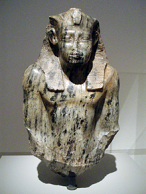
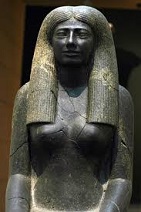
-1962 Amenemhat I is assassinated, and his son (by Nefertitanen) Senusret (Seostris) (Senwosret) I Kheperkare ("the Ka of Ra is created") (d. -1926) becomes king #4 of the Egyptian 12th Dynasty after rushing back from a military campaign in Libya, later sending two expeditions into Nubia in -1953 and -1943 which fix Egypt's S border at the 2nd Cataract, where he stations a garrison and erects a victory stele; high priest Djefaihapi (Djefaihap) (Hapdjefai) (Hapidjefa) (Hepzef) of Asyut (Lycopolis) in Upper Egypt leaves a statue of his wife Lady Sennuwy, which is discovered in 1912 C.E. by a Museum of Fine Arts-Harvard U.-sponsored expedition.
-1960 Puzur-Ashur I dies, and Shallum-Ahhe (d. -1945) becomes king of Ashur.
-1956 About this time Abraham moves from Ur of the Chaldees 600 mi. NW to the city of Harran in Paddan Aram in Upper Mesopotamia because Jehovah promises to make him a great nation (Gen. 15:7), and he travels with his half sister-wife Sarah (b. -1986) and his dad Terah (b. -2126) (Gen. 11:31), along with his childless adopted nephew Lot and his wife Pilah of Salt.
-1950 The Akhmim Tablets are inscribed with a list of servants' names and a series of grain computations.
-1945 Shallum-Ahhe dies, and Ilushuma (Ilu-shuma) (d. -1906) becomes king of Ashur, going on to free the "Akkadians and their children" of taxes.
-1934 According to legend, the Fir Bolg (Gael. "men of bags") (Belgae of N Gaul?) invade Ireland with 5K men at Wexford Harbor at the mouth of the Slaney River, with the (legendary) five sons of Dela dividing Ireland, Slaine (Sláine) (Sláinge) (Slánga) mac Dela becoming the first High King of Ireland, taking Leinster, and his older brothers Rudraige (Ruadhraighe) mac Dela taking Ulster, Gann mac Dela taking N Munster, Genann (Geanann) mac Dala taking Connacht, and Sengann (Seangann) mac Dela taking S Munster; Slaine only rules one year before dying at Dind Rig in County Carlow and being buried in Slane, County Meath, and is succeeded as high king by Rudraige (-1933 to -1931), Gann and Genann (-1931 to -1927), and Sengann (-1927 to -1921); Irish high kings are crowned on the sacred Hill of Tara (Teamhair) near the Boyne River, just S of where the Five Ancient Slighe (Roads) from the four provinces of Ireland meet at Lismullen.

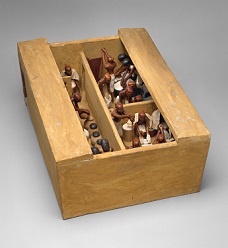

-1926 Senusret I dies, and his son co-pharaoh (since -1929) Amenemhet II (d. -1895) becomes king #3 of the Egyptian 12th Dynasty; during his reign the tomb of his PM Meketre contains a model bakery-brewery discovered on Mar. 17, 1920 by Am. Egyptologist Herbert Eustis Winlock (1884-1950).
-1925 Indattu II dies, and the Dynasty of Simashki in Elam (begun -2230) ends; the Dynasty of Eparti begins (ends -1400), with kings calling themselves "Great REgent" and "King of Anshan and Susa".
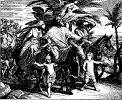
-1921 Xia Bu Jiang dies, and Xia Pian (d. -1900) becomes Xia king #12 of China. 205-y.-o. Terah (b. -2126), father of 75-y.-o. Abraham (b. -1996) dies, and Jehovah issues the epic Call of Abraham (who is still called Abram) (Gen. 12:1-3), so he moves his household to Canaan, crossing the Euphrates River on the 14th of Nisan (Gen. 11:32) near Carchemish, arriving in Shechem in the valley between Mount Gerizim and Mount Ebal (between Bethel and Dan W of the Jordan River near the Salt or Dead Sea), and makes a covenant with Jehovah concerning his seed (Gen. ch. 12), "To your seed I am going to give this land" (Gen. 12:6-7), and "All the families of the ground will certainly bless themselves by means of you", beginning the 430-year period of temporary residence until the making of the law covenant with Israel (Ex. 12:40-42, Gal. 3:17).
-1911 Lot is rescued; Abraham visits the mysterious priest-king Melchizedek (Heb. "king of righteousness"), king of Salem (Gen. 14:18-20, Psalms 110:4); first known priest of Jehovah (Yahweh) the Most High (El Elyon), one of the Seven Names of the Jewish God.
-1910 Birth of Ishmael (d. -1774) (Heb. "God hears") to 86-y.-o. Abraham (b. -1996) and his Egyptian maidservant-concubine Hagar (Gen. 16:3-16); father of the Ishmaelites (Arabs); "He will be a wild ass of a man, his hand against every man and every man's hand against him; and he shall dwell over against all his kinsmen" (Gen. 16:12); Ishmael's son Kedar (Gen. 25:13) is the ancestor of the Bedouins, known for their black tents ("I am black but comely... as the tents of Kedar" - Song of Solomon 1:5); Hagar is the first woman to be circumcised by Sarah to make her less sexually attractive.
-1909 Death of Arpachshad (b. -2346).
-1906 Ilushuma dies, and his son Erishum I (d. -1867) becomes king of Ashur, going on to establish a 900-mi. trade route for Assyrian cloth and tin from across the Tigris River to Kanish in Anatolia in exchange for bronze.

-1900 After the seasonal monsoons migrate E, the Sarasvati River dries up, and the center of civilization relocates from Harappa in Punjab to the 1,560-mi. Ganges River; violence and disease also play a role - die in it and get a free ride to paradise? The Kassites settle in modern-day W Iran in the region of Hamdan-Kermanshah. In this cent. the second wave of Achaeans invade Greece; the Thracians later claim their original home in thickly-forested Pieria near Mt. Olympus, home of the cult of the Muses, which spreads S to Mt. Helicon in Boeotia, where they grow from three to nine in number, and are considered daughters of Zeus and Mnemosyne, goddess of memory. The wild blonde dangly Greeks set up shop in the Me-Scene? About this time the city of Mycenae on the plain of Argolis in Greece (in NE Peloponnesus S of the Isthmus of Corinth, 55 mi. SW of Athens) is founded, going on to develop the Mycenaean Civlization (ends -1125), which strongly borrows from the Minoan civilization of nearby Crete by -1600, and by -1400 becomes supreme in the Aegean area, incl. the cities of Tiryns near Mycenae, Orchomenos, and Thebes in Boeotia (birthplace of Hercules), Athens in Attica (modern-day pop. 660K/3M), home of the Acropolis (Gr. "top of the city"), and Pylos in Messenia in SW Greece; the king is called the wanax, and the army cmdr. is called the lawagetas; the basileus and a priest class bring up the rear; Mycenaean supremacy continues until the fall of Troy (-1200), after which the Dorians (Gr. "conquerors") from the N destroy it and the survivors flee; the Gla Fortress protects the region; the architecture is based on huge rough-hewn "Cyclopean" stones, thought to be made by the Cyclops; the strongly-fortified palaces contain megara (large rectangular halls), and the warlike Mycenaeans are the first to use the safety pin; Homer later preserves the age in his "Iliad" and "Odyssey", and claims that Mycenae is the home of King Agamemnon; Heinrich Schliemann (1822-90) excavates Mycenae in 1868 C.E. Xia Pian dies, and Xia Li (d. -1879) becomes Xia king #13 of China. Migrants from India settle in Australia. In this cent. civilization begins in the Andes, centered around El Paraiso (Paraíso) ("Paradise") in the Chillon River Vally 1 mi. from the Pacific Ocean, a U-shaped complex of square bldgs. surrounded by tiers of platforms, with religious beliefs that use smoke and water to communicate with the spiritual world. Semitic Ge'ez speakers migrate from Yemen to Africa across the Bab-el-Mandeb (Arab. "Gateway of Tears"). In this cent. the earliest writings in Asia Minor are written, records of the Assyrian merchant colony in Kanesh in Cappadocia in SE Anatolia. Inventions: About this time the first known use of cryptography is in Menet Khufu in Egypt. About this time the first known drinking of chocolate (Nahuatl "xocolatl" = bitter water) beverages is by the Mokaya ("corn people") people in Mexico and Guatemala. Science: The Venus Tablets of Ammizaduga are among the earliest known astronomical records.
-1897 Jehovah makes his circumcision covenant with 99-y.-o. Abram (1996 to -1822), thanking him for the offering of tasty foreskins as a substitute for sacrificing the entire boy, and changing his name to Abraham (Heb. "Father is Exalted") (Gen. ch. 17), making him the major promise that "a father of a crowd of nations I will make you" (Gen. 17:5-27, Rom. 4:11). After some kind of sexual hanky panky goes down that pisses-off Jehovah (homosexuality?), Sodom and Gomorrah (part of the five cities of the plain incl. Admah, Zeboiim, and Zoar) are destroyed, and Abraham's nephew Lot and his two daughters barely escape, losing Lot's wife to pillarosis voyeurosa - Gen. Ch. 19. A famine causes Abraham and Sarah to go to the Philistine city of Gerar, only to have the king take 89-y.-o. Sarah (b. -1986) into his harem, but Jehovah gets her sprung (Gen. 18:16-21:7).
-1896 Birth of Isaac (d. -1717) (Heb. "laughter") to 100-y.-o. Abraham (b. -1996) and his 90-y.-o. wife Sarah (b. -1986) (Gen. 21); the first infant Jew to be circumcised - I'm not crying I'm laughing?
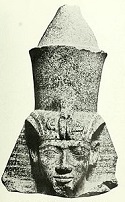
-1895 Amenemhet II dies, and his co-regent (since -1897) son Senusret (Seostris) II (d. -1878) becomes king #4 of the Egyptian 12th Dynasty, going on to build an extensive irrigation system in the Faiyum region from Bahr Yussef to Lake Moeris, with a dike at El-Lahun, to which he moves the royal necropolis from Dahshur, making it his capital; the first known Egyptian workers quarters is built in the nearby town of Senusrethotep (Kahun).
-1894 Amorite sheikh Sumu-Abum (d. -1881) conquers Babylon, declares its independence and becomes its king, founding the Old Babylonian Empire (ends -1595).
-1891 5-y.-o. Isaac (b. -1896) is weaned, and 19-y.-o. Ishmael (b. -1910) is sent away with his mother Hagar after he pokes fun at the little weenie, beginning 400 years of affliction upon Abraham's offspring (Gen. 21:8-21, 15:13, ch. 25; Gal. 4:29); they flee S and settle in the wilderness, where Ishmael marries an Egyptian woman, fathering 12 desert nomad tribes, the Ishmaelites, who occupy C and N Arabia; whether the Bible is true or a fairy tale, by the 6th cent. C.E. the Muslims, who regard themselves as descendents of Ishmael, start the Ishmael Conspiracy, reversing the Hebrew Bible and claiming that Hagar was Abraham's #1 wife, not Sarah, and that Ishmael was his favorite son, not Isaac, and that Abraham chose Ishmael, not Isaac to be sacrified, and not on Mt. Moriah in Palestine, but on Mt. Ararat near Mecca; others, such as Hal Lindsey (1929-) claim that Jacob's twin brother Esau mixed with the Ishmaelites to create the Arabs, and that Armageddon will be caused by what amounts to a family dispute - what about the restraining order?
-1881 Sumu-Abum dies, and Amorite Sumu-El (d. -1845) becomes king of Babylon.
-1879 Xia Li dies, and Xia Kung Jia (d. -1848) becomes Xia king #14 of China.
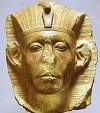
-1878 Senusret II dies, and his son (by Khenemetneferhedjet I) Senusret (Sesostris) III (d. -1839) becomes king #5 of the Egyptian 12th Dynasty, going on to reduce the power of regional rulers, and pacify the S frontier with Nubia, building massive 2nd Cataract forts at Buhen, Semna, and Uronarti, creating an era of peace and prosperity, with a revival in trade, urban development, and crafts, becoming one of the few pharaohs deified and honored with a cult during his lifetime; he digs an E-W canal through the Wadi Tumilat to join the First Cataract of the Nile River with the Red Sea, which reaches N to the Bitter Lakes at this time, allowing direct naval trade with Punt; although of Nubian origin, he bans Nubians from crossing the S end of the 2nd Nile Cataract into Egypt; Egypt goes on to dominate Nubia to about -1000, building Egyptian-style temples and making the aristocracy adopt Egyptian religions and hieroglyphics while taking gold, ebony, and ivory; meanwhile Nubians intermarry with Egyptians, so within a millennium they are almost indistinguishable. Abraham's 40-y.-o. son Isaac marries Abrahm's grandniece Rebekah (Rebecca) (Heb. "connection", "snare") from Mesopotamia (Gen. 24:1-67, 25:20); Abraham marries Keturah, and in the next 35 years fathers six more sons, adding the Midianites, Medianites (Heb. "strife") (Arab. "perserverance"), and other tribes to the Israelites, Ishmaelites, and Edomites (Gen. 25:1-2, 1 Chron. 1:28, 32-34).
-1871 Abraham takes his 25-y.-o. son Isaac (b. -1896) from Beer-sheba N to Mount Moriah (N of Salem) and offers him as a burnt sacrifice to Jehovah, believing that "God was able to raise him up even from the dead", but luckily Big J lets him substitute a ram at the last minute, and Big J is so pleased with the total package that he reinforces his covenant with a sworn oath (Gen. 22:1-18, Heb. 6:13-18; 11:17-19).
-1867 Erishum I dies, and his son Ikunum (d. -1860) becomes king of Ashur.
-1860 Ikunum dies, and his son Sargon ("the king is legitimate") I (Sharru-Kin) (Sharru-Ken) (d. -1850) becomes king of Ashur, refortifying Assur.
-1859 Death of Abraham's wife Sarah (b. -1986) at age 127 (Gen. 17:17, 23:1).
-1850 Sargon I dies, and his son Puzur-Ashur II (d. -1830) becomes king of Ashur. Science: The Egyptian 12th Dynasty Moscow (Golenishchev) Mathematical Papyrus contains 25 math problems.
-1849 Beginning of the reign of Sin-Iddinam (d. -1843), king of Larsa, Sumer, and Akkad, who leaves some nice terracotta cuneiform barrel cylinders to blow his horn.
-1848 Xia Kung Jia dies, and Xia Bo (d. -1837) becomes Xia king #15 of China.
-1847 Death of Noah's son Shem (b. -2446) in his 600th year (age 599).
-1845 Sumu-La-El dies, and Sabium (d. -1831) becomes king of Babylon.
-1843 Death of Sin-Iddinam.
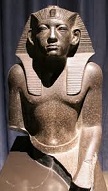
-1839 Senusret III dies, and his co-regent (since -1860) son Amenemhet (Amenemhat) III Nimaatre ("Belonging to the justice of Ra") (d. -1814) becomes king #6 of the Egyptian 12th Dynasty.
-1837 Xia Bo dies, and Xia Fa (d. -1818) becomes Xia king #16 of China.
-1836 Abraham (b. -1996) is 160 years old; birth of 60-y.-o. Isaac's (b. -1896) twin sons "wild man" Esau and "blameless" Jacob (Israel) (d. -1690) after struggling in their mother Rebekah's womb, causing Jehovah to tell her that two nat. groups would be separated from her inward parts and that the older will serve the younger (Gen. 25:22-26).
-1833 A solar eclipse is recorded in the limmu of Puzur-Ishtar.
-1831 Sabium dies, and Apil-Sin (d. -1813) becomes king of Babylon.
-1830 Naram-Sin (d. -1815), king of Eshunna conquers Assyria and becomes king of Ashur.
-1822 About this time the Babylonian clay tblet Plimpton 322 Table (-1762?) in Larsa, Iraq (modern-day Tell as-senkereh) shows an advanced knowledge of trigonometry incl. Pythagorean triples; they don't base their math on angles but on sexagesimal arithmetic, giving exact results.
-1821 Abraham (b. -1996) dies at age 175 (Gen. 25:7) after making his son Isaac his sole heir (Gen. 25:5-6); he is buried by his sons Isaac and Ishmael in the cave of Machpelah in Hebron where he had earlier buried his wife Sarah (Gen. 23:1-20, 25:7-10); his grandson (son of Isaac) Jacob is 15 years old, and somewhen from now he gets his hairy brother Esau to sell him his birthright as firstborn for a "swallow of the red" (lentil stew), because "Esau despised his birthright" (Gen. 25:29-34); Esau later gets the nickname Edom (Red) (Gen. 25:25-30); the Cave of the Patriarchs in Hebron, where Abraham and Sara are buried becomes a holy site for Jews and Muslims.
-1818 Xia Fa dies, and Xia Jie (Hsia Chieh) (the Tyrant) becomes Xia king #17 of China; the first cruel Chinese king, he amuses himself by having 3K people drowned in a lake of wine - cruel, or euthanasia?
-1815 Naram-Sin dies, and Erishum II (d. -1809) becomes king of Ashur.
-1814 Amenemhet III dies, and his co-regent (since -1815) son Amenemhet (Amenemhat) (Ammenemes) IV (d. -1806) becomes king #7 of the Egyptian 12th Dynasty, going on to send expeditions to Sinai for turquoise and Upper Egypt for amethyst, building the Temple of Renenutet in Medinet Madi, and a great labyrinth "near the place called the City of Crocodiles" near Lake Moeris, described by Herodotus as surpassing the pyramids; too bad, it is lost (until ?).
-1813 Apil-Sin dies, and Sin-Muballit (d. -1793) becomes king #5 of Babylon.
-1809 Shamshi-Adad I (d. -1781), king of Ekallatum conquers Ashur and becomes king of the first Assyrian Empire.
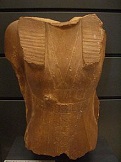
-1806 Amenemhet IV dies, and his sister Sobeknefru (Neferusobek) (Sobekkare) ("The beauty of Sobek") (Skemiophris) (d. -1802) becomes king #8 (last) of the Egyptian 12th Dynasty.
-1805 The Egyptian Fourteenth (14th) Dynasty (ends -1650) is founded, with capital in Avaris in the NE Nile Delta; the 30+ pharaohs are of Canaanite or W Semitic descent; famine, which began in the late 13th Dynasty plagues this dynasty and the 16th Dynasty.
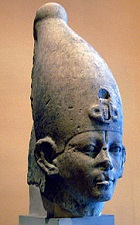
-1803 Sekhemre Khutawy Sobekhotep I (d. -1800). becomes king #1 of the 30-king Egyptian Thirteenth (13th) Dynasty (ends 1718?), based in Memphis, which leaves few monuments, making it hard to determine the chronology; Wegaf (Ugaf) Khutawyre (d. -1757) is the real king #1, not #19?


-1800 About this time the Middle Bronze Age Cold Epoch begins (ends -1500), bringing unusually cold climate to the North Atlantic region, along with severe volcanic eruptions in Mt. Vesuvius (-1660), Mount Aniakchak (-1645), and Mt. Thera in Minoa (-1620). The Day of the Aryans? About this time after the invention of the chariot, the white-is-right Aryan Migration (Invasion) of Indo-Iranian Medes, Persians, Parthians, Bactrians, and Arachosians from S Russia through Afghanistan into the Iranian Plateau begins (ends -850), while more Aryan tribes invade N India, setting up a white supremacist religious civilization based on several kingdoms run by rajahs, and hierarchical social classes of priests, warriors, farmers, traders, and Dravidians (dark skinned non-Aryans). About this time the basic genome of the Irish is formed from a mixture of migrant Stone Age farmers from the Fertile Crescent, and Bronze Age settlers from E Europe. About this time Hittite King Pitkhana (Pitkhanas) of Kussara in SE Anatolia and his son Anitta (Anittas) sack several Hattic cities, incl. Hattusas and Kanesh; Anittas makes Kanesh his new capital, and lays a curse upon Hattusas, causing trade to break down, and the Old Assyrian Trade Network (founded -2000) to break up by -1750? About this time the Assyrian city of Nineveh ("exceedingly great city") (founded -3000?) on the E bank of the Tigris River in Upper Mesopotamia near modern-day Mosul, Iraq is first mentioned as an important center for worship of the Mesopotamian goddess Ishtar; too bad, it lies on a fault line and suffers a number of earthquakes; in 612 B.C.E. after becoming the largest city in the world 50 years earlier, it is abandoned after a civil war and sacked by a coalition of former subject peoples incl. the Babylonians, Medes, Chaldeans, Persians, Scythians, and Cimmerians. The Initial Period begins in Peru (ends -900), with permanent villages, pottery use, and social and religious org. The Bronze Age begins in Ulster; during the Bronze Age tin begins to be mined in Cornwall in SW England, furnishing Phoenicians with one of their favorite articles of trade, although they carry on their trade with them indirectly via Gaul; Britain becomes known as the Cassiterites (Tin Islands). About this time the Akkadian epic Atra-Hasis ("exceedingly wise") is written on three clay tables, containing an account of the Creation and a great deluge; it mentions a god with planning capacity called Alla (Ilaweila), who led a rebellion against chief god Enlil (Elil) and was slaughtered and his flesh and blood used to create humanity; a copy is found dated to Hammurabi's great-grandson Ammi-Saduqa (-1646 to -1626), and another is discovered in the 7th cent. B.C.E. Library of Ashurbanipal; some claim he might be the Muslim god Allah since the Akkadians originally lived in Arabia. About this time a tablet contains a Hymn to Ninkasi, the Sumerian goddess of beer; "Ninkasi, you are the one who pours out the filtered beer of the collector vat. It is like the onrush of the Tigris and Euphrates." Inventions: About this time Semitic workers in the Sinai invent Alphabetic writing by modifying Egyptian hieratic glyphs. About this time the Minoans of Crete invent Linear A Script. Architecture: About this time Stonehenge (begun -2800) in England is completed, designed to predict eclipses of the Sun and Moon as well as solstices and seasons; on sunrise at the summer solstice the Sun comes right down the aisle of small stones in the center, as shown by English astronomer Gerald Stanley Hawkins (1928-2003); UNESCO adds it to its list of World Heritage Sites in 1986 - where it shines on the sacrifice table so the Druids can insure another cycle of seasons?
-1796 Shamshi-Adad I conquers Mari, and installs his son as king. Esau marries pagan Hittite women Judith (Oholibamah) and Basemath (Adah) (Gen. 26:34-35, 36:2; 24:1-4,50-51), who turn out bad.

-1793 Sin-Muballit dies, and his infant son Hammurabi (Hammurapi) (-1795 to -1750) becomes king #6 of the first Babylonian dynasty, going on to extend his control over Mesopotamia and found the Babylonian Empire.
-1787 Hammurabi conquers Isin, but fails to capture Uruk.

-1786 Wegaf dies, and Ameny Intef IV (d. -1760) becomes king #2 of the Egyptian 13th Dynasty.
-1783 The army of Shang Tang (d. -1753) surrounds decadent king Xia Jie (Hsia Chieh) at Xia Tai, and he is captured and exiled to Nanchao; the Hsia Dynasty (begun -2205) ends, and the Shang Dynasty begins (ends -1050), with capital at Anyang in the N Henan province, building walled cities with temples, and known for priest-kings who use elaborate bronze containers with bowed handles in their religious ceremonies - ah, you're no rich prince?
-1781 Shamshi-Adad I is killed in battle, and his son Ishme-Dagan I (d. -1741) becomes king of Ashur.
-1779 Hammurabi forms a coalition with Larsa and Mari against Ashur and Elam.
-1775 Mari, Elam and Babylon sack Eshunna; Elam sacks Ekallatum and Shubat-Enlil.
-1774 Death of Ishmael (b. -1910) (Gen. 25:17).
-1771 Eshunna occupies Ekallatum.
-1768 After being pushed out by the Hittites, the Hyksos (Egyptian "rulers of the foreign countries") from W Asia, AKA the shepherd kings, a Syrian group that incl. Semites from Palestine invade the NE Nile Delta and set themselves up in a city called Avaris, where they introduce the horse and chariot; the Middle Kingdom of Egypt ends along with the Egyptian 12th Dynasty, and the Second Intermediate Period begins, incl. the Egyptian 13th-17th Dynasties (ends -1570).
-1765 King Hammurabi begins his wars of conquest (ends -1750).
-1764 Hammurabi crushes an invading army from Elam, Assyria, Gutium, and Eshunna.
-1763 Hammurabi conquers Larsa.
-1762 Hammurabi sweeps through Sumer.

-1760 Hammurabi defeats a coalition of Elam, Eshunna, Assyria and Gutium, captures Eshunna and reaches the Assyrian frontier; he makes Mari a vassal. Ameny Intef IV dies, and Hor (Awibre) (Aubrire) (d. -1750) becomes king #3 of the Egyptian 13th Dynasty.
-1759 Neferusobek dies. Isaac's 77-y.-o. son Jacob (b. -1836) flees Beer-sheba to Haran, the land of his forebears, and 62 mi. down the path he stops at Luz in the Judean hills, using a stone for his pillow, then dreams of Jacob's Ladder, upon which angels descend and ascend, and at the top of which is Jehovah, who confirms the divine covenant made with Abraham and Isaac (Gen. 28:11-13, 30, 31), uttering the immortal soundbyte: "By means of you and your seed all the families of the earth will certainly bless themselves", and how his seed will become like the dust particles of the Earth in number (Gen. 28:13-15), this wows him so much that he renames the place to Bethel (Beth El) (House of God), and he sets up and annoints a stone pillar, and promises to give him tithes (one-tenth) (Gen. 28:16-22); he spends 20 years in Haran.
-1758 Mari revolts, and Hammurabi destroys their city.
-1755 Babylon conquers Assyria and makes it a vassal; Hammurabi takes the title "King of Sumer and Akkad, King of the Four Quarters of the World" - Ham Studly?
-1753 Shang Tang dies, and Shang Tai Jia (d. -1720) becomes Shang king #2 of China.
-1752 Kutur-Nahhunte I of the Eparta Dynasty in Elam conquers S Babylonia; his country has large Akkadian and Amorite minorities. 84-y.-o. Jacob (b. -1836) marries his first cousins Leah (Heb. "weary") and Rachel (Heb. "ewe") (his favorite) (Gen. 29); actually, he worked seven years to pay father Laban for Rachel, but daddy reneges at the last minute and gives him the older hag Leah, but then throws Rachel in for another seven years of work, and kicks in fertile maidservants Bilhah and Zilpah; during the next seven years Jacob is blessed with many children (Gen. 29:30-30:34), incl. four sons from Leah, 1: Reuben ("behold, a son"), 2: Simeon ("listening intently"), 3: Levi ("joined") and 4: Judah ("praise"); two sons from barren Rachel's substitute slave girl Bilhah, 5: Dan ("God is my judge") and 6: Naphtali ("my struggle"); and two sons from barren Leah's substitute slave girl Zilpah, 7: Gad ("soldier", "luck"), 8: Asher ("felicitous"); Leah then goes fertile and bears 9: Issachar ("laughter"), 10: Zebulon ("give honor to"), and daughter Dinah ("justified"); Rachel follows suit and bears 11: Joseph ("Jehovah increases"), "son of Jacob's old age", followed sometime after the 7-year period by 12: Benjamin ("son of the right hand"); sometime after Rachel, wife of Joseph (Israel) (d. -1738) bears her 2nd son Benjamin and dies during childbirth (Gen. 35:16-20), and eldest son Reuben hooks up with daddy's concubine Bilhah (mother of Dan and Naphtali), causing him to lose the firstborn's birthright (Gen. 35: 21-26, 49:3-4, Deut. 27:20, 1 Chron. 5:1), 17-y.-o. Joseph is seized by his jealous brothers at Dothan 62 mi. N of Hebron and, at the suggestion of Reuben, pitched into a dry well (Gen. 37:2-24), then, at the insistence of Judah, is sold into slavery in Egypt to some passing Ishmaelites (ancestors of Muhammad?) for 20 pieces of silver (Gen. 37:28; 42:21); the bad boys bad boys whatchya gonna do lie to daddy that he had been killed by a wild animal (Gen. 37:31-33), and they all start suffering from a bad conscience; Judah then parts ways with his brothers and tents near Hirah the Adullamite, marries the daughter of Canaanite Shua, and has sons Er, Onan, and Shelah (the latter born at Achzib) (Gen. 38:1-5); Judah then selects Tamar to marry his firstborn Er, but Jehovah kills him for being bad, and then Judah orders second son Onan to do his duty and perform brother-in-law marrage, but the latter on his wedding night "wasted his semen on the earth so as not to give offspring to his brother", causing Jehovah to kill him, and Tamar returns to her daddy's house until youngest son Shelah grows up, but later Joseph fears he might also be a coitus interruptus executus case and reneges (Gen. 38:61-4); but the story doesn't end there; after Judah becomes a widower, Tamar disguises herself as a ho at the entrance of Enaim on the road to Timnah, and he buys her services, and when he finds out that the virgin bride Tamar is suddenly preggers, he goes nonlinear and demands that she be burned, until she tells him the gospel truth that he is the daddy, causing him to about face and exclaim, "She is more righteous than I am, for the reason that I did not give her to Shelah my son" (Gen. 38:12-23); 6 mo. later she bears twin sons Perez ("perineal rupture") and Zerah, who fight to get out first, with Perez winning, but rupturing you know what (Gen. 38:24-30); Perez becomes the more famous of the two (Ruth 4:12), and later has sons Hezron and Hamul (Gen. 46:8-12), Hezron being in the direct line through Boaz to David and Jesus (Ruth 4:18-22; 1 Chron. 2:4-15; Mt. 1:3; Luke 3:3); Hezron has three sons, the key one (not the eldest) being Ram (Aram) (Arni) ("high") (1 Chron. 2:4-5; 9-25); when Hezron dies, his widow Abijah bears Ashur, father of Tekoah (1 Chron. 2:24) (when he was little they called him Ass?); Ram has son Amminadab ("my people are noble") (1 Chron. 2:10); Amminadab has son Nahshon ("serpent") (Num. 1:7; 7:11-2), who heads Judah's army of 74.6K that leads Israel's line of march; Nahshon bears son Salmon (Salma), who marries Rahab of Jericho (1 Chron. 2:11; Num. 2:3; Ruth 4:20-22; Mt. 1:4-5; Luke 3:32); Salmon bears son Boaz ("in strength", "swiftness") (Ruth 2:1), who in the 14th cent. B.C. (300-year Period of the Judges) marries the childless Moabite widow Ruth, together having son Obed ("servant") (Ruth 4:13-22; 1 Chron. 2:12; Mt. 1:5; Luke 3:32); Obed has son Jesse ("Jehovah makes forget") (Ruth 4:17-22; Mt. 1:5-6; Luke 3:31-2); Jesse, a sheep raiser living in Bethlehem has eight sons, ending with red-headed kinnor-playing David (-1085 to -1015) (Heb. "beloved"), whom Judge Samuel picks as the 2nd Jewish king (1 Sam. 16:1-13); too bad, there is no answer as to just where they fall on the Great Track of Time, so it's hard to not place it all in fairy tale land?

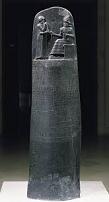
-1750 On June 16 Babylonian king (since -1792) Hammurabi (b. -1795) dies, leaving his famous 282 Laws (Code) of Hammurabi, which are reconstructed by Am. archeologist Francis R. Steele (1914-2003) in 1947; they incl. the death sentence for robbery, the Biblical "eye for an eye" law, lopping off the hand of a son who strikes his father, and laws regulating beermaking (20 varieties) and tavernkeeping; the 7-tablet Enuma Elish ("when on high") Babylonian creation myth dates to Hammurabi's reign, about a battle between the gods over the supremacy of Marduk, and the creation of mankind; Hammurabi's son Samsu-Iluna (d. -1712) becomes king of the great empire of Babylon, which immediately begins to disintegrate. Hor dies, and Sobekhotep II becomes king #4 of the Egyptian 13th Dynasty. The first known consumer service complaint is by Babylonian consumer Nanni, who complains to Ea-nasir of a shipment of inferior copper ore.
-1748 Abraham (b. -1996) is 248 years old; Jacob (later Israel) (b. -1836) is 88 years old; Jacob's 4th son (by his wife Leah) Judah (Heb. "lauded") (root of the royal line of King David) is born in Paddan-aram in Haran (Gen. 29:35; 1 Chron. 2:1).
-1747 Khendjer ("boar") becomes king #5 of the Egyptian 13th Dynasty.

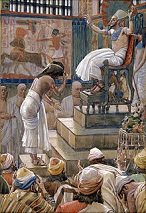
-1745 Sobekhotep III becomes king #6 of the Egyptian 13th Dynasty. Birth of Joseph (d. -1636) (Heb. "remover", "increaser") (Gen. ch. 30) on Tammuz 1 to 91-y.-o. Jacob (Israel) (b. -1836) (11th of 12 sons); known for his Coat of Many Colors; he ends up receiving the right of the firstborn (Deut. 21:17) (a double portion of the inheritance), rising to grand vizier, and fathering two tribes, Ephraim and Manasseh (W of the Jordan River to the Mediterranean, incl. the Plain of Sharon), which become the most prominent tribes; in modern times the Latter-Day Saints claim to be of the tribe of Ephraim.


-1741 Neferhotep I (d. -1730) becomes king #7 of the Egyptian 13th Dynasty. King Ishme-Dagan I of Ashur dies. Rim-Sin II (d. -1736) becomes king of Larsa, founding the Second Larsa Dynasty, and waging a rebellion against Babylon.
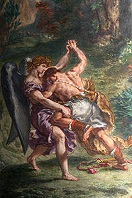
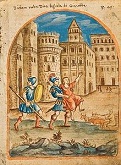
-1739 97-y.-o. Jacob (b. -1836) returns to Canaan from Haran with his family (incl. 9-y.-o. Judah), wrestles with an angel all night at the rest stop of Peniel (Penuel) ("face of God") near Succoth E of the Jordan River and S of the torrent valley of Jabbok, during which the angel "touches his thigh", causing a permanent limp, and after the angel wins he confirms Jacob as a prince of men and (surprise?) Jehovah renames him Israel ("Contender with God") (Gen. 31, 32) (some gay action going on and covered up?); the family resides at Succoth, then Shechem, where his daughter (by first wife Leah) Dinah (Heb. "judged, vindicated") is raped by the son of Hamor, causing her brothers Simeon and Levi to avenge her by killing all the males of Shechem, followed by plunder of the city, in which Judah takes part (Gen. 33:17-18, 34:1-2,25-29).
-1736 Rim-Sin II of Larsa is captured by the Babylons under Hammurabi and executed; Hammurabi becomes sole ruler of Sumer and Akkad, ending the independence of Sumeria, although its civilization is absorbed by the Babylonians.
-1735 King Dadusha of Eshunna is the first to promulgate laws in the Babylonian language.
-1732 Iluma-Ilu (d. -1700) revolts from Babylon in S Sumer and founds the Sealand Dynasty (2nd Babylonian Dynasty) (ends -1460).
-1730 Neferhotep I dies, and his Thebes-born brother Sobekhotep IV Khaneferre (d. -1720) becomes king #8 of the Egyptian 13th Dynasty, leading a military campaign into Nubia. Mut-Ashkur (d. -1720) becomes king #1 of Ashur, which revolts from Babylon and gains its independence. Iqishi-Tishpak becomes king of Eshunna. Gandash (Kandis) of Mari (d. -1705) founds the Kassite Dynasty in the Zagros Mts. of Lorestan, Iran.
-1720 Sobekhotep IV dies, and Ay becomes king #9 king of the Egyptian 13th Dynasty. Shang Tai Jia dies, and Shang Wo Ding (d. -1691) becomes Shang king #3 of China. Mut-Ashkur dies, and Rimush (d. -1710) becomes king of Ashur.
-1717 Death of Isaac (b. -1896) in his 180th year (Gen. 35:28-29).
-1715 Samsu-Iluna crushes an invading Kassite army.
-1712 Samsu-Iluna dies, and next year his son Abi-Eshuh (d. -1684) becomes king of Babylon.
-1710 Rimush dies, and Asinum (d. -1706) becomes king of Ashur.
-1706 Asinum dies, and seven usurpers fight for the throne of Ashur. Jacob (Israel) leaves Beer-sheba with his whole family and goes to Egypt after Jehovah promies to "make of you a great nation" (Gen. ch. 46).
-1705 Nehesy (Nehesi) ("the Nubian") Aasehre becomes king #6 (#2?) of the Egyptian 14th Dynasty, ruling less than 1 year, becoming the best-attested king of the dynasty, leaving his name on two monuments in Avaris.
Gandash dies, and Agum I (d. -1690) becomes king of Mari. 40-y.-o. Joseph (b. -1745) is made grand vizier (PM) of Egypt (Gen. ch. 41).-1700 About this time a civil war begins in Crete, ending the First Palace Period, and beginning the Second Palace Period (ends -1420), featuring palaces with the earliest known controlled water pressure. The Hurrian Conquests begin (end -1500). Belu-Bani (d. -1691), son of Adasi becomes king of Ashur. Iluma-Iluma dies, and Itti-Ili-Nibi (d. -1683) becomes king of Sealand. About this time the Jebusites fortify Jerusalem with stone walls. The oldest known boatyard is built in Monmouth, South Wales. The Sumerian Simmons Tablet, is written, describing a Biblical-type flood and saying that the ark is circular and made of reeds; found by British RAF member Leonard Simmons during WWII. Tel Kabri in N Israel is the oldest known wine cellar, containing 40 50-liter jars.
-1691 Shang Wo Ding dies, and Shang Tai Kang (d. -1666) becomes Shang king #4 of China. Belu-Bani dies, and his son Libaia (d. -1674) becomes king #27 of Ashur.
-1690 Agum I dies, and Kashtiliash I (d. -1680), king of Hana becomes king of Mari. Death of Jacob (Israel) (b. -1836) in his 147th year (age 146) (Gen. 47:28).
-1684 Abi-Eshuh dies, and Ammi-Ditana (d. -1647) becomes king of Babylon.
-1683 Itti-Illi-Nibi dies, and Damiq-Ilushu (d. -1657) becomes king of Sealand.
-1680 Kashtiliash I dies, and Ushshi (d. -1665) becomes king of Mari. About this time Labarnas (Labarna) I announces the brand-spanking new Old Hittite (Hatti) Kingdom (ends -1500) E of the Halys River on the C plateau of Anatolia (Asia Minor), developing iron-working, which gives his troops the mojo to cross the Taurus Mts. and tirelessly wage war on Syria and Assyria in a land grab in the Anatolian Peninsula; the land of Ebla in N Syria is "shattered like a ceramic vase"; in 1098 C.E. Crusaders mention seeing the ruins of Ebla (Mardikh) 40 mi. S of Aleppo. The Hurrians occupy Assyria. Alt. date for the beginning of Hyksos rule in NE Egypt (ends -1580).
-1674 Libaia dies, and Sharma-Adad I (d. -1662) becomes king of Ashur.
-1666 Shang Tai Kang dies, and Shang Xiao Jia (d. -1649) becomes Shang king #5 of China.
-1665 Ushshi dies, and Abirattash (d. -1650) becomes king of Mari.
-1662 Sharma-Adad I dies, and his son Iptar-Sin (d. -1650) becomes king of Ashur.
-1660 About this time Hattusilis (Hattusili) I moves the Hittite capital to Hattusas (Hattusa) (modern-day Boghazkoy) on the bend of the Halys River, and conquers the fertile Konya plain in the C Anatolian plateau S of the great Salt Lake (Tuz Gol), which becomes the center of the Hittite Empire, then overcomes Alalakh (Alalah) in N Syria near Antakya (Antioch), and campaigns in Arzawa (Assuwa) (later known as Lydia) in the four fertile river valleys of W Anatolia.
-1657 Damiq-Ilushu dies after losing Uruk, Isin and Larsa to Babylon, and Ishkibal (d. -1642) becomes king of Sealand.

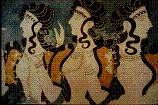
-1650 The 6-king Egyptian Fifteenth (15th) Dynasty (ends -1550), based in Avaris is founded by the Hyksos after they infiltrate from the NE; the Second Intermediate Period begins (until -1550), during which Egypt is in chaos, continuing through the 17th Dynasty; the 30+-king Egyptian Sixteenth (16th) Dynasty (ends -1580), based in Thebes is founded, facing encroachment from the 16th Dynasty, which evenutally conquers Thebes itself; one possible 16th Dynasty pharaoh is Senusret IV Seneferibre, whose colossal (2m) pink granite statue in Karnak is discovered in 1901. Iptar-Sin dies, and his son Bazaia (d. -1622) becomes king of Ashur. Abirattash dies, and Kashtiliash II (d. -1640) becomes king of Mari. The Middle Helladic Period of Greece ends, and the Late Helladic Period of Greece begins (ends -1150), characterized by the rise of Mycenaean Greece. About this time the Egyptian Mathematical Leather Roll is written, a practice test for students on fractions; also the Rhind Papyrus, which contains mathematical problems. About this time the Blue Ladies Fresco is painted on a bedroom wall of Pasiphae in Knossos, Crete.
-1649 Shang Xiao Jia dies, and Shang Yong Ji (d. -1637) becomes Shang king #6 of China.
-1647 Ammi-Ditani dies after Uruk, Isin and Larsa, and Ammi-Saduqa (Ammizaduga) (d. -1626) becomes king of Babylon.
-1642 Ishkibal dies, and Shushshi (d. -1618) becomes king of Sealand.
-1640 Kashtiliash II dies, and Urzigurumash (d. -1630) becomes king of Mari.
-1637 Shang Yong Ji dies, and Shang Tai Wu (d. -1562) becomes Shang king #7 of China.
-1636 Death of Joseph (b. -1745) at age 110 (Gen. 50:26) after reconciling his family and persuading the Hebrews to settle in Goshen in the Nile Delta in NE Egypt, the most lush area, where they begin to outnumber and outprosper the Egyptians, making them jealous (Ex. Ch. 1) - the original Florida and Palm Springs?
-1630 Urzigurumash dies, and Harbashihu (d. -1600) becomes king of Mari.
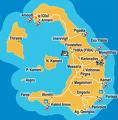

-1627 About this time the volcano on the island of Thera AKA Santorini in the Aegean Sea 100 mi. SE of Athens erupts, causing half of the island to sink into the sea, along with a city in the Bay of Naples, becoming the greatest vocanic eruption in ancient times; a tsunami hits Crete, destroying the Minoan fleet, dealing their civilization a lethal blow; ditto the Hyksos; in 1967 Greek archeologist Spyridon Nikolaou Marinatos (1901-74) discovers remains of a Minoan civilization in Akrotiri in SW Santorini, incl. a sewage and freshwater system, and 3-story bldgs. with indoor bathrooms and toilets, along with frescoes of blue monkeys, which are unearthed in the 1960s and 1970s and turn out to be Hanuman (gray) langurs from the Indian subcontinent 2.5K mi. away; the explosion is the origin of the Atlantis legend of Plato, according to Greek seismologist Angelos Galanopoulos; frescoes found in Thera show a goddess presiding over the manufacture of drugs from the saffron flower (Crocus sativus); each flower has three stigmas, and it takes 150 flowers to yield 1g of dry saffron threads, which currently cost $1K per lb.; Atlantis is really in Morocco?
-1626 Ammi-Saduqa dies, and Samsu-Ditana (d. -1595) becomes the last king of the First Babylonian Dynasty.
-1622 Bazaia dies, and Lullai (d. -1618) becomes king of Ashur.

-1620 The Hittites under Labarnas I's adopted grandson Mursilis (Murshili) I (d. -1590) defeat a Hurrian army, destroy Aleppo, then march S into Mesopotamia.
-1618 Lullai dies, and his son Kidin-Ninua (Shu-Ninua) (d. -1602) becomes king of Ashur. Shushshi dies, and Gulkishar (d. -1592) becomes king of Sealand.
-1602 Kidin-Ninua dies, and Sharma-Adad II (d. -1598) becomes king of Ashur.
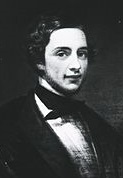

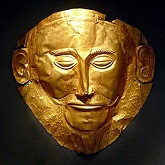
-1600 About this year a revolt against the foreign-invader Hyksos (which incl. the original Jews?) spreads throughout Egypt, which begins its growth into a world power; the Kingdom of Kush (Cush) (Nubia), located at the confluence of the Blue Nile, White Nile, and Atbara Rivers in modern-day Sudan is conquered by the Egyptians, who govern it with a viceroy until 1070 B.C.E., when the New Kingdom disintegrates and it gains its independence, with capital at Napata on the W bank of the Nile River near modern-day Karima, Sudan (250 mi. N of Khartoum). Harbashihu dies, and Tiptakzi (d. -1595) becomes king of Mari. About this time the heretofore-poor pop. of mainland Greece (Mycenae), known for small villages of mud-brick houses begin building opulent tombs in Grave Circle A filled with weapons, jewelry, golden death masks, incl. the golden Mask of Agamemnon (1500 B.C.E.), discovered by Heinrich Schliemann in 1876; not the real Agamemnon. About this time the Minoans of Crete develop the chariot army. The Bronze Age Gamla Folk found a civilization in Zealand (ends -600), with the mild climate allowing a Great Circle route across the Arctic Ocean to America. About this time the oldest surgical treatise on trauma to survive to modern times, the Edwin Smith Papyrus is written during the Egyptian Second Intermediate Period (by first known physician Imhotep?), describing 48 cases of injuries, fractures, wounds, dislocations, and tumors, with treatment and prognosis, incl. closing wounds with sutures, using honey and moldy bread as antiseptics, stopping bleeding with raw meat, and immobilization for head and spinal cord injuries; magic is left as a last resort; it also contains detailed anatomical observations but shows no understanding of organ functions; the earliest known reference to cancers or ulcers of the breast; discovered in Luxor in 1862 C.E. by Am. antiquities dealer Edwin Smith (1822-1906). The 32 cm Nebra Disk in Germany, 15 mi. from the Goseck Circle contains the oldest known realistic representation of the heavens, with a crescent Moon, full Moon, and a cluster of seven stars representing the Seven Sisters (Pleiades). About this time writing is invented in China, 2K years behind the Mesopotamia and Egypt. About this time the Semitic seafaring Phoenicians begin making bromine-based Tyrian purple (red) red-purple dye from secretions of the spiny dye-murex sea snail (marine gastropod) of the family Muricidae (Murex brandaris), also the bandex dye-murex (Hexaplex trunculus), and the rock-shell Stramonita haemastoma; it requires so many snails to make that "purple for dyes fetched its weight in silver at Colophon" (Theopompus); traders use purple sails so that they won't be bothered, since everybody wants their product; the color gets brighter with weathering and sunlight; the Byzantines later make it a capital crime for anybody but the emperor to wear it, and build the royal birthing apt. out of purple-red porphyry. About this time the Sumerian Creation Myth (Eridu Genesis) is written in Nippur; Ziusudra (Zin-Suddu) (Xisuthros) ("found long life"), last king of Sumer before the Deluge is the hero. About this time cacao trees (Criollo) are domesticated in the Amazon River basin near the border of S Colombia and N Ecuador from the ancient germplasm Cuaray. About this time Mesoamericans use vulcanized rubber for balls and other objects?
-1598 Sharma-Adad II dies, and Erishum III (d. -1586) becomes king of Ashur.
-1596 Senakhtenre ("perpetuated like Ra") Tao I becomes king #4 of Egypt's 17th Dynasty (until -1591).
-1595 The Hittites under Mursilis I sack Babylon, killing King Samsu-Ditana and bringing down the First Dynasty, then return to Hattusas because of political disturbances (and/or supply lines too long?); Mursilis is assassinated in a coup, and the Hittite Empire begins to go downhill (until -1400) as the Hurrians and Arzawans contract their territory; Tiptakzi dies, and Agum II Kakrime (d. -1545) becomes king of Mari; he goes on to conquer Babylon after the Hittites withdraw, and founds the Third Kassite Dynasty; Gulkishar of Sealand reconquers S Sumer from Babylon.
-1592 Gulkishar dies, and Gishen (d. -1580) becomes king of Sealand.

-1591 Job's trial takes place (Book of Job 1:8, 42:16) in the Land of Uz, really Edom (Teman) SE of the Dead Sea; Job is really King Jobab ben Zerah of Edom, who rules from Bozrah ("sheepfold") (modern-day Bouseira, Jordan), homeland of Jacob's twin brother Esau; Job's Edomite friends are Eliphaz (Heb. "El is pure gold") of Teman, a descendant of Teman, son of Esau's eldest son Eliphaz, Bildad, descendant of Shuah, son of Abraham and Keturah, and Zophar (Heb. "rising early/chirping") from Naamah in Canaan.
-1586 Erishum III dies, and his son Shamshi-Adad II (d. -1580) becomes king of Ashur.
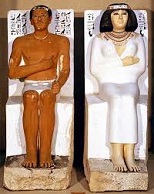
-1580 The 9-king Seventeenth (17th) Egyptian Dynasty begins (ends -1550), based in Thebes; king #1 might be Sekhemrewahkhau Rahotep, who leaves a stele in Coptos celebration his restoration of the Temple of Min. Shamshi-Adad II dies, and his son Ishme-Dagan II (d. -1564) becomes king of Ashur. Gishen dies, and Peshgaldaramash (d. -1530) becomes king of Sealand. Alt. date for the end of Hyksos rule in N Egypt. About this time Egyptian (Theban) princess Ahmose Meryet Amon becomes the earliest known human diagnosed with coronary artery disease. Musical instruments from W Asia are introduced into Egypt, incl. the trumpet, lyre, oboe, and drum.
-1576 Possible date for the birth of Moses (d. -1456).
-1575 Birth of Aaron (d. -1452), son of Amram (Heb. "friend of the most high") and Jochebed (Heb. "Jehovah is glory") of the Jewish tribe of Levi (his great-grandfather) in Egypt (Ex. 6:13-30); his elder sister is Miriam, and his younger brother by three years is Moses (Ex. 2:1-4; 7:7); Aaron marries Elisheba, daughter of Amminadab, and has sons Nadab, Abihu, Eleazar, and Ithamar (Ex. 6:23), and lives to age 123 (Num. 33:39).
-1571 Birth of Israel's first Messiah, nat. leader, mediator of the Law covenant, prophet, judge, commander, writer-historian, "Man of the True God" (Ezra 3:2), the original "Go Down Kid", Mo Mo Moses (d. -1451) (Egyptian "is born", "son of", "drawn out" ,"saved out of water") (Ex. 7:7; 1 Ki. 6:1) in Goshen, Egypt; son of Amram (of the Jewish tribe of Levi) and Jochebed (sister of Kohah) (Ex. 2:2); grandson of Kohath; great-grandson of Levi; husband of Zipporah; father of Germhom and Eliezer; "By far the meekest of all the men who were upon the surface of the Earth" (Num. 12:3); a "divinely beautiful" infant, he is hidden by his mother for 3 mo. to spare him from a genocidal decree of Pharaoh, and floated in a papyrus ark (basket) down the Nile, where Pharaoh's daughter finds and raises him, with his real mother as nurse, while the tyke is "instructed in all the wisdom of the Egyptians", becoming "powerful in his words and deeds" (Ex. 2:1-10; Acts 7:20-22).
-1564 Ishme-Dagan III dies, and his son Shamshi-Adad III (d. -1547) becomes king of Ashur.
-1562 Shang Tai Wu dies, and Shang Zhong Ding (d. -1549) becomes Shang king #8 of China, moving the capital from Hao to Xico, and bringing an end to the Deng Kingdom.
-1560 Senakhtenre Ahmose dies, and his son (by Tetisheri) Seqenenre Tao (Taa) (Djehuty-aa) (the Brave) (d. -1556) becomes king #8 of the Egyptian 17th Dynasty in Thebes, initiating military campaigns against the Hyksos.
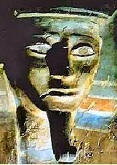
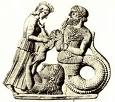
-1556 Seqenenre Tao dies, and his son (by Ahhotep I) Kamose (d. -1551) becomes king #9 (last) of the Egyptian 17th Dynasty, continuing his father's war on the pesky Hyksos. The Aegeides Dynasty in Athens is founded by half-man half-fish Cecrops I (d. -1506) (Gr. "face with a tail"), who becomes king #1 of Athens, replacing elections for hereditary succession (until -1068) - who wouldn't want it that way?


-1550 About this time the ancient city of Jericho is abandoned; according to the Bible (Joshua Ch. 6), the Battle of Jericho sees the Israelite army of Gen. Joshua blow down the walls with trumpets; it is excavated in 1868, 1907-9, 1930-6, 1952-8, 1997-2000, and 2009, revealing eyeliner and scarabs from Egypt - no evidence of any trumpets? About this time the Ebers Papyrus is created in Luxor, Thebes, Egypt, describing diagnosis and treatment of various medical ailments incl. depression and dementia, mentioning that the heart is the center of the blood supply and all bodily fluids, and listing 877 drug prescriptions; discovered in 1873-4 by German Egyptologist Georg Mortiz Ebers (1837-98).
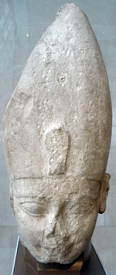
-1549 Kamose dies, and his co-regent brother (since -1546) Ahmose (Amosis) (Amasis) (Aahmes) (Amenes) ("Born of Yah") (Nebpehtyre) ("The lord of strength is Ra") (d. -1524) (brother of Kamose) expels the Hyksos from the Nile Delta, restores Theban rule over all of Egypt incl. Nubia and Canaan, and founds the fabulous Egyptian Eighteenth (18th) (Thutmosid) Dynasty (ends -1292), known for its imperialism and its superstar pharaohs incl. four named Thutmosis, female pharaoh Hatshepsut, and heretic pharaoh Akhenaten; end of the Second Intermediate Period (begun -1650), and beginning of the Egyptian New Kingdom (Egyptian Empire), which incl. the Egyptian 18th-20th Dynasties, seeing Egypt reach its peak of wealth and power; Amazing Ahmose I builds the last pyramid by native Egyptian rulers. Kassite ruler Agum becomes master of Babylonia, going on to extend its territory to the Zagros Mts. Shang Zhong Ding dies, and Shang Wai Ren (d. -1534) becomes Shang king #9 of China, dealing with a revolt by the Huai and Xian tribes.
-1547 Shamshi-Adad III dies, and his brother Ashur-Nirari I (d. -1522) becomes king of Ashur.
-1545 Agum II of Mari dies, and Burnaburiash I (d. -1500) becomes Kassite king of Babylon.
-1542 Birth of Jewish gen. Joshua (Jehoshua) (Yehoshua) (Hoshea) (d. -1432) (Heb. "Jehovah is salvation") in Egypt; son of Nun of the tribe of Ephraim.
-1534 Shang Wai Ren dies, and Shang He Tan Jia (d. -1525) becomes Shang king #10 of China, moving the capital from Xico to Xiang.
-1531 40-y.-o. Moses (b. -1571) flees to Midian after killing an Egyptian and burying him in the sand (Ex. 2:11-15; Acts 7:23-29), spending 40 years there, saving the seven daughters of Jethro at a well and marrying one of them, Zipporah, who bears him sons Gershom and Eliezer (Ex. 2:16-22; 18:2-4).
-1530 Peshgaldaramash dies, and Adarakalamma (d. -1502) becomes king of Sealand.
-1525 Telipinus the Priest, last king of the Old Hittite Kingdom seizes control and sacrifices some of the western districts and all of the territory E of the Taurus Mts. in favor of a more manageable kingdom. Shang He Tan Jia dies, and Shang Zu Yi (d. -1506) becomes Shang king #11 of China, moving the capital from Xiang to Geng to Xing.

-1524 Ahmose I dies after his two eldest sons Ahmose-ankh and Ahmose Sapair die, and his son (by Ahmose-Nefertari) Amenhotep (Amenophis) ("Amun is satisfied") I (Djeserkare) (d. -1503) becomes king #2 of the Egyptian 18th Dynasty, ruling 21 years.
-1522 Ashur-Nirari I dies, and his son Puzur-Ashur III (d. -1498) becomes king of Ashur; he signs a treaty with Burnaburiash I setting the border with Babylon at Samarra.
-1520 Alt. date of the birth of Moses (Eerdman's Dict. of the Bible).
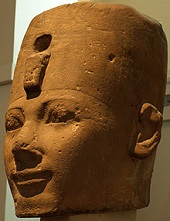
-1506 Amenhotep I dies, and his military cmdr. (son of Amenhotep I and commoner Senseneb) Thutmose I (Thutmosis) (Thothmes) (Tuthmosis) ("Thoth-Born") (Akheperkare) (d. -1493) becomes king #3 of the 18th Egyptian Dynasty, going on to conquer Nubia past the Fourth Cataract, ending the autonomous Kingdom of Kush (Cush) (Nubia), located at the confluence of the Blue Nile, White Nile, and Atbara Rivers in modern-day Sudan; he becomes the first pharaoh (after Amenhotep I?) to build his tomb in the Valley of the Kings on the W bank of the Nile River opposite Thebes/Luxor; the practice continues for almost 500 years, ending with the Egyptian 20th Dynasty (-1077). Cecrops I dies, and autochthonous (born from the Earth) Cranaus (d. -1497) (born from the Earth) becomes king #2 of Athens. Shang Zu Yi dies, and Shang Zu Xing (d. -1490) becomes Shang king #12 of China.
-1502 Adarakalamma dies, and Ekurduanna (d. -1476) becomes king of Sealand.
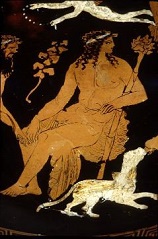
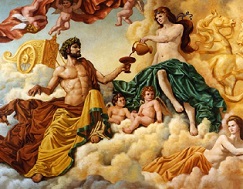
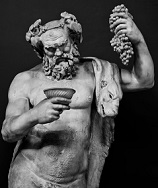
-1500 The Middle Bronze Period ends, and the Late Bronze Period begins (ends -1200); the domesticated horse begins to shrink the world. About this time the Achaeans begin to invade Greece in two waves, settling in the N Peloponnese; the Thracians later claim their original home in thickly-forested Pieria near Mt. Olympus, home of the cult of the Muses, which spreads S to Mt. Helicon in Boeotia, where they grow from three to nine in number, and are considered daughters of Zeus and Mnemosyne, goddess of memory. There is a major migration deep into Africa by farmers from the Middle East? The Medes are divided into six tribes, incl. the Magi, living in Media, lying between the Elburz and Zagros Mts. S of the Caspian Sea, and extending NW to the Araxes River and Lake Urmia. Burnaburiash I dies, and Kashtiliash III (d. -1470) becomes Kassite king of Babylon on the Euphrates River. Parattama becomes king #1 of the Hurrian-speaking Mitanni (Mittani) (Hanigalbat) Kingdom in SW Armenia and N Syria, run by a warrior nobility from India and Iran (ends -1300); they worship the Sun god Mithra. The Aramaic-speaking Semitic Arameans (Aramaeans) begin to migrate from the Arabian Peninsula to the N Fertile Crescent and Syria (ends -1200). About this time the town of Miletus is founded by Mycenaeans from Crete as a stronghold on the W coast of Asia Minor near the mouth of the Maeander River (until -1100), becoming the first of 10 Greek colonies on the Sea of Marmara or Black Sea, and the first city with a modern grid plan (by Hippodmos), which is copied by the Romans; the Temple of Didyma, devoted to Apollo the Didymaion (twin) is built, becoming the 2nd most famous oracle in the Hellenistic world after Delphi. In this cent. the Ahhiyawa (Achaean?) people raid W Asia Minor, according to Hittite records; later a force led by Attarissyas attacks Cyprus (Atreus, father of Agamemnon?). In this cent. the Minoan civilization suddenly begins to disappear. About this time the Greek wine god Dionysus begins to be worshiped by the Mycenean Greeks, later adopted by the Romans as Bacchus. About this time the Picts traditionally migrate from Brittany to Ireland, are refused permission to stay, but allowed to settle in NE Scotland on the condition that each Pictish king marry an Irish princess, since Pict society is matriarchal. About this time the Olmec ("rubber people") Culture begins (ends 200 C.E.) in the SW Gulf Coast of Mexico, centered in Tabasco and Veracruz, with highly developed agriculture, building mounds, temples, plazas, hieroglyphics and calendars, and a distinctive art with huge sculptured basalt heads, carved jade animal humans and jaguars; ceremonial bldgs. are built at La Venta in modern-day Tabasco, Mexico. Agriculture reaches SE North Am., spreading to the midwest. About this time Fiji is first settled by Polynesian seafarers, and Polynesian culture begins developing. About this time the Egyptian Book of the Dead (Book of Emerging Forth into the Light) goes onto the Memphis Times Bestseller List for those wanting to make it to the Field of Reeds (until -50). About this time the Mycenaeans change their burial style from shaft graves to circular rock-lined tholoi (beehive tombs) - nothing is too good for my muddah? In this cent. the Laws of Manu (Manu Smriti) are written in India by the Seventh Manu (ruler of the Earth for this age, which is the 7th Manvantara), institutionalizing the wonderful caste system; "Man is purer above the navel than below, hence the purest part is his mouth"; really written in the 2nd cent. B.C.E.? - a horse is a horse, of course, of course? The Polynesians migrate throughout the Pacific islands. Stonehenge is abandoned after 1500 years of use - no fun when not wearing skins? Cinnamon is exported from Kerala to the Middle East. Inventions: Bells are made in China. The earliest written record and surviving fragments of Tapestry. About this time the 22-letter (consonants only) Phoenician Alphabet begins to be developed, reaching its completed form around -1200, spawning the Aramaic and Greek alphabets (which introduces the first explicit symbols for vowel sounds); the Roman alphabet is developed from the Greek alphabet; the Brahmic alphabet is developed from the Aramaic alphabet? The Egyptians invent the Shadow Clock. The earliest known Glassware is made in Egypt. Indigenous iron technology arises in Dwarka and Kashmir in India. Hittites like to play a guitar-like musical instrument - the Hit-It? Nonfiction: About this time the Shun-Hai Ching (Sun-Hai (King) (Classic of Mountains and Seas) (Mountain-Sea Classic) is written by a group of Chinese scholar-explorers, becoming the oldest secular book on Earth; it describes fantastic creatures such as a 1-armed tusked ("spears of pearl") red giant as tall as three men, and a small grey pig with a white collar and teeth of pearls; did they visit America and see woolly mammoths and peccaries? About this time the Vedic Period begins in India (ends -500), with major portions of the 1,028 Veda Hymns (Vedas) (Sans. "veda" = knowledge) being composed, incl. the Rig Veda (Royal Knowledge), Sama Veda (Chant Knowledge), Yajur Veda (Sacrificial Ritual Knowledge), Atharva Veda (Knowledge of Incarnations); the Universe was allegedly evolved by self-existent Brahma (Sans. "worship") (Prajapati) the Creator (part of the Hindu Trimurti or Triad) from a cosmic egg; he originally had five heads, until Siva (Sans. "auspicious") the Destroyer, god of destruction and reproduction, the 3rd member of the Hindu Trinity destroys four of them, and he becomes red and rides on a swan with his consort Saraswati ("eloquence personified"), who becomes the goddess of writing and the arts; meanwhile the 2nd member Vishnu (Sans. "all-pervader") the Preserver stabilizes everything, going on to have several human incarnations, incl. Krishna (Kistna) - where are the sex manuals? There are Six Orthodox Schools of Hinduism. The four Vedas, incl. the Samhitas ("joined") (prayers), Brahmanas (legends), Aranyakas (ritual sacrifice), and Upanishads (abstract spiritual philosophy), which describe the ultimate reality of Brahman and the form of human salvation (moksha); the Trimurti (Great Trinity) ("three forms") consists of Brahma the Creator, Vishnu the Preserver, and Shiva (Maheswara) the Destroyer, who are three manifestations of the Supreme Being called Ishvara, Bhagavan, Parameshwara, or Deva/Devi; some claim he has five forms, Ganesha, Shiva, Shakti, Vishnu, and Surya; all living creatures have an atman or soul; Hinduism split into four sects incl. Shaivism, whose devotees worship Shiva and wander about with ashen faces performing self-purification rituals, Vaishnavaism, whose devotees worship Vishnu, Shaktism, whose devotees worship Shakti or Devi the Divine Mother and perform animal sacrifice, and Smartha (Smarta), who worship all five forms and hold the Smriti ("that which is remembered") as the most authoritative texts, recognizing Brahman as the highest principle in the Universe, pervading all existence. As far back as the 8th cent. B.C.E. the Later Upanishads ("sitting down near") began to be composed (ends -400?); traditionally, 108 of them exist, varying from 1-50 printed pages in length, forming the lit. foundation of Hinduism, incl. the Brahman (universal spirit), the Atman (individual self), and the divine syllable Aum, and how the non-dual Brahman-Atman is the all inclusive ground of the Universe while all reality in the Universe is but an illusion, we won't mention sacred cows.
-1498 Puzur-Ashur III dies, and his son Enlil-Nasir I (d. -1485) becomes king of Ashur.
-1497 Cranaus dies after fleeing to Lamptrae, and his son-in-law Amphictyon (d. -1487) becomes king #3 of Athens.
-1496 From this year thru 1861 C.E. (3,358 years) there are 3,130 years of war and only 227 years of peace (one in 13) :)

-1493 Thutmose I dies, and his non-eldest son (by minor wife Mutnofret) Thutmose (Thutmosis) (Tuthmosis) (Thotmes) ("Born of Thoth") II (d. -1479) becomes king #4 of the Egyptian 18th Dynasty; to secure his throne he marries his royal half-sister Hatshepsut, who wears the pants and is the real power behind the throne, claiming that daddy loved her best and wanted her to be his heir.
-1492 80-y.-o. Moses (b. -1571) has a religious experience with a thorn bush on Mount Horeb in the Sinai Peninsula (Ex. 3:1-15), and becomes the Messiah, Jehovah's official rep., performing the first human miracles (Ex. 4:1-9), going up against Pharaoh, with his brother Aaron (prophet to Pharaoh, Ex. 7.1) doing the talking and wielding his rod, and bringing on the Ten Plagues of Egypt to convince Pharaoh to let the Jews go (Ex. Chs. 7-12); Aaron goes to become the first high priest of the Israelites.




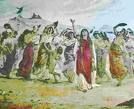

-1491 Traditional date of the First Passover, the Biblical Exodus, and the Red Sea Crossing Caper (Ex. Chs. 12-15), led by Moses; on Nisan 14 the first Passover is held (Ex. 12:1-13), then on Nisan 15 Israel departs from Egypt starting at Memphis, being joined by others from Goshen to the N, eventually growing to 2M-3M, and passing over the El Haj trade route to Succoth, reaching Etham N of the Red Sea; then, to solve some sibling rivalry between the top dogs (er, gods) of the two competing religions, the Jews are ordered by Jehovah to "turn back and encamp before Pihahiroth ("mouth of the gorges") between Migdol and the sea in view of Baal-zephon... by the sea" to the S (Heb. "Yam Suph" = "Red Sea" = Gulf of Aqaba?) (Nueba Beach at the end of Nueba Peninsula at the end of 2K-ft.-high Wadi Watir Canyon?) (Ex. 13:20-14:3), which causes Pharaoh and the Egyptians to think they are lost and harden their hearts and pursue them in 600+ chariots (Ex. 14:7); Jehovah then commands Moses to lift up his rod and stretch his hand out over the sea, parting the waters so the Hebrew nation can walk on the dry seabed (Ex. 14:16); after Jehovah makes the wheels of their chariots come off to slow them down (Ex. 14:25), Moses stretches out his hand over the sea again, causing it to close on the Egyptians and kill them all (Ex. 14:26-28); "But the children of Israel walked upon dry land in the midst of the sea; the waters were a wall unto them on their right hand and on their left. Thus the Lord saved Israel that day out of the hand of the Egyptians, and Israel saw the Egyptians dead upon the sea shore" (Ex. 14:29-30); joyful Moses and the men celebrate by singing the hit Hebrew song "The Horse and Its Rider Hath He Thrown in the Sea" (Ex. 15:1), while Aaron's sister Miriam leads the women with tambourines (Ex. 15:20-21); after providing them with food, quail, and manna and instituting a Sabbath Law (Ex. Chs. 15-16), they finally make it to the Sinai wilderness in the 3rd month after the Exodus (Ex. 19:1-2); Moses goes to the top of Mt. Sinai (Horeb) in Midian for 40 days, and returns with two stone (blue sapphire?) tablets "written on by God's finger" containing the Ten Commandments (Words) (Decalogue) (Ex. 31:18, Deut. 4:13), but breaks them after seeing a group of backsliders singing in front of a golden calf made by his brother Aaron from gold jewelry donated by the backsliders, and he and the tribe of Levi kill all 3K of them (sparing Aaron), asking Jehovah to give the Jews another chance and let Moses make his own copy of the Ten Commandments, which he permits after passing by Moses but only allowing him to see his "back (parts) (side)" (Ex. 33:18-23, 34:1-6; Acts 7:38), causing Moses' face to emit rays so intense that the Jews can't bear to look at him (Ex. 34:29-35; 2 Cor. 3:7-13) (ass-kissing and brown-nosing jokes here?); meanwhile Moses begins compiling the five books of the Torah (Hebrew Bible) (Pentateuch), incl. Genesis (Bereshit) ("In the beginning"), containing the immortal soundbyte: "Let there be light" (Lat. "fiat lux") (Gr. "genetheto phos") (Gen. 1:3), Exodus (Shemot) ("The names"), Leviticus (Vayikra) ("And He called"), and Deuteronomy (Devarim) ("Words/things"), containing the immortal soundbyte (Shema) (Deut. 6:4): "Here, O Israel, the Lord our God, the Lord is One", to which the people reply: "All that Jehovah has spoken we are willing to do and be obedient" (Ex. 24:3-7, Heb. 9:19), and sprinkles the Book of the Covenant with blood and reads it to the people on the plains of Moab, founding the Jewish Religion (Judaism), with Moses' Ten Commandments giving Jews a way to beat the curse of Adam and gain eternal life if one never disobeys them, which it turns out all do, esp. when all 613 Commandments (Mitzvot) are taken into consideration, making it necessary for them to be perfected by Christianity - from now on, people can't break God's law, only break themselves on it? The Red Sea Crossing happened no later than -1400 because the Egyptian Eighteenth Dynasty is the only one that used both 4-spoke and 6-spoke chariot wheels, corresponding to coral formations on the floor of the Gulf of Aqaba at both ends of an undersea ridge that makes the gulf passable by foot if the water were removed?; computer simulations by Nat. Center for Atmospheric Research in Boulder, Colo. in 2010 show how a land bridge could be created by a strong E wind at the junction of an ancient river and a submerged coastal lagoon along the Mediterranean Sea.
-1490 Shang Zu Xing dies, and Shang Wo Jia (d. -1465) becomes Shang king #13 of China. The Jewish Tabernacle (the first DOS Box in Windows?) is built, and the Aaronic priesthood is consecrated (Ex. 40:7, Lev. Ch. 8); Moses sends out an advance party of 12 spies for a 40-day preview of the borders of the Promised Land; upon returning, only 40-y.-o. Caleb (b. -1530) (Heb. "dog") and Joshua (Jehoshua) (b. -1542) (Heb. "Jehovah is salvation") (son of Nun) recommend settling there, the others freaking at the walled cities and scary people and cautioning against it (Num. chs. 13-14), causing the spooked Israelites to balk at proceeding there immediately, pissing-off Jehovah, who kills the 10 bad spies and ordains that none of the Israelites over age 20 (except the Levites, who do no military duty) will live to enter it except Caleb and Joshua. Joshua allegedly stole, er, conquered the 18th cent. B.C.E. city of Hebron, after which seven years later the city of Zoan in the E Nile Delta was founded (Num. 13:23).
-1487 Amphictyon dies, and Erichthonius (Erichtonios) (d. -1437) (Gr. "Earth-born") (don't ask how he was born?) becomes king #4 of Athens.


-1486 The Great Ten-Tailed Comet is observed by the Chinese; it lights up half the sky, and is visible throughout the Northern Hemisphere; portrayed in the Lao-Tien-Yeh Glyph.
-1485 Enlil-Nasir I dies, and his son Nur-Ili (d. -1473) becomes king of Ashur.

-1483 Thutmosis (Thothmes) III (Menkheper Ra) (d. -1450) fulfills his macho destiny and becomes pharaoh after revolting against his father's sister-wife Queen Hatshepsut, killing her and her daughter Nefrure, then obliterating her name from inscriptions; her mummy is finally identified in June, 2007, kept in a servant's tomb, showing that she was heavy set and suffered from bone cancer (really dies in -1468?); the cancer was caused by a creosote ointment she used for eczema?
-1480 An Egyptian fresco of a handloom is discovered in 1953.




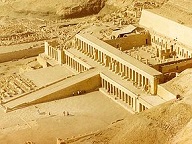
-1479 After her 2-y.-o. stepson Thutmose III ascended the throne last year, Thutmose II's chief wife (daughter of Thutmose I and Ahmes) Hatshepsut (Hatchepsut) ("Foremost of noble ladies") (d. -1458) (Hot Sheep Shit?) becomes king #5 of the Egyptian 18th Dynasty, becoming Egypt's first female pharaoh, ruling 21 years 9 mo. while bowing to male supremacists by wearing a man's pants and beard, while trying to get her daughter (only child) Nefrure knocked, er, set up as her heir; in year 9 of her reign she goes on an Expedition to Punt in five 70-ft.-long ships, each carrying 180 sailors and 30 rowers, buying frankincense and myrrh, returning with 31 live myrrh trees, which she transplants; she goes on to commission hundreds of building projects under chief architect Ineni (Anena) (previously used by Amenhotep I, Thutmose I, and Thutmose II), restoring the Temple of Mut in Luxor on the E bank of the Nile River, which had been destroyed by the Hyksos illegal immigrants; her other chief architect Senenmut ("mother's brother") designs her mortuary temple complex at Deir el-Bahri on the W bank of the Nile River near the entrance to the Valley of the Kings, incl. the Djeser-Djeseru ("sublime of the sublimes") Mortuary Temple (holy of holies) next to the mortuary temple of Amentuhotep II, dedicated to the sun god Amun; Senenmut's tomb in Thebes contains an astronomical ceiling containing the earliest known star map in Egypt.
-1476 Ekurduanna dies, and Melamkurkurra (d. -1469) becomes king of Sealand.

-1475 Thutmose III, the Napoleon of Egypt begins building the obelisk called Cleopatra's Needle (finished -1460).
-1473 Nur-Illi dies, and his son Ashur-Saduni becomes king of Ashur; he reigns 1 mo. and is overthrown by Ashur-Rabi I (d. -1450), son of Enlil-Nasir I.
-1470 Kashtiliash III dies, and Ulamburiash (d. -1465) becomes Kassite king of Babylon.
-1469 Melamkurkurra dies, and Ea-Gamil (d. -1460) becomes king of Sealand.
-1467 Gen. Joshua leads the confederation of Hebrew tribes known as the Israelites to decisively conquer the Canaanites ("Canaan" = land of purple) as described in the Book of Joshua (Jehoshua); the Promised Land is divided among the 12 tribes of Israel, with the 13th tribe of Levites getting no land, but in return getting to eat the food used in sacrifices? (Joshua 1-14); the Biblical Age of Jewish Judges begins; it really happened really much later (1126 B.C.E.?); too bad, the Jews fail to completely wipe out the Canaanites' idol worship from the Promised Land like Jehovah commanded, pissing him off and causing him to utter the soundbyte: "I led you up from Egypt and brought you to the land of which I swore to your fathers; and I said, 'I will never break My covenant with you. And you shall make no covenant with the inhabitants of this land; you shall tear down their altars.' But you have not obeyed My voice. Why have you done this? Therefore I also said, 'I will not drive them out before you; but they shall be thorns in your side, and their gods shall be a snare to you'" (Judges 2:1-3); it really never happened, and was made-up 600 years later for purposes of nat. propaganda as a coverup of the truth that the Jews never lived in Egypt and started out in Canaan themselves?
-1465 Shang Wo Jia dies, and Shang Zu Ding (d. -1433) becomes Shang king #14 of China. Ulamburiash dies, and Agum III (d. -1445) becomes king of Babylon.
-1460 Sealand is overthrown by Agum III of Babylon, and Ea-Gamil is killed; Babylon absorbs Sealand.

-1458 Hatshepsut dies, and Thutmose II's son (by minor wife Iset) Thutmose (Thutmosis) (Thutmoses) (Tuthmosis) (Thutmes) ("Thoth-born") III (d. -1425) (co-regent with his stepmother-aunt Hatshepsut since 1479) AKA the Napoleon of Egypt becomes king #6 of the Egyptian 18th Dynasty, expanding Egypt to its greatest size in 17 campaigns, conquering from Niya in N Syria to the Fourth Cataract of the Nile River in Nubia, and ruling almost 54 years; he builds the city of Napata on the W bank of the Nile River past the Fourth Cataract near modern-day Karima, Sudan (250 mi. N of Khartoum), becoming the seat of the "King's Son of Kush" (Egyptian viceroy), with a pop. of 100K; he erects many obelisks all over Egypt; too bad, he and his successor try to obliterate Hatshepsut's name from statues and monuments.
User;-1457 On Apr. 16 Thutmoses III (the Napoleon of Egypt, who never loses a battle) defeats the rebellious Caananites, led by the king of Kadesh at the Battle of Megiddo, the crossroads of the Middle East.

-1453 Egypt finishes conquering the Canaanite city-states of the Levant, establishing the Kinakhna Province.
-1452 Moses' elder brother and Jewish high priest Aaron (b. -1575) dies at age 123; Moses still has full vigor and alertness (Deut. 34:7).
-1451 Moses (b. -1571) dies on Mt. Nebo in Moab at age 120 after writing the books of Books of Moses incl. the Book of Genesis (Gr. "origin"), Book of Exodus, Book of Leviticus (Gr. "relating to the Levites"), Book of Numbers, Book of Deuteronomy, and Book of Job (Deut. 34: 5,7); Israel (Isis + Ra + El?) enters the Promised Land of Canaan under new leader Joshua (Jehoshua) (Hoshea) (b. -1542), son of Nun of the tribe of Ephraim (Ex. 17:19, Josh. 4:19), and conquers it in six years after making a wilderness census (Gen. ch. 46) and sending two spies from Shittim, who stay at the house of Rahab the City Wall Ho, who flip-flops to their side and hides them from the king of Jericho on her roof, letting them down by a rope through a window (Joshua ch. 2); Balaam ("he who swallows") of Pethor, son of Beor turns traitor and informs King Balak how to get the Israelites to curse themselves by enticing them with hos and unclean food sacrified to idols, and makes a prophecy about ships from Kittim (Cyprus? Italy? Macedonia?) afflicting Assyria, but eventually perishing (Num. 24:24).

-1450 The Egyptian empire reaches its maximum extent. Incursions of the warlike Kaska of the N Pontic coast threaten the Hittite kingdom. Ashur-Rabi I dies, and Ashur-Nadin-Ahhe I (d. -1450) becomes king of Ashur in Assyria on the Tigris River, which becomes a vassal of Mitanni. The early Upanishads begin to be composed? Inventions: About this time the Mycenaeans develop Linear B writing, an early form of Greek writing. Clay tablets with the 32 cuneiform letters of the extinct Semitic Ugaritic alphabet are found at Ugarit (Ras Shamra), Syria in 1929 C.E. Thutmose III dies.
-1445 Agum III dies, and Kadashman-Harbe I (d. -1440) becomes king of Babylon.
-1440 Kadashman-Harbe I dies, and Karaindash (d. -1430) becomes king of Babylon.
-1440 A confederation of Hebrew tribes known as the Israelites decisively conquer the Canaanites ("Canaan" = land of purple) as described in the Book of Joshua (Jehoshua), initiating the Biblical Age of Jewish Judges; really much later (-1126?); it really never happened, and was made-up 600 years later for purposes of nat. propaganda as a coverup of the truth that the Jews never lived in Egypt and started out in Canaan themselves?
-1437 Erichtonius dies, and his son Pandion I (d. -1397) becomes king of Athens.
-1433 Shang Zu Ding dies, and Shang Nan Geng (d. -1408) becomes Shang king #15 of China.
-1432 Death of Joshua (b. -1542) at age 110 (Josh. 24:29); the Israelites settle down for the next three cents. undisturbed.
-1430 Ashur-Nadin-Ahhe I is overthrown by his brother Enlil-Nasir II (d. -1424), who becomes king of Ashur and a vassal of Mitanni. Karaindash dies, and Kurigalzu I (d. -1380) becomes Kassite king of Babylon.

-1425 Thutmose III dies, and his son Amenhotep (Amenophis) ("Amun is Satisfied") II (Akheperure) (d. -1397) becomes king #7 of the Egyptian 18th Dynasty, ending hostilities with the Mitanni in Syria; the real Exodus Pharaoh?
-1424 Enlil-Nasir II dies, and his son Ashur-Nirari II (d. -1418) becomes king of Ashur and a vassal of Mitanni.
-1420 The domain of Mitanni king Saustatar (Saushatar) stretches from the Mediterranean to the N Zagros mountains in W Iran; the 5K Tablets of Nuzi (a province of Mitanni 10 mi. SW of modern Kirkuk, Iraq) are written by Hurrian scribes in Akkadian. The up-and-coming Iron Age Mycenaeans conquer the Bronze Age Minoans in Crete, ending the Second Palace Period (begun -1700), and taking over the Minoan trade routes, expanding by sea to the Cyclades, Rhodes, Sicily, and Italy, establishing trade with Egypt, Assyria, Babylonia, and the Hittites; they like to live in small city-kingdoms.
-1418 Ashur-Nirari II dies, and his son Ashur-Bel-Nisheshu (d. -1409) becomes king of Ashur and a vassal of Mitanni.
-1410 After the Israelites slip back into pagan worship, Jehovah sends the Syrians under Cushan-Rishathaim (Chousarsathaim) ("man of the twofold crime from Cush") to oppress Israel for eight years, until he sends Caleb's younger brother Othniel (d. -1362) (Heb. "Lion of God") to save them, becoming the first Jewish judge (Judges 3:8-10), keeping the peace for 40 years; the Age of the Biblical Patriarchs ends, and the Biblical Age of Jewish Judges begins - no Judge Judy?
-1409 Ashur-Bel-Nishesu dies, and his son Ashur-Rem-Nisheshu (d. -1401) becomes king of Ashur and a vassal of Mitanni.
-1408 Shang Nan Geng dies, and Shang Yang Jia (d. -1401) becomes Shang king #16 of China.
-1402 Judge Othniel of Israel is victorious over Syria; the land "had no disturbance" for the next 40 years.
-1401 Shang Yang Jia dies, and Shang Pan Kang (d. -1372) becomes Shang king #17 of China, moving the capital from Yan to Beimeng. Ashur-Rem-Nisheshu dies, and his son Ashur-Nadin-Ahhe II (d. -1392) becomes king of Ashur and a vassal of Mitanni.

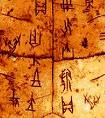

-1400 In this cent. Jerusalem (pop. 1500) is first mentioned as a city-state of Canaan, lesser in importance to Hazor and Megiddo, with territory stretching from Shechem to Gezer, ruled in the mid-1330s by Abdi Hepa (Abdi-Kheba) (Abdi-Hepat) (Abdi-Hebat) (Hurrian "servant of Hebat"), who claims to be put in charge by the Egyptian pharaoh, according to the 382 Akkadian cuneiform Amarna Letters (tablets) from Canaanite princes to Egyptian pharaohs Amenhotep III (-1386 to -1349) and his son Akhenaten (-1350 to -334), discovered in 1887 C.E. Kassite king Kurigalzu I of Babylonia conquers Elam, ending the Dynasty of Eparti (begun -1925). King Nestor of Pylos conquers Iklaina in SW Greece, eventually bringing 16 states under his rule, incl. Nichoria. About this time King Tudhaliya (Tudhaliyas) II revives or founds the Middle Hittite Kingdom (ends -1175), bringing the iron and chariot masters to their zenith while sharing the spotlight with Egypt, Assyria, and Babylon; the culture moves away from its Hattic roots and goes Hurrian, which is okay as long as they speak Hittite and stay PC? The Old Elamite Kingdom (begun -2230) ends. The Neolithic period in S India ends, and a transition to Megalithic begins. A mysterious kingdom is founded (until -600), which goes on to defeat King Midas's kingdom of Phrygia in battle. The Mittani city of Zakhiku on the Tigris River flourishes until an earthquake destroys it about -1350; discovered after the waters of the Mosul reservoir recede. In this cent. the Oracle of Delphi, dedicated to Apollo is founded on the S slope of Mt. Parnassus in the Phocis district of Greece at the alleged navel of the Earth, becoming their oldest and most influential religious sanctuary; the chief priestess is called Pythia, priestess of the serpent (draco) Python, who was slain by the god Apollo. After the Hittite raids against Egypt give the Phoenician city-states the chance to revolt, the Phoenician city of Tyre becomes a flourishing center of maritime trade; Phoenician traders reach as far W as West Africa and Britain? In this cent. Calah (modern-day Nimrud) replaces Assur (Ashur) as the capital city of Assyria. A drug trade in opium, hashish and other drugs flourishes in the Middle East; ships with hulls made with joined planks sail the Mediterranean. The Moabite culture E of the Dead Sea in modern-day W Jordan begins. The Nordic Germanics of the Baltic Sea region begin expanding into S Europe. Karakul sheep begin to be raised in C Asia. The Canaanite city of Tel Gezer on the Via Maris between Egypt, Syria, Anatolia, and Mesopotamia is founded. Inventions: The earliest known examples of Chinese writing are oracle bones used to predict the future. Hieroglyphic name-rings contain the earliest known reference to Israel? Music: The earliest known song is written in Syria, and deciphered at the U. of Calif. and played in 1974 C.E. by Richard L. Crocker on a reconstructed musical instrument. Art: Anon., Fowling in the Egyptian Marshes (fresco) (Tomb of Nebamun).
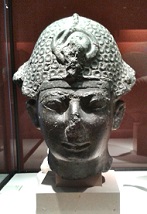
-1397 Amenhotep II dies, and his son (by Tiaa) Thutmose (Thutmosis) (Thutmosis) IV Menkheperure ("Established in forms is Ra") (d. -1388) usurps his older brother to become king #8 of the Egyptian 18th Dynasty, going on to restore the Sphinx in Giza and commission the Dream (Sphinx) Stele, describing how he had a dream that if he restored it he would become pharaoh, bolstering his legitimacy claims. Pandion I dies, and his son Erechtheus (d. -1347) becomes king #6 of Athens.
-1392 Ashur-Nadin-Ahhe II dies, and Eriba-Adad I (d. -1363), son of Ashur-Bel-Nisheshu becomes king of Assyria, gaining independence from Mitanni.
-1391 Possible date for the birth of Moses (d. -1271).
-1390 Shuttarna dies, and Tushratta (d. -1360) becomes king of the Mitanni.
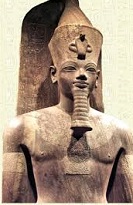

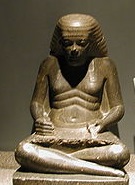
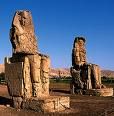
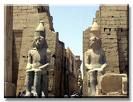

-1388 Thutmose IV dies after having a vision from the god Horus to clear the sand covering the Sphinx, and in June his son (by queen Mutemwiya) Amenhotep III (Amana-Hatpa) ("Amun is Satisfied") (the Magnificent) (Nebmaatre) (d. -1351) becomes king #9 of the Egyptian 18th Dynasty; in his 2nd year of rule he marries his wife (identified as the Elder Lady in the tomb of Amenhotep II in 2010) Queen Tiy (Tiye) (Tiyhi) (Ty) (Taia), who rules as virtually his equal (not that the high priest of Amon-Ra doesn't hold the supreme power now?); a statue of the goddess Ishtar is sent to him by the city of Nineveh by orders of the king of Mitanni; after hiring architect Amenhotep, son of Hapu, he builds the Colossi of Memnon and the Temple of Luxor; the Tomb of Nebamun in Thebes, discovered in 1820 features the Two Nude Girls of Thebes.
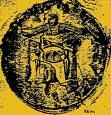
-1380 Suppiluliuma(s) I (d. -1340) (-1390 to -1354?) becomes king of the Hittites. Kurigalzu I dies, and Kadashman-Enlil I (d. -1359) becomes king of Babylon, writing a Letter to Amenhotep III.
-1378 Tutankhaten is born to Amenhotep III and Tiy?
-1375 On May 3 there is a total solar eclipse. Amenhotep III dies? Egyptian courtier couple Yuya and Tjuiu, parents of Queen Tiy and great-grandparents of Tutankhamun die; their tomb is discovered in 2013, and is found complete with mummified rib meat.
-1374 Queen Tiy visits Amarna, where a pageant of foreign tribute is held?
-1372 Shang Pan Kang dies, and Shang Xiao Xing (d. -1352) becomes Shang king #18 of China.
-1368 The Hittites raid Arzawa (around Ephesus).
-1363 Eriba-Adad I dies, and his son Ashur-Uballit I (d. -1328) becomes king of Assyria; he revolts against the Mitanni under Shuttarna II, conquers them, reclaims Nineveh, and founds the Assyrian Empire, styling himself "king of the Universe", and writing the Amarna Letters to the king of Egypt - make me a shedu?
-1362 After Israeli judge #1 Othniel (heb. "Lion of God") dies, the Israelites fall back into idolatry, and king Eglon of Moab, along with the Ammonites and Amalekites capture Jericho for 18 years.
-1360 Mitanni king Tushratta is assassinated; king Suppilulima I of the Hittites conquers the Mitanni. Tutankhamen dies and is buried at Thebes, and elder Lord Ay becomes pharaoh?
-1359 Kadashman-Enlil I dies, and Burnaburiash II (d. -1333) becomes king of Babylon; he calls himself "brother of the pharaoh", and is friends with Akhenaten.
-1356 An outbreak of hatred against Atenism causes Horemheb to wipe the religion out of Egypt?
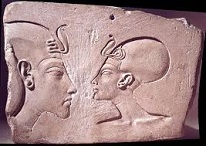

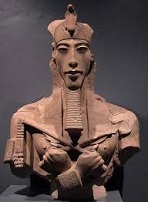

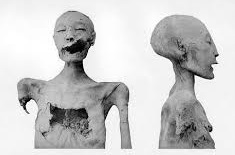
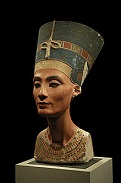
Amenhotep III dies (from complications caused by abscesses in his teeth?), and his son (co-regent since -1353) Amenhotep (Amenophis) ("Amun is satisfied") IV (-1384 to -1334) (later Akhenaten) becomes king #10 of the 18th Egyptian Dynasty at Thebes; his sister-wife is luscious eye liner-wearing ruby-red-lipped "Lady of the Two Lands" Nefertiti (Ankhkheperure Neferneferuaten) (-1370 to -1330) ("Nefer" = beautiful, "Titi" = er, arrived), daughter of the equally luscious Queen Tiy; they have six daughters, incl. the three "senior princesses" Meritaten (Merytaten) (Meryetaten) (-1350 to ?) ("beloved of Aten"), who marries her brother Smenkhkare, Meketaten (-1349 to ?) ("protected by Aten"), and Ankhesenpaaten (Ankhesenamen) (-1348 to -1323), who marries King Tutankhamun, and whose statue is discovered in the 1930s by English archeologist Mary Chubb (1903-2003); Akhenaten, Nefertiti, and Tut have elongated skulls, spawning theories that they are part alien; in 1955 Irish archeologist Sean P. O'Riordan (1905-57) of Trinity College, Dublin discovers a necklace of Egyptian-style fired faience beads in the Mount of Hostages in Tara, Ireland, along with a golden collar similar to Tutankhamun's, proving intercourse with the Celts? Igi-Halki wins Elam's independence from Babylonia, founding the Middle Elamite Kingdom (ends -1110). A clay tablet bearing the earliest known example of writing in Europe is made in Iklaina in SW Greece; it is in Linear B.
-1349 Shang Ziao Sing dies, and Shang Xiao Yi (d. -1324) becomes Shang king #19 of China.
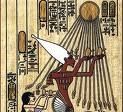


-1347 Hippo-hipped, sagging-paunched, tiny-chested, pencil-necked (first to have realistic statues of himself made without fake handsome face, broad shoulders, narrow hips and long legs?) Amenhotep IV decides to hold a Sed festival in his 3rd reignal year (instead of the usual 30th reignal year as is customary), and next year dumps Amen (Amon) for the Sun disk Aten (Aton) (pissing-off the rich priests of Amon, who have generations of tribute in their treasury?), changes his name to Akhenaten (Akhenaton) (Akhnaten) (Ikhnaton) (Khuenaten) ("effective/beneficial for Aten") (-1384 to -1334) (-1362 to -1336?) ("it is well with Aten", "servant of Aten") (Beautiful Child of the Sun), becoming the first monotheist in history, establishing the monotheistic Sun-disk Religion of Aten in Egypt (worshiping the power behind the Sun, not the physical Sun?), and ordering the building of a new city 200 mi. N of Thebes at Aketaten ("horizon of Aten"), now known as El-Amarna (Amarna) (on the E bank of the Nile halfway between Cairo and Luxor) (pop. 20K), which is hastily built in two years with shoddy materials and untrained workers using limestone blocks, complete with a new temple that breaks the old habit of worshipping in dark sanctuaries, with plenty of sunlight streaming in, which the pop. never gets used to; meanwhile maybe-it's-Maybelline royal sculptor Thutmose (Thutmosis) (Dhutmose) at Amarna takes plaster casts from living faces, incl. Akhenaten, and breaks the old taboo by showing his real figure, complete with fat hips and effeminite chest, playing with children; Akhenaten becomes the first pharaoh to make his servants bow and scrape, building resentment which comes back at him in only 16 years; the title "pharaoh" (great house) is first used in an address to Akhenaten by a foreign ruler; was Aten really the 10-tailed Great Comet of 1486 B.C.E.? Erechtheus dies, and his son Cecrops II (d. -1307) becomes king #7 of Athens. King Tut receives the desperate Amarna Letters from Canaan, begging for assistance against the pesky Apiru (Hapiru) (Habiru) ("stateless", "dusty, dirty") Asiatics threatening to take over the land; the origin of the word "Hebrew"?
-1345 On Jan. 2 in the 5th year of his reign, Amenhotep IV officially changes his name to Akhenaten.
-1344 Israeli judge #2 Ehud ben-Gera (son of Gera, of the tribe of Benjamin) is victorious over king Eglon, killing with a 2-edged cubit-long dagger, then killing 10K Moabites, after which Benjamin enjoys rest for 80 years (Judges ch. 3); meanwhile the Philistines oppress SW Israel (Judges 5:6).

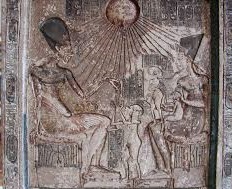

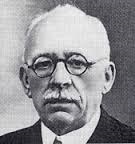

-1343 Akhenaten officially moves the Egyptian capital from Thebes to Amarna, although the new city isn't finished for two more years, during which time the famous polychrome painted limestone (or limestone core covered with thin plaster) Bust of Queen Nefertiti is sculpted by Thutmose, and discovered in his workshop in Tell el-Amarna by German archeologists led by Ludwig Borchardt (1863-1938) in 1912, along with a Stela of Akhenaten and His Family; too bad, on Jan. 20, 2013 French Egyptologist Gustave Lefebvre (1879-1957) chooses the stela to go to the Egyptian govt., allowing the bust to go back to Germany, ending up in the Egyptian Museum in Berlin, after which the stela is suspected of being a fake.

-1340 King Suppilulima I of the Hittites dies, and is succeeded by Mursilis II (d. -1295), who goes on to conquer the Arzawa Kingdom.
-1339 Alt. date for end of the reign of King Tut (begun -1347).
-1338 On Nov. 21 Meketaten, daughter of Nefertiti is mentioned for the last time; meanwhile Nefertiti is elevated to co-regent?

-1335 Nefertiti and four of her six daughters mysteriously disappear, and Akhenaten's brother Smenkhare becomes co-regent of Egypt with Akhenaten, with his wife (half-sister?) (half-niece?) Meritaten (Merytaten) (Meryetaten) ("Beloved of Aten") (-1350 to ?) as "great royal wife"; is Smenkhare really Nefertiti in disguise, and Meritaten's title mean that she is another wife of Akhenaten, or merely assumed her mother's ceremonial duties?
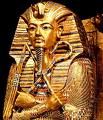
-1334 The first known plague hits Egypt; Akhenaten (b. -1384) dies, leaving the most statues of himself to survive to modern times (250), even though his likeness is erased from many monuments by his hate-filled people; his sickly 20-y.-o. brother Smenkhkare (Smenkare) (Smenkhkara) ("Living are the forms of Ra") (Ankhkheperure Smenkhare Djeser Kheperu) (-1353 to -1334) becomes king #11 of the 18th Egyptian Dynasty at Amarna, but dies in Thebes within a year (of plague?). Burnaburiash II dies, and his son Karahardash becomes king of Babylon, but he is assassinated because of his Assyrian ancestry (grandson of Ashur-Uballit I), and is succeeded by Nazibugash (Suzigash).

-1333 8-y.-o. Tutankhaten ("living image of Aten") (Nebkheprure) (King Tut) (-1341 to -1323) (son of Amenhotep III and Tiy), who married his niece Ankhesenpaaten (daughter of Nefertiti and Akhenaten) to gain the succession becomes king #12 of the 18th Egyptian Dynasty at Amarna, staying with the religion of Atenism until Nefertiti dies (but obviously wanting to dump it since the plague sends him a divine message that Aten sucks?); being the son of a brother-sister, he suffers from Kohler's Disease, which gives him feminine hips, pronounced overbite, and a progressive loss of bones in his foot, causing lifetime excruciating pain; he comes to power only after two of his sisters jointly hold the throne?
-1332 Naziburgash is overthrown by Ashur-Ubbalit I of Assyria, and replaced by Kurigalzu II (d. -1308), son of Burnaburiash II; he turns on Assyria and attacks.
-1330 Nefertiti (b. -1370) dies, and Tutankhaten renounces red hot Aten, dropping him like a hot potato and changing changing his name to Tutankhamen ("Living image of Amun"), and his wife's to Ankhesenamen, then returning to good ole Thebes.
-1328 Ashur-Uballit I dies, and his son Enlil-Nirari (d. -1318) becomes king of Assyria, sponsoring the Chronicle of Enlil-Nirari.
-1324 Shang Xiao Yi dies, and Shang Wu Ding (d. -1265) becomes Shang king #20 of China. Canaanite king Jabin of Hazor begins oppressing Israel for the next 20 years (Judges 5:6-11).

-1323 King Tut (b. -1341) dies at age 19 of a leg fracture and malaria, and is buried in the Valley of the Kings in Thebes; his tomb is found in 1922 C.E. by Howard Carter (1874-1239) of England; in 2005 Maria Rosa Guasch-Jane et al. of the U. of Barcelona find that he drinks red wine from traces found in his tomb; in 2013 it is discovered that after burial his mummified body spontaneously combusted; in 2010 DNA tests indicate that Tut is of W European (as in Celtic?) origin; 70-y.-o. Lord Ay (Kheperkheperure) ("Everlasting are the manifestations of Ra") (d. -1319) (former servant of Akhenaten and Nefertiti) becomes king #13 of the 18th Egyptian Dynasty at Thebes.
-1320 Miletus in W Asia Minor supports an anti-Hittite rebellion of King Uhha-Ziti of nearby Arzawa, with Mursili ordering his gens. Mala-Ziti and Gulla to raid Millawanda, burning parts of it.

-1319 King Ay dies, and despite having named his son Nakhtmin as his successor, army CIC Gen. Horemheb (Horemhab) (Haremhab) ("Horus is in jubilation") (Djeserkheperure) (d. -1292) becomes king #14 (last) of the 18th Egyptian Dynasty at Thebes; four years after Tutankhamen dies, an outbreak of hatred against Atenism in Egypt causes Horemheb to order all traces of Atenism wiped out, Amarna destroyed, the great temple pulled down and covered with cement, the name and likeness of Akhenaten removed from all monuments, and Akhenaten's mummified body burned.
-1318 Enlil-Nirari dies, and his son Arik-Den-Ili (d. -1308) becomes king of Assyria, sponsoring the Chronicle of Arik-den-Ili.
A 15m-long ship loaded with misc. treasures from Cyprus, Palestine, or Syria is wrecked at Uluburun off the SW coast of Turkey; after being found by a sponge diver in 1982, it is excavated by Am. underwater archeologist George Bass (1932-) et al.

-1308 Kurigalzu II dies, and Nazimaruttash (d. -1282) becomes king of Babylon, going on to war with Assyria, and later erecting the Nazimaruttash Kudurru Stone, depicting Kudurru, goddess of Medicine. Arik-Dan-Ili dies, and his brother Adad-Nirari I (d. -1275) becomes king of Assyria (-1295 to -1263?).
-1307 Cecrops II dies, and his nephew (son of Erechtheus) Pandion II (d. -1282) becomes king #7 of Athens.-1304 Judge #3 Shamgar saves Israel from the Philistines, and judge #4 Deborah (Heb. "bee") (only female judge) and judge #5 Gen. Barak of Israel are victorious over the Canaanite armies of Sisera; Israel has no further disturbances for 40 years (Judges chs. 4-5).

-1300 The Urartians (Khaldians) (related to the Hurrians) move into the Lake Van plateau of Armenia ("ar" + "meni" = men of the mountains) about this time, founding Urartu (Heb. "Ararat"), located between Lake Van (SW), Lake Urmia (SE), Lake Sevan (NE) and Lake Cildir (NW), with Mt. Massis (Ararat) in the center, going on to become known for metalworking and adopting the Assyrian cuneiform script. In this cent. the kingdom of Mira flourishes, with capital at Abasa (Ephesus); it is conquered by the Hittites by the beginning of the next cent., the remnants becoming the kingdom of Lydia? In this cent. the Midianites set up shop in the Sinai Peninsula and E of the Dead Sea. The Bronze Age city of Bamboula near modern-day Episkopi and Limassol near the Troodos Mts. in SW Cyprus flourishes (until -1000). In this cent. the Celts of Britain have contact with Egypt. Towards the end of this cent. climate change contributes to the collapse of E Mediterranean civilizations in Greece, Syria et al.? In this cent. the town of Doliche (modern-day Gaziantep), in S Asia Minor 30 mi. N of the Syria-Lebanon border in the Sajur River Valley (tributary of the Euphrates River) (3.5K ft. alt.) is founded by the Hittites, later becoming a center of Baal (Zeus Colichenus) worship; not to be confused with the town of Doliche located at the foot of Mount Olympus. In this cent. the city-kingdom of Citium (Kition) on the S coast of Cyprus is founded. About this time Troy VI is destroyed by an earthquake, and replaced by Troy VIIa, the city of the Trojan War. About this time the Treasury of Minyas at Orchomenos is built, actually a large beehive tomb; meanwhile Mycenaean trade with Egypt and Syria begins a decline. About this time the volcanic island of Zebirget (Zagbargad) (Topazios) in the Red Sea 45 mi. from Aswan starts to be mined for peridot (topaz); the ancient mines are rediscovered in 1900 C.E., mined out. Dingoes arrive in Australia about this time? The first mention of alfalfa (Arab. "al fac facah" = father of all foods) in Turkish writings. The first depiction of the Huachuma cactus, which becomes one of the four sacred plants of Peru; later named after St. Peter because he allegedly used the cactus' powers to uncover the secret hiding place of the keys. Divers in the Persian Gulf use goggles made of polished clear tortoise shell. In this cent. musical notation is invented in Ugarit, Syria.
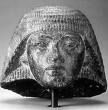

-1292 King Horemheb dies leaving no heir, and the aged high priest of Amon, Rameses (Ramses) (Ramesses) I (Menpehtyre) (-1280 to -1290), born a commoner from a military family (son of military cmdr. Seti) becomes king #1 of the Egyptian Nineteenth (19th) Dynasty (ends -1187), becoming the top Egyptian dynasty (it's all downhill after that), which is big on the god Seth (storm god, who guards Ra as he journeys across the sky, and killed and cut up his brother Osiris); he rules less than two years, waging war in Nubia and facing attacks by the Libyan Berber Meshwesh (Ma) from the desert, while beginning the pillared Hall of Karnak; all royal mummies of the 19th Dynasty have their arms crossed high on their chest, which is not done again until Roman times (1 C.E.); in 1860 Dr. James Douglas of Montreal, Canada, buys his mummy from tomb robber Mustafa Agha Ayat and takes it to the Niagara Falls Museum in Ont., Canada (founded 1827), where it is discovered in 1966 by German amateur Meinhard Hoffmann, who at first believes it is Nefertiti until it is discovered to be male; after purchase by Emory U., Egyptologist Zahi Hawass (1947-) certifies it in Apr. 2003, and it is put on display in the Cairo Museum.


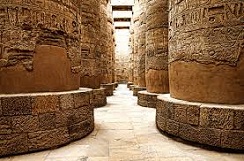
-1290 Rameses I dies, and his son (by Sitre) Seti I (Sethos) ("Of Seth") (Menmaatre) ("Established is the justice of Ra") (Merenptah ("Beloved of Ptah") (d. -1279) becomes king #2 of the Egyptian 19th Dynasty, conducting two campaigns in Syria to stop the advance of the Hittites and reestablish the empire of Thutmose III in Palestine and Syria; he builds the Great Temple of Osiris in Abydos to restore worship of Egypt's traditional gods, with a depiction of Isis' constellation Orion; he also decorates the walls of the Great Hypostyle Hall in Karnak, which is completed by his son Rameses II.
-1282 Nazimaruttash dies, and Kadashman-Turgu (d. -1264) becomes king of Babylon. Pandion II dies in exile after a coup by the sons of Metion, and his son Aegeus (d. -1234) defeats them and becomes king #9 of Athens.

-1280 Traditional date that Moses leads the enslaved Israelites out of Goshen in Egypt - and drowns Pharaoh Rameses II, who goes on ruling for decades?

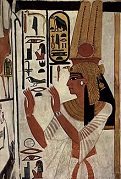
-1279 Seti I dies, and his 5'8" (tall) E Medterranean-looking (long thin face, beaked nose, strong jaw) reddish-blond teenie son Rameses (Ramesses) (Ramses) II (the Great) (-1303 to -1213) becomes king #3 of the Egyptian 19th Dynasty, the #1 pharaoh in Egyptian history; he marries glam babe Nefertari ("Beautiful companion") Meritmut ("Beloved of Mut"), and with her and his other wives Isetnofret (Isitnofret) ("Beautiful Isis") et al. he fathers 100+ children; he puts his face on the red granite Sphinx in the Temple of Ptah in Memphis, which survives to modern times sans face; he builds up his N capital of Pi-Ramesses (Per-Rameses) ("House of Rameses, Great in Victory") in Qantir near Avaris, the former Hyksos capital; he is addicted to tobacco?
-1278 Rameses II decisively defeats the Sherden (Shardana) (Sherdanu) sea pirates (known for their horned helmets) along the Mediterranean coast.
-1276 Rameses II recaptures the district of Phoenicia (Canaan) from the Hittites as far E as Berytus (Beirut), and leaves a memorial stele on the bank of the Nahr al-Kalb (Dog) River N of Beirut.
-1275 Adad-Nirari I dies, and next year Shalmaneser (Shalmeneser) I (Shulanu-Asharedu) (d. -1245) becomes king of Assyria, setting up his royal residence in Nineveh while moving the capital from Assur to Calah 18 mi. S of Ninevah, then immediately mopping up what's left of the Mitanni, conquering eight countries in the NW and destroying the fortress of Arinnu, bringing its dust back with him; Urartu is divided into a number of small kingdoms and ends up as an Assyrian tributary.
-1274 In the 5th year of his reign Rameses (Ramses) II and his 16K infantry and 2K heavy chariots defeats the Hittites and their 15K-40K infantry and 2.5K-3.7K heavy chariots under king (-1295 to -1272) Muwatallish (Mutallu) (d. -1272) (son of Mursili II) at the Battle of Kadesh (Quadesh) on the banks of the Orontes River in N Syria, becoming the earliest battle in human history for which military tactics are known; the Egyptian army uses highly mobile archers on their chariots, which win the day (actually a draw?); too bad, Rameses II is cut off from the main body of his troops and narrowly escapes, causing Egyptian scribe Pentaur to write The Poem of Pentaur in his praise; Rameses never captures the city of Kadesh, and the war drags on for years, ending with a peace treaty; a faience tile from the mortuary temple of Rameses III (not II) shows a moustachioed Hittite captive wearing a cool short kilt under a bright (Libyan?) mantle. Midian oppresses Israel for the next seven years.
-1270 Coming up on The View? In his 2nd year Shalmaneser I defeats King Shattuara (Sattuara) of Hanilgalbat (rebellious vassal of Adad-Nirari I), along with his Hittite and Ahlamu allies, blinds 14.4K POWs in one eye then deports them, and incorporates what's left of the Mittani Kingdom as an Assyrian province. In the 21st year of his reign Rameses II meets a Hittite army under new king Hattusili ("from Hattusa") III (d. -1237) near Kadesh, and after the battle concludes a treaty that establishes Egyptian control over Canaan (Phoenicia) as far E as Byblos (Jebel), plus a strip of territory to the N of Palestine; Rameses marries Hattusili's daughter, and the two empires stay on friendly terms for a cent., the remainder of Rameses' reign being peaceful and taken up with construction of many big bldgs., incl. the Rameseum (mortuary temple) in Thebes and the rock-hewn Temples of Abu-Simbel in Nubia. About this time the first bronze Naue Type II swords (grip-tongue or Griffzungenschwert) (good for slashing) are developed in N Italy or Austria-Hungary, spreading to the Aegean and Ugarit (N Syria) by -1200; named after German archeologist Julius Naue (1835-1907).
Shang Wu Ding dies, and Shang Zu Geng (d. -1258) becomes Shang king #21 of China.
-1264 Kadashman-Turgu dies, and his son Kadashman-Enlil II (d. -1255) becomes king of Babylon.
-1258 Shang Zu Geng dies, and Shang Zu Jia (d. -1235) becomes Shang king #22 of China.
-1257 Israeli judge #6 Gideon (d. -1217) (Heb. "slasher", "warrior") of the tribe of Manasseh and the town of Ophrah in Israel W of the Jordan River tears down his family altar of Baal (Judges ch. 6), has miraculous experiences such as keeping his fleece dry in a wet room, and, after sending 22K of 32K in his army home to show it's really Jehovah's army, then selecting the 300 of them that lap water like dogs (Judges ch. 7), through a ruse he routs the Midianites, after which Israel has no further disburbances during the remaining 40 years of his life, and he fathers 70 sons by many wives while refusing to be made king, although he does mess up by accepting the gold bling bling captured from the Midianites, with which he makes an ephod to Jehovah, which causes people to have "immoral intercourse" (Judges 8:22-27).
-1255 Kadashman-Enlil II dies, and Kudur-Enlil (d. -1246) becomes king of Babylon.
-1252 The Sea People known as the Philistines partially destroy the Phoenician city of Sidon, causing the Phoenicians to flee to the city of Tyre, which is also destroyed but is refounded; the Philistines build the adorable door-stop city of Dor on the foundations of Sidon, and set up the Sidonian State (ends -627), dominating Phoenicia by -1000.




-1250 The Achaeans become the ruling class in Greece. Architecture: About this time the citadel at Mycenae is enlarged with a 23-ft.-thick wall of Cyclopean blocks, incl. the Gate of the Lions (Lion Gate). Untash-napir-risha of Elam founds the new triple-walled capital of Dur-Untash (Chogha-Zanbil) in Khuzestan 30 mi. S of Susa, with a large ziggurat that becomes the only one to survive to modern times. About this time the large beehive tomb Treasury of Atreus in Mycenae is built.
-1246 Kudur-Enlil dies, and Shagarakti-Shuriash (d. -1233) becomes king of Babylon.
-1245 Shalmaneser I dies after conquering everything from Taidu to Irridu, plus all of Mount Kashiar to Eluhat, plus the fortresses of Sudu, and Harranu to Carchemish on the Euphrates, and building palaces in Assur and Nineveh, restoring the world temple in Assur, and founding the city of Nimrod, and in -1243 his son Tukulti-Ninurta I ("My trust is in Ninurta") (d. -1207) becomes king of Assyria (until -1207), sponsoring the Tukulti-Ninurta Epic.
-1244 The Cairo Calendar (Calendar of Lucky and Unlucky Days (ends -1163) begins to be kept, containing daily observations of the Algol triple star system, becoming the earliest historical record of a star's brightness.
-1240 The Assyrians sack Babylon.
-1235 Shang Zu Jia dies, and Shang Bing Xing (d. -1219) becomes Shang king #23 of China.

-1234 Aegeus dies after believing his son killed in Crete and drowning himself (causing the Aegean Sea to be named after him), and his son Theseus (d. -1204) becomes king #10 of Athens after defeating the mean Minotaur (Gr. "bull of Minos") on Crete using a clew (thread) to find his way out of its labyrinth, and disgracing himself by capturing the queen of the Amazons; he goes on to bring Democracy (Gr. demos + kratein = "the people" + "to rule") to Athens, which becomes "the Cradle of Western Civilization".
-1233 - Done Momming? I'll Show Ya? The Egyptian Eggplant Trick Year?-1233 Shagarakti-Shuriash dies, and his son Kashtiliash IV (d. -1225) becomes king of Babylon, going on to wage war against Assyria, which backfires bigtime. At the climax of the year's largest religious festival in Thebes, 70-y.-o. Pharaoh (since -1279) Rameses (Ramses) II (the Great) (-1303 to -1213) stands on the pyramid and lifts his short white robe to reveal to 300K adoring Egyptians an erect thebesing penis, causing them to cheer after seeing that their pharaoh's staff is mighty and that Egypt will prosper; he dies after fathering 100+ (1K+?) children, causing everybody in Egypt to end up looking like him?; according to Norman Mailer, nothing like this happens again until the days of U.S. Pres. Bill Clinton - a lost invention of Egyptian Viagra, or the eggplant trick of John Barth's "Sot Weed Factor"?
-1230 About this time most of the main Mycenaean cities except Athens and Mycenae are destroyed by invaders, probably Sea People, causing exports of pottery to Egypt and Syria to cease.
-1225 Tukulti-Ninurta I of Assyria captures Babylon, kills Kashtiliash IV and installs his puppet Enlil-Nadin-Shumi to rule in his name.
-1224 Kadashman-Harbe II becomes Assyrian gov. of Babylon (until -1223).
-1222 Adad-Shuma-Iddina becomes Assyrian gov. of Babylon (until -1217).
-1220 Traditional date of the Biblical Exodus - was it Merneptah who drowned in the Red Sea after he killed their seed?
-1219 Shang Bing Xing dies, and Shang Geng Ding (d. -1198) becomes Shang king #24 of China.
-1217 The Babylonians revolt against Assyria and reestablish native rule under Adad-Shuma-Usur (d. -1187), son of Kashtiliash IV. Judge Gideon dies, and his son (by a slave concubine from Shechem) Abimelech (Abimelek) (Avimelech) (Heb. "Father of a king") appoints himself Israeli judge #7 and kills all of Gideon's 70 sons except Jotham, who hides; Abimelech rules Israel for three years (Judges 8:28-9:5).
-1214 Tola (Heb. "worm") of the tribe of Issachar becomes Israeli judge #8, judging Israel for the next 23 years.


-1213 Nicotine-loving Rameses II the Great at age 96, and in late July his 14th (13th?) old fart son (by 2nd wife Isetnofret) Merneptah (Merenptah) (d. -1203) becomes king #4 of the Egyptian 19th Dynasty (until May 2, 1203), going on to battle the Sea People, Libyans, and Israelites, moving the capital ffrom Pi-Ramesses to Memphis, where he constructs his royal palace next to the Temple of Ptah, ordering the Merneptah Stele (Stela) erected (in -1208?), the last lines of which read: "Canaan is plundered with every hardship. Ashkelon is taken, Gezer captured, Yanoam reduced to nothing. The people of Israel (Isrir) are laid waste, their seed is no more"; the earliest known non-Biblical reference to Israel, and the only known mention of Israel in Egyptian monuments; Rameses II's mummy is interred at Biban al-Muluk, then put in a secret shaft at Deir-el-Bahri ("the northern monastery"), where it is found in 1881 C.E.
-1212 Alt. date for the beginning of the reign of Merneptah (ends -1202) (Jehovah's Witnesses).
-1207 Tukulti-Ninurta I is murdered by his son Ashur-Nadin-Apli ("Ashur has given a son") (d. -1204).
-1204 After the Dioscuri (twin sons of Leda, and brothers of Helen of Troy and Clytemnestra) set him up, Theseus travels to the underworld, allowing Menestheus (d. -1181) (son of Orneus, son of Erechteus) to become king #11 of Athens, going on to become a jilted suitor of Helen and fight in the Trojan War with "fifty black ships" and prove a coward, although he is one of the warriors in the Trojan Horse.
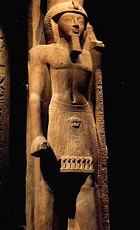
-1203 Merneptah dies, and his son (by Isetnofret II) Seti (Sethos) ("Of Set") II (Userkheperure Setepenre) ("Powerful are the manifestations of Ra, the chosen one of Ra") (d. -1197) becomes king #5 of the Egyptian 19th Dynasty, going on to appoint Syrian official Bay (Ramesse Khamenteru) (-1192) as high chancellor, who becomes the first non-royal to build his tomb in the Valley of the Kings, along with Pharaoh Merenptah Siptah and Pharaoh Twosret. Ashur-Nadin-Apli is overthrown by his son (Tukulti-Ninurta I's grandson) Ashur-Nirari (Ashur-Nerari) ("Assur is my help") III (d. -198), who becomes king of Assyria.
-1202 Alt. date for the end of the reign of Merneptah (begun -1212).
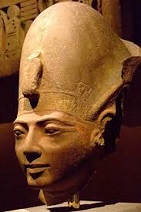
-1201 Amenmesse (Amenmesses) (Amenmose) (Menmire Setepenre) (d. -1198), son of Merneptah and Takhat (Rameses II?) usurps the throne from Seti II, making a mess of his monuments and erasing his name until Seti II defeats him in -1198 and returns triumphantly to Thebes, cleaning up his gawd-awful mess.
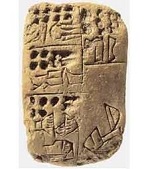
-1200 About 1200-1150 B.C.E. the Bronze Age Collapse, caused by severe drought and cold in the Fertile Crescent, driving peoples S, incl. the Sea People (from the Aegean?), who bring the opium poppy, cumin, and the sycamore tree; the Near East, Asia Minor, Aegean region, E Mediterranean region, Balkans and Caucasus plunge into a Dark Ages via sudden violent attacks, with almost every important city in the E Mediterranean region destroyed, many permanently. The Bronze Age Collapse begins (ends -1100), . The Late Bronze Period of Archaeology begins, and the Early Iron (Iron I) Period of Archeology begins (ends -1000). The Hittite Kingdom in Asia Minor under King Suppiluliuma II (son of Tudhaliya IV) is overrun and destroyed by the Sea People, who destroy the rich city of Alalakh near Ugarit and Aleppo; some Hittite mini-states survive along the Syro-Anatolian border until absorption by Assyria. The Middle Elamite Kingdom (founded -1350) ends with Kiten-Hutran, and Hullutush-Inshushinak I (d. -1185) founds the Dynasty of Hullutush-Inshushinak (ends -1110). About this time (same time as Homer's "Iliad") the Pelasgians ("sea men"?) live in Greece, Asia Minor, and the Aegean Islands, with their name getting used by some ancient writers to refer to people that were either the ancestors of the Greeks or preceded them in Greece, "a hold-all term for any ancient, primitive and presumably indigenous people in the Greek world" (Apolloios Rhodios and Peter Green). In this cent. the kingdom of Phrygia in Asia Minor is founded by Indo-European immigrants from the S Balkans (Thrace), occupying all of Asia Minor from the Sea of Marmara to the Assyrian border; they are divided into the Mushki (Meschech) and Tabal (Tubal) tribal groups; they eventually migrate to Anatolia under the protection of their ally Troy; some of them move to Colossae, and are known as Colossians; the tribal group known as the Thracians emerge in the region between the Aegean Sea and the Carpathian Mts., the Black Sea and the Morava and Vardar Rivers; Thracians from SE Europe found Phrygia in Asia Minor (Anatolia), former home of the Hittites, and unite it, establishing a capital at Gordion (Gordium), near modern-day Ankara (ends -547), worshipping the deities Cybele (Ma, the Great Mother, Mother of the Gods) and Attis, who died and was resurrected; Neo-Hittite kingdoms begin a period of cultural flourishing; Gordion is excavated in 1955; according to Greek legend it is the home of King Midas (Mita of Mushku?); a royal burial is discovered in 1955, but contains no gold, even though unplundered; Phrygian inscriptions remain undeciphered (until ?). In this cent. the kingdom of Lydia in W Anatolia (Turkey) is founded by the Heraclid Dynasty, with capital at Sardes. About this time the confederation of city-states known as the Philistines(Philistia) occupy the S coast of Canaan in Palestine (until -604). The earliest known human with metastatic cancer is buried in a tomb in Sudan. In this cent. the Cimmerians (who live in a land of eternal night, according to Homer) (origin of the name Crimea) occupy the S Russian steppes, with their eye on Phrygia. In this cent. the Tiwanaku (Tahuanaco) ("stone in the center"?) culture is founded near Lake Titicaca in W Bolivia, becoming the precursors of the Incas (ends 1000 C.E.). About this time Chavin de Huantar in Peru 160 mi. N of modern-day Lima is built by the pre-Incan Chavin culture until about -400. About this time the Achaean citadels in Greece fall, and their civilization crumbles. About this time Tapputi (Tapputi-Belatekallim) lives in Babylonian Mesopotamia, distilling and filtering perfumes and becoming the world's first known chemist. In this cent. the port of Lisbon on the Tagus River in Lusitania ("land of the raven people") (modern-day Portugal) (orginally called Allis Ubbo, meaning "safe harbor" in Phoenician, later corrupted to Ulisaypo or Olissipo from the belief that Ulysses of Trojan War fame founded it) is founded by Celts and an aboriginal pop., who later form the Cempsi tribe, known for convex-head arched-neck Lusitanian (Lusitano) horses, the best for chariot racing. By this time the Celts in Britain consist of two stocks, the Goidels (Gaels) in N Ireland and the Scottish highlands, and the Cimbri (Cymbri) (Cymri) (Combroges) ("co-landers") (Welsh) and Britons (Brythons) (kin to the Belgae in Gaul) in Wales and the lowlands; the Cimbri may have started in Jutland, giving their name to Cumberland, and might have been Germanic; their religion is dominated by the Druids; gold is mined in Ulster, Ireland. Burial pits near Guanghan in China (Sichuan province) contain bronze vessels and elephant tusks. Horses are buried in Mongolia in the E Eurasian steppe. By this cent. the Urnfield Culture in C Europe is based on an aristocratic class, farmer class, and serf class, and cremates their dead, burying them in urns in flat graves. Dried grapes dating to this time are found in Sardinia, becoming the oldest to survive to modern times. Mahram Bilqis (Temple of the Moon God) in 3 mi. from Ma'rib in N Yemen is built by the Queen of Sheba, and used until about 550 C.E.; unearthed in 1951 by Am. archeologist Wendell Phillips (1921-75). A series of temples is built by the Olmecs in San Lorenzo, Mexico. The Tablet of the Curse, found near Mount Ebal is the oldest known Hebrew text mentioning the name of God. About this time Beirut-born Phoenician historian Sanchoniatho (Sanchuniathon) (Sancuniates) allegedly thrives, leaving three books, which are partially preserved by Philo of Byblos and Eusebius of Caesarea. Egyptian beer brewer Khonso Em Heb, chief beer maker of the gods dies a big man in Thebes. About this time sheep-goat's-milk cheese is put in the tomb of high-ranking Egyptian official Ptahmes, becoming the oldest known solid cheese. Inventions: About this time the Chinese independently invent writing.
-1199 The city of Ephesus (Ephesos) on Mt. Pion in SW Ionia on the coast of Asia Minor on the S side of the Cayster River is allegedly founded by Androclus (Androcles), son of Athenian King Codrus (Strabo, 14.1.3) with the aid of Ionian colonists, and develops into the largest commercial center in Asia; the worship of moon goddess Artemis (Cybele) (Rhea) (Ma) (Diana) (Cynthia, born in Mt. Cynthos), "Great Mother of the Gods" (born hermaphroditic, but turned female by the Olympian gods) is already established when the Greeks move in?
-1198 Shang Geng Ding dies, and Shang Wu Yi (d. -1194) becomes Shang king #25 of China (until -1194), becoming known for his cruelty and arrogance, playing a game of Liubo against God - on the last day of his life?
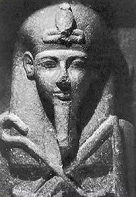
-1197 Seti II dies, and in Dec. with the help of kingmaker Chancellor Bay, his (Amenmesse's?) 10-y.-o. son (by Shoteraja/Sutailja) Merenptah Siptah (Akhenre Setepenre) (d. -1191) becomes king #7 of the Egyptian 19th Dynasty, executing Chancellor Bay in the 5th year of his reign for getting too uppity. Ashur-Nirari III is overthrown by Enlil-Kudurri-Usur (d. -1193), son of Tukulti-Ninurta I.
-1195 A confederacy of peoples attack Egypt, and a Hittite prince is captured?
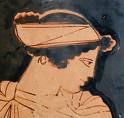

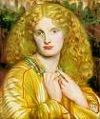




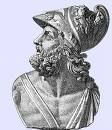


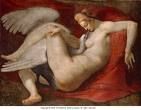




-1194 Shang Wu Yi dies, and Shang Tai Ding (d. -1192) becomes Shang #26 king of China. The original Hatfield-McCoy Feud? The Trojan War (ends -1184) begins when Prince Paris (Alexander), son of King Priam and Queen Hecuba of Troy (Ilium) on the Hellespont (known for his prowess with a bow) goes on a diplomatic mission to Spartan king Menelaus, and falls in love with his beautiful wife Helen, then abducts her and takes her with him back to Troy (founded by Dardanus, son of the god Saturn), pissing-off Menelaus, who gets his brother King Agamemnon of Mycenae (in the NE Peloponnesus 55 mi. SW of Athens) to join him, along with loose cannon Achilles of Thessaly, son of King Peleus of the Myrmidons and the Nereid Thetis; the whole thing started when Eris, goddess of discord, pissed-off at being excluded from a marriage throws a golden apple inscribed "To the Most Beautiful" into the gathering, and Paris awards it to Aphrodite, causing her to promise Helen to him?; according to Herodotus (Bk. 1), it all started when the Phoenicians first arrived from the Red Sea (Indian Ocean), and kidnapped Io and other maidens from the top Greek island of Argos and took them to Egypt, after which more Greeks kidnapped Europa, daughter of the king of Tyre, then Greek Jason and the Argonauts got the same idea and did ditto to Medea, daughter of the king of Colchis, causing Priam to think that he had a right to get a wife by kidnap, and when the Greeks actually made him pay for it for once, it pissed off the Persians, who claimed to own all peoples in Asia Minor, causing them to become the enemies of the Greeks; actually a ton of Greek bucks had courted Helen before her marriage, and all had been made to promise Menelaus to defend her in advance?; the Greeks then launch a fleet of 1K ships and 50K men at Troy, which itself has no navy but has an impregnable fortress city, and the classic confrontation of irresistible force and immovable object is on; no ordinary Bronze Age Greek supermodel, Helen (Gr. "torch", or "selene" = Moon?) of Troy, "the face that launched a thousand ships" is the daughter of Zeus (in the form of a swan) and Spartan queen Leda (daughter of King Thestius of Aetolia), who on the same night was also impregnated by Spartan king Tyndareus (two fertilized eggs at the same time), producing her twin siblings Castor and Pollux (Kastor and Polydeuces) (mortals) and (from her first egg) Helen and Clytemnestra, whom Agamemnon married after killing her first hubby Tantalus in order to become king of Mycenae, after Clytemnestra bears him Orestes (Gr. "mountaineer"), Iphigenia (Iphigeneia) (Gr. "strong-born"), Electra, and Chrysothemis, then after he sacrifices Iphigenia to make the winds return so his fleet can sail to Troy, she waits till he gets back from Troy with Trojan princess Cassandra, pissing her off more, and murders them both so that her new beau Aegisthus (Gr. "goat strength") can become king, after which Orestes and Electra of the now doomed House of Atreus murder them both.
-1192 Enlil-Kudurri-Usur is overthrown by Ninurta-Apal-Ekur (d. -1180), who becomes king of Assyria. Shang Tai Ding dies, and Shang Di Yi (d. -1154) becomes Shang king #27 of China.
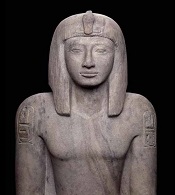
-1191 Merenptah Siptah dies, and Seti II's 2nd wife (sister of Amenmesse?) Twosret (Tausret) (Tawosret) (Sitre Meryamun) ("Daughter of Ra, beloved of Amun") (d. -1189) becomes king #8 (last) of the Egyptian 19th Dynasty, ruling 1.5-3 years after absorbing Siptah's regnal years into hers to stretch it to seven years, building the Temple of Millions of Years in Gournah. The Semitic Kingdom of Ammon (descended from Ben-Ammi, son of Lot and his younger daughter) begins oppressing Israel for the next 18 years; Jair of the tribe of Gilead becomes Israeli judge #9, judging Israel for the next 22 years.
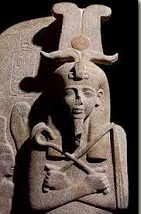
-1189 After a civil war, Twosret dies, and usurper Setnakhte (Setnakht) (Sethnakht) (d. -1186) becomes king #1 of the Egyptian Twentieth (20th) Dynasty (ends -1077), refusing to acknowledge the two previous pharaohs, and marrying Tiy-merenese (Teye-Merenaset) (Tiye-Mereniset) (daughter of Merenptah?) in an attempt to make his rule more legitimate; too bad, his reign is marked by the corruption of the govt. by increasingly powerful priests.
-1188 The Phoenicians attack Egypt and are repulsed.
-1187 Adad-Shuma-Usur dies, and Melishipak (d. -1172) becomes king of Babylon.
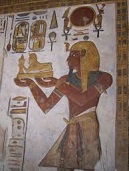
-1186 Setakht dies, and his son (by Tiy-Merenese) Usimare Rameses (Ramses) (Ramesses) III (Rhampsinitus) (d. -1155) becomes king #2 of the Egyptian 20th Dynasty, and the last great pharaoh of the New Kingdom, seeing a series of invasions (incl. the Sea People) and economic problems bring the kingdom into decline; the rest of the Rameses line are whimps, often elderly, and with short, er, reigns?; he marries Tyti; references to Punt drop out after his reign, indicating the introduction of camel caravans in Arabia that end their maritime trade; Rameses III's mummy is found at Deir-el-Bahri in 1881 C.E.
-1185 After defeating the Kassites, Shutrukid king #2 Shutruk-Nakhunte (d. -1155) becomes king #1 of the Elamite Empire (ends -1120).
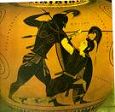


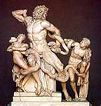

-1184 On June 11 the impregnable walled city of Troy (Ilium) in Asia Minor near the Hellespont (Dardanelles) is destroyed by fire in the last year of the 10-year Trojan War after the first special ops commando raid in history, made possible by the original 1-trick pony Trojan Horse (the original Kobayashi Maru Maneuver?), which Trojan priest Laocoon (Laocoön) tries in vain to expose by tapping with a spear, causing the goddess Athena to send sea serpents to strangle him and his sons Agesander, Athenodoros, and Polyclitus, which the Trojans interpret as proof that the horse is sacred; the doings in the 10th year are later celebrated by Homer's Iliad; the U.S. 10th Special Forces Group (Green Berets) later features a silver Trojan Horse on their badge; a band of survivors led by Aeneas (son of Aphrodite or Venus and Anchises, a cousin of King Priam) escape and search for a new home, ending up in Rome (Latium), where King Latinus (son of Inachus, son of Dardanus, son of Saturn) allows them to stay, and reneges on a promise to King Turnus of the Rutuli, marrying his daughter Lavinia to Aeneas instead, causing Turnus to turn-turn-turn declare war on Aeneas, which he loses, getting killed, after which Aeneas' Troy-born son (via 1st wife Creusa, who dies before reaching Latium) Ascanius founds Alba Longa SE of Rome on Lake Albanus in the Alban Hills (ends 7th cent. B.C.E.), and becomes its first king, establishing the line that leads to Romulus and Remus; Homer's Odyssey contains one of the earliest historical references to Crete, claiming that it's populated by Achaeans, Cydonians, Pelasgians, Dorians, and Eteocretans (pre-Hellenic natives), and has 90 independent cities, with #1 being Cnossos; shortly after the Trojan War ends, the city of Tenea is founded 15 km SE of Corinth and 20 km NE of Mycenae by Trojan POWs with the permission of Agamemnon.
-1183 The city of Padua in the Euganean Plain of N Italy on the Bacchiglione and Brenta Rivers (25 mi. W of Venice, 20 mi. SE of Vicenza) is founded by Trojan prince Antenor_(mythology), who colonizes it with his Paphlagonian allies assisted by the native (Celtic?) Adriatic Veneti (Heneti) ("sacred salmon people") from the N end of the Adriatic Sea, who become known for their excellent horse breed and wool; the Romans later call it Patavium; in modern times it claims to be the oldest city in Italy: a large stone sarcophagus is exhumed in 1274 C.E. and declared to be the relics of Antenor.
-1181 Menestheus dies, and his son Demophon (d. -1147) becomes king #12 of Athens.
-1180 Rameses III expels the Libyans from the W side of the Egyptian delta. Ninurta-Apal-Ekur dies, and his son Ashur-Dan I (d. -1134) becomes king of the proto-empire of Assyria.
-1178 In the 8th year of his reign, Rameses III wins the naval Battle of Djahy (Canaan) (the Delta) against the piratical Sea People AKA the Peleset AKA the Philistines, who left the S shore of Asia Minor and settled in SW Canaan on the S coastal plain and were making forays into the Nile Delta; too bad, this battle marks the start of the New Kingdom's decline during the Bronze Age Collapse. On Apr. 16 Odysseus returns to Ithaca at noon and wins an archery contest?
-1177 The year that civilization collapsed?

-1175 By this time the Hittite mini-states are gobbled up by Assyria? Rameses III builds his temple palace at Medinet Habu on the W Bank of the Nile in Luxor; the Mortuary Temple of Ramses III in Medinet Habu celebrates his Vs over the Sea People.
-1174 Rameses III repels a Libyan invasion.
-1173 Rameses III defeats the tall blonde-blue (aquiline noses, pointed beards) Amorites of Palestine, bringing back their king along with rich booty which he uses to endow temples to Amon, esp. at Thebes. Israeli judge #10 Jephthah (Jephtha) of Gilead (tribe of Manasseh or Gad) is victorious over Ammon 300 years from the start of the Israelite conquest of Canaan (Judges 11:26-33); too bad, after vowing to make a holocaust (burn offering) of the next person he meets, he burns his own virgin daughter (Judges 11:35-40).
-1172 Melishipak dies, and his son Marduk-Apal-Iddina I (Merodach-Baladan) (d. -1159) becomes Kassite king of Babylon.
-1170 Birth of Israeli judge #13 Samuel (Heb. "Name of God") in Shiloh (Heb. "tranquil, secure") (20 mi. N of Jerusalem) (first resting place of the Tabernacle) of father Elkanah and mother Hannah; of the tribe of Ephraim (1 Sam. 1:20).
-1167 Izban of Bethlehem judges Israel for the next seven years (Judges 12:8).
-1160 Elon of Zebulun judges Israel for the next 10 years (Judges 12:12).
-1159 Mt. Hekla in S Iceland erupts, creating a "nuclear winter" for Scotland, and beginning an 18-year period of worsening climate. Marduk-Apal-Iddina I dies, and Zababa-Shuma-Iddina (d. -1158) becomes king of Babylon. Shutruk-Nahhunte of Elam leaves Susa with a vast army and begins to plunder Sumer - the endless Sumer?
-1158 Zababa-Shuma-Iddina dies, and Enlil-Nadin-Ahhe (Enlil-Shuma-Usur) (d. -1155) becomes king of Babylon.
-1157 Shutruk-Nahhunte of Elam takes Babylon, appoints his son Kutir-Nahhunte III (d. -1150) as gov., and brings back spoils to Susa, incl. the Code of Hammurabi; Babylonia fights on. Philistia oppresses Israel for the next 40 years.
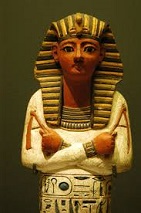
-1155 Rameses III dies, and after the first four sons have already died, his 5th son (by Tyti) Heqamaatre Rameses (Ramses) (Ramesses) IV (Amonhirkhopshef) (d. -1149) becomes king #3 of the Egyptian 20th Dynasty, which is increasingly dominated by the priesthood, making pharaohs into puppets; his wife is Duatentopet (Tentopet). Shutruk-Nahhunte dies, and his son Kutir-Nahhunte III (d. -1150) becomes king of Elam, trying to hold onto Babylonia; Assyria and Elam attack Babylonia, ending Kassite rule; Enlil-Nadin-Ahhe dies.
-1154 Marduk-Kabit-Ahheshu (d. -1146), prince of Isin retakes Babylon from the Elamites, founding the Fourth Babylonian (Second Isin) Dynasty; Babylon goes on to become the world's largest city, covering 10K hectares (about the size of modern-day San Francisco). Shang Di Yi dies, and Shang Zhou (Chou) (d. -1134) becomes Shang king #28 of China; the cruelest king in Chinese history?; known for the invention of chopsticks (kuaizi) (bad luck to leave them standing in food straight up?) - ouch that must hurt?

-1155 Rameses III dies, and after the first four predecease him, his 5th son Rameses (Ramses) (Ramesses) IV (Amonhirkhopshef) (d. -1149) becomes king #3 of the Egyptian 20th Dynasty, which is increasingly dominated by the priesthood, making pharaohs into puppets; Rameses III's mummy is found at Deir-el-Bahri in 1881 C.E.

-1150 About this time the Greek Dark Ages (Geometric or Homeric Age) begin (end -800 to -750) as the Hellenic Dorians invade and settle mainland Greece and Sparta, and begin calling it Hellas (Gr. "Land of the Hellenes"); the Aeolians (originally from Thessaly, one of the four major Greek Tribes along with the Dorians, Ionians, and Achaeans, claiming descent from King Aeolus of Thessaly, son of Helen, ancestor of the Hellenes, and father of Sisyphus) settle on the W coast of Asia Minor between the Dardanelles and the Hermus River, and on the island of Lesbos; by modern times the Aeolian dialect is considered the oldest form of Hellenic speech; the Thessalians (first and best Greek horsemen) claim that Poseidon made their fertile plain habitable by creating an outlet for the Peneius River for the first monarchs Deucalion (Deukalion) and his wife Pyrrha (daughter of Epimetheus and Pandora); Greek historian Diodorus of Sicily (Diodorus Siculus) (-90 to -21), later claims that the first Thessalian colonists came from Egypt, which connects with their myth that Poseidon created the horse; about this time Mycenaean civilization ends, and Greek history grows dark until the first Olympics in -776, causing David Michael Rohl (1950-) et al. to propose shifting all dates forward by 200-350 years - meet the new stars of High School Musical III? Kutir-Nahhunte III dies, and Shilak-Inshushinak I (d. -1120) becomes king of Elam, going on to conquer large areas in the highlands and parts of Mesopotamia, becoming one of Elam's Hall of Famers? The Canaanite stronghold of Dan is conquered by the Hebrew tribe of Dan. A robber confesses under torture to violating the tomb of Ramses II then going "across the path" to rob the tomb of his sons.
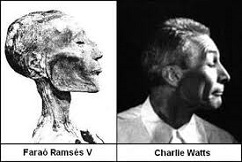
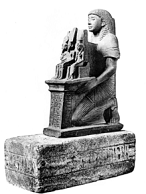
-1149 Rameses IV dies, and his son (by Duatentopet) Usermaatre Sekheperenre Rameses (Ramses) (Ramesses) V (d. -1145) becomes king #4 of the Egyptian 20th Dynasty, suffering the power of the priests of Amun, led by high priest Ramessesnakht, who control the temple land and state finances, incl. a financial scandal by the priests of Elephantine; Libyan raiding parties interrupt workmen in Deir el-Medina working on his tomb. Demophon dies, and his son Oxyntes (d. -1135) becomes king #13 of Athens.
-1146 Marduk-Kabit-Ahheshu dies, and Itti-Marduk-Balatu (d. -1132) becomes king of Babylon.

-1145 Rameses V dies of smallpox, and his uncle (son of Sameses III and Iset Ta-Hemdjert) Rameses (Ramses) (Ramesses) VI Nebmaatre-meryahum ("Lord of justice is Ra, beloved of Amun") (Amenhirkhepshef II) (d. -1137) usurps the throne, becoming king #5 of the Egyptian 20th Dynasty; his tomb is built over the entrance to Tutankhamun's, protecting it, which is lucky since it is robbed soon after the burial, and the graverrobbers hack off his hands and feet to get at the jewelry.

-1136 Rameses VI dies, and his son Usermaatre Setepenre Meryamun Rameses (Ramses) (Ramesses) VII (Itamun) (d. -1129) becomes king #6 of the Egyptian 20th Dynasty.
-1135 Oxyntes dies, and his son (by Phillis) Apheidas (d. -1134) becomes king #14 of Athens.
-1134 Apheidas is assassinated by his younger brother Thyometes (d. -1126) becomes king #15 of Athens, becoming the last king descended from Theseus. Shang Zhou dies, and Chou-hsin (d. -1122) becomes Shang king #29 of China, becoming known as an evil debauched despot who is into tasty aphrodisiacs, incl. Hunting Lion (bear paws, rhino horn, human urine), Celestial Thunder (peacock tongues, chili powder, sperm from teen boys), and Three-Day Glory (soy beans, ginseng, ox penis, dried human placenta); about this time the first cast copper coins are produced in China under the Shang Dynasty. Ashur-Dan I dies.
-1133 Ashur-Dan I's son Ninurta-Tukulti Ashur becomes king of Assyria, and is overthrown by his brother Mutakkil-Nusku (d. -1132); Matakkil-Nusku dies, and his son Ashur-Resh-Ishi I (d. -1116) becomes king of Assyria.
-1132 Itti-Marduk-Balatu dies, and Ninurta-Nadin-Shumi (d. -1126) becomes king of Babylon.


-1129 Rameses VII dies, and Rameses III's last surviving son Usermaatre Akhenamun Rameses (Ramses) (Ramesses) VIII (Sethhirkhepeshef Meryamun) ("Set is his strength, beloved of Amun") (d. -1129) becomes the lucky king #7 of the 20th Dynasty, ruling up to 1 year, becoming the only 20th Dynasty pharaoh whose tomb has not been identified in the Valley of the Kings; Rameses VIII dies, and Rameses III's grandson (via Mentuherkhepeshef and Takhat) Rameses (Ramses) (Ramesses) IX (Khaemwaser I) (Neferkare Setepenre) ("Beautiful is the soul of Ra, chosen of Ra") (d. -1111) Amenhotep becomes high priest of Amun, who continues to serve under Rameses X and Rameses XI; a Theban tomb-robbing scandal rocks his admin. during regnal years 16-17.
-1128 Abdon of Ephraim, son of Hillel the Pirathonite becomes judge #12 of Israel, judging for the next eight years (Judges 12:15).

-1126 Ninurta-Nadin-Shumi dies, and Nebuchadnezzar (Nebuchadrezzar) I (Nabu-Kudurri-Usur) (d. -1103) becomes king of Babylon. In exchange for defeating pesky King Xanthus of Thebes in single combat to end a war over border city Oenoe, Thyometes gives his throne to Melanthus (d. -1089) (a descendant of Nestor's father King Neleus of Pylos in Messenia), who becomes king #16 of Athens.
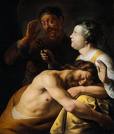
-1125 Judge Samson (d. -1105) (Heb. "Sun") of the tribe of Dan judges Israel for the next 20 years until Delilah (Heb. "seductive") cuts his rays, er, hair.

-1122 Zhou Wu Wang (d. -1119) (-1046 to -1043?) and his father Wen revolt against Chou-hsin, ending the Shang Dynasty and founding the Xi (Northern) Zhou (Chou) Dynasty (China's 3rd dynasty) (ends -256), awarding Korea to Chinese prince-scholar Qi Zi (Ji-zi) (Ki Tse), who founds the independent Kingdom of Choson (Chosen) (Joseon) (ends -194/-108). about this time the city of Peiping (later Peking and Beijing) ("northern capital") (modern-day pop. 18.6M/24.9M) in NE China 90 mi. NE of the Gulf of Pohai and 12 mi. W of the Pei River is founded as a frontier outpost; it is walled about 1045 B.C.E.
-1120 Shilak-Inshushinak I dies, and Hutelush-Inshushinak (d. -1110) becomes king of Elam.
-1116 Ashur-Resha-Ishi I, "the avenger of Assyria" dies, and Mutukkil-Nusku (d. -1114) becomes king of Assyria.
-1115 The Ark of the Covenant is captured by the Philistines at Shiloh (1 Sam. 3:3, 4:3-12, 6:1, Josh. 18:1), recaptured, and moved to Beth Shemesh, then to Kiriath-Jearim for 70 years (1 Sam. 6:11-14, 7:1-2); Eli's high priesthood ends (1 Sam. 4:18), but Samuel continues as priest-prophet-judge (1 Sam. 6-7); Saul's eldest son Jonathan is born (1 Sam. 13:1-2, 1 Chron. 8:33). Ji Dan, duke of Chou (Zhou) in China writes Against Drunkenness, containing the first written definition of tea.
-1114 Mutukkil-Nusku dies, and Tiglath-Pileser (Tukulti-Apil-Esharra) I (d. -1077) becomes king of Assyria.
-1112 Tiglath-Pileser I campaigns against the nomadic Ahlamu-Arameans, who reach as far W as Tadmor (Palmyra in Syria) and the Lebanon Mts.

-1111 Rameses IX dies, and (his son?) Rameses (Ramses) (Ramesses) X (Amonhirkhepeshef Khepermaatre) ("The justice of Ra abides") (d. -1107) becomes king #9 of the Egyptian 20th Dynasty, becoming the last New Kingdom pharaoh to rule over Nubia; meanwhile Libyan Berber Meshwesh (Ma) from the desert maraud in the Valley of the Kings, slowing workmen.
-1110 About this time Nebuchadnezzar I overruns Elam and sacks Susa, taking Anshan; Hutelush-Inshushinak dies, ending the Hullutush-Inshushinak Dynasty in Elam (founded -1200).

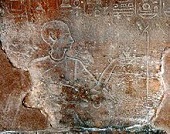
-1107 Rameses X dies, and (his son?) Rameses (Ramses) (Ramesses) XI (Khaemwaset II) (Menmaatre Setpenptah) (d. -1077) becomes king #10 (last) of the Egyptian 20th Dynasty, reigning for 29-30 years; his wife is Tentamun ("She of Amun"), who bears him Duathathor-Henuttaway (Henttawy) ("Adorer of Hathor, mistress of the Two Lands"), who marries Pinedjem I, high priest of Amun at Thebes in -1070 to -1032, who becomes the de facto ruler of 21st Dynasty Upper Egypt starting in -1054.
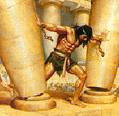
-1105 Israeli Judge Samson dies kicking Philistine butt in an epic scene.
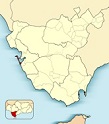
In 1104 B.C.E. the island city of Cadiz (Cádiz) in SW Spain (modern-day pop. 123K) is founded as Gadir (Agadir) ("wall", "compound") by the Phoenicians, becoming the oldest W Euro city to survive to modern times, trading with the city-state of Tartessos near the mouth of the Guadalquivir River until it is flooded out; a temple to the Phoenician god Melqart is built on the S end, later conflated by the Greeks and Romans with Hercules as Hercules Gaditanus and the Tyrian Hercules, becoming known for its oracle and wealth; later the Greeks claim that the city was founded by Hercules after his Tenth Labor, the slaying of 3-headed Geryon; the Herculeum (Temple of Melqart) is still standing in the 1st cent. C.E., giving rise to the myth of the Pillars of Hercules?; same as the Biblical city of Tarshish?
-1103 Nebuchadnezzar I dies, and Enlil-Nadin-Ahhe (Enlil-Nadin-Apli) (d. -1100) becomes king of Babylon.
-1102 Zhou Cheng Wang establishes his capital at Leyi.
-1100 The Bronze Age Collapse (began -1250) ends. Enlil-Nadin-Ahhe dies, and Nebuchadnezzar I's brother Marduk-Nadin-Ahhe (d. -1082) becomes king of Babylon. The Arameans begin squatting on Assyrian and Babylonian lands, and push the Urartians back to their homeland around Lake Van in Armenia. About this time Egypt loses its control over the Sea Peoples of Phoenicia, which becomes independent, turning the Mediterranean Sea into a Phoenician lake for the next 2.5 cents.; Tyre grows stronger than its rival Sidon; in this cent. the Phoenicians found maritime merchant colonies in the established cities of Gaza in Palestine, Memphis in Egypt, and Kition (Latarkia) in Cyprus, and discover the Pillars of Hercules; the N one is Calpe (Aulibe) (later called the Rock of Gibraltar), and the S one is Abila (Sierra Bullones) at Ceuta on the N African coast (later called Jebel Musa); the Phoenicians crown them with silver columns to mark the limits of Mediterranean navigation; named for the labor of Hercules where he had to fetch the cattle of Geryon and bring them to Eurystheus, and smashed a hole in Mt. Atlas to reach the island of Erytheia, forming the Strait of Gibraltar (then narrowed it to keep sea monsters out?). About this time Doric (Dorian) Hexapolis, a federation of six Doric cities in SW Asia Minor on adjacent islands is founded (until -560), incl. Cos on the island of Cos, Cnidus (Knidos) in Caria, Halicarnassus in Caria (modern-day Bodrum, Turkey) on the Ceramic Gulf, Lindus on the E coast of the island of Rhodes (known for wine and figs), Ialysus (Ialysos) on the island of Rhodes 6 stadia SW of the city of Rhodes, and Camirus (Kamiros) (Cameirus) (Kameiros) on the NW coast of the island of Rhodes; they all celebrate a festival and games on the Triopian Promontory near Cnidus in honor of Apollo, with winners awarded brazen tripods that they have to dedicate to Apollo's temple; too bad, a winner from Halicarnuss takes the tripod to his own house first, causing Halicarnassus to be kicked out of the Doric Hexapolis, reducing it to the Doric Pentapolis. A cemetery in Ashkelon contains 200+ graves. People from the Near East spread into East Africa. The residents of the lower Ulua Valley in N Honduras are enjoying chocolate drinks, making it the Cradle of Chocolate. Nonfiction: The Instruction of Amenemope is written about this time by Amenemope, a resident of Akhim in Upper Egypt on the E side of the Nile River; really written by pharaoh Amenenope (-1001 to -992)? - sounds mightly like Proverbs?
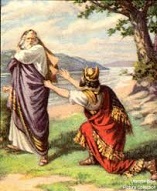
-1095 After being anointed by Judge Samuel, Saul (d. -1055) (Heb. "asked of God"), son of Kish becomes the first king of a united Israel 356 years from the start of the Israelite conquest of Canaan ("land of purple"); he rules 40 years, nearly annihilating the warlike nomadic Amelekite tribe of SW Palestine (1 Sam. 10:24, 2 Sam. 5:4, 1 Ki. 6:1, Deut. 2:7, Acts 13:21).
-1090 In the 18th year of Rameses XI, Amun high priest Amenhotep is ousted by Pinehesy (Panehesy) (Panehasy), viceroy of Kush, causing Rameses XI to begin counting his regnal years over starting with 1 in the Wehem Mesut (Renaissance), a year of rebirth after years of drought are ended by an unusually high inundation of the Nile River.
-1089 Melanthus dies, and his son Codrus (d. -1068) becomes king #17 (last) of Athens.
-1085 Birth of future Israeli king David (d. -1015) (Heb. "beloved") in Bethlehem (1 Sam. 16:1, 2 Sam. 5:4), 14 generations after Abraham; the Babylonian Captivity is 14 generations ahead.
-1082 Marduk-Nadin-Ahhe dies in a famine, and Marduk-Shapik-Zeri (d. -1069) becomes king of Babylon. Amenhotep, high priest of Amun wars with Amenhotep, viceroy of Kush, during which pharaohs' tombs are plundered (ends -1080)
-1078 Zhou Cheng Wang dies, and Zhou Kang Wang (d. -1052) becomes Xi Zhou king #3 of China.
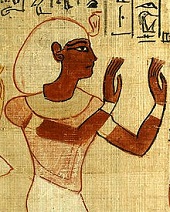
-1077 Rameses XI dies, ending the New Kingdom (begun -1550), and the Third Intermediate Period (ends -664) in Egypt begins, marked by political instability, division, decline, and foreign conquest, while the pharaohs mainly control Lower Egypt (from Tanis) and the high priests of Amun in Thebes de facto rule Middle and Upper Egypt; Lower Egypt gov. (based in Tanis) Hedjkheperre Setepenre ("Bright is the manifestation of Ra, chosen of Amun") Smendes (Smedes) Nesbanebdjed ("He of the Ram, Lord of Mendes") (d. -1052) (son of Hrere, chief of the harem of Amun-Ra) and Smendes' brother-in-law Hrihor (Herihor) (Her Hor) (high priest of Amon in Karnak since -1080) dethrone Rameses (Ramses) (Ramesses) XII (son of Rameses VII) and divide Egypt between them, with Lower Egypt going to Smedes, with admin. center at Tanis (Djanet) (Zoan in the Bible) (later Thebes of Lower Egypt) (modern-day San El Hagar) on the Tanaitic branch of the Nile in the NE Nile Delta (built after the branch that runs by Pi-Ramesses silts up), and Upper Egypt to Hrihor, who rules out of Amon-Ra's wealthy city of Thebes, founding the Egyptian Twenty-First (XXI) (21st) (Tanite) Dynasty (ends -943). Tiglath-Pileser I is murdered, and his son Asharid-Apal-Ekur (d. -1074) becomes king of Assyria.
-1075 After Saul screws up in Jehovah's eyes, Judge Samuel anoints David as king designate of Israel (1 Sam. 16:13), pissing-off Saul, who seeks to have him killed, causing David to become a fugitive; somewhere along the way David meets up with Abigail (Heb. "fountain of joy"), wife of wealthy Carmel chief Nabal, who treats David shabby, causing her to rush out to pacify him with food and supplies as he is on his way to kill Nabal; after Nabal dies, David marries her (1 Sam. ch. 25).
-1074 Ashur-Bel-Kala is succeeded by his brother Ashur-Bel-Kala (d. -1057) as king of Assyria.
-1069 Marduk-Shapik-Zeri is overthrown by Adad-Apal-Iddina (d. -1046), who becomes king of Babylon.
-1068 Codrus dies, ending the Aegeides Dynasty along with its king, and his son Medon (d. -1048) becomes the first hereditary archon of Athens (ends -753).

-1055 Death of Israeli King Saul after ruling 40 years (1 Sam. 31:7); Bethlehem-born former shepherd David (Elhanan) (-1085 to -1015) is anointed as king #2 of Israel at Hebron (until -1015) (-1010 to -970?) (2 Sam. 2:4).
-1054 Ashur-Bel-Kala is overthrown by his uncle Shamshi-Adad IV (d. -1050), son of Tiglath-Pileser I, who becomes king of Assyria (until -1054).
-1051 Neferkare (Nephercheres) Amenemnisu (Neferkare-Heqawaset) (d. -1047) becomes king #2 of the Egyptian 21st Dynasty; during his reign High Priest Menkheperre pardons several leaders of a rebellion who had been exiled to the Western Oasis during the reign of Smendes.
-1050 The Philistines, known for their iron weapons decisively defeat the Israelites, causing the latter to unite. Shamshi-Adad IV dies, and his son (grandson of Tiglath-Pileser I) Ashurnasirpal (Ashur-Nasir-Apli) I (d. -1032) ("Ashur is protector of the heir") ("Ashur is guardian of the son") becomes king of Assyria; the Arameans shrink Assyrian territory to 75 mi. on a side.
-1048 Medon dies, and his son Akastos (d. -1012) becomes king of Athens. David is anointed king over all Israel (2 Sam. 5:3-5).
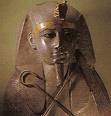

-1047 Amenemnisu dies, and Pinedjem I's son (by Henuttaway, daughter of Ramesses XI and Tentamun) Psusennes (Pasebkhanut) (Pasibkhnu) (Hor-Pasebakhaenniut) ("The star appearing in the city") (Akheperre Setepenamun) ("Great are the manifestations of Ra, chosen of Amun") I (d. -1001) becomes king #4 of the Egyptian 21st Dynasty at Tanis, and takes the title of High Priest of Amun (Amon); his wife-sister is Mutnedjemet (Mutnodjme); he builds up the capital city of Tanis with the Temple of Amun-Re (Amon-Ra), which is added to until the time of Shoshenq III (-798). David takes Jerusalem (originally Jebus?) by sending his soldiers through the King David Water Shaft leading into the city from the Gihon Spring, making it his capital (2 Sam. 5:6,7) nd reigning until 970 B.C.E., gaining control of the site of the future temple from the Jebusite (Canaanite tribe) Araunah; the Ark of the Covenant is brought into Jerusalem (2 Sam. 6:2-15, 1 Chron. 13:1-11, 15:13, Num. 4:15); it really happened in -1003?
-1046 Adad-Apal-Iddina dies, and Marduk-Ahhe-Eriba becomes king of Babylon.
-1045 Menkheperre (son of Pinedjem I and Duathathor-Henuttaway, daughter of Rameses XI and Tentamon) becomes high priest of Amun at Thebes (until -992), going on to pardon several leaders of a rebellion who had been exiled to the Western Oasis during the reign of Smendes. Marduk-Ahhe-Eriba dies, and Marduk-Zer-X (d. -1033) becomes king of Babylon.
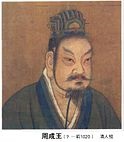
1043 Zhou Wu Wang dies, and next his son Zhou Cheng Wang (d. -1006) becomes Xi Zhou king #2 of China, with his uncle the Duke of Zhou as his regent, going on to establish the capital in Luoyang, defeat several barbarian tribes along the border, and defeat a rebellion by his uncles Cai Shu, Guan Shu, and Huo Shu.
-1040 Alt. date for the birth of King David of Israel, adding 45 years to Bishop Ussher's chronology.
-1035 Birth of Israeli king #2 Solomon (d. -975) (-990 to -930?) in Jerusalem; son of David and Bathsheba (wife of Uriah the Hittite); even though he's not his eldest son, David promises Bathsheba that he will be his successor - the original Bill Clinton and Monica Lewinsky affair in the White House?
-1034 Alt. date for the beginning of Saul's reign (Eerdman's Dict. of the Bible).
-1033 Marduk-Zer-? dies, and Nabu-Shum-Libur (d. -1025) becomes king of Babylon.
-1032 Ashurnasirpal I dies, and his son Shalmaneser II (Shulanu-Asharedu) (d. -1020) becomes king of Assyria.
-1030 The Hebrew tribes first settle in the land of Israel? - God I'd like to hear that story? The fortified coastal city of Cumae is founded in Campania by Greek colonists from Chalcis and Cyme, becoming the model for all Greek colonies in Italy and Sicily according to Strabo (founded -757?); the Cumaean sibyl in Virgil's "Aeneid" comes from here; the nearby Plegraean Fields are known as the Tunnel to Hell.
-1028 In the early 11th cent. B.C.E. (-1028 to -1043) the city of Rangoon ("end of strife") (Yangon) in Lower Burma (modern-day pop. 5.3M/7.6M) is founded as Dagon by the Mon as a small fishing village centered around the Shwedagon Pagoda; in 1755 King Alaungpaya conquers it and renames it Yangon; in 1852 the British conquer Lower Burma and move the capital there from Moulmein, renaming it Rangoon and going on to capture Upper Burma in 1885, turning Rangoon into "the garden city of the East"; in 1948 Burma wins independence from Britain, and in 1989 the name is changed to Yangon; on Mar. 27, 2006 the capital is moved to the new city of Naypyidaw (Naypyitaw) (Nay Pyi Taw) ("abode of kings") in C Myanmar (modern-day pop. 925K).
-1025 Nabu-Shum-Libur dies, and Simbar-Shipak (d. -1007) founds the 6th Dynasty in Babylon.
-1020 Shalmaneser II dies, and his son Ashur-Nirari IV (d. -1016) becomes king of Assyria.
-1016 Ashur-Nirari IV dies, and Ashur-Rabi II (d. -972), son of Ashurnasirpal I becomes king of Babylon.
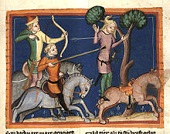
-1015 After his handsome favorite 3rd son (by Maachah) Absalom (Heb. "father of peace") kills his half-brother Amnon to avenge the rape of his sister Tamar (Heb. "palm tree") (2 Sam. 13:1-33) (not the daughter-in-law of Jacob's son Judah, who marries Er, Onan, and Judah, tricking the latter into hooking up with her, producing twins Perez and Zerah, see Gen. 38:6-30), is pardoned by David, then "stole the hearts of the men of Israel" and rebels, and is kicking butt until he gets his long flowing hair caught in the branches of an oak tree, hanging there helplessly until David's man Joab finish him off, causing David to utter the immortal soundbyte: "O Absalom, Absalom, my son Absalom" (2 Sam. chaps. 3, 13-19, 18:33), kinnor-playing king David (b. -1085) dies after giving a memorable address to the people (1 Chron. ch. 29), with the soundbytes "Thine, O Lord, is the greatness, and the power, and the glory, and the victory, and the majesty; for all that is in the heavens and in the Earth is thine; thine is the kingdom, O Lord, and thou art exalted as head above all" (1 Chron. 29:22-23) and "For we are strangers before thee, and sojourners, as all our fathers were; our days on the Earth are like a shadow, and there is none abiding" (1 Chron. 29:15); too bad, there now comes a 45-year gap between Bishop Ussher's chronology and everybody else's, so David's son Solomon has to go through the 1000 B.C.E. Glass Darkly and come out the other side to become king? Deaths: Israeli king #2 David (b. -1085).
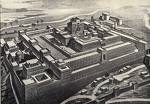

-1012 On May 9 a solar eclipse is observed in the Egyptian city of Ugarit during the reign of Amenhotep IV, shifting all of Egyptian chronology forward by 300 years, according to the New Chronology of English Egyptologist David Michael Rohl (1950-). Akastos dies, and Archippos (d. -993) becomes king of Athens. Alt. date for the end of King Saul's rule (Eerdman's Dict. of the Bible). Solomon begins the construction of the Temple of Solomon, AKA the Temple of Jerusalem (1 Ki. 6:1), with the help of king Hiram I of Tyre, who furnishes Solomon's ships with chains of brass; the head workman is allegedly Hiram Abiff (son of a widow of the tribe of Naphtali), in charge of 3.3K grand overseers and 150K workmen, who is murdered by three ruffians who try to get the secret Master Mason password out of him, as later claimed by the Freemasons, who stage an allegorical play about him in their Third Degree (Master Mason) rites - the prototype of McDonald's cow meat restaurants of the 20th cent. C.E.?
-1010 Assur-Rabi II (d. -973) becomes king of Assyria.
-1007 Simbar-Shipak dies, and Ea-Mukin-Zeri becomes king of Babylon for 5 mo. then dies, and Kashu-Nadi-Ahhe (d. -1004) becomes king of Babylon.
-1006 Cheng dies, and next year his son Kang of Zhou (d. -978) becomes Zhou king #3 of China.
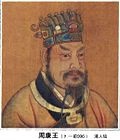
-1005 Samson dies in a blaze of glory, taking mucho Philistines with him; he is succeeded by Eli (Heb. "Jehovah is the Most High") as judge #14 of Israel, becoming the trainer of young Samuel.
-1004 Kashu-Nadin-Ahhe dies, and the Aramean Eulma-Shakin-Shumi (d. -987) becomes king of Babylon, founding the 6th (Bazi) Dynasty.
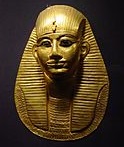
-1001 Psusennes I dies, and his son (by Mutnedjmet) Usermaatre Amenemope (Amunemope) (Amenophthis) (d. -992) becomes king #4 of the Egyptian 21st Dynasty, claiming the title of high priest of Amun in Tanis; the Onomasticon of Amenope, an inventory of Egyptian property survives to modern times.
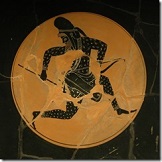


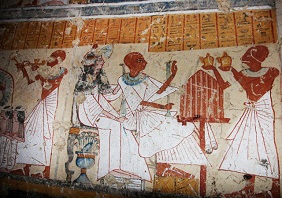
-1000 World pop.: 50M (doubling every 500 years); Persia: 2M; Syria-Palestine: 800K. The Iron I Period of Archeology ends, and the Iron II Period of Archeology begins (ends -600). About this time the Bicameral Mind of humans where the left side takes orders from the right side and thinks it's from a chieftain or god begins evolving into the modern mind, according to Am. psychologist Julian Jaynes (1920-97). The Ionians under Neileus capture Miletus on the W coast of Asia Minor, then kill the men and marry their wives, who get pissed-off and refuse to sit at table with them?; the Temple of Didyma, devoted to Apollo the Didymaion (twin) is built, becoming the 2nd most famous oracle in the Hellenistic world after Delphi. The Chaldeans take and occupy Ur. The Aramaeans overrun Assyria. About this time the original Germans move to Germany from S Norway, Sweden, and Denmark to find some Lebensraum. About this time the ancient city of Damascus in Syria on the Barada River E of the Anti-Lebanon Mts. (ruled by Egyptians and Hittites) becomes an independent Aramaean kingdom. In this cent. the Vannic-speaking Assyrian kingdom of Urartu (Biainele) (Khaldia) is founded in the Armenian mountains of Asia Minor in the Araxes (Aras) River Valley, and the upper Tigris and Euphrates Rivers around Lake Van, with the main cities being Tushpa (capital), Erebuni, and Rusahinili; farming, and cattle, sheep and horse husbandry are practiced; the chief dieties are Khaldis (Haldi) (warrior god), Ardinis (sun god), Teisheba (Teisbas) (Hurrian Teshup) (storm god) and his wife Huba (Hebat); their development of ironworking methods makes them famous among the Greeks. Early in this millennium the savage tattooed horseback nomadic Persian-speaking Scythians (Ashguzai) (Sacae) (Pers. "Skudat" = archers) move into E Europe and the Caucasus (Ukraine) all the way to the N coast of the Black Sea, and according to Herodotus make ceremonial and recreational use of hemp (marijuana); they become known for making cloaks from victims' scalps and cups from their skulls - I want your intestines on a stick and to kill your dog? About this time the city of Pavlopetri (Gr. "Paul's Stone", "Paul's and Peter's") S of the Peloponnese, first inhabited about 2,800 B.C.E. is consumed by the sea after the first of three earthquakes. About this time the warlike red-haired blue-eyed Thracians (ancestors of the Swedes?) settle in N Greece, Bulgaria, and Turkey between the Aegean Sea, Carpathians, Black Sea, and Morava and Vardar Rivers, becoming known for their wine, exquisite works of gold, and the tombs of their chieftains filled with chariots, horses, weapons, and wives. In this cent. the Sabellian Osco-Umbrian-speaking Sabines move to the W Tyrrhenian coastal plain of the Italian peninsula (Latium) from C Europe and vanquish the aborigines, a dark people from the Sahara, moving into the Apennines of C Italy (conquered by the Romans in the 3rd cent. B.C.E.). In this cent. a Greek colony in Smyrna in SW Asia Minor *modern-day Izmir, pop. 2.8M/4.1M) is founded, later claiming to be the birthplace of Homer; it is located at the terminus of the inland trade routes from the Hermus (Gediz) and Meander valleys from the east. In this cent. the harbor city of Tartessus (Tartessos) at the mouth of the Guadalquivir River in S Spain is founded by sea traders, who discover the route to the Tin Islands (Britain) and become trading partners with the Phoenicians. By this time most of England has been cleared of forests, and is covered with farms? About this time Takshashila U. is founded in Taxila ("city of cut stone") in Rawalpindi, Punjab, India, becoming the world's first university, growing to 10.5K students from India, Greece, Babylon, China, Phoenicia, Arabia, and Syria studying 68 different courses; teachers incl. Kautilya, Panini, Jivak, and Vishnu Sharma; after invading Punjab, Alexander the Great takes several scholars back with him to Greece; the Hephthalites (Hunas) destroy it ca. 460 C.E. About this time fortifications are erected on the Festung Ehrenbreitstein Hill near modern-day Koblenz (Coblenz) ("confluence") at the confluence of the Rhine and Moselle Rivers. In this cent. there is a maritime network in the Baltic Sea region, which builds a new type of stone monument arranged in the form of ships on coasts. In this cent. the Celtic Milesians, descended from Milesius of Spain allegedly migrate to Ireland, displacing the native Celtic Firbolg and Tuatha De Danann. In this cent. the Adena civilization (ends 200 B.C.E.) is founded in the Woodlands area of Ohio (N Am.) by tall (6' for women and 7' for men), massive round-headed peoples (other Indians have long narrow skulls and slender bodies), building earthwork monuments, incl. the Great Serpent Mound near modern-day Cincinnati, Ohio. In this cent. the Kingdom of Vanga (Banga) in NE India is founded. About this time trees flourish in SE Iceland in a warm climate, part of a large forest that later disappears after the climate begins cooling about -500. In this millennium the Mayans practice forest conservation? About this time the Bantu peoples in NW Africa begin a mass migration S and E (ends 4th cent. C.E.); their funky Bantu language has 20 genders. About this time the Nok Culture in N Nigeria, known for its life-sized terracotta figures arises, going on to engage in iron smelting by 550 B.C.E. then mysteriously disappear about 300 C.E., giving rise to the Birom, Gwari, Hausi, Jukun, Kanuri, and Nupe peoples. About this time whites from S Europe migrate to S Africa, becoming the Khoisan tribes. Bananas are first cultivated in Vanuatu? In this millennium the Cynetes (Conii) people live in S Portugal (until -600); inscriptions in Southwest Script are later uncovered by archeologists in the area. In this millennium the non-Celtic Ligurians live in Italy N of Etruria, Switzerland, SE Gaul, and Corsica, becoming known for their pacifism and commercialism. In this millennium the Keetoowah settlement on the Tuckasegee River near modern-day Bryson City, N.C. becomes the home of the Cherokee after they migrate from the Great Lakes region of S Canada and N U.S., and they go on to disperse from there, according to Cherokee tradition. About this time the continual grave robbing in the Valley of the Kings causes the royal mummies to be secreted in a common location for guarding; they are safe until the 19th cent., when the Abdul Rassal family discovers them in Deir al-Bahri and begins grave-robbing and selling the loot on the black market? About 1000 B.C.E. a tomb in Luxor, Egypt for Egypt's chief beer brewer is laid; discovered in 2005. I got the powah? The world's loose cannon begins festering, er, developing in the Arabian peninsula? By this time the camel is domesticated in Sharjah, UAE (since 2K B.C.E.?), and a nomadic culture based on goat and sheep herding develops in N Arabia, while the sandy deserts of interior Arabia are linked by camel carvan routes to the N and S; the S mountains employ terracing for cultivation; the N has a priestless polytheistic religion, while the S has a temple-based religion with a pantheon of gods incl. Athtar ("fertile"), Ilmaqah (Almaqah) (moon god), and Wadd ("love"); the N uses Aramaic as its written language, and the S uses Sabean and Minean; the Hadrami tribe rules the Wadi Hadramaut in S Arabia from Shabwa, and controls the production of frankincense; the Mineans control the E foothills of the Sarat (Sarawat) Mts. on the W coast, with capital at Ma'in; Saba (Sheba) (Heb. "promise, oath"), home of the Sabaeans, with capital at Marib (Ma'rib) was the wealthiest S Arabian kingdom, with palaces and temples dedicated to the Moon (Sun?) god Ilmaqah at Sirwah, Yithil, and Sa'ana; migrants from Iberia (Spain) bring their magnificent war horses to North Africa, which spread to Arabia; radiocarbon dating of camel domestication in the S Levant to this time makes all the Bible stories about Abraham, Joseph, and Jacob riding camels in the Age of the Patriarchs into moose hockey? In this millennium standing stones such as in North Down are erected in Ulster. The Late Vedic Period in India ends; by this time the Vedas, by the seven Rishis (Shining Ones) (stars of the Great Bear) are written; Sanskrit as a spoken language begins to break down over the next two cents. By this time the Celts in Scotland, France, Germany enjoy a dark, cloudy, tasty fermented beer made with dark toasted malt; the Romans consider them barbarians and look down on them for not drinking wine, claiming that they use their big beards to strain their beer; meanwhile the Greeks learn beermaking from the Egyptians, teaching it to the Romans, who call beer cerevisia, from Ceres (goddess of agriculture) and vis (stength). In this cent. the Chinese use moldy soybean curd as an antibiotic on wounds. Cinnamon from the Far East reaches the Levant. The soft limestone tablet Gezer Calendar is erected 30 mi. NW of Jerusalem on the site of the Biblical city of Gezer, outlining their lunar agricultural year; a school boy's exercise?; discovered in 1908 C.E. A pottery shard in Khirbet Qeiyafa (the Qeiyafa Ostracon) is left, excavated in 2008 near the Elah Valley in Israel 18 mi. W of Jerusalem on the border of Judah and Philistia, containing the earliest known example of Hebrew writing, making the writing of the Bible possible from this cent. on. The Anthedon Port (AKA Tida Port) is the earliest known seaport in Gaza; discovered in 1997, and bulldozed by Hamas in 2013. In this millennium the Assyrians and Babylonians begin worshiping the demonic god Pazuzu, son of god Hanbi, portrayed with the head of a dog, a scaly body, a serpent-headed penis, the talons of a bird, a scorpion tail, and two sets of wings, and usually with the right hand upraised; he supposedly protects against the disease-bearing SW wind and keeps demoness Lamashtu from stealing babies from the womb; William Petter Blatty's 1971 novel "The Exorcist" features Pazuzu as the demon possessing Regan. About this time the town of Toilia is built in Magna Grecia in memory of the Asia Minor city of Troia; the acropolis is called the Obelanon; in the 16th cent. it is renamed Ferrandina. Inventions: About this time the Kalimba thumb piano is invented in W Africa, tined with bamboo; metal-tined ones appear in the Zambezi River Valley about 700 C.E. About this time the Semitic seafaring Phoenicians invent the Phoenician (Proto-Canaanite) Alphabet, attributing it to the legendary figure Cadmus (Kadmos) ("from the east") from Tyre, who founds the acropolis-citadel of Cadmea AKA Thebes (modern-day pop. 22K), known for the story of the Spartoi ("sown men"), and the Seven-Gated Wall built by Amphion, along with the story of Laius, who butt-fucks Chrysippus, making Thebes famous for pederasty, and the story of Oedipus and the Seven Against Thebes, along with the exploits of Heracles (Hercules) (son of Zeus and Alcmene), the immolation of Semele, and the advent of Dionysus.
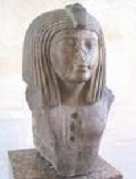
-992 Amenemope dies, and Osorkon (Osochor) the Elder (Aakheperre Setepenre) (d. -986), son of Shoshenq A of the Berber Libyan Ma (Meshwesh) becomes king #5 of the Egyptian 21st Dynasty, becoming the first pharaoh of Libyan extraction.
-990 Abi-Baal (d. -978) ("my father is Baal") becomes king of Tyre (until -981), transforming Tyre into a superb harbor. Alt. date for the birth of Israeli king Solomon (d. -930) after adding 45 years to Bishop Ussher's chronology.
-987 Eulma-Shakin-Shumi dies, and Ninurta-Kudurri-Usur I (d. -985) ("Ninurta protect my border/offspring") becomes king of Babylon
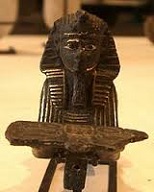
-986 Osorkon the Elder dies, and Siamun ("Son of Amun") (Netjerkheperre-Setepenamun) ("Like a god is the manifestation of Ra, Chosen of Amun") (d. -967) becomes pharaoh #6 of the Egyptian 21st Dynasty. Ninurta-Kudurri-Usur I dies, and his brother (son of Bazi) Shirikti-Shuqamuna ("goft of the god Suqamuna") becomes king of Babylon for 3 mo. (-985?).
-984 Shirikti-Shuqamuna dies, and Mar-Biti-Apla-Usur (d. -979) ("god Marbiti protect the heir") (a soldier from the Sealand with an Elamite name) becomes king of Babylon (until -979), founding the Seventh (Elamite) Dynasty.
-979 Mar-Biti-Apla-Usur dies, and Nabu-Mukin-Apli (d. -943) becomes king of Babylon, founding the Babylonian Eighth Dynasty.
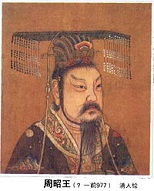
-978 Abi-Baal dies, and his son Hiram I (d. -944) (-980 to -947?) becomes king of Tyre (until -944), going on to unify all of Phoenicia from Mount Carmel to Arvad, except for vassal dynasties in Byblos and Arvad; he later enters into an alliance with King Solomon of Israel, sailing joint fleets in the Mediterranean and Indian Ocean, and trades with the port of Ophir (Supara), near Bombay, India on the W coast of the Indian peninsula, which becomes a flourishing trade center in this cent.; the first Jewish merchants arrive in Yemen, some staying permanently. Zhou Kang Wang dies, and next year his son Zhou Zhao Wang (Ji Xia) (d. -957) becomes Xi Zhou king #4 of China, going on to wage a disastrous war with the Chu confederation, ending his dynasty's expansion and starting its decline.
-975 Death of Israeli king #2 Solomon (b. -1035) in Jerusalem: "In the abundance of wisdom there is an abundance of vexation" (Ecclesiastes 1:18).
-972 Ashur-Rabi II dies, and his son Ashur-Resh-Ishi II (d. -967) ("the god Asshur has lifted my head) becomes king of Assyria (until -967). Alt. date for the end of King David's rule (Eerdman's Dict. of the Bible).

-970 In this year (-972?) (-967?) David is succeeded as king of Israel by his son (by Bathsheba the Bathing Babe) Solomon (-1035 to -975) (-990 to -931) (Sol-Om-On = Sun-Moon-Venus?) (Heb. "shalom" = peace), whom David anointed before he died in order to stop his eldest son (by Haggith) Adonijah (Heb. "Jehovah is my lord") from inheriting the throne; he rules for you guessed it 40 years, and bases his Red Sea navy at Ezion-Geber (Heb. "giant's backbone") on the Gulf of Aqaba (a part of Edom conquered by his daddy which the Israelites stopped at during their 40-year wanderings); he becomes known for his wisdom (3K proverbs, 1,005 songs in his bestselling writings Song of Songs (Song of Solomon) (Canticles), Book of Proverbs, and Ecclesiastes), plus his great riches, incl. 12K horses with horsemen, 1.4K chariots, 700 wives, 300 concubines, and fabled gold mines - the richest and smartest man who ever lived was a Jew?
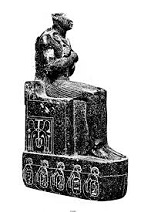
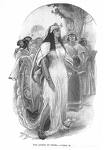

-967 Siamun dies, and high priest of Amun Psusennes (Pasebkhanut) II (Titkheperure) (Tyketkheperre) (Hor-Pasebakhaenniut II) ("Image of the transformations of Ra") (d. -943) becomes king #7 (last) of the Egyptian 21st Dynasty. Ashur-Resh-Ishi II dies, and his son Tiglath-Pileser II (Tukulti-Apil-Esharra) (d. -935) becomes king of Assyria. I can't tell you how happy I am you're here? About this time Jewish King Solomon builds the Temple of Solomon (First Temple of Jehovah) on Mount Moriah ("foundation") AKA Mount Zion in Jerusalem; about this time Solomon, who is known for his active gonads and love of women, and has 700 wives and 300 concubines (1 Ki. 11:3) (but there's always room for more) is visited by the Queen of Sheba (Sheba, Queen of the South) (S Arabia?) (Yemen?) (Ethiopia?) (1 Ki. ch. 10) for 6 mo., who at first makes him promise not to touch her, but as she's a black sugarpants babe and he's got a wicked sweet tooth he tricks her into touching one of his vases, then uses the power (kings only) pickup line, "Now that you have touched something of mine, I will touch something of yours", and jumps her bones (and marries her?), then she returns to her country (Axum?) (Sacred Hill of Yeha?) pregnant with his son Ebna la-Hakim ("son of the wise"), whom she renames Menelik I ("son of the wise"), who goes on to found the Ethiopian Dynasty, as recorded in the (authentic or total moose hockey?) Ethiopian Book of Kings (Kebra Nagast) (Kebia August); he later returns to visit his daddy Solomon (the original Guess Who's Coming to Dinner?), who shows pleasure at his hybrid vigor and gives him the Ark of the Covenant (Tabot) (only a replica?), which he takes back to Ethiopia, where it survives to modern times in a sealed temple where only priests can look at it because it protects the nation; Menelik is buried on Mt. Kilimanjaro; the Ark is secretly transported back to Israel in 1991 C.E.? During King Solomon of Israel's reign the first Jews arrive in India in Solomon's merchant fleet, and some settle in Cochin in S India, later being joined by Jews from Spain et al.; meanwhile a group of 14 shipwrecked Jews settle on the Konkan coast of W Maharashtra, calling themselves Bene Israel.
-957 Zhou Zhao Wang dies, and next year his son Zhou Mu Wang (d. -918) becomes Xi Zhou king #5 of China.
-952 Thersippos dies, and Phorbas (d. -921) becomes king of Athens.
-950 The Homeric Minimum of reduced solar activity begins (ends -800). Sudden climatic change in Ulster leads to wetter conditions and a pop. reduction in lowland areas - I'm Finnegan, and I love to fight? About this time Phrygian tribes from Thrace invade the WC plateau of Asia Minor; the Thyni and Bithyni tribes from Thrace migrate to the S shore of the Black Sea, founding Bithynia. Leather is used for written scrolls about this time.
-946 Zhou Mu Wang dies, and Zhou Gong Wang (d. -934) becomes Xi Zhou king #6 of China.
-944 Hiram I dies, and his son Baal-Ezer (Baal-Eser) (Baal-Bazer) I (d. -927) becomes king of Tyre (until -927).
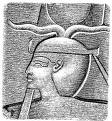
-943 Psusennes II dies, and Shoshenq (Sheshonq) (Sheshonk) I (d. -922) becomes king #1 of the Libyan (Berber Meshwesh tribe) Twenty-Second (XXII) (22nd) (Libyan Bubastite) Dynasty in Egypt, which lasts more than two cents. (until -715); he rules from the city of Bubastis (Per-Bast) ("House of Bastet") (Tell-Basta) in the Nile Delta, and goes on to wage a successful campaign against the kingdoms of Canaan, Philistia, Syria, Judah, Israel, and the Negev, conquering Megiddo, Byblos et al. (not Jerusalem?); the Shishak of the Bible? (1 Kings 11:40, 1 Kings 14:25, 2 Chron. 12:2-9). Nabu-Mukin-Apli dies, and Ninurta-Kudurri-Usur II becomes king of Babylon for 8 mo.
-942 Ninurta-Kudurri-Usur II dies, and his brother Mar-Biti-Ahhe-Iddina (d. -920) ("has given me brothers) becomes king of Babylon.
-934 Tiglath-Pileser II dies, and his son Ashur-Dan II (d. -912) becomes king of Assyria. Zhou Gong Wang dies, and Zhou Yi Wang (d. -909) becomes Xi Zhou king #7 of China.
-932 Alt. date for the end of Solomon's rule (Eeerdman's Dict. of the Bible).
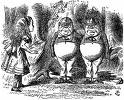
-931 The original Tweedledum and Tweedledee? Solomon (b. -990) dies after pissing-off Jehovah by letting his pagan wives lure him into their dirty business (but out of respect to his daddy David he waits until Solomon dies to lower the boom), and he is succeeded by his 40-y.-o. son (by an Ammonite mother) Rehoboam (Roboam) (-972 to -914) (Heb. "who enlarges the people"), who is crowned in Shechem, and reigns for 17 years as the last king of the united monarchy, and the first ruler of the S 2-tribe kingdom of Judah-Benjamin (plus Levites and individual switchovers); shortly after his coronation the 10 tribes of N Israel revolt from his heavy-handed tax machine and make Jeroboam (d. -910) (Heb. "he increases the people", "he pleads the people's cause") their king after recalling him from Egypt, and the kingdom splits into the rival kingdoms of 10-tribe Israel (N) (capital Shechem then Tirzah) and the poorer 2-tribe Judah (S) (capital Jerusalem) (1 Kings 11-12, 2 Chron. 10:1); end of the Hebrew Camelot Days; Rehoboam then supposedly listens to his Ammonite mother Naamah and abandons the true faith of Jehovah for sex worship, pissing Big J off again, resulting in an Egyptian invasion in his 5th year (1 Ki. 14:22-24 2 Chron. 12-1).
-930 Eurysthenes dies, and his son Agis I (d. -900) becomes Agiad king #2 of Sparta. Abi-Ball becomes king of Byblos in Phoenicia (until -920). Abi-Baal (d. -978) becomes king of Tyre, which is tra
-927 Baal-Ezer I dies, and his brother Abd-Ashtart (Abd-Astratus) (d. -918) becomes king of Tyre.

-926 Solomon's Temple of Jehovah in Jerusalem is plundered by the Egyptians in the 5th year of Judean king Rehoboam by his protector Pharaoh Shishak (Sheshonq I?), who allegedly carries the Ark of the Covenant to Tanis, as mentioned in the first Steven Spielberg Indiana Jones flick Raiders of the Lost Ark (1981) ; he takes all the treasures of the Jewish Temple and the king's house, incl. the gold shields of Solomon, which Rehoboam replaces with copper ones (1 Ki. 14:25-28, 2 Chron. 12:1-12).

-922 Tanis is buried in a month-long sandstorm; Shishak I dies, buried along with the Ark of the Covenant :), and his son (by Karomat A) Osorkon I (d. -887) becomes king #2 of the Egyptian 22nd Dynasty, going on to build many temples.
-921 Phorbas dies, and Megakles (d. -891) becomes king of Athens.
-920 Mari-Biti-Ahhe-Iddina dies, and Shamash-Mudammiq (d. -900) (named after Assyro-Babylonian sun-justice god Shamash) becomes king of Babylon. Elibaal becomes king of Byblos in Phoenicia.
-918 Abd-Ashtart dies, and Methus-Ashtart (Methus-Astartus) (d. -906) becomes king of Tyre (until -906).
-914 Rehoboam (b. -972) dies at age 58, and his son (one of 28) Abijah (Abijam) (d. -911) (Heb. "my dad is Jehovah") becomes king #2 of Judah (1 Ki. 14:31, 15:1-8); he is the son of Rehoboam's favorite concubine (of 60 concubines and 18 wives) Maacah (Micaiah) (2 Chron. 13), the granddaughter of David's favorite (3rd) son Absalom, and a descendant of King David on both his father's and mother's side, and hence "leaned upon Jehovah" (2 Chron. 13:13-20), proving it by marrying 14 wives and fathering 22 sons and 16 daughters.
-912 Abijah's army of 400K defeats Jeroboam's army of 800K, killing 500K of them and breaking Jeroboam's military power; the sacred golden calf city of Bethel is captured (2 Chron. chs. 12-13). Ashur-Dan II dies, and his son Adad-Nirari II (d. -891) becomes king of Assyria.
-911 Abijah dies, leaving 38 children by 14 wives, and his son Asa (d. -870) becomes king #3 of Judah (2 Chron. 13:21, 14:1, 1 Ki. 15:9-10).
-910 Jeroboam dies, and his son Nadab (d. -901) (Heb. "generous, noble") becomes king #2 of the northern 10-tribe kingdom of Israel, continuing his father's golden calf worship - preferring McDonald's to Mister Steak?
-909 In year 3 of King Asa of Judah (1 Kings 15:28) while sieging the former Levite city of Gibbethon (in Philistine hands), Nadab is assassinated by Baasha (d. -886) (Heb. "Baal hears"), the son of Ahijah of the tribe of Issachar, who then exterminates Jeroboam's house and takes the throne of Israel for himself, becoming king #3 of the 10-tribe kingdom of Israel, founding Israel's second dynasty and ruling for 24 years (1 Ki. 14:10, 20, 15:25-31). Zhou Yi Wang dies, and Zhou Xiao Wang (d. -894) becomes Xi Zhou king #8 of China, ordering the Duke of Shen to attack the Quan Rong in NW China.
-906 Methus-Ashtart dies, and his brother Astarymus (d. -897) becomes king of Tyre (until -897).



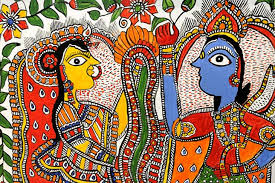
About this year the Iron Age Cold Epoch (Neoglaciation) (Climate Pessimum) begins (ends -300), bringing unusually cold climate to the North Atlantic, peaking during the expansion of Greece era about 450 B.C.E. Agis I dies, and Echestratus (d. -870) becomes Agiad king #4 of Sparta. Shamash-Mudammiq dies, and Nabu-Shuma-Ukin I (d. -887) becomes king of Babylon. In this cent. the Phoenicians sail W through Gibraltar, founding new colonies in Gades ("wall") (modern-day Cadiz) (SW coast of Spain near Gibraltar), Utica (Tunisia, N Africa), and Lixis (W coast of Africa). In this cent. the city of Lanuvium (Lanivium) 20 mi. SE of Rome is founded by Diomedes of Troy; in this cent. Rome is really founded? In this cent. the city of Samarkand ("samar" + "kand" = rock + fort) in modern-day Uzbekistan (modern-day pop. 500K) is founded. In this cent. Celtic peoples invade the British Isles. Late in this cent. the Greeks adopt the Phoenician alphabet after it is brought by Phoenician traders, and the Classical Period of the Greek Language begins, bringing the Attic dialect to the fore (ends -330) - At-ti-ca, At-ti-ca, At-ti-ca? Italy is an anthill of competing tribes? In this cent. the non-Indo-European-speaking Etruscans migrate from Asia Minor to the Italian Peninsula, settling in mineral-rich Etruria (modern-day Tuscany-Umbria) in the W-C part N of Rome, becoming skilled in bronze, silver and goldwork, as well as granular decoration, and originating many of the things Romans are later known for, incl. gladiator contests, road and bridge building, irrigation works, and the trumpet (salpinx); they worship the Sun god Cautha (Cath), along with Tinia and Uni (prototypes of Jupiter and Juno), and construct tombs which are houses for the dead, decorated with paintings showing a joyous afterlife; the Sabellians also inhabit Italy, along with the Iapygians (Iapyges) in Apulia (Puglia) (in the heel of SE Italy between the Appenines, Adriatic and Gulf of Taranto), the Venetic-speaking Veneti in Venetia, and the Latin-speaking Latins in Latium, the region to the E and S of Rome on the W Tyrrhenian coastal plain, from the Tiber River in the N to Monte Circeo 65 mi. to the S, bounded on the N by Etruria, the S by Campania Felix (Lat. "fertile countryside") (known for good farmland and harbors), the E by the foothills of the Apennine and Lepini Mts., and split into 50 small communities; about this time Rome is six clusters of round twig huts on six low hills just SE of the Tiber River, with a marketplace beside the river and a crude fortress on the 7nth hill; one of the hills is eventually taken over by the Sabines; the oldest city of Latium is Alba (Lat. "white") Longa (founded in the 12th cent. B.C.E.); in this cent. Nicostrata (a woman) allegedly invents the Roman alphabet from the Chalcidian alphabet of Cumae; popular Latin names are based on the god Mars (Marcus, Marcellus). About this time the Videha (Mithila) (Tirabhukti) Kingdom (ends -500) in the Mitila region of modern-day Bihar in N India between the Mahananda River, Ganges River, Gandaki River, and foothills of the Himalaya Mts., becomes a major political-cultural center of India along with Kuru and Pancala, becoming known for 8th-7th cent. world-renouncing philosopher king Janaka (father of Sita in the "Ramayana") , whose court became an intellectual center for sages (rishi) incl. Yajnavalkya (Yagyavikya), who coins the term Advaita (monism) and welcomes women to participate in Vedic studies; the Madhubani district of Mithila becomes known for Madhubani Art, created by women and characterized by eye-catching geometrical patterns with ritual content. The Chavin Civilization is founded in the Andes region of Peru (ends 200 C.E.), forming the basis of the 15th cent. C.E. Inca Empire; the shrine of Chavin de Huantar (Huántar) in the foothills of C Peru creates and spreads religious icons based on jaguar men and snakes. About this time Ancient Greek Architecture begins (ends 100 C.E.), becoming known for its temples, open-air theaters (starting -525), public squares (agoras), storied colonnades (stoas), processional gateways (propylons), town council bldgs. (buleuterions), public monuments, monumental tombs (mausoleums), and stadiums; architectural styles are divided into the Doric Order, the Ionic Order, and the Corinthian Order; Ancient Roman Architecture shamelessly steals from them. In this cent. Rishabha (Adinatha) (First Protector) AKA Adishvara or Adeshvara (Primal Lord), the 23rd Tirthankara (ford maker) allegedly founds Jainism (Sansk. "to conquer"), the religion of not hurting a fly (non-violence and self-control), which peaks in India in the 8th cent. B.C.E., and after all the carnage is now down to 4M followers, albeit 90+% literate. The Osorkon Bust (Elibaal Inscription is discovered in Byblos, Phoenicia (modern-day Lebanon) in 1881. A green 26-lb. 5-in.-thick Olmec stone slab inscribed with insects, corn, and fish (28 glyphs) is discovered in Mexico in 2006, becoming the earliest known example of writing in the Western Hemisphere. Architecture: The 42m-high Buddhist Mahayana temple (stupa) Borobudur ("monastery on a hill") is built in C Java in this cent. Poetry: Poetry: In this cent. the Sanskrit Mahabharata, the world's longest epic poem is written in India, about the struggle between the Pandava and Kaurava families - the original Dallas, Dynasty, and Falcon Crest?
-899 On Apr. 21 there is a solar eclipse, causing a "double dawn" over Zheng, China.
-897 Astartymus dies, and his brother Phelles (d. -896) becomes the last king of the Abi-Baal Dynasty of Tyre.
-896 Phelles is assassinated by Esh-Baal (Itto-Baal) (d. -863), high priest of Astarte, who becomes king of Tyre (until -863) and founds a new dynasty; he marries his 15-y.-o. daughter Jezebel (Heb. "Where is the prince [Baal]?) to Ahab (Heb. "uncle"), son of Omri in Israel, and links his house by marriage to Ben Hadad I of Damascus; Ahab builds her a temple to Astarte, pissing-off the Jehovah purists.
-895 Spartan king Soos dies, and Eurypon (Eurytion) (d. -865) becomes king #3 of Sparta, founding the Eurypontid Dynasty.
-894 Zhou Xiao Wang dies, and Zhou Yi Wang (d. -878) becomes Xi Zhou king #9 of China.
-891 Adad-Nirari II ("Father of Assyrian Imperial Admin.") dies after signing a treaty with Babylon guaranteeing peace for 80 years, and his son Tukulti-Ninurta II (d. -884) becomes king of Assyria. Megakles dies, and Diognitos (d. -863) becomes king of Athens.
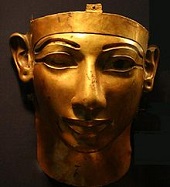
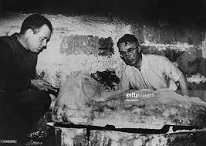
-887 Osorkon I dies, and his son Shoshenq (Shishenq) (Haqakheperre) II (d. -885), becomes king #3 of the Egyptian 22nd Dynasty, becoming the only king of this dynasty whose tomb isn't plundered because it is hidden inside an antechamber of Psusennes I's tomb in Tanis; in the 1939-40 season French Egyptologist Jean Pierre Marie Montet (1885-1966) discovers the intact tombs of Pharaoh Psusennes I, Pharaoh Amenemope, and Pharaoh Shoshenq II, along with the partially-plundered tomb of Takelot I, and the fully-plundered tomb of Osorkon II in Tanis; on May 20, 1939 he removes Shoshenq II's coffin lid in the presence of King Farouk of Egypt, and discovers a hawk-headed silver coffin, gold funerary mask, and a treasure trove of jewel-encrusted bracelets and pectorals. Nabu-Shuma-Ukin I dies, and Nabu-apla-iddina (d. -855) becomes king of Babylon, having the Stone Tablet of Nabu-apla-iddina inscribed to record a deed restoring lands to a priest.
-886 Baasha dies and is buried in his capital city Tirzah, and his son Elah (d. -885) (Heb. "big tree") becomes the king #4 of the 10-tribe kingdom of Israel, ruling in Tirzah for parts of two years (1 Ki. 16:8).
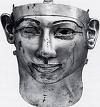
-885 Osorkon I dies, and his son (by Tashedkhons) Takelot I (Hedjkheperre Setepenre) (d. -872) becomes king #4 of the Egyptian 22nd Dynasty. In the 27th year of Asa of Judah (1 Ki. 16:15-18), Judean king Elah's chief of half the chariots Zimri (Zambri) rebels, waits until the army is on maneuvers at Gibbethon and Elah is drunk, then kills him and the whole house of Baasha, allegedly fulfilling a prophecy (1 Ki. 16:1-14); he then proclaims himself king #5 of the 10-tribe kingdom of Israel, but rules for only seven days when the army proclaims army chief Omri king and returns to siege him at Tirzah, causing him to burn the king's house down over himself (1 Ki. 16:3-20) and die; later el taunts Jehu from a window with the killer soundbyte, "Did it go all right with Zimri the killer of his lord?" (1 Ki. 9:30-31); Omri (d. -873), of who knows what tribe becomes king #6 of the northern 10-tribe kingdom of godforsaken Israel, ruling for 12 years and founding its third dynasty, which is so powerful that the Assyrians start calling Israel "the land/house of Omri", even after his house falls; Tibni, the son of Ginath presents himself as the rightful (7th) king, dividing the people and causing a 4-year civil war.
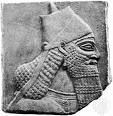

-883 Tukulti-Ninurta II dies after rebuilding the walls of Nineveh, and his son Ashurnasirpal (Assurnasirpal) (Ashur-Nasir-Apli) II (d. -859) becomes king of Assyria, and the king of cruel, the "classic Neo-Assyrian monarch", known for undertaking 10 major military campaigns throughout W Asia as far as the Mediterranean; he moves the capital from Assur (Ashur) to Nimrud-Kalash; "I built a pillar against his city gate and I flayed all the chiefs who had revolted, and I covered the pillar with their skin. Some I walled up within the pillar, some I impaled upon the pillar on stakes, and others I bound to the stakes of the pillar."
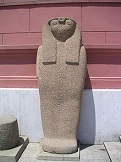
-880 Shoshenq II's son Harsiese A (Hejkheperre Setepenamun) (d. -860), high priest of Amun in Thebes declares himself king of Egypt, founding the Twenty-Third (XXIII) (23rd) Egyptian Dynasty (ends -720), and splitting Egypt N-S. Tibni dies, leaving Omri the sole (and now 8th) king of the 10-tribe kingdom of Israel for eight years (1 Ki. 16:21-23, 29), where he continues doing sex, drugs and rock & roll ("kept doing what was bad in the eyes of Jehovah and came to do worse than all who were prior to him") (1 Ki. 16:25-26), although that doesn't stop him from "mightiness" (1 Ki. 16:27); about 840 B.C.E. the Moabite Stone says (lines 4-8) that he brings Moab into subjection, which Ahab continues after him (2 Ki. 3:4); he moves the capital from Tirzah to the more defensible new city of Samaria, which he purchases along with the whole mountain from its owner Shemer (1 Ki. 16:23-24); he surrenders some cities to the king of Syria (1 Ki. 20:34), and is the first Israelite king to pray tribute to Assyria; it contains a reference to the House of David?
-879 Ben-Hadad II (d. -842) becomes king of the Arameans, and forms a coalition of neighboring kingdoms (incl. Israel and Judah) to fight the superpower threat from Assyria.
-878 Ashurnasirpal II captures the Aramean stronghold of Kaprabi. Zhou Yi Wang dies, and Zhou Li Wang (d. -827) becomes Xi Zhou king #10 of China.
-877 Ashurnasirpal II begins his great campaign to Phoenicia, conquering Karkimesh, Aleppo and the coast of Lebanon.
-873 Omri dies, and in -871 his son Ahab (d. -853) (Heb. "father's brother") becomes king #9 of the 10-tribe kingdom of Israel, ruling in Samaria for 22 years (1 Ki. 16:28-29, 22:40, 51); he marries 15-y.-o. Jezebel (Heb. "Where is Baal?") (1 Ki. 16:31) of Tyre, great-aunt of Carthage founder Dido and daughter of Itto-Baal (Ethbaal) (Ithobalus) (former priest of Ashtoreth AKA Astarte AKA Asherah), and king of Sidon by regicide), who leads him down from family-style golden arches calf worship to total sex-drugs-and-rock-n-roll (Tom Cruise and Nicole Kidman style?) Baal worship, supporting 450 prophets of Baal from the royal table and ordering all of Jehovah's prophets slain (100 are saved by Ahab's house mgr. Obadiah by hiding them in a cave) (1 Ki. 18:3-13, 19:10); Ahab rebuilds Jericho to strengthen control over Moab, and fortifies Samaria, building a "house of ivory" (1 Ki. 22:39, Amos 3:15, 6:4); after Syrian king Ben-hadad demands Gilead (on the E bank of the Jordan River) and Ahab refuses, uttering the soundbyte "It is not the man who puts on the armor who should boast... but the one who takes it off", Ben-hadad leads a 32-king coalition on Ahab, but is defeated (1 Ki. chs. 20-21); too bad, Ahab doesn't follow Jehovah's orders and kill Ben-Hadad, but extends him the hand of peace, pissing off Jehovah's prophet Elijah, who begins an epic power struggle with him and his "harlot" wife Jezebel and their prophets of Baal (1 Kings chs. 17-19), beginning with three years of drought.

-872 Takelot I dies, and his son (by Kapes) Osorkon II (d. -837) becomes king #5 of the Egyptian 22nd Dynasty, ruling from Tanis, facing competition from his cousin Harsiese A, who rules from Thebes, but soon dies, allowing Osorkon II to appoint his young son (by Djedmutesankh) Nimlot C as high priest of Amun in Thebes; meanwhile he appoints his young son Hornakht (Harnakht) as high priest of Amun in Tanis, who dies before age 10, and is buried in his tomb in Tanis.
-870 Echestratus dies, and his son Labotas (Leobotes) (d. -840) becomes Agiad king #4 of Sparta, launching a war against the Argives. Asa dies, and his 35-y.-o. son (by Azubah the daughter of Shilhi) (co-regent since -873) "Jumpin'" Jehoshaphat (Yehoshafat) (Jehosaphat) (Josaphat) (d. -849) (Heb. "Jehovah is judge") becomes king #4 of Judah, ruling for 25 years (1 Kings 22:41-2, 2 Chron. 20:31), proving to be one of the "good" kings, his reigned marked by peace and even tribute from Philistines and Arabs; too bad that he enters into a marriage alliance with idolatrous Israel, marrying his firstborn son Jehoram to king Ahab's wicked daughter Athaliah (1 Ki. 22:44, 2 Chron. 18:1).
-867 Phoenicia is subjugated by Assyria (ends -612).
-865 Eurypon dies, and Prytanis (d. -835) becomes Eurypontid king #2 of Sparta.
-863 Diognitos dies, and Pherekles (d. -844) becomes king of Athens. Esh-Baal I dies, and his son Baal-Eser II (d. -829) becomes king Tyre (until -829).
-860 Karibil A founds the Kingdom of Saba (Sheba) ) in S Arabia (Yemen) (ends -275), with the kings being known as the makrab after they conquer surrounding states, going through 79 kings by 275 C.E., when the Himyar (Himyarite) Kingdom (founded -110) in Yemen under Yasir Yuhan'im I conquers it, going through 23 kings by the time it ends in 577 C.E. with Maadikarib III.
-859 Ashurnasirpal II dies, and his son Shalmaneser (Shalmeneser) III (Shulanu-Asharedu) (d. -824) becomes king of Assyria, with capital at Nineveh (2 Ki. chs. 7-8); a relief shows him shaking hands with a Babylonian ruler, becoming the earliest known depiction of a handshake? About this time Aramu (Arame) (d. -824) becomes the first king or Urartu, with capital at Arzashkun, which is captured and burned by Shalmaneser III in the -840s.
-856 Shalmaneser III defeats the Amorite state of Bit-Adini (Beth Eden) ("house of Eden") and establishes a bridgehead over the Euphrates River; he also defeats Aramu (Arame), the first known king of Urartu (Lake Van).
-855 Shalmaneser III raids Kizzuwatna (Cilicia) (SE Asia Minor on the Mediterranean coast), Syria, and Urartu, pillaging N of Lake Van. Nabu-Apla-Iddina dies, and Marduk-zakir-shumi I (d. -819) ("Marduk pronounced the name") becomes Dynasty IX king of Babylon (until -819).
-853 Shalmaneser III enters the plains of Syria and is met by a Syrian coalition army led by Iruhuleni of Hama and Ben-Hadad II of Damascus, supported by 12 kings, incl. those of Phoenicia and Israel (King Asa contributes a chariot force); Assyria claims a V at the Battle of Karkar (Qarqar) on the Orontes River, although it is really indecisive; King Ahab of Israel induces King Jehoshaphat of Judah to join him in the retaking of Ramoth-gilead from the Syrians, and is killed by a Syrian archer; when his body is brought to Samaria for burial, Jehovah's curse (1 Ki. 21:1-23, 2 Ki. 9:26) on him for the murder of his Jezreelite neighbor Naboth comes true, because when "they began to wash off the war chariot by the pool of Samaria... the dogs went licking up his blood" (1 Ki. 22:1-38); Ahab's son Ahaziah (d. -852) (Heb. "Jehovah has taken hold") becomes king #10 of the 10-tribe kingdom of Israel for two years, continuing to practice Baal worship (1 Ki. 22:51-3); Moab quickly revolts (2 Ki. 1:1, 3:4-5), but before he can take charge Ahaziah has a house accident, falling through a grating in his roof chamber, leaving him bedridden (2 Ki. 1:2); his brother Jehoram (d. -841) becomes co-regent; Israel forms a shipbuilding alliance with King Jehoshaphat of Judah at Ezion-Geber on the Gulf of Aqaba, but it fails (2 Chron. 20:35-7, 1 Ki. 22:48-9).
-852 The city of Nisibis in SE Asia Minor is first mentioned as the seat of Assyrian provincial gov. Shamash-Abua. The ailing Ahaziah has a sorcerer's battle with Jehovah's prophet Elijah (who gives him a death notice from Big J himself) and loses (1 Ki. ch. 2-17), dying sonless, leaving his brother Jehoram (Joram) (d. -841) (Heb. "Jehovah is exalted") (brother-in-law of the other Jehoram in Judah because the latter is married to his sister Athaliah) as the 11th king of the 10-tribe soap opera kingdom of northern Israel; he reigns 12 years (2 Ki. 1:17-18, 3:1, 9:22), reversing his daddy's Baal thang, removing the sacred pillar erected by the red priest Lucille (just kidding, it was the Babalu priest Desi), but still falling short, continuing to do "what was bad in Jehovah's eyes", clinging to Jeroboam's golden calf worship (1 Ki. 12:26-29, 16:33; 2 Ki. 3:2-3); Joel writes his book during his reign?; Elijah is taken up to ? in a windstorm (and years later writes a letter to Judean king Jehoram, 2 Chron. 21:1, 12-15), and his assistant (for the past six years) Elisha succeeds him as Jehovah's prophet in Israel, performing many miracles in his 60-year ministry after asking Jehovah for "two parts in Elijah's spirit" (2 Ki. 2:9) so he can be his firstborn spiritual son, entitled to two parts of his father's inheritance. Meanwhile, in South Soapoperaland, Jehoshaphat's firstborn son Jehoram becomes co-ruler with his father of the kingdom of Judah.

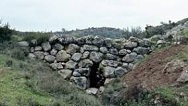
-850 About this time the Aryan tribe of Persians settles in Anshan S of Susa, and the Aryan Invasion of Persia (Iran) (begun -1900) ends. Mesha, son of Kemoshmelek, king of Moab E of the Dead Sea erects the Moabite Stone, crowing about his successful revolt against the Hebrews and their whimpy god Jehovah (Yahweh), becoming the earliest known reference to this god outside the Bible (see 2 Ki. 3:27 for the Israelite version); rediscovered in 1868 C.E. Syrian king Ben-Hadad erects a monument in the city of Dan proclaiming his big V over the towns of N Israel. The brother of Marduk-Zakir-Shumi I launches a revolt against Babylon with the help of the Arameans; Babylon calls on Assyria for help, and Shalmaneser III defeats the rebels, making Babylon a vassal. Architecture: The oldest datable bridge on Earth is a slab-stone single-arch bridge over the Meles River in Smyrna (Izmir), Turkey.
-849 Baal-Mazzar (d. -830) becomes king of Tyre? Jehoshaphat dies, and his 32-y.-o. firstborn son Jehoram (d. -842) (Heb. "Jehovah is High") becomes king #5 of Judah, reigning eight years (2 Ki. 1:17, 8:16, 21:2-20); thus both Judah and Israel are ruled by brothers-in-law named Jehoram; due to his wife Athaliah's bad influence, Jehoram of Judah departs from his dad's righteous ways, murders his six brothers, causes Edom and Libnah to rebel (2 Ki. 8:20-22), and is plagued by Arabs and Philistines who invade and overrun Judah and take his wives and sons captive - a foretaste of the days of Muhammad? Shalmaneser III campaigns against Syria.
-848 Shalmaneser III campaigns against Syria.
-844 Pherekles dies, and Ariphron (d. -824) becomes king of Athens. Aramu dies, and his son Lutipri (d. -834) becomes king #2 of Urartu.
-842 King Baal-Mazzar of Tyre pays tribute to Shalmaneser III. King Ben-Hadad II of Damascus dies after he sends Hazael to inquire of prophet Elisha if he will recover from his sickness, and the latter predicts that he will die and that Hazael will rule in his place; the next day Hazael suffocates the king under a wet "netted cloth" and becomes king of Damascus (2 Ki. 8:15). After receiving a prophetic mandate, Jehu, son of Nimshi and CIC of the army is anointed king in Ramoth-gilead in order to destroy the house of Ahab in retaliation for the acts of wicked Jezebel, and leads a bloody military revolt to seize the throne of Israel; after meeting Jehoram of Israel at Jezreel and telling him that there can be no peace in Israel while the "whoredoms and sorceries" of Jezebel continue, he shoots an arrow through the fleeing king's heart, then kills King Ahaziah of Judah (grandson of Ahab and El), then returns to Jezreel to kill Jezebel herself; she tries to pussy-whip him by dressing up and flashing him from a window, but her own attendants throw her out and she is trampled to death by horses, then eaten by dogs, leaving only the skull, feet, and palms (2 Ki. 9:32-37); Jehu (d. -814) (Heb. "Jehovah is he") becomes king #10 of Israel (2 Ki. chs. 9-10); as a "son of a murderer" (2 Ki. 6:32) Jehoram's body is pitched into the field of Naboth, the man his daddy Ahab had murdered in order to get a vineyard (2 Ki. 9:14-26); Jehu wipes out the dynasty of Omri, and obliterates Baal worship in Israel; his dynasty lasts five generations, so Jehovah must have really liked it? Not to be left out of the TV sweeps, Jehoram of Judah, plagued by Jehovah with a sickness in his intestines for two years, tosses his matzohs when "his intestines came out", and he dies and is buried in Jerusalem, "but not in the burial places of the kings"; next year his son Ahaziah (Jehoahaz) (d. -841) (Heb. "Jehovah has taken hold"), who escaped the invasions becomes king #6 of Judah, reigning only 1-2 years (1 Ki. 22:51-3; 2 Ki. 1:17-18, 3:1-3, 10:12-14; 2 Chron. 21:7, 6-20; 22:1; 1 Chron. 3:10-11), and having a new son Jehoash with his wife Zibiah from Beersheba (2 Ki. 12:1; 1 Chron. 3:11).


-841 Baal-ezer II dies, and his son Mattan I (d. -832) becomes king of Tyre. Ahaziah is killed by Jehu (2 Ki. 9:14-28), and his enraged mother Athaliah (d. -835) (Heb. "Jehovah is great, exalted") kills all the others of the royal line except Ahaziah's infant son Jehoash, who is hidden by the high priest Jehoiada and his wife Jehosheba (Jehoash's aunt) in the Temple; Athaliah takes the throne by force, becoming king #7 (only female) of Judah, reigning for six years, taking the opportunity to rob the Temple of its holy things and offer them up to her god Baal, which as you must know by now, makes Jehovah mighty angry. Shalmaneser III campaigns against Syria; he attacks Damascus, crushing the army of Hazael; he receives gold and silver tribute from Judean king Jehu, son of Omri, and erects the Black Obelisk of Shalmaneser III.
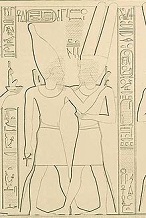
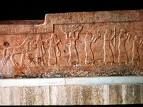
-840 Nimlot C dies, and his son Takelot F (high priest of Amun in Thebes) becomes Takelot II (Hedjkheperre-Setpenre) (Se Ese = "Son of Isis") (d. -815), king #2 of the Egyptian 23rd Dynasty. Labotas dies, and his son Doryssus (Dorissus) (Doriagus) (d. -820) becomes Agiad king #5 of Sparta. Ft. Shalmaneser in Nimrud-Kalash is built; it is excavated in 1957 C.E.
-838 Shalmaneser III attacks Damascus, fails, and never returns to Syria.
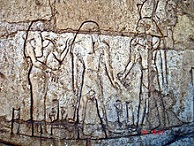
-837 Osorkon II dies, and non-son Shoshenq III (Usermaatre Setepenre) (Setepenamum) (d. -798) becomes king #6 of the Egyptian 22nd Dynasty, ruling for 39 years.
-836 The Assyrians defeat the Medes, becoming their first known mention in historical records.
-835 Prytanis dies, and Polydectes (d. -805) becomes Europontid king #3 of Sparta. Ahaziah's youngest son Jehoash having been hidden in the Temple until he reaches the ripe old age of 7, high priest Jehoiada (Heb. "Jehovah knows") and his wife Jehosheba gain the help of five chieftains and 500 men, then stage a palace coup (2 Ki. 11:4-12, 21; 2 Chron. 23:1-11), kill Athaliah at the entry of the horse gate, tear down her house of Baal and murder her Baal priest Mattan (2 Ki. 11:13-20, 2 Chron. 23:12-21); they crown Jehoash (Joash) (d. -796) (Heb. "Jehovah is strong, "Jehovah has bestowed") as king #8 of Joltin' Judah; he reigns 40 years, at first being placed under the wing of Jehoiada, marrying two wives, one of which, Jehoaddan, saves the faltering line of David leading to Messiah; but upon the death of Jehoida he goes bad, opts for idolatry and phallic sacred poles, and finally kills the prophet Zechariah, thus sealing his Biblical fate (2 Chron. 24:20-22).
-834 Lutipri dies, and his son Sarduri (Sarduris) I (d. -828) becomes king #3 of Urartu, moving the capital to Tushpa (Van), and fighting the Assyrians.
-832 Mattan I dies, and his son Pummayyon (d. -785) becomes king of Tyre.
-830 Baal-Mazzar of Phoenicia dies? Damascus king Hazael destroys the Philistine city of Gath, home of Goliath; rediscovered in 2015.
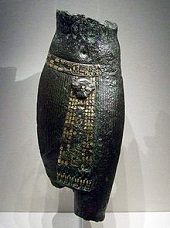
-829 Pedubast (Pedubastis) I (d. -804) becomes king #3 of the Egyptian 23rd Dynasty, ruling for 25 years, going on to get into a long civil war with Takelot II, taking over in -815, after which he makes his son Iuput (Auput) I his co-regent, becoming king #4. Baal-Eser II dies, and Mattan (Mittin) I (d. -820) becomes king of Tyre (until -820).
-828 Sarduri I dies, and his son Ishpuinis (Ispuini) (d. -810) becomes king #4 of Urartu, going on to conquer the city of Musasir from the Mannaeans and make it the religious center of his empire, which worships war god Haldi; he then stops an attack by Assyrian king Shamshi-Adad V, after which he begins calling himself "king of the Universe", "glorious king", and "king of the land of Nairi".
-827 A revolt erupts in Assyria led by Shalmaneser III's son Ashur-Dan-Aplu. Zhou Li Wang dies, and Zhou Xuan Wang (d. -781) becomes Xi Zhou king #11 of China.

Takelot II (d. -800) founds the Egyptian Twenty-Fourth (XXIV) (24th) Dynasty, which rivals the 23rd.
-824 Shalmaneser III dies before the revolt ends, and his son Shamsi-Adad V (d. -810) becomes king of Assyria; Babylon helps Assyria put down the great rebellion. Ariphron dies, and Thespieas (d. -797) becomes king of Athens.
-823 The Assyrian revolt is crushed.
-822 Urartian king Ishpuini fights the Assyrians.
-820 Mattan I dies, and Pygmalion (Pu'mayton) (d. -774) becomes king of Tyre (until -774). Doryssus is KIA in a battle with the Argives, and his son Agesilaus I (d. -785) becomes Agiad king #6 of Sparta.
-819 Marduk-Zakir-Shumi I dies, and Marduk-Balassu-Iqbi (d. -813) ("Marduk has promised his life") becomes king of Babylon.
-814 Jehu dies, and his son Jehoahaz (Joahaz) (d. -798) becomes the 13th king of Israel. The Phoenician settlement in Kition (Latarkia) moves out and founds the new independent town of Qart Hadasht (New City), later called Carchedon by the Greeks, and Carthage (Carthago) by the Latins; it eventually has a 20-mi.-circumference wall built around it; according to myth it was founded (in -814?) by Queen Dido (Elissa) (Alissar), daughter of King Belus of Tyre, whose brother and co-monarch Pygmalion murdered her hubby-uncle Sychaeus (Acerbas), high priest of Melqart in the temple, hiding it from her for a long time and causing her to flee there; after being offered as much land by native chief Iarbas as a bull's hide can cover, she cuts one into thin strips and pastes them together to maximize the area; after committing suicide to avoid marrying him, a nig, er, African prince, and/or hooking up with lily-white Troy survivor Aeneas and doing it because he jilted her, she is visited by Aeneas in the underworld, who sees her reunited with Sychaeus, and won't look at him; Carthage is destroyed by the Romans in 146 B.C.E.; they engaged in child sacrifice?
-813 Marduk-Balassu-Iqbi is deposed by Shamshi-Adad V and carried off to Assyria.
-811 Baba-Aha-Iddina is deposed by Shamshi-Adad V; there are no kings in Babylon for a dozen years.
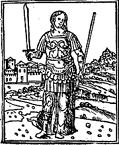
-810 Shamshi-Adad V dies, and his wife Semiramis (Semiramide) (Semiramida) (Shamiram) (Sammuramat) rules Assyria while her son is a minor; she later becomes the focus of a great legend about an Amazon warrior babe. Ishpuinis dies, and his son Menua (Menuas) (d. -785) becomes king #5 of Urartu (Lake Van), going on to extend his kingdom to the entire Armenian highland area, building the walls and 47-mi. aqueduct of Tushpa, and building Ft. Menuakhinil on Mount Ararat.
-806 Adad-Nirari III (d. -783) reaches majority and rules Assyria; he raids Syria and imposes tributary status on all the states there incl. Israel and Edom.
-805 Polydectes dies, and Eunomus (d. -775) becomes Eurypontid king #4 of Sparta.
-804 Pedubast I dies, and Shoshenq VI (d. -798) becomes king #5 of the Egyptian 23rd Dynasty, ruling from Thebes for six years.

-800 Alt. date for the Hallstatt Culture. In this cent. the Greek kingdom of Lydia (ends -547) in W Asia Minor between the Ionian cities of the W coast and Phrygia, with capital at Sardis (Sardes) on the N base of Mt. Timolus on the gold-bearing Pactolus River 2.5 mi. S of the Hermus River (5 mi. NE of Smyrna) is founded by Lydus (son of Atys), worshiping the gods Santas, Baki (Bacchus) et al. In this cent. the city of Sparta (originally Lacedaemon, after King Lacedamon of Laconia, son of Zeus and nymph Taygete, husband of Sparta, daughter of Eurotas, and father of Amyclas, Eurydice, and Asine), capital city of Laconia in the SE Peloponnesus (Land of Pelops) (Gr. "dark face") (Morea) ("mulberry") in the Eurotas River Valley is founded by Dorians via the merger of 4-5 Laconian villages; the Spartan Dyarchy allegedly begins when King Aristodemus dies, leaving twin sons Eurysthenes and Procles, who found the two jointly-reigning royal dynasties of the Agiads (ends -215) and the Eurypontids (ends -192?); the original inhabitants are enslaved, becoming the Helots. About this time Karanos (Caranus), brother of King Pheidon of Argos becomes king #1 of Macedon (Macedonia), home of 9,570 ft. Mt. Olympus on the S border just N of Thessaly (which the Titans piled Mt. Pelion and Mt. Ossa on in a futile attempt to reach heaven). Ninurta-Apla-? (d. -790) becomes king of Babylon. Takelot II dies, and his son Osorkon III (d. -778) becomes king of the rival Egyptian dynasty. The D'mt Kingdom in Ethiopia is founded in this cent. by the Semitic-speaking Habesha (Axumite) people, centered in the province of Tigray in C Eritrea by -400. By this cent. the Greek city-state (polis) system emerges, with the main cities being Athens (modern-day pop. 664K/3M) (in Attica) (which imports grain from the Black Sea region), Chalcis (Chalkis) (in Euboea) (known for its metalwork), Eretria (in Euboea) (known for its coinage), and Samos (an island in the E Aegean Sea) (both for furniture and textiles), Corinth (in Corinthus (48 mi. W of Athens), Sicyon (Sikyon) (Sekyon) in Argolis W of Corinth, between the Nemean and Sythas Rivers, and home of Lake Lerna and the multi-headed hydra?); commerce is mainly by sea; the Delphic Oracle is rededicated, becoming the #1 site for the worship of Apollo; the Greek Archaic Period in Art begins (ends -510) (-750 to -480?), switching from abstract geometric patterns to a more naturalistic style; the men marry at age 30 and women at 15-16, becoming breed mares and slaves, living in seclusion, except for Spartan women, who receive physical training with men (you can have it if you kick my ass first?); Mt. Pentelicus and Mt. Paros produce marble, Mt. Laurium and Mt. Pangaeus produce silver, Mt. Pangaeus and Thasos produce gold; Laconia produces iron, and Cyprus produces copper, causing the Romans to name copper after it (cyprium) - you own it, we tote it? By this time Soccaly, er, Sicily (shaped like a deflated soccer ball and placed at the toe of the boot of Italy for easy kicking?) is inhabited by Sicans, Sicels (Sikels), Elymi (Elymians), as well as Phoenician colonists; S Italy is inhabited by Sicels, Messapii (SE heel) and the Dacian Apuli (Salentini) (Sallentini) (Calabri), who found the fortress city of Apulon (Apulum) near modern-day Alba Iulia, Romania - it's theirs to lose? In this cent. the Assyrians build an artificial harbor in Ashdod on the coast of Israel. In this cent. the colony of Sexi (Sexi Firmum Iulium) is founded by the Phoenicians in the Costa Tropical of SE Spain (in the Malaca district near modern-day Almunecar) in a colonization race with the Greeks; during the age of the Roman Empire it incl. the suburbs of Villa Fatuus Maximus, Socordia, and er, Paenis - I'm too sexi for my toga? In this cent. the city of Todi (Tutere) (Tuder) ("border") in C Italy on a tall double-crested hill overlooking the E bank of the Tiber River is founded by the Umbri at the Etruscan frontier. In this cent. the original group of Nordic (blonde) Germanics from the Baltic Sea region splits into West (Goths), East (Vandals) and N Germanic (Scandinavian) groups, the West Germanics reaching coastal NW Germany (Hanover) by the end of the cent. About this time the Napata Kingdom on the W bank of the Nile River in Nubia (modern-day Karima, N Sudan) is founded (until 350 C.E.), with capital at Meroe (Meroë) (Medewi or Bedewi) (modern-day Shendi, Sudan) 120 mi. NE of Khartoum, taking its culture from the Egyptian 25th Dynasty based in Kush; about 280 B.C.E. the royal burial ground is transferred to Meroe from Napata. In this cent. the Paracas Culture in Peru begins (ends 100 C.E.); the auburn-haired nobility practices skull-binding, creating elongated skulls. In this cent. cotton from India appears in Assyria. About this time a burial mound in the Celtic Halstatt Culture village of Kasendorf, Bavaria, Germany (7 mi. W of Kulmbach) contains large numbers of beer jugs containing traces of beer incl. an amphora with traces of black wheat ale flavored with oak leaves, becoming the earliest known beermaking operation in Europe; discovered in 1935. The Axial (Axis) Age of Karl Jaspers (1883-1969) begins (ends -200), when "the great world traditions that have continued to nourish humanity came into being: Confucianism and Daoism in China; Hinduism and Buddhism in India; monotheism in Israel; and philosophical rationalism in Greece", and where "What mattered was not what you believed but how you behaved", and the concept of kenosis (Greek for emptying), "spirituality of self-surrender" is the goal. As far back as this cent. the Later Upanishads ("sitting down near") begin to be composed (ends -400?); traditionally, 108 of them exist, varying from 1-50 printed pages in length, forming the lit. foundation of Hinduism, incl. the Brahman (universal spirit), the Atman (individual self), and the divine syllable Aum, and how the non-dual Brahman-Atman is the all inclusive ground of the Universe while all reality in the Universe is but an illusion - we won't mention sacred cows? The Trojan War really happened about this time? Inventions: The Saddle (without stirrup) is developed in this cent. by the Assyrians, consisting of a simple cloth and surcingle; stirrups aren't invented until the 4th cent. C.E. in China? Science: About this time Couching (using a sharp instrument to push a cloudy lens to the bottom of the eye to cure cataract) is first described in the medical treatise "Sushruta Samhita, Uttar Tantra" by Indian surgeon Maharshi Sushutra.
-798 Shoshenq III dies, and his son Shoshenq IV (Hedjkheperre Setepenre) (d. -785) becomes king #7 of the Egyptian 22nd Dynasty. Jehoahaz dies, and his son Jehoash (Joash) (d. -782) becomes king #14 of Israel.
-797 Thespieas dies, and Agamistor (d. -777) becomes king of Athens.
-796 Jehoash pays tribute to Adad-Nirari III; Jehoash is murdered by two of his servants, is buried in the city of David with his forefathers, and his 25-y.-o. son Amaziah (Amatzyah) (Amasias) (d. -781) (Heb. "Jehovah is mighty") becomes king #9 of Judah for 29 years (until -768) (2 Ki. 12:19-21, 14:1-2; 2 Chron. 24:25-27), starting by executing his father's murderers but sparing their children, then becoming the first king of Judah to hire a mercenary army of 100K Israelite soldiers to help him reconquer Edom (which rebelled during the reign of his great-grandfather Jehoram) until a prophet commands him to send them back, after which Jehovah grants him a decisive V (2 Chron. 25:14-16); too bad, he begins to worship idols taken from the Edomites.
-793 Jehoash's son Jeroboam II (d. -753) becomes coregent of Israel (until -782). Pedubast I dies.
-792 King Amaziah of Judah challenges Israeli king Jehu's grandson Jehoash to battle (2 Kings 14:9), and rushes into a disastrous battle at Beth-shemesh (Beit Shemesh) on the border with Dan, getting taken POW while Jerusalem incl. the Temple is looted and hostages carried off to Samaria, bringing on a conspiracy to kill him. Hebrew prophet Elisha (Heb. "My Jehovah is salvation") dies in the reign of Israeli king Jehoash's grandson Zechariah after a 60-year ministry and 16 miracles (2 Ki. ch. 2-13), incl. making the waters of the Jordan divide (2:14), curing the bad water supply of Jericho (2:19-22), getting bears to attack juvenile delinquents (2:23-4), supplying water to armies (3:16-26), supplying edible oil to a widow (4:1-7), causing a barren Shunammite woman to conceive (4:8-17), raising a child from the dead (4:18-37), making a poisonous stew edible (4:38-41), feeding 100 men with 20 loaves (4:42-4), helping cure Naaman of leprosy (5:1-14) then causing Gehazi to get Naaman's leprosy (5:24-7), making an axe head float (6:5-7), causing a servant to see angelic chariots (6:15-17), striking the Syrian army with blindness (6:18), then restoring their sight (6:19-23), and raising a man from the dead (13:20-1).
-791 16-y.-o. Uzziah (Azariah) (Uzziah) (Ozias) (Heb. "Jehovah is my strength") (-807 to -740) becomes co-regent of Judah with his father Amaziah.
-790 Ninurta-Apla-? dies, and Marduk-Bel-Zeri (d. -780) becomes king of Babylon.
-785 Shoshenq IV dies, and (his son?) Pami ("He who belongs to the Cat Bastet") (d. -778) becomes king #8 of the Egyptian 22nd Dynasty. Agesilaus I dies, and his son Archelaus (d. -760) becomes Agiad king #7 of Sparta, hooking up with Charilaus to conquer Elis, as well as the city of Aegys, selling the pop. into slavery. Menua dies, and his son Argishti (Argishtis) I (-827 to -764) becomes king #6 of Urartu (until -764), building the Fortress of Erebuni (Arin Berd) ("Fortress of Blood") on the N border on the W Ararat plain as his capital (finished -782), growing into modern-day Yerevan, Armenia (modern-day pop. 1M).
-783 Adad-Nirari III dies, and his son Shalmaneser IV (Shulanu-Asharedu) (d. -772) becomes king of Assyria.
-782 Jehoash dies, and Jeroboam II (d. -753) becomes king #15 of the 10-tribe kingdom of Israel; Assyria, the second world power of the Bible begins to dominate Israel (2 Ki. 15:19); prophet Jonah (Ionas) (Heb. "dove", "peace") from Gath-Heber N of Nazareth flourishes during his reign.
-781 Jewish minor prophet Amos of Tekoa (10 mi. S. of Jerusalem) is "taken from following the flock" by Jehovah (Amos 7:15) and sent to the northern kingdom of Israel at the time of Jeroboam II of Israel and Uzziah of Judah; two years later a great earthquake occurs in Judah (Zech. 14:5); later (unknown) he is thrown out of Israel by Baal priest Amaziah, and returns to Tekoa, where about -750 he writes the Book of Amos. Zhou Xuan Wang dies, and Zhou You Wang (d. -771) becomes Xi Zhou king #12 of China.
-780 On June 4 the Chinese record their first total solar eclipse. Marduk-Bel Zeri dies, and Marduk-Apla-Usur (d. -769) (a Chaldean) becomes king of Babylon. Alara of Nubia (d. -760) founds the Kingdom of Napata in Kush (ends -656), becoming the first prince of Nubia.

-778 Pimay dies, and his co-regent son (since -767) Shoshenq V (d. -740) becomes king #9 of the Egyptian 22nd Dynasty.
-777 Agamistor dies, and Aeschylos (d. -754) becomes king of Athens.

-776 There are two eclipses this year (lunar on Aug. 21, solar on Sept. 6). After Roman god Heracles (Hercules) allegedly founds them way back when, the first known dangly (nude) Olympic Games (Olympiad) are held in the sacred precinct of Altis (sacred grove of Zeus) in Olympia, Greece in the Olympia Valley in the W Peloponnesus in Greece at the confluence of the Alpheios and Kladios Rivers, according to the calculations of Hippias of Elis (-460 to -399); the only competition is a 200-yard dangly foot race called the Stadion (Stade), which is won by cook Koroibos (Coroebus) of Elis, who receives an olive branch; the Stadion is the only event in -776 to -724; the Greeks begin counting time from this year, starting on the first new moon following the summer solstice; the games are held every 4 years for 1,200 years (until 394 C.E.), for which the warring city-states call a 1-mo. truce, and safe passage is guaranteed for competitors and spectators; eventually four sites are used in a 4-year cycle, with year one being the Olympian Games, year two the Isthmian Games (Isthmia) on the Isthmus of Corinth (in honor of Poseidon) (founded -581), and the Nemean Games in Nemea 100 mi. W of Athens (in honor of Zeus) (founded in the 6th cent. B.C.E.), and year three the Nemean Games and the Pythian (Delphic) Games in Delphi (in honor of Apollo) (founded in the 6th cent. B.C.E.). Architecture: Argishtis I of Urartu builds Ft. Argishtiqinili (Argishtikhinli).
-775 Eunomus dies, and Charillus (Charilaus) (Harilaos) (d. -750), ward, nephew, and student of reformer Lycurgus becomes Eurypontid king #5 of Sparta, invading Argolis and stirring up animosity against Tegea. Pithecusae (Ischia) on an island in the Bay of Naples is settled by colonists from the Euboean cities of Chalcis and Eretria and the Aeolian city of Cyme.
-774 Pygmalion dies, and there is confusion in Tyre until -750.
-772 The second Olympiad. Shalmaneser IV dies, and his brother Ashur-Dan III (d. -755) becomes king of Assyria.
-771 Northern barbarians overrun the Western Chou Dynasty in China; Zhou You Wang dies, ending the Xi Zhou Dynasty, and Zhou Ping Wang (d. -720) founds the Dong (Western) Zhou Dynasty in China. the capital is moved to Luoyang (Loyang) at the confluence of the Luo and Yellow Rivers, beginning the Spring and Autumn Period of the Xi Zhou (Chou) Dynasty (ends -401); dukes become powerful and establish their own kingdoms. Births: Rome founders Romulus (d. -717) (king #1 of Rome) and Remus (d. -753) in Alba Longa, Italy; identical twin sons of priestess Rhea Silvia and the god Mars.
-770 In June the first Dragon Boat Race is held at Dongting Lake on the banks of the Yangtze River.

-769 Osorkon III dies, and his eldest son and co-regent (since -774) Takelot III (d. -759) becomes king #7 of the Egyptian 23rd Dynasty. Marduk-Apla-Usur dies, and Eriba-Marduk (d. -761) (a Chaldean) becomes king of Babylon.
-768 The third Olympiad. Amaziah is assassinated in his hiding place in Lachish, and buried in the royal sepulcher in Jerusalem, and his 40-y.-o. son Uzziah (Azariah) (Uzziah) (Ozias) (Heb. "Jehovah is my strength") (-807 to -740) becomes king #10 of Judah for 28 more years (until -740) (2 Chron. ch. 26).
-764 The fourth Olympiad. Argishti I dies, and his son Sarduri II (d. -735) becomes king #7 of Urartu, reorganizing the army along Assyrian lines and extending his kingdom as far as Nineveh and N Syria, erecting a massive wall in Tushpa (Van) with the following soundbyte: "The magnificent king, the mighty king, king of the universe, king of the land of Nairi, a king having none equal to him, a shepherd to be wondered at, fearing no battle, a king who humbled those who would not submit to his authority."
-763 On June 15 (Jewish month of Sivan) the Total Eclipse of Bur Sagale (Assyria) occurs while Bur Sagale is gov. of Guzana, becoming the earliest solar eclipse mentioned in historical sources (an Assyrian text) that has been successfully identified; modern historians use this date from the Assyrian Eponym (Limmu) Lists to synchronize the histories of Assyria and Judah and Israel.
-761 Eriba-Marduk dies after defeating an Aramean invasion, and is succeeded by Nabu-Shuma-Ishkin (d. -748) as king of Babylon.
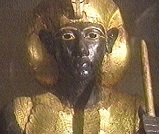
-760 The fifth Olympiad. Archelaus dies, and his son Teleclus (Teleklos) (d. -740) becomes Agiad king #8 of Sparta, going on to subdue the towns of Amyclae, Pharis, and Geranthrae. Alara the Nubian dies, and (his brother?) Kashta the Kushite (d. -752) conquers Egypt, becoming king #1 of the Egyptian Twenty-Fifth (25th) Dynasty (ends -656), ruling from Napata (250 mi. N of Khartoum) in Nubia (modern-day Sudan), installing his daughter Amenirdis I as the successor of Orsonkon III's daughter Shepenupet I, divine wife of Amun in Thebes. Greek cities begin founding colonies along the Mediterranean and Black Sea coasts. Ab'amar Saqid founds the Kingdom of Nashan in S Arabia (Yemen) (ends -480).
-759 Takelot III dies, and his younger brother (son of Osorkon III) Rudamun ((Usermaatre-Setpenamun) (d. -755) becomes king #8 (last) of the Egyptian 23rd Dynasty.
-757 The coastal town of Cumae in Campagnia in S Italy (NW of Neapolis or Naples) is founded in Oscan territory by Greek colonists from Pithecusae, Chalcis and Eretria, and Cyme, becoming the first colony in Magna Graecia (Greater Greece); Lake Avernus nearby is the fabled entrance to the underworld, and near the shore are caves which become the seat of an acropolis which is the seat of the ageless Cumaean Sibyl (Gr. "prophetess"), who gives out golden boughs to those wishing to go to the underworld; "The Sibyl, with frenzied mouth uttering things not to be laughed at, unadorned and unperfumed, yet reaches to a thousand years with her voice by aid of the god" (Heraclitus).
-756 The Sixth Olympiad; the Delphic Oracle is consulted as to how to crown the victors, and their reply is "Do not make the fruit of the apple tree the prize of victory, but take the wild olive", causing the winner of the foot race to be crowned with an olive branch. The city of Trabezon (originally Trapezous) (Gr. "trapeza" = table") (modern-day Trabzon, pop. 768K) on the SE shore of the Black Sea is founded by Milesian traders as a trading colony along with Sinope (modern-day Sinop, pop. 36K) on the C shore, Cyzicus on the SW shore, and Abydos in the Hellespont, trading with the Greek Mossynoeci (Gr. "Mossynoikoi" = dwellers in wooden towers); in 258 C.E. the Goths sack and rebuild Trabezon.
-755 Ashur-Dan III dies, and his brother Ashur-Nirari V (d. -745) becomes king of Assyria.
-754 Nimlot (d. -725) founds the Hermopolis Dynasty in Hermopolis (Magna), Egypt. Aeschylos dies, and Alcmeon (d. -753) becomes king of Athens.

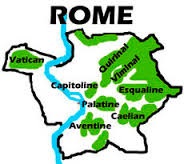
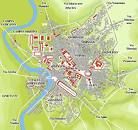
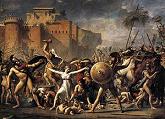
-753 Every people has a founding myth, a frame for their identity, which lets them restart the calendar with year one, and contains within itself the seeds of their ultimate destruction? The Romans claim to come from Long and White, and must be bragging? On Apr. 21 the city of Rome (Roma) (modern-day pop. 2.9M/4.36M), is traditionally founded by twins (fraternal or identical?) Romulus (-771 to -717) and Remus (-771 to -753), born in nearby Alba Longa (12 mi. to the SE in the Alban Hills on the W crater rim of Lake Albano) of the god Mars and mother Rhea (Rea) Silvia (Ilia), a vestal virgin who is the daughter of King Numitor of Alba Longa, and a descendant of Aeneas (Gr. "he who is praised") (the very title later adopted by Muhammad?), leader of the Trojans and son of Anchises and Venus, who escapes from Troy and wanders for years before coming to Latium, and whose son Ascanius or Iulus is the founder and 1st king of Alba Longa, keeper of the Palladium or image of Pallas Athena stolen from Troy by Ulysses and Diomedes, which ends up in the Roman temple of Vesta; at birth they are kidnapped by order of the jealous Numitor, then deposited on the banks of the Tiber (in a basket like Moses?) to die, but rescued and raised by she-wolf Lupa (sucking wolf tit and drinking wolf milk, to make them into predators?), who suckles them in the Lupercal(e) (Lat. "she-wolf"), a cave on the SW foot of the Palatine Hill (uncovered in 2007 C.E.); they are later raised by shepherd Faustulus and his wife Acca Larentia (Larentina), until they grow up and return to kill the king, then recruit Latin colonists from Alba Longa for their new digs, originally called Saturnia after Saturn, "father of the gods", then Rome, City of the Seven Hills, home of the united cities of Latium (named after the god Lateinos (Chaldean "to lie hidden"), their version of Saturn, offspring of the Sun, represented with a ring or halo around his head, and known as the Hidden God, the God of Mystery, with both Saturn and Lateinos having the Number of the Beast 666, hence the pope also?), on the left (E) bank of the Tiber River 17 mi. inland from the Tyrrhenian Sea near malarial swamps where the river makes two sharp bends in a reverse S-shape; the Seven Hills of Rome (Poor Queer, er, Queen Vicky Eats Crow At Christmas?) are: Palatine Hill (C) (centermost) (140 ft. above the Tiber E of the S bend) (home of the aristocrats) (first to be settled); Quirinal Hill (NE) (named after Sabine war god Quirinus); Viminal Hill (NE) (finger-shaped land pointing toward C Rome between the Quirinal Hill to the NE and Esquiline Hall to the SE); (located between the Forum and the Campus Martius); Esquiline Hill (E) (N part of the Oppian Hill); Capitoline Hill (named after the Temple of Jupiter Optimus Maximus) (original name: Mons Saturnius) (W) (; Aventine Hill (SW) (home of the plebs or plebeians, consisting of two small peaks and a gully); Caelian Hill (SE); later the Pincian Hill (NE) (N of the Quirinal) and the Janiculum Hill (W) (on the right bank of the Tiber opposite the N bend) are inhabited with overflow pop.; the area between the Capitoline and Palatine Hills is a marshy valley, which is drained by -500 and turned into a marketplace (the Forum); actually, the legendary founding is moose hockey, and communities existed on the Palatine, Capitoline and Esquiline Hills by -1000, and the city was really formed by the Etruscans after they conquered Latium around -600 and forced the independent communities under their yoke?; the Circus Maximus is later built between the Palatine and Aventine Hills (with the cheap seats on the Aventine side?); the Tarpeian Rock is on the S side of the Capitoline Hill, and used for executing traitors by throwing them off the top; the Campus Martius (Lat. "Mars Field") parade ground W of the Quirinal and Capitoline Hills, E of the N bend of the Tiber River is the first expansion area for overflow pop. before bridges are built across the Tiber and a fort built on the Janiculum Hill for future expansion; the city is open for 1K years until the Aurelian Wall is built c. 270 C.E., encircling all the hills and connecting with the Tiber to the N and S; Romans begin counting time up from this date, or rather, counting down from this date, after Romulus and Remus attempt to conjure a vision from the gods, and Romulus conjures twelve fowls circling over the hills, while Remus is short-changed, only conjures six and fouls out, and the augur Vettius proclaims that Romulus will be king, after which Romulus marks the square sacred boundary of Rome on the Palatine Hill above the E shore of the River Tiber, known as the Roma Quadrata with the sacred bronze plow on the feast day (Parilia or Palilia) (Apr. 21) of the herd-flock god Pales (the hermaphrodite ass-god of ancient Caanan, for whom Palestine is named, as well as the Palatine Hill), then orders a ditch dug and sacred wall (pomerium) built around it, which jealous Remus jumps over, causing Romulus to kill him for sacrilege, becoming Rome's first king (which is why it's called Rome instead of Reme?); Vettius claims that the vision means that the fowls are eagles, indicating that Rome will kick everybody's butt and the city will thrive for twelve cents., but then the eagles will turn into vultures, indicating that Rome will fall and the inhabitants will become bird food (proof that paganism is true, or just a self-fulfilling prophecy, or a deep psychological meaning about killing one's good side so the bad side can run riot, becoming fatal in the end?) (if only he'd said twelve millennia?); when Jesus Christ is later portrayed as entering Jerusalem triumphantly on an ass, you figure it out?; speaking of bad side, Romulus rules for 37 years, waging war with the Sabines under Titus Tatius (d. -748) of Cures (on the left bank of the Tiber River 26 mi. from Rome), starting it by arranging for the mass-kidnapping and Rape of the Sabine Women in C Italy, which causes Tatius to capture Rome with help from Tarpeia, daughter of the cmdr. of the Roman citadel, who opens the gates on the promise that she will receive what the Sabines have on their left arms, which turns out to be their shields, after which they throw her from the Tarpeian Rock (which becomes the mode of execution of all capital punishment), after which the Sabine women (led by Romulus' wife Hersilia, daughter of Tatius) convince Tatius and Romulus to reconcile and rule Rome jointly, with the combined community called the Quirites; in modern times the historicity of Romulus is questioned, with German historian Theodor Mommsen uttering the soundbyte in 1854: "The founding of a city in the strict sense, such as the legend assumes, is of course to be reckoned altogether out of the question: Rome was not built in a day"; in 1900 Giacomo Boni (1859-1925) claims to find the tomb of Romulus; in 2007 U. of Rome prof. Count Andrea Carandini (1937-) uncovers evidence of the sacred wall plus Romulus' palace?; the next six kings are Numa Pompilius (-715 to -676), Tullus Hostilius (-673 to -641), Ancus Marcius (-640 to -617), Lucius Tarquinius Priscus (-616 to -578), Servius Tullius (-578 to -534), and Lucius Tarquinius Superbus (-534 to -510), the last three being Etruscans; the govt. is based on three tribes, the Ramnes, Tities and Luceres (Latins, Sabines and Etruscans?), with the pop. split into the patricians (large landowners) and the plebs (plebeians) (clines) (Lat. "fillers") (small landowners); only the patricians constitute the populus (citizens), and have political rights and can serve in the army; the govt. is run by elective king and a small royal council of elders (senate), plus a 100-man assembly of elders (patres) composed of 10 curiae (assemblies) for each tribe, each elder serving for for life and having to be a patrician; the rex leads the army in person, and is preceded by lictors (officers), who bear the fasces, the symbols of power and punishment, and is the supreme judge in all civil and criminal suits; Roman citizenship requires membership in a gens (Lat. "to beget"), i.e., a clan traceable through the male line to a common free ancestor without any slaves in the middle; at first only patricians can use the "gentile" name as the middle of their three names, but later the plebes are permitted; Romulus later worships in the small temple of Jupiter Feretrius ("Jupiter who carries away the spoils of war") on the Capitoline Hill; the crude round hut called the House of Romulus on the central Palatine Hill stands for the next eight cents. - when do they install the mechanical bulls? Alcmeon dies, and Haropas (d. -743) becomes king of Athens. Jeroboam II dies, and his son Zechariah (d. -752) (Heb. "Remembered by Jehovah") becomes king #16 of Israel for 6 mo. (until -752) when his army capt. Shallum (d. -743) (Heb. "retribution") "conspired against Zechariah, and smote him before the people, and slew him, and reigned in his stead" (2 Kings 15:10), ending the dynasty of Jehu after four generations, becoming king #17 of Israel for 1 mo. until pissed-off fellow army capt. Menachem (Menahem) Ben Gadi (d. -738) (Heb. "comforter, consoler") marches from Tirzah 6 mi. E to Samaria, sieges it, and murders Shallum and becomes king #18 of Israel for 10 years (2 Kings 15:14-22), becoming known for drunkenness and debauchery, brutually suppressing a revolt at Tiphsah and destroying the city and killing the pop. after ripping open the wombs of pregnant women, "departing not from the sins of Jeroboam". The Old Guo Kingdom is reestablished in China.
-752 The seventh Olympiad.
-751 Carthage is founded in this year?

-750 Esh-Baal (Itto-Baal) II (d. -739) becomes king of Tyre (until -739). The Greek Dark Ages (begun -1150) end, and the Greek Archaic Period begins (ends -480); having lost their knowledge of the surrounding seas, the Ionian Greeks begin exploring and colonizing Asia Minor and founding cities in Pontus (isolated rocky S coast of the Black Sea); by -650 abstract geometric patterning is replaced by naturalistic art, incl. nude dangly Kouroi (Gr. "male youth") statues. Charillus dies, and Nicander (d. -720) becomes Eurypontid king of Sparta. King Azariah (Uzziah) of Judah is struck with leprosy; his son Jotham (Yotam) (d. -735) (Heb. "Jehovah is honest") (son of mother Jerusha) becomes coregent in Judah; the Israelites recapture the city of Dan - was it steely? The beginnings of the Sicilian Mafia as a gaggle of pirates? The city of Zancle ("sickle-city"), (modern-day Messina) on the NE end of Sicily on the W shore of the Strait of Messina (Mamertinum Fretum) (Fretum Siculum) is founded by pirates from Cumae. In this half-cent. the widespread use of iron in the Persian region begins. About this time rhinoplasty (the art of nose jobs) is first mentioned. Births: Greek "The Iliad and The Odyssey" poet (blind) Homer (d. -700) (b. 1100 B.C.E.?) (b. 850 B.C.E.?) in Chios.
-748 The eighth Olympiad. Nabu-Shuma-Ishkin dies, and Nabonassar (Nabu-Nasir) (Nabonasser) (Nebo-adon-Assur) (Nabo-n-assar) (d. -733) becomes king of Babylon next Feb. 26; a more accurate astronomy-based dating system is instituted in his reign. Titus Tatius (b. ?) is killed for revenge by the citizens of Lavinium, leaving Romulus as sole ruler of Rome.
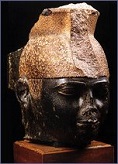
-747 Kashta of Kush (Nubia) dies, and his Amun-worshipping black African son Pi'ankhy (Piankhy) (Piye) (Peye) (d. -715) becomes ruler of Kush, going on to save Egypt from itself by invading it.

-745 Ashur-Nirari V is murdered by Tiglath-Pileser III (Tukulti-Apil-Esharra) (Pul) (d. -727), who founds the Second Assyrian Empire, and invades Phoenicia; he believes that his god gave him permission to ethnically-cleanse whole lands for settlement by his people, and is responsible for the Assyrian program of mass deportations, adding up to 4.5M in 3 cents.
-744 The ninth Olympiad - still possible to afford good seats? The Assyrians displace 65K people in Iran.
-743 Haropas dies, and Aesimides (d. -733) becomes king of Athens. Tiglath-Pileser III defeats the Urartians and wins back N Syria. The First Messenian War between Sparta and Messenia (W of Laconia) begins (ends -724), with the Achaeans of Messenia and Dorians of Sparta fighting it out to the bitter end.
-742 Assyria annexes Phoenicia and the Syrian coast; 30K Syrians of Hama are sent to the Zagros Mts.; 18K Arameans from the left bank of the Tigris are moved to N Syria. Israeli king Menahem pays tribute to Tiglath-Pileser III. About this year Hosea of Israel writes The Book of Hosea, becoming the first of the 12 minor prophets, and harping on about the apostasy of the people, who turn away from Jehovah to worship the calves of Jeroboam (1 Ki. 12:26-30, Hosea 8:4-6) and Baal.
-741 Assyria conquers Arpad.
-740 The 10th Olympiad. Teleclus is KIA by the Messenians in the temple of Artemis Limnatis on the border after he brings some young men dressed as maidens to their festival to murder the Messenian nobles, and they figure it out; his son Alacamenes (Alcmenes) (Alkamenos) (d. -700) becomes Agiad king #9 of Sparta, going on to conquer Helos near the mouth of the Eurotas River, last independent town of the original Achaean pop. (origin of the term "Helot"), and lead the night expedition against Ampheia that started the First Messenian War. Samsi (Shamshi) (d. -720) becomes queen of the Midianites (until -720). Leprous king Uzziah (Azariah) dies, and his 25-y.-o. son Jotham (Yotam) (d. -731) (Heb. "Jehovah is honest") (son of Jerusha the daughter of Zadok), who had been administering the affairs of the king's house and judging the people becomes king #11 of Judah (until -735), beginning construction of the Wall of Ophel; in this year prophet Isaiah (Heb. "Yeshayahu" = salvation of Jehovah), son of Amoz has a vision giving him a commission to preach to the people of Judah and Jerusalem, but warning him that the nation will come to ruin, and only a "tenth", a "holy seed" would be left (Is. 6:1-13); in 2019 Israeli archeologist Eliat Mazar discovers a clay bulla at the base of the S wall of the Temple Mount in Jerusalem bearing Isaiah's name, and another clay bulla in 2015 10 ft. away bearing the seal of King Hezekiah.
-739 Esh-Baal II dies, and Hiram II (d. -730) becomes king of Tyre (until -730). The Sino-Tibetan language-speaking Karen People of Mongolia settle in Burma.
-738 Hiram II of Phoenicia pays tribute to Tiglath-Pileser III. Menachem dies, and his son Pekahiah (d. -737) (Heb. "Jehovah has opened his eyes") becomes king #19 of Israel (2nd and last from the house of Gadi), continuing the sins of Jeroboam (idolatrous calf worship) that Jehovah doesn't like for two years; Assyrian king Tiglath-Pileser II invades Israel and forces it to pay tribute. Romulus establishes the Roman calendar based on the Greek lunar calendar; later king Numa Pompilius adds Jan. at the beginning and Feb. at the end to create a 12-mo. year (until -452). The Iron Age fortified settlement of Biskupin on Lake Biskupin 56 mi. NE of Poznan, Poland is built.
-737 Pekahiah is murdered by his general (adjutant) Pekah (d. -732) (Heb. "open-eyed") (son of Remaliah) and 50 men of Gilead, and Pekah becomes the 20th and penultimate king of the 10-tribe kingdom of Israel (2 Ki. 15:25-27), going on to reign for 20 years while continuing the idolatrous calf worship (2 Ki. 15:28); Pekah allies with Aram (Dammascus) king Rezin to attack Assyria, trying to coerce King Ahaz of Judah to join, causing him to appeal to Assyrian king Tiglath-Pileser III - two decades of frightful fashion and big hair? Tiglath-Pileser III of Assyria invades Iran, annexing the Zagros Mts. territory of the Medes, killing, enslaving, or deporting most of the Median and Persian pop.
-736 The 11th Olympiad. A shipwrecked Greek nautilus (sailor) named Teocle washes up in Sicily at Taormina and founds a colony there.
-735 Jotham is deposed by a pro-Assyrian faction in favor of his 20-y.-o. (25-y.-o.) son Ahaz (d. -715) (Jehoahaz) (Heb. "Jehovah has grabbed hold") becomes king #12 (co-regent until -732?) of Judah, becoming known for misrule and apostasy (2 Chron. chs. 27, 28). The Assyrians attack Urartu, annex the Lake Urmia region, and unsuccessfully siege Tushpa. Sarduri II dies, and his son Rusa (Rusas) I (d. -713) becomes king #8 of Urartu, going on to lose most of his daddy's conquered lands to Tiglath-Pileser III of Assyria. Naxos, the first Greek colony in Sicily is founded by Thucles of Chalcis; the Greeks begin driving the Phoenicians out of Sicily, except for the west coast cities of Motya, Panormus, and Solus.
-734 After King Ahaz of Judah calls on Assyria for help in its war with Israel and Damascus, Assyrian king Tiglath-Pileser III captures Damascus and executes King Reza before deporting the pop. to Kir and annexing the Aramean Kingdom (founded -1000) (2 Kings 16:9), dividing it into six provinces centered around Damascus; Assyria imposes an embargo on the export of timber from Tyre and Sidon to Philistia and Egypt; Palestine and trans-Jordania are crushed; the prince of Ascalon is killed, and the men of Gaza and the other of the so-called Five Strong Cities of Philistia flee to Egypt "like a bird"; Tiglath-Pileser III conquers The Galilee,and the land of Naphtali on the E side incl. Ijon, Hazor, Kedesh, Gilead, Abel Beth Maacah (Abel Maim), and Janoah, deporting most of the pop. to Assyria, then attacks Israel, annexing all teritory N of Jezreel (half of Israel); the Jews are exiled from Perea (E of the Jordan River); the kings of Edom and Judah pay tribute. The city-state of Syracuse in SE Sicily is founded by the Bacchiadae clan oligarchy of the Corinthian (Anatolian) Greeks led by Archias, going on to become the #1 city in Sicily; they found another colony on the island of Korkyra (Corcyra) (modern-day Corfu) in NW Greece.
-733 Nabonassar dies, and his son Nabu-Nadin-Zeri (d. -732) becomes king of Babylon. Aesimides dies, and Klidikos (d. -723) becomes king of Athens.
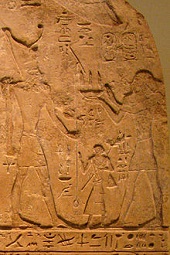
-732 The 12th Olympiad. Shepsesre Tefnakht (Tnephachthos) I (d. -725) becomes king #1 of the Twenty-Fourth (XXIV) (24th) Egyptian Dynasty (ends -720), calling himself "great chief of the west"; his descendants rule Egypt from Sais in the W Nile delta for the next 139 years (until -588). Jotham dies, and his son Ahaz (Jehoahaz I) (d. -716) (Heb. "Jehovah has held") becomes king #12 of Judah, reigning for 16 years. After pissing him off by attempting to coerce King Ahaz of Judah to take action against Assyria in league with King Rezin of Damascus, Israeli King Pekah is murdered by pro-Assyrian party head Hoshea (Heb. "salvation") (son of Elah), who becomes king #21 (last) of the 10-tribe kingdom of Israel based in Samaria (until -721) after paying Assyrian king Tiglath-Pileser III (Pul) 10 talents of gold and 1K talents of silver as tribute; an 8-year interregnum begins (2 Ki. chs. 14-15, 2 Chron. ch. 26)?; too bad, when Tiglath-Pileser III dies in -727, Hoshea conspires with Egypt to rebel, causing his successor Shalmaneser V to invade; meanwhile Judah calls on Assyria for help in its war with Israel and Damascus, and Tiglath-Pileser III conquers the Galilee and exiles many of its inhabitants, going on to capture Damascus and transport its pop. to Kir, dividing the Aramean kingdom (founded -1000) into six provinces centered around Damascus, and annexing one-half of Israel; the Jews are exiled from Perea (E of the Jordan River). Nabu-Nadin-Zeri is killed in a revolt, and Nabu-Shuma-Ukin II becomes king of Babylon for 1 mo.; Isaiah writes the Book of Isaiah about this time?
-731 Nabu-Shuma-Ukin II is overthrown by Aramean chief Nabu-Mukin-Zeri (d. -729), and becomes king of Babylon, founding the Ninth Babylonian Dynasty (ends -626). Ex-king Joatham of Judah dies, and is buried in the city of David.


Nubian king Pi'ankhy captures Thebes, becoming king #2 of the Egyptian 25th (Kushite) Dynasty, "Lord of the Two Lands", the first black pharaoh; too bad, after taking up an offer from delta warlord Tefnahkt, he takes their best bling and horses and returns to Nubia permanently, after which he is buried in an Egyptian-style pyramid in Napata in modern-day Sudan, becoming the first entombed pharaoh in 500+ years. Iny dies, and Osorkon IV (d. -715) becomes king of the rival Egyptian dynasty. Hiram II dies, and Mattan II (d. -729) becomes king of Tyre (until -729). Colonists from Eretria settle at Mende in the Chalcidice in NE Greece, and Methone and Dicaea in Macedonia. The Hallstatt Iron Age Culture, characterized by iron and bronze swords with winged metal terminals and horse domestication evolves from the Urnfield Culture, and begins spreading from Austria to France, Belgium, Netherlands, Iberia, and Ireland, launching the Iron Age in Europe (until -400), speaking a proto-Celtic language that becomes the ancestor of all later Celtic languages, branching into separate Celtiberian, Goidelic, and Byrthonic tongues; named from a necropolis containing 2K graves in Hallstatt in Upper Austria, excavated in 1846-99. A Greek inscription from about this time is found in Pithecusae in the Bay of Naples. Deaths: Spartan lawgiver Lycurgus (b. -700).
-729 Tiglath-Pileser III conquers Babylon, kills Nabu-Mukin-Zeri and becomes king of Babylon, annexing it as a province of Assyria; the Chaldeans maintain independence in the S. Mattan II dies, and Eluli (Luli) (Elulaios) (d. -694) becomes king of Tyre (until -694). Leontini (Lentini) (Leontinoi) in SE Sicily is founded as a Naxian colony by Thucles; other Naxians under Evarchus found Catana.
-728 The 13th Olympiad. The Megarians give up trying to colonize Trotilon and Thapsos in Sicily, and instead colonize Megara Hyblaea, 14 mi. N of Syracuse. Ahaz appoints his son Hezekiah (d. -686) (Heb. "Jehovah strengthens") coregent of Judah, who seeks unification with the kingless northern kingdom of Israel, inviting them to an ecumenical Passover (2 Chron. 30:1).
-727 Tiglath-Pileser III dies after receiving 30K camels as tribute from Midianite queen Samsi.
-726 Tiglath-Pileser III's son Shalmaneser V (Shulanu-Asharedu) (d. -722) becomes king of Assyria, and assumes the name Ululaju when a scending the throne of Babylon.

-725 Midas (d. -675) becomes king of Phrygia, and bathes in the Pactolus River, making its sands an eternal hope for gold diggers?; he gets the Midas Touch from Bacchus, but after it works out bad he switches to the worship of Pan. Tefnakhte I dies, and Bakenranef (Bocchoris) (d. -720) becomes king #2 (last) of the Egyptian 24th Dynasty based in Sais. Nimlot dies, and Thutemhat (d. -710) becomes king of Hermopolis. Births: Chinese PM (-685) Guan Zhong (Yiwu) (d. -645).
-724 The 14th Olympiad. Sparta defeats Messenia, ending the First Messenian War (begun -743), and divides it into allotments (klaroi) that pay rent to finance their army, with Messenian depopulated by the emigration of Achaeans to other states, and the remaining Messenians reduced to serfs (helots).
-723 Klidikos dies, and Ippomenes (d. -713) becomes king of Athens.

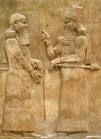
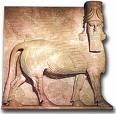
-722 In the 6th year of King Ahaz of Judah (2 Ki. 18:10), after a 3-year siege Samaria is conquered (2 Ki. ch. 17) by the Assyrians under king (since -727) Shalmaneser V, who is assassinated, allowing his successor Sargon II (Sharru-Kin) (-763 to -705) ("legitimate king", "god made firm the king") to claim credit after the Assyrian army withdraws to secure his succession, Israel revolts again, and he returns to finish them off in -720 -baby back ribs tonight? Sometime in his reign, Sargon II receives tribute from S Arabian king Ita'amra the Sabaean. The Chun Qiu (Ch'un-Ch'iu) (Chin. "spring and autumn") chronological record is started in China, recording events of the reigns of 12 rulers of Lu till just before Confucius' death in -479.
-721 On Mar. 19 the Babylonians record their first lunar eclipse. Piye dies, and Kashta's son (by Pebatjma) (Piye's son?) Neferkare Shabaka (Shabako) (Shabaqo) (d. -707) becomes king #3 of the Egyptian 25th Dynasty, going on to consolidate control of Egypt down to the Nile Delta, making Thebes his capital and initiating an enormous amount of construction while fending off the Assyrians under Sargon II; he leaves the Shabaka Stone, an attempt to preserve Old Kingdom history, which is later used as a millstone, defacing the hieroglyphics. Sargon II annexes Israel. The Chaldeans enter Babylonia and begin competing for the throne with the help of Elam; Marduk-Apal-Iddina II (Merodach-Baladan) (d. -710) becomes king of Babylon.
-720 The 15th Olympiad features the addition of a 2.5 mi. (12X around the stadium) race. Pharaoh Shabaka captures Bakenranef, and has his bacon fried (burned alive), ending the Egyptian 24th Dynasty (begun -732); Shabaka reuinites Egypt. Assyrian king Sargon II reconquers Samaria after another revolt; the 27,290 members of the Lost Ten Tribes of Israel, incl. King Hoshea are carried away like foam upon the water to Harran; the depopulated land is slowly settled by Aramaic-speaking Assyrians, and the Samaritan Religion is born; Jerusalem is strengthened with a great influx of refugees; after the time of Nehemiah, the Hebrew language dies out, and Aramaic, the language of the Aramean internat. land traders becomes the universal language of the civilized Western world by the time of Darius I the Great; of the original Twelve Tribes, only the depleted 2-tribe (Judah and Benjamin) S kingdom of Judah is left (along with some Levites, the landless priest-class 13th tribe), and Judah only has seven more kings to go before their royal line is kaput (Manasseh, Amon, Josiah, Jehoahaz, Jehoiakim, Jehoiachin, Zedekiah); later speculators trace the lost tribes to the British Isles, North Am., South Am., India (the Manashe Tribe in Manipur and Mizoram in E India), Abyssinia, Afghanistan, China, Japan, Africa, and Uzbekistan and Tajikistan; the proof that the Tribe of Dan migrated W is their naming of the Danube, Dnieper, and Denmark?; in the 18th cent. the Anglo-Israelite Theory, that they are the ancestors of the Anglo-Saxon peoples makes it easier for Jews to immigrate; did they go to Japan, as indicated by similar ceremonies?; some Scots claim that they are the lost tribes, and that the Stone of Scone (pr. SKOON) is really the Beth-El (Jacob's Pillow) in Genesis; the Book of Mormon claims that they migrate to North Am., quoting Bible prophet Isaiah (Heb. "Jehovah is salvation"); "From the isles of the sea, from those parts beyond the sea into which they were carried captive" (Is. 24:24) (maybe to the British Isles?). Sargon II marches on Babylon, but is defeated at the Battle of Der by the Elamites under Humbanigash. The Syrians under king Ilu-Bi'di (Yau-bi'di) of Hama (Hamath) rebel against Assyria, are defeated at the Battle of Qarqar, and Ilu-B'idi is flayed - tourniquet, tourniquet! X-ray comin' on thru? Nicander dies, and Theopompus (d. -675) becomes Eurypontid king of Sparta. Shepsesre Tefnakht dies, and Bakenranef (Bocchoris) (d. -715) becomes king of the Egyptian 24th Dynasty. Zhou Ping Wang dies, and Zhou Huan Wang (d. -697) becomes Dong Zhou king #2 of China. Settlers from Chalcis settle Rhegium in S Italy across the Strait of Messina from Sicily. Settlers from Achaea and Troezen found the colony of Sybaris on the W shore of the Gulf of Taranto between the Crathis (Crati) and Sybaris (Coscile) Rivers in S Italy (Magna Graecia), which becomes known for opulence and conspicuous (sybaritic?) consumption, becoming the oldest Greek colony in Italy (until -510).
-719 King Rusa I of Urartu replaces Mannean rulers friendly to Assyria with his own rulers.
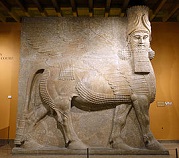

-717 Carchemish (Karchemish), the last independent Hittite kingdom is conquered by Sargon II and annexed to Assyria. Architecture: Sargon II begins his royal residence of Dur-Sharrukin (modern-day Khorsabad), a planned city in modern-day N Iraq (9 mi. NE of Mosul) (finished in -704), which becomes capital #4 of Assyria; excavated in 1843 by Paul-Emile (Paul-Émile) Botta (1802-70) of France; the entrance to Sargon II's palace throne room features a pair of reliefs of a 16-ft.-high Winged Bull that combines features of a man (head), eagle (wings) and lion (tail); it ends up in the Oriental Inst. of the U. of Chicago. Deaths: Roman king #1 (-753 to -717) Romulus (b. -771) on July 5; slain by the Senate, or carried away to live with the gods, with instructions to worship him as the god Quirinus, causing the Quirinal Hill to be built in his honor?; his tomb is built in the 4th cent. B.C.E.
-716 The 16th Olympiad. Ahaz dies, and although he is buried in the city of David (Jerusalem) (2 Ki. 16:20), his body is not placed at the royal burial place of the kings (2 Chron. 28:27); his 25-y.-o. son Hezekiah (Hizkiyahu) (r. -715 to -686) (Heb. "strengthened by Jehovah") becomes king #13 of Judah ("the finest" - 2 Ki. 18:5), and reverses his father's idolatrous policies, "sticking to Jehovah" (2 Chron. 29:1), and compiling the Proverbs of Solomon (Prov. 25:1).

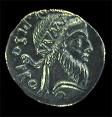
-715 Pi'anky dies, and Shabako (d. -702) becomes king #2 of Egypt's 25th (Kushite) Dynasty, conquering Egypt from the 6th Cataract to the Mediterranean. Sargon II of Assyria declares war on his old enemies the Urartians, going after their ally Mettati first. Median chieftain Deioces (Deiokes) (Dahyauka) (Daiaukku) (Diyako) (d. -647) founds the Median Dynasty after uniting the warring petty kingdoms. Traditional date that is succeeded by Sabine Numa Pompilius (d. -676), youngest of the four sons of Pomponius (born on the day of Rome's founding) as king #2 of Rome, who introduces many Roman religious customs. An inscription of Sargon II mentions Mita of Mushku, who might be King Midas of the gold touch?
-714 The Assyrians under Sargon II launch a carefully planned attack against Urartu after King Rusa I stirs up a revolt among the Manneans.
-713 After their sacred city of Musasir (Musri) S of Lake Van is conquered, Rusa I commits suicide, and his son Argishti II (d. -680) becomes king #9 of Urartu (until -680). Ippomenes dies, and Leokrates (d. -703) becomes king of Athens. A revolt in the Zagros Mts. is put down by the Assyrians.

-712 The 17th Olympiad. The Neo-Hittite kingdoms of the Taurus incl. Cilicia are annexed to Assyria. A revolt against Assyria instigated by Egypt, led by King Iamanni of Ashdod followed by Judah, Edom, and Moab and Pi'ru of Musu is crushed; Pharaoh Shabaka gives asylum to Ashdod king Iamanni. Births: Greek poet Terpander (d. -645) in Antissa, Lesbos.
-711 Births: Japanese Yamato emperor #1 (-660 to -585) Jimmu (Jinmu) (d. -585) on Jan. 1.
-710 Sargon II invades Babylon, pushing the Babylonians south; Marduk-Apal-Iddina II escapes to the Elamites. About this time the Lelantine War by Chalcis, supported by Corinth, Samos, and Thessaly against Eretria, supported by Aegina, Miletus, and Megara is fought over the rich Lelantine Plains (Lelantian Fields) in E Attica, and Chalcis and its allies are victorious (ends -650) - now get out there and plant? The capital city of Ecbatana (Hamadan) is founded by Deioces, first king of the Medes in the mountainous E fringes of Babylonia between the Elburz and Zagros Mts. Chalcis colonizes Torone in the Chalcidice in NE Greece, and goes on to found 30 small colonies on the peninsula.
-709 Phrygia in Asia Minor becomes a tributary to Assyria.

-708 The 18th Olympiad adds the pentathlon to the short list of events. Babylon falls to Assyria, and now the known world pays homage to Assyria the Great? The city of Croton (Crotona) in S Italy in the sole of Italy's boot on the E coast of Bruttium (Calabria) on the Gulf of Taranto is founded as a Greek colony, becoming the leading city of Magna Graecia, known for its healthy climate and great athletes, later building the Temple of Hera Lacinia, which becomes the main religious shrine of Magna Graecia; by modern times it is reduced to a single column.
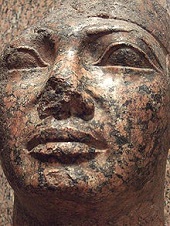
-707 Shabaka dies, and his nephew (son of Piye) Shebtiku (Shebataka) (Shebitqo) (Djekare) ("Enduring is the soul of Ra") (d. -690) becomes king #4 of the Egyptian 25th Dynasty, going on to pursue a policy of conciliation with Assyria, extraditing king Iamanni of Ashdod, etc., until the reign of Sennacherib, when he flops and begins resisting Assyrian expansion. The Cimmerians defeat the Urartians under Argishti II, but they keep the Assyrians at bay and build a number of new fortresses and irrigation works.
-706 The city of Tarentum (Taras) (modern-day Taranto in S Italy) is founded by Parthenian (children of Greek women and Spartan men) colonists led by Phalanthus, becoming Sparta's only colony?
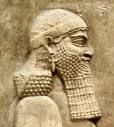
-705 Sargon II is KIA in battle, and his son Sennacherib (Sin-Ahhe-Eriba) (d. -681) (Akkadian "the Moon god") becomes king of Assyria, dissociating himself from what he thinks of as his loser father, and abandoning his father's newly-built capital in order to move to Nineveh, which he turns into a magnificent city, with a royal palace of 80 rooms built on a foundation of 160M bricks, and featuring bas-relief stone panels of winged lions or bulls with a man's head, along with grisly scenes of cruel treatments of POWs incl. impalings. Hezekiah of Judah quits paying tribute to Assyria, and starts fortifying Jerusalem (2 Ki. 18:7, 20:12, 2 Chron. 32:5).
-704 The 19th Olympiad.
-703 Marduk-Zakir-Shumi II becomes king of Babylon for 1 mo. before Marduk-Apal-Iddina II reenters and reclaims the throne for 9 mo.; the Assyrians drive him back into exile in Elam, and 208K people are deported to Assyria. Leokrates dies, and Apsandros (d. -693) becomes king of Athens. Architecture: Sennacherib begins building the Jerwan Aqueduct to bring water from the Khenis River to Nineveh (finished -690), becoming the world's first aqueduct; the real Hanging Gardens of Babylon?

-702 Bel-Ibni is appointed gov. of Babylon by Sennacherib.
-701 Sennacherib makes the Medes a tributary (until -674). A revolt by Sidon-Tyre, Escalon, Judah, and Ekron supported by Egyptian Pharaoh Shebtiku causes the Assyrians to attack; Sennacherib defeats the Egyptians at the Battle of Eltekeh in S Palestine, then invades and conquers Phoenicia-Palestine to reinstate his ally Padi of Ekron; king Eluli of Tyre flees to Cyprus, and Sennacherib appoints Baal (Baalu) I (d. -660) as king of Tyre (until -660), then sieges and conquers the Israelite city of Lachish between Mt. Hebron and the maritime plain of Philistia (Johsua 10:3-5, 12:11), causing Sennacherib to order reliefs installed in his royal palace in Nineveh, showing an Israelite chariot, with the soundbyte: "Sennacherib, king of the world, king of Assyria sat upon a throne and passed in review the booty from Lachish"; King Lule of Sidon flees to Cyprus; King Sidka of Ascalon is captured and sent to Assyria; about this time he defeats Arab tribal queen Iati'e (Yatie).


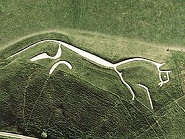
-700 The 20th Olympiad. Marduk-Apal-Iddina revolts again, and Sennacherib chases him back to Elam; Bel-Ibni is suspected of collusion and recalled to Assyria. The Assyrians under Sennacherib invade Judah, destroy many cities and siege Jerusalem after the Egyptians under Pharaoh Taharqa at Hezekiah's request stall their advance; the Assyrian gen. appeals to Jerusalem's pop. over King Hezekiah's head (Is. 36:4), and the Jewish officials plead with him not to speak in Hebrew, the language of (the) hoi poloi, but in Aramaic, the language of diplomacy understood by themselves (2 Ki. 18:26); the Assyrians claim a plague, and the Bible claims that it is Jehovah's angel slaying 185K of the cream of their warriors overnight (2 Ki. chs. 18-19, 32), but the Assyrians are turned back, yet only after making Hezekiah a vassal ("like a bird in a cage"), who has to pay a large tribute? Alacamenes dies, and Polydorus (Polydorus) (d. -665) becomes Agiad king #10 of Sparta, hooking up with co-king Theopompus to change the constitution so that the kings and the Gerousia (council of elders) can veto decisions of the Apella (male citizen body); during the First Messenian War he is in charge of the left flank, while Theopompus is in command of the right flank. Perdikkas (Perdiccas) I (d. -652) becomes king of Macedonia (until -678). Gemenef-Khons-Bak (d. -680) becomes king of Tanis. In this cent. Thessaly changes from a tetrarchy to a Thessalian League, a loose confederacy of feudal city-states in the Thessalian Valley led by a tagos (elected gen.) of the Aleuadae clan; throughout this cent. Thessaly possesses the strongest army in Greece, and dominates the Amphictyonic League (Amphictyony of Anthela), a religious league which by 600 B.C.E. incl. all the city-states of C Greece. In this cent. Persian chief Achaemenes (Hakhamanish) founds the Achaemenid Dynasty after winning independence from the Neo-Elamates; his son Teispes (Chishpish) (d. -640) takes the title of king of Anshan and allies with the Elamites against Sennacherib. In this cent. the Germanic Frisian (Frisii) tribe from the Baltic colonizes the coastal districts of the modern-day Dutch provinces of Friesland and Groningen. In this cent. the Priteni tribe of Celts arrives in the British Isles, becoming the ancestors of the Cruitin (Cruithin) (Cruthin) tribe in Ireland. In this cent. the Phoenicians found the city of Tripoli in N Africa, consisting of Oea, Lepcis Magna, and Hadrumetum; they also found Motya in Sicily, Sulcis, Caralis, Nora, and Tharros in Sardinia, and Mogador on an island on the W African coast 450 mi. S of Gibraltar; the Phoenician cities of Tyre, Sidon, and Byblos also found the port of Tripolis in Phoenicia 70 km. N of Beirut, each city controlling a walled sector. In this cent. the Greeks found the kingdom of Cyrenaica in E Libya (ends 4th cent. B.C.E.), dominated by the city of Cyrene (founded 630 B.C.E.). Early in this cent. the seasonable settlements for herdsmen on Rome's seven hills begin to move down to the E fringes of the marshy valley between the Capitoline, Palatine, and Quirinal Hills that later (before -500) is drained and becomes the Forum Romanum Magnum (Roman Forum) (Lat. "forum" = "out-of-doors place") marketplace. In this cent. the Arab Abdeel (Abdilla) and Nebaioth (Nebayot) tribes roam Palestine, while the Qedar tribe based in N Arabia founds a kingdom that by the 6th cent. B.C.E. controls the region from the Sinai to the Persian Gulf. In this cent. the royal garden of Ramat Rachel near Jerusalem is built and used until the 4th cent. B.C.E. About this time the Uffington White Horse is built in modern-day Uffington, Berkshire, England on the Berkshire Downs overlooking the Vale of the White Horse to the N. In this cent. the Greeks develop hoplite warfare, with each citizen-soldier furnishing his own hoplon (round bronze shield), bronze helmet with cheek and nose guards, and 9-ft. spear, fighting in a shoulder-to-shoulder phalanx while marching in step to flute music? - can you really help which peltast you fall in love with? The tradition of Halloween is developed about this time by the Druid Celts of the Westward Islands, who believe that Samhain, lord of the dead calls forth hosts of evil spirits, requiring them to light great fires and don frightening costumes to ward off and fool them; meanwhile dead shades revisit their homes, while seers have a window for examining portents. About this time tiny silver scrolls inscribed with portions of the Bible Book of Numbers are buried in Ketef Hinnom SW of Jerusalem; discovered in 1979, becoming the oldest known texts of the Bible. In this cent. Greek (Boeotian) poet Hesiod flourishes, becoming the greatest early Greek poet after Homer, writing Theogony (Genealogy of the Gods), which names the nine Muses as scroll-carrying history muse Clio, flute-carrying lyric poetry muse Euterpe, staff-carrying mask-and-ivy-wreath-wearing tragedy muse Melpomene, lyre-carrying song-dance muse Terpsichore, lyre-carrying erotic poetry muse Erato, veil-wearing sacred poetry muse Polyhymnia, celestial globe-carrying astronomy muse Urania, and wax tablet-and-stylus-carrying epic poetry muse Calliope; he also leaves Works and Days, describing Greek agriculture as based on the scarcity of resources requiring the depositing and lending of grain, providing "directions for the whole business of family economy in the country" (John Claudius Loudon); "Through work men grow rich in flocks and substance"; he also describes the ages as a cycle of decline, from golden to silver, bronze, and iron, claiming that the ages do not only change the quality of life, but the after-death state, with the people of the golden and silver ages becoming spirits when they die who watch over and benefit the human race, while the people of the bronze age go down to a twilight existence in Hades, and the "godlike race of hero-men" sail beyond the Pillars of Hercules to the Happy Isles (Hesperides) (Elysian Fields), ruled by Cronos (Saturn). Inscriptions in Georgia on two temple altars. In this cent. Greek poet Pisander flourishes, writing an epic poem on the Twelve Labors of Hercules (Gr. "glory of Hera"), son of Zeus and Alcmene, wife of Amphitryon; jealous Hera robs him of the throne of Argos and gives it to Eurystheus, making him his servant, and he can only secure his freedom after he completes 12 er, herculean tasks incl. killing the invulnerable Nemean lion; destroying the Lernaean Hydra; capturing the Erymantian boar; capturing the hind of Cerynea; destroying the man-eating Stymphalian birds; procuring the belt of Hippolyta, queen of the Amazons; cleansing the Augean stables (where King Augeas of Ellis had kept 3K oxen for 30 years); capturing the Cretan bull; capturing the man-eating mares of Diomedes; capturing the red cattle of Geryon; procuring the golden apples of the Hesperides; capturing Cerberus, watchdog of the gates of Hades - first Paris, then London, then Rome, I can't go on living like this? In this cent. and the next, the four Greek Lesbian Poets flourish on the island of Lesbos in the Aegean Sea between Smyrna and the Hellespont (Dardanelles) (the Big Crack?), incl. Terpander of Antissa (-712 to -645), Alcaeus (Alkaios of Mytilene, Sappho (-630 to -570), and Arion of Methymna after lyre-man Orpheus, son of King Oeagrus of Thrace and a Muse (Calliope or Polyhymnia) is killed by Thracian women at an orgy for Dionysus because he got tired of watching and was only dreaming of his dead babe Eurydice, and they cut off his head, which floated to Lesbos, turning them into lyric poets - I'd like to see them in action? A Tomb of a Chiapa de Corzo Dignitary Inside a Pyramid in Chiapas state in S Mexico contains jade collars, pyrite and obsidian artifacts along with ceramic vessels; found in 2010 C.E. Inventions: False teeth are first mentioned about this time - anything to do with Halloween costumes? Sennacherib orders the construction of the world's first known Aqueduct in Jerwan. In this cent. the Sumerians invent the Arch Bridge, using corbelled arches in aqueducts. In this cent. Biremes (ships with two banks of oars) are developed. By this cent. Arabs in N Arabia develop a new saddle that allows them to use camels for military purposes, allowing them to control trade in Arabia and earn enough money to buy metal weapons. In this cent. the Incas begin using llama poop as a fertilizer to grow maize (corn). Births: Spartan lawgiver ("the Father of Sparta") Lycurgus (Gr. "he who brings into being the works of a wolf") (d. -630). Deaths: Greek poet Homer (b. -750) in Chios; leaves The Iliad (24 vols.), about the 10-year Trojan War; "Sing, O goddess, the anger of Achilles, son of Peleus, that brought countless ills upon the Achaeans. Many a brave soul did it send hurrying down to Hades, and many a hero did it yield a prey to dogs and vultures, for so were the counsels of Jove fulfilled from the day on which the son of Atreus, king of men, and great Achilles, first fell out with one another" (opening); also leaves The Odyssey (24 vols.), about king Odysseus (Ulysses) of Ithaca (an island off the W coast of Greece S of Kythera), and his 10-year journey home in the face of the wrath of Poseidon for blinding his son, the cyclops Polyphemus, receiving the help of the goddess Athena, while his wife Penelope (Gr. "with a web over her face", "striped duck") fends off a host of arrogant suitors who eat her out of house and home by spinning a cloak during the day and having it taken apart at night, and their son Telemachus searches for his father then helps him outsmart and murder the suitors; the Odyssey was written or completed by Homer's son Homer II?; the Great Wanderings of Ulysses incl. the Kikonians, the Lotus Eaters, the Cyclopes, Aiolia, Isle of Aiolos, mortal king who keeps the winds in a bag, the Laistrygones, land of a giant cannibal people, the Isle of Circe, the Land of the Dead, the Sirens, the crashing rocks Scylla and Charybdis, Thrinakia, where his men eat the cattle of Sun god Helios AKA Hyperion and are killed, and Ogygia, the isle of Calypso, daughter of Atlas; mentions blood sausage; "Tell me, O muse, of that ingenious hero who travelled far and wide after he had sacked the famous town of Troy. Many cities did he visit, and many were the nations with whose manners and customs he was acquainted; moreover he suffered much by sea while trying to save his own life and bring his men safely home; but do what he might he could not save his men, for they perished through their own sheer folly in eating the cattle of the Sun god Helios; so the god prevented them from ever reaching home. Tell me, too, about all these things, O daughter of Jove, from whatsoever source you may know them." (opening)
-699 Sennacherib appoints his son Ashur-Nadin-Shumi (d. -694) as king of Babylon.
-697 Zhou Huan Wang dies, and Zhou Zhuang Wang (d. -682) becomes Dong Zhou king #3 of China.
-696 The 21st Olympiad; boxing is added as an event. Hezekiah's son Manasseh (Heb. "One Making Forgetful") (d. -642) becomes coregent of Judah, reigning 54 years and becoming king #14 of Judah after David (2 Ki. 21), going bad and doing "worse than the nations that Jehovah had annihilated from before the sons of Israel" (2 Chron. 33:2-9); he is said by Jewish tradition to have ordered the prophet Isaiah sawed apart; he is captured by the Assyrians and taken captive to Babylon, but repents and returns to Jerusalem; Israel's worst king?; Micah (Heb. "Who is like Yahweh?") of Morsheth writes The Book of Micah during his reign.
-695 The nomadic Cimmerians invade and devastate Phrygia, and begin threatening the Assyrian Empire from the N; the Lydians to the W survive, and the Phrygian nation remains independent (until -547).
-694 The Assyrians and Babylonians attack Elam; the Elamites counterattack and sack Sippar; the Babylonians revolt, seize Ashur-Nadin-Shumi and hand him over to the Elamites. Eluli dies, and Abd Melqart (d. -680) becomes king of Tyre (in exile?).
-693 Apsandros dies, and Eryxias (d. -683) becomes king (archon) of Athens. Babylonian nobleman Nergal-Ushezib (AKA Shuzub) (d. -692) (a puppet of Elam) becomes king of Babylon.
-692 The 22nd Olympiad. Nergal-Ushezib is captured by Assyria near Nipur and carried in chains to Assyria; Chaldean prince Mushezib-Marduk (d. -689) becomes king of Babylon, and revolts with the support of Elam.
-691 Sennacherib fights the Chaldeans and the Elamites at the Battle of Halulina (Khaluli) (Hallule); both sides claim a V, but the Assyrians seem to get the worst of it.
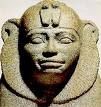
-690 Shebtiku dies, and his brother Taharka (Taharqa) (Tirhakah) (d. -664), the Black Dionysus (Tirhakah in 2 Ki. 19:9) becomes king #5 of the 25th Egyptian (Kushite) Dynasty, campaigning as far E as Palestine and doing extensive building at the capital of Napata; his sister Lady Rodophos becomes Athena Nikephoros, the Black Athena. A plague in the Assyrian army saves Judah from a 2nd invasion.
-689 King Humban-Nimena of Elam suffers a stroke, taking Elam out of the war; Sennacherib lays seige to Babylon for 9 mo., captures it, then destroys it completely in a rage over the death of his son, diverting the Euphrates into the ruins - do you remember when we used to sing sha-la-la-la? The city of Gela (Gr. "laugh") (named after the Gela River) in S Sicily is founded by Greek colonists from Rhodes and Crete, becoming the home of Greek tragedian Aeschylus.
-688 The 23rd Olympiad. The city of Hyperesia in Achaea defends itself from an army from Sicyon by tying burning torches to the horns of goats, spooking them into retreating, causing the town to be renamed Aigeira ("goat town").
-687 On Apr. 22 the Chinese record a meteor shower in the Lyra Constellation.


-685 This year (-716?) after (according to Herodotus, Bk. 1) he makes the mistake of letting him see his wife naked, and she finds out and gives him an ultimatum to do it and marry her to make her an honest woman, his bodyguard (ancestor of Croesus) Gyges (Gugu) of Ludi (d. -652) (d. -647?) kills his closest friend king Candaules (Gr. "dog throttler") (Myrsilus) (son of Myrsus), king #22 of Sardis, sending six golden bowls weighing 30 talents (approx. 1 ton) to Delphi to placate the gods, which are placed next to the royal throne of Midas, ending the Heraclidae Dynasty, and founding the Mermnad(ae) Dynasty in Lydia in W Asia Minor, going on to capture Colophon. Greeks from Megara colonize Chalcedon on the Asiatic side of the Hellespont, and it becomes known as "the city of the blind" because the settlers missed the better site of Byzantium on the European shore. Sennacherib receives tribute from Karib'il Watar, king (malik) of Saba in S Arabia, who conquers Ma'in, Wadi Hadramaut, Aswan, and Qataban, taking the title of mukarrib (emperor) and founding the (black?) Sabean Empire (ends -332), which engages in massive building projects in Marib to distribute the waters of the Wadi Dhana - I'll maqa that on my calendar? The Second Messenian War begins (ends -668); Greek poet Tyrtaeus, a lame schoolmaster of Attica sent to Sparta to assist them against the Messenians, er, that's just a legend; actually, he was a Spartan gen. in the Second Messenian War who uses poetry to spur them to victory; he also creates the trombone - good way to spur them to victory, sticking the slide in their backs? Guan Zhong (Yiwu) (-725 to -645) of Yingshang is appointed PM of China by Duke Huan of Qi, going on to modernize the state, switch from hereditary to prof. administrators, and create state monopolies on salt and iron.
-684 The 24th Olympiad. There is an unusally high inundation of the Nile River in year 6 of the reign of Taharka.
-683 By this time Athens has unified Attica; Eryxias dies, and Athens abolishes its monarchy; the six thesmothetai (junior archons) or magistrates are instituted to interpret the laws, and along with the civil archon, the king archon (who performs the king's religious duties) and the polemarch (war archon) constitute the Nine Archons, who are chosen annually from the aristocracy by the Aeropagus (council of ruling aristocrats, who met on a low rocky hummock on the W side of the Acropolis), while the Ecclesia (citizen assembly) has little power.
-682 Creon is elected as the first archon basileus (ruler/tyrant) of Athens, with a 1-year term. Zhou Zhuang Wang dies, and Zhou Xi Wang (d. -676) becomes Dong Zhou king #4 of China.

-681 Sennacherib, kicker of Israel's ass is murdered by his son Arda-Mulish (Mulish-shi) while praying in a temple, and his younger son Esarhaddon (Ashur-Aha-Iddin)("Ashur has given a brother") (-713 to -669) becomes king of Assyria (until -669) after a little civil war; he goes on to lavishly rebuild Babylon and begin to win the Babylonians over against the Elamites.
-680 The 25th Olympiad adds a 4-horse chariot race at the Hippodrome, becoming the only event not performed in the olive-oiled nude - I wanna be your man, I wanna be your ma-a-a-a-an? Merodach's son launches an unsuccessful attack on Ur. Nimlot E (Lamintu) (d. -660) becomes the last king of Hermopolis. Abd Melquart dies, and Assyrian puppet Baal I (d. -660) becomes king of Tyre (until -660). Gemenef-khons-Bak dies, and Pedubast II (d. -665) becomes king of Tanis. Argishti II dies, and his son Rusa II (d. -645) becomes king #10 of Urartu, building the new capital of Rusahinili (Toprakkale), along with a great water canal from the Hrazdan River (Ildaruni) to Quarlini. Pheidon becomes king of Argos, going on to increase its power and invent weights? Architecture: The first Doric temples, known for simple circular pincushion-shaped capitals and lack of bases on their columns are built in the Peloponnese. Births: Greek (Ionian) lyric poet Archilochus (d. -640) on Paros Island; inventor of iambic poetry (iambic trimeter); known for bitter satire, causing the terms "Archilochian bitterness" and "Parian verse" to be coined; once he gets even with Lycambes and his daughter Neobule for reneging on a marriage arrangement with them by satirizing them so harshly that they freak and hang themselves.
-679 The Cimmerians invade Cilicia and stir up a revolt, which is defeated by the Assyrians.
-677 Vassal king Abdi-Milkuti ('Abdmilkot) revolts from Sennacherib, who captures Sidon, beheads him, and razes the city to the ground, then deports its pop., turning it into an Assyrian province; a new city is built opposite it called Ir-Asaraddon (Kar-Esarhaddon); the island city of Tyre becomes the main city of what's left of Phoenicia, with Baal I as king, stripped of his mainland territories and forced to pay tribute. Assyrian king (since -681) Esarhaddon (d. -669) invades Israel to pacifiy Arab tribes around the Dead Sea, chasing them to the Brook of Egypt (Nile River?).
-676 The 26th Olympiad. Zhou Xi Wang dies, and Zhou Hui Wang (d. -651) becomes Dong Zhou king #5 of China. Yauta' (d. -652) becomes king of Qedar in N Arabia, and later allies with Ashurbanipal. Traditional date of the death of Roman king Numa Pompilius (-672?).
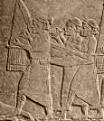
-675 The Elamites invade Assyria, are repulsed and invaded in return, and a puppet king installed. The Babylonians defeat an Elamite invasion by themselves. Deiokes (d. -646) becomes king of the Medes (until -646). Greek lyric poet Terpander of Lesbos (-712 to -645) starts a musical rev. in Greece by changing the kithara (lyre) from 4 to 7 strings and creating the Mixolydian Scale. Theopompus dies, and Anaxandridas I (d. -660) becomes Eurypontid king of Sparta. Traditional date of the reign of Roman king #3 Tullus Hostilius (d. -641), a warlike dude who destroys Alba Longa and fights against the Uncle Nasties (Sabines).
-674 Esarhaddon ends a revolt in Ashkelon, then invades Egypt, and is defeated.

-672 The 27th Olympiad. Esarhaddon divides the Assyrian Empire between his sons, giving Assyria to library-lover Ashurbanipal (-692 to -627) ("Ashur is the creator of an heir") (AKA Sardanapalus), and the subordinate throne of Babylon to Shamash-Shum-Ukin (d. -648).
-671 Assyrian king Esarhaddon sieges Tyre, but it holds out, and he then defeats the Egyptian army, forcing it to retreat to Memphis, and "conquered it in half a day by means of mines, breaches, and assault ladders; I destroyed it, tore down its walls and burnt it down" (his own words), and establishes Assyrian rule in Egypt, becoming the last major territorial expansion of Assyria; Ramses XI is KIA?; Pharaoh Taharqa flees S to Kush (Nubia), after which the capital of Kush (Nubia) moves to Meroe (Meroë) on the E bank of the Nile River near modern-day Shendi, Sudan 120 mi. NE of Khartoum; Kush becomes known as Ethiopia; Esarhaddon appoints 20 local princes to govern Egypt, led by Menkheperre Necho (Nekau) I (d. -664) in Sais; too bad, they can't obtain Egyptian loyalty to the hated Assyrians against the Nubians.
-670 King Esarhaddon of Assyria restores Babylon.
-669 Taharqa returns and recaptures Memphis and massacres the Assyrian garrison; in fall after erecting a victory stele for his V in Egypt, and hearing of a revolt by Prince Ushankhuru, Esarhaddon dies while returning to Egypt. Argos S of the Gulf of Corinth defeats Sparta and Tegea in the Battle of Hysiae (Hysiai), and later defeats Athens and Epidaurus to become the leading Greek power; King Pheidon introduces coinage into mainland Greece with a mint at Aegina?

-668 The 28th Olympiad. Esarhaddon's son Ashurbanipal (Ashur-Ban-Apli) (-692 to -627) (Sardanapalios, Sardanapalus, Asenaphar, Asenappab) becomes king of Assyria, and begins collecting the great Library of Ashurbanipal containing 22K+ cuneiform clay tablets, incl. a copy of the ancient Epic of Gilgamesh, which has the Babylonian accounts of the Creation and Flood excavated beginning in 1845 C.E.); some cuneiform is so tiny (6 lines per in.) that it must be read through a magnifying glass; he installs his brother Shamash-Shuma-Ukin (d. -648) as king of Babylon, who has the Shamash-Shuma-Ukin Chronicle inscribed on a small tablet.
-667 Ashurbanipal puts down a revolt in Arvad, then prepares to invade Egypt to quell Taharka's uprising.
-666 The 25th Egyptian Dynasty is conquered by Ashurbanipal, who drives the rulers out of Memphis back up the Nile (southward), then occupies Thebes (No) (home of the chief Egyptian god Amon-Ra), razing it to the ground; Necho I of Sais (-664) is handed over to the Assyrians and carried away to Nineveh, but Ashurbanipal decides he needs local help to rule Egypt so he releases him and installs him as vassal prince of Egypt.
-665 Polydorus dies, and his son Eurycrates (d. -640) becomes Agiad king #11 of Sparta.
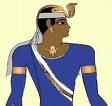
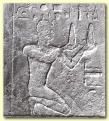
-664 The 29th Olympiad. Taharqa dies, ending the 25th Egyptian (Kushite) Dynasty, and his son Tanutamun (Tenuatamum) (Tantamani) (Tandaname) (Tanwetamani) (Bakare) ("Glorious is the soul of Ra") (d. -656) becomes king #6 of the 25th Egyptian (Kushite) Dynasty at Napata; he kills Necho I and captures and sacks Thebes, causing Ashurbanipal to return and reconquer and raze it to the ground; the sacking of Thebes by Big Ashpan is considered a universally accepted fixed date of chronology; Necho I dies helping Tanutamun defend Lower Egypt from the Assyrians, and his son (by Istemabet) Psamtik (Psamtek) (Psammetichus) (Psammetikhos) I (Wah-Ib-Re) ("Constant is the heart of Ra") (d. -610) becomes king of Egypt (until -610), founding the Egyptian Twenty-Sixth (26th) Dynasty (ends -525), beginning the the 54-year-siege of Azotus (modern-day Ashdod) (ends -610), and going on to unite Egypt and free it from Assyrian control; the Third Intermediate Period (begun -1077) ends, and the Late Period of Ancient Egypt begins (ends -332), with foreigners ruling the country while Egyptian culture flourishes in its last gasp. Greek colonies Corinth and Corcyra begin an economic rivalry.
-662 Ashurbanipal puts down a revolt in Tyre.
-661 Ashurbanipal installs Psamtik I as viceroy of Lower (N) Egypt. The Jin eliminate the Wei Kingdom and the Huo Kingdom in China.


-660 The 30th Olympiad. On Feb. 11 young whippersnapper Jimmu (Jinmu) Tenno (-711 to -585) ascends to the throne of Japan (until -585), founding the Yamato Empire as emperor #1; ; his motto is "All the world under a roof of eight poles", with everybody paying homage to the Sun goddess and obeying her god-on-earth, him. The Elamites invade Babylonia. Baal I of Tyre dies, after which who knows who's in charge of Tyre for the next 70 years (until -591). Ashurbanipal demands tribute from King Gyges of Lydia, and sends emissaries, as recorded on a tablet of Ashurbanipal. Anaxandridras dies, and Archidamus I (d. -645) becomes Eurypontid king of Sparta. About this year an enormous solar storm strikes Earth. Architecture: The earliest temple to Artemis in Ephesus is destroyed by the Cimmerians, and is rebuilt 2x by -550. Births: Persian Zoroastrianism founder Zarathustra (Pers. "camel driver") (Zoroaster = Gr. "undiluted stars") (d. -583) (flourished in -625?) in Media. Deaths: King Nimlot E of Hermopolis.
-659"> Greek Athenian lawgiver Draco (Drakon) (d. -601).
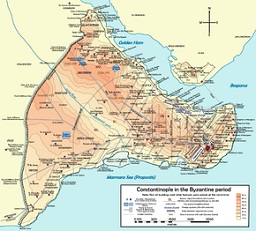
-657 Cypselus (d. -625) overthrows the Bacchiad oligarchy and becomes the first tyrant of Corinth. Greeks from Megara found a colony at Byzantium (Byzantion) (modern-day pop. 14.1M/14.7M) on the site of the 11th-13th cent. B.C.E. Thracian fishing village of Lygos between the Golden Horn (an arm of the Bosphorus) and Sea of Marmara (Propontis) on the European side of the Bosphorus across from Chalcedon on the Asiatic side, and name it after Megarian leader Byzas (Byzantas) of Thrace, who was told by the oracle of Apollo at Delphi to settle there, marrying Lygos gov. Barbysios' daughter Phidalia; located on the Silk Road, and the only sea route between the Mediterranean Sea and Black Sea, it dominates trade; on May 11, 330 C.E. Roman emperor Constantine dedicates it as his new capital, becoming the largest and wealthiest city in Europe from about 450-1204, when it is captured by the Latin Crusaders, then reconquered by the Greek Byzantines in 1261, holding on against yearly Ottoman Muslim attacks until it falls on May 29, 1453, becoming Istanbul ("to the city"), after which the Ottoman Empire rules it until its dissolution on Oct. 29, 1923, when it becomes part of the Turkish Repub.
-656 The 31st Olympiad. In Mar. Psamtik I dispaches a naval fleet to Thebes that compels Kushite princess Shepenupet (Shepenwepet) II to adopt his daughter Nitocris I (d. -585) as her heiress as depicted in the 6' x 4.5' red granite Adoption Stela in Karnak (discovered in 1897 by Georges Legrain), ending the Nubian 25th Dynasty's control over Upper Egypt; Tanutamun dies after being driven from Egypt by the Assyrians, but the Kushite Kingdom of Napata continues.
-655 Psamtik I rebels from Assyrian rule, aided by Carian and Ionian mercenaries sent by Gyges of Lydia, and gains control of all of Egypt, founding the Egyptian Twenty-Sixth (26th) (XXVI) Dynasty (ends -525), which rules from Sais, and enjoys a cent. of independence. The Elamites under Tept-Humaan invade Babylon, and their king is KIA. The Jin eliminate the Guo Kingdom and the Yu Kingdom in China.
-654 Phoenician settlers found a port on the Balearic Island of Ibiza (Eivissa) (Phoenician "Iboshim" = dedicated to Bes, goddess of music and dance) off the E coast of Spain; the Romans later call it Ebusus, and the Greeks later call it and sister island Formentera the Pitiusas ("pine-covered islands") (modern-day Pine Islands); within 160 years Carthage takes it over. Births: Greek lyric poet Alcman (Alkman) (d. -611).
-653 King Phraortes of the Medes lays siege to Nineveh, and is defeated and killed with the help of the Scythians.
-652 The 32nd Olympiad. The Babylonians under King Shamash-Shuma-Ukin begin a revolt against the Assyrians under his brother Ashurbanipal with the support of Phoenicia, the Arabs, Judah, the Chaldeans and the Elamites; Ashurbanipal invades the S and sieges Babylon for two years, driving it its pop. to cannibalism. Perdikkas I dies, and Argaios (d. -621) becomes king of Macedonia. The Cimmerians attack Lydia, occupy Sardis, and kill King Gyges; he is succeeded by his son Ardys II (d. -624), who becomes the 2nd Mermnad king of Lydia, going on to attack Miletus and capture Priene, and spend most of his reign fighting the pesky Cimmerians. Ashurbanipal helps depose Yauta' in favor of Abiyate (d. -644) as king of Qedar in N Arabia. The earliest recorded coins are produced in Lydia (in modern-day Turkey), during the reign of King Gyges, and are composed of electrum (naturally occurring gold-silver amalgam).
-651 The Cimmerians are driven from Lydia by Ardys, who then plans an electrumfying campaign against the Greek cities on the coast of Asia Minor. Zhou Hui Wang dies, and Zhou Xian Wang (d. -619) becomes Dong Zhou king #6 of China. The Sicilian Greek colony of Selinus is founded by Dorian Greek colonists from Megara Hyblaea; being the closest one to the Phoenician cities it sometimes switches sides in Greek-Phoenician disputes?



-650 Between this year and 323 B.C., Greece has 1.2K separate city-states. The Egyptians expel the Assyrians, who are weakened by their war with Babylon. The Messenians revolt against the Spartans, starting the Second Messenian War (ends -630), allying with Argos and Arcadia ("people of the bear") and winning the Battle of Senyclarus. King Manasseh of Judah returns to Jerusalem from captivity in Babylon and institutes reforms while building better defenses. About this time 1-eyed Lycurgus (the Lawgiver) (Gr. "he who brings into being the works of a wolf") (-700 to -630), reorganizes Sparta, broadening its power base and instituting a polyandric (sloppy seconds?) male chauvinist militaristic culture, with lifelong military training starting at age seven, rigid oligarchic govt. with three Doric tribes each providing a lochos (regiment) for the army, a Gerousia (council) of 28 elders and two kings, an Apella (assembly) made up of adult male citizens (spartiates), five ephors (chief magistrates) with wide powers, and a subclass of non-Spartan Laconians called the Perioikoi who serve in the army but have no vote in the assembly. About this time the city of Rome begins to take off, with homes having foundation blocks, tiled roofs, landscaping, inscriptions, art, etc., and exotic imports from the Greek world. In this decade Greek poet Archilochus of Paros leads a colonizing party to Thasos; he later gets in a battle with the Thracians, loses his shield and runs from the fight, then writes verses trying to whitewash himself, causing the Spartans to banish him back to Paros, where he dies in a war with Naxos. About this time the rulers of Yemen move their capital from Sarwah (Khriba) to Ma'rib (60 mi. E of Sana'a), and change their title from makrib to king of Sheba (ends -115). In this half-cent. the Greek city-colony of Paestum (Posidonia), 25 mi. SE of modern-day Salerno (50 mi. ESE of Naples) on the Gulf of Salerno is founded by colonists from Sybaris, and devoted to Poseidon, to whom they build a colossal Doric Temple of Poseidon, (Hera?) which survives to modern times as one of the most well-preserved ancient Greek temples. By this time the Greeks have stripped their hillsides of trees, leading to erosion. By this time iron working spreads to North Africa - to make cooking pots for missionaries? Inventions: About this time papyrus is used for written scrolls by the Egyptians; demotic (Gr. "popular") script, a cursive form of hieratic script written from right to left is developed, and used until the 5th cent. C.E. About this time the first historical reference is made to triremes, boats with three rows of oars and battering rams; they eventually work up to 170 rowers - pass the deodorant? Art: The Black Figure Period in Greek Art (decorated pottery) begins (ends -510).
-648 On Apr. 6 the Greeks record their first total solar eclipse. The 33rd Olympiad adds the pancratium, a no-holds-barred extreme-ultimate wrestling-boxing event. The Babylonian revolt against the Assyrians is miserably unsuccessful; Babylon is sacked and Shamash-Shuma-Ukin commits suicide; Ashurbanipal installs Kandalanu (d. -627) as king of Babylon, except for Nippur.
-647 Median king Deioces dies after being captured and deported to Hamath by Sargon II. Ashurbanipal sieges Susa; his soldiers topple it with pickaxes and crowbars and carry off the spoils; Cyrus (Kurush) I becomes an Assyrian vassal.
-646 Phraortes (d. -625) becomes king of the Medes.
-645 Egyptian king Psamtik I recaptures what is left of Thebes from the Assyrians. Archidamus I dies, and his son Anaxilas (d. -625) becomes Eurypontid king #10 of Sparta. Rusa II dies, and his son Sarduri III (d. -635) becomes king #11 of Urartu; the Urartian kingdom around Lake Van begins a decline, although he does erect a monument called the Treasury Gate and another at Alexandropol (modern-day Leninakan) to crow about his Vs with the Hittites to the W and the Manni (Minni) to the E. Deaths: Chinese PM (-685) Guan Zhong (b. -725). Greek Lesbian poet Terpander of Antissa (b. -712).
-644 The 34th Olympiad.
-642 Judean king (since -696) Manassah dies, and "Wicked King" Amon (d. -640) (Heb. "master builder or workman") becomes yet another bad king of Judah (2 Ki. 21:19); cents. later a Hellenistic Jew writes The Prayer of Manasses (Manassah), in which he confesses his sins and begs Jehovah for forgiveness.

-640 The 35th Olympiad. Persia becomes a vassal state of Media. Eurycrates dies, and his son Anaxander (Anaxandros) (d. -615) becomes Agiad king #12 of Sparta. Ancus Marcius (Martius) (d. -617) becomes Etruscan king #4 of Rome (until -617), going on to construct Rome's first jail, the Carcer on the NE slope of the Capitoline Hill facing the Curia, the Sublician Bridge, the first bridge across the Tiber River, and the port of Ostia at the mouth of the Tiber River (14 mi. SW of Rome), becoming the first Roman colony, famed for salt works and as a port for grain from Sicily, Sardinia, and Africa, as well as chief base of the Roman navy; Marcius captures many Latin towns and moves their pops. to Rome. The kingdom of Macedon (Macedonia) is founded after Perdiccas I of the Argead Dynasty conquers the Macedonian plain and establishes a capital at Aegae (Aigai) (Vergina) in N Greece; Greeks, Illyrians, and Thracians move on in and Hellenize the aristocracy? Amon is murdered by his own servants, then the "people of the land" (Heb. "'am ha-'a'rets") put them to death and place Amon's 8-y.-o. son (by Jedidah the daughter of Adaiah) (2 Ki. 22:1) Josiah (Josias) (d. -609) (Heb. "may Jehovah give", "Jehovah heals") on the throne of Judah, burying Amon in the garden of Uzza (2 Ki. 21:19-26, 22:1-2, Chron. 33:20-25); Josiah is the son of Jedidah the daughter of Adaiah (2 Ki. 22:1); his wives are Hamutal and Zebidah (2 Ki. 23:31-6); of his four sons, only the firstborn Johanan does not rule as king of Judah after him; of the seven Judean kings after Hezekiah, he is the only one who takes steps to rid the land of false worship after Zephaniah (Tzepfanayah) (Sophonias) (Heb. "Jehovah has concealed") writes The Book of Zephaniah (Sophonias) during his reign, warning about the coming "day of the Lord" when he will punish Jerusalem for going after other gods, causing Josiah to tear down the high places and the Asherah poles and reinstate the worship and feasts of the One True God Jehovah; in 2019 an agate stone and lump of burnt clay used as seals are discovered in the old City of David, mentioning Nathan-Melech, Josiah's servant? Births: Greek soldier Pittacus of Mytilene (d. -568) in Mytilene. Deaths: Greek poet Archilochus (b. -680).
-639 Assyria destroys Susa, and devastates the land of Elam; the Assyrian Annals (state records) abruptly end this year; "With the year 639, the sources for Assyrian history cease... No explanation can be given for this curious blackout. With appalling suddenness, the Empire disintegrated." The Interpreter's Dict. of the Bible)
-638 Births: Greek lawgiver (first Athenian poet) Solon (Gr. "wise") of Athens (d. -558) in Athens; son of Execestides; descendant of Codrus, last king of Athens; ancestor (six generations removed) of Plato; relative of Pisistratus (their mothers are cousins).
-636 The 36th Olympiad. Gong Zi Zhong Er (d. -628) becomes the Duke of Jin.
-635 Sarduri III dies, and his son Erimena (d. -629) becomes king #12 of decaying Urartu.
-634 The Medes under Cyaxares (Kyaxares) (U-ma-kis-tar) (grandson of Deioces) capture Asshur, then Cyaxares meets with Nabopolassar by the captured city and makes an entente cordiale. Josiah's wife Zebidah gives birth to his 2nd son Jehoiakim (Heb. "Jehovah raises up") (2 Ki. 22:1, 23:36).
-633 Josiah's wife Hamutal gives birth to his son Jehoahaz (Heb. "Jehovah has taken hold") (Shallum) (2 Ki. 22:1, 23:31; Jer. 22:11).
-632 The 37th Olympiad. The Cylonian Affair sees Athenian noble (Olympic champ) Cylon attempts to establish a tyranny in Athens with help from Megara (run by his tyrant father-in-law Theagenes), but the people don't support him, and they hole-up in the Temple of Athena on the Acropolis, after which Cylon and his brother escape, but the rest are captured by the nine archons of Athens led by Megacles and the Alcmaeonid aristocratic clan while hiding in the Temple of Athena on the Acropolis, then promised their safety and massacred, causing the Curse of the Alcmaeonidae, an inherited miasma (stain) on them. The Duke of Jin unites the remaining Chinese kingdoms and defeats the Chu in the Battle of Cheng Pu.
-630 Ashurbanipal abdicates, and appoints his son Ashur-Etil-Ilani as regent. Sparta wins the Second Messenian War (begun -650), and forces the poor Messenians back into helotry (serfdom). About this time the town of Histria (Istros) (Gr. "By the Danube") on the Dobrudja Black Sea Coast at the mouth of the Danube River is founded, becoming the first Greek town in modern-day Romania, opening up trade with the interior. About this time Greek elegiac poet Mimnermus of Smyrna (born in Colophon, Ionia) flourishes (until -600), composing Nanno, a collection of love poems addressed to a flute player. Births: Greek lezzie poet ("the Tenth Muse") ("the Poetess") Sappho (d. -570); leaves The Midnight Poem; written between Jan. 25 and Mar. 31?; "The Moon is set, and the Pleiades./ It's the middle of the night./ Time passes./ But I sleep alone." Greek (Dorian) lyric poet Stesichorus (Gr. "chorus master") (d. -555); first poet to use a palinode (an ode retracting a view expressed in an earlier poem), retracting his view that the Trojan War was all Helen's fault.
-629 Erimena dies, and his son Rusa III (d. -601) becomes king #13 of Urartu.
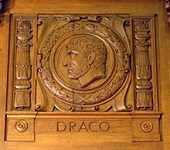
-628 The 38th Olympiad. Athenian thesmothetai (judge) Draco (Drakon) (Gr. "serpent, dragon") the Lawgiver (-659 to -601) is elected ruler of Athens, going on in -622/-621 (39th Olympiad) to enact the draconically strict Law Code (Constitution) of Draco, the first law code of Athens, displayed at a central public location, which punishes the stealing of cabbages with death; "And Draco himself, they say, being asked why he made death the penalty for most offenses, replied that in his opinion the lesser ones deserved it, and for the greater ones no heavier penalty could be found"; uninentional and intentional homocide are first distinguished, with crimes adjuticated at the Aeropagus - is that a trick question? King Josiah of Judah begins a 6-year campaign against idolatry, which extends even into the former lands of the 10-tribe kingdom of Israel (2 Chron. 34:3-8).
-627 Kandalanu dies, and Assyrian Gen. Sin-Shum-Lishkar is appointed king of Babylon; Ashurbanipal's viceroy Kandalanu dies, and he revolts but is ousted. Ashurbanipal dies, and his son Ashur-Etil-Ilani (d. -624) becomes king of the Assyrians. The city of Epidamnos (Epidamnus) (Epidamnos) (modern-day Durazzo or Durres, pop. 201K) in Illyria on the Albanian coast opposite Bari and Brindisi across the Adriatic Sea is founded by Greek colonists from Corinth and Corcyra, becoming known for its natural rocky harbor surrounded by swamps and cliffs, making it very durable and secure from attack; the Romans seize it in the 4th cent. B.C.E. and change its name to Dyrrachium.
-626 A 3-year civil war erupts for control of the Assyrian throne; Sin-Shum-Lishkar is KIA, and Ashurbanipal's son Sin-Shar-Ishkun (d. -612) becomes king of Babylon; Chaldean king Nabopolassar declares himself king of Sealand, stirs up a revolt, and drives Sin-Shar-Ishkun back to Nineveh, capturing Babylon.

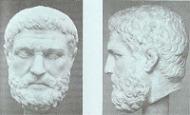
-625 Chaldean king Nabopolassar (Naboplashar) (Nabu-Apla-Usur) (d. -605) becomes king of the Babylonians, founding the Nabo-Bab, er, Neo-Babylonian Empire (ends -539); the term Chaldea (formerly only the region in S Babylonia bordering on the "Nether Sea" or Persian Gulf) becomes synonymous with all of Babylonia. Anaxilas dies, and Leotychidas I (d. -600) becomes Eurypontid king of Sparta. Cypselus dies, and his son Periander (Periandros) (d. -585) becomes the 2nd tyrant of Corinth, bringing it to its zenith; and becoming one of the Seven Sages of Greece. Median king Phraortes dies.

-624 The 39th Olympiad. Cyaxares (Kyaxares) (Huvakhshtara) (Uvakshatra) (d. -585) (grandson of Deioces) ends Scythian domination, and becomes king of the Medes, reorganizing the army along Assyrian lines - use their own tactics against them? Births: Greek philosopher (the first?) ("the Father of Science") Thales of Miletus (d. -547); father of Greek philosophy, and Mr. Water Is the Source of All Things (Arche); regarded by Aristotle as the first philosopher; "Western philosophy begins with Thales" (Bertrand Russell).

-623 Ashur-Etil-Ilani is KIA in a battle near Nipur by his brother Sin-Shar-Ishkun, who becomes king of Assyria (until -612). Anlamani (d. -593) becomes king of the Kushite kingdom of Napata, and campaigns against the nomadic Nubian Blemmyes (Blemmyae); not to be confused with the legendary Blemmyes, who are headless, with their eyes and mouth in their chest. In the 18th year of King Josiah of Judah, during the repair of the Temple, the Book of Deuteronomy (Heb. "the book of Jehovah's law by the hand of Moses") is "found" by Jewish priest Hilkiah (Heb. "my portion is Jehovah"), causing the king to rip his garments and then assemble all of the people to read it to them; he then arranges for the biggest Passover (Nisan 14) since the days of the prophet Samuel, which features 30K animals and 3K cattle slaughtered and BBQed (2 Ki. 23:21-23; 2 Chron. 35:1-19). The Chu eliminate the Jiang Kingdom. Births: Real date for the birth of Gautama Buddha?
-622 After the Jewish Temple is repaired, King Josiah of Judah orders the Ark of the Covenant returned from safekeeping; prophet Jeremiah says that the Ark will not be missed because "Jerusalem itself will be called the throne of Jehovah" (Jer. 3:16-17); in John's Revelation "the Ark of the Covenant was seen in his temple sanctuary" in heaven (Rev. 11:19) - so Indiana Jones fans must be out of luck?
-621 Argaios I dies, and Philip (Gr. "horse lover") I (d. -588) becomes king of Macedonia (Macedon).
-620 The 40th Olympiad. Greek colonies housing Greek soldiers are founded in Egypt around the trade center of Naucratis (Naukratis) (Gr. "the city that wields power") at the mouth of the Nile River, encouraged by Psamtik; the different Greek tribes who live there create the first nat. Greek identity? - ancient multiculturalism? Periander decides to build a canal across Corinth, but the Oracle of Delphi (who hoards the precious formula for dynamite?) warns against it, so he begins to build a road to carry boats on instead, the 3.5-mi. Diolcos (Gr. "haul across") (Gr. "movable platform") (finished -606). About this time cithara-playing Arion of Methymna invents dithyrambic poetry in Lesbos and composes named dithyrambic choruses, the predecessor of the Greek drama (Gr. "to act") in Corinth. Births: Grecian "Aesop's Fables" freed slave fable king (hunchbacked dwarf) Aesop (d. -560) in Phrygia or Thrace; starts out as a slave in Samos, then lives at the court of Croesus, meets Solon, dines with the Seven Sages of Greece and Periander in Corinth, and visits Athens and pisses-off Peisistratus.
-619 Zhou Xian Wang dies, and Zhou Qing Wan (d. -612) becomes Dong Zhou king #7 of China.
-616 The 41st Olympiad. Nabopolassar unsuccessfully sieges Ashur. About this time the Etruscans conquer Rome and found a dynasty of Etruscan princes, the gens Tarquinia; traditional date of the beginning of the reign of Roman (Etruscan) king Lucius Tarquinius Priscus I the Elder (d. -579), who kicks neighboring Latin tribes' butts, then unites the Seven Cities of Rome, and begins the construction of public bldgs., draining and paving the central area of the Roman Forum between the Capitoline and Palatine ridges, and building a huge Etruscan-style Capitoline Temple (dedicated to Jupiter?) with three cellae (rooms) on the Capitoline Hill; the communities on the Palatine and Capitoline Hills are also enclosed with fortifications, remnants of which survive to modern times.
-615 The Medes invade Assyria, capture Arrapha, and siege Nineveh. Anaxander dies, and his son Eurycratides (Eurycratidas) (Gr. "wide ruler") (d. -590) becomes Agiad king #13 of Sparta, presiding over the devastating war with Tegea.
-614 The Assyrian city of Assur (Ashur) falls to the Medes under Cyaxares, who allies himself with the Babylonians under Nabopolassar.
-613 Nebuchadnezzar (Nabu-kudurri-usur) II, son of Cyaxares of Media marries the granddaughter of Babylonian king Nabopolassar; the Assyrians launch an offensive aginst the Babylonians. The Mayans begin to keep their calendar.
-612 The 42nd Olympiad. The Assyrian capital of Nineveh (pop. 100K) is sieged, sacked, and destroyed by the Babylonians under Nabopolassar, the Medes under Cyaxares, and the Scythians (Nah. 3:7), turning it into "ruin-hills and heaps of debris" (Babylonian Chronicle 21901 of the British Museum); the ruins aren't rediscovered until 1849 C.E.; the great library of Ashurbanipal is destroyed (22K cuneiform tablets found in modern times); the Assyrian Empire is threatened with collapse as the Medes and Babylonians divide it; Sin-Shar-Ishkun dies, and Ashur-Uballit II (d. -609) becomes the last king of the Assyrians, taking what is left of his army and fleeing 225 mi. W to Haran; Nippur falls to the Babylonians after a prolonged siege; Nahum writes The Book of Nahum about the time of Nineveh's fall? Zhou Qing Wang dies, and Zhou Kuang Wang (d. -606) becomes Dong Zhou king #8 of China.
-611 Deaths: Greek lyric poet Alcman (b. -654).


In the late 7th cent. or 6th cent. B.C.E. according to modern Bible scholars, the Pentateuch (Five Books of Moses) (Torah) incl. Genesis, Exodus, Leviticus, Numbers, and Deuteronomy begin to be composed by four different sources, which are collated into the final version in the 5th cent. B.C.E.; the first two are "J" (Jahwist/Yahwist), living in the southern Kingdom of Judah, and "E" (Elohist), living in the northern Kingdom of Israel; in the 6th cent. B.C.E. "P" (Priestly) writes the first chapter of Genesis, and "D" (Deuteronomist) writes Deuteronomy; there are two versions of the creation story in Genesis; E's version of creation (Gen. 1:1-2:3): "In the beginning (Bereshith) God created the heaven and the earth. And the earth was without form, and void; and darkness was upon the face of the deep. And the spirit of God moved upon the face of the waters. And God said, 'Let there be light'; and there was light..."; J's version of creation (Gen. 2:5-7): "At the time when Yahweh God made earth and heaven, there was as yet no wild bush on the earth nor had any wild plant yet spring up, for Yahweh God has not sent rain on the earth nor was there any man to till the soil. However, a flood was rising from the earth and watering all the surface of the soil. Yahweh God fashioned man (adam) of dust from the soil (adamah). Then he breathed into his nostrils the breath of life and thus man became a living being." Psamtik I dies, and his son (by Mehtenweskhet) Necho (Nekau) (Neku) (Nechoh) (Nikuu) II Wahem-Ib-Re ("Carrying out the heart of Ra") (-658 to -595) becomes king #2 of the Egyptian 26th Dynasty (until -595); meanwhile the Median-Babylonian army marches on Harran, where his ally Ashur-Uballit II is holed-up, and he attempts to assist him, sending a small army which proves too small and retreats; meanwhile the 54-year siege of Azotus (Ashdod) by Egypt (begun -664) ends, becoming the longest siege so far in history. Births: Greek philosopher (Thales' pupil) Anaximander of Miletus (d. -546); the first writer on philosophy, and Mr. Undefined Unlimited Boundless Substance Is the Source of All Things.

-609 In spring Necho II leads a large army of mercenaries along the Via Maris coastal route ino Syria to help Ashur-Uballit II in Harran fight Babylonian conqueror Nabopolassar, but on the way he is intercepted by King Josiah of Judah at Megiddo, where Josiah is shot by an Egyptian archer in his war chariot (2 Chron. 35:20-25, 2 Ki. 23:29-30), and brought back to Jerusalem to die, after which Necho II sends messengers with the soundbyte: "What quarrel is there between you and me, O king of Judah? It is not you I am attacking at this time, but the house with which I am at war. God has told me to hurry; so stop opposing God, who is with me, or he will destroy you" (2 Chron. 35:21); after Nabopolassar captures Kumukh, cutting him off, Necho II goes on to capture Kadesh in Syria on the Orontes River, sending his battle clothes to Branchidae of Miletus, who dedicates them to Apollo; meanwhile Ashur-Uballit II flees Harran SW to Syria, hooking-up with Necho II and returning over the Euphrates (becoming the first pharaoh to cross it since Thutmose III) to siege Harran, but fail to capture it and retreat back to N Syria, after which Ashur-Uballit II vanishes from history, and Assyria is kaput, swallowed by the Babylonians, who annex Megiddo but leave it waste to get even for centuries of maltreatment; by popular acclaim Josiah's 4th and youngest son, 23-y.-o Jehoahaz (Joahaz) (b. -632) (Heb. "Jehovah has taken hold") (AKA Shallum) becomes king of Judah for 3 mo. (2 Ki. 23:29-31, 2 Chron. 36:2) and rules badly until Necho II imprisons him at Riblah and removes him in favor of his 25-y.-o. brother Eliakim, changing his name to Jehoiakim (-634 to -598) (Heb. "Jehovah raises up") (2 Ki. 23:34-6, 1 Chron. 3:15); his 11-year rule is marked by injustice and oppression, and raids from marauder bands; Jehoahaz is later taken to Egypt, where he dies in captivity (2 Ki. 23:31-4, Jer. 22:10-12); the Book of Hakkuk, warning of the coming wrath of God using the Chaldeans (Babylonians) to execute his judgment on Judah for their sins is written during his reign? The Medes conquer Urartu. Alyattes (d. -560) (Lydian "walwi" = lion) becomes king #4 of Lydia, and sets out to conquer the Greek cities of coastal Asia Minor, scoring all of them except Miletus. During his Syrian campaign, Necho II begins building a canal linking the Pelusiac branch of the Nile River with the Red Sea (Erythraean Sea) (precursor of the Suez Canal), founding the city of Per-Temu Tjeku ("The House of Atum of Tjeku) in modern-day Tell el-Mashkuta 9 mi. W. of Ismalia, but stops it to go to war and never finishes it after 120K workers die trying to build it; after forming a navy using Ionian Greeks, Necho II's ships begin a 14-year circumnavigation of Africa from east to west.
-608 The 43rd Olympiad. Necho II retakes Kumukh after a 4-month siege, and executes the Babylonian garrison.
-607 Babylonian king Nabopolassar and his son crown prince Nebuchadnezzar assemble independent armies; within a month the father goes back to Babylon, and his son successfully wars in mountainous territory, returning with much spoil. The year (Ab 7-11, 5th Jewish month) in which the Babylonians conquer Big J's Holy City of Jerusalem after a 3-year siege and take the Jews into captivity, according to the Jehovah's Witnesses (everybody else thinks this happened in -587, but they are all wrong because the JWs are right?); this makes their freeing by Cyrus II the Great 70 years later conform to the JW Bible chronology based on the key year 1914 C.E. when 2520 years (7 x 360 years) (seven years of years) are added, although it disagrees with all secular historians, and pushes all prior Bible dates back 20 years - still, it would be funny if? About this time Jewish prophet Obadiah (Abdias) ("worshipper/servant of Jehovah") writes the Book of Obadiah (Abdias), and "the weeping Jewish prophet" Jeremiah ("Jehovah exalts") writes the Book of Lamentations.
-606 After being taken into taken into captivity at Jerusalem by Nebuchadnezzar II of Babylon in the 3rd year of Jehoiakim (-587 according to the Jehovah's Witnesses), noble Jewish youth Daniel (Heb. "Jehovah is my judge") becomes the king's minister. Rome passes a law prohibiting the playing of any musical instrument except the pipes; the reforms of Servien permit the tuba and cornu to be played. Zhou Kuang Wang dies, and Zhou Ding Wang (d. -585) becomes Dong Zhou king #9 of China. Architecture: The Dioclos (begun -620) is completed.
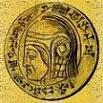

-605 In summer Babylonian crown prince Nebuchadnezzar (Nabuchodonosor) (Nabu-Kudurri-Usur) ("O god Nabu, preserve my firstborn son") II (d. -562) defeats the Egyptians under Necho II (his rival for control of Syria and Palestine) at the Battle of Carchemish (Karkemish) on the W Bank of the Euphrates River 400 mi. N of Jerusalem (Jer. 46:1-2) (35 mi. SE of Gaziantep in S Turkey on the Syrian border), and overtakes and annihilates the fleeing Egyptian army at Hama; both sides take heavy casualties, and Nabopolassar is KIA; Egyptian power in Asia is destroyed (2 Chron. 35:20); "For the mighty man has stumbled against the mighty, and they are fallen both of them together (Jer. 46:12); on the first day of Elul (Aug.-Sept.) his son Nebuchadnezzar II is crowned king of Babylon and becomes undisputed ruler of W Asia (until -562); Judean king Josiah takes on Necho on his way to Carchemish in violation of God's orders, and is wounded by archers and brought back to Jerusalem, where he dies, and Jeremiah utters laments for him, which "are written in the Laments" (2 Chron 35:20-27); Josiah is succeeded by 23-y.-o. Jehoahaz, who reigns 3 mo. until Necho deposes him and lays a tribute of 100 talents of silver and one talent of gold on the land, then makes his 25-y.-o. brother Eliakim king of Judah, changing his name to Jehoiakim (Heb. "He whom Yahweh has set up"), taking his brother Jehoahaz hostage back to Egypt; "He reigned eleven years in Jerusalem, and did what was evil in the sight of the Lord his God" (2 Chron. 36:1-8). About this time "the weeping Jewish prophet" Jeremiah ("Jehovah exalts") begins composing the Book of Jeremiah, a prophecy directed against Israel, Judah and all the nations dictated it to his secy. Baruch (Jer. Ch. 36). Births: Greek (Athens) tyrant (-560 to -527) Pisistratus (Peisistratos) (Peisistratus) (d. -527) (pr. pie-SIS-truh-tus) in Athens; son of Hippocrates; relative and friend of Solon.
-604 The 44th Olympiad. Nebuchadnezzar II returns to Hattu, and in the month Shebat (Jan.-Feb.) returns to Babylon with vast booty; he again leads his forces through Hattu, and destroys the Philistine city of Ascalon (Ashkelon) after it rebels. In the month of Chislev (Nov.-Dec.) Jehudi reads Baruch's scroll to King Jehoiakim, predicting Judah's destruction by Babylon; the king orders it burned in his brazier (Jer. 36:1-4, 21-29). Big man Nebuchadnezzer begins construction of the Wonder of the World Hanging Gardens of Babylon - if I were to give it a grade from A-F, I'd give it a Y, for why did I do it? Births: Chinese philosopher (founder of Taoism) Lao-Tzu (Lao-Tze) (Laozi) (Laozi) (Lao Zi) (Laotze) (Lao Tse) (Chin. "old master") (d. -531) in Chu (d. -470 at age 130?).
-603 Nebuchadnezzar II conducts another campaign into Hattu.
-602 Nebuchadnezzar II conducts another campaign into Hattu.
-601 The Saite king Necho II defeats Nebuchadnezzar II; Jewish king Jehoiakim seizes the initiative to revolt from Nebuchadnezzar and defect to the Egyptians; Nebuchadnezzar defeats the invading Egyptians, and forces Judean king Jehoiakim (d. -598) to become his vassal for three years (II Ki. 24:1). Rusa III dies, and his son Sardure IV (d. -585) becomes king #14 of Urartu. Deaths: Greek Athenian lawgiver Draco (b. -659) in Aegina.

-600 The 45th Olympiad. The Iron II Period of Archeology (begun -1000) ends, and the Iron III Period of Archeology begins (ends -330). Critias is elected ruler (archon) of Athens. Leotychidas I dies, and Hippocratidas (d. -575) becomes Eurypontid king of Sparta. Athens seizes Sigeum in Asia Minor from Mytilene, causing a war (ends -590). Cleisthenes, tyrant of Sicyon transfers Arion's tragic choruses to Dionysus. The Spanish harbor town of Gades is destroyed by their rivals the Phoenicians. About this time the city of Vercelli on the Sesia River between modern-day Milan and Turin in modern-day Piedmont, Italy (modern-day pop. 46K) is founded, becoming known for rice paddies; in 1228 the world's first publicly-funded univ. is founded there (closed in 1372). In this cent. the Mediterranean port city of Marmaris (originally Physkos or Lyscus) in a part of Caria belonging to Rhodes (modern-day Mugla Province, W Turkey on the Turkish Riviera), with a magnificent harbor and sacred grove to Leto; Herodotus claims that a castle existed there since 3,000 B.C.E. About this year the first recorded circumnavigation of Africa by ships of Egyptian pharaoh Necho II (manned by Phoenicians) takes three years, sailing from the Red Sea around Africa, rounding the Cape of Good Hope heading W, noting that the Sun i s to their right, then N to the Mediterranean, pausing each year to sow and harvest grain; Herodotus is later skeptical of this voyage, not knowing that the Earth is spherical. About this time the dense pop. of Zealand, Jutland, and Skane suddenly collapses after being hit by a cyclone or tsunami, after which the North Atlantic freezes, the Arctic becomes a solid ice sheet, and Scandinavia develops a damp, cool climate, causing the Scandinavians to move N inland, displacing the indigenous Bronze Age Gamla Folk whose civilization was founded around 1600 B.C.E. In this cent. the isolated Greek state of Boeotia (Beotia) in C Greece, founded by Aeolic tribes from Thessaly emerges, bounded on the N by Locris Opuntia, on the E by the Atalante Channel and the Evripos Strait, on the S by Attica, Megaris, and the Gulf of Corinth, and on the W and NW by Phocis; the capital is Thebes; Boeotians are famed for stupidity. In this cent. the Sangam Period (ends 3rd cent. C.E.) begins in ancient Tamil country in S India, now known as Tamilakam, incl. modern-day Tamil Nadu, Kerala, Puducherry, Lakshadweep, S Andhra Pradesh, S Karnataka, and N Sri Lanka, speaking the Tamil language; 230 sq. km. 96.5 km-long Vembanad (Vembanadu) (Punnamada) (Kochi) Lake in modern-day Kerala, India's largest lake features the Kuttanad (Chuttanad) ("place of the burnt forest) region, with rice paddies below sea level, becoming known as "the Rice Bowl of Kerala". In this cent. the city of Delhi (modern-day pop. 16.8M/26.5M) in N India is founded, going on to become the capital of several kingdoms and empires and get captured, sacked, and rebuilt several times. In this cent. the 15th cent. B.C.E. city of Kabul (Kubha) on the Kabul River in modern-day Afghanistan (modern-day pop. 4.6M) is conquered by the Achaemenid Empire, becoming a center of learning of Zoroastrianism, followed by Buddhism, Hinduism, and Islam (870 C.E.). In this cent. the Phocaeans of Massalia found Monaco (Gr. "Monoikos" = single house) (Lat. Monoecus), which becomes known for its worship of Greek god Hercules. About this time Yaharil founds the Kingdom of Haram in S Arabia (ends -175). About this time the small 7-hill town of Rome experiences food shortages and is conquered by several Etruscan princes; the Etruscan League of Cities is formed in Italy, and Rome is ruled by Etruscan kings. About this time the Celtic Gauls, experiencing overpop. problems invade N Italy under their king Bellovesus with six excess tribes, the Bituriges, Arverner, Senonen, Haeduer, Ambarrer, Carnutes, and Aulerci, receiving help from the Greeks in Massilia (Marseille) to cross the Alps in the Tauriner area, then defeat the Etruscans under king Tarquinius Priscus at the Tessin River, and settle Insubria, founding the city of Mediolanum (modern-day Milan) (Lat. "middle of the plain") ("central town or sanctuary"?) ("half-wool", after a boar sow is lifted from the excavation of the city walls?) (modern-day pop. 1.3M), and becoming known as the Insubres, and the region as Insubria. In this cent. the city of Theline (modern-day Arles) in S France on the Rhone River is founded by the Greeks. In this cent. the seaport of Pozzuoli on the Bay of Naples is founded by Greek colonists. In this cent. the town of Constanta (Tomis) in Romania on the Black Sea Coast is founded, becoming the oldest to survive to modern times. The original Downy it's a beautiful feeling? In this cent. the Cloaca Maxima, which drains the site of the Roman forum is begun; public restrooms are later constructed by hewing open (no privacy, or gender segregation) toilet seats out of hillside rock, with the cloaca running underneath (just lift up your toga, sit down and tinkle and plop?); ass-wiping is done with toilet paper, er, Sears and Montgomery Ward catalogs, er, dried corn cobs, er, sponges on sticks, which are swished in the cloaca as needed, so that Roman butt is always clean enough to eat off of?; later, fountains are set up at the entrances, sometimes with slaves providing towels and perfume for washing up; the key to Roman superiority is not white is right (since some of their barbarian enemies are whiter than they are?), but I've got a cleaner ass than than you twig and leaf wipers? In this cent. crucifixion begins to be used by the Persians, spreading in the 4th cent. B.C.E. via Alexander the Great to E Mediterranean countries; in the 3rd cent. B.C.E. the Phoenicians introduce it to the Romans, who go on to perfect it until Constanine I the Great abolishes it in the 4th cent. C.E. Speaking of ass-wipe? The Plates of Brass, containing the five books of Moses and "a record of the Jews from the beginning... down to the commencement of the reign of Zedekiah" are brought from Jerusalem to America by the people of Lehi (a descendant of Joseph) in a ship, and find the new land called Bountiful to have "the cow and the ox, and the ass and the horse, and the goat and the wild goat" (1 Nephi 18:25); but first Lehi's sons (by Sariah) Laman, Lemuel, Sam, and Nephi "take the daughters of Ishmael to wife", then Nephi's brothers rebel against him, and Nephi ends up building the ship and becoming the first Columbus, beginning an official chronicle called the Large Plates and Small Plates, which are destroyed in 385 C.E. - all according to the Mormons - wake me up when September ends? In this cent. the Armenians invade Median-run Urartu from Phrygia or farther west (N of the Black Sea?), speaking their own Indo-European language, and begin adopting the cool new monotheist Zoroastrian religion; Urartu begins to disintegrate - Khaldis is dead? In this cent. the region of Bombay on the W coast of the Indian peninsula is overrun and controlled by the Persians (until -327). In this cent. Corinth founds the colony of Potidaea in the N Aegean in order to trade with Macedonia. In this cent. Neapolis (New City) (modern Naples) (modern pop. 1M) is settled by Ionian Greeks from Cumae. In this cent. Massalia (Massilia) (Marseille) (modern pop. 1M) on the Gulf of Lion on the Mediterranean is founded by Ionian (Phocaean) Greek and Phoenician colonists, despite Carthage trying to prevent it; the first historic mention of the Celtic Gauls (Gaels) ("love people?") and their country of Galatia (Gael. "Gaeltachd" = "land of the Gaels") ("milk-giving"?), who get introduced to olives and grape wine, and take a litle too well to wine, not drinking it diluted like civilized people?; the Anatolia (Greeks) find it hard to colonize Italy, being confined to the W; they are discouraged by the Phoenicians from settling in S Spain and Corsica, but establish colonies in Egypt. In this cent. the Celts, Goidels, Brythons (Britons), and Saxons (Gael. Sasunnach or Sassenach) begin settling Scotland, joining the Neolithic peoples from the Mediterranean already settled there, followed in ? by the Picts. In this cent. the Erainn (Euerni) (Firbolg) tribe of Celtic Belgii from N Gaul begins arriving in the British Isles, claiming to be descended from the god Daire and his son Lugaid, going on to invade and settle in Eire (Ireland), subduing the Neolithic inhabitants and creating the Fifths of Ireland, incl. Ulster (north), Connaught (west) (home of the Wild West family of Connaught Eastwood?), Leinster (east), and (East and West, or undivided?) Munster (Muma) (south) (home of Herman and Lily?) - the gall of it? In this cent. Athenian Tetradrachmas, known for their beauty incl. an image of Athena on one side and an owl on the other become the currency of the ancient Western world, lasting until the Romans replace it with their currency in the 2nd cent. B.C.E. Christianity's muddled origins in Ancient Greece, or did they get a bootleg copy of the Bible translated badly? In this cent. the mystic Greek cult of Orphism is founded, generating a large body of sacred poetry ascribed to legendary Thracian poet-musician Orpheus, whose doctrines, esp. transmigration of souls (metempsychosis) influence Pythagoras, Plato, and Socrates; you see, the good god Dionysus, creator (Logos?) of the material world started out as a silver egg swallowed by Zeus, 6th son of titans Kronos (Chronos) (Cronus) and Rhea; Zeus, who was born in the Dictaen Cave on Crete is himself saved by his mommy after his daddy Big K, who has already shown his style by castrating his daddy Uranus (Heaven) to separate him from his mommy Gaea (Earth), swallows each of his children by her at birth (Hestia, Demeter, Hera, Hades and Poseidon), causing her to wise up and hide Zeusy baby in Crete (with the aid of Curetes), then give Kronos a rock instead of him for breakfast, allowing Zeus to grow up and force Kronos to disgorge his brothers and sisters; the egg Zeus swallows passes through his semen into Persephone, then is born as Dionysus Zagreus (son of God), but the ever-hungry Titans eat him, and Athena (goddess of wisdom) saves his heart, which Zeus eats, and this time he comes out of Semele as the final day-star-network Dionysus, and Zeus destroys the Titans with his thunderbolt and scatters their ashes through the material world, so that all humans have both good and evil elements; but if they rid themselves of the evil Titanic elements and preserve the good Dionysiac elements, they will eventually become totally purified after a series of reincarnations and go to heaven, while the rest go to hell - nine months later I felt lighter? In this cent. humped cattle from India become widespread in the Mediterranean colonies. In this cent. Babylon establishes a silver standard which leads to abuses such as usury. The Triskelion symbol of three interlocked spirals is found on a Greek vase made in this cent.; it later becomes the basis of the Greek cross (gammadion). About this time the golden Fibula Praeneste (Praenestine Brooch) is made, becoming the oldest modern specimen of Latin after being found in 1886 C.E. in Praeneste, Italy; it contains the inscription "Manius me fecit Numasio" (Manius made me for Numarius"), with the funky antique spelling "Manios med fhefhaked Numasioi". The (Celtic?) Leopontic Inscriptions in a script derived from Etruscan are made in Lugano, Switzerland incl. Lake Como and Lake Maggiore. The Maya Civilization is founded in the lowlands of Mesoamerica (modern-day Guatemala) in this cent., with centers at El Mirador and Nakbe, complete with pyramids and stone and stucco bldgs. Architecture: In this cent. the Temple of Alcmeonidae to Apollo in Delphi, Greece is erected to restore the one that burned down; it is destroyed in -373 by an earthquake; "Know thyself" (Gr. "gnothi seauton") is inscribed in the forecourt (pronaos). In this cent. the Greek shrine of Dodona in the Epirus region 50 mi. E of Corcyra (modern-day Corfu) is first mentioned as a favorite place of King Croesus of Lydia, featuring a temple of Zeus and his consort Dione, whose priests interpret the rustling and other movements of a great oak tree along with the murmurings of a fountain as the words of Zeus. Inventions: In this cent. the left-to-right writing system is developed - by a person with lazy eye? In this cent. the first Egyptian Merkhets ("instruments of knowing") are used to establish time at night. In this cent. writing is invented in Mesoamerica by the Olmecs or Zapotecs. Science: About this time Sushruta (Sansk. "well-heard") of Varanasi, India becomes the first plastic surgeon and father of surgery, leaving a Compendium, containing descriptions of 1,120 illnesses, 700 medicinal plants, and detailed surgical techniques for incisions, probing, cauterization, prostate gland removal, hernia surgery, cataract surgery, Caesarian section et al.

-599 Nebuchadnezzar II raids the Qedar region of Arabia. Births: Indian Lord Mahavira (Sans. "Great Hero") (Vardhamana) (d. -527), AKA Vardhamana (Sans. "increasing") ( for bring prosperity to the kingdom while still in the womb) on Apr. 12 (13th day of the rising moon of Chaitra) in Kundalpur, Vaishali (modern-day Bihar, India); son of King Siddartha and Queen Trishala; founder of Jainism; the 24th and last Tirthankara ("fordmaker"), who founds a Jain Tirth (community) that acts as a ford across the river of human misery.
-598 Wicked king Jehoiakim, who had withheld the laborers' wages after building a new palace, and who had ordered the prophet Urijah captured in Egypt, then brought back and killed, rebels in his 3rd year of vassalage to Nebuchadnezzar II, causing the latter to begin sieging Jerusalem.
-597 On Mar. 16 after receiving Jeremiah's prophesied doom, the burial of a he-ass (Jer. 22:13-19), Judean king Jehoiakim loses Jehovah's protection, allowing the Babylonians under Nebuchadnezzar II sieging Jerusalem to capture it on the 2nd day of the Jewish month of Adar, and begin deporting the Jews, along with Jehoiakim (bound in fetters) (2 Chron. 36:6), and the future prophet Ezekiel to Babylon (2 Ki. 24:11-16, Jer: 22:24-27, 24:1, 27:19-20, 29:1-2), taking "part of the vessels of the house of the Lord... and put them in his palace in Babylon" (2 Chron. 36:7); Jehoiachin's 8-y.-o. son (by mother Nehushta) Jehoiachin (Jeconiah) (Coniah) (Heb. "Jehovah firmly establishes") succeeds him as king of Judah, but his reign lasts only 3 mo. 10 days. after "he did what was evil in the sight of the Lord, and in the spring Nebuchadnezzar sent and brought him to Babylon with the precious vessels of the house of Jehovah" (2 Chron. 36:9-10); Nebuchadnezzar then makes 21-y.-o. Mattaniah the new king of Judah under the name Zedekiah (Heb. "Jehovah is righteousness"), and he reigns 11 years in Jerusalem as a puppet; (guess what?) "He did what was evil in the sight of the Lord his God, and did not humble himself before Jeremiah the prophet... he also rebelled against Nebuchadnezzar, who had made him swear by God... all the leading priests and the people likewise were exceedingly unfaithful, following all the abominations of the nations, and they polluted the house of the Lord which he had hallowed in Jerusalem" (2 Chron. 36:12-14), causing "the wrath of the Lord to rise against his people, till there was no remedy" (2 Chron. 36:16), resulting in him eventually ordering the king of the Chaldeans to wipe out his own temple in Jerusalem (Jewish First Temple) to punish them for 70 years (2 Chron. 17-21).
-596 The 46th Olympiad.


-595 Nebuchadnezzar II conquers all of Phoenicia except Tyre; his army suffers serious losses while quelling a revolt. Come on and safari with meroe? Necho II dies, and his son Psamtik (Psammetichus) (Psammeticus) II Neb-Ib-Re ("Beautiful is the heart of Ra") (d. -589) becomes king #3 of the Egyptian 26th Dynasty, going on to lead an expedition into Nubia in year 3 of his reign, reaching the 3rd or 4th Cataract and inflicting a heavy defeat on the kingdom of Kush, which loses its power to threaten Egypt, capturing Napata and forcing King Aspelta to move the capital S to Meroe (Meroë) near the 6th Cataract, founding the Kingdom of Meroë (Meroe) (ends 350 C.E.), with a pop. of 500K which worships the god Amun in the form of lion god Apedemak ("Lord of Royal Power"), and develops a unique building style; the rulers continue to be buried at Napata; too bad, Psamtik II fails to pursue them and retreats back to the First Cataract, leaving Elephantine as the S border of Egypt, contenting himself with defacing the monuments left by the Egyptian 25th Dynasty Kushite kings. Solon the Wise (-638 to -558) is elected sole ruler (archon) of Athens, with special legislative powers to quiet civil unrest caused by the introduction of coined money and debt slavery. The First Sacred War (ends -585) begins when the fortified city of Kirrha (Cirrha) (Crisa) (N of the Gulf of Corinth) causes a crisis by levying tolls on visitors to the sacred Shrine of Apollo on Delphi, causing the Amphictyony of Anthela led by Thessaly to form the Amphictyonic League along with Sicyon and Athens and declare war.

-593 Anlamani dies, and Aspelta (d. -568) becomes king of the Kushite kingdom of Napata.


-592 The 47th Olympiad. On July 13 Jewish prophet Ezekiel is allegedly called by Jehovah in Babylon to warn the pesky Jews to repent before it's too late, which they don't, causing him to lower the boom in -587/-586; he writes the Book of Ezekiel, ch. 1 of which describes a Heavenly Chariot/Throne (Merkabah) (1:16), which sends true believers into tizzies ever after, incl. those who think it's really spaceships: "The appearance of the wheels and their work was like unto the colour of a beryl: and they four had one likeness: and their appearance and their work was as it were a wheel in the middle of a wheel"; in 1974 C.E. NASA engineer Josef F. Blumrich (1913-2002) pub. the book The Spaceships of Ezekiel, claiming it was a real spaceship. Solon is appointed "reformer of the constitution", and both pleases and pisses-off the voters by cancelling debts with his Seisachtheia (Gr. "shaking off of burdens"), which bans debt slavery and frees all debt slaves, and redeems those sold abroad at state expense; he replaces Draco's Laws with new ones less draconian (except for homicide), and creates the heliae, a popular court to which citizens can appeal decisions of magistrates.

-591 Pstamtik II of Egypt invades Palestine "to foment a general Levantine revolt against the Babylonians" incl. by King Zedekiah of Judah. The Lydians (allies of the Spartans), and the Medes, dominated by Cyrus ("Sun", "throne") II the Great (Elder) (-600 to -529) of Persis (modern-day Pars), Persia, leader of the Persian People ("from Persis") begin a 5-year war in Asia Minor (ends -586). Esh-Baal (Ittobaal) III (d. -573) becomes king of Tyre (until -573). Solon creates a Council (Boule) of 400, with 100 nobles from each tribe, which can propose laws to the assembly (ecclesia), and now elects all the magistrates but can only accept or reject the proposals of the Areopagus (Gr. "Mars Hill") (Boule on the Areopagus) aristocratic council, consisting of four classes of citizens based on wealth, the Pentacosiomedimni (500 medimni or measures or bushels of grain, wine or olive oil a year), the Hippeis (300 medimni plus a war horse), the Zeugitae (Teamsters) (200 medimni plus a yoke of oxen), and the Thetes (no medimni); the top three classes supply the army, and the 4th rows the triremes and can take part in the assembly and serve on jury duty.
-590 Alyattes of Lydia begins a 5-year war with Cyaxares of Media (ends -585). Tyrant Periander of Corinth arbitrates the Athenian-Mytilene War (begun -600) in Athens' favor. Eurycratidas dies, and his son Leon (Gr. "lion") (d. -560) becomes Agiad king #14 of Sparta, fighting to a draw with Tegea. Solon leaves Athens for 10 years to travel around the Mediterranean, leaving Athens to break out into factional fighting between the pediakoi (rich aristocrats of the plain) led by Lycurgus, and the paralioi (merchants and craftsmen) led by Megacles the Alcmaeonid.


-589 On Jan. 27 B.C.E. (Tebeth 10) after Judah's vassal king Zedekiah revolts against Babylon and enters into an alliance with Egyptian pharaoh Hophra, the Babylonians under king (since -605) Nebuchadnezzar II (-634 to -562) begin their 18-mo. (30-mo.?) Final Siege of Jerusalem, releasing Hebrew slaves on Sept. 29 (Tishri 1) at the beginning of the Hebrew Sabbatical year, then starving the pop. into submission. In Feb. Pstamtik II dies, and his son Apries (Wahibre Haaibre) (Waphres) (d. -570) (Hophra in Jer. 44:30) becomes king #4 of the Egyptian 26th Dynasty (until -570), going on to build the Palace of Apries in Memphis, along with temples at Athribis (Tell Atribis), Sais, and Bahariya Oasis. Anacharsis, brother of Scythian king Saulis becomes an envoy in Athens, becoming known for "Scythian eloquence"; "In Greece wise men speak and fools decide."
-588 The 48th Olympiad. In Oct. after King Zedekiah allies with Egyptian Pharaoh Apries, who sends an army to protect Jerusalem, Nebuchadnezzar II lifts the siege of Jerusalem until he defeats them next Apr. in Phoenicia. Philip I dies, and Aeropos I Argaead (d. -568) becomes king of Macedonia. Traditional date of the Revelation of Zoroaster (Zarathustra), by Zoroaster (Zarathustra) (-660 to -583), a Median religious reformer who got the goods from Thirta, who got it from King Fiedoon, who got it from King Jamshid, who got it from Homa; later Zoroaster's son-in-law Jamaspa writes it down in the Zend Avesta, which incl. the Visperad (Visperad) ("Worship"), describing religious rituals, and Vendidad ("Given Against the Demons"), an ecclesiastical code, which mentions 16 perfect lands of Ahura Mazda incl. Airyanem Vaejah (Ariana Vaeja), ("expanse of the Aryans"), the original homeland of Iranians; Zoroaster introduces monotheistic semi-dualistic (Light v. Dark) Zoroastrianism (Zarathustraism) (Mazdaism) (Magianism) to the Medes and Persians, banning animal sacrifice and the use of intoxicants, introducing the idea of individual salvation through the freewill choice of Ahura Mazda (Good) over Ahriman (Angro-Mainyu) (Evil), and introducing the Zoroastrian Eschatology, where Time will end and the Universe will be cosmically renovated; the priests come from the Median tribe of Magi.
-587 On Apr. 29 (Nisan 7) after defeating the Egyptians Nebuchadnezzar II heads for Jerusalem, breaching the wall on July 29 (Tammuz 9) and capturing Zedekiah after completing his 11th reignal year) attempting to escape on the plains of Jericho, who is brought to Big Neb blindfolded (2 Ki. 25:2-8), then retires to Riblah "in the land of Hamath", leaving the siege to his chief bodyguard Nebuzaradan ("Nebo has given offspring") (2 Ki. 25:8-12), who comes to Jerusalem 1 mo. later (Aug. 25) (Ab 7); on Aug. 28 (10 Ab) the Babylonians enter Jerusalem, wreck the wall, and loot the Temple of Jehovah (Solomon) (2 Ki. 25:8-20, Jer. 39:8-10, 43:5-6, 2 Chron.); the Ark of the Covenant is not there (captured by Pharaoh Shishak, or given by Solomon to the Queen of Sheba's son Menelik?); they capture and blind King Zedekiah, slaughter "all the nobles of Judah" (Jer. 39:1-8), and take the remainder of the pathetic Jews into the Babylonian Captivity, allowing some of the lowliest ones to remain; on the 10th day of Ab Nebuzaradan inspects and then burns the temple (on the same day that the rebuilt temple is burned in 70 C.E.) (the Jews commemorate the 7th day of Ab with a fast, and also celebrate the 9th day of Ab, or Tishbah b'Ab); Nebuzaradan releases the prophet Jeremiah from the nasty old cistern where he had been thrown by royal princes Gemariah, Jucal (Jehucal) et al., gives him supplies, and appoints Gedaliah as gov. over those remaining (2 Ki. 25:22, Jer. 39:11-14, 40:1-7, 41:10); the kingdom of Judah ceases to exist, becoming a province of Babylonia, and never again does a king rule in Jerusalem; in 2005 Israeli archaeologist Eilat Mazar et al. find a .04-in. clay seal on the site of the palace which reads "Belonging to Yehuchal son of Shelemiyahu son of Shovi"; another seal contains the name Gemariah, son of Shaphan, the 1st royal minister, Yehuchal being 2nd.

-586 Nebuchadnezzar II begins a siege of the pesky island city of Tyre under Esh-Baal III, which alone of all Phoenician city-states continues to maintain its independence (ends -573). Egyptian Pharaoh Apries gets his sister (daughter of Psamtik II and Takhuit) Ankhnesneferibre (d. -525) adopted as the wife of Amun in Thebes; meanwhle his big D in Judah causes a mutiny of his garrison in Awan, which he puts down.
-585 On May 28 after a battle near the Halys River, the Eclipse of Thales, predicted by Thales of Miletus causes a sudden end to the 5-year war between the Lydians and Medes for fear of displasing the gods, resulting in a treaty; Alyattes' daughter marries Astyages, son of Median king Cyaxares, who dies. The First Sacred War (begun -595) ends after the Amphictyonic League defeats and demolishes Crisa; the Amphictyony takes over the admin. of Delphi and moves its HQ there, and admits Athens and the Peloponnesian Dorians as members; the Pythian Games in Aug.-Sept. in honor of Apollo (for killing the dragon Python, who emerged from the slime left on Earth after the Great Flood, and lived in a cave on Mt. Parnassus, after which he is called Pythius Apollo, founding the Pythian Games at Pytho, later called Delphi) are changed to include music, art and athletics contests, incl. horse racing in the Crisaean plain below Delphi, with a wreath of laurel as prize (ends 4th cent. C.E.). Periander, tyrant of Corinth dies, and his nephew (son of Gordias) Psammetichus (d. -582) (named after the Egyptian pharaoh?) becomes the 3rd tyrant of Corinth. Zhou Ding Wang dies, and Zhou Jian Wang (d. -571) becomes Dong Zhou king #10 of China. Ammiyitha (d. -570) founds the Kingdom of Kaminahu in S Arabia (Yemen) (ends -140). Births: Greek philosopher Anaximenes of Miletus (d. -528); student of Anaximander, and Mr. Air Is the Source of All Things (arche). Deaths: Japanese Yamato emperor #1 (-660 to -585) Jimmu on Mar. 11.

-584 The 49th Olympiad. Astyages (Arshit-vega) (d. -550), son of Cyaxares becomes Media King, er, king of the Medes (Media), and declares war on the Urartians under Rusa IV, destroying their capital of Rusahinili.
-583 Nafpaktos (Lepanto), "the jewel of the Corinthian Gulf" is destroyed by earthquakes. Teia Tephi goes to Ireland with Jeremiah the Bible prophet, bringing the Stone of Scone, AKA Beth-El (House of God) - making the Scots the lost tribes of the Jews? Jimmu's son Tagashimimi tries to seize the Japanese throne, but is overthrown by his youngest brother Kamuyaimimi no Mikoto. About this time the Judeo-Christian legend of Satan begins as the Hebrews and the Babylonians attempt to mix like oil and water. About this time "Weeping Prophet "Book of Jeremiah? Deaths: Persian thus-spracher Zoroaster (b. -660).
-582 Nebuchadnezzar II takes more Jews into exile after they flee to surrounding territories. Psammetichus, tyrant of Corinth is murdered, and oligarchic govt. is reestablished - three tichs and you're out? Acragas (Akragas) (Agrigentum) (modern-day Girgenti) on Mt. Camicus in S Sicily is founded by Greeks from Gela, becoming the #2 city after Syracuse, building great temples in the Valley of the Temples. Births: Greek lyric poet Anacreon (d. -485) in Teos (Asia Minor).
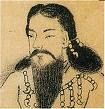
-581 Suizei (-632 to -549), 3rd son of Jimmu becomes Yamato emperor #2 of Japan (until -549).
-580 The 50th Olympiad. In the spring the biannual (1st and 3rd years of the Olympiad) Isthmian Games at the Temple of Poseidon in Corinth are founded. Malchus becomes king of Carthage (until -550), who goes on to conquer almost all of Sicily. About this time the Spartans under Pentathlus attempt to colonize W Sicily, and are defeated by the Elymians and Carthaginians. Births: Greek philosopher-mathematician Pythagoras of Samos (d. -497) in Samos, Ionia; pupil of Anaximander, going for the air or ether is the arche theory.
-578 Traditional date of the beginning of the reign of Roman Etruscan king Servius Tullius (d. -534) of Latin servile descent, the next-to-last Etruscan king of Rome, who frames a new Servian Constitution and enlarges the boundaries of the city of Rome; after the plebs begin acquiring wealth and property and get a bad disease of lust for powah, the Servian Reforms let them serve in the army, with rank based on wealth, and the army reorganized into five classes and 193 centuries based on wealth - did you get that memo?
-576 The 51st Olympiad.
-575 Hippocratidas dies, and Agasicles (d. -550) becomes Eurypontid king of Sparta. The Tegean War between Sparta and Tegea begins (-ends -555).
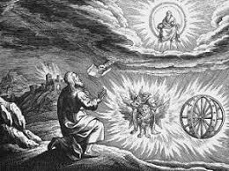
-574 On Apr. 10 Ezekiel's last of six oracles is recorded, about Ezekiel's Wheel, a wheel within a wheel, according to Ernst Kutsch - a UFO? Carthage becomes independent of Tyre.
-573 Nebuchadnezzar II conquers Tyre after a 13-year siege (begun -586), during which the heads of his soldiers are made bald from the chafing of their brain buckets (helmets), and their shoulders are rubbed bare from carrying construction materials; the city is put under Babylonian-dominated judges (sufetes) (until -564), starting with Baal (Baalu) II (d. -564).
-572 The 52nd Oympiad. Births: Greek Athenian Alcmaeonid statesman ("Father of Greek Democracy") Cleisthenes (Kleisthenes) (Clisthenes) (d. -485) in Athens; maternal grandson of tyrant Cleisthenes of Sicyon.
-571 Zhou Jian Wang dies, and Zhou Ling Wang (d. -544) becomes Dong Zhou king #11 of China.



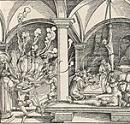
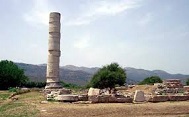
-570 After they begin invading Libya, Pharaoh Apries sends an army against the Dorian Greek city of Cyrene, and it is soundly defeated, the news causing a civil war to break out between native troops and foreign mercenaries, after which Apries flees, and gen. Ahmose (Amasis) II ("the Moon is born, son of Neith") (d. -526) (victorious gen. in the -592 Nubian invasion) becomes king #5 of the 26th Dynasty, and the last great pharaoh of Egypt before the Persians swallow it up. After turning his job of building a temple of Zeus Atabyrius in the citadel into an excuse to seize power, Phalaris (d. -554) becomes tyrant of Acragas (Agrigentum) in Sicily, ruling with an iron hand, building up, strengthening and providing water to the city, and pursuing imperialist expansion, going on to take over the whole island of Sicily, starting with Himera in the N; an epicure, he enjoys eating suckling babies; after brassmaker Perillos of Athens proposes it to him, Phalaris builds the brass Sicilian Bull (Bull of Phalaris), which he uses to roast criminals to death while a complex piping system turns their cries into the bellowing of a bull, while the fire is stoked with fragrant incense; after it is reopened, the scorched bones supposedly shine like jewels and are made into bracelets; guess who is the first victim, you guessed it, Perillos. Pisistratus (Peisistratos) (Peisistratus) (-605 to -527) of Athens (a relative of Solon) begins a war against the Megarians (ends -565), making him a military leader with political ambitions. Architecture: The Heraion of Samos, a temple of Hera is built in Samos by architect Rhoikos, lasting only a decade before being destroyed by an earthquake, becoming the first Ionic temple built in Ionia, the SW coast and islands of Asia Minor settled by Ionian Greeks, spreading to mainland Greece by the 5th cent. B.C.E. Inventions: About this time Greek philosopher Anaximander of Miletus (-610 to -546) constructs the first known geographical and star charts. About this time the Persians develops their own Persian Cuneiform, consisting of 36 mainly alphabetic characters and a word divider (ends -370). Births: Greek Ionian philosopher-theologian-poet (early monotheist) Xenophanes of Colophon (d. -470) in Colophon; spends most of his life traveling the Greek world; teacher of Zeno of Elea? Deaths: Greek lezzie poet Sappho (b. -630) in Mytilene (suicide by jumping off the Leucadian Cliffs for love of ferryman Phaon?); leaves 10K lines of poetry, which were preserved in Alexandria in 8 vols.; onl 650 lines survive.
-568 The 53rd Olympiad. Aeropos I dies, and Alketas (d. -540) becomes king of Macedonia. Deaths: Greek gen. Pittacus of Mytilene (b. -640).
-567 The Saites defeat another Babylonian invasion of Egypt led by ex-pharaoh Apries, who is KIA, and Ahmose II has his body buried in Sais with "full military honors", and marries his daughter Chedebnitjerbone II (Nitetis?) to legitimize his rule.
-566 The Panathenaic Games (Panathenaea) are founded in Athens, Greece, held every four years until the 3rd cent. C.E.
-565 Pisistratus conquers the island of Salamis from Megara, which boosts his political capital; he organizes the Diakrioi ("men of the hills"), a new party of small farmers, shepherds, artisans, and poor people based in the hill country of N Attica, competing with Solon's two factions of the Pediakoi ("men of the plains") and Paraloi ("men of the shore"), and begins a rise to powah in Attica.
-564 The 54th Olympiad. Baal II dies, and Yakin-Baal becomes the last independent king of Tyre; he is overthrown by an oligarchy, which sets up shoftim (judges), starting with Chelbes (d. -563).

-563 Chelbes dies, and Abbar (d. -562) becomes judge #2 of Tyre (until -562). Births: Indian sage Siddhartha (Sans. "siddha" + "artha" = achieved meaning) (d. -483) Prince Fo of the Sakya (Shakya) tribe of Kapilavastu and its Gautama (Gotama) clan (founded by Hindu philosopher Gautama in Lumbini, Shakya Repub. (Nepal); author of the Institutes of Gautama); later called the Buddha (Sans. "awake", "enlightened") (d. -483); before enlightenment under the Bodhi (Bo) Tree (a special old sacred fig tree of species ficus religiosa with heart-shaped leaves at the Mahabodhi Temple in Bodh Gaya, 62 mi. from Patna, Bihar, India) he is called Bodhisattva (Sans. "one destined for enlightenment").
-562 Nebuchadnezzar II dies, and his son Evil-Merodach (Amal-Marduk) (Amel-Marduk) (d. -560) (2 Ki. 25:27, Jer. 52:31) becomes king of Big Bad Babylon (until -560); the Jehovah's Witnesses insert a 20-year gap between the rule of this king and Nabonidus (-555). Abbar dies, and Mattan III and Ger Ashthari become judges #3 and #4 of Tyre (until -556).
-561 The first documented case of power of attorney is in Babylon between two brothers.
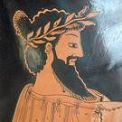

-560 The 55th Olympiad. About this time the earliest Hebrew scrolls of the Bible (Gr. "ta biblia" = little library) are written, backdated as far as 1,500 B.C.E.?; "40 independent authors, representing 20 occupations, living in 10 countries during a 1,500-year span, working in three languages, with a cast of 2,930 characters in 1,551 places... This massive volume covers every conceivable subject, expressed in all literary forms - prose, poetry, romance, mystery, biography, science and history" (Terry Hall); the Jewish identity is formed around this little library of books - the hardest years, the darkest years, the wildest years, the hottest years? Alyatttes dies, and the enormous tumulus Tomb of Alyattes is erected for him in Sardis; his son Croesus (d. -546) becomes king of Lydia, becoming known for his great wealth, going on to subjugate the Greek Ionian colonies and Bithynia, controlling all of Asia Minor W of the Halys River except Cilicia and Lycia, bringing Lydia to its apex; pure gold coins are minted by him for the first time; his gold refining workshop at his capital of Sardis is uncovered in 1964-8 by a team of Harvard and Cornell U. archaeologists led by Russian-born George Maxim Anossov Hanfmann (1911-86) and Albert Henry Detweiler (1906-70). Pisistratus seizes the Acropolis, expels Megacles and the rich aristocratic Alcmaeonids from Athens (until -554), and is elected ruler of Athens, becoming a people's choice best in show tyrant, founding the Peisistratid Tyranny (ends -510), which becomes known for founding great festivals. Evil-Marodach is murdered by his sister's husband, and his son-in-law Neriglissar (Nergal-Shar-Usur) (d. -556) becomes king of Babylon (until -556). Leon dies, and Anaxandridas II (d. -520) becomes Agiad king of Sparta. About this time Corsica is colonized by Greek (Phocaeans) from Ionia. About this time Heraclea Pontica at the mouth of the Lycus River on the coast of Bithynia in Asia Minor is founded by the Greek city-state of Megara, and named after Heracles (Hercules), who they believe entered the underworld at a cave on the adjoining Archerusian Promontory on Cape Baba; the city subjugates the native Mariandynians and agrees not to sell them into slavery outside their homeland, and extends its control along the coast E to Cytorus, going on the found Black Sea colonies in Cytorus, Callatis, and Chersonesus; the city is broken by the Mitridatic Wars (-88 to -63). Nonfiction: The two Books of Kings cover Jewish history from Solomon (970 B.C.E.) through this year. Deaths: Greek fable king Aesop (b. -620) in Delphi (executed for embezzlement?): "God helps those who help themselves"; leaves Aesop's Fables (Aesopica), which are first pub. in Greek about -300 by Demetrius Phalerus, and in Latin about -25 by Phaedrus; incl. The Fox and the Grapes, The Tortoise and the Hare, The North Wind and the Sun, and The Boy Who Cried Wolf.
-559 Persian King Cambyses I, son and successor of Teispes marries the daughter of Median king Astyages, and his son Cyrus II the Great becomes a cmdr. in the Median army.
-558 Pisistratus is reelected ruler of Athens. Deaths: Athenian lawmaker Solon (b. -638); leaves the Story of Atlantis, picked up in the Egyptian city of Sais from the priests, about an island off the Pillars of Hercules (Heracles) that was populated by a golden race, but went bad and began attacking Egypt, and was saved by the Athenians, after which it was destroyed by earthquakes and floods, and was swallowed up in one day and night; too bad, he says this happened 9K years ago, not 900 when the volcanic island of Thera (Santorini) exploded: "Before he dies, call no man happy - he is at best but fortunate."
-557 The Qi kingdom eliminates the Lai Yi.


-556 The 56th Olympiad. Cambyses I dies, and his son Cyrus II the Great (d. -529) becomes king of Persia, and builds his capital of Pasargadae near modern-day Shiraz in SC Iran (50 mi. N of Persepolis). Neriglissar dies, and his son Labashi-Marduk becomes king of Babylon, but reigns only 3 mo. before being killed by his friends, who elevate grass-eating Nabonidus (Nabu-Na'id) (d. -539) in his place next year. Baal-Eser III (d. -555) becomes judge #5 (last) of Tyre (until -555). Births: Greek lyric poet (inventor of the Memory Palace) Simonides of Keos (Ceos) (d. -468) on Keos (Ceos).
-555 Sparta defeats Tegea after a difficult war (begun -575), making it into a subject ally with nominal independence but obligated to supply troops and follow its foreign policy; Sparta creates the Peloponnesian League, an alliance which eventually incl. all the states in the peninsula except Achaea and Argos; each member contributes two-thirds of its military forces in war under Spartan leadership, and has a vote in foreign policy decisions; Spartan King Anaxandridas II leads a campaign which overthrows the tyrant of Sicyon (Sikyon) (the big sicy?); Spartan politics are dominated by the ephors (chief magistrates), led by Cheilon. King Croesus of Lydia captures Ephesus, moving it from Mt. Pion to a level region to the E; he begins a major reconstruction of the Temple of Artemis (finished -430). Births: Athenian gen. Miltiades (d. -489); member of the prominent Philaid family. Deaths: Greek poet Stesichorus (b. -630).
-554 Megacles and the Alcmaeonids return and drive Pisistratus out of Athens (until -541), and Pediakoi (rich aristrocrat party) leader Lycurgus is elected ruler of Athens; Pisistratus goes to Euboea (Evvoia) off the E coast of Greece, and winds up in Thrace, where he gets rich from mining. Phalaris, tyrant of Acragas is overthrown by Telemachus, ancestor of tyrant Theron, and executed in his own brass Sicilian bull.
-553 Nabonidus conquers Edom. Cyrus II of Persia leads a revolt against his grandfather Astyages of Media (ends -549).
-552 The 57th Olympiad. Nabonidus conquers N Arabia and relocates to the oasis of Tema (Teima) in the Arabian desert SE of Edom, remaining there for 10 years while creating military and trade posts; his son Balshazzar (Balshezer) (Bel-Shar-Usur) (d. -539) rules as regent.

-551 The monarchy is restored, and Hiram III (d. -532) becomes king of Tyre (until -532). The period of the One Hundred Schools of Thought begins in China (ends -221), in which all the major schools of Chinese thought are founded - compare, bundle, and save? Inventions: The Diatonic Musical Scale is invented in Greece; Lasos of Hermione discovers that vibrations are the basis of sound. Births: Greek artist Exekias (d. -525) in Athens. Chinese sage ("Confucius Say") Confucius (K'ung Fu-tzu) (Fu-tse) (Kong Fuzi) (Master/Teacher Kong) (Kin Chung Ni) (d. -479) on Aug. 27 (Sept. 28) in Qufu.
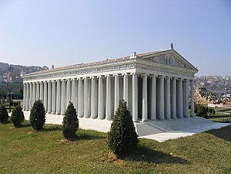
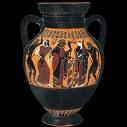
-550 Agasicles dies, and his son Ariston (d. -515) becomes Eurypontid king of Sparta. After open war breaks out between the Greeks and an alliance of the Etruscans and Carthaginians, the latter under Carthaginian king Malchus campaign successfully against the Greeks in Sicily; Mago founds a new dynasty that dominates Carthage until the 4th cent. B.C.E. Waqahil Yafush (d. -530) becomes king of Inabba in S Arabia. About this time the 12-16 Mahajanapadas ("great kingdoms") are founded in N India (ends -322). The city of Verona (Veronia) in the Po River Valley of N Italy is ceded by the Euganei ("well-born") to the Cenomani Gauls. About this time the city of Thebes in Boeotia in EC Greece (44 mi. NW of Athens), allegedly founded by Cadmus (Kadmos) (Gr. "from the east") (son of King Agenor of Tyre and brother of Europa, Phoenix, and Cilix, and inventor of the Phoenician alphabet) from troops created out of dragon teeth (while he ultimately turns into a serpent?) (causing its acropolis to be called Cadmeia) forms the Boeotian League and begins absorbing the smaller city-states around it, incl. Orchomenos (Orchomenus) to the NW (Lake Copeis), Thespiae, and 12 others (14 total), creating a major player between Attica on the S and Phocis on the W and NW. About this time the Seven Sages (Wise Men) of Greece (Greek Antiquity), with their "pithy and memorable dicta" posted on the wall of the Temple of Delphi as dedications to the god Apollo are retroactively created in a literary hall of fame: Solon (Gr. "wise") of Athens (-638 to -558) ("Nothing in excess"), Chilon (Chilo) of Sparta (-600s) ("Know thyself"), Thales of Miletus (-624 to -547) ("To bring surety brings ruin"), Bias of Priene (-600s) ("Too many workers spoil the work") ("Most men are bad"), Cleobulus (Cleobulos) of Lindos (-600s) ("Moderation is the chief good"), Pittacus of Mitylene (-640 to -568) ("Know thine opportunity"), Periander of Corinth (d. -587) ("Forethought in all things"); alternates incl. Myson of Chen (Chenae) (Khenai) (-600s) and Anacharsis (-600s) (from Scythia). Architecture: The Temple of Artemis (Diana) (Artemision) in Ephesus (Asia Minor) on the Ionian coast is begun by Lydian King Croesus and Greek Cretan architect Chersiphorn of Knossos and his son Metagenes, becoming one of the Seven Wonders of the Ancient World, evolving into the best little whorehouse in Asia Minor? - the original Charles and Diana? The Greeks build a temple of Athena and temple of Hera in Paestum in S Italy about this time. Art: The Painter of Berlin 1686 decorates vases and amphorae with the black figure technique in Athens. Births: Greek historian (1st) Hecataeus of Miletus (d. -476) (d. -490?) in Miletus; born to a wealthy father named Hagesandrus; named after the goddess Hecate; first to attempt to distinguish myth from historical fact, although he accepts Homer as an authority; first to use the term Celts. Greek gen. (victor of Marathon) Miltiades the Younger (d. -489); step-nephew of Militiades the Elder (d. -524).
-549 On May 10 emperor (since -581) Suizei (b. -632) dies, and Annei (-577 to -511) becomes Yamato emperor #3 of Japan (until -511). Median king Astyages loses the army and then Ecbatana, and is deposed and killed by his grandson Cyrus II the Great (d. -529), who becomes emperor of Persia and Media, founding the Achaemenid (Achaemenian) (First Persian) Dynasty (ends -330); he goes on to conquer Sogdiana in C Asia between the Jaxartes (Syr Darya) and Oxus (Amu Darya) Rivers. Births: Persian king (-522 to -485) Darius (Darayavaush) (Pers. "upholder of goku", "maintains possessions well") I Hystaspis (the Great) (the Lawgiver) (d. -485) (pr. dah-RYE-us); son of Hystapes; grandson of Arsames.
-548 The 58th Olympiad. King Croesus of Lydia defeats Cyrus II the Great at the Battle of Pteria in Cappadocia on the site of ancient Hatti - where are all these histrionics leading?
-547 Cyrus II the Great conquers Phrygia, then outmaneuvers, defeats and captures King Croesus of Lydia at Sardis, causing him to commit suicide next year, after which Lydian noble Pactyas takes the throne and continue resistance; according to Herodotus (Bk. 1), the Oracle of Delphi predicted that retribution for the crime of King Gyges would come in the 5th generation. Deaths: Greek philosopher Thales of Miletus (b. -624); leaves Thales' Theory of Geometry and Thales' Intercept Theorem, becoming the first true mathematician who discovers a mathematical theorem and uses deductive reasoning to derive corollaries (four); helps the Egyptians measure the height of the pyramids; predicts an eclipse.
-546 Midas couldn't take it with him? Pactyas of Lydia is defeated, ending the Phrygian Kingdom and Lydian Kingdom; Persia learns to mint gold coins from captured Lydians; Persia divides Asia Minor (pop. 4M, incl. 250K Greeks) into four satrapies: the coastal satrapy, consisting of Lydia (incl. Bithynia), Mysia and the W coast cities (incl. Ephesus), ruled from Sardis; Phrygia, extending to the Halys River, ruled from Daskylion; Cilicia, ruled from Adana; Cappadocia, ruled from Mazaca; the 1677 mi. Persian Royal Road connecting Sardis to Susa is built - Greece is next on the Persian menu? Deaths: Greek philosopher Anaximander of Miletus (b. -610).
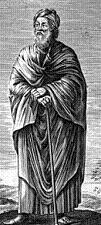
-545 About this time Greek philosopher-poet Xenophanes of Colophon (-570 to -470) leaves his home town of Colophon in Asia Minor and becomes a wandering poet-minstrel in Greece and Sicily, settling in Elea in S Italy in -536 for awhile and joining and/or co-founding (with Parmenides of Elea) the Eleatic School of Philosophy, which ridicules polytheism and pushes pantheism, dissing Homer for his anthropomorphic gods, with the famous soundbyte that if oxen could paint and sculpt they'd depict gods who look like oxen, espousing a belief in a supreme God that is non-mortal and eternal and doesn't intervene in human affairs; he reduces the world to the qualities of wet and dry (water and earth), dissing Anaximenes and his air theory by noting from his examination of fossils that water once covered the Earth, differentiating belief from knowledge; his pupil Parmenides of Elea (-515 to -445) carries on his work.
-544 The 59th Olympiad. Sparta and Argos fight the Battle of the 300 Champions, each side picking 300 hoplite champions to fight to the death to decide control of the plain; after neither side accepts the result, the armies go at it, and the Spartans win, reducing Argos' regional power - what did they have for breakfast? Zhou Ling Wang dies, and Zhou Jing Wang (d. -519) becomes Dong Zhou king #12 of China. Births: Chinese sage Sun Tzu (d. -496).
-541 Pisistratus defeats the aristocrats of Euboea with the help of Thebes and Argos, then lands at Marathon in Attica, and marches on Athens, while his partisans from the countryside swell his ranks, then defeats his opponents at the Battle of Pallene in Chalcidice, going back to being dictator of Athens until death (-527), while giving lip service to Solon's constitution for the best of both worlds; for 17 years he sets up a mini-golden age, having the first written ed. of Homer's poems prepared for recitation at the ramped-up annual festival of Panathenaea, and commissioning many classic bldgs., incl. the Lyceum and temples to Athens, Apollo and Zeus; a people-pleaser, he confiscates the lands of his opponents and distributes them to the hektemoroi ("sixth parters") (serfs), introducing the Boeotian-based Cult of Dionysus to reduce the power of the hereditary priesthoods of the aristocrats; he sends Miltiades to recover Sigeum at the entrance to the Hellespont and establish a tyranny over Thracian Chersonese (modern-day Gallipoli), which controls the passage between Europe and Asia; he "purifies" the big-deal (center of the Cyclades) island of Delos of an Ionian religious league to extend his control into the Cyclades; originally a floating island, Zeus (father of the gods) fastened Delos to the bottom of the sea so that his mother Leto, daughter of the Titan Coeus, whom his wife Hera was jealous of could have a safe haven to give birth to two more divine rugrats (equal to him?), Apollo (god of music, light and medicine) and Artemis (goddess of the moon and wildlife) - the good, the bad, and the ugly?

-540 The 60th Olympiad. Nabonidus returns from Arabia to fight the Persians; Gobryas, Babylonian gov. of Assyria deserts to the Persians; when the Persians attack, the people revolt against Nabonidus and he has them slaughtered; Sippar falls to the Persians without a fight, and Nabonidus flees. Alketas dies, and Amyntas I (d. -498) becomes king of Macedonia. Births: Greek dramatist-philosopher ("the Prince of Comedy" - Socrates) (first comic writer?) Epicharmus of Kos (Comicus) Syracusanus (d. -450).
-539 On Oct. 6 (Oct. 12?)(Oct. 29?) after strange Handwriting on the Wall, "Mene, Mene, Tekel, Upharsin (Parsin)" (Eenie Meenie You'll Tackle a Persian?) (Eenie Meenie Miney Moe, Listen Balshazzar, Out You Go?) allegedly appears on the wall of his court during a "great feast for a thousand lords" where he "drank wine in front of the thousand", overconfident Babylonian co-king (with Nabonidus) Balshazzar (Belshazzar) ("Bel, protect the king") ignores the "numbered, numbered, weighed and divided" interpretation of captive Jewish prophet Daniel that Jehovah has decided to have the Medes and Persians axe him, and yada yada yada (Daniel, Ch. 5; after diverting the Euphrates so it no longer can act as a big moat, Gobyrus and his warriors find the giant double-leaved main doors in the 300-ft.-high wall open, and enter party-pooped Babylon in the wee hours unopposed, then Cyrus II the Great's Medes and Persians (assisted by the Scythians) conquer it and level it by fire, incl. the Hanging Gardens (only burnt crumbs remain on the plate?); Nabonidus is captured and sent into exile; Balshazzar is KIA at the Battle of OpisN of Babylon on the Tigris River; Phoenicia is (bloodlessly?) absorbed into the Persian-Median Empire as the 5th satrapy, with admin. center at Tripolis, and vassal kings in Sidon, Tyre, Arvad, and Byblos; N Arabia is absorbed (until -331); the Persians rule Babylonia until -331; never again will Mesopotamia be an independent political entity?

-538 As one of his first acts after conquering Babylon last year, monotheist Zoroastrian Persian king Cyrus ("Sun", "throne") II the Great (-600 to -529) issues an edict (2 Chron. ch. 36) granting his exiled fellow monotheist subjects the Jews the right to return to Israel after 50 years of Babylonian captivity, contributing treasure to help rebuild the Temple of Jerusalem (Solomon); the Bible book of Isaiah Chap. 44 and Isaiah Chap. 45, allegedly written 200 years earlier predicts the capture of Babylon by Cyrus, the draining of the Euphrates (44:27), the gates being left open (45:1-2), and even calls him by name (45:1) and describes him as the Anointed (Messiah)?; 42K-50K (42,360?) Jews from the tribes of Judah and Benjamin return (the Aliyah of Zerubavel), settling in the Persian province of Yehud (Judea), but the majority stay (cooler summers?); the first wave of 1K young Jews is known as Sheshbazzar's Aliyah, the 2nd wave of 42,360 is known as Zerubbabel's Aliyah; the Karaites (Heb. "mikra" = scripture) migrate to the Crimea (Black Sea), where they later adopt Turkish customs and language but remain Jews, reject the rabbinical oral Torah, and never throw a Bible manuscript away (see 1859 C.E.); Jewish leader Mordecai is among the leaders of the returning Hebrews, but not necessarily the same Mordecai who is the cousin of Esther in Isfahan (Ezra 2:1-2, 2:5-7).
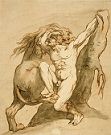

-536 The 61st Olympiad sees famous Greek athlete Milo of Croton (Crotona) (-552 to ?), who won the boys' wrestling event in the last Olympics win the men's wrestling event for the first of 5x, becoming the source of all kinds of manly stories, incl. training by carrying a newborn calf on his back every day and working up to a 4-y.-o. cow, or holding his arm out with fingers outstretched and challenging anyone to pull his finger, er, sorry, that's Babe Ruth, bend his little finger. Greek tragedian Thespis of Icaria invents Tragedy (Gr. "tragos" = goat, the sacred animal and symbol of wine god Dionysus AKA Bacchus) at the festival of the Greater Dionysia; it eventually develops the elements of Hamartia (fatal flaw, of which hubris is a favorite), Nemesis, and Catharsis - thespian jokes here?
-535 The Carthaginian-Etruscian alliance crushes the Phocaean Greek settlers from Corsica in the naval Battle of Alalia off the coast of Corsica. Theline in S France (Gaul) is captured by the Celtic Salyes (Salluvii) Tribe, who rename it Arelate (Arles), and occupy the plain S of the Druentia (Durance) River between the Rhone River and the Alps. Traditional date of the reign of Roman (Etruscan) king #7 (last) Lucius Tarquinius Superbus (AKA Tarquin the Proud) (d. -495) (rules until -509). Confucius gains a local govt. position, shows ability in the settling of disputes, and formulates the negative Golden Rule (Don't do to others what you wouldn't want them to do to you, or Watchit). Births: Greek philosopher ("Dark or Obscure Philosopher") (dark clothing) ("Weeping Philosopher") Heraclitus (d. -475) in Ephesus; Greek philosopher of the Logos, and Mr. Fire Is the Source of All Things; adds the concept of becoming to that of being, and holds virtue to consist in subordinating the individual to the laws of society, as long they are based on a universal and reasonable harmony.
-534 Massalia defeats Carthage, limiting Carthaginian influence in the NW Mediterranean. Gen. Darius Hystaspes (later King Darius I), a big fan of Ahura Mazda leads his Persian army across a floating bridge on the Bosporus Strait to subjugate the pesky Scythians. The city of Felsina (modern-day Bologna) in Italy at the foot of the Apennines (50 mi. NE of Florence in the Po River Valley between the Reno and Sevana Rivers) is founded by Etruscan colonists in an area previously inhabited by the farmer-shepherd Villanovians. Thespis introduces the first speaking actor into a tragedy.
-533 Gautama abandons his wife and newborn first son as they sleep, flees past the sleeping female minstrels, and rides off into the night to get enlightenment, becoming a yellow-robed shaved-head pauper with a begging bowl and a placard saying, "Ex-prince needs to eat too" - impotent at what age?
-532 The 62nd Olympiad.


-531 Deaths: Chinese philosopher Lao-Tzu (b. 604); dies after founding Taoism (Daoism); leaves the Tao Te Ching (Dao De Jing), which incl. worship of the blue-skinned bird-headed thunder god Lei Kung; "A journey of a thousand miles must begin with a single step"; "The greater the number of laws and enactments, the more thieves and robbers there will be."

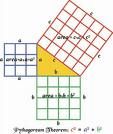



-530 Shut your pi hole and do your math homework? About this time after traveling to Egypt and learning the doctrines of the Egyptian priests, Greek Ionian philosopher (pupil of Anaximander, going for the air or ether is arche theory) Pythagoras (-580 to -497) is driven from Samos by tyrant Polycrates, and founds his mystical philosophical sect in Italy's Toe City Croton (Crotona), teaching reincarnation, numerology, and dietary restrictions (no beans), and gaining the support of superstar athlete Milo of Croton after claiming to be a reincarnation of Trojan War soldier Euphorbus; although he leaves no writings, his school discovers the Pythagorean Theorem and raises math to a science, considering Number to be the ultimate principle of the Universe, and believing the Earth to be a globe revolving with the planets (incl. the Sun) around a central fire, separated from each other by intervals corresponding to the harmonic lengths of strings, which play the Music (Harmony) of the spheres, with the incantation: "Ace choired plus bees choired e-quills seas choired"; Pythagoreans don't eat beans because they make bad music?; About this time Pisistratus founds the Festival of the Greater Dionysia in Athens, held at the end of Mar. each year to honor Dionysus Eleuthereus, who had been introduced to Athens by the village of Eleuterae; besides the usual parades and sacrifices, three tragic poets present tragedies on a single theme plus one satyr (burlesque) play, with a prize awarded to the best, after which a comedy competition is introduced in -486. Art: A fresco painted on the Tomb of the Augurs in Tarquinia shows how the Etruscans dress in dresses. The Monteleone Chariot is made by the Etruscans, and ends up in the New York Metropolitan Museum in modern times. Exekias (-551 to -525), Achilles and Ajax Playing Checkers (painted vase). Births: Greek Athenian statesman gen. Aristides the Just (d. -468). Greek Pythagorean philosopher Hippasus of Metapontum (d. -450) in Megapontum; discoverer of irrational numbers.
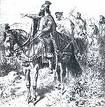

-529 Cyrus II the Great dies after conquering 2M sq. mi., incl. the Median Empire, Babylonia, Assyria, Syria, Palestine, the Indus Valley, and S Turkestan; he is succeeded by his cruel inhuman drunken son Cambyses (Kambujiya) II (d. -522) (Ahasuerus of the Bible) as king of Persia; the Tomb of Cyrus II in Pasargadae is built (discovered in 1951 C.E.).
-528 The 63rd Olympiad. Deaths: Greek philosopher Anaximenes of Miletus (b. -585) - he got jets and the girl?


-527 Confucius' mother dies, profoundly affecting him and causing him to resign his public office and mourn at her grave for the next 27 mo. - are all Confucians mamma's boys? Pisistratus (b. -605) dies, leaving sons Hippias (d. -490) (elder) (future traitor) and Hipparchus (d. -514) (younger), AKA the Pisistratidae, who are both elected tyrants of Athens (until -510). Deaths: Athenian tyrant Pisistratus (b. -605).
-526 Amasis III dies, and Psamtik (Pstamtek) III becomes king #6 (last) of the Egyptian 26th Dynasty, ruling for 6 mo. After seven years of searching for the cause of evil and suffering, Gautama sits down under a bo (pipal or sacred fig) tree (Ficus religiosa) at Gaya for 4-7 weeks, finally receiving enlightenment and becoming the Wise Bud Weiser, er, Buddha, and shaving his head in obedience to a divine command; his first speech in a holy park in Varanasi nets him five disciples, who also shave their heads (which definitely sets them apart from Jewish priests, who are commanded not to shave their heads in Lev. 21:5) - tastes great, less filling, beechwood-aged Shaved Bud?
-525 In May after Cambyses II kills his brother Smerdis (Bardiya) to ensure the throne of Persia, but makes a big mistake by keeping it secret, then leads a campaign to capture Egypt, the last remaining independent kingdom in the East, which is just too sexy for him to pass up, he defeats the Egyptians at the Battle of Pelusium, causing them to retreat to Memphis and surrender after a siege; Cambyses II gets on his horse before Peluseum and tosses cats (their sacred animal) into the air to taunt them (were they those Egyptian Mau cats with gooseberry green eyes?); Psamtik III is captured and carried off in chains to Susa to be executed; Egypt down to but not incl. Meroe is conquered by the Achaemenid Persians, who destroy many Egyptian temples and establish the get-down Twenty-Seventh (XXVII) (27th) Dynasty (First Egyptian Satrapy), which rules Egypt with an iron hand as a satrapy (until -404), beginning the First Persian Occupation (ends -404); foreigners dominate Egypt for the next 2.5K years (until 1952); an unsuccessful attempt is made to conquer the Kushite kingdom of Meroe at the Sixth Cataract; too bad, a sandstorm in the W Egyptian desert buries 50K Persian warriors sent to attack the oasis of Siwa and destroy the oracle at the Temple of Amun, whose priests refuse to accept his claims to rule Egypt; their remains are found in 2010; they really were ambushed and defeated by Egyptian rebel leader Petubastis III?; the same oracle later confirms that Alexander the Great is the divine son of Zeus (Amun) in -332. Cleisthenes (-572 to -485) becomes chief archon of Athens. Births: Greek tragedian ("Father of Greek Tragedy") Aeschylus (d. -456) in Eleusis.
-524 The 64th Olympiad. Miltiades succeeds his uncle as ruler of Chersonesus Thracia (modern Gallipoli). The Spartans support an unsuccessful attempt to overthrow Polycrates, tyrant of Samos, and go on to work for the overthrow of any and all other tyrants within their reach (until -510). Cumae in S Italy is attacked by a coalition of Etruscans and other tribes, and Syracuse helps Cumae throw them off, but at the expense of becoming dependent on them. Confucius breaks off his mourning, leaves his wife and son, and becomes a traveling teacher journeying through China - this child is not coming anywhere near me with anything sharp?
-523 Cambyses II abandons plans to attack Carthage after his Phoenician mariners refuse to fight their brothers - without love where would you what?

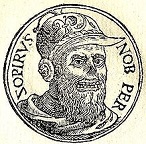

-522 After Sparta deposes the tyrant of Naxos, the Magian (Persian subject people) Artaxerxes (Bardiya) (Gaumata), claiming to be Cambyses II's brother Bardiya (who nobody knows is dead except Cambyses II) claims the throne for 7 mo., until the news reaches the real Cambyses II, pissing him off and causing him to gather his army in Egypt and head for Persia; too bad, he dies in the summer while camped in Syria either by suicide or by an accident while mounting a saddle; in Oct. Nebuchadrezzar III (Nabu-Kudduri-Usur) (real name Nidintu-Bel), claiming to be the son of Nabonidus seizes the Babylonian throne until Dec., when Gen. Darius (Darayavaush) I the Great (-549 to -485) defeats him on the Tigris River; meanwhile Gaumata is executed by six nobles in Nisaia in Media, then allegedly receives a favorable oracle declaring him king and assumes the throne (even though he is from another branch of the Achaemenid family, and his father and grandfather are still alive); meanwhile 4 days later revolts begin in Assina in Elam and Nidintu-Bel in Babylon, spreading to Persia itself after Vahyazdata, another Bardiya pretender pops up, causing Darius I to marry Cambyses' wife-sister Atossa to solidify his claim, then win 19 battles in one year to solidy his reign, after which he goes on to reorganize the admin. and establish the first (20) Persian satrapies, and codify the laws for the sprawling empire of 20 countries, which eventually incl. the former realms of the Egyptians, Chaldeans, Ionians, Persians, and Medes, and stretches from the Mediterranean to the Indus Valley, and S into Africa (Libya), becoming the largest ever, with a pop. of 15M-16M, incl. 4M in Persia; royal residences are at Susa (at the E end of the Persian Royal Road, which runs through Gugamela and Harran to Sardis in Lydia), Persepolis (in S Persia 200 mi. SE of Susa), Ecbatana (100 mi. N of Susa) and Babylon (100 mi. W of Susa); Armenia is the 13th Persian satrapy; he introduces a standard gold coinage, the Achaemenid Daric to go with the silver Siglos, becomes the first emperor in Europe, trying to portray himself as backed by God, protecting the weak and meting out justice; Darius I brings Egypt under his rule, and order the finishing of the canal linking the Nile River at Bubastis with Suez, allowing his ships to sail through the Red Sea by Saba to Persia, making it wide enough for two triremes to pass each other with extended oars, with a 4-day time of passage (cry me a river?); Darius I orders the construction of the new capital city of Persepolis in the S Zagros Mts. in SW Persia (NE of modern-day Shiraz); he erects the Behistun Rock, a commemoration of his achievements in three parallel sets of Old Persian, Elamite, and Akkadian cuneiform (413 lines), placed prominently on the way into the city, harping about his being the lawgiver and justice dispenser, and portraying him holding a bow (symbol of wisdom and strength), becoming the first political billboard and political logo?; in modern times it becomes the Rosetta Stone for cuneiform. After Babylon revolts against Darius I, Persian nobleman Zopyrus defaces his face, has himself whipped, and with Darius I's approval goes to Babylon and palms himself off as an abused deserter-exile, rising to CIC of the army, allowing him to set the city up for reconquering by Darius I, receiving honors and getting created a satrap.
-521 In Aug. Nebuchadrezzar IV (Nabu-Kudduri-Usur) (real name Arakha), an Urartian claiming to be the son of Nabonidus seizes the Babylonian throne and rules until Nov. before being defeated and impaled - he tried to grab the southwest by the bottle?

-520 The 65th Olympiad. The building of the Jewish Second Temple in Jerusalem begins in earnest under Jewish prophets Haggai and Zechariah, working with Jerusalem gov. Zerubbabel and high priest Yeshua (Joshua) (yes, Jesus); local opponents petition Darius I the Great to have the work stopped (Ezra ch. 5-6), but Darius responds with a decree calling on his imperial officials to support the work based on Cyrus' earlier royal decree, which can never be revoked. Carthaginian seaman Hanno of Carthage explores the W coast of Africa with a fleet of 60 ships, sailing through the Straits of Gibraltar and founding seven colonies in Morocco, visiting modern-day Sierra Leone, and finding the natives hirsute and savage, capturing three females who are so ferocious that they have to be killed, their skins preserved and kept in the Temple of Tannit, surviving until the Romans destroy Carthage in 146 B.C.E.; they call the people "Gorillae", causing 19th cent. Euro explorers to name man-sized apes after them. Anaxandridas II dies, and Cleomenes I (d. -490) becomes Agiad king of Sparta, reasserting royal power and bringing the Peloponnesian League to its zenith. About this time an Attic black-figure Amphora of Aeneas and Anchises is created, showing Aeneas carrying his father Anchises from the ruins of Troy. Haggai (Heb. "festal") writes The Book of Haggai about this time? Births: Spartan Agiad king #17 Leonidas I (Gr. "lion-like") (d. -480); son of Anaxandridas II (d. -525).
-519 Plataea (in S Boeotia on the border with Attica) refuses to join the Boeotian League of Thebes, causing the Athenians to come to their aid, while Euboea allies with Thebes, starting a war (ends -506). Zhou Jing Wang dies, and Zhou Jing Wang (d. -476) becomes Dong Zhou king #13 of China. The Behistun Inscription of Darius I is created, mentioning Armenia as being under Persian rule (until -330). Births: Roman model aristocrat Lucius Quinctius Cincinnatus (Lat. "curly hair") (d. -430).

-518 Darius I orders the construction of the Great Palace of Persepolis, which is finished by Xerxes I and features a wide staircase leading to the apadana (audience hall) decorated with carved reliefs of subject peoples bringing tribute. Zechariah writes the The Book of Zechariah about this time? Births: Greek lyric poet Pindar (d. -442) in Cynoscephalae (near Thebes); of the aristocratic far-flung (Sparta, Thera, Cyrene) Aegeidae family; loses a poetry contest with Corinna of Boeotia, who advises him to "sow with the hand not with the whole sack"; is fined by the Thebans for the line "O splendid, violet-crowned, glorious Athens, famed in song, pillar of Hellas, city divine", causing the Athenians to compensate him, and Alexander the Great to spare his house when he sacks Thebes in -338.
-517 Milo of Crotona compiles a Training Log. :)
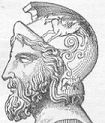
-516 The 66th Olympiad. Militiades the Younger (-550 to -489) seizes the Thracian Chersonese and becomes tyrant - is your makeup showing, guess what, those days are over? Architecture: Construction of the Jewish Second Temple is completed during the reign of Persian Achaemenid king #3 (-522 to -486) Darius I the Great (-550 to -486), 70 years after the destruction of the First Temple; Jehovah comes back to the holy of holies inside the new-improved Golden Arches, and the holy barbecuing resumes?; Aramaic, the language of the Aramean internat. land traders becomes the universal language of the civilized Western world by the time of Darius I the Great.
-515 Ariston dies, and Demaratus (d. -491) becomes Eurypontid king of Sparta. He Lu becomes the Duke of Wu. About this time (July -518?) Scylax of Caryanda, a Greek in the Persian navy is sent by Darius I to explore the coastlines of India and Egypt, spending 30 mo. and helping Darius I conquer the Indus River Valley. The city of Benghazi (Bengasi) is founded on the N African coast (modern-day Libya) by citizens of Cyrenaica (modern-day pop. 650K). Art: About this time the Euphronios (Sarpedon) Krater (one of 27 vases by Euphronius to survive to modern times, and the only undamaged one) is placed in an Etruscan tomb, and stolen in modern times, then smuggled out of Italy, where it ends up in the Metropolitan Museum of Art in New York City; in Feb. 2006 the museum agrees to return it to Italy in return for loans of other antiquities.
Births: Greek philosopher Parmenides of Elea (d. -445) in Elea, S Italy; co-founder (with Xenophanes) of the Eleatic School, which considers the real to be motionless, and distinguishes between belief and knowledge, influencing Plato.-514 Athenian aristocrats Harmodius and Aristogeiton attempt to assassinate tyrants Hippias and Hipparchus, but screw up and don't take out Hippias, causing him to become more tyrannical, imposing oppressive taxes, selling public offices, and executing anybody he suspects; the Alcmaeonidae (suspected plotters) flee from Athens, incl. poet Simonides of Keos (Ceos) (-556 to -468), who attaches himself to the ruling families of Thessaly, the Scopadae and Aleuadae, later returning to Athens and sucking up by lauding the Greek heroes of the Persian War. Births: Athenian gen., adm. and statesman Themistocles (d. -462).
-513 Miltiades accompanies Darius I on a Persian expedition against the Scythians, leading to an expansion into Europe.
-512 The 67th Olympiad. Darius I retreats to Sardis after being unable to force a decisive battle against the Scythians, then leads a great army across the Bosporus, subjugating E Thrace, getting Macedonia to submit voluntarily and making King Amyntas I a Persian vassal, then invading the Balkans and crossing the Danube River in order to pacify the nomadic tribes, making it to the steppes of the Ukraine (the Volga River, according to Herodotus) before satisfying himself that he has pacified the Wild West side of his empire. The Persians siege the Greek colony of Barcus in N Africa, tunneling under the city walls and intending to start an underground fire until the Greeks use a bronze shield placed on the ground to locate the tunnel, dig their own, and surprise the Persians, becoming the first known use of a speaker? With the help of Sun Tzu, He Lu eliminates the kingdom of Xu.
-511 A Crotonian army commanded by Olympic star Milo of Croton defeats the Sybarites; Milo dresses like Hercules in a lion's skin with a club. Phrynichus, a disciple of Thespis wins his first V in tragedy at the Greater Dionysia. On Dec. 6 emperor (since -549) Annei (b. -577) dies, and Itoku (-533 to -477) becomes Yamato emperor #4 of Japan (until -477). Deaths: Japanese Yamato emperor #3 (-549 to -511) Annei of Yamato on Dec. 6.
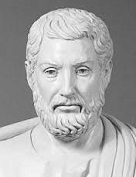


-510 Hippias of Athens (last Athenian tyrant) is overthrown by the Alcmaeonidae allied with the Spartans, and goes into exile along with his relatives at the court of Darius I of Persia, trying to talk him into invading Greece; the aristocrats, led by Isagoras are overthrown by the common people, headed by Athenian Alcmaeonid Cleisthenes (-572 to -485), who institutes a dem. reform of the constitution, making citizenship independent of clan, which shocks Spartan Agiad King Cleomenes I, who wants a pro-Spartan oligarchy, causing him to lead an expedition into Attica, which is foiled by fellow Spartan (Eurypontid) king Demaratus, compounded by the defection of Corinth; the Greek Archaic Period (begun -800) ends, and the Classical Age of Greece begins (ends -323), with Cleisthenes becoming known as "the Father of Greek Democracy". The Greek city of Sybaris in S Italy (Magna Graecia) is destroyed by the bean-no Pythagoreans who seize political control of Croton, and make use of internal dissensions in Sybaris to defeat it, sack it, and divert a river over its site; meanwhile Spartan leader Dorieus allies with Croton and tries to colonize W Sicily, but is killed by the Phoenicians and Segestans. End of the Black Figure Period, and start of the Red Figure Period of Greek Art (decorated pottery) (ends -330). Nonfiction: Sun Tzu (-544 to -496), The Art of War; the classic textbook - make wise choices, surround yourself with wise people, and sit at whose feet? Births: Spartan gen. Pausanias (d. -468); son of Cleombrotus, nephew of king Leonidas (-520 to -480), and member of the Agiad royal family of Sparta - the stuff of a hero? Greek philosopher Anaxagoras of Clazomenae (d. -428) (b. -500?) in Clazomenae (Klazomenae), Ionia, Anatolia; brings philosophy to Athens, making it the center; teacher of Socrates.



-509 It all starts with Shakespeare's Rape of Lucrece? After a cent. of rule by Etruscan kings (since -616), Lucius Junius Brutus (d. -509) leads a rebellion of the Roman aristocrats against Etruscan king Tarquinius Superbus (Tarquin the Proud), whose son outrages Lucretia, wife of Lucius Tarquinius Collatinus, causing her to commit suicide after telling her hubby, igniting Lucius's cousin Brutus to lead the outraged Roman people to overthrow the Etruscan monarchy and expel the Tarquins from Rome; Superbus spends the rest of his life whipping up Etruscan and Latin support for a comeback that never happens; the aristocratic Early Roman Repub. is founded (ends -264), a collection of Latin city-states dominated by 320 sq. mi. Rome, with patrician (top dog), pleb (plebeian) (commoner) (middle dog) and proletarian ("offspring") (low dog), and lower-than-a-dog slave classes below them, two elected (1-year term) sovereign consuls (magistrates) (praetors) (whose edicts have the force of law), an advisory Senate, which permits conscripti or enrolled pleb members, causing all senators to be called patres conscripti (conscript fathers), and a popular assembly; too bad that only patricians can become praetors, causing simmering pleb discontent; on Sept. 13 the Capitoline Temple of Jupiter-Juno-Minerva is dedicated. The first Roman consuls are Lucius Junius Brutus (praenomen, nomen, cognomen) and Lucius Tarquinius Collatinus, who are elected for 1-year terms (the beginning of a 1957-year chain); the Roman Repub. is weak at first, but after 200 years of war it controls most of the peninsula and starts its imperial push to make the whole world bow to it - why do they always send the poor?
-508 The 68th Olympiad. Cleisthenes institutes dem. reforms in Attica, creating 140+ townships (demes) to replace the phratries as the basis for citizenship, along with 10 tribes (phylai), with several (three?) demes comprising a third (trittys), and 10 trittys forming a region, and each tribe made up of one trittys from each region; Attica is divided into three regions, the city of Athens, the coast, and the interior; a Council (Boule) of 500, with 50 chosen from each tribe replaces the Solonian Council of 400, and its jurisdiction is increased to judicial and admin. matters, incl. impeachments, naval maintenance, and revenue control; the army is organized into ten tribal regiments; ostracism is introduced by Cleisthenes as a milder form of banishment? Etruscan king Lars Porsenna (Porsena) of Clusium allegedly attacks Rome in an unsuccessful attempt to restore Tarquin to the throne; Carthage signs a treaty with the new Roman state confirming Roman dominance of Latium. Roman consul Valerius Poplicola enacts the Lex Valeria, the "habeus corpus of Rome", stating that whenever the life or rights of any citizen are at stake there should be an appeal from the magistrates to the gen. assembly. Roman consuls: Publius Valerius Poplicola and Titus Lucretius Tricipitinus.
-507 After Isagoras invites the Spartans to invade Attica, Cleisthenes is expelled and the aristocracy restored, but the Athenian pop. rises up and drives the Spartans out and restores Cleisthenes. Roman consuls: Publius Valerius Poplicola and Marcus Horatius Pulvillus. Births: Athenian gen.-statesman Cimon (d. -449); son of Militiades and Hegesipyle, daughter of King Olorus of Thrace; relative of Thucydides through Olorus.
-506 Athens defeats Thebes, preventing it from forcing Plataea into the Boeotian League. A second Spartan invasion of Attica fails, and Cleisthenes returns from exile and becomes indisputed elected ruler of Athens and father of Greek democracy; the Athenians crush the Boeotians and Euboeans and annex part of the territory of Chalcis; Persian king Darius demands the restoration of tyrant Hippias, and the Athenians tell him to fork off - shakalaka? Roman consuls: Spurius Larcius Rufus and Titus Herminius Aquilinus.
-505 Alt. date for the founding of the Early Roman Repub. Cleandrus (d. -498) becomes tyrant of Gela in S Sicily. Roman consuls: Marcus Valerius and Publius Postumius Tubertus.

-504 The 69th Olympiad. Etruscan King Lars Porsenna is defeated by the Latins led by four Roman aristocrats incl. Publius Valerius Publicola (d. -503) (AKA Poplicola = "friend of the people") at the Battle of Aricia. In -504 to -501 Greek Socratic philosopher ("the Dark or Obscure") (dark clothing) ("the Weeping Philosopher") Heraclitus of Ephesus (-535 to -475) flourishes, becoming the philosopher of the Logos, and Mr. Fire Is the Source of All Things, adding the concept of becoming to that of being, and holding virtue to consist in subordinating the individual to the laws of society, as long they are based on a universal and reasonable harmony, leaving On Nature; he becomes known for the soundbytes: "No man ever steps in the same river twice", "The path up and down are one and the same", and "All entities come to be in accordance with the Logos (word)." Roman consuls: Publius Valerius Poplicola and Titus Lucretius Tricipitinus.
-503 Roman consuls: Agrippa Menenius Lanatus and Publius Postumius Tubertus.
-502 Roman consuls: Opiter Verginius Tricostus and Spurius Cassius Vecellinus.
-501 The first dictator, Aulus Postumius Albinus is appointed in Rome. In Attica the strategos (general) of each of the 10 tribal regiments is elected annually. About this time Greek historian Hecataeus of Miletus pub. a description of the Celts (Gr. Keltoi), saying that they live near the town of Massilia (Marseille), and also live in Nyrex (Noreia, Austria?). Roman consuls: Postumius Cominus Auruncus and Titus Larcius Flavus.














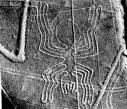
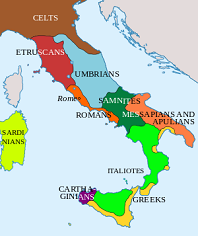
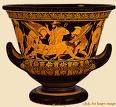



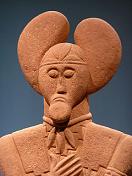

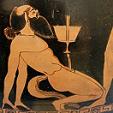
-500 World pop.: 100M. The 70th Olympiad. Roman consuls: Servius Sulpicius Camerinus Cornutus and Manius Tullius Longus. In this cent. the literacy rate in Athens reaches 10%-15%, and goes down from there in Europe until the Industrial Rev.? Some Greek aristocrats are expelled from Naxos, flee to Miletus, and ask Aristagoras of Miletus (son-in-law of Histaeus) for help, and he goes to Artaphernes of the Persians, who decides to help them invade. Middle-aged Confucius (-551 to -479) is appointed crime (justice) minister of Chung-tu in the Chinese state of Lu (modern-day Shantung Province) - the original Charlie Chan? In this cent. the Osco-Umbrian-speaking Rome-hating Aequi invade Latium from the C Apennines, while the Umbrian-speaking Germanic Marsi on the E shore of Fucinus Lake remain there; the Oscan-speaking Paeligni in the Valle Peligna ("Muddy Valley") in modern-cay Abruzzo, Vestini in modern-day Abruzzo in C Italy between the Gran Sasso and the N bank of the Aterno River, and Marrucini on the E coast of modern-day Abruzzo between the Aterno and Foro Rivers inhabit the E side of the Italian peninsula around Teate (Chieti); Oscan-speaking Frentani inhabit the SE Adriatic coast from Apulia to the frontiers of the Marrucini; the SC Apennines are inhabited by the Oscan-speaking Samnites, who by the end of the cent. are united in a loose but formidable confederation. In this cent. the barbaric Iranian Sarmatians a set of tribes (ancestors of the Slavs), incl. the Alani (Alans) (E division), Roxolani and Jazyges (Iazyges) inhabit the region W of the Caspian Sea from Sea of Azov N to the Don River. Yadi'ab Amir (d. -480) becomes the king of Nashan in S Arabia; in this cent. the Qedar Kkingdom of N Arabia has two known kings, Qainu and Geshem, the latter possibly mentioned in the Bible (Neh. 2:19, 6:1). In this cent. the Achaean League is formed by the 12 city-states of Achaea in the N-C Peloponnese of Greece. is formed by the 12 city-states of Achaea in the N-C Peloponnese of Greece. In this cent. the city of Mtskheta 12 mi. N of modern-day Tbilisi at the confluence of the Aragvi and Mtkvari Rivers is founded, going on to become the capital of the Kingdom of Iberia (Kartli) in the 3rd cent. B.C.E., and the birthplace of Christianity in Georgia in 337 C.E., and HQ of the Georgian Orthodox Church. In this cent. after finding salt veins, the Celts settle the city of Salzburg (Ger. "Salt city") (modern-day pop. 150K) in Austria near the N foothills of the Alps, and found the city of Vienna (Vianiomina) (Vindobona) (Gael. "fair/bright settlement/bottomland") (named after Celtic god Vindos?) on the Danube River (modern-day pop. 1.8M/2.6M). About this time the earliest Celtic chariot burials in Britain begin - Ahnuld's ancestors? About this time Celts in France leave burial mounds containing evidence of consumption of red wine, mead, and millet beer. In this cent. the Turkic nomadic Xiongnu (Hsiung-nu) (Chionites) menace China, becoming a major reason that the Chinese later build the Great Wall. In this cent. Lake Chad in Africa becomes inhabited. In this cent. the city of Beroea is founded in Macedonia on the site of modern-day Verroia (Veroia) (40 mi. WSW of Salonika), going on to become the most populous city of Macedonia by the first cent. C.E. About this time the city of Khujand (Khodjent) in Tajikistan on the Syr Darya (Jaxartes) River at the mouth of the Fergana Valley near the borders of Uzbekistan and Kyrgyzstan (modern-day pop. 181K/931K) is founded, becoming the 2nd largest city in Tajikistan; in 1936-91 C.E. it is renamed Leninabad. In this cent. the Glauberg Plateau in Hesse, Germany reaches its high point of fortifications as part of a network of Celtic fortified sites (oppida) covering S and WC Germany; it is the site of a princely seat, which in the 1990s become an archeological gold mine, incl. the Lord (Prince) of Glauberg statue; the fortifications are abandoned by the 1st cent. B.C.E. under German pressure. In this cent. Carthaginian explorer Himilco I the Navigator becomes the first Mediterranean explorer to reach the NW shores of Europe, incl. the Tin Islands (Brittany?) (Cornwall?) (Ireland?) - the Earth's crust is 10 parts per million (.001%) tin, so good luck? In this cent. the Thracian settlement of Sardica (Serdica) (modern-day Sofia, Bulgaria) (named after the Thracian Serdi tribe), on the elevated plain between the Perlovetz and Bojana Rivers (tributaries of the Iser River) 300 mi. NW of Byzantium is settled by the Thracian Odrysi. In this cent. the Greeks establish the colony of Elibyrge (Elybirge) in S Spain, which later becomes known as Illiberis to the Romans, and later as the city of Granada. In this cent. the Nazca Lines begin to be constructed in S Peru (until 500 C.E.); discovered in 1941 by Long Island City, N.Y.-born historian Paul August Kosok (1891-1959), who discovers their bird and other patterns from the air, along with their astronomical orientation; German mathematician Maria Reiche (1903-98) assists him, staying on after for life after he leaves, becoming known as "the Lady of the Lines". In this cent. the Olmec Culture (founded -1500) disappears. In this cent. the Basket Maker Culture of SW North Am. is founded (ends 700). In this cent. crop rotation is introduced in Greece, leading to large estates worked by slave labor. In this cent. chickens are introduced to Africa through the Nile Valley. In this cent. trapezitai (private bankers) take over the money-exchanging and money-lending business in Greece, and Athenian coinage becomes the predominant medium of exchange in the Greek world. About this time Greek Socratic philosopher ("the Dark or Obscure") (dark clothing) ("the Weeping Philosopher") Heraclitus of Ephesus (-535 to -475) flourishes, becoming the philosopher of the Logos, and Mr. Fire Is the Source of All Things, adding the concept of becoming to that of being, and holding virtue to consist in subordinating the individual to the laws of society, as long they are based on a universal and reasonable harmony, leaving On Nature; he becomes known for the soundbytes: "No man ever steps in the same river twice", "The path up and down are one and the same", and "All entities come to be in accordance with the Logos (word)." In this cent. Greek Pythagorean philosopher Hippasus of Metapontum flourishes, discovering the irrationality of the square root of 2, causing a legend to claim that he is drowned at sea by the gods as punishment. About this time the practice of scalping becomes popular with the Scythians of S Russia, who begin occupying N Russia in this cent.; it is later believed that the Dutch, French, and English introduce it to North Am. aborigines as proof for bounty payment, but archaeological investigations prove it was practiced in pre-Columbian times. About this time Sicilian (born in Syracuse?) Greek comic poet-dramatist Epicharmus of Kos (-540 to -450) thrives, inventing the Doric or Sicilian comedic form; "The wise man must be wise before, not after." Nonfiction: The Epic of Atrahasis is written in Arabia, describing the god Allah (Allah) leading a rebellion against chief god Enlil (Elil). Captive Jews in Babylon are busy churning out fiction which later becomes the first 39 books of the Bible; the Atbash Cypher (first Hebrew letter substituted for last, etc.) is invented, and used to make the Bible funner, e.g., encrypting the name Babel as Sheshach in Jeremiah. In this cent. Jewish minor prophet Joel allegedly lives in or near Jerusalem after the Babylonian Captivity, writing The Book of Joel, which talks about a plague of locusts and how when the Jews get right with Jehovah he will give them plentifiul harvests and establish Jerusalem as a holy city. In this cent. the game of Polo is invented in Persia? In this cent. the Chinese begin breeding miniaturized pugs from giant mastiffs. About this time the Capitoline Wolf, an Etruscan bronze statue is cast in the lower Tiber Valley, showing twin infants Romulus and Remus suckling the she-wolf Attus Navius. The original Tumnus from Narnia? About this time the Greek cult of Pan becomes popular in Athens, with Pratinus of Philius introducing the Satyr Play at the yearly Dionysia (Dionysian festival) in Athens, showing burlesques about Pan's companions the half-goat Satyrs, known for pointy ears, long curly hair and beards, and unstoppable tumescent erections, who are ever-ready but shy, and love to dance with and chase nymphs while swigging wine; the leader of the satyrs is Silenus; Aeschylus allegedly writes the best, only one of which survives; Satyr Suspending a Pipe Case from His Erection (painted on an Attic black-figure plate) and Satyr Balancing a Wine Cup on His Erection (painted on an Attic red-figure psykter) are produced about this time; Greek actors are called "hypocrites" (pretenders) - how low can you go for your master Satan, that about summarizes professional acting? About this time wine is being produced by the Gauls in S France. Perceptive Darius I the Great builds Persepolis, with great statuary, incl. the long staircase leading into his palace, which he uses to awe ambassadors from the 20 or so countries his empire now rules. Celts build tombs in Miesau near modern-day Kaiserslautern in W Germany. About this time the Japanese begin their own mix of Buddhism, Taoism, and Confucianism called Shinto (Way of Divine Power). Earl in this cent. Greek philosopher Leucippus of Miletus flourishes, originating the atomistic theory, which is developed by his student Democritus. In this cent. rival Greek painters Zeuxis of Heraclea Pontica and Parrhasius of Ephesus flourish; Zeuxis allegedly paints such realistic grapes that the birds try to eat them, but Parrhasius paints such a realistic curtain that Zeuxis attempts to draw it aside, losing a painting contest with him because although he had deceived birds, Big Parrot had deceived him, causing Parrhasius to receive Athenian citizenship, and go on to paint the Demos, a personification of the Athenian people, showing their macaroni mix of types. In this cent. the Effigy Mounds in NE Iowa begin to be built (until 1300 C.E.); many are bird-shaped or bear-shaped. The tarnish-free Sword of Gou Jian is made about this time; discovered in 1965 C.E. in Hubei, China. Beermaking begins in Mediterranean France. Inventions: The bitless bridle is first used in Persia during the reign of Darius I the Great.

-499 Aristagoras, tyrant of the city of Miletus goes on a joint expedition with Persian satrap Artaphernes (brother of Darius I the Great) to conquer Naxos, and after Persian gen. Megabates flops and warns them, it turns into a debacle, causing Aristagoras to decide to incite the Greek city-states of Ionia into a rebellion against Darius I to save his position; fellow Milesian tyrant Histiaeus (d. -493) gives the signal to begin the Ionian Revolt (ends -493) by sending a message to Aristagoras tattooed to the scalp of his slave shaving his head first then letting the hair grow back); Militiades the Younger joins the Ionian Revolt, capturing the islands of Lemnos and Imbros, which he eventually cedes to Athens to establish friendly relations; the start of the (Greco-)Persian Wars (end -448). Aeschylus (-525 to -456) enters his first dramatic competition at the Greater Dionysia, going on to become the first Greek playwright to put two actors onstage at the same time. Roman consuls: Titus Aebutius Helva and Gaius Vetrurius Geminus Cicurinus.

-498 Roman consuls: Aulus Postumius Albus Regillensis (dictator) and Quintus Cloelius Siculus and Titus Larcius Flavus. Aristagoras travels to mainland Greece to solicit aid, causing Athens to contribute 20 ships and Eretria five; an Ionian and Athenian fleet sails to Ephesus, and the soldiers disembark and march to fight Persian satrap Artaphrenes, then burn the capital of Sardis and return to Ephesus, where the Persians meet and massacre them; Aristagoras escapes and fights on. Amyntas I dies, and Alexander I Philhellene ("not-a-Greek") (d. -454) becomes king of Macedonia, and later becomes the first Macedonian to participate in the Olympics and win. Cleandrus is murdered, and Hippocrates (d. -491) becomes tyrant #2 of Gela, going on to conquer Leontini (Lentini) (Leontinoi) in -494, making his ally Aenesidemus its tyrant. The Palace of Vouni is built by the Phoenician pro-Persian king of Marion to watch over the pro-Greek city of Soli following an unsuccessful revolt of the latter against the Persians. Darius I begins construction of a palace in Babylon for his son Xerxes (Pers. "monarch", "hero among kings") (finished -496), indicating a possible coregency (-496 to -486) followed by 11 years of sole rule (-486 to -475)? (Jehovah's Witnesses). Births: Greek architect Hippodamus of Miletus (d. -408) in Miletus.
-497 Roman consuls: Aulus Sempronius Atratinus and Marcus Minucius Augurinus. The beginning of the rule of the tyrants in the city of Catania (Katania) in E Sicily. Confucius (-551 to -479) resigns his office and leaves the kingdom of Lu heartbroken after Duke Ding takes 80 singing girls as a present from the state of Qi against his advice, and begins wandering from state to state in China, looking for an ideal ruler which he never finds (ends -484). Architecture: The Temple of Saturn in the Forum Romanum is dedicated. Deaths: Greek philosopher Pythagoras of Samos (b. -580) in Metapont(i)um; dies a believer in the mystical qualities of numbers such as pi, having never touched a bean; about this time the democratic party in S Italy turns on his sect and burns them in their meeting places; leaves his writings to his daughter (by Theano) Damo, who passes them to her daughter Bitale: "The most momentous thing in human life is the art of winning the soul to good or to evil" - how I want a drink, alcoholic of course?
-496 The 71st Olympiad. The Romans (Latins) under dictator Aulus Postumius Albus Regillensis defeat the pesky Etruscans under king Lars Porsena (Porsenna) (Pursenas) (ruling from Clusium) and Octavius Mamilius (son-in-law of Tarquin) at the Battle of Lake Regillus, allegedly with the help of heavenly twins Castor and Pollux; at this time Rome is 400 sq. mi. in area and has 150K pop.; legendary Roman hero Horatius holds the Etruscan army at bay while his fellow Romans cut down the Sublician Bridge the Tiber River, then swims to safety and is awarded as much land as he can plow in a day. A 10-year gap is filled when Hipparchus is elected ruler of Athens. Roman consuls: Aulus Postumius Albus and Titus Verginius Tricostus Caeliomontanus. Births: Greek tragedian Sophocles (Gr. "soph" + "ocles" = "wise" + "famous") (d. -406) in Colonus Hippius, Attica (near Athens); son of Sophillus. Deaths: Chinese philosopher Sun Tzu (b. -544).

-495 Roman consuls: Appius Claudius Sabinus Inregillensis and Publius Servilius Priscus Structus. Ilisami II Nabat (d. -475) becomes king of Kaminahu in S Arabia. Births: Athenian statesman-gen.-orator and first citizen Pericles (Gr. "all-around famous, far-famed") (d. -429) in Athens; son of Athenian gen. Xanthippus; pupil of Sophist music master Damon and philosopher Anaxagoras of Clazomenae, who teaches him freedom of thought and freedom from superstition; big friends with big names incl. Sophocles (-496 to -406), Protagoras, Phidias, and Herodotus; known for his high cranium, he is so self-conscious about his pointed head that he only poses for portraits wearing a helmet; his cultured non-Athenian mistress Aspasia of Miletus wields considerable political power. Greek philosopher Zeno the Dialectician of Elea (d. -435) in Elea (Velia), Italy.

-494 Roman consuls: Marcus Valerius Volusus Maximus (dictator) and Aulus Verginius Tricostus Caeliomontanus. On Oct. 20 the Ionian Revolt (begun -499) fails with a naval defeat by the Persians at the Battle of Lade (Ladé) (Lades), followed by the sacking of Miletus, which is later rebuilt on a new site after all men are killed, the women and children are sold into slavery, and the young men castrated; historian Hecateaeus of Miletus conducts the negotiations with satrap Artaphernes, obtaining his consent to restore the constitution of the Ionic cities; Zancle in Sicily is burned and all the inhabitants (mainly from Samos) are enslaved by the Persians, who vow to get even with Athens for supporting the revolt; rebel leader Miltiades (-550 to -489), tyrant of Chersonesus flees to Athens, where he rises to prominence despite opposition by the Alcmaeonidae. King Cleomenes I of Sparta attacks and defeats Argos, slaughtering 6K in the Battle of Sepeia, and forcing it into the Peloponnesian League and giving Sparta hegemony in S Greece; Cleomenes tries to punish Aegina for supporting Persia but is blocked by the other Spartan king Demaratus. The First Plebeian Secession (gen. strike) in Rome (ends -493) is caused by outrage at patrician creditors enslaving pleb legionaries returning from the Volscian War; disobeying the orders of the consuls, they march to the Sacred Mount up the Tiber, beyond the Anio River, and threaten to found a new city unless their rights are respected; the patricians yield, giving them the institution of the tribuni plebis, the privilege of having officers of their own (tribunes and aediles) to protect them, with veto power over the patrician magistrates.

-493 By now the Persians control all the Greek city-states of Asia Minor, and now begin an extensive preparation for an attack on the free cities of the Greek mainland. The Romans under Spurius Cassius (Lat. "vain") Vecellinus negotiate the Foedus Cassianum (Treaty of Cassius), a treaty with the Latin League which establishes a defensive alliance against the Aequi and Volsci, with joint annual campaigns and alternating generals, equal booty distribution, and joint colonies to be established on reconquered territories. Themistocles (-514 to -462), leader of the anti-Persian party is elected ruler (archon) of Athens, persuading Athens to expand its naval power by building 200 triremes and fortifying the three natural harbors of the Piraeus. The strategic city of Zancle in NE Sicily is captured by Anaxilas, tyrant of Rhegium (Reggio di Calabria) across the Strait of Messina with assistance from the refugees from Mssina; he expels the remaining Samians and resettles the city with Messenians, then renames it Messana (Messina). Roman consuls: Postumius Cominus Auruncus and Spurius Cassius Vecellinus.
-492 The 72nd Olympiad. After his son Metiochos is captured by the Persians, Militiades the Younger flees to Athens, and talks his way into becoming one of the 10 strategoi (generals) for -490. Darius I the Great sends a 600-ship Persian fleet under Gen. Mardonius (d. -479) to punish Athens and Eretria for aiding the Ionian Revolt, but it is destroyed in a storm on the cliffs of mean Mount Athos while rounding the Chalcidice - they weren't worth a daric? Roman consuls: Titus Geganius Macerinus and Publius Minucius Augurinus.

-491 Eurypontid Spartan king Demaratus is deposed by Cleomenes after being accused of being illegitimate, despite the opposition of the ephors, and more controllable Leotychidas II (-545 to -469) becomes Eurypontid king of Sparta (until -476), going on to lead the Spartans in the Persian Wars of -490 to -478; Demaratus goes into exile with the Persians and becomes bitter - have a seat right over there please? Hippocrates dies, and Gelon (Gelonos) (Gelo) (d. -478), son of Deinomenes becomes ruler of Gela, founding the Deinomenid Dynasty. Roman consuls: Marcus Minucius Augurinus and Aulus Sempronius Atratinus.

-490 Meany Cleomenes I (r. since -520) goes mad, is imprisoned, and either commits suicide or is executed by the pissed-off Spartan ephors, and next year his half-brother Leonidas (Gr. "son of the lion") I (-520 to -480) becomes Agiad king #17 of Sparta (until Aug. 11, -480); his wife is Cleomenes I's daughter Queen Gorgo, mother of future Spartan king (-480 to -458) Pleistarchus, who becomes one of the few female historical figures mentioned by Herodotus. Darius I the Great sends a 2nd Persian force under Artaphernes and Datis, this time going across the Aegean Sea, which sieges Eretria on Euboea until it falls through treachery; on Sept. 12 after aged I-ain't-as-good-as-I-once-was ex-tyrant Hippias talks him into it, Darius I lands at Marathon, center of Peisistratid strength; the Battle of Marathon, AKA the Battle of Fennel Fields sees an Athenian army of 10K-20K under Gen. Miltiades (one of 10 strategoi) lure then defeat an invading Persian army of 15K-25K in a field of fennel, with losses of 192 Greeks vs. 6.4K Persians (incl. Hippias?), making good use of the phalanx, and pioneering double envelopment; Athenian messenger Pheidippides (Phidippides) (Philippides) (Thersipus?) (Erchius?) (Eucles?) is sent in full armor to run to Athens 41 km (26 mi.) away to announce the Greek V with the message "Nike" (victory) (actually "Nenikekamen" = "We are victorious), after which he drops dead after running the first marathon; the first mention of the runner is in Plutarch's "On the Glory of Athens" in the 1st cent. C.E., and what really happened was that Pheidippides was sent before the battle to Sparta 140 mi. away to ask for help, and they refused because they were holding a sacred festival, and after the battle the Athenian army marched 25 mi. back to Athens to head off the Persian fleet, and the two events got confused; Greek gen. Miltiades dedicates his helmet to Zeus, and it ends up in a museum; Aeschylus fights in the front lines against the Persians; in Sept. 1970 C.E. the skeletons of five warriors who died in the battle are discovered by archeologists in the Soros of the Plataians 26 mi. NE of modern Athens; the Persians then try an end-around run, sailing around Cape Sunium to attack Athens, but the fleet-footed Athenians beat them to the city, causing the Persians to chicken out and retreat to Asia. After the Greek V (nike) at Marathon, gen. Miltiades (-550 to -489) sends a flotilla to Paros Island W of Naxos (known for its fine white Parian marble) to demand a ransom for supporting the Persians, but he fails and breaks a leg, and is charged with treason ("deceiving the people") by the Athenian court, then jailed when he can't pay the huge fine of 50 talents - no leg to stand on jokes here? After the Greek V (nike) at Marathon, a shield signal is raied on Mt. Pentelicon above Marathon to signal the Persian navy to sail around Cape Sounion and attack unguarded Athens, which is widely attributed to the treachery of the Alcmaeonidae and their leader Megacles. The gamoroi (landed aristocracy) begin to lose control in Syracuse to a disorganized democracy, causing them to invite tyrants in. The city of Patna (Pataliputra) on the Ganges River in NE India (modern-day pop. 1.69M/2.0M) is founded by the king of Magadha, becoming the capital of the Magadh Empire under the Haryanka, Nanda, Mauryan, Shunga, Gupta, and Patna Empires, known as a center of learning, fine arts, and astronomers incl. Aryabhata, Vatsyayana, and Chanakya, reaching 400K pop. by 300 B.C.E.; it goes on to become a pilgrimage center for Buddhists, Hindus, Jains, and Sikhs; after the fall of the Gupta Empire, it declines until it is revived in the 17th cent. by the British as a center of internat. trade; after the partition of the Bengal presidency in 1912, it becomes the capital of Bihar and Orissa Province. About this time Sicilian chef Mithaecus (Mithaikos) flourishes, bringing Sicilian cooking to Greece after being expelled from Sparta to Athens, writing the first known cookbook. Roman consuls: Quintus Sulpicius Camerinus Cornutus and Spurius Larcius Flavus. Births: Greek painter Polygnotus (d. -447); develops the technique of large-scale painting. Greek philosopher Empedocles (d. -430) in Agrigentum, Sicily. Greek Sophist philsopher (first) Protagoras of Abdera (d. -420) (-481 to -411?) in Abdera, Thrace.
-489 Theron of Acragas (Aeragas) (d. -472) of modern-day Agrigento, Sicily ousts Terillus of Himera, who calls for help from the Carthaginians, who stall for almost a decade but finally send an army. Athens begins a war with Aegina for helping the Persians (ends -483). Militiades the Younger (b. -550) leads an Athenian expedition of 70 ships to punish the Greek islands that supported the Persians, and attacks Paros, but fails to take it; Militades suffers a severe leg wound which incapacitates him; after returning without accomplishing the mission he is convicted of treason, and sentenced to death, but the sentence is reduced to 50 talents, which is beyond anybody's ability to pay, and he ends up dying in prison of gangrene. Roman consuls: Gaius Julius Iullus and Publius Pinarius Mamertinus Rufus. Deaths: Greek gen. Miltiades (b. -550) in Athens; dies in prison of war wounds.
-488 The 73rd Olympiad sees tyrant Gelo of Syracuse (d. -48) win a victory in the chariot race, causing sculptor Glaucias of Aegina to make a statue of him, followed by more statues of Olympian athletes incl. Philon of Corcyra, Glaucus of Carystus, and Theagenes of Thasos.
About this time Greek sculptor Phidias is commissioned to execute a large bronze group of nat. heroes at Athens with the central figure being Marathon hero Miltiades. Roman consuls: Spurius Nautius Rutilus and Sextus Furius Medullinus (?)-487 Anti-Persian party candidates Themistocles (leader of the commoners) and Aristeides (leader of the aristocrats) are elected rulers of Athens, which reforms its constitution to make it more democratic. Hipparchus, relative of the tyrant-traitor name-is-mud Hippias of the Pisistratus Dynasty is the first person to be officially ostracized after over 6K ostraka (potsherds) with his name written on them are cast by the assembly, causing him to be exiled from Athens for 10 years while retaining his property and citizenship; the vote is called for by a show of hands in the assembly, and at least 10K of them ostrakon thingies have to be cast for a valid ostracism, requiring him to leave Athens for 10 years min. without loss of property, civil rights or stigma, and subject to a recall vote by the assembly. Roman consuls: Titus Sicinus Sabinus and Gaius Aquillius Tuscus.
-486 Alcmaeonid leader Megacles of Athens is ostracized, which doesn't stop him from winning the chariot race in the Pythian Games, according to Pindar. The Greeks invent comedy. Roman consuls: Spurius Cassius Vicellinus and Proculus Verginius Tricostus Rutilus.

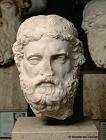
-485 Roman consuls: Servius Cornelius Maluginensis and Quintus Fabius Vibulanus. Darius I the Great (b. -549) dies, and his son Xerxes (Khshayarsha) (Ahasuerus) (Pers. "monarch") I (d. -465) becomes sole king of Persia, demanding "earth and water" (total submission) from the Greek states, most of whom tell him to fork off. Spurius Cassius (d. -485) proposes the first agrarian laws, attempting to give some land in Gaul to the poor plebeians (who had to leave their farms in neglect and fall into debt during military service) instead of to the patricians, who divide it up among themselves; too bad, the patricians have him executed for attempting to achieve royal power, and his agrarian laws never come into effect. The patrician Gens Fabia (Lat. "bean grower") rises to power in Rome), with brothers Quintus Fabius Vibulanus, Marcus Fabius Vibulanus, and Caeso Fabius Vibulanus< dominating the consulship until -478; this year Quintius Vibulanus lodges the spoils of a victory with the patricianu-run aerarium rather than the pleb-run publicum, pissing-off the plebs; meanwhile the patrician Gens Cornelia (Lat. "cornu" = horn) (of Etruscan origin) finally attains the consulship, after which its members get 30% of all consulships. The exiled oligarchs of Syracuse appeal for help to Gelon of Gela, who then conquers Syracuse and makes it his base, turning it into Sicily's leading city by transporting pops. of conquered neighbors; Sicily is now ruled by tyrants backed by the landed aristocracy. Deaths: Greek love poet Anacreon (b. -582); leaves Odes; the U.S. anthem "The Star-Spangled Banner" comes from the song To Anacreon in Heaven, composed by members of the Anacreontic Club in 1780 C.E. Persian king (-522 to -485) Darius I the Great (b. -549). Greek Athenian (Alcmaeonid) leader ("Father of Democracy") Cleisthenes (b. ?).
-484 The 74th Olympiad. Aeschylus wins his first Athenian first prize for drama. An artificial limb (foot) is first mentioned. In the 3rd year of his reign Xerxes I (Ahasuerus) holds a 7-day banquet for his nobles, while his wife Vashti ("beautiful woman") holds one for the women at the royal house; Xerxes calls her to his banquet to show off her beauty, but she refuses, causing Prince Memucan to successfully advise him to depose her (Esther ch. 1-2) to prevent all the royal women from getting uppity with the royal face - just whisper in my ear, you're a butterfly? Roman consuls: Lucius Aemilius Mamercus and Caeso Fabius Vibulanus. Births: Greek historian #1 ("the Father of History" - Marcus Tullius Cicero) ("Father of Historical Lies"?) Herodotus (Heródotos) (d. -425) in Halicarnassus, Caria (modern-day Bodrum, Turkey) in SW Asia Minor (a Doric colony under Persian domination, making him a Persian subject); the first Greek to know that the Red Sea connects to the Indian Ocean? Persian king #5 (-465 to -424) Artaxerxes ("his reign is through truth") I Longimanus ("long hand" - right hand longer than the left) (d. -424); son of Xerxes I; grandson of Darius I.


-483 The war between Athens and Aegina (begun -489) ends indecisively. After a rich new vein of silver is discovered at the mines at Mt. Laurium, Themistocles convinces the assembly to use the money to build a fleet of 200 triremes; Aristides opposes the measure, and is ostracized. Roman consuls: Marcus Fabius Vibulanus and Lucius Valerius Potitus. Births: Greek Sophist philosopher ("the Nihilist") Gorgias (d. -378) in Leontini. Deaths: A dog - a panic in a pagoda? Hindu sage Sidhartha Gautama Buddha (b. -563) in Kushinagar, Uttar Pradesh; dies from mushroom poisoning after feasting on pork and uttering the soundbytes: "With coarse rice to eat and my bended arm for my pillow I still have joy", and "All composite things pass away. Strive for your own liberation with diligence"; he tells his disciples to follow no leader, only his teachings, which doesn't stop them from electing a new leader after his body is cremated and the relics placed in stupas (monuments), incl. his right tooth, which is put in the Temple of the Tooth (Sri Dalada Maligawa) in Sri Lanka; Buddhist pagodas have eight sides and an odd number of stories; Buddhism teaches the Four Noble Truths: 1. Life means suffering. 2. The origin of suffering is attachment. 3. The cessation of suffering is attainable. 4. The Path to the cessation of suffering is the Eightfold Path; it also teaches the 31 Planes of Existence that beings are reborn into during their long wandering through samsara.
-482 In Aug. Bel-Shimanni seizes the throne of Babylon, and is KIA; Shamash-Eriba takes his place in Sept., and is killed by Megabysus, brother-in-law of Xerxes I; this is the last independence revolt of the Babylonians, since the economy collapses and Babylon slips into decay. Confucius returns to the state of Lu and devotes the remaining four years of his life to completing his work of compiling and editing the Chinese Classics, the first three of the five king (canonical books), while sitting under a gingko biloba tree, composing the Spring and Autumn Annals as a supplement to the 3rd king, covering from -722 to -481, becoming the earliest surviving Chinese historical text in annals form. Roman consuls: Quintus Fabius Vibulanus and Gaius Julius Iullus.
-481 Xerxes I's army gathers in Cappadocia and winters in Sardis, planning to kick Greek butt next spring; meanwhile the Congress at the Isthmus of Corinth agrees to end the war between Athens and Aegina; the Greek states, led by Sparta and Athens set up the Hellenic League to resist the Persians, with Themistocles of Athens as CIC (strategos autocrator), who refuses to place the army under command of Spartan king Leonidas, but agrees to allow the navy to serve under a Spartan adm.; after Sparta and Athens refuse the offer of Gelon of Syracuse to become CIC, he leaves quick to stop an invasion by Carthage; too bad, Thebes and Thessaly refuse to support Athens against the Persians, and Crete remains neutral. Roman consul Fabius Vibulanus leads an army to break the siege by the Aequi of Ortona, routing them with a cavalry charge; too bad, the infantry refuses to pursue them, which doesn't stop him from returning to Rome claiming a V. Roman consuls: Caeso Fabius Vibulanus and Spurius Furius Fusus.



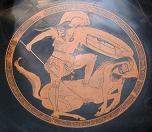
-480 The 75th Olympiad; Theagenes (Theogenes) of Thasos defeats Euthymus in boxing; later a statue of him is made by sculptor Glaucias of Aegina, which is scourged by a man who had a grudge against the athlete, after which it fell on him and killed him, causing the statue to be tried and convicted of murder and thrown in the sea, then retrieved after the Delphic Oracle declares that the country will be barren until it's back. Roman consuls: Marcus Fabius Vibulanus and Gnaeus Manlius Cincinnatus. In the spring Persian Zoroastrian king (since -486) Xerxes (Khshayarsha) (Ahasuerus) (Pers. "monarch") I the Great (-518 to -465) personally leads an invasion of Greece against the ?!*! pesky free-thinking polytheist Greek hooligan terrorists, assisted by bitter exiled Spartan king Demaratus, marching through Thrace and Macedonia with 200K-2M men, incl. units of Arabs on camels (Herodotus Bk. 7 says 5M plus camp followers), plus a fleet of 600-1,200 ships, cutting a canal through the 1 mi. wide Isthmus of Chalkidiki (Chlacidice) for them; on Aug. 9-11 (Aug. 16-18?) (Sept. 8-10?) (Aug. 20?) the Battle of Thermopylae sees a Greek allied army of 7K hoplites (incl. 300 Spartans, 400 Thebans, 700 Thespians, 900 Helots, and 1K Phocians) block the 50-yd.-wide (as wide as a wagon track in some places) coastal pass (6 mi. from the sea, which turns into a swamp then a rocky plain in modern times) of Thermopylae (Thermopilai) (Gr. "hot gates") in E Greece (between Mt. Oeta and the S shore of the Gulf of Maliakos) for three days, while a fleet of 270 Greek ships protects the Gulf of Artemisium; on Aug. 19 after a Greek traitor shows the Persians a bypass route which allows them to turn the Greek position, most of the Greeks retreat, except 300 Spartans and 700 Lesbians, er, Thespians (famous for their worship of Eros and the Muses) under Spartan Agiad king (since -490) Leonidas I (-520 to -480), who make a stand, and are all KIA in a legendary fashion after responding to the Persian demand to surrender their weapons with the immortal soundbyte "Molon labe" (come and take them); later Simonides of Keos turns this into the immortal soundbyte "Go tell the Spartans, stranger passing by, that here, obedient to their laws, we lie"; meanwhile half of the Persian fleet is lost to storms, and the naval Battle of Artemisium is a push, but the loss of Thermopylae causes the Greek navy to withdraw, and the Boeotians, Phocians, and Lorians to flop to the Persian side; Artemisia I of Caria commands five ships for the Persian side, followed by the Battle of Salamis, becoming the first known female admiral in history?: the Greek army retreats to the Peloponnese and builds a wall across the Isthmus of Corinth, and the Greek fleet moves to the Saronic Gulf between Athens and Salamis, causing the Athenians to flee and the Persians to occupy Attica and sack and destroy Athens, but on Sept. 23 the Greeks score a big V at the naval Battle of Salamis in the Straits of Salamis after the Persians make the mistake of attacking in a narrow strait which takes away their numerical advantage; Paros switches sides after the battle, and joins the Athenian League; Xerxes heads back to Persia with what remains of his navy and a third of his army, leaving Gen. Artabazus in charge of one-third in Thrace, and Gen. Mardonius in charge of the rest, who withdraws from Athens, burning everything in his path, and winters in Boeotia; the Acropolis in Athens is destroyed. Leonidas I dies, and his son Pleistarchus (d. -458) becomes Agiad king of Sparta. Theron of Acragas and Gelon and Hieron of Syracuse win the Battle of Himera in Sicily against Terillus of Himera, Anaxilas of Rhegium and the invading Carthaginians under Hamilcar; Syracuse begins expanding into the Tyrrhenian Sea along the Italian coast, stopping the Etruscans; the Carthaginian invasion of Sicily is stopped for 70 years, causing them to turn inland and take over the fertile Libyan hinterland. After a search for the most beautiful and suitable virgins in his kingdom, who are taken to the royal palace and beautified for the king's inspection under the eunuch Hegai, Xerxes I (Ahasuerus) in the 7th year of his reign marries the orphaned Jewess Hadassah (Heb. "myrtle") of the tribe of Benjamin, who changes her name to Esther of Susa (Shushan) to hide her Jewishness at her uncle Mordecai's direction (Esther 2:8-17), and passes info. from Mordecai to the king to save him from an assassination plot (Esther 2:20-22). Art: Centauromachy; Greek red-figure kylix. Births: Greek #1 sculptor-architect-painter Phidias (Pheidias) (d. -430) in Attica; son of Charmides. Greek tragedian Euripides (d. -406) in Salamis on Sept. 23 (on the day of the great battle against the Persians); son of Mnesarchides and Clito; one of the three great Attic tragic poets (Aeschylus (-525 to -456), Sophocles); uses long explanatory prologues, which are ridiculed by Aristophanes; also known for deus ex machina ("god from the machine"), and recognitions (changing legends to fit his plots); first to use natural dialogue and recognize the scientific intellectual rev. that is rejecting religion; in 1997 C.E. the cave on the island of Salamis where he works is discovered by archeologists. Greek Pythagorean philosopher Philolaus of Croton (d. -385) in Croton, Magna Grecia (S Italy). Deaths: Greek philosopher Xenophanes of Colophon (b. -570): claims to be writing to create "fame that will reach all of Greece and never die while the Greek kind of songs survives": "Ethiopians make their gods snub-nosed and black; the Thracians make theirs blue-eyed and red-haired... Mortals imagine that the gods are begotten, and that the gods wear clothes like their own and have language and form like the voice and form of mortals. But if oxen or lions had hands and could draw and do the work with their hands that men do, horses would have drawn the form of gods like horses and oxen gods like oxen and they would represent the bodies of the gods just like their own forms." Spartan hero king Leonidas I (b. -520) in Thermopylae, Greece (KIA).


-479 On Aug. 27 (morning) after the Persians invade Attica again, the Greeks ignore their differences and unite against the common Persian foe, fielding an army of 110K incl. 39K Spartans in the land Battle of Plataea; the Persians under gen. Mardonius are defeated by Greek forces under Spartan gen. Pausanias (-510 to -468), with a total loss of 250K; Mardonius is KIA and his body stolen and his camp plundered; meanwhile on Aug. 27 (afternoon) after the Samians and Chians convince king Leotychides II of Sparta to take his small Greek fleet guarding the Cyclades to surprise the Persians after the latter make the mistake of drawing their ships up on the beach at Mycale near Samos, the naval Battle of Mycale sees the Athenians under gen. Xanthippus (father of Pericles) destroy the Persian fleet and complete the Greek repulse of Persia; both battles take place near a temple of the Eleusinian Demeter (Herodotus, Bk. 9); too bad the town of Thespiae in SC Boeotia in EC Greece, E of Mt. Helicon (10 mi. WSW of Thebes and 10 mi. WNW of Plataea) (whose pop. fought at both Thermopylae and Plataea) is destroyed by the Persians; on Sept. 6 the Greeks siege Thebes, demand that they turn over Persian collaborators Timagenidas and Artaginus, and when they refuse, capture the town, abolish the oligarchy, and institute a democracy; the Ionian cities of Asia Minor along with several island cities (Chios, Lesbos, Samos) see their chance and revolt from the Persian melon-heads, forming an allied Greek fleet that sieges the Persian stronghold of Sestos in the Thracian Chersonesus at the mouth of the Aegospotami River; the Spartans return home in the fall, but the Athenians and Ionians stay and capture Sestos early next year; meanwhile a tsunami in Potidaea, Greece (first in recorded history) saves the town from a Persian invasion. After Caeso Fabius Vibulanus supports the plebeians, the otherwise illustrious patrician Fabian (Fabius) family becomes un-PC and is forced into exile to Veii, several mi. above Rome on the banks of the Cremera River. Roman consuls: Caeso Fabius Vibulanus and Titus Verginius Tricostus Rutilus. Deaths: Chinese sage Confucius (b. -551) in Lu; after his death his disciples compile the Li-Ki (Book of Rites) as the 5th king, and later the four shu; his first grandson becomes a great philosopher; by the year 2009 C.E. he has 2 million descendants (83 generations); "Do not do to others what you do not want done to yourself"; "Without recognizing the ordinances of Heaven it is impossible to be a superior man"; "At 50 I knew the will of heaven, at 60 I was ready to listen to the will of heaven"; "A true teacher is one who, keeping the past alive, is also able to understand the present."

-478 The Persian threat behind them, the Golden Age of Athens (endw -404) begins, during which Athens grows into an empire, reaching the height of wealth and powah and producing its greatest philosophers, historians, physicians, etc. On Feb. 17 a solar eclipse occurs as Xerxes is departing for his expedition against Greece, as mentioned by Herodotus Bk. 7. Gelon dies, and his brother Hieron (Hiero) I (d. -467) becomes tyrant of Syracuse, making it the most powerful state in Sicily, creating the first Greek secret police, relocating entire cities while conspiring against his last brother Polyzelos and patronizing culture, with Greek poets Pindar, Bacchylides, Aeschylus, Epicharmus, and Simonides of Keos (Ceos) (-556 to -468) (inventor of the idea of the Memory Palace, along with four letters of the Greek alphabet) moving to his court and churning out poetry, little of which survives to modern times - everybody committed it to memory and didn't need to write it down? An allied Greek fleet led by Pausanius sacks Cyprus and Byzantium; the Spartan ephors recall Pausanius and try him for treasonous negotiations with the Persians, but he is acquitted and sent back to Byzantium; meanwhile the Spartans send Dorcis to command the allied fleet, but the Ionians refuse to recognize the dorkus and make an alliance with the Athenians in order to finish expelling all remaining Persians from Greek territory, setting up the Delian League (Athenian maritime confederacy, incl. the cities of Rhodes, Camirus, Lindus, and Ialysus), and commissioning Gen. Aristides the Just (-530 to -468) to set up a HQ on the island of Delos to collect the tribute from each member; the gen. assembly (synhedrion) consists of one voting member per ally, but big kid on the block Athens soon manages to take it over incl. its treasury, putting half of Athens on the govt. payroll; Miletus joins the Delian League and recovers from its sacking. Roman consuls: Lucius Aemilius Mamercus and Gaius Servilius Ahala. Art: About this time the 1.8m bronze Charioteer of Delphi is sculpted to commemorate the V of tyrant Polyzalus of Geta in Sicily in the Pythian Games; discovered in 1896.
-477 In the spring Persian gen. Mardonius departs from Sparta to Thessaly, and on Aug. 1 a solar eclipse is observed in Sparta according to Herodotus, Bk. 7. On Sept. 8 emperor #4 (since -477) Itoku (b. -533) dies, and Koushou (Kosho) (-506 to -393) becomes Yamato emperor #5 of Japan (until -393) - what does he take? The Fabian gens, fighting as a unit on behalf of Rome against the Etruscan city of Veii are annihilated by the Veientes at the Battle of the Cremera River; only one member survives to keep the line going. Roman consuls: Gaius Horatius Pulvillus and Titus Menenius Lanatus. Deaths: Japanese Yamato emperor #4 (-510 to -477) Itoku (b. -533) on Sept. 8.
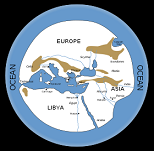
-476 The 76th Olympiad. Cimon, son of Miltiades is elected strategos of Athens, and leads an expedition to Thrace, capturing most of the Persian forts on the coast (incl. Eion) and expelling Pausanias from Byzantium. Leotychidas II (d. -469) is deposed and banished for taking a bribe, and Archidamus II (d. -427), son of Zeuxidamus (Cyniscos) becomes Eurypontid king of Sparta. Hieron I of Syracuse evacuates Catana to the Sicelian city of Inessa (Inessum), and renames it to Aitna (Aetna) (Gr. "I burn"), with capital at Hieron, repopulating it with 10K people from Syracuse and the Peloponnesus; in -465 Aetna begins manufacturing silver coins of unsurpassed workmanship. Zhou Jing Wang dies, and Zhou Yuan Wang (d. -468) becomes Dong Zhou king #14 of China. Roman consuls: Aulus Verginius Tricostus Rutilus and Spurius Servilius Structus. Deaths: Greek historian Hecataeus of Miletus (b. -550); leaves Travels Round the Earth (Periodos Ges) (Periegesis) (2 vols.), which contains his World Map, an improvement on Anaximander's; "I laugh when I see that many have designed maps of the earth, yet no one has been able to present the matter in an intelligent way. They draw an Ocean flowing round the earth, which they present as exactly circular, and they make Asia equal in size to Europe." (Herodotus); also leaves Genealogies (Histories); history of the Greek heroes, of which about 40 survive; "Hecataeus of Miletus thus speaks: I write what I deem true; for the stories of the Greeks are manifold and seem to me ridiculous." (opening line)
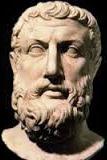
-475 11K-ft. Mount Etna on the E coast of Sicily begins erupting continuously, and both Pindar and Aeschylus describe it. Cimon captures Eion on the NE Greek mainland at the mouth of the Strymon River from the Persians after a long siege, then defeats the pirates on the island of Scyros; Athens sends cleruchs to both. The city of Carystus in Euboea is forced to join the Delian League. Gou Jian of the Yue kingdom surrounds the Wu Kingdom, causing the suicide of the Wu king Fu Cha. Haman the Agagite, a descendant of King Agag of the Jew-hating Amalekites works his way up to PM to Persian king Xerxes I (Ahasuerus), and in the 12th year of his reign talks him into ordering the annihilation of all the Jews in the 127 districts of the empire (Esther 3:7-13), but Esther (Heb. "hidden") ("I will surely hide [as-thir] my face on that day" - Deut. 31:18) braves instant death by approaching the king in his royal court without being summoned (Esther 4:1-17), and invites him to a banquet (Esther 5:1-8), where she reveals that she is a Jew, and gets Haman hung on the gallows that Haman had prepared for her uncle Mordecai (Esther 6:14-7:10), then gets the Jews saved (Esther chs. 8-9), and Mordecai raised to PM in Haman's place (Esther 10:1-3), causing Jews to begin celebrating the festival of Purim (Esther 9:20-32), hiding their faces in masks and dressing up in costumes; the reason that modern-day Jews won't use the name of God?; the Amalekites were the first nation to attack the Israelites after the Exodus, causing Jehovah to order their annihilation (Ex. 17:8-16), but Saul goofs and spares King Agag, causing Samuel to hack Agag to pieces (1 Sam. 5:2-33), but somehow some of his line survive, lusting for revenge, so Haman is just too good not to be true?; Mordecai then writes the Bible Book of Esther, which surprisingly never mentions God. Xerxes dies late in the year after 11 years of reign (counting co-reign), and his 16-y.-o. son Artaxerxes I Longimanus (d. -424) succeeds him as king of Persia, according to Thucydides, the historian Justin (III,1), and the Jehovah's Witnesses. Roman consuls: Publius Valerius Poplicola and Gaius Nautius Rutilus. Science: Iron finally comes into use in China. About this time Greek philosopher Parmenides of Elea (-515 to -445) founds (with Xenophanes) the Eleatic School of Philosophy, which considers the real to be motionless, and distinguishes between belief and knowledge, influencing Plato; he claims that the Moon shines by reflected light; "To think and to be is the same thing." Deaths: Greek philosopher Heraclitus (b. -535); leaves On Nature: "No man ever steps in the same river twice", "The path up and down are one and the same", and "All entities come to be in accordance with the Logos (word)."
-474 The Etruscan fleet is destroyed by the Greeks of Syracuse under tyrant Hieron I allied with tyrant Aristodemus of Cumae in the naval Battle of Cumae in S Italy, securing the independence of the Greeks in Italy; meanwhile the Gauls invade Italy from the N, and the Etruscans are crushed and disappear from history, with the region being absorbed by the Romans under the name Tuscia. Roman consuls: Lucius Furius Medullinus and Aulus Manlius Vulso.
-473 Roman consuls: Lucius Aemilius Mamercus and Vopiscus Julius Iullus.
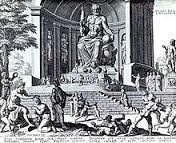
-472 The 77th Olympiad. Roman consuls: Lucius Pinarius Mamercinus Rufus and Publius Furius Medullinus Fusus. Theron of Acragas dies, and the alliance with Syracuse dies with him; his mean son Thrasydaeus succeeds as tyrant of Acragas; he is defeated and deposed by Hieron I of Syracuse, and both Acragas and Himera set up democracies; Hieron I becomes big boss of Sicily, known for cruelty, but also a patron of poets and philosophers incl. Pandar and Aeschylus, and a champion athlete, winning the chariot race at Delphi in -470 and at Olympia in -468 - the original Godfather? Architecture: The Doric Temple of Zeus in Olympia, Greece is begun (finished -456), complete with a giant 40-ft.-tall 22-ft.wide seated Statue of Zeus at Olympia (finished -435) by sculptor Phidias (Pheidias) (-480 to -430), which is later copied in the Abraham Lincoln Memorial in the U.S.; it is paid for by funds from the Elean defeat of Pisa; the architect is Libon of Elis. Plays: Aeschylus (-525 to -456), The Persians (Persae).
-471 Praxiergus becomes archon in Athens this year and next. Argos, Tegea, and all of Arcadia except Mantinea form an anti-Spartan alliance (until -469). Cimon gets Themistocles ostracised, causing him to flee to Argos and conduct anti-Spartan activity in the Peloponnese, possibly causing Elis to unite; in the 20th cent. C.E. more than 500 ostraka bearing Themistocles' name are dug up in Athens near the Acropolis and Agora. Roman consuls: Appius Claudius Crassinus Inregillensis Sabinus, Titus Quinctius Capitolinus Barbatus. Births: Greek Athenian "History of The Peloponnesian War" historian ("Father of Scientific History") Thucydides (d. -400) (-460 to -411 or -395?) in Halimous (Alimos) (Kalamaki), SW Greece; son of Olorus; owns gold mines opposite Thasos in Thrace.
-470 Roman consuls: Lucius Valerius Potitus and Tiberius Aemilius Mamercus. Hanno ("merciful") the Navigator (Hanno II of Carthage) makes a celebrated voyage beyond the Pillars of Hercules down the African coast as far as Senegal, Sierra Leone, Cameroon, Gabon, or Nigeria, establishing a dye manufacturing plant in Mogador (Mogadore) in Morocco; he first describes gorillas, describing them as a savage hirsute people whose males couldn't be captured and the three females that were were so vicious that they had to kill them and transport their skins instead - once you go black you'll never go back? Alfalfa is introduced by the Persians to the Greeks - along with a macrobiotic diet? Births: Chinese philosopher Mo Tzu (Mozi) (Mo Di) (d. -391).
-469 Argos captures Tiryns and destroys once-great Mycenae, but is defeated with its allies at the Battle of Tegea and the Battle of Diplaea, and Sparta restores its hegemony. Roman consuls: Titus Numicius Priscus and Aulus Verginius Caeliomontanus. Births: Greek (Athenian) plug-ugly philosopher (gay?) Socrates (d. -399) in Athens; son of sculptor Sophroniscus and midwife Phaenarete; sculpts a statue of the Three Graces which stands at the entrance to the Acropolis until the 2nd cent. C.E.?; father of the Maieutic (Gr. "midwife") Method of dialectic, based on "Socratic irony", an ironical profession of ignorance ("As for me, all I know is that I know nothing"); his main teaching is that all vice is ignorance, therefore no man is willingly bad, he just has to be enlightened with knowledge to act virtuously (he never heard of the Bible?); "How many things there are that I do not need" he exclaims, wearing one garment all year long and going barefoot in the snow; his student Plato writes down his ideas which otherwise would be lost since Socrates believes that writing distorts ideas, and writes nothing of his own - he could never have been a cop? Greek (Athenian) friend of Socrates Crito of Alopece (d. ?). Deaths: Spartan king Leotychidas II in exile.

-468
The 78th Olympiad.
Under Spartan pressure, Athens condemns Themistocles to death in absentia and sends officers to arrest him,
causing him to flee for safety from Argos to Corcyra, Epirus, and Macedonia.
Sophocles (-496 to -406)
wins the Athenian prize for drama over rival Aeschylus - it's a brand new day?
Zhou Yuan Wang dies, and Zhou Zhen Ding Wang (d. -441)
becomes Dong Zhou king #15 of China.
Persian king Artaxerxes I authorizes
-467 Roman consuls: Tiberius Aemilius Mamercus and Quintus Fabius Vibulanus. Hieron I dies, and his brother Thrasybulus (Thrasyboulos) becomes ruler of Syracuse for 10 mo. The Greek colonies of Rhegium and Taras in S Italy are defeated by the native Iapyges, who establish a democracy in Taras and expel the bean-eschewing Pythagoreans from all Italian Greek cities. Naxos attempts to withdraw from the Delian League, causing Athens to defeat them and force them to raze their city walls and surrender their navy; Athens now rules the Delian League completely, with its courts assuming jurisdiction in all disputes, and punishing rebel allies by confiscating lands and establishing an Athenian colony (cleruchy), consisting of unemployed Athenians; one-sixtieth of the League's tribute is dedicated to the Temple of Athena. Plays: Aeschylus (-525 to -456), Seven Against Thebes - starring Ulysses Brynner?
-466 Cimon of Athens defeats the Persians in the double naval-land Battle of the Eurymedon River on the S coast of Asia Minor (-469?) - don't they ever give up? Thrasybulus is overthrown, and expelled and a democracy set up; Hieron's supporters are allowed to settle at Imessa, while the original inhabitants of Catana are allowed to return home; rash Tyndaridas unsuccessfully attempts to establish a tyranny using the standing army, causing Syracuse to introduce petalism, their own form of ostracism, with ballots made of petala (leaves) instead of ostraka (potsherds); a gen. movement against oligarchies and toward democracies in the West is now underway? Roman consuls: Quintus Servilius Priscus and Spurius Postumius Albinus Regillensis.
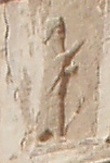
-465 Thasos attempts to leave the Delian League. Xerxes is assassinated by one of his courtiers (or his son), and his son Artaxerxes ("his reign is through truth") I Longimanus ("long hand" - right hand longer than the left) (-484 to -424) succeeds him as king of Persia (until -424) - long remaining is an art? A serious earthquake sparks the Messenian helots to revolt, starting the Third Messenian War (ends -461); the Spartans defeat them in battle, causing them to retreat to the stronghold of Mt. Ithome, causing Sparta to summon the Hellenic League, incl. Athens. After running a guerrilla war in the W Nile Delta since -411, Amyraeus of Sais (grandfather of the dude who takes over Egypt in -404) and Libyan chief Inarus (Inaros) (II) (grandson of Psametik III) begin an unsuccessful revolt against Persian satrap Artaxerxes II (ends -463). Roman consuls: Quintus Fabius Vibulanus and Titus Quinctius Capitolinus Barbatus.
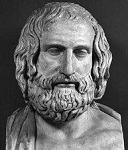
-464 The 79th Olympiad. Messina calls the Carthiginians for aid against Syracuse, sowing the seeds of the First Punic War. Themistocles arrives in Persia, where he spends a year studying Persian so that he can have an audience with Artaxerxes I. About this year Ionian-born Greek philosopher Anaxagoras of Clazomenai (-510 to -428) settles in Athens, bringing philosophy to it, becoming the teacher of Socrates, and the first to explain that the Moon shines due to reflected sunlight, that it has mountains, and might be inhabited; he rejects Empedocles' 4-element theory in favor of an infinite number of unique particles making up all objects, and introduces the cosmological concept of Nous (mind); proves that the Sun is matter not a divinity, going on to attempt scientific explanations of natural phenomena incl. eclipses, meteors, rainbows, the Sun (a mass of blazing metal larger than the Peloponnese), heavenly bodies (masses of stone torn from Earth and ignited by rapid rotation, too far away to feel their heat), and the Earth (flat, floating on "strong air", whose disturbances cause earthquakes); too bad, in -450 he is charged with impiety and forced into exile in Lampsacus in Troad in NW Anatolia despite his student Pericles speaking in his defense. Roman consuls: Aulus Postumius Albinus Regillensis and Spurius Furius Medullinus Fusus.
-463 Cimon of Athens crushes Thasos, then returns to Athens, where he is charged by Ephialtes (d. -461), head of the popular party (dem. opposition) with taking a bribe from Alexander I Philhellene of Macedon, but is acquitted. Artaxerxes I meets with Themistocles, and grants him sanctuary in Persia with honors, making him gov. of Magnesia. A series of conflicts leaves the mercenaries of the deposed Sicilian tyrants in possession of Messana (formerly Zancle). Roman consuls: Publius Servilius Priscus and Lucius Aebutius Helva.
-462 Ephialtes is elected ruler of Athens. Cimon leads an Athenian force to the Peloponnesus to help the Spartans against the Messenian helot rebels, but Sparta mistrusts their intentions and sends them home, insulting Athens and ending their alliance. Megara gets into a border war with Corinth, and appeals to Sparta for aid, but is rebuffed, causing the Megarians to ally with Athens; Athens makes hay while the sun shines and soon makes alliances with Thessaly and Argos. Roman consuls: Lucius Lucretius Tricipitinus and Titus Veturius Geminus Cicurinus. Deaths: Greek (Athenian) statesman-gen. Themistocles (b. -514) in exile in Persia.


-461 The Messenian stronghold of Mt. Ithome falls, ending their revolt (begun -465). Cimon is blamed for the Spartan insult of -462 and is ostracized, and Ephialtes gets the assembly to deprive the Areopagus council of all powers except jurisdiction in homicide cases, and divides the 6K-member popular court (heliaea) into juries of 201 or more; Ephialtes is then murdered by political opponents, and pointy-headed Pericles (-495 to -429) replaces him as head of the popular party, and is elected ruler of Athens, becoming the peoples' choice for the next 30 years, with his non-Athenian wife Aspasia by his side, launching the Age of Pericles; Pericles appoints sculptor-architect Phidias (Pheidias) (-480 to -430). as his gen. supt. of public works for Athens, commissioning him to erect splendid statues and bldgs., incl. the Propylaea, Parthenon, Statue of Zeus, and gold-ivory Statue of Athena Parthenos. The Athenians use Delian League tribute money and begin constructing the 4-mi.-long Long Walls connecting Athens and its main port of Piraeus (finished -457); destroyed in -404. The Qin (Ch'in) Kingdom (westernmost) attacks the Xirong and Dali. Roman consuls: Publius Volumnius Amintinus Gallus and Spurius Sulpicius Camerinus Cornutus.
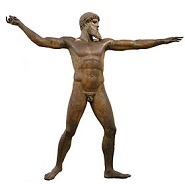
-460 The 80th Olympiad. The First Peloponnesian War (ends -445) begins between the Athenians and the Peloponnesians, who are pissed-off by pointy-headed Athens' alliance with Megara and Argos; meanwhile Athens sends a fleet of 200 ships to Egypt to aid its revolt against the Persians, defeating a Persian fleet on the Nile River and sieging the Persian army in the citadel of Memphis. Art: About this time the lifesize bronze Poseidon (Zeus) of Cape Artemision is sculpted, showing the Greek god hurling his trident or his thunderbolt at the east (Persians). Roman consuls: Publius Valerius Poplicola and Gaius Claudius Inregillensis Sabinus. Births: Greek Athenian Thirty Tyrants leader and tragedian Critias (d. -403) in Athens; son of Callaeschrus; uncle (great-uncle?) of Plato and friend of Socrates; appears in Plato's dialogues. Greek Sophist philosopher-mathematician Hippias of Elis (b. -399) in Athens. The original day-tripper and reason all doctors are hypocrites? Greek physician ("Father of Medicine") ("Asclypiad of Cos") Hippocrates (the Asclepiad) (d. -377) (d. -370?) on the island of Cos (Kos) in the Dodecanese (Gr. "twelve islands") in the SE Aegean Sea off the coast of Asia Minor; son of Heraclides and a mother who descends from Hercules?; student of Democritus and Gorgias; trained at the Asklepieion of Kos; after curing people in Thrace, Thessaly, Athens, Delos, and Cos, and refusing a delegation of Persians who attempt to bribe him away from Greece, he spends his last years in Larissa in Thessaly; his first biographer is 2nd cent. C.E. gynecologist Soranus of Ephesus - he had probable cause to be a hypocrite? Greek materialist (atomist) philosopher ("the Laughing Philosopher") ("the Mocker") ("Father of Modern Science") Democritus (Gr. "chosen of the people") of Abdera (d. -370) (b. -470?) in Abdera, Thrace; wealthy father leaves him great wealth, which he spends on world travels to Egypt, Asia, India, Ethiopia et al.; pupil of Leucippus; friend of Hippocrates; teacher of Protagoras.
-459 The Athenians defeat the combined forces of Corinth and Epidaurus at the Battle of Halieis, and win a V at the naval Battle of Cecryphaleia in the Saronic Gulf between Aegina and the coast of Epidaurus. The number of Roman tribunes is raised to 10. Roman consuls: Quintus Fabius Vibulanus and Lucius Cornelius Maluginensis Uritinus.

-458 Roman consuls: Lucius Quinctius Cincinnatus Pennus (dictator) and Gaius Nautius Rutilus. Aegina joins the Peloponnesian alliance against Athens, but their combined fleet is defeated at the Battle of Aegina; Athenian cmdr. Leosthenes lands on the island of Aegina and sieges it, causing the Corinthians to invade Attica in an attempt to make them raise the seige, but are defeated by a reserve force (home guard) of old men and boys under Myronides, then a 2nd Corinthian force is surrounded and annihilated in the Megarid. Pleistarchus dies, and Pausanias' son Pleistoanax (d. -409) becomes Agiad king of Sparta (until -409). Roman aristocrat Lucius Quinctius Cincinnatus (Lat. "curly hair") (-519 to -430) is called from his farm to become dictator of Rome and lead the army against the pesky Aequi from the E in the led by Cloelius Gracchus at the First Battle of Mount Algidus Pass in Latium (2nd in -431), then returns to the farm after the victory rather than seek power for himself; in 1783 C.E. a group of Continental Army officers in the U.S. forms the Society of the Cincinnati in his honor. Plays: Aeschylus (-525 to -456), Oresteia (trilogy) (only ancient Greek theater trilogy to survive to modern times); incl. Agamemnon, The Libation Bearers, and The Eumenides; how Trojan War CIC Agamemon, son of King Atreus of Mycenae has his daughter Iphigenia sacrified at Aulis to secure the favor of the gods for his voyage to kick Troy's butt after Prince Paris kidnaps Helen, wife of Menelaus; on his return his wife Clytemnestra and son Aegisthus murder him, and Clyt boasts that she would enjoy drinking a toast with her hubby's blood, causing his children Orestes and Electra to avenge him (Electra recognizes her long-lost brother Orestes by the fact that their footprints match); meanwhile witch Cassandra, daughter of Trojan king Priam spins her web in the wings?
-457 Aegina surrenders and turns its fleet over to the Athenians and joins the Delian League, causing the Spartans to enter the war and send an army across the Gulf of Corinth, restoring the Boeotian League under Theban hegemony; they defeat the Athenians at the Battle of Tanagra, but then screw up and return home, leaving the Athenians free to defeat the Boeotians at the Battle of Oenophyta, destroying the Boeotian League (until -447) and enrolling all Boeotian cities except Thebes in the Devilish, er, Delian League; Phocis (home of Delphi) (the Parnassus Mt. region W of Boeotia and N of the Gulf of Corinth) and Locris Opuntia (Opuntian Locrus, N of Phocis) also join; Pericles brings a Golden Age to Atheist-Free Athens, making the propertied hoplite zeugitai class eligible for the office of archon, and later the propertyless non-military thetes class; 25% of the 400K pop. are slaves; 20K slaves work in the silver mines of Laureion; Anaxagoras of Milegus becomes Pericles' teacher. The Long Walls (begun -461) connecting Athens and Piraeus are finished (demolished in -404). Roman consuls: Gaius Horatius Pulvillus and Quintus Minucius Esquilinus.
-456 The 81st Olympiad. A Persian force under Gen. Megabyzus defeats the Athenians at the citadel of Memphis in Egypt, causing them to retreat to the island of Prosopitis in the Nile Valley, then get sieged in turn. Roman consuls: Marcus Valerius Maximus Lactuca and Spurius Verginius Tricostus Caeliomontanus. Deaths: Greek playwright Aeschylus (b. -525); dies after an eagle drops a tortoise on his head?: "Everyone's quick to blame the alien."
-455 In Mar. Persian king (since -465) Artaxerxes I in his 10th year "sent forth the word to rebuild Jerusalem" (Dan. 9:20-27; Neh. 2:1-8), and authorizes the Jews to make their 2nd return to Jerusalem under high priest Ezra the Scribe, who gives a speech exhorting the people to follow the Torah Law and not intermarry with strange religions, and later writes the Book of Ezra; and First and Second Chronicles; this is a key year if you believe in Millennial Bible Chronology; the Jehovah's Witnesses consider this to be the 20th year of Artaxerxes I; the walls of Jerusalem are commissioned to be rebuilt, and the prophecy of the 70 weeks of years in Daniel 9:24-25 begins fulfillment, leading up to the baptism of Jesus in 29 C.E. (69 weeks of years = 483 years) (Luke 3:1-2;21-22, Dan. 9:1-4, Jer. 29:10), followed by his death in 33 C.E. (Mark 10:45) - and three more years for the Jews to accept him before they let gentiles in? Athenian gen. Tolmides talks the govt. into giving him a fleet with 4K soldiers to cruise around the Peloponnesus, and he raids the coast and burns the Spartan naval base at Gytheum (Gytheion) (Gytheio), in Laconia then recruits Achaea into the Delian League. Roman consuls: Titus Romilius Rocus Vaticanus and Gaius Veturius Cicurinus. Plays: Euripides (-480 to -406), Peliades (The Daughters of Pelias) (first play); fails to win the Dionysia.

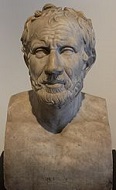
-454 The Athenians holed-up on Prosipitis in Egypt are defeated after an 18-mo. siege, with all but a few killed or captured; a relief expedition of 50 ships is destroyed, causing the treasury of the Delian League to be moved from Delos to Athens; the revolt of the Egyptians, aided by the Athenians is put down by the Persians. Pericles becomes strategos (military commander) of Athens, and leads a force which lands in Sicyon and defeats the Sicyonians; he is then joined by the Achaean League, and unsuccessfully tries to take Oeniadea on the Corinthian Gulf, then returns to Athens. Alexander I dies, and Perdiccas (Perdikkas) (Perdica) II (d. -413) becomes king of Macedonia (-448 to -413)?. The Sicels under Ducetius (d. -440) defeat the mercenaries controlling Messana, and establish the federal capital of a Sicel state at Menaenum, which later moves to Palice. Greek epic poet Panyassis (Panyasis) of Halicarnassus is executed in the Persian Doric colony of Halicarnassus in SW Asia Minor by the tyrant Lygdamis II for conspiracy, causing his 20-something nephew Herodotus to flee into exile to the Greek island of Samos, under Athenian control. Roman consuls: Spurius Tarpeius Montanus Capitolinus and Qulus Aeternius Varus Fontinalis.
-453 The towns of Segesta and Halicyae in Sicily start a war with Selinus (Selinunte) in SW Sicily, then ask Athens for an alliance, which they grant. Roman consuls: Sextus Quinctilius and Publius Curiatius Fistus Trigeminus.
-452 The 82nd Olympiad. The Roman decemvirs move the month of February from the end of the year to the month after January; it stays 29 days long (truncated to 23, 24, or 27 days at certain intervals) until one of its days is transferred to the month of August in the Julian Calendar, making it the only month in which no full moon is a possibility (e.g., 1999, 2018 C.E.). Roman consuls: Titus Menenius Lanatus and Publius Sestius Capitolinus Vaticanus.
-451 Cimon returns to Athens after 3 years of exile, and negotiates a 5-year truce with Sparta; Argos loses Athenian protection and is forced to make a 30-year peace with Sparta. In Athens jurors (dicasts) in the popular courts are issued compensation, allowing poor citizens to serve. Pericles passes a law limiting the right to vote to those who can trace their Athenian lineage through both parents (repealed in -429, reenacted in -403). After a long struggle by the plebeians to have the patricians write the laws down so that they could not change them by pulling on the ropes and stuff, the Twelve Tables (originally 10 tables until -450) are written by the 10-patrician Decemviri Lat. "10 men") (Ten Consuls), appointed in place of the ordinary magistrates, giving Rome a basic law code, the Decemviral Code (Law of the Twelve Tables), becoming the basis of all Roman law, prescribeing a 2.5 ft. interval between houses, which breaks down during the rapid expansion after 390 B.C.E., causing the building of unsafe 5-6 story slum tenements (insulae) separated by 12-ft.-wide streets where wheeled traffic is forbidden during daylight. Roman consuls: Appius Claudius Crassus Inregillensis Sabinus and Titus Genucius Augurinus.


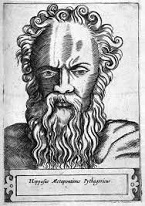
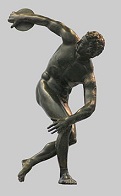
-450 A large Athenian force led by Cimon goes to Cyprus, and defeats the Persians at the Battle of Salamis in NE Cyprus, then sieges the city of Citium (until -449). Syracuse and Acragas defeat the Sicels under Ducetius at the Battle of Noae; Ducetius is banished to Corinth (until -446), causing the Sicel federation to fall apart. After plebeian agitation two more tables are added to the law tables, giving 12 total. About this time the Pythagoreans in S Italy are violently stamped out. Gashmu (Gashem) becomes king of Qedar in N Arabia (until -430); mentioned in Nehemiah 6:6? About this time Greek philosopher (Parmenides of Elea's pupil) Zeno of Elea (-495 to -435) from Elea (Velia), Italy formulates his mathematical Zeno's Paradoxes, becoming the first to use the reductio ad absurdum argument. About this time Greek Pythagorean philosopher Hippasus of Metapontum (b. -530) dies after discovering the irrational numbers; the gods drown him at sea for divulging his discovery? About this time the La Tene (Tčne) Culture (ends 1st cent B.C.E.) develops from the Iron Age Hallstatt Culture on the N side of Lake Neuchatel in Switzerland, as discovered in 1857 by Hansli Kopp, and spreads to E France, Switzerland, Austria, SW Germany, Czech., Slovakia, and Hungary, being influenced by Greek and Etruscan culture; meanwhile the Jastorf Culture (ends 1st cent. B.C.E.) develops in N Germany; about this time the first Celtic invasions of Italy and the British Isles begin, incl. the Boii, who migrate from N of the Alps and settle in the Po Valley - how many years to William Wallace? The Andalusian horse or Iberian warhorse is developed in Spain; it is interbred with the desert Barb horse of North Africa, creating a unique breed by the 15th cent. C.E., right before the Spanish discover the New World and bring them over. About this time Greek materialist (atomist) philosopher Leucippus (d. -420?) flourishes, becoming the teacher of Democritus of Abdera, uttering the immortal soundbytes: "Everything is driven by necessity", and "Nothing is created by coincidence (at random), rather there is reason and necessity for everything." Architecture: About this time the Temple of Apollo Epicurius is built in Bassae (Gr. "little vale in the rocks") in Arcadia in NE Messenia, Greece. Emain Macha (Gael. "Macha's Neck Brooch", "Macha's Twins") (Navan Fort) is built in County Armagh, Northern Ireland. Art: About this time the bronze sculpture The Discobulus (Gr. "discus thrower") is finished by Greek sculptor Myron of Eleutherae, becoming famous and spawning Roman copies, which is good since the original is lost; in 1781 the Discobulus Palombara, a 1st cent. C.E. copy is discovered on the Esquiline Hill in Rome; in 1937 it is acquired for 5M lire by Adolf Hitler, who displays it in the Glyptothek in Munich, Germany until the end of WWII, after which it is returned in 1948; in 1790 another copy is discovered in Hadrian's Villa. Births: Greek Athenian gen.-statesman Alcibiades (d. -404) in Athens; son of Cleinias; nephew of Pericles; last of the Alcmaeonidae; known for flip-flopping his political allegiance multiple times. Indian Nanda king #1 Mahapadma Nanda (d. -362). Deaths: Greek dramatist Epicharmus of Kos (b. -540). Greek philosopher Hippasus of Metapontum (b. -530); drowned at sea by the gods as punishment for divulging his discovery of irrational numbers?
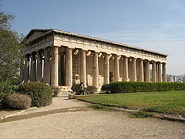
-449 Cimon dies of disease during the siege of Citium, and the Athenians run low on supplies and return home. The Second Sacred War (ends -448) begins when Sparta takes Delphi from Phocis and makes it independent, causing Athens to intervene. The Delian League led by Athens and Persia sign the the Peace of Callias; the Persians give up the coast of Asia Minor in return for an Athenian promise not to invade Persian territory, ending the Persian Wars (begun -500) - I'm happy with who I am? The second Decemviri (Appius Claudius Crassus Inregillensis Sabinus, Marcus Cornelius Maluginensis, Marcus Sergius Esquilinus, Lucius Minucius Esquilinus Augurinus, Quintus Fabius Vibulanus, Quintus Poetelius Libo Visolus, Titus Antonius Merenda, Kaeso Duillius Longus, Spurius Oppius Cornicen, Manius Rabuleius) overreach themselves, attempt a patrician counter-rev., and have to be forcibly disbanded after another plebe march to the Sacred Mount; lead decemvir Appius Claudius commits suicide in prison; the new patrician consuls Lucius Valerius Potitus and Marcus Horatius Barbatus pass the Valerio-Horatian Laws, establishing the right of appeal of magisterial decisions (provocatio), and affirming the inviolability of tribunes and aediles. Roman consuls: Lucius Valerius Potitus and Marcus Horatius Barbatus. Architecture: The Doric Temple of Theseus (Theseion) (Theseum) on the NW end of the Agora in Athens on the Agoraios Kolonos Hill is begun (finished -415), later becoming the Temple of Hephaestus, and suviving to modern times. Deaths: Athenian gen.-statesman Cimon (b. -507).
-448 The 83rd Olympiad. Athens takes Delphi from the Spartans and restores it to the Phocians, ending the Second Sacred War (begun -449). The rebuilding of the Acropolis (destroyed in -480) begins (ends -433). Roman consuls: Spurius Hermenius Cortinesanus and Titus Verginius Tricostus Caeliomontanus. Births: Greek comedian ("Father of Comedy") ("Prince of Ancient Comedy") Aristophanes (d. -380) in Athens; son of poor man Philippos; comes from the same Kudathenaion deme as Cleon.


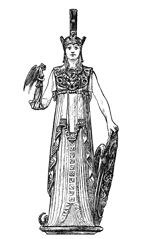
-447 Boeotia revolts from the Delian League, and the Athenians send an inadequate force, which is crushed at the First Battle of Coronea (2nd in -394); the Boeotian League is reestablished with a federal assembly based on proportional city rep., and oligarchies are set up in all Boeotian cities; Phocis and Locris also quit the Deleterious Delian League. Quaestors begin to be popularly elected in Rome rather than appointed by consuls. Herodotus settles in Athens after lengthy travels around Greece and Asia Minor, incl. Aegina, Cerigo, Crete, Cyprus, Delos, Paros, Rhodes, Samothrace, Thasos, Persia (Sardis to Susa), the W shore of the Black Sea to the mouth of the Dnieper River, Thrace, Scythia and Egypt, giving public readings of his in-progress historical works which wow the white is right Greek brain men, esp. poet Sophocles (-496 to -406), who becomes his friend. The Chu kingdom brings an end to the Cai. Roman consuls: Marcus Geganius Macerinus and Gaius Julius (Iullus). Architecture: I should have known better with a girl like you? The Doric Parthenon (Gr. "virgin's apartments") temple of Athena on the Acropolis in Athens is begun (finished in -438), designed by Greek architects Ictinus (Iktinos) and Callicrates (Kallicrates), with sculpture by Phidias (Pheidias) (-480 to -430), who begins the Athena Parthenos (Athena the Virgin) chryselephantine (gold-ivory) sculpture housed in the Parthenon; uses fine marble from Mt. Pentelikon (Pentelikón) in Attica NE of Athens; below the Acropolis are a number of sacred caverns, incl. the seat of the Cumaean Sibyl. Births: Roman gen.-statesman Marcus Furius Camillus (d. -365). Deaths: Greek painter Polygnotus (b. -490).

-446 Roman consuls: Titus Quinctius Capitolinus Barbatus and Agrippa Furius Fusus. In the fall Athens receives a free gift of grain from Egypt, and revises its citizenship rolls, removing 5K names. In Dec. after Athens finally recognizes the growing power of Sparta, the Athenians and Spartans conclude a Thirty Years' Peace, with Athens giving up political power over the states on the Greek mainland in exchange for Sparta recognizing the Athenian empire; Megara is returned to the Peloponnesian League; Troezen and Achaea become independent; Aegina becomes autonomous but also a tributary to Athens, with disputes to be settled by arbitration. Euboea revolts, and an Athenian army led by Pericles sets out to put it down, but is forced to return after a Peloponnesian invasion of the Megarid begins, driving out the Athenian garrison; the Peloponnesians reach Eleusus but withdraw after coming to terms with the Athenians, allowing Pericles to cross back to Euboea, put down the revolt, and establish a cleruchy in Histaiaea. Ducetius returns to Sicily. The Volscians and Aequians revolt in Rome, setting up a base in Corbio and launching raids into Roman territory, causing a Roman army led by consults Titus Quinctius Capitolinus and Furius Agrippa Fusus to attack them with three infantry and one cavalry divs.; when Agrippa's left wing begins faltering, Agrippa chucks the battle standards over the enemy lines, forcing his men to fight and win to recover their honor. Pericles founds an Athenian colony at Thourioi (Thurii) (Thurium) in Magna Grecia upriver from the former Sybaris in Magna Graecia (S Italy), and stocks it with colonists from all over Greece, incl. Greek historyscoper Herodotus, who spends the last 20 years of his life there reminiscing about his extensive travels and writing his history; Sicilian-born Greek eclectic vegetarian philosopher (last to write in verse) Empedocles of Acragas (Agrigentum) (-490 to -430) visits Pericles' new Athenian colony, going on to establish the four elements (roots) incl. Fire (Zeus), Air (Hera), Water (Nestis), and Earth (Aidoneus), which are brought into union and parted by the divine powers of Love and Strife; they started in an original pure state in a sphere; he claims that light streams out of our eyes and touches objects, and believes in the transmigration of the soul; he commits suicide by throwing himself into the active volcano at Mount Etna in Sicily to make his disciples believe that he is immortal.
-445 Roman consuls: Marcus Genucius Augurinus and Gaius (Agrippa) Curtius Philo. Early in the year the 30-year truce between Athens and Sparta is finalized; anti-Spartan forces attempt to get Pericles ostracized, but he turns the tables and gets opposition leader Thucydides, son of Melesias ostracized instead, and basks in his own sunlight while sponsoring great building and cultural programs equal to his high high crown. Syracuse and Acragas fight over the division of territory from the former Sicel federation, and Syracuse wins, becoming the top dog in sizzling Sicily. The Lex Canuleia (Lex de canubia patrum et plebis, permitting marriage (conubium), with children inheriting the father's status, proposed by pleb tribune Gaius Canuleius is passed in Rome despite fierce opposition by the patricians and their consuls until the plebs go on a military strike and refuse to defend Rome; a proposal to permit plebs to become consuls is prevented by Senator (consul in -460) Gaius Claudius Sabinus Regillensis, who gets a proposal substituted to allow the election of military tribunes with consular power, which is done next year; "So that, you see, if Miss Plebs wanted Mr. Patrician to marry her, and he said he couldn't, she probably replied: 'Oh yes, you can, you liar!' " ("Goodbye, Mr. Chips", 1939) This is the 20th year of Artaxerxes I, when the walls of Jerusalem are commissioned to be rebuilt. The Chu kingdom brings an end to the Ji. Births: Greek Cynic philosopher Antisthenes (d. -365) in Athens; disciple of Socrates; eacher of Diogenes of Sinope; founder of the Cynic School of philosophy, which rejects all conventional desires and believes in living a simple life free from possessions. Persian king (-404 to -358) Artaxerxes ("whose reign is through truth") II Mnemon ("exceptional memory") (d. -358); eldest son of Darius II; birth name Arsames. Deaths: Greek philosopher Parmenides of Elea (b. -515).
-444 The 84th Olympiad. In Sept. the walls of Jerusalem are completed. Two patrician censors are established in Rome, along with military tribunes (possibly plebeian) with consular power, who alternate irregularly with consuls until -363 or -367. Roman consuls: Aulus Sempronius Atratinus and Lucius Atilius Luscus and Titus Cloelius Siculus.
-443 Rhegium, Leontini, Catana, and Naxos ally with Athens as a counterweight to Syracuse. About this time Nehemiah (Heb. "Jehovah comforts") "founded a library and collected books about the kings and prophets, and the writings of David, and letters of kings about votive offerings" (Neh. 2:13-5), writing the Book of Nehemiah, which by -400 is combined with the Book of Ezra. Roman consuls: Marcus Geganius Macerinus and Titus Quinctius Capitolinus Barbatus.
-442 Roman consuls: Marcus Fabius Vibulanus and Postumius Aebutius Helva Cornicen. Deaths: Greek lyric poet Pindar (b. -518).

-441 Miletus and Samos go to war, and Miletus appeals for aid to the Athenians, who intervene and replace the oligarchy in Samos with a democracy. Zhou Zhen Ding Wang dies, and Zhou Ai Wang (d. -441) becomes Dong Zhou king #16 of China; he dies, and Zhou Si Wang (d. -440) becomes Dong Zhou king #17 of China. 40-y.-o. Euripides (-480 to -406) wins the Athenian (Attic) prize for drama after 14 years of trying; he wins again only 4x - that really rips me up to my knees? Roman consuls: Gaius Furius Pacilus Fusus and Manius Papirius Crassus.



-440 The 85th Olympiad. Roman consuls: Proculus Geganius Macerinus and Titus Menenius Lanatus. Samos revolts against Athens and throws out the forced democracy, causing the Athenians to siege it. Ducetius restores the Sicel federation in Sicily, then dies, and Syracuse breaks it up and destroys the capital of Palice. There is a famine in Rome; wealthy plebeian Spurius Maelius (d. -439) attempts to found a popular tyranny upon it, but is assassinated next year. Zhou Si Wang dies, and Zhou Kao Wang (d. -425) becomes Dong Zhou king #18 of China. Heracleitus declares that dreams are not supernatural journeys. About this time Abdera, Thrace-born Greek philosopher (Democritus' pupil) Protagoras of Abdera (-490 to -420) becomes the first Sophist (Gr. "sophistes" = one who does wisdom), with the immortal soundbyte: "Man is the measure of all things: of things which are, that they are, and of things which are not, that they are not"; their practice of charging young nobles for education in wisdom pisses-off Socrates, who calls them specious or deceptive. Architecture: The Temple of Poseidon in Cape Sounion S of Athens is completed to replace the one destroyed by Xerxes I's Persian troops in -480, replacing a Persian trireme captured at the Battle of Salamis. Art: About this year the bronze Doryphoros (Spear-Bearer) statue is cast by Greek sculptor Polykleitos (Polycletus) (Polycleitus) (Gk. "much renowned") of Sicyon/Argos, becoming one of the first examples of contrapposto (the figure rests most of his weight on one foot); the original is lost, and only marble copies survive. Nonfiction: Malachi (Heb. "my messenger"), the last book of the Hebrew scriptures is written about this time; Jehovah speaks no more for 400+ years, but when Jeezey comes along, his fulfillment of all them oldy moldy prophecies makes for quite a splash among the gentiles, if not the Jews? Plays: Sophocles (-496 to -406), Ichneutae (Searching Satyrs); satyr play; Antigone; too bad he didn't write one for her sister Ismene? Births: Athenian orator-statesman Andocides (Andokides) (d. -390).
-439 Lucius Quinctius Cincinnatus becomes dictator of Rome for a 2nd time (first in -458). Athens takes Samos, razes its walls and confiscates its fleet, leaving Chios and Lesbos as its only allies in the Delian League who can contribute ships. Roman consuls: Lucius Quinctius Cincinnatus (dictator) and Agrippa Menenius Lanatus and Titus Quinctius Capitolinus Barbatus.

-438 Fidenae (9 mi. N of Rome) revolts, killing the Roman ambassador and reverting to their Hatfield-McCoy-style hatred of Romans (until -426). The Parthenon (begun -447) on the Athenian Acropolis, dedicated to Athena Parthenos is completed; the statue of Athena by Phidias (Pheidias) (-480 to -430) is dedicated; there are few straight lines, all the steps are of different sizes, and the distance between each of the Doric (baseless) columns in the peristyle varies, all to give an illusion of strict balance. Spartacus of Thrace overthrows the Archaenactidae Dynasty (founded -480) and founds the Kingdom of the Cimmerian Bosporus (Bosporan Kingdom) (ends 370 C.E.) in E Crimea and the Taman Peninsula on the shores of the Kerch Strait, ruled by the Spartocid Dynasty (ends -110). Roman consuls: Mamertus Aemilius and Lucius Quinctius Cincinnatus and Lucius Julius Iullus. Plays: Euripides (-480 to -406), Alcestis; she sacrifies her life for her hubby King Admetus of Thessaly, then is rescued from Hades by Hercules.

-437 The Athenians found the city of Amphipolis in E Thrace (home of the ancient Edoni people), controlling the mines of Mt. Pangaeus. Pericles leads an expedition into the Euxine and establishes good relations with Panticapaeum (modern-day Kerch) on Mount Mithridates in the Tauric Chersonese (founded -600), a source of grain. Athenian strategos Phormio makes an alliance with the Acarnanians in the Gulf of Corinth. Athenians settle cities in the Pontus. Roman consuls: Mamertus Aemilius Mamercinus (dictator) and Marcus Geganius Macerinus and Lucius Sergius Fidenas. Architecture: The Propylaea (Propylea) (Propylaia) (Gr. "pro" + "pyle" = before the gates) monumental gateway to the Acropolis is begun by Mnesicles (Mnesikles), who quits in -432 before it is finished.

-436 The 86th Olympiad. About this time Greek sculptor Agoracritus (Agorakritos) (born on Paros) becomes the favorite pupil of Phidias, their work later being confused; he sculpts the colossal Nemesis of Rhamnus, starting with a statue of Aphrodite which loses a contest with rival Alcamenes. Roman consuls: Lucius Papirius Crassus and Marcus Cornelius Maluginensis.
-435 The Corinthian-Corcyrean War (ends -432) begins when Corcyra (Corfu) in NW Greece objects to Corinthian interference with their joint colony of Epidamnos (Epidamnus) (founded -627) (later Dyrrachium) (modern-day Durazzo or Durrës or Durres on the Albanian coast 30km W of Tirana), and calls on Athens for help after an initial V against the more powerful state only makes them madder. The Etruscan town of Fidenae on the Via Salaria 5 mi. N of Rome is finally conquered by the Romans after ages of ill will and feuding. Roman consuls: Quintus Servilius Priscus Structus Fidenas (dictator) and Gaius Julius and Lucius Verginius Tricostus. Art: The Statue of Zeus at Elis is completed by the sculptor Phidias (Pheidias) (-480 to -430). Births: Greek Socratic philosopher Eucleides (Euclides) (Euclid) of Megara (d. -365) in Megara; pupil of Socrates; founder of the Megarian School of Philosophy in Megara in N Isthmus of Corinth opposite Salamis Island. Greek hedonist philosopher Aristiuppus of Cyrene (d. -356) in Cyrene, Libya; founder of the Cyrenaic school of philosophy, which considers individual sensual pleasure the greatest good - hard or gentle strokes? Deaths: Greek philosopher Zeno of Elea (b. -495).
-434 Roman consuls: Gaius Julius Iullus and Lucius (Proculus) Verginius Tricostus.
-433 Pericles concludes a defensive alliance with Corcyra, and renews alliances with Rhegium and Leontini in the W; meanwhile Corinth, Megara, and Aegina appeal to Sparta to take arms against Athens. Roman consuls: Mamertus Aemilius Mamercinus (dictator) and Marcus Fabius Vibulanus and Marcus Folius Flaccinator and Lucius Sergius Fidenas.
-432 The 87th Olympiad. In the spring the Corinthian colony (a subject of Athens) of Potidaea in the Chalcidice (founded in -600) revolts against Athens, backed by the Peloponnesian League, causing Athens to pass the Megarian Decree excluding Megarian merchants from Athenian harbors and markets; Megara, Corinth and Aegina pressure Sparta, and the ephor Sthenelaidas convinces the assembly over King Archidamus II' opposition to declare the Thirty Years' Peace broken, and declare war against Athens, causing fruitless negotiations with Athens all winter, and beginning the First Peloponnesian War between (ends -404); barefoot philosopher Socrates serves as an infantryman with conspicuous bravery at Potidaea, and saves Pericles' nephew Alcibiades. On June 27 the summer solstice (New Year) is observed in Athens by Meton of Athens, who on July 13 introduces the Metonic Cycle for intercalation, based on the observed period of 19 tropical years being equal to 235 synodic months (6,940 days), which becomes the basis for the 19-year cycle of the Hebrew calendar. Roman consuls: Lucius Pinarius Mamercinus and Lucius Furius Medullinus and Spurius Postumius Albinus (Regellensis).




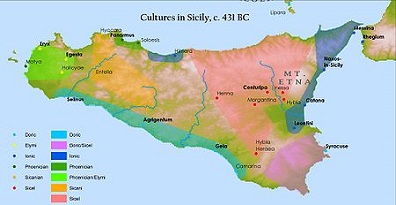
-431 Roman consuls: Titus Quinctius Pennus Cincinnatus and Gaius (Gnaeus) Julius Mento. In Apr. B.C.E. a fifth column of 300 Thebans unsuccessfully attacks Plataea, the only pro-Athenian city in Boeotia, with the Plataeans taking 180 POWs and putting them to death, after which Athens supports Plataea and Sparta supports Thebes, enlisting the help of the Greek cities in Sicily and Italy, while both sides appeal to Persia for help in vain; making use of accusing the Athenians of crowing about saving Greece at the Naval Battle of Salamis while increasingly imposing an extortion racket, Archidamus II of Sparta gains support by calling for the liberation of the Hellenes from Athenian despotism, launching the Second Pelopponesian War (ends -404); the Spartan war strategy is to burn the fields of Attica to lure the Athenians into a land battle, while Pericles' strategy is to sit it out in Athens, protected from starvation by the Long Walls connecting them with the port of Piraeus, and wear out the Spartans with naval raids, replacing the pop. of Aegina Island with Athenians; after 30 years of Pericles, famous adm.-gen. Phormio is elected ruler of Athens when an expedition under Pericles' command fails, and Cleon seizes on it to prosecute him, and Plutarch accuses Pericles of starting the war to revive his fading popularity, causing Pericles to be suspended from command and fined; Spartan gen. Brasidas (d. -422) first distinguishes himself by courage shown relieving the seaport town of Methoni (Methone) in Pieria from a hostile attack - his ass is made of brass? Greek Athenian gen. Thucydides begins writing "History of the Peloponnesian War"; on Aug. 3 "At last all was ready, and they were on the point of sailing away, when an eclipse of the Moon, which was then at the full, took place" (total solar eclipse) (Thucydides); he records another eclipse seven years later on Mar. 21, -424, and a 3rd eclipse 11 years after that on Aug. 27, -413; in 1907 C.E. Russian mathematician Nikolai Alexandrovich Morozov (1854-1946) claims that the first eclipse occurred on Aug. 2, 1133 C.E., and Russian mathematician Anatoly Fomenko (1945-) uses this to back his claim that all of ancient chronology is moose hockey, and that Jesus Christ was born in the 12th cent. C.E. - TLW needs to create an All New Revised Historyscope, yikes, he hopes not? On June 18 after Rome declares war on the pesky Aequi from the E and Volsci from the W, and the consuls can't agree on a dictator, and consul Titus Quinctius Cincinnatus Pennus nominates his father-in-law Aulus Postumius Tubertus, the Romans decisively defeat them at the Second Battle of Algidus Pass (first in -458), becoming the last major battle with the Aequi, after which Postumius receives a triumph; too bad, Postumius' son is so eager to attack that he abandons his post, causing daddy to have him put to death - that was my favorite dog? The Chu Kingdom in China eliminates the Lu Kingdom. Empedocles propounds the theory that the Universe consists of four elements: earth, fire, air, and water, which are ruled by the forces of attraction (love) and repulsion (strife), and that human body has four humors (humours): blood, bile, black bile and phlegm - no good humor? Architecture: The first Temple of Apollo is dedicated in Rome in the Campus Martius, the parade ground between the N bend of the Tiber Riber and the Quirinal and Capitoline hills, where city development has been overflowing into. Plays: Euripides (-480 to -406), Medea, enters it in the festival of Dionysos, and comes in last (3rd); first place goes to Euphorion; one of his few plays with a steadily-developing plot. Births: Greek "Anabasis" lover-fighter-scholar-historian ("the Attic Muse") Xenophon (Gr. "foreign voice") of Athens (d. -354) in Athens; student of Socrates.
-430 Plague breaks out in Rome. Pericles is reelected ruler of Athens; the first known visitation of plague (smallpox?) (scarlet fever?) breaks out in overcrowded Athens after entering through the port of Piraeus, killing 25% of the pop., spreading to the army besieging Potidaea; Pericles' eldest son dies, followed by his sister and another son; in Aug. Pericles sends a peace mission to Sparta without success; he gives the Funeral Oration for all the Athenians killed during the first year of the Peloponnesian War, becoming a classic defense of Greek democratic ideals, incl. the value of free discussion as a condition for a wise action (the most eloquent oration in human history?); late in the year Potidaea falls to Athens. Young Tharrhypas (d. -392) (ancestor of Alexander III the Great) becomes king of Epirus, introducing Athenian culture to the Molossians. Qaynu becomes king of Qedar in N Arabia (until -410). Abkarib I (d. -415) founds the kingdom of Main in S Arabia (ends -55). Roman consuls: Lucius Papirius Crassus and Lucius Julius Iullus. About this time Greek painter Agatharchus from Samos invents scene painting, and is the first to use perspective on a large scale? About this time Sophron of Syracuse composes mimes in the Doric dialect, which Plato later introduces to Athens. Science: About this time Greek sophist Hippias of Elis discovers the mathematical Quadratix of Hippias (Dinostratus), used for angle trisection. About this time Greek Pythagorean philosopher Philolaus of Croton (-480 to -385) of Croton in Magna Grecia (S Italy) gets the credit for originating the theory that the Earth is not the center of the Universe; he claims that humans have immortal souls which are imprisoned as a punishment for bad behavior during life. Births: Sicilian tyrant Dionysius the Elder (d. -367); of humble birth, works as a govt. clerk until his coup of -405. Deaths: Roman gen. Lucius Quinctius Cincinnatus (b. -519). Greek sculptor Phidias (b. -480); dies in prison for embezzlement of gold appropriated for a statue of Athena?; dies in banishment?; dies in prison for impiety for putting his and Pericles' portraits on Athena's shield?
-429 In Sept. after one-third to two-thirds of the pop. of Athens dies of the plague while orgying free at last from fear of the gods, Pericles (b. -495) dies of the plague., and Cleon (Gr. "renowned") (-475 to -422) is elected ruler of Athens; Socrates shows more bravery at Potidaea. In the fall Phormio wins naval battles against two Peloponnesians fleets at the Battle of Chalcis and the Battle of Naupactus. Roman consuls: Hostus Lucretius Tricipitinus and Lucius Sergius Fidenas. Deaths: Athenian statesman Pericles (b. -495) in Sept. in Athens (plague): "Just because you do not take an interest in politics doesn't mean politics won't take an interest in you."
-428 The 88th Olympiad. Roman consuls: Aulus Cornelius Cossus and Titus Quinctius Cincinnatus Pennus. In June Mytilene, chief city of Lesbos revolts against Athens. Plays: Euripides (-480 to -406), Hippolytus; debuts in the Dionysia; Hippolytus, son of the Amazon Hippolyta after her rape by King Theseus of Athens agonizes over the conflict between asceticism and sexual desire, swearing chastity and honoring Artemis instead of Aphrodite, who gets even by inspiring his stepmother Phaedra to fall in love with him, causing her to starve herself to die with honor. Deaths: Greek philosopher Anaxagoras of Clazomenae (b. -510) in Lampasacus (in exile): "Appearances are a glimpse of the unseen"; "The seed of everything is in everything else"; "The descent to Hades is the same from every place."

-427 Roman consuls: Gaius Servilius Structus Ahala and Lucius Papirius Mugillanus. In July after Spartan adm. Alcidas helps the Lesbos rebels but flees at the sight of Athenian warships, Lesbos goes down, er, falls. Archidamus II dies, and his son Agis II (d. -401) becomes Eurypontid king #18 of Sparta; the Spartans score their first V with the capture of Plataea. A war breaks out in Sicily (ends -424), with Syracuse, Gela, Messana, Himera, Lipara and Locri vs. Naxos, Catana, Leontini, Rhegium, Camarina and the Sicels; Gorgias of Leontini goes to Athens to appeal for aid, which is granted. Nonfiction: The Hindu astronomical Siddhantas (Sansk. "Doctrine/Tradition") begin to be compiled, containing the Hindu numerals and zero. Plays: New Athenian playwright Aristophanes (-448 to -380) takes 2nd place in the Theater of Dionysus with his first play The Banqueters. Births: Greek flatulent philosopher ("Father of Western Philosophy") (founder of the Academy in Athens) Plato (Gr. "broad") (real name Aristocles) (d. -347) (b. -428?) (d. -348?) (AKA Eflatun, meaning spring of water or knowledge) on May 21 in Athens; student of Socrates; son of wealthy aristocrats Ariston and Perictione; relative of politician Critias; first to propose that the brain is the seat of mental processes, and to propose the Great Chain of Being.
-426 In June after Athenian gen. Demosthenes (d. -413) and the demagogue Cleon revitalize Athen's military, and rich merchant Nicias (d. -413) turns gen. and leads a middle class revolt against them, Demosthenes raises an army in Acarnania while Nicias invades Thebes by way of Tanagra (suggesting a great Star Trek episode idea?); Demosthenes is ambushed by Aetolian natives and escapes to Naupactus, defending it from Spartans sent from Delphi under Eyrylochus; Demosthenes then defeats the Spartans at Olpae and Idomene, returning in triumph to Athens; Messina (Messana), lost since -493 is retaken by the Ionians under Nicias. The democratic faction of Corfu massacres Spartan supporters and secures the island for Athens. The Romans conquer pesky Fidenae again, and sell the pop. into slavery, turning it into a small village with a large amphitheater by ?. Roman consuls: Mamertus Aemilius Mamercinus (dictator) and Titus Quinctius Poenus Cincinnatus and Gaius Furius Pacilus Fusus and Marcus Postumius Albinus Regillensis and Aulus Cornelius Cossus.

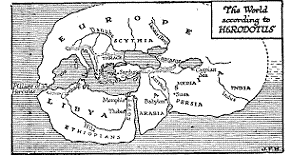
-425 Roman consuls: Aulus Sempronius Atratinus and Lucius Quinctius Cincinnatus and Lucius Furius Medullinus and Lucius Horatius Barbatus. Demosthenes captures Pylos (modern-day Navarino) on the W coast of the Peloponnesus on the Coryphasium promontory at the N entrance to Pylos Bay (home of legendary heroes Neleus and his son Nestor), then after reinforcements under Cleon arrive, he defeats the Spartans at the naval Battle of Pylos (Navarino Bay) in Messenia, then sphincters, er, cuts off a stranded Spartan force on the neighboring island of Sphacteria (modern-day Sphagia) at the Battle of Sphacteria; 120 Spartan hostages are held to prevent another invasion of Attica, and the Spartans sue for peace, but Cleon gets the assembly to reject the overtures despite opposition by Nicias. Zhou Kao Wang dies, and Zhou Wei Li Wang (d. -401) becomes Dong Zhou king #19 of China. Plays: Aristophanes (-448 to -380), The Achamians; a plea to end the war. Euripides (-480 to -406), Hecuba. Deaths: Greek historian Herodotus (b. -484) in Thurii (Thurium), Magna Graecia (S Italy) (Pella, Macedon?); leaves the first-ever The Histories (History) (Gr. "investigations") (earliest example of Greek/Euro prose to survive to modern times); "I, Herodotus of Halicarnassus am here setting forth my history, that time may not draw the color from what man has brought into being, nor those great and wonderful deeds, manifested by both Greeks and barbarians fail of their report, and, together with all this, the reason why they fought one another" (first line); "The only good is knowledge, the only evil is ignorance"; "Very few things happen at the right time, and the rest do not happen at all. The conscientious historian will correct these defects"; "Of old the Hellenic race was marked off from the barbarian as more keen-witted and more free from nonsense."

-424 The 89th Olympiad. Roman consuls: (Appius) Claudius Crassus and Spurius Natius Rutilus and Lucius Sergius Fidenas and Sextus Julius Iullus. On Mar. 21 there is a solar eclipse visible in Greece? In the summer aristocrat Hermocrates of Syracuse persuades the warring cities of Sicily to make peace at the Congress of Gela, ending the Sicilian War (begun -427). The Athenians under Nicias capture the island of Cythera off the coast of Laconia, then send an army to aid a democratic revolt in Megara, but Spartan Gen. Brasidas outmaneuvers them and relieves the city, and Megara remains a Peloponnesian ally; Brasidias then leads a small force overland to Thrace and whips up a revolt of Athenian allies there and in Macedonia, displaying great diplomacy and eloquence, then marches to Chalcidice, offering protection to cities rebelling against Athens, causing the Athenians to invade Boeotia, but Theban gen. Pagondas of Thebes crushes them at the watershed Battle of Delium (Delion), where Socrates again shows his bravery; Amphipolis in Thrace surrenders to Brasidas, and a force from the N under Thucydides arrives too late; Cleon exiles Thucydides for 20 years; the battle inspires a tragedy by Euripedes and through survivor Socrates alters the direction of Western philosophy? Persian king (since -465) Artaxerxes I (b. -484) dies, and is succeeded by his son Xerxes II (d. -424), who reigns either 1 year or 2 mo., and is succeeded by his brother Sogdianus (d. -423), who rules 7 mo. Plays: Aristophanes (-448 to -380), The Knights; play #4; satire of populist hawk Cleon during the Peloponnesian War; carries out his promise in "The Acharians" to get revenge on Cleon for prosecuting him for slandering the polis, winning first prize at the Lenaia Festival. Euripides (-480 to -406), Andromache; Hecuba. Sophocles (-496 to -406), Oedipus Rex; King Oedipus ("swollen foot") of Thebes and sister-wife Jocasta; sisters-daughters Antigone and Ismene, sons-brothers Polynices and Eteocles, brother-in-law Creon, blind soothsayer Tiresias; the son of King Polybos from Corinth solves the riddle of the sphinx, kills Laios and marries Jocasta, becoming king of Thebes; after his daddy dies and he becomes king of Corinth too, he finds out that Laios was his real daddy and Jocasta his sister, and she freaks and commits hari-kari, while he freaks, gouges out his own eyes and goes into exile; Aristotle later calls it the best drama of all time. Deaths: Persian king #5 (-465 to -424) Artaxerxes I Longimanus (b. -484).

-423 Roman consuls: Gaius Sempronius Atratinus and Quintus Fabius Vibulanus. In the spring Sogdianus is slain by Artaxerxes I's bastard son Darius II Ochus (Nothus) (the Bastard) (d. -404), whose mother was a Babylonian concubine; his wife and half-sister Parysatis manipulating him, he sides with Sparta in the Peloponnesian War to regain some Greek cities in Asia Minor; is he the Darius referred to in Nehemiah 12:22? In Apr. the 1-year Truce of Laches is concluded between Athens and Sparta, but Spartan Gen. Brasidas ignores it and takes Scione and Mende in Thrace, causing the Athenians to break off peace neogiations and Nicias to retake Mende. Date of the destruction of the First Temple of Jerusalem by the Babylonians according to some Jewish historians. Plays: Aristophanes (-448 to -380), The Acharnians (satirizes Euripides); The Clouds; portrays Socrates as running a "thinking shop" where he teaches young men to make bad reasoning appear good, which is later used against him at his trial. Euripides (-480 to -406), The Cyclops; based on Homer's "The Odyssey" Bk. 9; the only complete satyr play to survive to modern times. Sophocles (-496 to -406), The Trachiniae.
-422 Roman consuls: Lucius Manlius Capitolinus and Quintus Antonius Merenda and Lucius Papirius Mugillanus. Spartan Gen. Brasidas leads a handful of helots and mercenaries against the Athenian army under Cleon at the Battle of Amphipolis and captures the city, although both generals are KIA; the main obstacles to peace are now dead; Socrates shows bravery yet again before returning to Athens to talk youths' heads off?; Thucydides later harps on Brasidas' eloquence, so unusual for a Spartan, and Plato compares him to Achilles. Nicias is elected ruler of Athens. Plays: Aristophanes (-448 to -380), The Wasps.

-421 In Mar. the Peace of Nicias between Athens and Sparta is signed, pledging to defend each other for 50 years; too bad it doesn't work out. The number of Roman quaestors is raised to four, and the position is opened to plebeians. Architecture: The Ionian-style Erechtheum (Erechtheion), dedicated to the god Erechtheus on the N side of the Acropolis of Athens is begun (finished -405), featuring the Caryatid Porch (Porch of the Maidens), becoming the first known portal framed in stone instead of wood; it was supposed to have a W wing, but rival priests claim turf rights and stop it. Roman consuls: Gnaeus (Numerius) Fabius Vibulanus and Titus Quinctius Capitolinus Barbatus. Plays: Aristophanes (-448 to -380), The Peace.




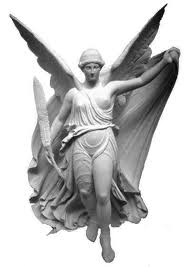
-420 The 90th Olympiad. Roman consuls: Lucius Quinctius Cincinnatus and Lucius Furius Medullinus and Marcus Manlius Vulso and Aqulus Sempronius Aratinus. In July after Boeotia refuses to accept the Peace of Nicias and leaves the Peloponnesian League, along with Elis, Mantinea, Corinth, and Argos, they form the Quadruple Alliance, which Corinth soon leaves; in July Alcibiades engineers an anti-Spartan alliance with the remaining three members of the Quadruple Alliance (Argos, Mantinea, Elis), and they all go to war with Sparta. Pericles' has-it-all (looks, brains, charm, family) nephew Alcibiades (-450 to -404) is elected ruler of Athens. Cumae is conquered by the Oscans using the gastraphetes (Gr. "belly bow"), a winched crossbow machine capable of throwing two arrows at the same time, invented by Pythagorean engineer Zopyrus of Tarentum; they go on to eradicate its Greek identity - easy cumae, easy osco? Architecture: About this time an Etruscan tomb is built near modern-day Tarquinia (discovered 1985) that shows the earliest images of hell and redemption, incl. the Blue Demon, showing a shocking rev. in 200-y.-o. Etruscan thought, probably caused by the threat of extinction by the Romans, creating a new theology that promises bliss to the worthy warriors and torment to the unworthy ones? Art: About this time Thracian sculptor Paionios (Paeonius) of Mende in Chalkidiki sculpts the Nike (Gr. "Winged Victory") of Paeonius; it is excavated in 1875 C.E. Science: About this time Abdera, Thrace-born Greek philosopher Democritus of Abdera (-460 to -370) pioneers the concept of atomic structure by contrasting the Intellect and the Senses: "Apparently there is color, apparently sweetness, apparently bitterness, actually there are only atoms and the void"; "Poor Intellect, do you hope to defeat us, while from us you borrow your evidence? Your victory is in fact your defeat." Plays: Euripides (-480 to -406), The Suppliant Women (The Suppliants). Deaths: Greek philosopher (first humanist?) Protagoras of Abdera (b. -420): "Man is the measure of all things: of things which are, that they are, and of things which are not, that they are not."
-419 Roman consuls: Agrippa Menenius Lanatus and Publius Lucretius Tricipitinus and Spurius Nautius Rutilus and Gaius Servilius Axilla. The Argive War (ends -418) begins when Alcibiades puts the Argives up to attacking Epidaurus, and Lacedaemon's whole army marches toward the frontier city of Leuctra as a diversion. Plays: Euripides (-480 to -406), Andromache. Sophocles (-496 to -406), Electra.
-418 In summer while the Argives are attacking the Epidaurians, the Lacedaemonians and some allies under the command of Agis invade Argolis, but are intercepted and stopped by Agis II of Sparta, and gets their gens. Thrasyllus and Alciphron to sign a 4-mo. truce; too bad, as Agis II returns the Argives capture Orchomenus, and the Spartans get pissed-off that he didn't capture Argos, and appoint a 10-man council to decide whether he can lead a new attack, which they soon do after receiving a plea from the Spartans in Tegea; in Aug. after Athenian gen. Alcibiades leads a Quadruple Alliance force to help Argos, they are all decisively beaten by the Spartans under Agis II at the First Battle of Mantinea, ending the Argive War (begun -419) and restoring Spartan hegemony; the Athenians are turned back at Chalcidice. Roman consuls: Quintus Servilius Priscus Fidenas (dictator) and Lucius Sergius Fidenas and Marcus Papirius Mugillanus and Gaius Servilius Axilla.
-417 Athenian demagogue Hyperbolus (d. -411) is ostracized after the vote was supposed to decide between Nicias and Alcibiades, but they combine forces against him, causing the whole system to be junked - genius? Roman consuls: Titus Lucretius Tricipitinus Agrippa Menenius Lanatus and Spurius Veturius Crassus Cicurinus and Gaius Servilius Axilla.
-416 The 91st Olympiad. Selinus of Sicily calls for Athenian assistance in his war against Segesa, causing Alcibiades to propose an expedition to crush Sicily, Syracuse, and Carthage, which the assembly approves over Nicias' objections, with the soundbyte: "We shall not trouble you with specious pretenses... Since you know as well as we do that right, as the world goes, is only in question between equals in power, while the strong do what they can and the weak suffer what they must", after which the Athenians massacre the male pop. of Milos (Melos) and sell their wives and children into slavery for daring to remain neutral. Roman consuls: Aulus Sempronius Atratinus and Marcus Papirius Mugillanus and Quintus Fabius Vibulanus. Plays: Euripides (-480 to -406), Heracles.
-415 Roman consuls: Publius Cornelius Cossus and Gaius Valerius Potitus Volusus and Numerius (Marcus) Fabius Vibulanus and Quintus Quinctius Cincinnatus. The Sicilian Expedition led by Alcibiades, Nicias, and Lamachus arrives in Sicily, but Alcibiades is accused of mutilating the Herms (sacred pillars) a nd profaning the Eleusinian mysteries, and ordered to return to Athens, where he doesn't like the justice he's getting and ends up going over to the Spartans; Athens attacks Sicily, and wins a V in Syracuse (defended by Hermocrates) in Nov.; Athenian orator Andocides (-440 to -390) is implicated in the Herms affair and turns informer to save his life, accepting exile instead (until -403). The Carthaginians recapture Messina from Athens. Plays: Euripides (-480 to -406), The Trojan Women.
-414 Roman consuls: Gnaeus Cornelius Cossus and Lucius Valerius Potitus and Quintus Fabius Vibulanus and Publius Postumius Albinus Regillensis. Athenian efforts to conquer Syracuse bog down when a small Spartan force under Gen. Gylippus comes to their aid and takes the heights of Epipolae, preventing an Athenian circumvallation. The Spartans invade Argos, and an Athenian fleet supporting them raids the coast of Laconia. Plays: Aristophanes (-448 to -380), The Birds. Euripides (-480 to -406), Ion; Electra; Iphigenia in Tauris (Iphigenia among the Taurins), set in the Chersonesus Taurica (Crim Tartary) peninsula N of the Hellespont, inhabited by the savage Tauri; Agamemnon offends Artemis, causing her to detain the Greek fleet sailing for Troy at Aulis, and the seer Calchas tells him to sacrifice his daughter Iphigenia, but Artemis relents and substitutes a hind on the altar, carrying her away in a cloud to Tauris, making her a priestess required to sacrifice all strangers, but when her brother Orestes arrives, she flees with him, carrying a sacred wooden Artemis statue, which Sparta later claims to have; she is finally transformed into the goddess Hecate.

-413 Roman consuls: Aulus (Marcus) Cornelius Cossus and Lucius Furius Medullinus. Nicias is elected ruler of Athens, and sends reinforcements under Gen. Demosthenes to Sicily, while Syracuse receives aid from Sparta, Corinth, and Boeotia; the Athenians assaulting the heights of Epipolae begin to crack, and just as they are about to board an armada of 73 vessels to retreat, a lunar eclipse on the night of Aug. 27 causes soothsayers to counsel Nicias to hold firm, which he does, and the assinine Athenians are massacred and their fleet destroyed in Sept. in the Battle of Assinarus (Syracuse), with 50K captured or KIA, incl. gens. Demosthenes and Nicias; the POWs are put to work in the mines; Alcibiades gets the Spartans to capture the Athenian fortress of Decelea (Dekeleia) (Tatoi) in N Attica, bringing Athenian agricultural to a virtual standstill. Darius II quells a revolt in Lydia in W Asia Minor; Tissaphernes (d. -395) becomes Persian satrap of coastal Asia Minor. Perdikkas II dies, and his son (by a slave woman) Archelaus I (-413 to -399) murders his uncle, cousin, and half-brother to become king of Macedonia (until -399), moving the court to Pella, building up its infantry, and encouraging Hellenization, inviting Euripides and other Greek artists; meanwhle the Athenian defeat at Syracuse that destroys most of their fleet puts him in a position to set the price of Macedonian timber, and after he supplies them all they want they become his friends and shower him with honors.
-412 The 92nd Olympiad. Roman consuls: Quintus Fabius Ambustus Vibulanus and Gaius Furius Pacilus. The Sicilian defeat causes the popular party in Athens to be thrown out, and Theramenes (-455 to -404) to be elected ruler of Athens; the College of Ten Deliberators (probouloi) replaces many of the functions of the Areopagus Council; a 5% harbor tariff replaces tribute among the Delian League allies; the Athenians use their last 1K talents to rebuild their lost fleet, but have to recruit green sailors; Rhodes breaks with Athens and its Delian League. Donald Trump, er, Alcibiades negotiates the Treaty of Miletus between the Spartans and Persians, which recognizes the Persians' right to subjugate the Ionian cities in return for money to build a Peloponnesian fleet to use to harass Athenian grain shipments from Egypt and the Black Sea; the Spartans then turn on Alcibiades, causing him to flee to the court of Persian satrap Tissaphernes. Ephesus revolts against Athens and sides with Sparta in the Peloponnesian War. Plays: Euripides (-480 to -406), Helen. Births: Greek Cynic philosopher Diogenes of Sinope (the Cynic) (d. -323) (b. -404?) in Sinope, Pontus; founder of the Cynic School of Philosophy; his father Icesias is a banker who is convicted of debasing coinage, causing Diogenes to have to leave Sinope for Athens, where he gets Cynic philosopher Antisthenes to take him in and begins living like a dog in a tub (large ceramic jar) in the marketplace, masturbating in public, hence the name cynic (canine) (like a dog), carrying a lamp in daytime to look for an honest man; sabotages the lectures of Plato, criticizing and embarrassing him and Alexander the Great; is captured by pirates on a voyage to Aegina, sold as a slave in Crete to Xeniades of Corinth, and set free and made tutor of his children; teacher of Zeno of Citium - he's not on the pedophile list?
-411 Roman consuls: Marcus Papirius Mugillanus and Spurius (Gaius) Nautius Rutilus. In July after Alcibiades promises Persian support, the oligarchy of the Four Hundred led by Antiphon, Peisander, Theramenes, and Phrynicus overthrows the Athenian democracy; the Athenian fleet at Samos refuses to recognize the new govt.; the Peloponnesians attack Euboea, causing the oligarchy to send a small fleet, which is defeated, and the oligarchs attempt to hand Athens over to Sparta, causing them to be overthrown by Theramenes (-455 to -404), who establishes the Constitution of the Five Thousand; Alcibiades is returned to favor in Athens, and in Sept. leads the Athenians in a V over the Spartans in the naval Battle of Cynossema in the Thracian Chersonese (Galipoli Peninsula). Plays: Aristophanes (-448 to -380), Thesmophoriazusae (Gr. "Women Celebrating the Festival of the Thesmophoria) (The Poet and the Women); another satire of Euripides; Lysistrata; the women try to end the Peloponnesian Wars by denying the men sex. Births: Greek statesman-gen. Timoleon of Corinth (d. -337); son of Timodemus.
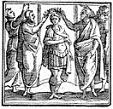

-410 Roman consuls: Manius Aemilius Mamercinus and Gaius Valerius Potitus Volusus. Darius II quells a revolt in Media, but loses Egypt. The Athenians under Alcibiades decisively win the naval Battle of Cyzicus against the Spartan navy and supporting Persian army, but the new demoagogue Cleophon (d. -404) muffs peace overtures; meanwhile, democracy is restored in good ole Athens, and Thrasybulus (Thrasybolus) (d. -389) and Thrasyllus (Thrasyllos) (d. -406) are elected rulers (strategoi). Nicocles dies, and his son Evagoras (d. -374), who had been exiled by the Phoenicians sneaks back in with 50 followers to become king of Salamis in Cyprus (until -374), going on to cultivate the friendship of Athens and Persia and extend his control to all of Cyprus. In this decade Greek physician-historian Ctesias of Cnidus (the Cnidian) (-400) of the Cnidian School of Medicine (rival to Hippocrates) flourishes, becoming physician to Achaemenid king Artaxerxes II and accompanying him on his 401 B.C.E. expedition against his brother Cyrus the Younger, going on to write Persica (23 vols.) (a reply to Herodotus founded in the Persian royal archives) and Indica, the first full monograph on NW India, giving the Persian view, describing a land full of fantastic monsters incl. elephants and talking parrots, containing the first Western description of a unicorn, a white beast with blue eyes, purple head, and multicolored horn, which cures epilepsy, along with a description of Indian medicine, along with a statement that Indians disdain death; he also writes a treatise on medicine (lost), On the Tributes of Asia (lost), and Periodos (Periegesis) (Periplous) (3 vols.), a geographical treatise on Asia incl. Egypt, the Black Sea region, and Italy. Art: Late in this cent. the Etruscan bronze Mars of Todi statue is sculpted. Plays: Euripides (-480 to -406), Phoenissae (The Phoenician Women).
-409 An Athenian expedition under Thrasyllus captures Colophon in Lydia, and raids the Ionian countryside, but is defeated outside Ephesus by a combined force from Ephesus, Syracuse and Persia. Sparta recovers Pylos, which falls into obscurity until -369. Alcibiades recovers Byzantium from the Spartans under Clearchus (d. -401), and clears the Bosphorus for Athenian shipping. Seeing his chance with the mutual exhaustion of Athens and Syracuse, the Carthaginians under Hannibal Mago (d. -406) invade Sicily to avenge his grandfather Hamilcar, defeating the Sicilian Greeks, then capturing the cities of Selinus (modern-day Selinunte) and Himera, torturing and killing 3K POWs as revenge for his grandfather's defeat in the Battle of Himera in -480 before returning to Carthage with spoils; "Himera... was conquered by force and the barbarians gave themselves to a long ruthless massacre of all those who remained there... Hannibal plundered the sacred places and, snatching away the people who took refuge there, set them on fire and razed the city to the ground, which had been inhabited for 240 years..." (Diodorus Siculus); in 2008-11 12K+ untouched graves are unearthed in Himera. The city of Rhodes on the island of Rhodes, designed by Greek urban planner ("the Father of European Urban Planning") Hippodamus of Miletus (-498 to -408) is built, based on the Hippodamian (Grid) Plan, becoming its 4th major town after Camirus (Kamiros), Lindus (Lindos), and Ialysus (Isalyssos). Roman consuls: Gnaeus Cornelius Cossus and Lucius Furius Medullinus. Plays: Sophocles (-496 to -406), Philoctetes; about the son of Poeas, Hercules' armor bearer and friend, who slays Priam's son Paris at Troy with his poison arrows after being retrieved from the island of Lemnos by Odysseus and healed of a snake wound to the foot by Machaon.
-408 The 93rd Olympiad. Roman consuls: Publius Cornelius Rutilus Cossus (dictator) and Gaius Julius Iullus and Publius Cornelius Cossus and Gaius Servilius Ahala. The Carthaginians destroy the city of Himera in N Sicily. Alcibiades returns to Athens in triumph after a 7-year absence, leading the religious procession to Eleusis to atone for his impiety in -415, and getting a promotion to CIC, after which he rejoins his fleet in Samos. Pleistoanax dies, and his son Pausanias (d. -395) (king in -445 to -426) becomes Agiad king of Sparta (until -395); both Sparta and Athens court Darius II Persia, who decides to back Sparta, while his wife Parysatis talks him into appointing his younger son Cyrus the Younger (d. -401) (brother of Artaxerxes III) as satrap of all Asia Minor in place of Tissaphernes, who is reduced to satrap of Caria in the SW; Cyrus is sent with funds to Sardis to raise Persian support for Sparta; in the fall Spartan adm. Lysander arrives in Ephesus and begins rebuilding the Spartan fleet with help from Cyrus; too bad, Cyrus uses the opportunity to build his own personal mercenary army with rebellious idea in mind; a Panhellenic gathering is held in Olympia, at which Nihilist philosopher Gorgias (-483 to -378) speaks against the Spartan-Persian alliance. Inventions: A building material inventory in Greece mentions the wheelbarrow ("1-wheeler"). Plays: Euripides (-480 to -406), The Phoenician Women; Orestes; after they are both performed he gets pissed-off and leaves Athens for Magnesia, followed by the court of Archelaus I of Macedonia in Pella at his invitation. Births: Greek astronomer-mathematician Eudoxus of Cnidus (d. -355) (-390 to -337?); student of Plato. Syracuse tyrant Dion (d. -354); son of Hipparinus; brother-in-law of Dionysius I. Deaths: Greek architect Hippodamus of Miletus (b. -498).
-407 Thrasybulus recaptures Abdera and Thasos on the coast of Thrace; meanwhile Alcibiades attempts to lure the Spartans out of Ephesus to do battle, but adm. Lysander doesn't bite; too bad, Alcibiades goes out searching for supplies, leaving behind his boyhood friend Antiochus in command of the Athenian fleet blockading the Spartan fleet in Ephesus, but the green Greek disobeys orders and tries to draw the Spartans led by new navarch (navy CIC) Lysander into battle with a decoy force, and loses the notable naval Battle of Notium (Ephesus) to them and a Persian force, causing Alcibiades to be stripped of command for being a bozo, causing him to leave Athens permanently, returning to his own land in the Thracian Chersonese. Exiled moderate dem. leader Hermocrates of Syracuse is KIA trying to force his way back into Syracuse, and the Carthaginians decide to conquer the Greek cities of Sicily. Roman consuls: Lucius Furius Medullinus and Gaius Valerius Potitus Volusus and Umerius (Gnaeus) Fabius Vibulanus and Gaius Servilius Ahala. Births: Greek philosopher Speusippus (d. -339) in Athens; Plato's nephew by sister Potone, and his successor at the Academy.
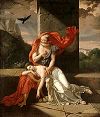
-406 Carthage invades Sicily and attacks Acragas (Akragas), but plague breaks out in their camp, killing Hannibal Mago, after which Himilco (d. -396) becomes CIC (until -397) and finishes capturing the city, followed by Gela, which is sacked and destroyed, then Camarina, whose survivors flee to Syracuse; too bad, the soldiers carry the plague back to Carthage after Hannibal Mago is killed by it. Conon and Cleophon are elected rulers of Athens; Callicratidas replaces Lysander as head of the Spartan fleet (navarch), which sieges Methymna on Lesbos (known for its excellent wine) to interrupt the Athenian grain supply; Lysander is made cmdr. in his place; the Athenians then lose the naval Battle of Mytilene to Sparta, after which the Spartans siege Mytilene until the Athenians raise another fleet under Conon and seven other strategoi and use new tactics to win the naval Battle of Arginusae near Canae E of Lesbos Island against Sparta under Callicratidas, after which at the instigation of Theremenes the Athenians put six of the eight gens. (incl. the son of Pericles) to death for not rescuing drowning sailors; a peace overture by Sparta is rejected by Cleophon, and Persian satrap Cyrus the Younger orders the Spartans to put Lysander in charge of another fleet in the Hellespont. Jerusalem is fully rebuilt in all its ancient glory (Jehovah's Witnesses). Roman consuls: Publius Cornelius Rutilus Cossus and Gnaeus Cornelius Cossus and Numerius (Gnaeus) Fabius Ambustus and Lucius Valerius Potitus. Plays: Euripides (-480 to -406), Iphigenia at Aulis; The Bacchants (Bacchae). Deaths: Greek dramatist Sophocles (b. -496) in Athens; leaves the play Oedipus at Colonus (his birthplace), which is produced by his grandson Sophocles in -401; same chars. Oedipus' son-brother King Polyneices of Argos, Creon's son Haemon, and King Thesus of Athens; old blind Oedipus comes to Colonus to be with the Furies (Eumenides) and his daughters when he dies, and is absolved by Zeus for his crimes first. Greek tragedian Euripides (b. -480) in Macedonia; leaves 92 plays (23 tetralogies), of which 17 tragedies and one satyr play ("Cyclops") survive to modern times: "Whom the gods would destroy, they first make mad."
-405 Roman consuls: Titus Quinctius Capitolinus Barbatus and Quintus Quinctius Cincinnatus and Gaius Julius Iullus and Aulus Manlius Vulso Capitolinus and Lucius Furius Medullinus and Marius Aemilius Mamercinus (Mamercus). The Romans seige the pesky Etruscan military fort of Veii just 10 mi. from Rome, the richest city of the Etruscan League. I'll be right here, soldier? The Athenian fleet under Alcibiades follows the Spartan fleet under Lysander to the Hellespont, then attempts to warn the Athenian fleet under Conon at the mouth of the Aegospotami (Aegospotamos) River in Thrace (where it flows into the Hellespont) against a surprise attack, but are ignored, and the Athenian fleet is destroyed in Sept. in the naval Battle of Aegospotami in the Sea of Marmara, causing Conon to flee to Cyprus, all but ending the Peloponnesian War; Lysander then sails across the Aegean, replacing pro-Athenian democracies on allied islands with decarchies (oligarchies of ten) under a Spartan overseer (harmost), after which Spartan king Pausanias sieges Athens while Lysander's fleet blockades Piraeus, closing their grain route through the Hellespont to starve them out, causing Theramenes to lead an embassy for 3 mo. to negotiate terms of capitulation. Former govt. clerk Dionysius I (the Elder) (-430 to -367) becomes tyrant of Syracuse, and signs a treaty with plague-weakened Carthaginians under Hamilco leaving Carthage in control of most of W and S Sicily, then fortifies Syracuse with a wall, fortifies Epipolae, removes and/or enslaves Greek oligarchs from Naxos, Catana and Leontini, and confiscates their land to give it to his Sicilian and Italian mercenaries, and enfranchises the serfs to build up his army, with plans of ousting the Carthaginians completely. Euripides' plays "The Bacchae" and "Iphigenia at Aulis" are posth. performed at the Dionysia festival, and win first prize. Architecture: The Erechtheum in Athens (begun -421) is finished. Plays: Aristophanes (-448 to -380), The Frogs; satirizes the late Euripides again; given an unprecedented 2nd performance plus a civic crown; the earliest literary mention of an inn, at which a group of men devour 16 loaves of bread, 20 meatballs, garlic, fish, and cheese, and then walk out without paying; the chorus of the frogs is "Brek-ek-ek-ex, ko-ax, ko-ax", which later becomes a cheer of Yale U. students.
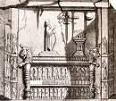


-404 The 94th Olympiad. On Apr. 25 after pesky never-say-die Cleophon is tried and executed, the Peloponnesian War (begun -431) ends with the surrender of plague-stricken Athens, which has been starved into submission over the winter; Theramenes secures peace terms, allowing Athens to keep its independence while giving up all foreign possessions (which become subjects of the Persian Empire) and its bedraggled fleet, and becoming an ally of Sparta; the Long Walls (built -457) are torn down and burned to the accompaniment of Spartan flutes; the Spartans are now the rulers of Greece, having to wear shades their future is so bright?; the Athenian oligarchs, led by Critias and Theramenes and supported by the Spartans and Lysander set up a Commission of Thirty to devise a new constitution, but instead they seize power as the Thirty Tyrants (until -400), executing several citizens and suspending rights; Critias has Theramenes condemned to drink hemlock for treason; Alcibiades flees to Phrygia in NW Asia Minor under protection of Persian satrap Pharnabazus (d. -373), seeking help for Athens, then being assassinated by orders of Pharnabazus after the Spartans learn about it and tell him to; 3K of the richest citizens are enfranchised in name only, and many more are exiled or flee to Argos and Thebes; in the fall Thrasybulus leads some exiles to Phyle and then to the Piraeus; Lysander conquers Samos for Sparta; in 1997 an Athenian graveyard for soldiers killed in the Pelopponesian War is unearthed. Persian king (since -423) Darius II Ochus Nothus dies of illness in Babylon, and is succeeded by his eldest son Artaxerxes II Mnemon (-445 to -358) as king of Persia (until -358); his younger brother Cyrus the Younger (d. -401) is accused by Tissaphernes, satrap of Caria of plotting to kill him, but after their mother Parysatis intervenes he is pardoned. Amyrtaeus (Amyrtaios) (Amenirdisu) of Sais (d. -399), a relative of the 26th Egyptian Dynasty royal family revolts against the Persians, ending the First Persian Occupation (begun -525), and becomes the one and only ruler of the Egyptian 28th (XXVIII) Dynasty (ends -398). Marcus Furius Camillus (-447 to -365) becomes Roman censor, beginning a long rise. Roman consuls: Gaius Valerius Potitus Volusus and Manius Sergius Fidenas and Publius Cornelius Maluginensis and Gnaeus Cornelius Cossus and Kaeso Fabius Ambustus and Spurius Nautius Rutilus. Deaths: Greek Athenian statesman Alcibiades (b. -450) in Mount Elaphus, Phrygia (assassinated). Persian king (-423 to -404) Darius II Ochus Nothus (b. ?) (d. -405?) in Babylon.
-403 Early in the year as Athens groans under the rule of the Spartan-imposed Thirty Tyrants (incl. Plato's uncle and cousin, both of whom are ex-friends of Socrates), a bunch of Spartan Quislings of a conservative and vengeful stamp (who order more than 1.5K executions before they are defeated) are defeated at the Battle of Munichia at Piraeus by Athenian exile forces under Thrasybulus, who kills Critias and restores democracy to Athens once again, electing the govt. of The Ten, while the Thirty, er, Twenty Nine flee to Eleusis and asks Sparta for help, and they send Lysander, but he is replaced by less hawkish king Pausanias, who narrowly defeats the Athenians at the naval Battle of Piraeus, with both sides taking large numbers of casualies, then arranges a settlement, incl. reunification of Athens and Piraeus, a gen. amnesty (excluding the oligarchic extremists after Athenian orator Lysias gives a speech) and the abolition of the Spartan decarchies in the former Athenian allies; Athenian orator Andocides is allowed to return, but his oligarchic tendencies cause him to be distrusted; the new Athenian regime adopts the 24-letter Ionian Alphabet, developed in the Anatolian city of Miletus, which incl. the lovely letters eta and omega, becoming the most common classical Greek alphabet by the middle of the cent. Dionysius I of Syracuse conquers Catana, then sieges Naxos. The state of Jin in Shanxi in NE China is partitioned among three landholding families, and the state of Chao (Zhao) (ends -222) in NE and C Shanxi and SW Hopeh is founded by Chao Chi, while Confucian marquis Wen of Wei (d. -387) becomes ruler of the state of Wei. Roman consuls: Manius Aemilius Mamercinus and Lucius Valerius Potitus and Appius Claudius Crassis Inregillensis and Marcus Quinctilius Varus and Lucius Julius Iullus and Marcus Furius. Deaths: Greek Athenian tyrant Critias (b. -460) (KIA).
-402 Dionysius I of Syracuse conquers Naxos, then takes on Leontini. Archelaus I of Macedonia establishes a pro-Macedonian oligarchy in Larissa, Thessaly. Roman consuls: Gaius Servilius Ahala and Quintus Servilius Fidenas and Lucius Verginius Tricostus Esquilinus and Quintus Sulpicius Camerinus Cornutus and Aulus Manlius Vulso Capitolinus and Marius Sergius Fidenas. Births: Greek Athenian statesman-gen. Phocion (Phokion) (the Good) (d. -318); known for his frugality, honesty, virtue, and wisdom, getting elected strategos a record 45x; too bad, he disagrees with everybody else in the assembly, causing him to get plotted against; "The chopper of my speeches." (Demosthenes)

-401 Cyrus the Younger, satrap of Anatolia and brother of Artaxerxes III rebels, and is KIA in the Battle of Cunaxa near Babylon despite having the help of Greek mercenaries, the Ten Thousand, who stage a heroic retreat (Katabasis) through Armenia (ends -399), crying "Thalatta! Thalatta!" (The sea! The sea!) on Mt. Theches (Mt. Madur) in Surmene on the NE coast of Trabzon (Turkey), which is immortalized by Greek soldier Xenophon (-431 to -354) in his Anabasis (Gr. "An Ascent") (7 vols.) (an expedition from a coastline to the interior of a country, as opposed to katabasis, from the interior to the coast), ("One of the great adventures in human history" - Will Durant), about the Greek expedition of the Ten Thousand against Artaxerxes II of the Persians and the long journey home after their sponsor Cyrus the Younger is KIA in Babylon; how Spartan gen. Clearchus, the leader of the Ten Thousand is treacherously murdered in a conference by Tissaphernes, leaving Xenophon as one of the last three leaders of the soldiers, bravely leading them N from N Mesopotamia through Corduene and Armenia to the Black Sea at Trebizond; upon encountering some barbarians (Celts?), he puzzles about their strange drink, with the soundbyte: "There were stores within of wheat and barley and vegetables, and wine made from barley in great big bowls; the grains of barley malt lay floating in the beverage up to the lip of the vessel, and reeds lay in them, some longer, some shorter, without joints; when you were thirsty you must take one of these into your mouth, and suck. The beverage without admixture of water was very strong, and of a delicious flavor to certain palates, but the taste must be acquired"; Cyrus the Younger uses a mercenary force of Peltasts from Greece or Thrace, who wear foxskin Phrygian caps, patterned tunics, fawnskin boots, long cloak (zeira) with a bright geometric pattern, and crescent-shaped wicker shields (peltes), going on to become the main type of Greek mercenary infantry in the 4th cent. B.C.E. Orontes I (d. -366) becomes Persian satrap of Armenia. Zhou Wei Li Wang dies, and his son Zhou An Wang (d. -376) becomes Dong Zhou king #20 of China (until -376); the Spring and Autumn Period (begun -771) ends, and the Warring States Period begins among the seven states in the Zhou (Chou) Dynasty in China (ends -221). Roman consuls: Lucius Valerius Potitus and Marcus Furius Camillus and Manius Aemilius Mamercinus and Gnaeus Cornelius Cossus and Kaeso Fabius Ambustus and Lucius Julius Iullus. Plays: Oedipus at Colonus by the late Sophocles debuts in Athens.

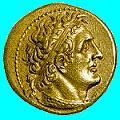








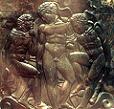
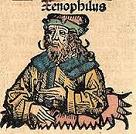
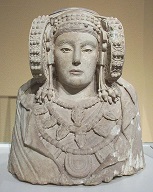
-400 World pop.: 162M. The 95th Olympiad; Hippias of Elis (-460 to -399) compiles a list of Olympic victors back to the 1st Olympiad. Roman consuls: Publius Licinius Calvus Esquilinus and Publius Manlius Vulso and Lucius Titinius Pansa Saccus and Publius Maelius Capitolinus and Spurius Furius Medullinus and Lucius Publilius Philo Vulscus - you can't have too many Roman consuls? Dionysius I of Syracuse conquers Leontini, and extends his control over the Sicels. Conon and Iphicrates are elected rulers (archons) of Athens. Persian satrap Tissaphernes sieges Cyme, causing Sparta to send Thibron with a mercenary army to liberate the Ionians from Persia. About this time the Celtic (Alerci) Cenomani tribe of Gaul (modern-day Maine) under Elitovius crosses into the Po River Valley of Italy and drives out the Etruscans, founding a town on the later site of Cremona (ends -218), going on to part ways with other Celtic tribes in being friendly with the Romans; meanwhile the Celtic Boii tribe from Bohemia crosses the Great St. Bernard Pass and conquers the Etruscan town of Felsina, renaming it Bononia (modern-day Bologna, pop. 389K/1M), going on to intermarry with the Etruscans but stay Celtic. About this time the Celtic kingdom of Noricum is founded in modern-day Austria and Slovenia, bordered on the N by the Danube River, on the W by Raetia and Vindelicia, on the E and SE by Pannonia, and on the S by Italy, with capital at Virunum at the foot of Mt. Magdalensberg, becoming the S outpost of the Celts and launching point for attacks on Italy, becoming known for cattle breeding rather than agriculture because of their poor soil, and for supplying iron for Noric Steel, as well as Celtic nard (saliunca) for perfume. About this time measles enters the human pop. that lives in big cities? As the cent. begins Sparta basks in its power, although a Delphic oracle warns of coming disaster? In this cent. Jews begin migrating to Rome and various Mediterranean towns, forming separate communities; by the next cent. large numbers live in Greece, esp. Rhodes and Thessaloniki (Salonica) (founded in -315 by Cassander of Macedon) (modern-day pop. 325K/1M) which becomes known as "the Mother of Israel". In this cent. the Celts arrive in County Limerick, Ireland, splitting it into petty kingdoms (tuatha). About this time Celts settle in Poland via the area of Morawy, settling in Lower Silesia S of modern-day Wroclaw; more groups settle near modern-day Cracow and Lesser Poland. About this time the Garamantian Kingdom in Fezzan (C Libya W of Cyrenaica and S of Tripolitania) is founded by the Berbers (Amazigh), going on to build an underground network to gather fossil water from underneath the limestone layer, and harass Roman coastal settlements until Roman Emperor Septimius Severus captures their capital city of Garama in 202 C.E.; they become kaput by 600 C.E. In this cent. the town of Mamshit is founded by the Nabateans in the Negev. By the beginning of this cent. Oscan-speaking peoples move into Campania (S of Latium on the Tyrrhenian Sea coast), Lucania (Basilicata) (from the Tyrrhenian Sea to the Gulf of Taranto), and Bruttium (Calabria) (toe region across the Strait of Messina from Sicily), all in Magna Graecia. The beginnings of Scarlett O'Hara in the Emerald Isle? In this cent. the Picts push into Antrim and Down, Ireland, and the Belgics (Belgii) and Brythons (Britons) migrate into SE Ireland, the latter founding the Kingdom of Tara. In this cent. the kingdom of Meroe in Egypt has three kings who leave inscriptions while battling the nomadic Blemmyes: Ammannoteyerike (Ammannoteyeriké), Harsiotef (-404 to -369), and Nastasen (-335 to -310). The Hopewell Civilization (ends 500 C.E.) is founded in the Scioto Valley of SC Ohio, driving a wedge into Adena territory and causing the latter to begin to decline. In the first half of this cent. Chalcidice-born Greek philosopher Xenophilus (-300s) flourishes, becoming the last of the Pythagoreans, and the only one to live in Athens in the 4th cent. B.C.E.; a fter Pliny claims that he lives to age 105 without ever getting sick, he becomes a celeb in the Renaissance. In this cent. the Phoenicians settle the southernmost spot on the Mediterranean coast of France, which the Greeks later resettle under the name Olbia, and the Massiliotes (occupants of Marseille) fortify against the Salyes and Ligures tribes living in the Alps; by 964 C.E. it is called Hyeres (Hyčres). A cemetery dating from this cent. is found in the Ligurian city of Genua ("knee") (modern-day Genoa) on the Riviera 80 mi. S of Milan, proving Greek occupation of its fine harbor. In this cent. Rome begins minting bronze money to facilitate payments to the govt. Liquors distilled from rice, millet, and palm sap begin to be made in Asia in this cent. In this cent. Roman teacher Lucio Ampelio (Lat. "vineyard") writes the booklet Liber Memorialis "For those who want to know everything, so that you learn what the world, what are the elements, what the world produces and what did the human race." In this cent. Roman physician Philistion "the Siciian" of Locri flourishes, leaving a cookbook and a materia medica after allegedly inventing a machine for restoring a dislocated humerus. In this cent. Indian Sanskrit grammarian Panini, born in Kandahar, Afghanistan flourishes, writing Ashtadhyayi (Eight Chapters), a Sanskrit grammar containing the 3,959 rules of Sanskrit morphology. In this cent. the Romans adopt Greek religion, renaming the gods. In this cent. Greek painter Apelles of Cos flourishes, becoming the personal painter of Alexander III the Great, and later the most renowned painter of all time; in the 16th cent. C.E. Raphael (1483-1520) becomes known as the New Apelles. About this time Greek historian Ctesia describes a unicorn as white with a straight horn. In this cent. the Ficoroni Cista bronze ritual vessel is left in the tomb of an Etruscan woman in Praeneste (near modern-day Palestrina), featuring an engraved relief of Hercules and Iolaus; discovered in 1738 by Francesco Ficoroni (1664-1747). Sports: In this cent. the Chinese play a Soccer-Like Game. Science: About this year 60-y.-o. Hippocrates of Cos (-460 to -377) of the island of Cos in Greece becomes "the Founder of Western Medicine", teaching that diseases have natural causes, proposing the Four Humors (Temperaments) (sanguine, choleric, melancholic, phlegmatic) theory of disease, theorizing that mental disorders may be caused by physiological abnormalities; teaches that wounds should be washed in water that had been boiled or filtered, and that a doctor's hands should be kept clean and his nails clipped short, becoming the first to distinguish benign from malignant breast tumors, advocating withholding treatment for "hidden" cancers, with the soundbyte that surgery causes "a speedy death, but to omit treatment is to prolong life"; Aristotle later calls him the "great physician"; the Hippocratic Oath, drafted by him or his students incl. "Primum non nocere" ("The first rule is do no harm"); he determines that the male contribution to a child's heredity is carried in the semen - matriarchial religions are f-ed? Art: In this cent. Glycon (Glykon) of Athens sculpts the Farnese Hercules, a copy of a work by Lysippus; found in the ruins of the Baths of Caracalla in Rome in 1599 C.E. In this cent. the Lady of Elche polychrome bust of a woman's head is made; discovered in 1897 in L'Alcudia, Valencia, Spain. Nonfiction: In this cent. the Shun-Hai Ching (Sun-Hai King) (Classic of Mountains and Seas) (Mountain-Sea Classic) is written by a group of Chinese scholar-explorers, becoming the oldest secular book on Earth, describing 550 mountains and 300 channels in 18 sections; it describes fantastic creatures such as a 1-armed tusked ("spears of pearl") red giant as tall as three men, and a small grey pig with a white collar and teeth of pearls; did they visit America and see woolly mammoths and peccaries? Poetry: In this cent. the 7-vol. 24K-verse Ramayana (Sans. "story of Rama") is written by Indian Sanskrit poet Valmiki, describing the conquest of the non-Brahmanic land of Lanka (Ceylon) by Ramachandra (Ayodha-Ram) and his devoted wife Sita, and how he becomes an avatar or incarnation of Vishnu after death. Births: Macedonian gen. Parmenio (d. -330). Deaths: Greek historian Thucydides (b. -471); leaves History of the Peloponnesian War, characterized by strict standards of evidence-gathering and analysis of cause and effect without bringing in the gods, causing him to become known as "the Father of Scientific History"; "To hear this history rehearsed, for that there be inserted in it no fables, shall be perhaps not delightful. But he that desires to look into the truth of things done, and which (according to the condition of humanity) may be done again, or at least their like, shall find enough herein to make him think it profitable. And it is compiled rather for an everlasting possession than to be rehearsed for a prize" (opening line) (a dig at Herodotus?); leaves the last seven years of his history of the Peloponnesian War unfinished; "[In Thucydides] the portrayer of man, that culture of the most impartial knowledge of the world finds its last glorious flower (Friedrich Wilhelm Nietzsche); "The favorite author of the greatest and noblest men, and one of the best teachers of the wisdom of human life" (Johannes von Muller); "History is philosophy teaching by examples"; "Be convinced that to be happy means to be free and to be free means to be brave. Therefore do not take lightly the perils of war."


-399 One good way to avoid paying old age pensions, or, the first Greek Christ without any Jehovah or Bible? On Feb. 15 Greek philosopher Socrates (b. -469), who doesn't even allow youths under 30 to be exposed to dialectic is sentenced on the charge of corrupting the morals of Athenian youth and denying or neglecting the gods of the state, esp. by introducing the daemonion, or mysterious inner voice, which they take to be a new god; after refusing to address the charges and instead giving a speech vindicating his whole weltanschauung, which sails over the jury's head, he is condemned to death by a small majority, then angers them by offering to pay a small fine instead, causing the majority against him to increase; after his friends plan an escape and he refuses to break the laws of the state, he spends a last day with friends, issues the soundbyte: "Death may be the greatest of all blessings", then nobly drinks a cup of poison hemlock (he chooses to die rather than renounce the freedom to speak his mind in the search for wisdom?) (the real reason he is tried is that he is associated with Athenian traitor Alcibiades?); his death frees his student Plato (-427 to -347) (who attends his trial but not his execution, and is messed up by it for life?) to travel broadly, er, widely, while churning out writings idolizing his crucified savior, making him immortal. In Mar. the Retreat of the Ten Thousand from Mesopotamia to Chrysopolis (begun -401) ends. Archelaus I is killed by royal page Craterus (Crateusas) (his lover) during a hunt, leaving Macedon a much stronger power, and after talk-about-it Craterus lasts four days, Archelaus' young son Orestes (d. -396) becomes king of Macedonia (until -396), with Aeropus II (d. -393) as regent. Spartan king Agis II dies, and his lame Spartan-raised younger half-brother Agesilaus II (-444 to -360) becomes Eurypontid king of Sparta after a power struggle and a manipulation of Delphic oracles; for once Sparta has a king who has been through the tough Spartan military training and believes in the military culture implicitly? Dercyllidas takes command of the Spartan forces in Asia Minor, playing Persian satraps Tissaphernes and Pharnabazus against each other, and conquering nine cities in eight days in the Aeolus. According to Livius, the first offering to a Greek deity in Rome is made this year. Roman consuls: Gnaeus Genucius Augurinus and Lucius Atilius Priscus and Marcus Pomponius Rufus and Gaius Duillius Longus and Marcus Veturius Crassus Cicurinus and Volerus Publilius Philo. Inventions: About this time the city of Syracuse under tyrant Dionysius I invents the Arrow-Throwing Catapult. Deaths: Greek ultimate brain Socrates (b. -469) in Athens (suicide): "There is only one good, knowledge, and one evil, ignorance"; "The unexamined life is not worth living" (Apology 38a). Greek philosopher-mathematician Hippias of Elis (b. -460).
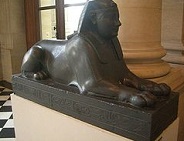

-398 Dionysius I of Syracuse attacks the Carthaginians, who rule a large part of the island of Sicily, pushing them back and sacking Motya (Mozzia) (Mothia) on the W coast. After defeating Amyrtaeus and executing him in Memphis last Oct., Nepherites (Nefaarud) I (d. -393) of Mendes (Djedet) (modern-day Tell El-Ruba) in the E Nile Delta becomes king #1 of the Egyptian 29th (XXIX) Dynasty (ends -380), going on to support Sparta in its war against Persia, sending them 500K measures of grain and material for 100 triremes; a gift sent to the Spartans is swiped as the ships pass Rhodes, which has defected to the Persian side - the first Rhodes scholarships? After witnessing Socrates' death and fleeing to his hometown and offering refuge his other pupils, Greek Socratic philosopher Eucleides (Euclides) (Euclid) of Megara (-435 to -365) founds the Megarian School of Philosophy in Megara in N Isthmus of Corinth opposite Salamis Island, which flourishes for a cent. and produces Ichthyas, Eubulides of Miletus (known for his paradoxes, incl. The Liar Paradox), Clinomachus (first philosopher to compose treatises on the fundamental principles of Dialectics), and Thrasymachus of Corinth, and his pupil Stilpo (Stilpon) (-360 to -280), teacher of Zeno of Citium and Menedemus of Eretria; it teaches that the good is the knowledge of the one universal Being AKA God, Mind, Wisdom, Reason, and alone exists; "The Good is One, but we can call it by several names, sometimes as wisdom, sometimes as God, sometimes as Reason"; "The opposite of Good does not exist"; too bad, the doctrine is so patently absurd that the Megarians reverse Socrates' heuristic method into the eristic method of concentrating on finding something wrong in opponents' arguments, using Zeno of Elea's reductio ad absurdum technique to the max. Socrates' pupil Phaedo of Elis (namesake of Plato's dialogue Phaedo) returns to Elis and founds the Elean School of Philosophy; after his death Phaedo's and Stilpo of Megara's pupil Menedemus of Eretria (-345 to -260) transfers the school to Eretria in Euboea. Roman consuls: Marcus Fabius Ambustus and Titus Quinctius Poenus Capitolinus Crispinus ("curly-haired"). Roman consuls: Lucius Valerius Potitus and Marcus Valerius Lactucinus Maximus and Marcus Furius Camillus and Lucius Furius Medullinus and Quintus Servilius Fidenas and Quintus Sulpicius Camerinus Cornutus.
-397 Messina is destroyed by Carthage under Himilco, who is then forced to give the city up to Dionysius I, tyrant of Syracuse, who rebuilds the city. The Carthaginian stronghold of Motya in Sicily is taken by the army of Syracuse using their new arrow-throwing catapult. Roman consuls: Lucius Julius Iullus and Lucius Furius Medullinus and Lucius Sergius Fidenas and Aulus Postumius Albinus Regillensis and Publius Cornelius Maluginensis and Aulus Manlius Vulso Capitolinus. Births: Greek ruler of Bithynia (-376 to -326) Bas (d. -326); son of Boteiras; father of Zipoites (-354 to -278). Greek Macedonian gen. Antipater (d. -319).


-396 The 96th Olympiad; a team owned by Spartan princess Cynisca (Kyneska) (Lat. "little puppy") wins the 4-horse chariot race, and again in -392. Mt. Etna in E Sicily erupts, with a fiery tongue of lava snaking down into the sea, causing a Carthaginian fleet sieging Syracuse to retreat, after which Syracuse ultimately wins the war (begun -409). Carthage unsuccessfully besieges Syracuse, and the latter ultimately wins the war (begun -409). Dercyllidas goes against the orders of the ephors and makes a truce with the Persians, allowing the latter to build up their fleet and put renegade Athenian Conon in command; Aegesilaus II replaces Dercyllidas as Spartan commander in Asia Minor, and he campaigns in Phrygia, defeating Tissaphernes' army, but is unable to defeat the Persian fleet; Persian satrap Pharnabazus sends Timocrates of Rhodes to bribe the leaders of Athens, Thebes, Corinth, and Argos to attack Sparta. Sparta refuses to hand over the Greek cities in Asia Minor as promised during the Peloponnesian War, and battles Persia over them. Military pay is introduced in Rome to pump up the 10-y.-o. Siege of Veii, an Etruscan city 10 mi. NW of Rome, which is captured and destroyed by Roman dictator Marcus Furius Camillus (-447 to -365); the Romans annex the region, doubling their territory, and begin to absorb the Etruscans (claiming that Juno, the patron goddess of Veii had deserted them for Rome, building a statue to her in Rome to prove it?), but this gives the Celts their opening - we're moving on up, to the east side? Orestes dies, and Aeropus II (d. -394) becomes king of Macedonia (until -394). Roman consuls: Marcus Furius Camillus (dictator) and Lucius Titinius Pansa Saccus and Publius Licinius Calvus Esquilinus and Publius Maelius Capitolinus and Quintus Manlius Vulso Capitolinus and Gnaeus Genucius Augurinus and Lucius Atilius Priscus. Nonfiction: Plato writes his Apology in defense of his master Socrates; "I shall never alter my ways, not even if I have to die many times." Births: Athenian statesman-orator Lycurgus (d. -324) (b. -390?). Greek Platonic philosopher-mathematician Xenocrates (d. -314) in Chalcedon.
-395 The Corinthian War begins (ends -387), pitting Athens and its allies Boeotia, Corinth, Argos, Megara, and Euboea against Sparta. Hecatomnus of Mylasa (Hekatomnos) (d. -377) becomes Persian satrap of Caria (Turkey), founding the Hecatomnid Dynasty (ends -334) with his five children, who rule in succession until Alexander III the Great conquers them. Pausanias dies, and next year his son Agesipolis I (d. -380) becomes Agiad king #21 of Sparta (until -380). Roman consuls: Publius Cornelius Cossus and Publius Cornelius Scipio and Kaeso Fabius Ambustus and Lucius Furius Medullinus and Quintus Servilius Fidenas and Marcus Valerius Lactucinus Maximus. Births: Greek sculptor Scopas (d. -350) in Paros; known for quadrilateral heads with deep sunken eyes and slightly opened mouth.
-394 The Athenian fleet is restored. Spartan king Agesilaus II returns to Greece with most of his force, then scores two hollow Vs over Thebes and its Greek allies at the Battle of the Nemea and the 2nd Battle of Coronea (1st in -447), losing his fleet to the Persian fleet under Conon at the naval Battle of Cnidus, and failing to establish Spartan hegemony as Persia grants autonomy to the Greek cities of Asia Minor and withdraws its garrisons, causing the Ionians to revolt from Sparta and establish democracies; Xenophon of Athens fights with the Lacedaemonians against the Athenians at Coronea, and is exiled from Athens. The Romans under Marcus Furius Camillus successfully siege the Etrurian (Etruscan) city of Falerii 30 mi. N of Rome, and Camillus goes into retirement in Ardea (until -391). Roman consuls: Marcus Furius Camillus and Lucius Furius Medullinus and Gaius Ameilius Mamercinus and Lucius Valerius Poplicola and Spurius Postumius Albinus Regillensis and Publius Cornelius.

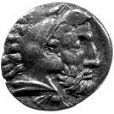
-393 On Aug. 5 emperor (since -477) Koushou dies, and Kouan (Koan) (-427 to -291) becomes Yamato emperor #6 of Japan (until -291) - is it radioactivity in the waters, like those that created Godzilla? Nepherites I dies, and next year usurper Psammuthes (Pasherienmut) (d. -391) seizes power from his son Hakor, becoming king #2 of the Egyptian 29th Dynasty. Conon returns to Athens and begins rebuilding the Long Walls. Athens recovers Delos, Imbros, Lemnos, and Scyros, and makes alliances with Chios, Cnidus, Cos, Mitylene, and Rhodes. Aeropus II dies, and his son Pausanias becomes king of Macedon, but he is assassinated by Amyntas III the Little (d. -370) (father of Philip II), who becomes king of Macedon until he is driven out by the Illyrians, after which Archelaus II, son of Archelaus I and brother of Orestes becomes king of Macedon (until -387), becoming a patron of art and lit. Roman consuls: Lucius Valerius Potitus and Publius (Servius) Cornelius Maluginensis. Deaths: Japanese Yamato emperor #5 (-475 to -393) Koushou on Aug. 5.

-392 The 97th Olympiad. Nepherites I's son Hakor (Hagar) (Achoris) (Hakoris) (d. -380) overthrows Psammutes, becoming king #3 of the 29th Egyptian Dynasty. Dionysius I gives up on his war with the Carthaginians after failing to drive them out of Sicily. Persia deposes Conon, who soon dies; in the winter a peace conference is held at Sparta, but the Athenians reject its terms. Amyntas III recovers his kingdom (until -370) with help from the Thessalians under Medius, head of the house of the Aleuadae of Larissa. Roman consuls: Lucius Valerius Potitus and Marcus Manlius Capitolinus. Plays: Aristophanes (-448 to -380), The Ecclesiazusae. Births: Greek Athenian orator Hypereides (Hyperides) (d. -322); student of Isocrates.
-391 Roman consuls: Lucius Lucretius Tricipitinus Flavus and Servius Sulpicius Camerinus and Lucius (Marcus) Aemilius Mamercinus and Lucius Furius Medullinus and Agrippa Furius Fusus and Gaius Aemilius Mamercinus. Deaths: Chinese philosopher Mo Tzu (b. -470) - keep your mo tzu running?
-390 The Spartan fleet captures Samos, then an Athenian army under Iphicrates (d. -353) defeats the Spartans at the Battle of Lechaeum; Evagoras revolts from the Persians in Cyprus. Dionysius I of Syracuse begins the conquest of S Italy (Magna Graecia) (ends -379). Argaios II becomes king of Macedonia (until ?). Tharrhypas dies, and his son Alcetas I of Epirus (d. -370) becomes king of Epirus (until -370). Roman consuls: Marcus Furius Camillus (dictator) and Quintus Fabius Ambustus and Kaeso Fabius Ambustus and Numerius Fabius Ambustus and Quintus Sulpicius Longus and Quintus Servilius Fidenas and Publius Cornelius Maluginensis. Births: Greek Athenian orator Hypereides (Hyperides) (d. -322). Greek sculptor Lysippus (Lysippos) (d. -300) in Sicyon; personal sculptor of Alexander III the Great; teacher of Chares of Lindos; known for a one-to-eight scale for the head and total height of the body, making them appear slender and taller, with exaggerated facial features. Deaths: Athenian orator Andocides (b. -440); leaves Speeches of Andocides.
-389 The Athenian navy under Thrasybulus recovers Thasos, Samothrace, Tenos, Chersonesus, Byzantium, Chalcedon, et al., placing garrisons in the most important towns and imposing a 5% harbor toll. Dionysius I of Syracuse defeats the Italiote (Greek) League at the Battle of the Elleporus. The plebeians propose that Rome be abandoned for Veii, but Marcus Furius Camillus gets the proposal defeated and the city begins to be rebuilt. Marcus Manlius begins spending his fortune in releasing debtors trapped by the ursury of the patricians, but the latter eventually 'get' him by having him accused of tyrannical intentions, condemned as a traitor, and flung from the Tarpeian Rock on the edge of the Capitoline Hill he had once defended - do you have any trouble breathing? Amyntas III (d. -369) (father of Philip II) becomes king of Macedon (until -369). Roman consuls: Marcus Furius Camillus (dictator) and Lucius Valerius Poplicola and Lucius Verginius Tricostus and Publius Cornelius ? and Aulus Manlius Capitolinus and Lucius Aemilius Mamercinus and Lucius Postumius Albinus Regellensis. Births:Aeschines (d. -314) in Athens.
-388 The 98th Olympiad; the first known case of cheating at the Olympics sees boxer Eupolus of Thessaly bribe three opponents to take dives. Roman consuls: Titus Quinctius Cincinnatus Capitolinus and Quintus Servilius Fidenas and Lucius Julius Iullus and Lucius Aquillius Corvus and Lucius Lucretius Flavus Tricipitinus and Servius Sulpicius Rufus. The Athenian fleet plunders Aspendus to make up for missing pay from Athens, then the enraged pop. breaks into the Athenian camp and murders Thrasybulus. After the Spartan fleet under gen. Gorgopas ambushes the Athenian fleet near Athens and captures several ships, the Athenian fleet under gen. Chabrias ambushes and defeats the Spartans on Aegina Island; the Spartans under soldier-diplomat Antalcidas conclude an agreement with Persian king Artaxerxes I for Persian aid in its war against Athens in return for Spartan recognition of Persian supremacy over the Greek cities in Asia Minor; Antalcidas then commands the Spartan fleet in aid of the Persian fleet, defeating the Athenian navy near the Hellespont and kicking them out of the Aegean Sea. Plays: Aristophanes (-448 to -380), Plutus.





-387 The Corinthian War (begun -395) ends with the King's Peace (Peace of Antalcidas), negotiated by Antalcidas of Sparta, which guarantees the autonomy of all Greek cities except those in Asia Minor, marking the imposition of Persian control over the Greek Ionian city-states. Rome gets its first Celtic Trick or Treat? The Celtic Invasion of N Italy sees the 24K-man army of the Gallic (Celtic) Senones under chieftain Brennus (Brennos) (who crossed the Alps in -400, drove out the Umbrians, and settled on the E coast of of Italy from Forli to Ancona, founding their capital of Senigallia or Sinigaglia) invade the Etruscan province of Siena from the N, then (in cahoots with Dionysius of Syracuse to cause a diversion so he can take Sicily?) siege the Etruscans at Clusium on the Allia River (a tributary of the Tiber River) in the province of Siena, causing them to call for help from the Romans, after which Marcus Fabius Anbustus, pontifex maximus of Rome (the descendant of the only remaining Fabian after the Veii wipeout of -476) sends his three sons as ambassadors, but they instead decide to fight in the final Battle of the Allia on July 18 (-390?), when the Gauls take the city after surrounding and kicking the butts of six Roman legions and chasing them back to Rome, during which confusion Quintus Fabius kills a Gaulish chieftain, causing Brennus to claim that they had violated internat. law prohibiting ambassadors from fighting, and demand that they be turned over; when the Romans refuse, and instead honor them with appointments as military tribunes with consular powers, the Gauls prepare to march on Rome; the chieftain was killed before the battle, and that's what brought it on?; either way, the Gauls become the Romans' permanent bete noir (boogey man) when they siege Rome, find the gates left open and the citizens barricaded on the Capitoline Hill, then after pausing awestruck to view the magnificent bldgs. and the city fathers stoically awaiting their fate, they sack and burn six hills, before assaulting the Capitoline Hill, which is under the command of patrician Marcus Manlius Capitolinus, who tries to send a message to the Senate to reinstate Marcus Furius Camillius (-447 to -365) as dictator; too bad, as the messenger climbs up a secret path to the Senate the Gauls find out and begin a sneak attack, but he is saved by the honking of the sacred guard dogs, er, geese of Juno?; after agreeing to pay 1K lbs. of gold to buy them off (which the Romans later take as an insult, since Rome is worth much more?), the Gauls use rigged weights on the scales, and when the Romans complain, Brennus throws his sword on the scales and utters the soundbyte: "Vae victus" (Woe to the vanquished); too bad, the goosey Gauls stay too long (7 mo.), and don't bury their dead, causing dysentery to spread, giving Marcus Manlius time to raise an army and defeat and drive them from Rome, earning him the title "Pater Patriae" and "Second Founder of Rome", allegedly putting his sword on the scales too and uttering the soundbyte: "Not gold but steel redeems the native land"; this traumatic experience is the earliest fact of Roman history dated by contemporary Greek authors; after this experience, the 12-gate Servian Wall (Murus Servii Tullii) is built around Rome by -378, and the Roman army gives up the Greek phalanx-style spear and improves its armor, weapons, and org., getting serious, and Rome is not taken again until the 5th cent. C.E.; every year on the anniv. of this year's events guard dogs are crucified on the Capitoline Hill for failing to warn of the sneak attack, while geese are brought to watch on gilded purple cushions. Back in sane sanitary Athens, Socrates' 40-y.-o. student Plato (-427 to -327) founds the Academy in the Grove of Academe (once the property of an Athenian named Academus who got his name from an ancient hero?), becoming the first univ. in the Western world; it is closed in 529 C.E. by Christian Byzantine Emperor Justinian I - because the Roman Catholic Church has the Truth hence who needs it? Roman consuls: Lucius Papirius Cursor and Gnaeus Sergius Fidenas Coxo and Lucius Aemilius Mamercinus and Licinius Menenius Lanatus and Lucius Valerius Poplicola.
-386 Dionysius I of Syracuse captures Rhegium in S Italy. The Spartan navy forces Athens to accept the King's Peace by blockading the Hellespont, then intimidates Thebes into accepting; the Boeotian and Athenian Leagues are temporarily dissolved; Ephesus is again under Persian control. The Gauls infesting Rome are bought off, and return to the Po Valley - who would ever think that Rome would rule the world? The one and only Roman jail is enlarged into the Tullianum, by Tullus Hostillius (Servius Tullius), consisting of two crypt-like rooms above each other, the top one being where they await trial, the bottom one where they are executed, going on to house Nugurtha from N Africa, Vercingetorix from Gaul, the Gracchi, and Catilina's conspirators, plus allegedly the Christian apostles Peter and Paul. Roman consuls: Marcus Furius Camillus and Servius Cornelius Maluginensis and Qintus Servilius Fidenas and Lucius Quinctius Cincinnatus and Lucius Horatius Pulvillus and Publius Valerius Potitus Poplicola.
-385 The Persians unsuccessfully invade Egypt. Camissares dies, and his son Datames (d. -362) becomes Persian satrap of Cappadocia (until -362). Roman consuls: Aulus Cornelius Cossus (dictator) and Aulus Manlius Capitolinus and Publius Cornelius ? and Titus Quinctius Cincinnatus Capitolinus and Lucius Quinctius Cincinnatus Capitolinus and Lucius Papirius Cursor and Gnaeus Sergius Fidenas Coxo. Deaths: Greek philosopher Philolaus of Croton (b. -480).
-384 The 99th Olympiad. Sparta ends a long siege of Mantinea, dismantling its walls and breaking up the city into five villages. Roman consuls: Servius Cornelius Maluginensis and Publius Valerius Potitus Poplicola and Marcus Furius Camillus and Servius Sulpicius Rufus and Gaius Papirius Crassus and Titus Quinctius Cincinnatus. Nonfiction: Plato (-427 to -327), Symposium; discussion on the nature of love by men at a drinking party at the house of Athenian tragedian Agathon; Aristophanes claims that there are three genders, gay male, lesbian female, and heterosexual - and homosexual behavior among men is natural, as is lesbian behavior among females, while heterosexual behavior must be learned, therefore the weird anti-sexual Christian cult that develops centuries from now is profoundly sick, wasting human happiness by denying the pleasures of the flesh and making life not worth living, so no wonder it brings on a Dark Ages of looney tunes hoping the world will end any minute so they can become as angels and not have to worry about sex, while avoiding taking baths? Births: Greek Golden Mean philosopher (the first scientist?) (founder of the Lyceum) ("the Peripatetic Philosopher") (gay?) Aristotle (Gr. "best (purpose) of all") of Stagira (d. -322) in Stagira (Stageira), Macedonia; tutor of Alexander III the Great, teaching him that non-Greeks should be treated as slaves. Greek statesman-orator Demosthenes (d. -322) in Athens; orphaned at age 8; gives first public political speech in -354, preaching against the expansion of Philip II of Macedonia.
-383 Dionysius I of Syracuse begins another war with Carthage (ends -381). Roman consuls: Lucius Valerius Poplicola and Aulus Manlius Capitolinus and Servius Sulpicius Rufus and Lucius Lucretius Flavius Tricipitinus and Lucius Aemilius Mamercinus and Marcus Trebonius.
-382 After an appeal from Amyntas II of Macedonia, Sparta goes to war with the Chalcidian League (led by the city of Olynthus), sending 10K soldiers, who seize the Theban citadel of Cadmea and turn it over to the oligarchic party, causing the democratic party to flee to Athens; the Spartans then march to the Chalcidice, where they are defeated - I'm the survivor, not you? Roman consuls: Spurius Papirius Crassus and Lucius Papirius Mugillanus and Servius Cornelius Maluginensis and Quintus Servilius Fidenas and Gaius Sulpicius Camerinus and Lucius Aemilius Mamercinus. Births: Macedonian king (-359 to -336) Philip II of Macedon (Macedonia) (d. -336) in Pella; youngest son of Amyntas III the Little (d. -370); younger brother of Perdiccas III; father of Alexander III the Great (-357 to -323). Greek Macedonian gen. Antigonus I Cyclops (Monophthalmos) (One-Eyed) (d. -301); father of Demetrius I Poliorcetes (Poliorketes) (the Besieger) (d. -283).
-381 The Persians defeat Cyprus and destroy their fleet. Carthage kicks Dionysius I's butt at the Battle of Cronium, causing him to end his war, pay an indemnity of 1K talents, and cede the territory W of the Halycus River by -378. Sparta sends a 2nd expedition led by King Agesilas to Olynthus, which sieges and captures the city and dissolves the Chalcidian League (until -379); Agesilaus is KIA. Roman consuls: Marcus Furius Camillus and Aulus Postumius Regillensis and Lucius Postumius Regillensis and Lucius Furius Medullinus and Lucius Lucretius Tricipitinus Flavus and Marcus Fabius Ambustus.
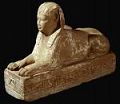
-380 The 100th Olympiad. Hathor dies, and his son Nepherites (Nefaarud) II (d. -380 becomes king #3 of the Egyptian 29th Dynasty, ruling only 4 mo. until army gen. Nectanebo (Kheperkare Nakhtnebet) I (d. -360) of Sebennytos overthrows him, becoming king #1 of the Egyptian 30th (XXX) Dynasty (ends -343) (last dynasty with Egyptian-born rulers), and successfully turns back the Persians, building a great Temple of Isis on Philae, an island in the Nile (closed 537 C.E.), causing the cult to spread throughout the Hellenic world in this cent.; Isis (later identified with the Greek goddess Demeter) is the daughter of the Earth and Sky (Keb and Nut), wears cow horns, has the personality of Athor (goddess of love and gaiety), marries her brother Osiris (Serapis) (judge of the dead), and has son Horus (god of day) - the original Hollywood couple? Agesipolis I dies, and his brother Cleombrotus I (d. -371) becomes Agiad king #22 of Sparta (until -371). Rome is rebuilt under an alliance with the Samnites of the S Apennines. Roman consuls: Titus Quinctius Cincinnatus (dictator) and Lucius Valerius Poplicola and Publius Valerius Potitus Poplicola and Servius Cornelius Maluginensis and Licinus Menenius Lanatus and Gaius Sulpicius Peticus and Lucius Aemilius Mamercinus and Gnaeus Sergius Fidenas Coxo and Tiberius Papirius Crassus and Lucius Papirius Mugillanus. Nonfiction: Plato (-427 to -347), The Republic (Res Publica); a Socratic dialogue that postulates the ideal state of Kallipolis, with philosopher kings "who love the sight of truth" (475c), at the top of a class society of alpha (rulers) (reason), beta (warriors) (spirit), delta (workers) (appetite) people; contains references to specialization of labor and production; "Until philosophers rule as kings or those who are now called kings and leading men genuinely and adequately philosophize, that is, until political power and philosophy entirely concide, while the many natures who at present pursue either one exclusively are forcibly prevented from doing so, cities will have no rest from evils... nor, I think, will the human race" (473c-d); becomes the first known advocate of the Credit Theory of Money, which claims that money originated as a unit of account for debt, and that money creation involves the simultaneous creation of money and debt, meaning that they're really the same thing. Births: Greek navigator-geographer Pytheas of Massilia (d. -300) in Massilia (Marseille), Gaul. Greek sophist philospher Anaxarchus (d. -320) in Abdera, Thrace. Greek historian Theopompus (d. -315) in Chios. Deaths: Greek dramatist Aristophanes (b. -448); leaves 40-44 plays, of which 11 survive to modern times: "Youth ages, immaturity is outgrown, ignorance can be educated, and drunkenness sobered, but stupid lasts forever" - big day for birds, frogs, etc.?

-379 Dionysius I of Syracuse finishes conquering S Italy. Theban democratic exiles led by (freedom fighter?) Pelopidas (d. -364) and Epaminondas conspire with Athens against the Spartan hegemony in Cadmea, recovering it by a stratagem, massacring the Spartan tyrants and establishing a democracy, causing two Athenian generals who aided the Thebans to be executed for operating without authority; Sparta does not directly intervene, but leaves Sphodrias with a garrison at Thespiae, and lets him operate without authority and raid Attica; Athens allies with Thebes against Sparta. Marsala on the W coast of Sicily is founded by the Carthaginians. Roman consuls: Publius Manlius Capitolinus, Gaius Manlius ?, Lucius Julius Iullus, Gaius Sextilius ?, Marcus Albinius ?, Lucius Antistius ?, Publius Trebonius ?, Gaius Erenucius ?.
-378 Timotheus (Timotheos), son of gen. Conon is elected strategos of Athens; Spartan king Agesilaus II is assigned the campaign against Thebes and Athens, and reorganizes the Peloponnesian League, forming 10 districts, each responsible for sending men or money, sending punitive expeditions into Boetia, prompting counterstrikes by Thebes, which is now commanded by Epaminondas, and attempting to seize Piraeus, driving Athens closer to Thebes, forming the Second Athenian Empire (ends -355), incl. most of the cities of Boeotia and some of the Ionian islands as a successor to the Delian League, after which the Spartans under Phoebidas are routed by the Thebans aided by the Athenians under gen. Chiabras at the Battle of Thespiae, liberating Thebes, with Phoebidas KIA; Chiabras wows the Spartans with a new battle maneuver of defending against a charge by resting on the left knee with shields resting on the ground and spears pointed forward; the new Athenian empire is much diminished in power, wealth, and influence, with Athens giving up all claims to its cleruchies and letting an allied council (synhedrion) rule jointly with the Athenian assembly (ecclesia). Etruscan actors stage the first theatrical performances in Rome. Roman consuls: Spurius (Lucius) Furius ?, Quintus Servilius Fidenas, Licinus Menenius Lanatus, Publius Cloelius Siculus, Marcus Horatius ?, Lucius Geganius Macerinus.

-377 Hecatomnus dies, and is succeeded by Mausollos (Mausolus) (d. -353) as virtually independent Persian satrap of Caria (Turkey), embarking on an expansionist policy. Greek sculptor Scopas (-395 to -350) of Paros moves to Athens, working there with Praxiteles for 25+ years, building the new Doric Temple of Athena Alea in Tega after the old one burns down in -394, with an ivory statue of Athena made by Endoeus (Endoios), which Augustus later moves to the Forum of Augustus in Rome; Scopas and Praxiteles found the Late Attic School of Sculpture. Roman consuls: Lucius Aemilius Mamercinus and Publius Valerius Potitus Poplicola and Gaius Veturius and Servius Sulpicius Rufus and Lucius Quinctius Cincinnatus and Gaius Quinctius Cincinnatus. Deaths: Greek physician Hippocrates of Cos (b. -460) in Larissa, Thessaly; Aristotle later calls him the "great physician": "Primum non nocere" ("The first rule is do no harm"); "Let food be thy medicine and medicine be thy food"; leaves the Hypocritical Kevorkian, er, Hippocratic Oath (attributed to him later?): "I swear by Apollo, the physician, by Aesculapius, by Hygieia, Panacea, and all the gods and goddesses... The regimen I adopt shall be for the benefit of my patients according to my ability and judgment, and not for their hurt or for any wrong. I will give no deadly drug to any, though it be asked of me, nor will I counsel such, and especially I will not aid a woman to procure abortion..."; also leaves Aphorisms; "Life is short, and Art is long" (Vita breva, Ars longa) - is there a doctor in the Acropolis?

-376 The 101st Olympiad. Callistrate is elected ruler of Athens. On the main day of the Eleusinian Mysteries, the Athenian fleet under gen. Chabrias, aided by up-and-coming gen. Phocion (Phokion) the Good (-402 to -318) (pupil of Plato) crushes the Spartan fleet in the naval Battle of Naxos, giving Athens control of the sea, becoming the first Athenian V since the Peloponnesian War; Chabrias breaks off from annihilating the Spartan fleet to pick up survivors so he doesn't end up like the gens. of the 406 B.C.E. Battle of Arginusae; the V makes Phocion a big man, and he proves his wisdom and works to earn his nickname "The Good" by going out to collect regional tributes in a single ship instead of the 20 offered, with the soundbyte "If I was being sent to fight the pesky islanders I would need a larger force, but since I'm visiting them as allies, one is enough". Thebes restores the Boeotian League on a democratic basis. Bas of Bithynia (-397 to -326), son of Boteiras becomes the first independent prince of Bithynia in NW Asia Minor (until -326), defeating Alexander I the Great's gen. Calas to maintain independence. The Thracian city of Abedera is sacked by the Thracian Triballi tribe from the South Morava, West Morava, and Iskar Rivers at the Sebian-Bulgarian border. Gaius Licinius Calvus Stolo, one of the 1- tribunes for the people begins making proposals which attempt to give the plebeians a fair shake vis a vis the patricians, causing a 10-year power struggle. Roman consuls: Lucius Papirius (Mugillanus) and Licinus Menenius Lanatus and Servius Cornelius Maluginensis and Servius Sulpicius Praetextatus. Deaths: Chinese king An of Zhou in King Lie (King Xian).
-375 Beginning of five years of anarchy in Rome, with no curule magistrates elected. The Zheng Kingdom in China is eliminated by the Han Jingdom, er, Kingdom. Zhou An Wang dies, and his son Zhou Lie Wang (d. -368) becomes Dong Zhou king #21 of China. Births: Greek mother of Alexander III the Great Olympias (d. -316); daughter of Neptolemus I of Epirus; 4th wife of Philip II of Macedon; mother of Alexander III the Great (-356 to -323); high priestess of the orgiastic snake-worshipping cult of Dionysus on Lesbos. Greek historian-architect Aristobulus of Cassandreia (d. -301) in Cassandreia. Greek physician ("the Younger Hippocrates") Diocles (Medicus) of Caryst(i)us (d. -295) in Carystus, Euboea.
-374 Persia unsuccessfully invades Egypt; about this time Persians finally give up putting their retro cuneiform on monuments (begun -570). Deaths: Greek king of Salamas (-410 to -374) Evagoras (b. ?) in Cyprus (assassinated by a eunuch for revenge).
-373 The city of Helice in Achaea, Greece is destroyed by an earthquake containing "immense columns of flame", becoming the first recorded instance of earthquake lights; at night a tsunami from the Corinthian Gulf inundates what's left, killing the entire pop.; the city of Boura further inland is also destroyed.
-372 The 102nd Olympiad. Births: Chinese philosopher Mencius (Meng-tse) (Meng Ke) (d. -289); disciple of Confucius, becoming the 2nd most famous Confucian after him.

-371 In the summer Sparta and the Theban allies reach a general peace settlement, but Spartan King Agesilaus II torpedoes it by singling Thebes out of its terms and not letting Theban king Epaminondas sign on behalf of all Boeotia, then sending Spartan troops under King Cleombrotus I to chastize Thebes; they meet in battle in only 3 weeks, but it backfires, and Sparta's 700 warrior citizens and 1.3K slave soldiers are soundly defeated by 6K Theban warriors at the Battle of Leuctra (Leuktra); Sparta loses 400 of its 700 remaining full citizens (officers) and never recovers; the city of Megalopolis (Gr. "big city") is founded in the prefecture of Arcadia by Epaminondas to celebrate his V as the seat of the Arcadian League; Sparta's hegemony over Greece is shattered, and Boeotia begins dominating Greece (until -338); Thebes withdraws from the Athenian League along with the cities in Acarnania, Euboea, and the Chalcidice; Cleombrotus I dies, and his son Agesipolis II (d. -369) becomes Agiad king #23 of badly sprained Sparta (until -369). Nonfiction: Xenophon of Athens (-431 to -354), Anabasis (Gr. "An Ascent") (7 vols.) (an expedition from a coastline to the interior of a country, as opposed to katabasis, from the interior to the coast); about the Greek expedition of the Ten Thousand against Artaxerxes II of the Persians and the long journey home after their sponsor Cyrus the Younger is KIA in Babylon at the 401 B.C.E. Battle of Cunaxa; how Spartan gen. Clearchus, the leader of the Ten Thousand is treacherously murdered in a conference by Tissaphernes, leaving Xenophon as one of the last three leaders of the soldiers, bravely leading them N from N Mesopotamia through Corduene and Armenia to the Black Sea at Trebizond; upon encountering some barbarians (Celts?), he puzzles about their strange drink: "There were stores within of wheat and barley and vegetables, and wine made from barley in great big bowls; the grains of barley malt lay floating in the beverage up to the lip of the vessel, and reeds lay in them, some longer, some shorter, without joints; when you were thirsty you must take one of these into your mouth, and suck. The beverage without admixture of water was very strong, and of a delicious flavor to certain palates, but the taste must be acquired." (Book IV) Births: Greek Peripatetic philosopher-botanist Theophrastus (Tyrtamus) (d. -287) in Eresus (Eressos), Lesbos; pupil of Aristotle (-384 to -322), who nicknames him Theophrastus for his cunning, er, graceful conversation.
-370 The Satraps Revolt results after Datames of Cappadocia et al. decide it's too risky to obey the Persian king Artaxerxes III's orders to recover Egypt; a Persian army from Pisidia led by gen. Artabazus is defeated by Datames, followed by another led by Autophradates. Amyntas III dies, and Alexander II (d. -368) becomes king of Macedonia. Alcetas I dies, and his son Neoptolemus I of Epirus (d. -357) becomes king of Epirus (until -357), claiming to be a descendant of Greek hero Achilles as well as king Lycomedes. The Arcadian League is formed under Theban protection as a counterweight to Sparta, and the city of Mantinea is restored; the league is ruled by the Ten Thousand, a gen. assembly of all freeborn citizens, meeting in Megalopolis. The Thebans under Epaminondas liberate the exiled Messenians from Sparta, and they return to the Peloponnesus next year, founding Messene (Messenia), with Pylos as its main port. Roman consuls: Lucius Furius Medullinus and Aulus Manlius Capitolinus and Servius Sulpicius Praetextatus and Servius Cornelius Maluginensis and Publius Valerius Potitus Poplicola and Gaius Valerius Potitus. Births: Greek king of Epirus (-342 to -330) Alexander I Molossus (d. -330); son of Neoptolemus I (d. -357); brother of Olympias (-375 to -316) (mother of Alexander III the Great); son-in-law of Philip II of Macedon (-382 to -336); husband of Cleopatra of Macedonia (daughter of Philip II); father of Neoptolemus II (d. -297). Greek sculptor Praxiteles (d. -330) in Athens; known for his statue of a faun? Macedonian Diadochi gen. Craterus (d. -321); son of Alexander of Orestis; brother of Amphoterus. Deaths: Greek philosopher Democritus (b. -460): "There is nothing but atoms and the void".
-369 Agesipolis II dies, and his brother Cleomenes II (d. -309) becomes Agiad king #24 of Sparta. Athens and Sparta make an alliance on equal terms, while Thebes works to unite all of Thessaly (except Pherae) under a single archon. Roman consuls: Quintus Servilius Fidenas and Gaius Veturius and Aulus Cornelius Cossus and Marcus Cornelius Maluginensis and Quintus Quinctius Cincinnatus and Marcus Fabius Ambustus. Births: Chinese Taoist pantheist philosopher Chuang-tzu (d. -286).
-368 The 103rd Olympiad. The patricians abuse their power of setting up a dictator in time of military necessity, appointing Camillus (hero of Veii, and butt-kicker of the Falerii, Gauls, Aequi, Volsci and Etrusci), and Capitolinus; unfortunately for the patricians, Camillus is big enough to compromise with the plebeians - I need your strength, I need your tender touch? Alexander II dies, and Ptolemy (Ptolemaeus) (Pteolemaios) (Gr. "warlike") Alorites (d. -365) becomes king of the Massy Mountains of Macedonia. Zhou Lie Wang dies, and Zhou Xian Wang (d. -320) becomes Dong Zhou king #22 of China. Roman dictators: Marcus Furius Camillus and Publius Manlius Capitolinus. Roman consuls: Titus Quinctius Cincinnatus Capitolinus and Servius Cornelius Maluginensis and Servius Sulpicius Praetextatus and Spurius Servilius Structus and Lucius Papirius Crassus and Lucius Veturius Crassus Cicurinus.

-367 Rome begins a series of four wars with the Gauls in C Italy (ends -349); 80-y.-o. Marcus Furius Camillus is made dictator for the 5th time; the Gauls siege Rome, after which Camillus defeats them near Alba; he then concedes the demands of the plebeians (plebs), dedicates a temple to Concord, and resigns; pleb tribunes Gaius (Caius) Licinius Calvus Stolo and Lucius Sextius Lateranus pass the Lex Licinia Sextia (Licinian-Sextian Rogations) (sounds like licentious sexual regulations?), which limit the amount of public land (500 iugera, or 2,500 eighths of an acre) and cattle a citizen can have, cutting down the few greedy patricians to size; debts can be forgiven by the payment of the principal only; the office of consular tribune is abolished, and henceforth at least one of the two consuls must be a plebeian; two patrician curule aediles are created to match the plebeian ones; the office of praetor urbanus is created; the duumviri (Duoviri) (two men of patrician status with priestly duties) who guard the Sibylline Books is increased to 10, with half of the priests required to be plebs; the plebeian-patrician struggle begins to go away as the line between them blurs, and within a cent. Rome is ruling and unifying all Italy from the Arno River (source at Mt. Falterona in the Apennines) to the Straits of Messina - party's over: breakthrough? After entering into an alliance with Athens, Dionysius I the Elder, known for competing at the Athenian drama festivals and having fun with Damocles (having a sword hanging by a hair suspended over his head at a banquet to teach him the insecurity of the most fortunate) dies in the spring during a war with Carthage, and his weak son Dionysius II (the Younger) (-395 to -343) becomes tyrant of Syracuse (until -356) under the regency of his uncle Dion, who immediately makes peace with Carthage; during the reign of Dionysius the Younger, Pythagorean philosophers Damon and Phintias (Pythias) gain fame when Phintias is condemned to death for treason, and requests home leave to arrange his affairs, with Damon offering to remain as hostage; Phintias is delayed and Damon is about to be executed, and is saved just in time when Phintias returns, impressing Dionysius so much that he pardons Phintias and asks to become friends with them both. Pro-Persian Spartan leader Antalcidas commits suicide. Philip of Macedon, youngest son of Amyntas II is captured by the Thebans and held hostage at Thebes for the next 3 years (until -364), using the opportunity to learn the A-1 Theban military techniques - which means that we oughtn't to a done that, right? Roman consuls: Marcus Furius Camillus (dictator) and Aulus Cornelius Cossus and Marcus Cornelius Maluginensis and Marcus Geganius Macerinus and Publius Manlius Capitolinus and Lucius Veturius Crassus Cicurinus and Publius Valerius Potitus Poplicola. Births: Macedonian Greek gen. and king #1 of the Egyptian 32nd (Ptolemaic) Dynasty (-305 to -283) Ptolemy I Soter (Gr. "savior") (Lagides) (d. -283); son of Lagus; general of Alexander the Great, and founder of the Ptolemaic (Lagid) Dynasty in Egypt; father of Ptolemy II (d. -246). Deaths: Syracuse tyrant Dionysius I the Elder (b. -430) in the spring.
-366 The first plebeian consul and the praetorship are created in Rome. Athenian gen. Chabrias is accused of treachery for advising the surrende of Oropus to the Thebans, and is acquitted, but bolts to Egypt, where he accepts a command under king Teos to fight the pesky Persians. Plato travels to Syracuse at the urging of Dionysius II's son-in-law Dion to set up a perfect state with Dionysius as a philosopher-king; by next year both Dion and Plato are expelled. Orontes I dies, and his son Orontes II (-336 to -325) becomes Persian satrap of Armenia (until -331). Roman consuls: Lucius Aemilius Mamercinus and Lucius Sextius Sextinus Lateranus (first plebeian consul). Architecture: The Temple of Concordia in Rome is built.


-365 Nectanebo I dies, and his son Djeho (Teos) (Tachos) (-360) becomes ruler #2 of the 30th Egyptian Dynasty (until -360); he plans an attack on the Persians but ends up fleeing to them for refuge instead. Ptolemy Alorites is killed by Perdiccas (Perdikkas) III (d. -359), who becomes king of Macedonia (until -359). The pro-Spartan party of Callistratus in Athens is replaced by the party of Timotheos, who is elected strategos of Athens; peace is made with Thebes on the basis of the status quo, then Athens breaks its promise and sends a cleruchy to garrison its ally Samos. Roman consuls: Lucius Genucius Aventinensis and Quintus Servilius Ahala. Births: Greek Cynic philosopher (lame) (hunchback) Crates of Thebes (d. -285) in Thebes; teacher of Zeno of Citium (-334 to -262). Deaths: Roman soldier-statesman Marcus Furius Camillus (b. -447). Greek philosopher Eucleides of Megara (b. -435) in Megara.


-364 The 104th Olympiad. Tyrant (since -369) Alexander of Pherae is defeated by Thebes in the Battle of Cynoscephalae; Theban gen. Pelopidas is KIA; Philip of Macedon returns to Macedon, and his older brother Perdiccas III appoints him gov. of a Macedonian principality. 80-y.-o. Agesilaus II tries to sell his services as a gen. to the Egyptians to make money for ailing Sparta, but the sight of the shriveled warrior only makes them laugh? Roman consuls: Gaius Sulpicius Peticus and Gaius Licinius Stolo. Art: About this time possibly legendary Athenian sculptor Praxiteles (Gr. "he who finishes his works"), sculpts a statue of Aphrodite of Knidos (Venus Pudica) (Modest Venus), modeled by Thespian courtesan Phryne (b. -371), becoming the first to sculpt the life-size nude female form, along with the statue of Hermes of Praxiteles (Olympia) and the Infant Dionysus; rediscovered in 1875 C.E. - this stupid knife dispenser is stuck? Births: Greek scholar gen. Eumenes of Cardia (d. -316) in Cardia, Thracian Cheronese; starts out as private secy. to Philip II of Macedon and Alexander III the Great. Deaths: Theban gen. Pelopidas (b. ?).
-363 Epaminondas leads a Theban army into Thessaly, and again defeats Alexander of Pherae. Athens subjects its allies Ceos and Naxos to its jurisdiction. Roman consuls: Lucius Manlius Capitolinus Imperiosus (dictator) and Gnaeus Genucius Aventinensis and Lucius Aemilius Mamercinus.
-362 On July 4 the Second Battle of Mantinea becomes Sparta's 3rd military D in history as the Thebans kick their butts while losing their military hero Epaminondas, along with his male lover Caphisodorus, who are buried together like husband and wife; Sparta is occupied by a Theban army; the Mycenaean Helot slaves (the backbone of the Spartan army, since true Spartans have resisted expansion of their ranks until only a few hundred remain) are liberated; this is the end of Sparta as a significant force in Greek politics, supplanted by Thebes (until -338). The Arcadian League breaks up, and oligarchs take control of many of its cities. The Romans begin a series of wars with the Hernici and other Latin cities (ends -345). After Artaxerxes III gives up on taking him in a straight fight, Datames is assassinated by a conference by his hit man double-agent Mithridates II of Cius (-386 to -302), son of Ariobarzanes II, going down as the greatest non-Greek and non-Roman general other than Hannibal and Hamilcar; Artaxerxes III's son Ariamnes I (d. -330) becomes Persian satrap of Cappadocia (until -330). Roman consuls: Appius Claudius Crassinus Regillensis and Quintus Servilius Ahala and Lucius Genucius Aventinensis. Deaths: Indian king Mahapadma Nanda (b. -450).
-361 Aristophon and Ebolos are elected rulers of Athens, which sends a cleruchy to occupy Potidaea. Athenian adm. Leosthenes (d. -323) is sent to take on Alexander, tyrant of Pherae, but is surprised and defeated, losing five triremes and 600 men, getting condemned to death as punishment. Roman champion Titus Manlius Imperiosus Torquatus defeats a Gallic champion in single combat near the Anio River, taking his torque (collar) and gaining his nickname - the first Roman Rocky? Roman consuls: Titus Quinctius Pennus Capitolinus Crispinus (dictator) and Gaius Licinius Calvus and Gaius Sulpicius Peticus. Births: Greek tyrant of Syracuse (-317 to -289) and king of Sicily (-304 to -289) Agothocles (d. -289) in Thermae Himeraeae (modern-day Termini Imerese), Sicily; brother of Antander. Greek Macedonian gen. Lysimachus (d. -281) (b. -355?) in Crannon (Pella).
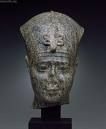

-360 The 105th Olympiad. Nectanebo II (d. -343) becomes the 3rd and last ruler of the Egyptian 30th Dynasty; Persia attacks, and he flees to Ethiopia. Agesilaus II dies, and his son Archidamus III (d. -338) becomes king of Sparta. Yitha'a Amar Bayyin II (d. -350) becomes the last makrab king of Saba, after which they lose control of the surrounding states and revert back to mere kings. Nonfiction: Xenophon of Athens (-429 to -354), Oeconomicus; about household mgt. and agriculture, becoming the first Greek text on economics. Births: Greek skeptic philosopher (first) Pyrrho of Elis (d. -270) in Elis; founder of the Greek Skeptic School; teaches that man is unable to know the real nature of the world or how it came into being (acatalepsia), and that instead of searching for the unknowable, men should be practical, follow custom, and accept the evidence of their senses, freeing themselves from worry (ataraxia) - if only man could settle for that? Roman consuls: Quintus Servilius Ahala (dictator) and Marcus Fabius Ambustus and Gaius Poetelius Libo Visolus. Births: Macedonian gen. Perdiccas (d. -320); descendant of the princes of Orestis. Greek Megarian philosopher Stilpo (Stilpon) (d. -280) in Megara; teacher of Zeno of Citium (-334 to -262). Greek first skeptic philosopher Pyrrho of Elis (d. -270) in Elis; inspiration for the 1st cent. B.C.E. Greek Skeptic (Pyrrhonist) School of Anesidemus of Cnossos, which teaches that man is unable to know the real nature of the world or how it came into being (acatalepsia), and that instead of searching for the unknowable men should be practical, follow custom, and accept the evidence of their senses, freeing themselves from worry (ataraxia) - if only man could settle for that?
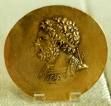
-359 Perdiccas III dies, and his younger brother Philip II of Macedon (-382 to -336) Amyntas IV, then kicks the runt out the window (executes him) and takes the crown for himself, quelling internal revolts. Roman consuls: Marcus Popillius Laenas and Gnaeus Manlius Capitolinus Imperiosus.
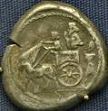
-358 Persian king (since -404) Artaxerxes II Mnemon (b. -445) dies, and his son Artaxerxes III Ochus (-425 to -338) becomes king of Persia (until -338), becoming the most bloodthirsty of all Persian rulers? The Athenians make peace with the Macedonians to leave them free to fight the Odrysae in Thrace; Macedonia gives up its claim to Amphipolis on the Macedonian coast, and Athens promises them Pydna, also on the coast; Philip II reorganizes his army along Theban lines, increasing the importance of the phalanx. Rome forces defeated Latin cities into the Latin League and renews the Foedus Cassianum of the -490s. Roman consuls: Gaius Sulpicius Peticus (dictator) and Gaius Fabius Ambustus and Gaius Plautius Proculus. Births: Macedonian king (-323 to -317) Philip III Arrhidaeus (d. -317); illegitimate son of Philip II; half-brother of Alexander III the Great. Greek (Macedonian) gen. Seleucus I Nicator (Gr. "conqueror") (d. -281) in Macedon; son of Antiochus, a gen. of Philip of Macedon. Deaths: Persian king (-404 to -358) Artaxerxes II Mnemon (b. -445).
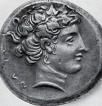
-357 Dion leads a rebellion in Syracuse that expels Dionysius II. Philip II of Macedon captures Amphipolis, but grants it independence instead of turning it over to Athens; in the winter he conquers Pydna, and keeps it; he makes a treaty against Athens with Olynthus, and marries Molossian princess (high priestess of Lesbos of the orgiastic snake-worshiping cult of Dionysus) Olympias (-375 to -316); 9 mo. later, here comes the son of god? - I'd like to climb her mountain? Chios, Rhodes, and Cos ally to overthrow their democratic govts., and together with Byzantium revolt against domineering Athens, beginning the War of the Allies (Social War) (ends -355); in midsummer the Athenian fleet under returned gen. Chabrias and new gen. Chares (known for staying in power via corruption) is decisively defeated, and Chabrias is killed in an attack on the island of Chios, after which Chares withdraws the fleet to the Hellespont to attack Byzantium. Roman consuls: Gaius Marcius Rutilus and Gnaeus Manlius Capitolinus Imperiosus.


-356 The 106th Olympiad. Roman consuls: Gaius Martius Rutilus (dictator) and Marcus Fabius Ambustus and Marcus Popillius Laenas. The first plebeian dictator rules in Rome - in short, it's the season of change? Philip of Macedon conquers Athennian ally Potidaea on the Macedonian coast. At the instigation of Thebes, the Amphictyonic Council fines Phocis for tilling land sacred to Apollo, but they refuse to pay despite a threat of war. On July 21 Greek psycho Herostratus sets fire to the Temple of Artemis in Ephesus in order to immortalize his name, after which he is executed, and any mention of his name forbidden under penalty of death, which doesn't stop historian Theopompus from immortalizing him in his Hellenics anyway, causing the expression "pursue a Herostratic honor" to be coined, along with the Streisand Effect; the temple takes 120 years to rebuild; Alexander III the Great (d. -323) is allegedly burn, er, bairn, er, born the same day. Architecture: The Artemision (Temple of Artemis) NE of Ephesus (near modern-day Selcuk, Turkey) is destroyed by fire, after which it is rebuilt by Macedonian architect Deinocrates (Dinocrates) (Dimocrates) (Cheirocrates) (Stasicrates) of Rhodes, becoming one of Pausanias' Seven Wonders of the World in his 10-vol. History of Greece (162 B.C.E.) (4.31.8; 7.5.4); the others are the pyramids at Giza, Egypt (only one to survive to modern times), the Hanging Gardens of Babylon, the Statue of Zeus in Olympia, Greece, the Mausoleum of Halicarnassus in Bodrum, Turkey, the Pharos Lighthouse in Alexandria, Egypt, and the Colossus of Rhodes in Rhodes, Greece; the Artemision becomes a famous place of sanctuary (Acts 19:23-41); the temple is destroyed in 263 C.E. after only 93 years. Births: Macedonian king (-336 to -323) and undefeated gen. (epileptic) (gay) ("the Madman of Macedonia") ("Conqueror of the World") Alexander (Gr. "defender of men") III the Great (d. -323) on July 20/21 (night) in Pella; son of Philip II (-382 to -336) and 5th wife Olympias (-376 to -316). Macedonian gen. (gay) (19-year lover of Alexander III) Hephaistion (Hephaestion) (d. -324). Deaths: Greek philosopher Aristippus of Cyrene (b. -435) in Cyrene, Libya; his daughter Arete of Cyrene takes over his Cyrenaic school.
-355 Faced by a series of revolts, Athens caves-in to the Persians and withdraws from Asia Minor, recognizing the independence of its allies there, and gives up its confederation, replacing the war party of Chares and Aristophon with a peace party under Eubulus; Isocrates is elected ruler of Athens; the theoric fund is founded for financial surpluses, to be used for public entertainment - is that like "I, Isocrates"? The Phocians, led by Philomelus seize Delphi, beginning the 10-year Third Sacred War (ends -346) with the Amphictyons, and allies with Athens and Sparta, using the sacred money from Delphi to pay for a large mercenary army. Philip II of Macedon takes the city of Crenides (Krenides) in E Macedonia (N Greece) from Thracian Odrysae and renames it Philippi, planning on making it a great city; gold coins made from the gold mines in the area are issued in his name. Roman consuls: Gaius Sulpicius Peticus and Marcus Valerius Poplicola. Births: Greek Macedonian gen. Peithon (Pithon) (d. -314). Greek Macedonian princess Cleopatra of Macedon (Epirus) (d. -308); daughter of Philip II of Macedon and Olympias of Epirus; sister-wife of Alexander III the Great; sister of Thessalonike and Cynane; half-sister of Philip III of Macedon. Greek Macedonian gen. Lysimachus (d. -281); Thessalian gen. of Alexander the Great, and ruler of Thrace from -323 to -281. Deaths: Greek astronomer-mathematician Eudoxus of Cnidus (b. -408).
-354 In the summer Philip II of Macedon captures Methone (Methoni) in Pieria after a long siege, during which he takes an arrow in the right eye from a sniper while inspecting siege machinery, but luckily his helmet deflects its trajectory, and Greek physician Critobulus of Cos uses the Spoon of Diokles to extract the arrowhead, saving his life although he loses the eye; he then advances into Thessaly. The Phocian mercenary army is defeated by the Boeotians at the Battle of Neon (Crocus Field) near the Gulf of Paghasitikos, and Philomelus is KIA; Onomarchus (d. -352) becomes the ruler of funky, funky, funky Phocis. After Calippus of Athens tricks Dion into thinking he's not in the conspiracy by feeding him rumors of one and swearing he's not in it at the Temple of Persephone on the day it is done, Dion of Syracuse (b. -408) is assassinated by unarmed Zacynthians who jump him and try to strangle him but fail, after which Lyco of Syracuse gives them a sword to finish him off; Calippus becomes tyrant of Syracuse for 13 mo. (until -352). Roman consuls: Marcus Fabius Ambustus and Titus Quinctius Poenus Capitolinus Crispinus. Births: Bithynian king #1 (-326 to -278) Zipoites (Zipoetes) (Ziboetes) I (d. -278); son of Bas (-397 to -326); father of Nicomedes I (-300 to -255). Deaths: Greek historian Xenophon (b. -431); leaves Agesilaus, and other works, incl. Cyropedia (Education of Cyrus), the prototype of the novel. Syracuse tyrant Dion (b. -408) (assassinated).
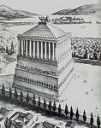
-353 The Phocians led by Onomarchus seize Thermopylae and Orchomenos, and defeat Philip II of Macedonia 2x. Roman consuls: Titus Manlius Imperiosus Torquatus (dictator) and Gaius Sulpicius Peticus and Marcus Valerius Poplicola. Deaths: King (since -377) Mausollos (Mausolus) of Caria; dies after annexing Rhodes and Cos; for his tomb his sister-wife Queen Artemisia builds the first Mausoleum (Tomb of Mausolus) in Halicarnassus (modern-day Bodrum or Budrum, Turkey) (finished -350).
-352 The 107th Olympiad. Philip II of Macedon defeats and kills Onomarchus, unites Thessaly under his rule, then marches S toward Greece, but is stopped at Thermopylae by the Phocians allied with the Athenians, Achaeans, and Spartans. After an unsuccessful attempt to conquer Messina, followed by a successful campaign against Rhegium, Calippus of Syracuse is KIA by his mercenaries Leptines II and Polyperchon with the same sword he used to kill Dion; Dion's brothers Hipparinus and Aretaeus (sons of Dionysius I) succeed as tyrants of Syracuse, attempting to stabilize Sicily. Roman consuls: Gaius Julius Iullus (dictator) and Publius Valerius Poplicola and Gaius Marcius Rutilius.
-351 The first plebeian censor in Rome is appointed. Persia attacks Egypt but fails. Sidon is burned by its inhabitants, and 40K are killed. Olynthus becomes suspicious of Philip II's designs and appeals to Athens for aid, and Demosthenes, leader of the anti-Philip party gives his three Olynthiac Orations, urging action against the Macedonian menace. Cyprus revolts against Persian rule (until -349), and Athenian gen. Phocion aids Persian emperor Artaxerxes III in subduing them. Roman consuls: Marcus Fabius Ambustus and Gaius Sulpicius Peticus and Titus Quinctius Poenus Capitolinus Crispinus.
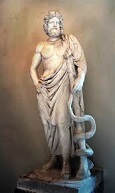
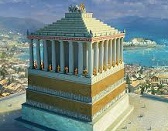
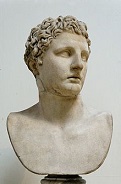
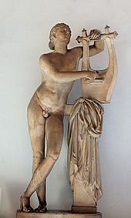
-350 Roman consuls: Lucius Furius Camillus (dictator) and Marcus Popillius Laenas and Lucius Cornelius Scipio. Tennes leads a revolt against the Persians in the Phoenician martime city of Sidon, which is crushed by Artaxerxes III with mucho killing; Artaxerxes III, assisted by Holophernes, brother of Ariarathes I of Cappadocia recovers Egypt. Neoptolemus I dies, and his son Alexander I of Epirus (-370 to -331) (brother of Olympias, and uncle of Alexander III the Great) becomes king of Epirus. becomes king of Epirus. Yadi'ubil Bayyin (d. -335) becomes king of Saba (until -335). About this time Pergamum (Pergamon) (Pergamos) in Asia Minor, whose acropolis atop a 1300-ft. cliff above the Calcus River gives it an excellent view of the Bay of Lesbos becomes known for its worship of Asclepius (Asclepios) (Asklepios), the god of medicine and healing (son of Apollo), known for his snake-entwined (no wings like Hermes' Caduceus) Rod of Asclepius that becomes a symbol of medicine; his daughters are Hygieia (cleanliness), Isaso (recuperation), Aceso (healing process), Aglaea (Aegle) (beauty), and Panacea (universal remedy); Epidaurus (Epidoros), his alleged birthplace becomes the #1 healing center of the ancient Greek-Roman world, lasting until the mid-5th cent. C.E. as a Christian healing center - the first free clinic for the treatment of sexually-transmitted disease? Chinese emperor Zhou Xian Wang makes Xiangyang in Hubei Province his capital, and institutes an agricultural tax. Shang Yang becomes PM of Qin under Duke Xiao, going on to standardize weights and measures, and build the Shang Yang Canal. About this time the nice seaport of Nice (Nikaia) (Gr. "victory") is founded on the Mediterranean coast by the Greeks of Massilia (Marseille) after a big V over the neighboring Ligurians, and it soon becomes one of the busiest trading ports on the Ligurian Coast, while engaging in rivalry with the nearby Roman town of Cemeneleum on nearby Cimiez Hill. By this time all of S Etruria is being kept in check by Roman garrisons and denationalized by an influx of Roman colonists. About this time Greek painter Antiphilus flourishes, working for Philip II of Macedon and Ptolemy I of Egypt, becoming a rival of Apelles. Architecture: The Mausoleum at Halicarnassus is completed as the tomb of King Mausollos of Caria by sculptors Leochares, Praxiteles, Scopas et al. Art: About this time the 7.3' nude dangly Apollo Belvedere statue is sculpted of white marble by Greek sculptor Leochares, showing Apollo after having shot an arrow; a Roman copy is made about 130 C.E., which is discovered in 1489 in Anzio, Italy, and ends up in the hands of Pope Julius II (Giuliano della Rovere); in 1755 German art historian Johann Joachim Wincklemann calls it the best example of the Greek aesthetic ideal, after which it becomes an icon of the Enlightenment; in 1796 Napoleon steals it from the Vatican, which gets it back in 1815 after his fall; about 325 B.C.E. Leochares also sculpts Diana of Versailles (Diana Chasseresse) (Artemis, Goddess of the Hunt), which is is given in 1556 by Pope Paul VI to Henry II of France, who places it in his Jardin de la Reine in Fontainebleau, after which in 1602 Henri IV moves it to the Louvre, after which in 1710 Louis XIV moves it to Versailles; a miniature replica stands on the fireplace mantle in the first class lounge aboard the Titanic when it sinks; Leochares also sculpts ivory-gold statues of Philip II of Macedon, Alexander III the Great, Olympias, Amyntas III, and Eurydice I, exhibited in the Philippeion in the Altis of Olympia, built by Philip II to celebrate his V at the Battle of Chaeronea in -338. Nonfiction: About this time Greek writer Aeneas Tacitus writes How to Survive Under Siege, a treatise on siegecraft, describing arrow-shooting machines; he also invents a coded optical communication system using torches and water jars. Births: Indian PM ("the Indian Machiavelli") Chanakya (d. -283). Athenian Peripatetic orator Demetrius Phalereus (d. -280) in Phalerum; pupil of Theophrastus. Deaths: Greek sculptor Scopas (b. -395); leaves Bust of Meleager, Statue of Pothos (Desire) (which is much copied with different props), Statue of Aphrodite (copper), Bust of Hygieia (daughter of Asclepius). Greek Athenian orator-gen. Callistratus of Aphidnae (b. ?) in Athens (executed).
-349 The revolt in Cyprus (begun -351) is quashed. Athens allies with Olynthus; meanwhile Philip II of Macedon begins capturing all the towns of Chalcidice, invading Euboea and setting up local tyrants who incite the local pop. to revolt from the Athenian League, causing the Athenians under Phocion to go against Demosthenes' advice and divide their forces between Euboea and Olynthus; hoping to win the Euboeans by diplomacy, Phocion establishes a camp near Tamynae, telling his men to ignore turncoats taking Macedonian bribes; Demosthenes unsuccessfully attempts to divert money from the Athenian theoric fund for the military. Long-lived Roman hero Marcus Valerius Corvus (-370 to -270) defeats a giant Gallic champion in single combat, helped by a crow (giving him his cognomen), ending the Fourth Roman-Gallic War (begun ?) - the second Roman Rocky? Roman consuls: Titus Manlius Imperiosus Torquatus (dictator) and Lucius Furius Camillus and Appius Claudius Crassus Inregillensis.
-348 The 108th Olympiad. Carthage signs a second treaty with Rome (first in -508). Athenian comdr. Phocian defeats a Euboean army under gen. Callias of Chalcis, almost losing when he decides to offer too many religious sacrifices before battle, allowing the Euboeans to attack first, then freeing the POWs for fear that his fellow Athenians would be too harsh with them before returning to Athens; meanwhile Philip II of Macedon takes Olynthus, destroys it and enslaves its pop., then makes peace with the Thracians. Roman consuls: Gaius Claudius Crassinus Regillensis (dictator) and Marcus Valerius Corvus and Marcus Popillius Laenas.
-347 The Thebans and Thessalians call on Philip II of Macedon to intervene on behalf of the Amphictyonic League and fight the Phocians in the Sacred War. Tyrant Dionysius II returns to Syracuse (until -345). Plato (b. -427) dies, and his nephew Speusippus (-407 to -339) succeeds him as head of the Academy in Athens, going on to reduce the Good from the #1 to #2 principle, and argue that one cannot know something until one knows all the differences which separates it from everything else, inventing the ideas of genera and species, and dividing philosophy into Dialectics, Ethics, and Physics. Roman consuls: Gaius Plautius Venno and Titus Manlius Imperiosus Torquatus. Deaths: Greek "number appears to lead towards truth" philosopher Plato (b. -427) in Athens at age 76-80; "I am the wisest man alive, for I know one thing, and that is that I know nothing"; "One of the penalties for refusing to participate in politics is that you end up being governed by your inferiors"; "Whatever deceives seems to exercise a kind of magical enchantment"; "Wonder is the feeling of the philosopher, and philosophy begins in wonder"; leaves The Dialogues, incl. nine tetralogies (arrangement ascribed to Tiberius' court astrologer Thrasyllus by Diogenes Laertius): 1: Euthyphro (attempt to define the meaning of piety to defend against the charge of impiety), Apology, Crito, Phaedo (which describes Socrates' last words and hemlock death, and claims that swans sing because they are inspired by Apollo, and is also claimed to have the beginning of the Gospel of John and the Trinity in it by St. Augustine); 2: Cratylus, Theaetetus, Sophist, Statesman; 3: Parmenides, Philebus, Symposium, Phaedrus; 4: Alcibiades 1 & 2, Hipparchus, Lovers; 5: Theages, Charmides (Temperance), Laches, Lysis; 6: Euthydemus, Protagoras, Gorgias, Meno; 7: Hippias Major, Hippias Minor, Ion ("Poetry is nearer to vital truth than history"), Menexenus; 8: Clitophon, The Republic, Timaeus ("God created the soul before the body and gave it precedence both in time and value, making it the dominating and controlling partner"), Critias; the Story of Atlantis is found in "Timaeus" and "Critias", allegedly passed down by his ancestor Solon; 9: Minos, Laws; Epinomis, Letters; spurious works incl. Axiochus, Definitions, Demodocus, Epigrams, Eryxias, Halcyon, On Justice, On Virtue, Sisyphus.
-346 After Philip II of Macedon marches into Phocis and destroys its cities, the Third Sacred War (begun -355) ends with disaster for the Phocians, who are kicked out of the Amphictyonic Council, ordered to pay a huge fine, and dispersed into small villages; Philocrates (Philokrates) is elected ruler of Athens, negotiating the Peace of Philocrates with Philip II along with Aeschines, Demosthenes, and seven other Athenian ambassadors, leaving the status quo; after the ambassadors are dealayed on their way back from Athens with approval of the assembly, Philip uses the opportunity to conquer more of Thrace; Philip II hosts the Pythian Games at Delphi with the Thebans and Thessalians, causing Panhellenic groupies to begin hailing him as the destined messiah who will lead them against common enemy Peria. Tyrant Dionysius II returns to rule Syracuse. Roman consuls: Marcus Valerius Corvus and Gaius Poetelius Libo Visolus.

-345 Dionysius II is replaced as tyrant of Syracuse by Hicetas, tyrant of Leontini. Mahapadma Nanda (-400 to -329) ("Destroyer of all the Kshatriyas") usurps the throne of Maghada in N India from Shishunaga, and founds the Nanda Dynasty (ends -321), which becomes known for its great wealth, building a 200K-man infantry with 20K-80K cavalry, 2K-8K war chariots, and 3K-6K war elephants, extending his rule from Bengal to Punjab, and S to the Vindhya Range and the Deccan Plateau, becoming the first great empire of N India. Roman consuls: Lucius Furius Camillus (dictator) and Marcus Fabius Dorsuo and Servius Sulpicius Camerinus Rufus. Births: Greek philosopher Menedemus of Eretria (d. -260) in Eretria; pupil of Stilpo and Phaedo of Elis. Green historian Timaeus (d. -250) in Tauromenium (modern-say Taormina), Sicily.
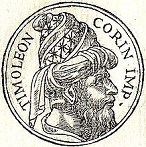
-344 The 109th Olympiad. Hicetas is ousted by Greek gen. Timoleon of Corinth (-411 to -337) at the request of the people of Syracuse, and exiled to Corinth; Timoleon institutes a moderate oligarchy complete with a dem. constitution that makes him military CIC, the priest of Zeus (amphipolos) as chief magistrate, and 600 wealthy citizens as the council; he then begins a campaign to oust other tyrants in Sicily and S Italy, causing Greek Sicily to revive its economy and culture. Philip II of Macedon begins a campaign to secure a foothold in the Peloponnesus, espousing the cause of the Argives, Messenians et al. against the Spartans; Demosthenes travels through the Peloponnesus trying to develop an anti-Macedonian alliance, delivering his Second Philippic at Athens. Roman consuls: Publius Valerius Poplicola (dictator) and Gaius Marcius Rutilus and Titus Manlius Imperiosus Torquatus.
-343 Persian king (since -358) Artaxerxes III Ochus (-425 to -338) reduces Sidon, conquers Egypt, and becomes the first (only) ruler of the Egyptian Thirty-First (31st) (XXXI) Dynasty (ends -332); 60 years of independence for Egypt ends, along with the New Kingdom - but the Isis-Osiris-Horus show goes on tour and breaks box office records? The First Samnite War (ends -341), the first of three Roman wars with the Samnites in S Italy begins when the Oscan Campanians ask for Roman aid against the Samnites - of course it's awful but it's a job? Roman consuls: Marcus Valerius Corvus and Aulus Cornelius Cossus Arvina. Deaths: Greek tyrant Dionysius II of Syracuse in Corinth (exile).
-342 Roman consuls: Marcus Valerius Corvus (dictator) and Quintus Servilius Ahala and Gaius Marcius Rutilus. Philip II of Macedon conquers Eumolpias (modern-day Plovdiv) in Thrace, and renames it Philippopolis; the Romans later rename it Trimontium ("City of Three Hills"), and make it the capital of Thrace. Alexander I Molossus (-370 to -330) (brother of Alexander III the Great's mother Olympias) becomes Aeacid king of Epirus (E coast of the Ionian Sea in modern-day S Albania and NW Greece). The Latin Revolt (ends -338) begins when the Lucanians invade Tarentum from C Italy, causing the latter to call on Sparta for help, and they send Archidamus III with an army and fleet. Inventions: The crossbow is used in the Battle of Ma-Ling in Henan Province, China. Births: Athenian comic dramatist Menander (d. -291); master of the Greek New Comedy; rival of Philemon.
-341 The Persians complete the conquest of Egypt. The Carthaginians under Hasdrubal and Hamilcar try to conquer Sicily but are defeated by Syracuse under Timoleon at the Battle of the Crimissus. Demosthenes gets Athens to form an anti-Macedonian alliance with Euboea and the Pelopennesus, and they send an army under gen. Chares to protect the Greek colonies of Chersonensus, Perinthus, and Byzantium from pesky Philip II, but they tell him to fuck off and almost cancel the expedition until Phocion talks them out of it. The First Samnite War (begun -343) ends in a draw after minor Roman Vs. Roman consuls: Gaius Plautius Venno and Lucius Aemilius Mamercinus Privernas. Births: Greek Epicurian philosopher (vegetarian) Epicurus (Gr. "ally/comrade") (d. -270) in Feb. in Samos.
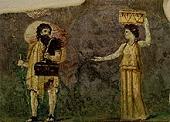
-340 The 110th Olympiad. Demosthenes is elected ruler of Athens. The Great (Second) Latin War (ends -338) begins when Latin and Volscian cities revolt against Roman domination of the Latin League; Roman consul Publius Decius Mus does a devotio, sacrificing himself to the gods in battle to guarantee a V in the Latin War - I Mus do it, I Mus? Philip II of Macedon sieges Perinth in Thrace, employing arrow-firing machines; meanwhile his 16-y.-o. son Alexander III rules Macedonia in his absence, puts down the rebellious Maedi in W Thrace, takes their chief city by storm, drives out its pop. and brings in his own settlers, and names the place Alexandropolis Maedica in honor of himself. The Romans begin settling Campania, displacing the Oscans and the Greeks (in Neapolis or Naples and Cumae), and founding or enlarging the towns of Capua, Puteoli, Nola, Pompeii, Hercules-worshipping Herculaneum, Nuceria, Teanum, Venafrum (known for fine olives) and Salernum; the coast becomes a favorite resort for wealthy Romans, who build villas at Misenum, Pompeii, Herculaneum, Puteoli, Baiae et al. About this time after being born rich and giving it away, lame hunchbacked Cynic philosopher Crates of Thebes (-365 to -285) moves to Athens, becoming the pupil of Diogenes of Sinope followed by the teacher of Zeno of Citium, marrying babe Hipparchia of Maroneia, sister of his student Metrocles, who gives up her wealth for him; he becomes known as the Door-Opener from his habit of entering any house he pleased, being welcomed with honor and gladness. About this time the city of Tianjin (Tientsin) (Chin. "ford of Heaven") on the Bohai Gulf of the Yellow Sea on the N coast of China (modern-day pop. 12.7M/15.4M) is settled, becoming China's largest coastal city. Roman consuls: Lucius Papirius Crassus (dictator) and Titus Manlius Imperiosus Torquatus and Publius Decius Mus. Births: Roman patrician politician Appius Claudius Caecus (gr. "the blind") (d. -273). Egyptian Ptolemaic queen #2 Berenice (Gr. "bearer of victory") I (d. -271); consort and half-sister of Ptolemy I.


-339 After the Athenians send gen. Phocion to aid Byzantium, and he earns their trust via his personal friend Leon, Philip II of Macedon sneak-attacks the city at night, but his army is spotted due to a bright crescent moon, causing the city dedicated to Diana, goddess of the hunt to adopt the crescent moon as its symbol; Phocon counterattacks and drives the Macedonians out of the region, but is wounded and returns to Athens; meanwhile the Megarians secretly request military help, causing him to arrive with his army and erect two long walls to the seaport of Nisaea, causing them to feel so safe that they ally with Athens. To prevent the Sicilian tyrants from allying with Carthage, Timoleon makes a separate peace with Carthage, establishing a boundary at the Halycus River, then expels the tyrants and forms a military league against Carthage; Timoleon then retires from public life. Philip II of Macedonia attempts to convince the Amphictyonic Council to fine Athens for improperly dedicating spoils from Persia and Thebes, but orator Aeschines (-389 to -314) gives a great speech that diverts attention to the Locrians of Amphissa, causing the Fourth Sacred War between the Macedonians and the Locrians to begin (ends -338); the Amphictyonic Council gives Philip II of Macedon command of the League's forces, causing the Athenians to enter an anti-Macedonian alliance with Thebes, and send a force of 10K mercenaries to guard Amphissa. Demosthenes reforms the financial system supporting the Athenian navy. Chalcedon-born Xenocrates (-396 to -314) becomes head (scholarch) of the Platonic Academy in Athens (until -314), backing Plato's teaching but claiming a third form of being other than the sensible and intelligible, corresponding to opinion; he splits with Plato by considering Platonic ideas to be identical with mathematical objects, and considers unity and duality to be gods that rule the Universe, and the soul to be a self-moving number; he believes in daemonical powers intermediate between the divine and moral, which consist of conditions of the soul; he teaches that virtue produces happiness, but that worldly goods can help. Roman consuls: Quintus Publilius Philo (dictator) and Tiberius Aemilius Mamercinus. Deaths: Greek philosopher Speusippus (b. -407) in Athens.
-338 In the summer Persian-Egyptian King Artaxerxes III Ochus is murdered along with all his sons except the youngest by his own cmdr., the eunuch Bagoas, and he is succeeded by Artaxerxes III's youngest son Artaxerxes IV Arses (d. -336), whose reign sows the seeds for Persia's ultimate downfall? On Aug. 2 after annihilating Athens' mercenary force and capturing Amphissa (Amfissa) (Salona) between Mt. Giona and Mt. Parnassus in Phocis 120 mi. NW of Athens, Philip II of Macedon and his son Alexander III the Great crush Athens and Thebes in their struggle for independence at the Battle of Chaeronea in Boeotia, at which the Sacred Band of Thebes of 300 paired gay warriors goes down (but not on each other any more?); the era of Greek independence is kaput, and Philip II is master of Greece; Alexander burns all of Thebes except the house of poet Pindar, and garrisons Thebes while letting Athens go free; the Fourth Sacred War (begun -339) ends; Greece loses its independence until 1820 C.E.; Philip II declares the League of Corinth to unite the Greeks in a war against Persia, causing all Greek states except Sparta to join under Macedonian hegemony but with members guaranteed autonomy, with only Thebes, Corinth, Chalcis, and Ambracia garrisoned; the Achaean League joins the opposition to Philip II and is dissolved; Macedonia replaces Thebes as the leading Greek state (hegemon); Athens elects Gen. Phocion (who was touring the Aegean colonies) during the Battle of Cheronea) as strategos for the first of 45x, going on to try unsuccessfully to stop Athens from joining the Hellenic League. Archidamus III of Sparta invades S Italy, which ends in defeat and his death, and his son Agis III (d. -331) becomes Eurypontid king #21 of Sparta (until -331). Ctesiphon is elected ruler of Athens. The Latin Revolt (begun -342) ends after Sparta is defeated and Archidamus III is KIA at the Battle of Manduria (in modern-day Taranto). The Great Latin War (begun -340) ends with a Roman V at the Battle of Trifanum; the Latin League is dissolved, and Rome now dictates Latin foreign policy; most of the conquered Italic states have their land confiscated to become ager publicus, and are reduced to the status of civitates federatae (allied states), forced to contribute soldiers to Rome; old Latin states such as Tibur (Tivoli) (20 mi. from Rome at the confluence of the Sabie and Aniene Rivers) and Praeneste retain autonomous govts. with the right of ius migrationis (becoming Roman citizens if they move to Rome); their remaining enemies form a last ditch anti-Roman coalition, which incl. the Etruscans, Umbrians and Gauls in the N and the Lucanians, Bruttians and Samnites in the S (ends -280). Roman consuls: Lucius Furius Camillus and Gaius Maenius.
-337 The Second Congress of Corinth (first in -481) declares a Common Peace. In 337 B.C.E. Philip II reorganizes the conquered Greek territories in the Corinthian League; Alexander III the Great repudiates his wife Olympias, who goes into exile in the Molossian court of Alexander I of Epirus and plots against him with hatey hate hate hate, trying to talk him into making war on Philip II, which he doesn't buy, instead marrying Philip II's daughter (his niece) Cleopatra of Macedon (-355 to -308) next year (put up to it by Olympias?). The first plebeian praetor in Rome is elected, and the praetorship is made the stepping stone to the consulate. Roman consuls: Gaius Claudius Crassinus Regillensis (dictator) and Gaius Sulpicius Longus and Publius Aelius Paetus. Deaths: Greek statesman-gen. Timoleon (b. -411) in Syracuse, Sicily; dies blind, and is buried at the expense of the citizens, who build a monument and gymnasium called the Timoleonteum.

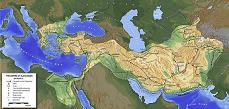

-336 The 111th Olympiad. In the spring Persian king Arses is murdered by Bagoas, and Darius III Codomannus (d. -330) kills him and becomes king of Persia, and the last ruler of the 31st Egyptian Dynasty; he is a cousin of Artaxerxes III, whom the eunuch Bagoas murdered, and was raised by the eunuch Bagoas, whom he in turn murders. A proven 40 is traded for an unproven 20? In the summer after sending a 10K-man army under gen. Parmenio (-400 to -330) to Asia Minor, 46-y.-o. Macedonian King Philip II (b. -382) is assassinated by a disgruntled bodyguard during the wedding of Olympias' daughter Cleopatra to her brother Alexander I of Epirus, and his 20-y.-o. son Alexander III the Great (-356 to -323) succeeds; Greek historian Diodorus later attributes the assassination to the Fates, but attributes Alexander's er, reat success to "his own force of character"; although his daddy left 60 talents in the treasury, he owed 500, leaving Alexander a net of only a few gold and silver cups; driven by a boundless desire for glory, he borrows 800 talents, forms a comparatively small but good army, and sets out looking to conquer you guessed what, invading Illyria and Thrace; meanwhile Philip's lavish tomb at Vergina 75km SW of Thessaloniki, filled with a gold sarcophagus and gobs of exquisite gold doodads and prepared years in advance is sealed, and rediscovered in 1978 beneath a host of other tombs that had been ransacked by robbers; it contains a carved ivory hunting scene, incl. a cool tiny Bust of Alexander, which breaks with tradition and shows a lifelike depiction, becoming the first political portrait?; Alexander goes on to have many statues made depicting his charismatic blonde big-hair Caucasian face with straight aquiline nose, which ends up on coins for centuries, being used by future rulers to give credibility to their regimes? Demosthenes is elected ruler of Athens; gen. Phocion bans all celebratory sacrifice for Philip II, with the soundbyte "It isn't worthy enough that the army that defeated us at Cheronea has lost just one of its soldiers". The rulership of Timoleon in Syracuse gives way to a democracy (ends -317). Roman consuls: Lucius Papirius Crassus and Kaeso Duillius.
Minus 335, Aristotle begins his jive?

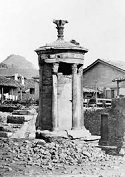
-335 Roman consuls: Lucius Aemilius Mamercinus Privernas (dictator) and Marcus Atilius Regulus Calenus and Marcus Valerius Corvus. A rumor that Alexander III the Great had died on campaign causes Thebes, Athens, Arcadia, Elis, and Aetolia to revolt against the Macedonians, and Alexander rushes S, captures and destroys Thebes (except for a statue of poet Pindar) and enslaves its pop., and defeats the rebellion in Illyricum; when Alexander refuses to see the Athenian ambassadors, Phocion is sent, and when Alexander asks his advice out of respect to his father, he tells him to quit oppressing Greece and go after Persia, which advice Alexander takes, making Phocion one of his favorites ahead of a lot of Macedonians, packing his lunch basket for his great campaign to kick Persian butt; meanwhile the-cat's-away Olympias orders the murder of Philip II's other wife Cleopatra. After breaking ranks with his master Plato of the Academy in Athens, Aristotle (Gr. "best (purpose) of all") of Stagira (-384 to -322) begins his career by founding a gymnasium in E Athens called the Lyceum (Lykeion), named after a nearby temple to Apollo Lycean (Gr. "lukos" = wolf), founding the Peripatetic School, named either after the collonades of the Lyceum, or for his habit of walking and talking; he prefers to go around collecting data before solving problems, vs. Platonists, who sit around thinking up answers by pure thought; Aristotle writes the 10-vol. Nicomachean Ethics, which becomes a hit during the European Middle Ages, and uses lunar eclipses to prove that the Earth is ball-shaped. About this time Greek Peripatetic philosopher-musician Aristoxenus of Tarentum (b. -375) (pupil of Aristotle) flourishes, leaving Elements of Harmony, becoming the main modern source of knowledge about ancient Greek music. Architecture: The Choragic Monument of Lysicrates in Athens is begun (finished in -334), becoming the oldest known building of the Corinthian Order, allegedly invented by Callimachus after he visited the tomb of a virgin whose nurse placed a tile on a basket of valuables on the root of an acanthus plant, which grew around it, forming volutes at the extremities. Births: Green physician (the first anatomist) (co-founder of the Medical School of Alexandria) Herophilus (Herophilos) (d. -280) in Chalcedon; lives in Alexandria. Greek Peripatetic philosopher (dir. #3 of the Lyceum) Strato of Lampsacus (d. -269); son of Arcesilaus of Lampsacus; tutor of Ptolemy Philadelphus and Aristarchus of Samos; denies the need for a God to create the Universe.


-334 In May Alexander III the Great launches his campaign against Persia, leaving his gen. Antipater (-397 to -319) as gov. of Greece and worshipping at Dion at the foot of Mt. Olympus, then crossing the Hellespont with an army of 32K infantry and 5K cavalry, and a 160-ship navy of Greek allies; his approach causes most Greek cities of Ionia to revolt against their Persian masters; in June after Persian naval cmdr. (of Greek forces in Persian service) Memnon of Rhodes unsuccessfully advises a tactical retreat, Alexander totally defeats the Persian army of Darius in the NW corner of Asia Minor in the Battle of the Granicus River (which flows from Mount Ida to the W shore of the Sea of Marmara near Priapos, and is named for river god Granicus or Grenikos), then conquers Lydia (incl. Sardis) and liberates the Persian bases of Miletus and Helicarnassus, cutting off access to food and water to the Persian fleet under Memnon of Rhodes (-380 to -333), which flees, alowing Alexander to capture the rest of the ports on the Anatolian coast; Ephesus breaks away from the Persians and comes under control of a series of Hellenistic rulers. King (-350 to -331) Alexander I Molossus of Epirus (-370 to -331) (brother of Olympias, and uncle of Alexander III the Great) is called in by the Greek colony of Taras (Tarentum) in Magna Graecia in S Italy to fight the Italiote League of the Oscan-speaking Lucanians (Lucani) and the Bruttii, setting a precedent for Epirus to interfere in their affairs. Su Qin persuades six kingdoms to fight the Qin (Ch'in) kingdom. Roman consuls: Publius Cornelius Rufinus (dictator) and Spurius Postumius Albinus and Titus Veturius Calvinus. Architecture: The grand Temple of Apollo in Didyma in modern-day Turkey is begun; it is never finished, and construction ends in 300 C.E.; an earthquake damages it in the 16th cent.; in Oct. 1979 Lothar Haselberger of the Tech. U. of Munich discovers nearly complete plans for it inscribed in stone on some of its walls. Births: Greek philosopher (founder of Stoicism) Zeno of Citium (d. -262) in Citium, Cyprus; pupil of Crates of Thebes (-365 to -285).


-333 In the spring Memnon of Rhodes dies during the siege of Mytilene, causing Darius III to withdraw his Greek mercenaries into Syria and gather a large army. Alexander III the Great subdues Ancyra (modern-day Ankara), Caria, and Cilicia, then advances into Syria; in Nov. he defeats Darius III in the SE corner of Asia Minor at the Battle of Issus, a seaport on a narrow coastal strip between high mountains and the Gulf of Issis in Cilica (near modern-day Alexandretta, Syria), causing Darius to offer him 10K talents plus all of Asia W of the Euphrates if he backs off, but Alexander demands unconditional surrender; Alexander takes Memnon of Rhodes' widow Barsine (-363 to -309) as his mistress, becoming the only woman he has sex with until his marriage to Roxane in -327 (how many men, though, who knows - at least he doesn't have to make the Macedonian bar scene anymore?); Alexander III the Great makes Antigonus I (Cyclops) (Monophthalmus) (-382 to -301) gov. of Phrygia in W Asia Minor; Phoenicia, incl. Sidon, Arwad, and Byblos is conquered, except for hard-to-crack Tyre, causing Alexander to begin a 7-mo. siege (ends (-332); meanwhile after Rhodes allies with Ptolemy, he sends his son Demetrius I Poliorcetes ("besieger of cities") (-337 to -283) to invade it with 40K men, and after he finds its walls impregnable he sieges it (until -304), building massive siege towers, the first ship-borne tower capsizing in a storm, and the larger land-based Helepolis stopped by flooding the land in front of the walls. The Qin defeat the Wei. Roman consuls: Publius Cornelius Ruffinus (dictator).

-332 The 112th Olympiad. In Jan. blonde-blue Macedonian king (since -336) Alexander III the Great (-356 to -323) sieges the well-protected island city of Tyre under its last king Azemilkos, and captures it in Aug. after a 7-mo. siege by building an enormous mole connecting it permanently with the mainland, during which time he goes underwater in a diving bell to observe divers removing underwater obstacles, and has his vessels equipped with chain cables so that they couldn't be cut adrift at night; he crucifies 2K POWs and sells 30K more into slavery; the Persian navy disintegrates, and Phoenician trade slackens as the Phoenicians lose their identity and are Grecianized; Alexander then obtains the submission of the provinces of Galilee, Samaria and Judah, and invades Egypt, and Persian satrap Mazaces surrenders without a fight, ending the 31st Egyptian Dynasty (begun -343); Alexander stay in Egypt for a year, visiting the Egyptian coast and ordering the Temple of Luxor restored to its ancient glory, then having an overwhelming desire to found a new city (according to Roman author Arrian), which becomes Alexandria (modern-day pop. 5M), then visits the Oracle of Amon-Ra at the Siwah Oasis in the Western Desert (barely making it and almost dying of thirst), where is proclaimed the son of god; the Late Period of Ancient Egypt (begun -664) ends; there were settlements in the Alexandria area for several hundred years?; Rhodes voluntary recognizes Alexander the Great's sovereignty (until -323); Alexander III the Great's uncle Alexander I of Epirus crosses the Adriatic Sea to Italy to assist the Tarentines against the Lucanians, Bruttians, and Samnites, and wins a V over the Samnites and Lucanians near Paestum, making an arrangement with the Romans for a joint attack on the Samnites, taking Heraclea from the Lucaanians, and Terina and Sipontum from the Bruttii, causing the Tarentines to fear that he's trying to set up a kingdom in Italy and turn against him. According to Jewish historian Josephus in his Antiquities 11.317-45, Alexander III the Great visits Jerusalem, and the Jewish elders freak him by reading to him from the Book of Daniel (Ch. 2) the prophesy about the statue with a head made of gold, chest and arms made of silver, belly of brass, legs of iron, and feet of iron mixed with clay, explaining that the head is Babylon, the breast and arms Medo-Persia, the brass belly and thighs Greece, and the iron legs Rome, before or after which he has a dream about the Jewish god being right and sacrifies to him, sparing the city from sacking although putting it under his control; they probably didn't read to him from Ch. 8, which talks about the shaggy goat with one large horn between its eyes that is replaced by four horns that have lesser power?; too bad, the pop. of Gaza puts up a fight at a stronghold on a hill, causing Alexander to siege and take it in Oct. after suffering a serious shoulder wound, massacring the men and selling the women and children into slavery; meanwhile after cooperating with Alexander (who thinks Jerusalem is a no-value town run by stargazers?), the Samaritans build their Samaritan Temple to Jehovah on Mount Gerizim. Roman consuls: Marcus Papirius Crassus (dictator) and Gnaeus Domitius Calvinus and Aulus Cornelius Cossus Arvina.

-331 On Apr. 7 the city of Alexandria on the Cape Lochias Peninsula, protected by the island of Pharos is founded by Alexander III the Great, with Cleomenes of Naucratis (d. -322) as gov. #1; a number of Jews settle there immediately - and begin churning out the New Testament? In the spring Alexander III the Great leaves Egypt and marches for Mesopotamia, quelling a rebellion by the Jews in Samaria, then expelling the pop. and inviting Macedonians to move in; after conquering the Amman Citadel in Jordan and renaming the city Philadelphia, he crosses the Euphrates and Tigris Rivers without opposition, and turns S on the Royal Road toward Susa; on Oct. 1 after faking the Persians out, causing them to stay awake all night looking for a night attack, Alexander's 47K-man army decisively defeats the 100K-man (1M?) army of Darius III Codomannus (complete with elephants and scythed chariots) at the Battle of Gaugamela near Arbela (modern Arbil or Erbil in Iraq), with Darius refusing to delegate authority, causing him to personally screw everything up, causing up to 90K Persian vs. 1K Greek casualties, after which the loser flees to Arbela, leaving behind his chariot, bow, and a large store of coins, and forgetting to destroy the bridges behind him, joining up with 2K loyal Greek mercenaries, some Bactrian cavaly and what's left of his royal guards, regrouping to Ecbatana; meanwhile Alexander has control of half of Persia, and on Oct. 21 Alexander and his massy Macedonians triumphantly enter Babylon, and wins over the Babylonian priesthood by restoring the worship of Marduk; Armenian satrap Orontes II is KIA, and Alexander appoints Orontes' son Mithanes (-370 to -317) as new satrap, founding the Orontid (Ervanduni) Dynasty in Armenia, which eventually becomes kings (with Mithanes I as king #1) and rules Armenia until -200; he then decides to conquer the rest of Persia; meanwhile Sparta, seeing its chance and aided by Persian money allies with Elis, Achaea, and part of Arcadia, and defeats a Macedonian force sieging Megalopolis, causing Antipater to march into the Peloponnesus and crush them after Alexander sends him a large sum of money to finance the war; Agis III dies, and his brother Eudamidas I (-330 to -305) becomes Eurypontid king of sputtering Sparta. In 331 B.C.E. the Italiote League defeats Alexander I of Epirus at the Battle of Pandosia, and Alexander I is KIA by a Lucanian, leaving son Neoptolemus and daughter Cadmea, after which Roman historian Livy speculates that if Alexander III the Great had taken on the Romans he would have found out that fighting everybody else would have been like waging war against women. Orator Lycurgus (-396 to -324) is elected ruler of Athens. Ariamnes I dies, and his son Ariarathes I (-403 to -322) becomes satrap of Cappadocia (until -322). Roman consuls: Gnaeus Quintilius Varus (dictator) and Gaius Valerius Potitus and Marcus Claudius Marcellus. Births: Greek Stoic philosopher-mathematician Cleanthes of Assos (d. -231) in Assos (near Troy); head of the Stoic School in Athens.


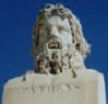

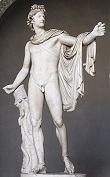
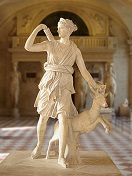
-330 On Jan. 20 the Battle of the Persian Gate sees Alexander III the Great and his 60K-man army take mountain pass known as the Persian Gates (Darvazeh-ye Fars) (modern Tang-e Meyran), after which he takes Susa, holding a festival which incl. athletic events, after which he reorganizes his army for guerrilla warfare, dividing it into units of 75-100 men; in Jan. he reaches the Persian capital of Persepolis, and finds several mutilated Greek captives, pissing him off and adding fuel to the fire of the atrocities committed against Athens 150 years before (-480) by Xerxes, after which the city is looted and burned in revenge; after promising not to do it since he wants to rule the country but getting drunk, Alexander and his army burn the great Palace of Xerxes; the captives allegedly debate whether they should return and shock their families, or stay in Persia with friends with benefits - I'm thinking Arby's? In the spring Alexander III the Great pursues Darius III N through Media toward his summer palace on the Caspian Sea, meeting up with Darius' troops at Damghan, then learning that Darius has been arrested by his own satraps in Parthia (modern Afghanistan) in hopes of stopping Alexander from invading Persia further, but Alexander refuses the offer and attacks; in early July Darius III is murdered near Rhagae in the Persian desert E of modern-day Tehran by his own kinsman Bessus (d. -329), satrap of Bactria, who retreats to Bactria and proclaims himself Darius' successor Artaxerxes V; Alexander views Darius' body, covering it with his cloak (he wanted to keep him alive as a puppet king), then pursues Bessus, subduing the Caspian region and taking Aria in Sept., then Drangiana in Nov., then marching S into Persia. Demosthenes is accused by Aeschines of illegally accepting a civic crown, then tried and acquitted. Compulsory military training for all Athenian youth (epheboi) is established. Alexander I of Epirus (b. -370) is KIA at the Battle of Pandosia by a Lucanian emigrant, and the Italiote League breaks up, after which the Epirotes eventually leave Italy. Olympias returns to Molossis and serves as regent for her cousin Aeacidas. Philotos, son of Parmenio (b. -400) is executed for complicity in a plot, causing Alexander to send messengers to murder Parmenio in Media to prevent a possible revolt. Seuthes III (d. -300) becomes king of Ordysai (between the Haimos and Rhodope Mts.). The Kingdom of Qataban in S Arabia is founded (ends 160). The Lihyan Kingdom in N Arabia is founded (until -100). Greek geographer Pytheas of Massilia (-380 to -300), seeking to circumvent the Phoenician monopoly sets sail from Massalia (Marseille), passing through Gibraltar then sailing N as far the British Isles, the coasts of France and Denmark, the Shetland (Zetland) Islands, and possibly to Iceland and Norway, which he calls Thule (because if you try to pee you'll freeze your tool?), and the mouth of the Don River in the Black Sea; the first literate explorer of these areas, he refers to the British Isles as the Isles of the Pretani (Britanni) ("people of the designs"), made up of Irish Cruithin (Gael. "painted or tattooed people"), Scottish Picts (Lat. "painted or tattooed people") and Welsh Britons; he also develops the use of North Star sightings to determine latitude, and discovers that tides are related to the phases of the Moon. Fergus (Gael. "highest choice") I Mor (the Great) (d. -305), son of Erc becomes the first king of Dalriada in W Scotland, transporting the 335-lb. Stone of Scone (pr. "SKOON") from Ireland to Argyll before being crowned on it; actually a line of kings leading to real king Kenneth MacAlpine (d. 858) is invented in the 14th cent. C.E., and not exposed until 1729 by Father Thomas Innes, but they keep cropping up in chronologies until the mid-1960s, so why not keep them for funners? Athenian courtesan Thais accompanies Alexander III the Great on his Asiatic campaign? As Alexander's troops, which come from all over Greece and speak various dialects (not only the "pure" Attic one) begin to develop their own Koine (common) dialect, the Hellenistic Koine Period of the Greek Language begins (ends 330 C.E.), replacing Aramaic as the universal language of the civilized West in the wake of Alexander's conquests, and continuing even after the Roman takeover. About this time Greek poet ("the Daedalus of Tasty Dishes") Archestratus (Archestratos), born in Gela or Syracuse in Sicily flourishes, becoming the first cookbook writer with his humorous didactic poem Hedypatheia (The Life of Luxury), which waxes lyrical about a "boiled torpedo done in oil and wine and fragrant herbs, plus some thin grated cheese"; he also writes the amorous poem The Art of Cookery. The Iron III Period of Archaeology (begun -600) ends, and the Hellenistic Period of Archaeology begins (ends -63). Art: The Red Figure Period of Greek art ends, and the Hellenistic Period of Greek Art (ends -31) begins, spreading with Alexander III the Great's conquests, only to be stopped by the Romans with the defeat of Cleopatra VII at Actium; the statue of Hermes of Praxiteles (Olympia) and the Infant Dionysus is finished, and so is he; rediscovered in 1875 C.E. - this stupid knife dispenser is stuck? About this time the 7.3' nude dangly Apollo Belvedere statue is sculpted of white marble by Greek sculptor Leochares, showing Apollo after having shot an arrow; a Roman copy is made about 130 C.E., which is discovered in 1489 in Anzio, Italy, and ends up in the hands of Pope Julius II (Giuliano della Rovere); in 1755 German art historian Johann Joachim Wincklemann calls it the best example of the Greek aesthetic ideal, after which it becomes an icon of the Enlightenment; in 1796 Napoleon steals it from the Vatican, which gets it back in 1815 after his fall; Leochares also sculpts Diana of Versailles (Diana Chasseresse) (-325), which is is given in 1556 by Pope Paul VI to Henry II of France, who places it in his Jardin de la Reine in Fontainebleau, after which in 1602 Henri IV moves it to the Louvre, after which in 1710 Louis XIV moves it to Versailles; a miniature replica stands on the fireplace mantle in the first class lounge aboard the Titanic when it sinks; Leochares also sculpts ivory-gold statues of Philip II of Macedon, Alexander III the Great, Olympias, Amyntas III, and Eurydice I, exhibited in the Philippeion in the Altis of Olympia, built by Philip II to celebrate his V at the Battle of Chaeronea in -338. Architecture: The 3rd Temple of Apollo in Delphi, Greece is completed to replace the 2nd one, which was destroyed in -375 by an earthquake; "Know thyself" (Gr. "gnothi seauton") is inscribed in the forecourt (pronaos). Nonfiction: Aristotle (-384 to -322), Politics; a critique of Plato's advocacy of rule by philosopher-kings, analyzing monarchy, aristocracy, constitutional govt., tyranny, oligarchy, and democracy; disses common ownership of property because of the "wickedness of human nature", with the soundbyte: "It is clearly better that property should be private, but the use of it common, and the special business of the legislator is to create in men this benevolent disposition"; dumps Plato's credit theory of money for Metallism, the theory that money derives its value from the purchasing power of the commodity upon which it is based, is only a medium of exchange, an "instrument", and on its own "it is worthless... not useful as a means to any of the necessities of life", but warns about obsession with money accumulation, praising "wealth-getting" for one's household as "necessary and honorable", while dissing the massing of money via retail trade as "justly censured, for it is dishonorable", also dissing usury and monopolies. Roman consuls: Lucius Papirius Crassus and Lucius Plautius Venno. Births: Greek philosopher (in Macedonia) Euhemerus (Gk. "happy, prosperous") (Euemeros) (Evemerus) (d. -260) in Messina, Sicily (Chios?) (Tegea?); teaches at the court of Macedonian king Cassander; originator of Euphemerism, which holds that myths can be attributed to historical persons and events. Deaths: Macedonian gen. Parmenio (b. -400) in Media (murdered). Greek king of Epirus (-342 to -330) Alexander I (b. -330) in Pandosia, Italy (KIA). Greek sculptor Praxiteles (b. -370).
-329 Early in the year Bessus tries to prevent Alexander the Great from crossing the Oxus (Amu Darya) River into Bactria, but fails, and his own men hand him over to Alexander, who mutilates him by cutting off his ears and nose, then has him brought back to the place where he killed his master and tried by a Persian court and crucified; Alexander then invades soggy Persian-held Sogdiana in C Asia SE of the super-salty (10%) Aral Sea between its filler-uppers the Oxus (Amu Darya) (S) and Jaxartes (Syr Darya) (N) Rivers, and conquers the Persians under Spitamenes (Spitamaneh) (-370 to -328) with difficulty, conquering the capital Samarkand (Maracanda) in modern-day Uzbekistan (modern-day pop. 500K) before invading Afghanistan and capturing Gandara (Kabul) 125 mi. E of the Khyber Pass (modern-day pop. 4.6M), causing the Afghanis to resist with guerrilla fighting, which Alexander meets with scorch-and-burn tactics; he then detours NE through the Hindu Kush ("Hindu killer"?) in the spring, and captures Arachosia in Mar.; meanwhile the pagan Kafirs in Kafiristan are formed by Greeks staying in the country, becoming an unconquerable region that is later used as the setting of Rudyard Kipling's 1888 story The Man Who Would Be King. Roman consuls: Lucius Aemilius Mamercinus Privernas and Gaius Plautius Decianus.
-328 The 113th Olympiad. Alexander III the Great, "Conquerer of the World", "the Macedonian Madman" becomes great king of Persia, showing favor to them by adopting many Persian customs, dressing up as a Persian, making people bow down to the ground and kiss his feet (proskynesis), and generally letting his passions take him over; he drinks wine to excess, and believes in diviners, who throng his court; he trains 30K Persians to fight in the Macedonian fashion; the sophist Anaxarchus (-380 to -320) (who accompanies him into Asia along with Pyrrho) tells him that "what is done by a great king should be held just", and next year allegedly debates with Callisthenes at Bactria, telling him that Alexander should be worshiped as a god even during his lifetime; he allegedly founds the town of Kandahar (Candahar) (originally Alexandria) in Afghanistan 250 mi. SW of Kabul. The Romans siege Greek-held Neapolis (Gr. "New City") (Naples) on the Bay of Naples 120 mi. SE of Rome (until -327). Roman consuls: Gaius Plautius Decianus and Publius Cornelius Scapula.

-327 Alexander III the Great's mistress Barsine bears a son named Heracles (d. -309), his first son; Alexander defeats Bactrian king Oxyartes at Sogdian Rock fortress in Balkh, Bactria, and takes his 16-y.-o. daughter Roxane (Roxana) (Pers. "the dawn") (-340 to -310) captive, then marries her to cement relations with Bactria, not having sex with her until after the ceremony, which makes him even more popular; Barsine returns to Pergamon - Roxane, you don't have to put out the red light? Alexander III the Great's gen. Craterus (-370 to -321), known for going lion hunting with him in the nude is given the first independent command in the Macedonian army to take on the Tapurians of Hyrcania; meanwhile late in the year Alexander invades India at the invitation of Taxiles (King Ambhi of Taxila), who wants him to fight King Porus (Parvataka), and with Roxane at his side he crosses the Hindu Kush into N India, then over the Indus River, capturing Persian-held Bombay; too bad, upon seeing the 4K well trained and equipped war elephants of the Nanda Empire, his forces mutiny at the Beas River; his dog Peritas (Gr. "January"), of the Skilos tou Alexandrou (Molosser) Mastiff breed (which has been with him since age 11) dies on a pass in India, causing Alexander to later name a city after him - it's fun to get out and meet people? The Greek colony of Neapolis comes under Roman control, but retains its Greek culture, going on to become a favorite resort for the wealthy - the clothes make the matron? Roman consuls: Marcus Claudius Marcellus (dictator) and Lucius Cornelius Lentulus and Quintus Publilius Philo.
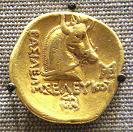
-326 Alexander III the Great wins a number of military Vs, culminating in May in the defeat of Hindu king Porus (Raja Puru) (Rai Por) (Raja Purava) (Raja Parvatka), king of Paurava at the Battle of the Hydaspes (Jhelum) River in the Punjab near Bhera in modern-day Pakistan, after which in June Alexander loses his legendary steed Bucephalus (Bucephalus) (b. -355) and founds the city of Bucephala (Alexandria Bucephalus) to honor him near modern-day Jalapur Sharif, after which he advances to the Hyphasis (Beas) River, but his Macedonian army refuses to go any farther east - you see that big black dude on steroids? In Nov. Alexander III the Great marches via the Hydaspes and Indus Rivers to the Acesines River near the Indian Ocean and fights the Mallian Campaign (ends Feb.) against the Malli and Oxydraci of the E Punjab, on the Indus River, leaping single-handedly from their city wall into their midst, where he is wounded by an arrow but rescued by his troops. Athenian orator Hypereides (Hyperides) (-390 to -322) is elected ruler of Athens, going on to promote war against Macedonian rule after the death of Alexander III the Great. The Second Samnite War (ends -304) begins after Rome violates a treaty and founds a Latin colony across the Liris River at Fregellae in -328, and the Samnites attack it; the Apulians ally with the Romans. Bas (b. -397) dies, and his son Zipoites (Zipoetes) (Ziboetes) I (-354 to -278) becomes the 2nd ruler of Bithynia in NW Asia Minor (until -278), and in -397 takes the title of king. Roman consul Gaius Poetelius Libo Visolus gets the Lex Poetelia Papiria passed, abolishing the Nexum (debt-bondage). Promagistracies are introduced in Rome to extend the term of office of a consul to complete a military campaign. Roman consuls: Gaius Poetelius Libo Visolus and Lucius Papirius Cursor. Deaths: Bithynian ruler (-376 to -326) Bas (b. 397).
-325 The list just keeps growing? In July after his troops refuse to go further E, Alexander the Great halts on the banks of the Indus River and returns to Macedon through the Gedrosian Desert, where lack of supplies decimates his troops; Nearchus (Nearchos) of Crete returns with his fleet via the coast of the Indian Ocean and the Persian Gulf to the Euphrates River, reporting "a reed in India that brings forth honey without the help of bees", observing people growing sugar cane and making granulated sugar ("sarkara") (Lat. "saccarum") (Gk. "zakkhari"), causing Alexander's soldiers to carry some of the "honey-bearing reeds" home with them; native rebel Chandragupta Maurya occupies the Punjab after Alexander withdraws, planning a rebellion. The Oscan city of Cumae in S Italy is conquered by the Romans, who turn it into a seaside resort for Roman politicos. Lame Macedonian noble Harpalus (son of Machatas), a boyhood chum of Alexander III the Great who was given a post in Asia Minor, where he was contacted frequently by Alexander III for reading material (Aeschyulus, Sophocles, Euripides, Philistus, Philoxenus, Telestes, etc.) is caught embezzling funds while Alexander is in India, and flees to Athens, where he bribes Athenian officials to secure sanctuary. Roman consuls: Lucius Papirius Cursor (dictator) and Lucius Furius Camillus and Decimus Junius Brutus Scaeva. Art: About this time Leochares sculpts the marble Diana of Versailles. Births: Greek geometer ("Father of Geometry") Euclid of Alexandria (d. -265) in Stagira, Macedonia.

-324 The 114th Olympiad. In Mar. after Alexander III the Great's army and navy meets in Caramania for a rest stop, it heads for Susa, the capital of Elam; he then orders 80 of his officers to Persian-up and marry Persian or Median ladies, and marries soldiers to their hos, and pays the soldiers' debts; he marries his 2nd wife Statira (Stateira) (Gr. "creation of the stars") (II) (-340 to -320), daughter of Darius III Codomannus and sister of Drypetis (Drypteis) (d. -323), then recalls Greek exiles and proclaims himself the son of the god Zeus Ammon instead of his human father Philip II, sending 10K unfit Macedonians home and replacing them with Persians, then going on to replace native satraps by Macedonians, and make his boyfriend gen. Hephaestion (Hephaistion) (-356 to -324) his #2 in command (hipparch) (grand vizier); too bad, he dies en route from Susa to Ecbatana and is not replaced even though extravagantly mourned; it seems like the West is going to be ruled by the gay Greeks forever? Demosthenes is exiled from Athens for taking bribes from Harpalus. Roman consuls: Lucius Papirius Cursor (dictator). Deaths: Athenian statesman-orator Lycurgus (b. -396). Macedonian gen. Hephaistion (b. -356) en route from Susa to Ecbatana (fever) (poison?).





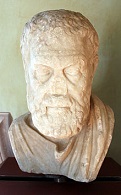

-323 Roman consuls: Gaius Sulpicius Longus and Quintus Aulius Cerretanus. Early in the year, faced with the choice of going back to conquer India or conquering Arabia next, Alexander III the Great (b. -356) picks proud unconquered Arabia, gathering a large army and navy at Babylon while making plans the Dean Martin Way (sousing in booze); one day he gets mad at friend and countryman Clitus for criticizing him for allowing a song to be sung which ridicules Macedonian officers, loses his temper and kills him with a spear, then sobers up, repents, goes to his tent for three days to mourn, and allegedly gets over it, but shortly afterward (May 31) falls ill after a prolonged eating-drinking bout, keeps drinking despite it, loses his voice, lets his soldiers see him one last time, "already speechless as the army filed past... he greeted one and all, raising his head, though with difficulty, and signing to them with his eyes" (nice ass, nice package, etc.?); on June 10 he dies in Babylon of fever (malaria?) at age 32 years 8 mo., before he can name a successor or consolidate his vast (2.18M sq. mi.) empire, incl. the S Balkan peninsula, Asia Minor, Egypt, and the entire Near East as far E as the Indus River (and make more of the East white, blonde and Western like himself?) (and conquer Arabia, possibly preventing the later rise of Islam?); his body is preserved in a huge crock of honey; before croaking and being crocked, Alexander gives his ring to his gen. Perdiccas (-360 to -320), uttering the soundbyte that he gives his empire "kratistoi" (to the strongest), although he might have said "to Craterus"; either way, nobody wants Alexander's children by "barbarians" Barsine or 5-mo.-pregnant Roxana to be his heir, and his gens. scramble for power, resulting in the Wars of the Diadochi (ends -275) and the division of the empire into four kingdoms under four dynasties, Macedonia (the Antigonids), Egypt (the Ptolemies), Pergamon (the Attalids), and Syria-Mesopotamia (incl. Persia) (the Seleucids). The original Omen starring evil-eyed Damien? In Sept. while the world holds its breath, Alexander's wife Roxane bears a son named Alexander IV (-323 to -309), who with his 25-y.-o. half-brother Philip III Arrhidaeus (-359 to -317) (illegitimate son of Philip II of Macedon and Philinna of Larissa) are made co-rulers under the regency of Alexander's vizier gen. Perdiccas; Alexander's gen. Meleager (d. -323) (son of Neoptolemus) becomes the first of Alexander's officers to propose that they not wait until pregant Roxana bear a son, and at first backs mentally-deficient Philip III, while Perdiccas's ambition pisses-off Meleager, who storms out of the meeting and joins a mutiny of the soldiers, and gets into a death struggle with Perdiccas, after which Eumenes of Cardia (-362 to -316) brokers a too-good-too-be-true deal, getting all to agree to give the succession to Philip III and Roxana's unborn son Alexander IV, with Mealeager and Perdiccas as regents, while Perdicca switches to Philip III, who becomes his puppet to buy time to outmaneuver and kill Meleager, after which Antipater and Craterus share Macedonia and Greece; Laomedon of Mytilene gets Syria and Phoenicia; Ptolemy I Soter (-367 to -283) gets Egypt; Philotas (d. -330) gets Cilicia; Peithon (Pithon) (-355 to -314) gets Media; Antigonus I Monophtalmus (the One-Eyed) (-382 to -301) gets Pamphylia and Lycia; Leonnatus (-356 to -322) gets Phrygia; Neoptolemus (d. -321) gets Armenia; Eumenes of Cardia gets Cappadocia and Paphlagonia, although he has to win Cappadocia by force from Ariarathes I first (ends -322); Lysimachus (-360 to -281) gets Thrace; Taxiles and Porus remain in charge of their kingdoms in India; Alexander's father-in-law Oxyartes (father of Roxana) gets Gandhara; Sibyrtius gets Arachosia and Gedrosia; Stasanor of Cyprus gets Aria and Drangiana; Philip III (-359 to -317) gets Bactria and Sogdiana; Phrataphernes gets Parthia and Hyrcania; Peucestas gets Persis; Tlepolemus gets Carmania (modern-day Kerman Province, Iran) on the Persian Gulf coast W of Hormuz; Atropates (-370 to -320) gets N Media; Archon of Pella (d. -321) gets Babylonia until he is KIA in -321 in a fight with Docimus; Arcesilas gets N Mesopotamia; too bad, Meleager and about 300 of his partisans are killed by forces loyal to Perdiccas; meanwhile Alexander's hand-that-rocks-the-cradle first wife Roxane plots to have second wife Barsine murdered - and the game is on, forever proving that blonde whitey is too stupid to unite and rule the world, because there is no real white race, only lighted and unlighted windows? After receiving the good news about Alexander, and ignoring the advice of Phocion, the lame Lamian War (ends -321), a revolt against Macedonian regent Antipater begins when Athenian gen. Leosthenes (d. -323) and orator Hypereides (Hyperides) (-390 to -322) give inflammatory speeches, and the revolt spreads through C and N Greece; Phocion is put in charge of military actions against Boeotia, and calls all Athenians ages 60 and under to join the army, pointing out that he's 80 and will be their leader; Leosthenes defeats Antipater in battle and forces him to Lamia, circling and sieging him for several mo., with Phocion saying that he wished he had been the gen. who achieved this V, but would still have counseled as before; Leosthenes is killed, and new strategos Antiphilus (not the painter) is appointed to counterbalance Phocion; meanwhile Aristotle's pupil Theophrastus (-371 to -287) becomes dir. #2 of the Lyceum in Athens after Aristotle (Alexander's teacher) is forced to leave the city by anti-Macedonian forces (accused of impiety), fleeing to Chalcis in Euboea; meanwhile the Athenians recall Demosthenes from exile and pay his fine. A civil war begins in Sicily (ends -316) between the oligarchs and democratic leader Agathocles. After Alexander the Great's death commercial traffic between the Mediterranean and the Far East finally becomes regular and extensive. According to the Mormons, the city-region of Zarahemla in South Am. or Central Am., capital of the Nephites is discovered about this time by Mosiah, becoming the scene of protagonists of the Book of Mormon; too bad, God destroys every trace of it by modern times, so don't bother to send archeologists. Births: Macedonian prince Alexander IV Aegus (d. -309); son of Alexander III the Great (-356 to -323) and Roxana. Deaths: Greek tub-lover Diogenes (b. -412) on June 10; dies on the same day as Alexander the Great after having an interview with him, and when asked by Alexander how he can best serve him, telling him, "Stand out of my sunshine", causing Alexander to remark, "If I were not Alexander, I should wish to be Diogenes"?: "Humans have complicated every simple gift of the gods"; "I fawn on those who give me anything, I yelp at those who refuse, and I set my teeth in rascals" (when asked why he lives like a dog); "If only it were as easy to banish hunger by rubbing my belly" (when asked why he masturbates in public); "I am a citizen of the world (cosmopolites)" (first use of the word cosmopolitan); "It is not that I am mad, it is only that my head is different than yours." The closest man has ever come to eternity, and he dies at age 33 after gaining the whole world and losing his soul? The ultimate source of the Jesus story? Greek conqueror Alexander the Great (b. -356) on June 10 in Babylon (fever); dies after bringing the banana, the ring-necked parakeet, sugar, cotton (all from India), and crucifixion (from Persia) to Europe; poisoned with slow-acting white hellebore?; really dies of Gullain-Barre Syndrome?; his body fails to show any signs of decomposition for six days after his death, causing the Greeks to believe he is a god; spent his life seeking the formula for eternal life, causing him to be called al-Iksander, the 2-horned god, pictured on coins wearing the spiral ram's horns of divinity on his head; or did he never really die, but broke his crown and ran away, becoming the first Romany (gypsy), wanting only eternal freedom? - the good die young? Macedonian Gen. Meleager.



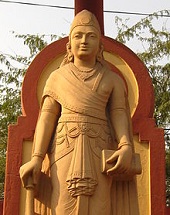
-322 The Athenians under gen. Phocion defeat the Macedonians under Gen. Mikion at the Battle of Rhamnus in Attica; simultaneously the Athenians under Antiphilus defeat the Macedonians in Thessaly, but a large army from Asia under gen. Craterus defeats their combined Athenian army at the Battle of Cranon (Crannon), and Antipater's army closes in on Athens, causing both Athenian gens. to come crawling to him to talk peace, to which he responds that now that his soldiers are here, why stop?; Phocion then kisses up to him bigtime and gets him to parley; back in Athens, the supporters of Macedonia condemn Hypereides and other orators to death, and Hypereides flees to Aegina before being captured at the Temple of Poseidon and executed; meanwhile Demosthenes flees to avoid arrest by Antipater's lt. (an actor) Archias of Thurii, and commits suicide on Calauria Island. Alexander's gens. Ptolemy, Antigonus I Cyclops, Antipater (-397 to -319), and Craterus (-370 to -321) form a coalition against Perdiccas. Rhodes expels the Macedonians, and goes on to two cents. of prosperity, culture and power. 82-y.-o. Ariarathes I of Cappadocia (b. -403) is defeated by Perdiccas, and crucified with many of his relations, and Eumenes takes full possesion of Cappadocia (until -301). A new tax on metics (foreign residents) is instituted, and when Platonic Academy head Xenocrates is unable to pay, Athenian orator Demetrius Phalereus pays it for him. The Greek Money Honey out of the way, Chandragupta Maurya (Sandrocottus) (-340 to -297) overthrows the Nanda throne in Magadha in modern-day Bihar, home of Buddhism and Jainism, and next year founds the Maurya Empire in India (ends -185), going on to extend his control over most of the subcontinental mainland in the next decade; Chanakya (-350 to -283), who engineers his rise to power becomes his PM, writing the Arthashastra, a treatise on statecraft, economic policy, and military policy; Greek control of India slips slides away, but leaves a lasting imprint in Indian art (esp. sculpture) and science. Roman consuls: Aulus Cornelius Cossus Arvina (dictator) and Quintus Fabius Maximus Rullianus and Lucius Fulvius Curvus. Plays: 20-y.-o. Menander (-342 to -291) debuts his first play, The Self-Tormentor - about menanderbation? Deaths: Greek Athenian orator Hypereides (b. -390) in Aegina (executed). Greek Golden Mean philosopher Aristotle (b. -384); dies after parting ways with Plato and founding the Lyceum, preferring to collect data rather than sit around thinking, and deciding (after much personal experience?) that all inheritance comes from the father, the mother merely providing the material, and that female babies are caused by "interference" from the mother; leaves 260 treatises, incl. Constitution of Athens (written in -350) (discovered in 1890 C.E.), Physics, Metaphysics, Ethics, Logic (Prior Analytics), Zoology, De Anima (On the Soul) (the nous poietikos or active intellect vs. the nous pathetikos or passive intellect), which first mentions the Tabula Rasa view of the mind as starting out a blank slate, and Poetics, the first work on art criticism, valuing art based on how it imitates the universal in human nature, and claiming criticism as a science: "Man is by nature a political animal"; "Hope is a waking dream"; "Tyrants preserve themselves by sowing fear and mistrust among the citizens by means of spies, by distracting them with foreign wars, by eliminating men of spirit who might lead a revolution, by humbling the people, and making them incapable of decisive action"; "Music directly represents the passions of the soul. If one listens to the wrong kind of music, he will become the wrong kind of person"; "I have gained this from philosophy: That I do without being commanded what others do only from fear of the law." Greek statesman-orator Demosthenes (b. -384) on Calauria (Kalaureia) Island (near Poros) (suicide by poison): "He who confers a favor should at once forget it if he is not to show a sordid, ungenerous spirit." Greek philosopher Anaxarchus (b. -380).
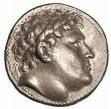
-321 Perdiccas' gen. Eumenes of Cardia (-362 to -316) defeats and kills Craterus (b. -370) and his rebel Greek auxiliaries in Asia Minor near the Hellespont; Craterus dies after his horse falls on him. A Roman army is trapped by the Samnites in Samnium at the Battle of Caudine Forks, and Rome is forced to negotiate an unfavorable peace (until -316). The Lamian War (begun -323) is ended with a humiliating treaty for Athens, with 12K Athenians disenfranchised and heavy reparations demanded, causing a mass migration to Thrace; Phocion becomes the de facto ruler of what's left of Athens, sucking up to Antipater and becoming unpopular with the people, who blame him for handing Athens to him and getting Demosthenes killed. Roman consuls: Quintus Fabrius Ambustus (dictator) and Titus Vetturius Calvinus and Spurius Postumius Albinus. Deaths: Macedonian gen. Craterus (b. -370).


-320 The 115th Olympiad. Perdiccas (b. -360) is assassinated while campaigning in Egypt against Ptolemy, then Ptolemy meets with Antigonus and Antipater in N Syria, and they agree to make Antipater the regent of Alexander the Great's empire; Antigonus then defeats Eumenes in Cappadocia, and dies next year, passing over his son Cassander (-355 to -297) as his successor for old fart gen. Polyperchon (-394 to -303), pissing-off Cassander, as well as Ptolemy and Antigonus; after securing Cassander's release, Eumenes accepts Polyperchon's offer to ally against Antigonus in Asia. The Tarentines make peace with the Samnites in S Italy. Pytheas the Greek (-380 to -300) of Massalia (Marseille), having returned from a 7K mi. voyage, during which he circumnavigated Britain and watched people harvesting grain and tending cattle, visited tin mines in Cornwall, searched for amber on the coast of Denmark, going as far as Thule (Iceland or Norway), then returning via Ireland, pub. On the Ocean; he describes the Goths as a tribe dwelling on the Baltic; he says of Britain "The island is thickly populated and has an extremely chilly climate"; the people are "unusually hospitable, and... gentle in their manner... Their diet is inexpensive and quite different from the luxury that is born of wealth... It has many kings and potentates, who live for the most part in a state of mutual peace"; the British people "are simple in their habits, and far removed from the cunning and knavishness of modern man... they do not drink wine, but a fermented liquor made from barley, which they call curmi"; he also describes waters so cold that chunks of ice float in them, and that farther north (a day's sail from a land called Thule) the water is completely frozen, and the sun never sets during the summer solstice; too bad, his books are regarded as fiction by Polybius, Strabo and others, and are eventually lost, saving the British Isles and who knows what else from Grecification? Shahru II becomes king of Lihyan in N Arabia (until -305). Zhou Xian Wang dies, and Zhou Shen Ling Wang (d. -314) becomes Dong Zhou king #23 of China. Roman consuls: Lucius Papirius Cursor and Quintus Publilius Philo. Roman dictators: Gaius Magnius and Lucius Cornelius Lentulus and Titus Manlius Imperiosus Torquatus. Births: Greek Athenian skeptic philosopher Timon of Phlius (d. -230) in Phlius; student of Pyrrho. Deaths: Macedonian gen. Perdiccas (b. -360) in Egypt (assassinated).
-319 Cassander orders his officer Nicanor to replace Menyllus as ruler of Munychia, causing nearby Athens to split into two camps, with the aristocrats on Cassander's side and the non-aristocrats on Polyperchon's side; strategos Phocion plays off both sides, getting Nicanor freed after he is arrested by Athenian soldiers at Piraeus during a conference with him, but the Athenian assembly then orders him to attack Nicanor, and he balks, allowing Nicanor to turn the Athenian soldiers against him and seize Piraeus. Roman consuls: Lucius Papirius Cursor and Quintus Aulius Cerretanus. Births: Greek Pyrrhic Victory statesman-gen. and king of Molossia (-297 to -272), Epirus (-306 to -301, -297 to -272), and Macedonia (-288 to -284, -274 to -272) Pyrrhus (Pyrrhos) of Epirus (d. -272) in Epirus; son of king Aeacides of Epirus (d. -313) and Phthia; 2nd cousin of Alexander III the Great (-356 to -323); nephew of Alexander I the Molossian. Deaths: Greek Macedonian gen. Antipater; executor of Aristotle's will; leaves "The Illyrian Deeds of Perdikkas".
-318 After Polyperchon's son Alexander arrives in Athens with a Macedonian army, he gets Phocion deposed as strategos, then condemned as a traitor along with 10 of his party, and ordered to drink hemlock, paying the executioner 12 drachmas for it, with the last words: "For a man, it is hard to die in Athens without paying for it"; Polyperchon and Dimades are elected rulers of Athens; Nicaner is executed by the Macedonian army. Antigonus marches against Eumenes, who withdraws E of the Tigris River, joining the Persian satraps. Roman consuls: Marcus Folius Flaccinator and Lucius Plautius Venno. Deaths: Greek Athenian statesman-gen. Phocion (b. -402) on May 19 in Athens (executed by hemlock).

-317 In the summer after pursuing Eumenes into C Persia, Antigonus I fights the indecisive Battle of Paraetacene (Paraiteakene) (near modern-day Isfahan NE of Susa) (3.7K KIA and 4K injured for Antigonos vs. 540 KIA and 1K injured for Eumenes). Olympias' army invades Macedonia in support of Polyperchon, and captures and executes Philip III Arrhidaeus, leaving Olympias' grandson Alexander IV as sole ruler of Macedonia; Cassander seizes Piraeus and leaves Peripatetic orator Demetrius of Phaleron (Demetrios Falireas) (-350 to -280) (student of Theophrastus) in command of Athens (until -307), then heads for Macedonia. Troops sent by Syracuse led by Agathocles' brother Antander (Andro) to relieve Crotona are signed by the Bruttii tribe. Roman consuls: Gaius Junius Bubulcus Brutus and Quintus Aemilius Barbula. Deaths: Macedonian king Philip III Arrhidaeus (b. -358) (executed).


-316 The 116th Olympiad. Cassander defeats Olympias at the Little Bitty Battle of Pydna (the big one is in -168), then executes her and imprisons Roxana and her son Alexander IV. Antigonus I surprises Eumenes while he winters at the Battle of Gabene, which Eumenes seems to be winning until his ally Peucestas turns traitor and causes him to lose his baggage camp, which incl. the booty of 30 years of Vs along with the women and children, to Antingonus, who demands that Eumenus be handed over by the Silver Shields, after which he starves him for three days and executes him. Antigonus I drives Seleucus from Babylon to refuge with Ptolemy in Egypt, gaining control Mesopotamia and Asia Minor, and turning his attention to Syria. Agathocles (-361 to -289) ends the civil war (begun -323), and becomes tyrant of Syracuse (until -289), expelling the oligarchs and dividing their property among the poor. The Romans resume hostilities against the Little Black Sambos, er, Samnites. The Qin (Ch'in) eliminate the Shu kingdom. Thessalonica is founded by Cassander and named after his wife (a stepsister of Alexander the Great), and becomes the main port of the Macedonian capital of Pella. The suttee (Sans. "true wife") practice in India of a wife burning herself on the funeral pile of her husband is first mentioned; it starts among the royalty and spreads to the gen. pop. Menander writes the (lost) play Anger. Roman consuls: Lucius Aemilius Mamercinus Privernas (dictator) and Spurius Nautius Rutilus and Marcus Popilius Laenas. Births: Egyptian queen Arsinoe II (d. -270); daughter of Ptolemy I and Berenice. Deaths: Greek Alexander III the Great's mother Olympias (b. -375) in Pydna; stoned by a mob with the approval of Cassander, and denied burial rights. Greek gen. Eumenes of Cardia (b. -362) (executed by Antigonus).
-315 Antigonus I sieges Tyre. Zipoites I of Bithynia wars against Chalcedon and Astakos. The Samnites kick Roman butt under dictator Quintus Fabius Maximus Rullianus at the Battle of Lautulae near Terracina - which only makes the Romans madder? A man who dies this year in S Africa is the closest link to humanity's common female ancestor, mitochondrial Eve. Roman consuls: Quintus Fabius Maximus Rullianus (dictator) and Lucius Papirius Cursor and Quintus Publilius Philo. Deaths: Greek historian Theopompus (b. -380); leaves Hellenics (12 vols.) (-411 to -394), History of Philip, Letter to Alexander; "A man who wrote slander, not history." (Robin Lane Fox)
-314 Lysimachus joins the other Diadochi (Cassander, Ptolemy I, Seleucus I) in a league against Antigonus I, who is busy sieging Tyre. Qi Xuan Gong invades and almost conquers the Yan Kingdom in N China until the Qi troops commit so much misconduct that a revolt drives tham out; Zhou Shen Ling Wang dies, and Zhou Nan Wang (Ji Yan) (d. -255) becomes Dong Zhou king #24 of China. Roman consuls: Gaius Maenius (dictator) and Marcus Poetelius Libo and Gaius Sulpicius Longus. Deaths: Greek philosopher Xenocrates (b. -396) in Athens. Greek orator Aeschines (b. -389) in Samos. Greek Macedonian gen. Peithon (b. -355) (executed by Antigonus after tricking him to come to his court).
-313 Antigonus I captures Tyre, then finishes taking Syria from Ptolemy, turning his attention to the Aegean, Peloponnese, and Asia Minor. Roman consuls: Lucius Papirius Cursor and Gaius Junius Bubulcus Brutus.


-312 The 117th Olympiad. Early in the year after Ptolemy I invades Syria with 18K infantry and 4K cavalry Antigonus I's son Demetrius I of Macedon and his 12.5K infantry, 4.4K cavalry, and 43 war elephants are defeated at the Battle of Gaza, with 500 Syrians KIA, 8K taken POW, and all war elephants KIA; Antoginus I captures the Nabataean city of Petra, which had been by used by the Arabs to store treasure, and carries it all away - leaving just enough for an Indiana Jokes, er, Jones flick? Alexander III the Great's Greek Empire is partitioned, and Seleucus I Nicator (Gr. "conqueror") (-358 to -281) receives Babylonia, founding the Seleucid Dynasty of 26 rulers (ends -63), which goes on to incl. Persia, Sogdiana, the E provinces of Bactria, Syria, and large portions of Asia Minor; the Seleucid Calendar AKA Anno Graecorum (Year of the Greeks) begins on Oct. 1, ending up being adopted by Eastern Jews; the Seleucids use the horned horse, elephant, and anchor as symbols on their coins. Agathocles captures Messina (Messana) with the help of Latin mercenaries (Oscans or Mamertines), who stay afterwards and eventually take over. Blind Roman censor Appius Claudius Caecus (the Blind) (-340 to -273) begins distributing freedmen among the rural tribes (until -304), and begins building the Appian Way (Via Appia) in Italy, extending SE from the Palatine Hill in Rome to Capua; it is later extended to Beneventum, Tarentum, and Brundisium (350 mi. total), and the Greek cities of Campania; he also builds the first Roman aqueduct; the Celts had been building roads for at least two cents. by this time, and introduce helmets with cheek-guards, which the Romans steal from them? Silver coinage is first issued by Rome. Roman consuls: Gaius Sulpicius Longus (dictator) and Marcus Valerius Maximus (Corvinus) and Publius Decius Mus II.
-311 Seleucus I campaigns in the eastern provinces (until -302), and recaptures Babylon from Antigonus I, and proceeds to secure it (ends -304). The exiled oligarchs of Syracuse appeal to Carthage, causing the latter under Gen. Hamilcar to defeat Agathocles at the Himera River and siege Syracuse. Roman consuls: Gaius Junius Bubulcus Brutus and Quintus Aemilius Barbula.
-310 In the late 4th cent. B.C.E., (-150?) the city of Trier (Triers) (Treves) (modern-day pop. 110K) in the lower Moselle River Valley in the W of the modern-state of Rhine-Palatinate near the modern-day Luxembourg border is founded by the Celtic Treveri tribe; it goes on to become one of the four capitals of the Roman Empire in the late 3rd and early 4th cents. C.E. Roxana and her son Alexander IV (b. -323) are put to death. Agathocles of Syracuse lands at Cape Born and attacks Carthage, causing the siege of Syracuse to be lifted; Agathocles stays in Africa until -307, capturing the Berber town of Tunis (named after Phoenician goddess Tanith or Tanut) (modern-day pop. 1M/2.6M). Roman consuls: Quintus Fabius Maximus Rullianus and Gaius Marcius Rutilus (Censorinus). Births: Greek astronomer-mathematician Aristarchus of Samos (d. -230).
-309 Polyperchon has Barsine and her son Heracles murdered. Cleomenes II dies, and his grandson Areus I (d. -265) becomes Agiad king of Sparta. This year there are six rival kings in Macedonia, while Cassander works to consolidate his position there. The Etruscan city of Perugia (Perusia) on the Tiber River (103 mi. SE of modern-day Florence) comes under Roman domination. Roman consuls: Lucius Papirius Cursor (dictator). Births: Egyptian king (-285 to -246) Ptolemy II Philadelphus (d. -246); son of Ptolemy I Soter and Berenice; half-brother of Ptolemy Keraunos and Meleager; husband of Arsinoe I and Arsinoe II.
-308 The 118th Olympiad. Roman consuls: Publius Decius Mus II (2nd time) and Quintus Fabius Maximus Rullianus. Births: Syracuse king (-270 to -215) Hiero II (d. -215); illegitimate son of Syracusan noble Hierocles. Deaths: Greek Macedonian princess Cleopatra of Macedon (b. -355) in Sardis (assassinated by order of Antigonus after accusing her of plotting with Perdicca to kill her half-sister Cynane, causing her to plot with Ptolemy, after which he gives her a beautiful funeral).
-307 Agathocles of Syracuse leaves his army in Carthage under the control of his sons, and it is annihilated during his absence. Antigonus I sends his son Demetrius to Athens, where he expels Demetrius of Phaleron, and sets up Stratocles as ruler of Athens; Demetrius Poliorcetes restores the Athenian constitution, causing the pop. to honor him and Antigonus as divine saviors; Demetrius of Phaleron settles in Alexandria; pissed-off Cassander starts the Four Years' War with Athens (ends -304). Roman consuls: Appius Claudius Caecus and Lucius Volumnius Flamma Violens.
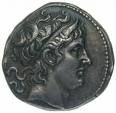


-306 After winning a great V over Ptolemy I at the naval Battle of Salamis in Cyprus, Antigonus I Cyclops (Monophthalmos) (One-Eyed) (-382 to -301) and his son Demetrius I Poliorcetes (Poliorketes) (the Besieger) (-336 to -283) are crowned as kings of Syria, beginning the demise of Alexander III the Great's dream of a single empire controlling the world and ruled by a blonde bi guy? Agathocles concludes a peace with Carthage that lets him declare himself king of Syracuse two years later. Pyrrhus (-319 to -272) becomes king of Epirus (until -272) under the care of guardians. Samos-born Greek philosopher Epicurus (Gr. "ally/comrade") (-341 to -270) founds the Garden School in Athens, which teaches Epicureanism, the teaching that the purpose of philosophy is to attain a happy, tranquil life, characterized by peace and freedom from fear (ataraxia) and the absence of pain (aponia), preferably self-sufficient and surrounded by friends; pleasure and pain are the measures of what is good and evil; death is the end of both body and soul and should therefore not be feared; the gods neither reward nor punish humans; the universe is infinite and eternal; events in the world are ultimately based on the motions and interactions of atoms moving in empty space; too bad, he contracts kidney stones and dies in agony, claiming that "The cheerfulness of my mind, which comes from the recollection of all my philosophical contemplation, counterbalances all these afflictions." Roman consuls: Publius Cornelius Scipio Barbatus (dictator) and Quintus Marcius Tremulus and Publius Cornelius Arvina.


-305 Alexander III the Great's polymath gen. Ptolemy I Soter (Gr. "savior") (-367 to -283), son of Lagus takes power in Egypt, becomng king #1 of the Hellenistic Egyptian Thirty-Second (32nd) (Ptolemaic) (Lagid) Dynasty, which lasts 275 years (until -30); Ptolemy I establishes the great Alexandria Museon (Museum-Library) (Museo) (dedicated to the Muses) in Egypt in honor of Alexander III the Great, whose body he had brought from Babylon and buried there; elite Greek scholars must complete the Logikon, a course in theoretical science before going on to the Cheirourgikon (experimental lab), incl. an observatory, botanical-zoological gardens, dissection rooms, et al.; the library is filled by royal decree, with all travelers visiting the city required to yield up any scrolls in their possession so that copies can be made and given to them; the museum cranks out pioneers incl. Euclid of Alexandria (-365 to -265) (geometry), Herophilus (Herophilos) (-335 to -280) (anatomy), Aristarchus of Samos (-310 to -230) (astronomy), Eratosthenes of Cyrene (-276 to -194) (astronomy), Hero (Heron) of Alexandria (10-70) (steam turbine and windmill-driven organ) et al.; destroyed in 642 C.E. by the Christians, er, Muslims. The Romans decisively defeat the Samnites and force them to come to the negotiating table. Chandragupta defeats Seleucus I Nicator in NW India, and gains portions of Afghanistan. Eudamidas I dies, and his son Archidamus IV (d. -275) becomes Eurypontid king #23 of Sparta. Demetrius I sieges Rhodes (ends -304). Feritharis (d. -290) becomes king of Pictland (Scotland). Roman consuls: Lucius Postumius Megellus and Tiberius Minucius Augurinus. Science: The earliest known Multiplication Tables are inscribed on bamboo strips in China. The Nei Jing, (the Yellow Emperor's Classic of Medicine), the earliest book of Chinese medicine is compiled.
-304 The 119th Olympiad. Ptolemy I assumes the royal title, founding the Egyptian 32nd (Ptolemaic) Dynasty (ends -30), followed immediately by Seleucus I, Lysimachus, and Cassander, which officially dissolves Alexander's empire. After Ptolemy sends a relief force, Demetrius I's siege of Rhodes (begun -333) fails, and he gives up and goes on to relieve Athens from the Four Years' War waged against them by Cassander (begun -307); Rhodes sells its siege equipment for 300 talents and devotes it to building a colossal statue of their patron god Helios. Agathocles of Syracuse comes to terms with Carthage and the expelled oligarchs and takes the title of king; the Tarentines are attacked by the Lucanians and call him for aid. The Samnites sign a peace with the Romans, ending the Second Samnite War (begun -322), giving sole hegemony of Campania to them. The new Roman censors set aside old censor Appius Claudius Caecus' innovations of calling sons of freedmen to the Senate, and limit distribution of freedmen to the four urban tribes. Roman consuls: Publius Sempronius Sophus and Publius Sulpicius Saverno. Births: Greek physician-anatomist Erasistratus (d. -250) in Ioulis, Ceos Island (Cos?) (Chios?) (Samos?); grandson of Aristotle via daughter Pythias?; son of Cretoxena, sister of physician Medius and Cleombrotus?; pupil of Theophrastus, Chrysippus of Cnidos, and Metrodorus.
-303 Cleonymus of Sparta fails against the Lucanians (Lucani) in Magna Graecia in S Italy. Seleucus I Nicator cedes NW India to Chandragupta (Sandrocottus), rebuilds the city of Osroe (Chosroes), and founds the city of Edessa (named after the ancient capital of Macedonia) in SE Turkey (NW Mesopotamia) near the Syrian border (modern-day Urfa, pop. 560K); in the 2nd cent. B.C.E. it is known as Antiochia on the Calirrhoe, becoming the capital of the Kingdom of Osroene from -132 to 242; in 639 it falls to the Muslims; in 1098-1144 it becomes the capital of the Crusader County of Odessa before falling to the Turkic Zengid Dynasty and being absorbed by the Ottoman Empire in 1517. The city of Dura-Europos on the right bank of the Euphrates River near modern-day Salhiye, Syria is built. Roman consuls: Servius Cornelius Lentulus and Lucius Genucius Aventinensis.
-302 Pyrrhus of Epirus is dethroned by an uprising led by Cassander of Macedonia; his cousin Neoptolemus II (d. -297), son of Alexander I of Epirus becomes king of Epirus (until -297). Demetrius I revives the Hellenic League of Philip II, while Lysimachus, Seleucus I, Ptolemy I, and Cassander form an alliance against Antigonus I and Demetrius I - doesn't anybody read the Bible? Lysimachus pacifies the region around Ephesus. The Spartans under Cleonymus (Cleonimos) sail up the Po River, but are repelled by the Patavians (Veneti) from modern-day Padua (Patavium) on the Brenta River (modern-day pop. 214K) (oldest city in N Italy to survive to modern times) (which according to Virgil and Livy was founded in 1183 B.C.E. by Trojan prince Antenor); the Spartans try to take Tarentum, fail, then make an alliance with Tarentum against the Lucanians, causing Tarentum to lose faith with other Greek colonies. Greek gen. Seleucus I gives up plans to invade India and makes an alliance with Maurya ruler Chandragupta, giving him his daughter in marriage, all of which increases Greek cultural influence in N India. The Kingdom of Iberia (Kartli) in Georgia is founded (until 580 C.E.). Roman consuls: Gaius Junius Bubulcus Brutus (dictator) and Marcus Livius Denter and Marcus Aemilius Paullus.
-301 The Battle of Ipsus in Phrygia sees 81-y.-o. Macedonian king Antigonus I Monophtalmus (b. -382) and his son Demetrius I defeated by the combined armies of Cassander of Macedon, Lysimachus of Thrace, and Seleucus I Nicator of Babylonia-Persia after Antigonus I starts out winning with his war elephants, but neglects to wear his plate armor and is KIA d with a javelin, causing his army to disintegrate; Demetrius I escapes and continues to terrorize the Aegean with his fleet; Seleucus I receives the lion's share of Antigonus' territories, incl. a large part of Asia Minor and all of Syria, incl. Phrygia, and renames the ancient (2K B.C.E.) N Syrian city of Khalpe (Khalibon) (on the site of modern-day Aleppo) to Beroea (Veroea) after the Macedonian city, becoming the oldest continuously inhabited city to survive to modern times; Lysimachus receives C Asia Minor, and renames Antigonia to Alexandria Troas (Troas) after you know who the Great; Cassander is sole ruler of Macedonia, and his brother Pleistarchus is given Cilicia; Ptolemy I seizes Coele-Syria (S Syria and Palestine) from Seleucus I, who doesn't press his claim because of the former's aid in returning him to Babylon; the last chance to reunite Alexander the Great's empire is kaput. Macedonian satrap Amyntas is defeated by Ariarathes I's adopted son (eldest son of his beloved brother Holophernes) Ariarathes II (d. -280) with the assistance of Armenian king Ardoates, and becomes ruler of Cappadocia (until -280) under Seleucid suzerainty. Olympiodorus (d. -285) becomes ruler of Athens. Chandragupta (d. -297) abdicates to become a Jainist ascetic, going on to starve himself to death, and his son Bindusara ("the Spotted One") Maurya (d. -273) becomes king of the Maurya Empire in Magadha, India (until -273). Roman consuls: Marcus Valerius Maximus Rullianus (dictator). Inventions: Parchment, made of animal hides (and superior to papyrus because it can be printed on both sides and folded) is invented in Pergamon. Deaths: Greek Macedonian gen. Antigonus I Monophtalmus (b. -382) in Ipsus, Phrygia. Greek historian Aristobulus of Cassandreia (b. -375).




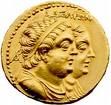



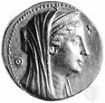


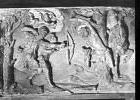
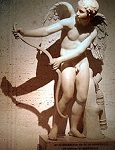
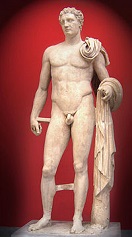
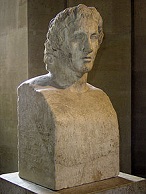
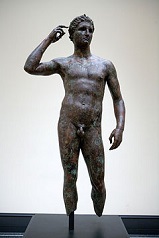
-300 The 120th Olympiad. Roman consuls: Marcus Valerius Maximus Corvus (5th time) and Quintus Appuleius Pansa. King Lysimachus of Thrace marries Arsinoe II (-316 to -270), full sister of Ptolemy II, and renames Ephesus after her - dirty old man cradle robber? Agathocles of Syracuse invades Italy and establishes his power in Bruttium. King Seuthes III of the Ordysian kingdom dies after obtaining partial autonomy in Thrace. About this time Citium, Cyprus-born Greek philosopher (of Phoenician descent?) Zeno of Citium (-334 to -262) founds the Stoic School of Philosophy in Athens, named from the Stoa Poikile or Painted Porch in Athens, which teaches that it is man's duty to accept his fate, that virtue is the highest good, and that the passions (destructive emotions) are to be condemned and moral and intellectual perfection to be sought by purging them in favor of goodness and peace of mind, stressing the life of virtue in accordance with Nature. Roman plebeians are admitted to the priesthood of the pontifical and augural colleges, and the plebs are now PC, as long as they are wealthy; during this cent. admission to the Senate becomes a hereditary privilege of the nobilitas (patricians and wealthy plebs), and the Senate becomes powerful; too bad the poor plebs are screwed, causing them form a popular party to challenge the aristocratic party - somebody help me through this nightmare, I can't escape this hell? In this cent. the city of Salona on the Jadro River in Croatia is founded near the Greek cities of Tragurian and Epetian, growing to 60K pop. and becoming the capital of the Roman province of Dalmatia; it is destroyed in the 7th cent. C.E. invasions of the Slavs and Avars, leaving large ruins. In this cent. the tribal Berber kingdom of Mauretania (Mauritania) on the coast of modern-day Morocco is founded, becoming a client state of the Roman Empire in 33 B.C.E., and a full Roman province in 40 C.E. after the death of last king Ptolemy of Mauretania (-13 to 40). About this cent. the principality of Chach (Chachkand) on the Chirchik River near the foothills of the West Tian Shan Mts. builds a square citadel 5 mi. S of the Syr Darya River, which grows into the city of Tashkent (City of Stone) (Turk. "tash" = stone) (modern-day pop. 2.3M) by the 17th cent. C.E. after Genghis Khan destroys it in 1219 and it is rebuilt, becoming a strategic center on the Silk Road, reaching 100K pop. in 1809; in May 1865 it is conquered by Russia, becoming the capital of Russian Turkistan. In this cent. the Yayoi people from N China, known for rice culture, pottery, and iron migrate to Japan. In this cent. the Romans establish a settlement called Matrice on the banks of the Manzanares River in Spain, which later becomes Madrid (modern-day pop. 3.1M/6.5M). In this cent. the Celtic Biturges (Gael. "kings of the world") move into SW France, and later divide into two tribes, with capitals at Bourges and Burdigalia (Bourdeaux) on the Garonne River; the region is called Aquitania ("land of waters"), with the first capital at Saintes; their legendary king Ambigatus allegedly sent his sister's son Bellovesus and Segovesus to lead settlers into N Italy and the Hercynian Forest; meanwhile the city of About this time the city of Toulouse (Tolosa) (modern-day pop. 479K/1.3M) on the Garonne River in S France 93 mi. from the Mediterranean Sea and 420 mi. from Paris is founded by the Celtic tribe of Tolosates or Volques (Volcae) Tectosages (Tectosagi); origin of the name Welsh? In this cent. the city of Scupi (modern-day Skopje) (Gr. "skopein" = lookout") on the Vardar River in Macedonia on the N-S route between the Balkans and Athens (modern-day pop. 506K) is founded by the Celtic Dardanians (Dardani) ("oak people") of Paionia (Macedonia), who make it the capital of Dardania in the next cent. In this cent. the Laginian tribe of Celts from Armorica (Brittany) migrates to Leinster (Laighi), Ireland; a branch called the Galioin (Gailenga) settle N of Dublin and Meath and begin warring with the Firbolgs (Erainn), pushing them out of NW Connacht. In this cent. the proto-Slavic Sarmatians move W and kick Scythian butt, occupying the great plains from the Black Sea N to the Baltic and from the Vistula to the Volga Rivers (until 2nd cent. C.E.). Iberian culture flowers in this cent. under Greek and Carthaginian influence - let's get the party going, it's still anybody's game? About this time the city of Ankara (Ancyra) ("anchor") (modern-day pop. 5.2M) is settled by Greeks from Pontus, becoming a trading center between ports on the Black Sea, Crimea, Assyria, Cyprus, Lebanon, Georgia, Armenia, and Persia; About this time the city of Nicosia in N Cyprus (modern-day pop. 116K/323K) is rebuilt on the site of Ledra by Leucus, son of Ptolemy I Soter, and named Leucoton or Lefkotheon; in the 4th cent. C.E. Lefkosia (Kallenikesis) becomes the seat of bishop St. Tryphilius (Trifilios), a student of St. Spyridon; in 647 Salamis is destroyed by the Arabs, and in 965 Nicosia becomes the new capital of Cyprus; on Sept. 9, 1570 the Ottomans capture and sack it, causing Turks to immigrate to the N and Greeks to hide-out in the S; on July 5, 1878 Nicosia comes under British rule; in 1955-64 a Greek revolt attempts to oust the Turkish pop., causing Turkey to invade in 1974, causing Nicosia to become the only world capital shared by two powers. In this cent. Chaldean priest Berosus (Berossus) ("Bel is his shepherd") brings astrology to Greece. In this cent. the Tamil Chola Dynasty in S India is founded in the Kaveri River Valley, lasting until 1279 C.E., vying for a longevity record; also the Tamil Pandya Dynasty, and the Tamil Chera Dynasty, whose rulers becomes known as "the three crowned rulers (muventar) of Tamil country"; the Chola Dynasty spawns the Chola Nadu cultural religion, known for Shola stunted evergreen montane forests. In this cent. the canal-building Hohokams migrate N from present-day Mexico and settle in the Gila and Salt River valleys of Ariz.; the Anasazi (Ancestral Puebloans) and Mogollon cultures are founded in the Four Corners area of modern-day Ariz., Utah, Colo., and New Mexico (ends 1200 C.E). In this cent. Greeks begin working as teachers in Rome, and upper-class Romans begin learning Greek - by -146 every Roman aristocrat can own one? In this cent. Roman men begin wearing their hair short. The first Roman silver coins are produced about this time. In this cent. Alexandrian poet Herodas (Herondas) fluorishes, writing many mimes, a new lit. form defining a character along with a diverting incident in less than 100 lines, some of which are discovered on papyri in 1891 C.E. Rinthon of Tarentum, founder of Roman comedy (mock tragedies) lives in this cent. In this cent. an Iberian stone relief is made in Osuna, Seville, Spain, showing a kissing man-woman pair in profile. Inventions: About this time the Samaritans invent the Saddle with breastplate and girth. Architecture: In this cent. the Bavikonda (Telugu "hill of wells") Buddhist temple is built in Andhra Pradesh, containing an alleged bone fragment from Buddha. The Aztecs (Choluteca) begin the 400m x 400m Choula Pyramid (finished 800 C.E.), becoming the biggest pyramid on Earth. Science: About this time Euclid of Alexandria (-325 to -265) pioneers deductive mathematics, and proves the infinitude of the prime numbers, providing the first examples of formal mathematical proofs and algorithms. The Magnetic Compass first appears in China in this cent., but it is used to determine propitious burial of the dead, not navigation until 1119 C.E. Nonfiction: About this time the oldest surviving copy of the Panchatantra (Five Treatises) is written, an ancient Indian collection of interrelated animal fables in Sanskrit verse and prose arranged within a frame story with the message of how princes can live a wise, good life, going on to become the most translated lit. work of India after Persian physician Burzoy (Burzoya) (Burzawayh) travels to India in 570 C.E. and returns with it, translating it under the title "Karirak ud Damanak"; source of Aesop's Fables? In this cent. the Book of Enoch begins to be composed; it incl. the Book of the Watchers (chs. 1-36), about the fall of the Watcher Angels, who fathered the Nephilim, the Book of Parables of Enoch (chs. 37-71), the Astronomical Book (Book of Heavenly Luminaries) (chs. 72-82), the Book of Dream Visions (chs. 83-90), and the Epistle of Enoch (chs. 91-108). Deaths: Greek sculptor Lysippus (b. -390) in Sicyon; dies after having cranked out 1.5K+ bronze sculptures in his well-manned workshop, and seen many replicas circulate on the market; known for a one-to-eight scale for the head and total height of the body, making them appear slender and taller, with exaggerated facial features.
-299 Demetrius I, with aid from Seleucus I expels Cassander's brother Pleistarchus from Cilicia. The Third Samnite War begins (ends -290) when the Etruscans attempt to turn an invasion of their territory by the Gauls around by bribing them to ally with them in an attack on Rome, but after they get the money they won't do it and leave the area, causing the Romans under consul Titus Manlius Torquatus, allied with the Picentes on the Adriatic coast, the Senone Gauls in the N, and the Pretutii in the S to invade Etruria; too bad, Torquatus is killed in a riding accident, and is replaced by Marcus Valerius Corvus Calenus, who ravages the land while the Etruscans hole-up in their forts. Roman consuls: Titus Manlius Torquatus and Marcus Fulvius Paetinus. Births: Greek Peripatetic philosopher Lyco (Lycon) of Troas (d. -225); son of Astyanax; disciple of Strato.
-298 The Samnites invade the territory of the Lucanians, causing Rome to declare war on them, sending an army under consul Gnaeus Fulvius Maximus Centumalus, which captures Samniium, Bovianum, Vetus, and Aufidena. while another Roman army under consul Lucius Cornelius Scipio Barbatus attacks Volterrae in N Etruria and lays all Etruscian territory N of of the Tiber River waste. Cassander dies, and his young sons Antipater and Alexander V rule jointly in Macedon, but soon have a falling out. Roman consuls: Lucius Cornelius Scipio Barbatus and Gnaeus Fulvius Maximus Centumalus. Deaths: Macedonian gen. Cassander.
-297 After returning with backing from Ptolemy I and agreeing to rule as co-king, Pyrrhus regains his throne in Epirus, killing chump Neoptolemus II and becoming sole king, later founding the seaport of Antigonia (Antigonea) (later Troas) in Chaonia on the Aegean Sea in NW Asia Minor, posth. named for one of his wives, Antigone (-318 to -295), daughter of Berenice. Philip IV (d. -297), son of King Cassander becomes king of Macedonia, but dies 4 mo. later during an invasion of Greece, and his brother Alexander V (d. -294) becomes sole king of Macedonia; his brother Antipater II (d. -297) vies for the throne. Prince Zipoites I of Bithynia leads a revolt against Macedonian rule, and becomes king #1 of Bithynia (until -278). Indian ruler Chandragupta Maurya commits religious suicide by Itvara. Roman consuls: Quintus Fabius Maximus Rullianus and Publius Decius Mus II (3rd time).
-296 The 121st Olympiad. Ptolemy I acquires Pamphylia and Lycia from Demetrius I. The first temple in Rome dedicated to bloody-scourge-carrying Roman goddess of war Bellona (sister-wife of Mars) is built in the Campus Martius next to the Temple of Apollo Sosianus and the Theater of Marcellus near the Servian Wall by Appius Claudius, and the site is used by the Senate for official receptions of foreign ambassadors and declarations of war. Roman consuls: Appius Claudius Caecus and Lucius Volumnius.
-295 Demetrius I sieges and recovers Athens; Lachares and Phaedros are elected rulers of Athens. The Romans under consuls Quintus Fabius Maximus Rullianus (Rullus) (Lat. "uncultivated", "beggar") and Publius Decius Mus the Younger (who does the devotio thingie like his dad and seeks death in battle to gain divine assurance of a Roman V) defeat a large force of Samnites, Etruscans, Umbrians, and Senone Gauls (Celts) at the Battle of Sentinum in Umbria (in the Marche NE Italy on the Apennine ridges), causing the Gauls to scatter and the Umbrians to become kaput. Roman consuls: Quintus Fabius Maximus Rullianus and Publius Decius Mus Junior (4th time). Nonfiction: Euclid (-325 to -265), Optica; first text on geometrical optics. Deaths: Greek physician Diocles of Carystus (b. -375); dies after writing the first medical treatise in Attic (not Ionic), and inventing a surgical instrument for the extraction of arrowheads called the Spoon of Diocles (Dioclean Cyathiscus); also leaves A Letter on Preserving Health, addressed to Antigonus II Gonatas of Macedon (-319 to -239).
-294 Demetrius I kills Alexander V, son of Cassander, seizes Macedonia, then sets his sights on NE and C Greece, eventually taking all of it except Aetolia. Greek physician Erasistratus of Ceos (-304 to -250) diagnoses Seleucis I Nicator's eldest son Antiochus I Soter as lovesickness, and when asked who it is, he claims it's his own wife, causing Seleucus I to pontificate that he should give her up, whereupon he reveals that it's really his own hot new queen Stratonice, causing Seleucus I to give her up; Erasistratus goes on to co-found the Medical School of Alexandria with Herophilus of Chalcedon (-335 to -280); after doing the first dissections (vivisections)? Erasistratus studies the brain, distinguishing between the cerebrum and cerebellum; Herophilus studies the nervous system, distinguishing between sensory and motor nerves; Herophilus calls the pineal gland a "sphincter which regulates the flow of thought". Lachares, Phaedros, and Olympiodorus are elected rulers of Athens. Roman consuls: Lucius Postumius Megellus and Marcus Atilius Regulus.


-293 After revolting in -313, the Thracian Getae (Getai) (Gets) tribe of the Lower Danube River under king (since -300) Dromichaetes (Dromichaites) (d. -280) defeats and captures Macedonian king of Thrace (since -306) Lysimachus (-360 to -281), who is released after he grants their independence. Architecture: The 108-ft. (33m) (70 cubits) Colossus of Rhodes (the Greek god Helios, patron god of Rhodes) (finished in -282) is begun by Greek sculptor Chares of Lindos to celebrate the V in -305 over the invading Macedonians under Demetrius I, using iron tie bars with a shiny brass skin that never tarnishes, mounted on a 50-ft.-high white marble pedestal near the Mandraki Harbor entrance, all compliments of materials and weapons left behind; too bad, it is destroyed in an earthquake in 226 B.C.E.; Chares commits suicide before the statue is finished because he grossly underbid the contract, and it is finished by Laches of Lindos? Roman consuls: Spurius Carvilius Maximus and Lucius Papirius Cursor. Births: Greek poet Apollonius of Rhodes (Apollonius Rhodius) (d. -215); librarian in Alexandria, Egypt.
-292 The 122nd Olympiad. Roman consuls: Quintus Fabius Maximus Gurges and Decimus Junius Brutus Scaeva.

-291 On Jan. 9 emperor (since -393) Kouan (b. -427) dies, and Kourei (Korei) (-342 to -215) becomes Japanese Yamato emperor #7 (until -215) - who's bragging? The Romans finally defeat the Samnites. Roman consuls: Lucius Postumius Megellus and Gaius Junius Brutus Bubulcus. Deaths: Japanese Yamato emperor #6 (-393 to -291) Kouan of Yamato (b. -427) on Jan. 9. Greek playwright Menander (b. -342).
-290 The Romans force peace with the Samnites and gain control of C Italy, taking Samnite land for Latin colonization, and ending the Third Samnite War (begun -298); the Sabines are given Latin rights; the Gauls still control the Po Valley, and the Greeks still control some cities in Magna Graecia (S Italy) - but they know their time is coming? The Aetolian (Aitolian) League in Aetolia in W Greece is formed by the semi-barbarian Aetolians to fight the Achaean League and Macedonia, holding biannual meetings in Thermika and Panaetolia, occupying Delphia and expanding over all of C Greece outside of Attica and Boeotia by the end of the cent. Mainus (d. -262) becomes king of Scotland. By this time the Po Valley is inhabited by three main Celtic tribes: the Boii in the S, with capital at Bononia (Bologna), the Cenomani in the center, and the Insubres in the N; to the E live the non-Celtic Veneti, and to the W (in the Apennines in NW Italy N of Etruria) (also in SE Gaul and Switzerland) live the non-Celtic Ligurians, who become a commercial people controlling the mountain passes between Italy and Switzerland until the Romans kick their butts. Roman consuls: Publius Cornelius Rufinus and Manius Curius Dentatus. Nonfiction: About this time Babylonian historian-astronomer-priest Berossus (Berosus) ("Bel is their shepherd") writes History of Babylonia (Babyloniaca) (3 vols.), and Procreatio.

-289 Roman consuls: Marcus Valerius Maximus Corvinus and Quintus Caedicius Noctua. Agathocles (-361 to -289), tyrant of Syracuse (since -317) and king of Sicily (since -304) dies after returning to Syracuse and restoring democracy and prohibiting his sons from succeeding him as king; too bad, a band of Campanian mercenaries calling themselves the Mamertines ("sons of Mars") seize Messina (Messana) and begin raiding the trade of Syracuse. Deaths: Chinese philosopher Mencius (b. -372); leaves Meng-tse-shu (Book of Mencius); one of the four shu written by the disciples of Confucius: "Heaven hears as the people hear." Greek king of Sicily (-304 to -289) Agathocles (b. -361).
-288 The 123rd Olympiad. King Pyrrhus of Epirus and King Lysimachus of Thrace drive Demetrius I out of Macedonia, and he flees to Syria.
-287 Roman consuls: Marcus Claudius Marcellus and Gaius Nautius Rutilus. Olympiodorus and Demochares are elected rulers of Athens. The Fifth (Third) Secession of the Plebeians to the Janiculum Hill on the W side of the Tiber River opposite its N bend results in Roman dictator Quintus Hortensius passing the Lex Hortenisa, making plebiscita passed by the concilium plebis binding on all Romans; the patrician-plebeian struggle ends with the formation of a joint nobility, but a "novus homo", a man without office-holding ancestors needs the help of a nobleman to obtain high office. Lysimachus builds a 6 mi. (10 km.) circumference wall around Ephesus. Theophrastus (b. -371) dies, and his pupil Strato of Lampsacus (-335 to -269) becomes dir. #3 of the Lyceum in Athens. Births: Greek mathematician-physicist-engineer Archimedes (d. -212) in Syracuse, Sicily, Magna Graecia. Deaths: Greek philosopher-botanist Theophrastus (b. -371); leaves Historia Plantarum; descriptions of 500+ species of plants.
-286 Roman consuls: Quintus Hortensius (dictator) and Marcus Valerius Maximus Corvinus and Gaius Aelius Paetus. Pyrrhus takes Thessaly and the W half of Macedonia. Demetrius I attempts to campaign in Asia Minor, but is captured and imprisoned by Seleucus I in Cilicia. Ptolemy I acquires Caria and the island of Cos. Births: Greek Seleucid king (-261 to -246) Antiochus II Theod (d. -246) in Syria; son of Antiochus I Soter and Stratonice (daughter of Demetrius Poliorcetes). Deaths: Chinese writer Chuang-tzu (b. -369): "Rewards and punishments are the lowest form of education."
-285 Roman consuls: Marcus Aemilius Lepidus (3rd time) and Gaius Claudius Canina. The Gaullic Senones invade Roman territory again, and massacre Romans on the Tiber River, causing them to begin an anti-Trick-or-Treat revenge tour. Ptolemy I's son Ptolemy II Philadelphus becomes co-regent of Greek-run Egypt. An earthquake in Japan sinks Lake Biwa along with an 800 sq. mi. area of Oomi Province and raises Mt. Fuji (Ainu "fire"). Deaths: Athenian ruler Olympiodorus. Greek philosopher Crates of Thebes (b. -365) in Boeotia.
-284 The 124th Olympiad. Roman consuls: Gaius Servilius Tucca and Lucius Caecilius Metellus Denter. Lysimachus (d. -281) defeats Pyrrhus and adds Macedonia to his kingdom. The Gauls siege Arretium and defeat a Roman army under consul Lucius Caecilius Metellus Denter, who is KIA; the Romans defeat the Gauls at the Battle of Lake Vadimon in Etruria, and annex the territory of the Senones (ager Gallicus) along the Adriatic (ends -283). Zenodotus of Ephesus becomes head librarian #1 of the Library of Alexandria, going on to divide Homer's Iliad and Odyssey into 24 books each, file mss. to different rooms based on subject matter, and attach tags to each scroll containing indexing info. Births: Greek poet (in Rome) ("Father of Roman Poetry") Lucius Livius Andronicus (d. -204) in Tarentum (modern-day Taranto, Italy); becomes slave to a Livian noble in -272, who later frees him, causing him to adopt his name and go Roman, like Ben-Hur?


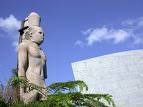
-283 Roman consuls: Publius Cornelius Dolabella and Gnaeus Domitius Calvinus Maximus. The Romans under consul Publius Cornelius Dolabella drive the Senones out of Roman territory, and they never return, probably joining other bands of Gauls headed to Macedonia, Asia Minor, and the Danube River; the Romans found a colony at Sena Gallica (modern-day Senigallia). Demetrius I dies in captivity, and his son Antigonus II Gonatus ("Knock-Kneed") (-319 to -239) claims the throne of Macedonia. In 283 B.C.E. Macedonian Greek gen. Ptolemy I (b. -367) dies after telling Euclid of Alexandria that his Elements is too hard to study and receiving the reply "There is no royal road to geometry", leaving History of the Conquests of Alexander; after a catfight between his 3rd and 4th wives Eurydice (daughter of Antipater of Macedon) and Berenice I, his co-regent (since -285) son Ptolemy II Philadelphus (-309 to -246) (Berenice I's son) becomes king #2 of the Egyptian 32nd (Ptolemaic) Dynasty, sole ruler of Egypt and Libya, and is crowned next Jan. 7, pissing-off Euyrice's son Ptolemy Keraunos (Ceraunus) ("thunderbolt") (d. -279) (ceramic anus?), who had grown up thinking he would be Ptolemy I's heir, causing him to move to the court of Lysimachus, king of Macedonia, Thrace, and W Asia Minor, whose wife Arsinoe II is his half-sister. The N part of the Anti-Roman Coalition (founded -338) is defeated, and the S part goes to the top of the list. The Romans under Gen. Sulla conquer the Etruscan town of Fiesole (Faesulae), where every year 12 young Roman men had been sent to study divination in their famous augur school; Sulla colonizes it with veterans, who later support Cataline under their leader Gaius Mallius. Deaths: Indian PM Chanakya (b. -350).
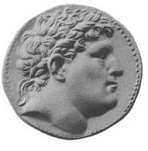

-282 Roman consuls: Quintus Aemilius Papus and Gaius Fabricius Luscinus. In summer Seleucus I begins preparing his army after Arsinoe II poisons her hubby Lysimachus' mind against his son and intended heir Agathocles and gets him to order his execution, and Agathocles' wife Lysandra and her brother Ptolemy Keraunos flee to his court in Babylon, asking for aid to place a son of Agathocles and Lysandra on the throne. After the Romans mop-up the S states of the Anti-Roman Coalition, the Greek colony of Tarentum pisses them off by sinking four Roman ships that had sailed into their waters (claiming violation of their maritime treaty of -334) in retaliation for Roman occupation of the Greek city of Thurii in Magna Graecia (S Italy), then driving a Roman garrison from Thurii, causing Rome to declare war, beginning the Pyrrhic War (ends -272). Lysimachus deposits 9K talents of gold with his general Philetaerus (-343 to -263), who uses it to set up the Attalid Kingdom in Pergamon (Pergamos, Pergamum, Pergamom, Akropol). Art: The Colossus of Rhodes (begun -293) is completed; too bad, it only lasts 56 years (until -226). About this time Greek sculptor Xenokrates of Sicyon flourishes, becoming the world's first art historian and leaving several vols., making a fan of Pliny the Elder.

-281 Roman consuls: Lucius Aemilius Barbula and Quintus Marcius Philippus. In Feb. after appointing his son Antiochus as his successor, Seleucus I (b. -358) defeats and kills Lysimachus (b. -361), ruler (since -306) of Thrace, Macedonia, and Asia Minor at the Battle of Corupedion (Corupedium) in Lydia near Magnesia ad Sipylum, winning all of Asia Minor and proclaiming himself king of Macedon; in Aug.-Sept. after crossing the Hellespoint en route to seizing Thrace and Macedonia, Seleucus I is treacherously assassinated (stabbed) by Ptolemy Keraunos, disinherited son of Ptolemy I Soter), earning him the nickname "thunderbolt", and Seleucus I's son Antiochus I Soter ("savior") (-324 to -261) becomes king of Syria, while Keraunos takes Macedonia (until -279), beginning the First War of Succession (ends -279) with Ptolemy II Philadelphus. The Tarentines send an embassy to Pyrrhus of Epirus offering him command of their combined armies, and Tarentum asks for his assistance against Rome, causing visions of becoming the successor to his distant kinsman Alexander III the Great and conquering first Rome then the entire Western World to dance in his head. Deaths: Greek Macedonian gen. Lysimachus (b. -361) in Feb. in Corupedium. Greek Macedonian gen. and Seleucid king #1 (-305 to -281) Seleucus I Nicator (b. -358) in Thrace (*assassinated)

-280 The 125th Olympiad. Pyrrhus sails for Tarentum with 20K foot, 3K horseman, 2K archers, 500 slingers, and 20 elephants, and gains a complete but costly V over the Romans at the Battle of Heraclea on the Siris River in Lucania by stampeding his elephants on the not-knowing-what's-going-on Romans after a long and bloody battle, becoming the original "Pyrrhic victory" when it depletes his forces too much to become the next Alexander III the Great, and after penetrating to within 20 mi. of Rome and failing to fake-out the Romans into surrendering he withdraws to winter quarters back in Tarentum. The Second Achaean League is formed by 12 towns in the N Peloponnese. Ariarathes II dies, and his eldest son Ariamnes II (d. -230) becomes ruler of Cappadocia (until -230), going on to share his throne with his son Ariathes III and gain independence from the Seleucid Empire. About this time the Gallic invasion of the Balkans sees an 85K-man army of Celtic Gauls from overpopulated Pannonia led by Cambaules and Brennus (Acichorius?) (d. -279) invade the Balkans, reaching N Bulgaria next year before splitting into three groups, with Brennus' group invading Paionia (Paeonia) N of Macedonia, group #2 led by Cerethrius, Leonnorius and Lutarius invading Thrace and Triballi, and group #3 led by Bolgius (Bolgios) (Belgius) invading Macedonia and Illyria. Roman consuls: Gnaeus Domintius Calvinus Maximus (dictator) and Publius Valerius Laevinus and Tiberius Coruncanius. Architecture: About this year after Ptolemy I Soter ordered its construction shortly after announcing himself king in -305, the 394 ft.-449 ft. (120m-137m) 800-talent limestone (Pharos) Lighthouse of Alexandria is finished by his son Ptolemy II Philadelphus on the small island of Pharos on the W edge of the Nile Delta, served by the port of Eunostos and its inner basin Kibotsos, connected with the Great Harbor of Alexandria to the E by the 1.2Km (7 x 180m) Heptastadium mole, becoming the world's first important lighthouse, guiding ships into the harbor for 1.6K years before being toppled by an earthquake in 1323 C.E.; the light is created by a furnace at the top; it is allegedly designed by Greek architect-engineer Sostratus of Cnidus; it is badly damaged by an earthquake in 956 C.E.; the last of its stones are used in 1480 C.E. to build the Citadel of Qaitbay; in 1994 C.E. French archeologists discover some of its remains; the mole is gradually filled-in, becoming the modern Ras el-Tin quarter of Alexandria. Births: Chinese political philosopher Han Fei Zi (d. -236) in Eastern Zhou. Greek writer (on mechanics) Philo of Byzantium (Mechanicus) (d. -220); lives in Alexandria, Egypt. Deaths: Greek philosopher Stilpo (b. -360) in Megara. Athenian orator Demetrius Phalereus (b. -350) in exile in Upper Egypt (snakebite). Greek physician Herophilus (b. 335) in Alexandria.
-279 Roman consuls: Publius Sulpicius Saverrio and Publius Decius Mus. In spring after they offer Ptolemy Keraunos the chance of paying them to keep them from attacking, and he underestimates them and turns down an offer of 20K soldiers from the Dardanians, then refuses to aid the tribes of Thrace against them, causing them to switch sides, the Celtic Gauls of Bolgius invade Macedonia and kick Ptolemy II's Keraunos' ceramic anus and capture and behead him after he is thrown by his his elephant, parading his head around on a spear, leaving Macedonia in anarchy, with rulership claimed successively by Keraunos' brother Meleager, Antipater Etesias, and Sosthenes; the First War of Succession in Syria (begun -280) ends by default; too bad, the Gauls don't follow-up their V in Macedonia, and Macedonian gen. Sosthenes (d. -277) assembles an army that forces Bolgios' troops to withdraw, only to be defeated by more Gauls under Brennus, after which 30K Gauls under Brennus defeat the Greeks at the Second Battle of Thermopylae after being held back for several mo., but are turned back at the Battle of Delphi after the Greek gods allegedly send them bad weather and the Celts go mad and slay 26K of each other; Brennus dies of his wounds, while his army retreats to the Spercheios River, only to be routed by an army of Thessalians and Malians; Arsinoe II flees to Alexandria after Ptolemy II Philadelphus executes her two younger sons. The original Et Tu, Brute? The Brutti, Lucani, and Samnites ally against Rome with Pyrrhus, who sends ambassador Cineas to the Roman Senate with a (cynical?) peace offer, demanding that the Romans stop aggression agains the Greeks of S Italy and restore lands taken from the Brutii, Apulians, and Samnites, which is rejected after blind ex-censor Appius Claudius Caecus rallies them against it; Rome and Carthage agree to support each other against Pyrrhus, who leads an army of Tarantines, Oscans, Samnites, and Greeks that routs the Romans at the hard-fought Battle of Ausculum in Apulia, then finds himself in yet another Pyrrhic V ("One more victory against the Romans and we shall be utterly ruined"), and withdraws to Tarentum again, sending Cineas with another peace offer, which goes nowhere; Publius Decius Mus III follows his father and grandfather in sacrificing himself in order to sic the gods on them in vain. Ptolemy II takes Miletus in SW Asia Minor from Antiochus I. Greek skeptic philosopher Timon of Phlius (-320 to -230), a disciple of Greek skeptic Pyrrho gives 'em hell with the line that people only need to know three things, their nature, how we are related to them, and what we can gain from them, but since our knowledge must always be subjective and unreal, we can only live in a state of suspended judgment - I prefer a real Savior? Singidunum ("round fort") (modern day-Belgrade, pop. 1.2M/1.6M) in Serbia at the confluence of the Sava and Danube Rivers is mentioned for the first time, populated by the Celtic (Gallic) Scordisci tribe, which conquers the regions of modern-day Serbia, Croatia, Bulgaria, and Romania before being absorbed as the Roman provinces of Pannonia, Moesia, and Dacia in the 1st cent. C.E.; the "dun" part is Celtic for fortress; the previous inhabitants were the Thracian tribe of Sings. Nephite prophet-king Mosiah I and his refugee people leave the Land of Nephi and settle with the people of Zarahemla in Central Am., who all become known as the Nephites.
-278 Pyrrhus campaigns against the Carthaginians in Sicily to help the Sicilian Greeks (until -276), and conquers all of it except Lilybaeum (Marsala); too bad his despotic I'm-Alexander-the-Great-eat-me attitude pisses-off the Greek cities, who withdraw their support in his fight against Rome, giving them time to recover? Zipoites I (b. -354) dies, and his eldest son Nicomedes I (-300 to -255) becomes king #2 of Bithynia, killing two of his three brothers, while #3 Zipoites II sets up an independent kingdom in Bithynia; meanwhile Antiochus I Soter of Syria invades, but withdraws without a battle after Nicomedes I allies with Heraclea Pontica and Antigonus II Gonatus. Ptolemy II explores the Upper Nile River, then crosses over the Red Sea into N Arabia to establish commercial routes. C Anatolia is occupied by the Celtic Galatians, who make Ankara the HQ of the Tectosages tribe, Pessinos (modern-day Balhisar) the HQ of the Trocmi tribe, and Tavium E of Ancyra as the HQ of the Tolstibogii tribe. Discredited Chinese statesman Qu Yuan (b. -348) commits suicide by jumping into the Mi Luo (Miluo) River in Hunan Province; the Chinese Autumn Festival is established to commemorate him. Roman consuls: Quintus Aemilius Papus and Gaius Fabricius Luscinus. Deaths: Bythinian king #1 (-326 to -278) Zipoites I (b. -326).

-277 Arsinoe II gets Arsinoe I, wife of her brother Ptolemy II exiled, then marries him herself, gaining them both the title "Philadelphoi" (Philadelphus) (brother or sister loving); an iron lady, she becomes a virtual co-pharoah - set the stage to mix and mingle? The moral of the story is clear, when you want milk and chocolate, make it Two Musketeers? An army of 20K Gauls led by Leonnorius et al. siege Byzantium and force them to pay tribute, gaining control of Lysimachia; they then luck out when Nicomedes I of Bithynia allies with them in an effort to rid his kingdom of his pesky brother Zipoites II, and helps them cross into Asia Minor to defeat and kill the pest, allowing Big Nick to become sole ruler of Bithynia; the Gauls then advance into Phrygia and colonize Galatia in the Kizil Irmak and Delice Irmak River basins on the great central plateau of Asia Minor, with capital at Ancyra (modern-day Ankara) (225 mi. ENE of Byzantium), mixing with a gaggle of Greeks and raising sheep and goats; meanwhile back in Macedonia, Antigonus II Gonatas defeats the Gauls under Cerethriius at the Battle of Lysimachia, and recovers Macedonia from the "wild men", establishing the Antigonid Dynasty (ends -168); the defeated Gauls move inland to Thrace and establish a kingdom with capital at Tyle (Tylis) (modern-day Kazanluk) (ends -211) - Spartacus' great-great-?-grandfather might be a Celt? The Romans take possession of Pythagoras' old town Crotona (Croton) in S Italy. Roman consuls: Publius Cornelius Rufinus and Gaius Junius Brutus Bubulcus. Deaths: King Sosthenes of Macedonia.
-276 The 126th Olympiad. The Greek Sicilians revolt against Pyrrhus, and he returns to Italy, crossing from Epirus to Brindisi (on Italy's heel), intending to kick Roman butt all along the Appian Way to Rome. Roman consuls: Publius Cornelius Rufinus (dictator) and Quintus Fabius Maximus Gurges and Gaius Genucius Clepsina. Births: Greek mathematician-geographer-astronomer ("greatest of all ancient geographers") ("founder of geodesy") Eratosthenes of Cyrene (d. -194) in Cyrene, Africa; pupil of grammarian Lysanias and poet Callimachus; estimates the Earth's circumference by measuring noon Sun angles in wells at Aswan and Alexandria, coming within 50 mi. of the correct value (approx. 25K mi.), and suggesting that the Sun moves around the Earth; measures the obliquity of the ecliptic with an error of 7 min. of arc; maps the course of the Nile River, adding the British Isles, India, and Ceylon to the map of the world; it takes until 1670 C.E. for Christian Europe to catch back up?


-275 Roman consuls: Lucius Cornelius Lentulus Caudinus and Manius Curius Dentatus. The Romans under Manius Curius Dentatus (d. -270) defeat Pyrrhus at the Battle of Malventum (Beneventum) ("bad wind"); Pyrrhus withdraws to Tarentum, decides to give up conquering the Romans and returns to Epirus, leaving Gen. Milo to defend it; Hiero II (-308 to -215), bastard son of Syracusan noble Hierocles is chosen as cmdr. of the army of Syracuse; the Romans establish a colony at Malventum, which they rename to Beneventum (Benevenuto)("good wind"). The Seleucids defeat the Gauls in Galatia. Archidamus IV dies, and his son Eudamidas II (d. -244) becomes Eurypontid king #24 of Sparta. Nonfiction: About this time Egyptian high priest Manetho writes History of Egypt (Aegyptiaca) (3 vols.) in Greek, becoming the first to divide rulers into dynasties. Greek-speaking Jews in Alexandria persuade Ptolemy II to order a Greek trans. of the Hebrew scriptures (Pentateuch) for the library of Alexandria, the Septuagint (Lat. "seventy"), a Greek trans. of the Hebrew scriptures sponsored by Egyptian king (-283 to -246) Ptolemy II Philadelphus (-309 to -246) (benefactor of the Alexandrian Library-Museum), begun by guess how many Hellenistic Jews in Alexandria (finished by -50). Births: Carthaginian statesman-gen. Hamilcar ("brother of Melqart") Barca (Barcas) ("lightning") (d. -228); father of Hannibal (-247 to -182), Hasdrubal (-245 to -207), and Mago (-243 to -203).
-274 The First Syrian War between Antiochus I and Ptolemy II Philadelphus begins (ends -271). Pyrrhus of Epirus, subsidized by Ptolemy II Philadelphus invades Macedonia, and defeats Antigonus II Gonatus after Macedonian troops join his army, driving Agonized Gonads II from Macedonia. Cyrene becomes independent (until -248). Roman consuls: Servius Cornelius Merenda and Manius Curius Dentatus (3rd time).

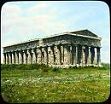
-273 Pyrrhus is called to Greece by Cleonymus, pretender to the Spartan throne. The Romans establish a colony at Paestum in Lucania, S Italy, and build a Doric Temple of Ceres there; by the 1st cent. B.C.E. it becomes famous for its roses, mentioned by several poets incl. Vergil. Bindusara Maurya dies, and in 269 after killing 99 of 100 brothers, his son Ashoka (Asoka) (Sansk. "without grief") Maurya (the Great) (-304 to -232), grandson of Chandragupta becomes king #3 of the Maurya Dynasty in Magadha, India (until -232), going on to become "the greatest ruler the world has seen" (H.G. Wells), and a patron of Buddhism, producing the earliest known writings in the sacred language of Pali (Sans. "row", "line", "series") ("language of mankind's philosophy"); the Seven Islands of Bombay (Mumbai) (named after the goddess Mumbadevi) on the W coast of India (modern-day pop. 12.4M/20.7M) are incorporated into the Maurya Empire (ends -180). Roman consuls: Gaius Claudius Canina and Gaius Fabius Licinius. Deaths: Roman politician Appius Claudius Caecus (b. -340). Indian king Bindusara Maurya (b. -297).
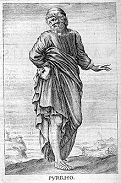
-272 The 127th Olympiad. Roman consuls: Spurius Carvilius Maximus and Lucius Papirius Cursor. Pyrrhus (b. -319) invades the Peloponnese with 25K infantry, 2K cavalry and 24 elephants to restore Cleonymus, and is met by Sparta and a coalition of Greek city-states; at the walls of Sparta the spunky Spartans tell Pyrrhus, "If thou art a god, thou wilt not hurt those who have never injured thee; if thou art a man, advance, and thou wilt find men equal to thyself" (Plutarch); Pyrrhus is paralyzed and KIA during a street fight in Argos by one of Antigonus II's soldiers (struck by a tile?); Antigonus II returns to Macedonia, establishing control of Greece by garrisoning Corinth, Chalcis (Euboea), and Demetrius (Thrace), making peace with the Aetolian League and backing pro-Macedonian tyrants in the Peloponnesus; with Pyrrhus kaput, Gen. Milo surrenders Tarentum, and the Romans win the Pyrrhic War (begun -282), and with it almost all of Italy S of the Po Valley, conquering the Brutti, Lucani, and Samnites, and garrisoning Tarentum and other Greek cities in S Italy; much of Sicily remains under Carthaginian control. The Aqua Anio Vetus aqueduct in Rome is built, originating at the Aniene (Teverone) River in Lazio, becoming one of 11 that eventually serve the well-watered Romans. Deaths: Greek Epirus king Pyrrhus (b. -319) in Argos (KIA). Greek skeptic philosopher (first) Pyrrho of Elis (b. -360) in Elis.
-271 Ptolemy II's Egypt defeats the Seleucids, ending the First Syrian War (begun -274); Syria loses Miletus, Phoenicia, W Cilicia, Pamphylia, and Lycia. Roman consuls: Lucius Genucius Clepsina and Caeso Quinctius Claudius.

-270 The Mamertines holding Messina (Messana) and harrassing the Syracusans are defeated by Hiero II of Syracuse at the Battle of Mylae (modern-day Milazzo) on the Longanus River; the Mamertimes call on the Carthaginians and Romans for aid, and the Carthaginians arrive first and capture the city, putting in a garrison at Messina; Carthage now becomes the guardian of sea law in the Mediterranean Sea; his military successes against the Mamertines cause the grateful citizens of Syracuse to elect former gen. of Pyrrhus of Epirus Hiero II (-308 to -215) as their king (tyrant) (until -215), becoming a wise and just ruler, later employing his kinsman Archimedes to engineer advanced hi-tech defense equipment to save the kingdom from the nasty Romans; he builds the Altar of Hiero II in memory of the fall of tyrant Thrasybulos in -466, which is celebrated annually in the Feast of Zeus Eleutherios (Zeus of Freedom) with a sacrifice of 450 bulls followed by a feast. Rome captures Rhegium (modern-day Reggio di Calabria) in S Italy from the Mamertines; minor rebellions continue in Etruria until -264. Egyptian king Ptolemy II Philadelphus hires an army of 4K Celtic warriors from the Balkans with the help of Antigonus II Gonatus, but after arriving in Egypt they begin plotting to take over, causing them to be captured and exiled on a deserted island in the Nile River, where they are starved to death. The old canal between the Nile and Red Sea of Darius I of Persia is reopened by Ptolemy II Philadelphus (until the 8th cent. C.E.). About this time Greek poet Theocritus from Syracuse flourishes, creating Greek bucolic poetry. Roman consuls: Gnaeus Cornelius Blasio and Gaius Genusius Clepsina. Births: Roman poet-playwright Gnaeus (Cnaeus) Naevius (d. -201); successor to Livius Andronicus. Deaths: Greek Skeptic philosopher Pyrrho of Elis (b. -360). Greek philosopher Epicurus (b. -341) in Athens (kidney stones) - happy now? Greek princess Arsinoe II (b. -316) in July.
-269 Roman consuls: Gaius Fabius Pictor and Quintus Ogulnius Gallus. Strato of Lampsacus (b. -335) dies, and his student Lyco (Lycon) of Troas (-299 to -225) succeeds him as dir. #4 of the Lyceum in Athens. Deaths: Greek Peripatetic philosopher Strato of Lamsacus (b. -335).

-268 The 128th Olympiad. Roman consuls: Appius Claudius Russus and Publius Sempronius Sophus. Ptolemy II Philadelphus of Egypt stirs up (and subsidizes) Athens, led by Chremonides to issue the Decree of Chermonides, declaring an alliance between Athens, Sparta, and Egypt against Antigonus of Macedon, causing the Chremonidean War with knock-kneed Macedonia next year (ends -261). Bindusara Maurya (b. -297) dies, and his son Ashoka (Asoka) (Sansk. "without grief") Maurya (the Great) (-304 to -232), grandson of Chandragupta becomes king of the Maurya Dynasty in Magadha, India, going on to become "the greatest ruler the world has seen" (H.G. Wells), and a patron of Buddhism, producing the earliest known writings in the sacred language of Pali (Sans. "row", "line", "series") ("language of mankind's philosophy"). Births: Roman statesman gen. Marcus Claudius Marcellus (d. -208).
-267 Roman consuls: Lucius Julius Libo and Marcus Atilius Regulus. The Romans led by consul Marcus Attilius Regulus (-308 to -250) conquer the Sallentini and capture the artificial port of Brundisium (modern-day Brindisi) on Italy's heel; he receives a triumph for it (24 white oxen); to qualify for a triumph one must kill at least 5K enemies and gather sufficient spoil; runners-up get a single white sheep (ovus)? Chremonides and Glaukon are elected rulers of Athens.
-266 Roman consuls: Numerius Fabius Pictor and Decimus Junius Pera. Rome completes the conquest of Italy to the Arno River and the Rubicon River.
-265 Roman consuls: Quintus Fabius Maximus Gurges and Lucius Manilius Vitulus. The Roman census counts 292,234 citizens in the Roman dominions in Italy S of the Arno River, showing how the Roman Republic is diffusing citizenship outside Rome itself for the first time in history. Areus I dies after introducing coined money, and his son Acrotatus (d. -262) (grandson of Acrotatus I) becomes Agiad king of Sparta, which is sagging under the concentration of land and wealth in too few hands, causing Phylarchus to accuse him of corrupting the simplicity of Spartan manners. Tian Dan uses the Fire Cattle Columns military tactic to reestablish the Qi (Chi) Kingdom in W China. The Romans first learn about Greek medicine from captured POWs. Chinese physician Huang Fu Mi writes Systematic Classics of Acupuncture and Moxibustion. Greek geometer Euclid (b. -325) dies, leaving his 13-vol. masterpiece Elements [of Geometry]: "There is no royal road to geometry" - levaes two Alexandrian Compasses in the garage?
-264 The 129th Olympiad. Roman consuls: Appius Claudius Caudex and Marcus (Quintus) Fulvius Flaccus, who launches a long distinguished career as a statesman and military cmdr., starting with the sacking of the Etruscan city of Volsinii (Vulsinii) (Velsuna) (Velzna) (modern-day Bolsena in Lazio or Orvieto in Umbria) in Umbria in C Italy, becoming the last Etruscan city to be taken by the Romans, breaking the spirit of the Etruscan League of Twelve Cities; a 5th cent. B.C.E. Etruscan necropolis is discovered there in 1874 C.E. The First Punic (Gr. "Phoenician") War (ends -241) begins when the Carthaginians allied with Hiero II of Syracuse siege the Mamertine pirates in Messina (Messana) and oust them, causing them to appeal to the New Big Cocks of Rome to kick the Carthaginians out, and the Romans decide to help them because of jealousy, defeating the Syracusan army; "So began the first of the most wasteful and disastrous series of wars that has ever darkened the history of mankind" (H.G. Wells); followed by the Second Punic War (-228 to -201) and Third Punic War (-149 to -146). Nicomedes I founds Nicomedia (modern-day Izmit) as the capital of Bithynia (NW Asia Minor), replacing nearby Astacus (Askatkos); it flourishes for the next six cents. The first recorded Gladiatorial Combat in Rome is held to honor the deceased Junius Brutus as the Romans decide to revive an old Etruscan sport with a modest display of three couples; Roman moralists approve of public violence and pain while disapproving of public kissing, ornaments on women, and Greek philosophy (which condemns gladiator events) - a quirk that survives into 20th cent. C.E. movies and TV? By this year the Romans have founded eight Roman colonies of 300 Roman citizens on the coast of Italy on land taken from conquered peoples to use for defensive purposes; other colonies of up to 4K settlers are established as military outposts, and are permitted self-govt.

-263 Macedonia begins a 2-year siege of Athens (ends -262). Philetaerus dies, and his nephew Eumenes I (d. -241) becomes king of Pergamon (Pergamum) (until -241); Ptolemy II Philadelphus then incites him to revolt from Antiochus I, becoming virtually independent. Rome sieges Syracuse and defeats Hiero II, causing him to make peace, sign a treaty, and become a Roman ally. Roman consuls: Gnaeus Fulvius Maximus Centumalus (dictator) and Manius Valerius Maximus Messala (Messalla) and Manius Otacilius Crassus. Architecture: The rebuilt Temple of Artemis in modern-day Selcuk, Turkey is destroyed. Deaths: Greek New Comedy poet Philemon in Athens; rival of Menander.
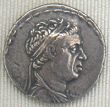


-262 Ptolemy II's son Ptolemy III, supported by his daddy begins seizing Ephesus (until -259). After Ptolemy II fails to give aid, Athens surrenders. Agrigentum (modern-day Agrigento) on the S coast of Sicily is captured by Rome after a trench war and the loss of 30K Romans through plague and starvation and war; the Carthaginians evacuate to the fortified towns on the W coast of Sicily, anchored by Lilybaeum, where the Carthaginian fleet can easily supply them from Africa. Ariamnes II dies, and his co-ruler son Ariarathes III (d. -220) becomes sole ruler of Cappadocia, going on to proclaim himself king (basileus) about -250 and add the Plain of Cataonia to his dominions. Zeno of Citium (b. -334) dies, and Cleanthes of Assos (d. -232) (from the town of Assos in coastal Asia Minor, where Aristotle later opens an Academy) becomes head of the Stoic School in Athens, going on to give materialism a religious flavor by comparing the Universe to a human being and the fixed stars to its soul, which makes it okay to worship them, and composes a Hymn to Zeus, praising cosmic order, law, and universal reason - sounds a lot like the Hebrew Jehovah? Acrotatus dies, and his son Areus II (d. -254) becomes Agiad king of Sparta (until -254). Roman consuls: Lucius Postumius Megellus and Quintus Mamilius Vitulus. Births: Greek mathematician ("the Great Geometer") Apollonius of Perga (d. -190); discoverer of the wonders of the ellipse and hyperbola. Deaths: Greek philosopher Zeno of Citium (b. -334) in Athens; last words: "I come, I come, why do you call me?"

-261 Roman consuls: Lucius Valerius Flaccus and Titus Otacilius Crassus. The Chremonidean War (begun -268) ends with a Macedonian V, and Antigonus II garrisons several strong points in Attica while imposing a moderate oligarchy on Athens. Antiochus II Theos ("god") (-286 to -246) succeeds his father Antiochus I Soter ("savior") as king of Syria (until -246) - god the son? Dornadilla (d. -233) becomes king of the Picts (Scotland). Ashoka Maurya of Magadha conquers Kalinga with the loss of 100K men. The Romans begin building a new fleet of quinqueremes based on a captured Carthaginian vessel; in 2 mo. they build 100 of them, plus 30 triremes; having no naval skills, they scrap the Carthaginian tactic of ramming or breaking the oars of enemy ships, and instead invent the corvus (lat. "crow, raven") (harpago) boarding device, a long drawbridge that they swing down on the enemy deck and swarm soldiers over.
-260 The 130th Olympiad. Roman consuls: Gnaeus Cornelius Scipio Asina and Gaius Duilius. The Second Syrian War begins between Antiochus II and Ptolemy II (ends -253); Antiochus II secures the support of Antigonus II and Rhodes. The first Roman naval V occurs at the Battle of Mylae (modern-day Milazzo), off the N coast of Sicily, with the capture or destructon of 50 Carthaginian vessels, stunning the Carthaginians with their new tactics incl. the corvus boarding device, becoming the first Roman naval V over the Carthaginians. Qin Beiqi defeats the Zhao Kingdom in the Battle of Chang Ping. The Chinese state of Chao (founded -403) is defeated by the Ch'in, losing 50K men KIA, after which 400K are taken POW, and most are slaughtered, breaking their military power. Science: Archimedes discovers the law of buoyancy in his bath, shouting "Eureka!" About this time Aristarchus of Samos pioneers the theory that the Sun is the center of the Solar System. Births: Spartan Agiad king Cleomenes III (d. -219); reformer son of Cleombrotus II. Roman consul-gen. Tiberius Sempronius Longus (d. -210); father of Tiberius Sempronius Longus. Deaths: Greek philosopher Menedemus of Eretria (b. -356); dies at the court of Antigonus II Gonatas after being chased there for double loyalties. Greek writer Euhemerus (b. -330); leaves Greek Myths; theorizes that the gods are really deified real humans.
-259 Ptolemy III completes the seizure of Ephesus. Roman consuls: Lucius Cornelius Scipio and Gaius Aquillius Florus. Births: Chinese Qin (Ch'in) emperor #1 (-246 to -210) Chen (Ying Zheng) (Qin Shi Huang) (d. -210).
-258 Antigonus II of Macedonia defeats Ptolemy II of Egypt in the naval Battle of Cos, and takes the Cyclades. The Van Lang Kingdom (begun in -2879) in Vietnam ends, and the Au Lac Kingdom in the S begins (ends -208) (-257 to -179?) - hung, thuc, wang, dong? Roman consuls: Gaius Sulpicius Paterculus and Aulus Atilius Caiatinus.
-257 Roman consuls: Quintus Ogulnius Gallus (dictator) and Gnaeus Cornelius Blasio and Gaius Atilius Regulus; Regulus becomes a consul for the 2nd time when he and his colleague Lucius Manlius Vulso defeat the Carthaginian fleet off Mt. Ecnomus in SE Sicily, then land a large force in Africa; Manlius returns to Rome with half the army, leaving Regulus to finish up. Ashoka converts to Buddhism, repents of his past war crimes, and begins carving sermons on stone called Rock Edicts. Roman consuls: Quintus Ogulnius Gallus (dictator) and Gnaeus Cornelius Blasio and Gaius Atilius Regulus.
-256 The 131st Olympiad. Roman consuls: Lucius Manlius Vulso and Quintius Caedicius. The naval Battle of Cape Ecnomus off modern-day Licata, Sicily, "the greatest naval engagement of antiquity" is a giant V for the Roman fleet over the Carthaginians, in which 700-800 big ships duke it out, with 140K rowers and marines on the Roman side and 150K rowers and marines on the Carthaginian side; the Romans continue to trump their corvus technology to sink 30 enemy ships and capture 65.
-255 Roman consuls: Marcus Aemilius Paullus and Servius Fulvius Paetinus Nobilior. Antigonus II and Ptolemy II sign a peace, giving the former Cilicia and W Pamphylia. The Romans invade Africa by sea with an insufficiently-supported Roman army of 15K infantry and 500 cavalry led by Marcus Atillius Regulus (d. -250); after capturing Tunis (10 mi. from Carthage), they are defeated by the Carthaginians under the leadership of Lacedaemonian mercenary Xanthippus at the Battle of Bagradas (Tunis); 12K Romans are KIA, and Regulus is captured with his last 500 soldiers. Nicomedes I dies, and after she pussy-whips him into it, his 2nd wife Etazeta of Bithynia ends up as regent for her infant sons, pissing-off his eldest son (by first wife Ditizele) Ziaelas (d. -228), who starts a civil war with the help of the Galatian Gauls, causing her to marry Nicomedes I's brother and ally with Antigonus III Doson of Macedonia (ends -254). Zhou Bao Wang dies, and Zhou Hui Wang (d. -249) becomes Dong Zhou king #25 (last) of China. Inventions: Eratosthenes invents the Armillary Sphere, graduated brass rings representing the chief celestial circles (meridian, equator, ecliptic, horizon, tropics, colures).

-254 The First Battle of Panormus sees the Carthaginian colony of Panormus (Panormos) (Gr. "sheltered harbor") (Palermo) in NE Sicily (founded in -734 by the Phoenicians) taken by the Romans. Carthage recaptures Agrigentum. Ziaelas defeats Etazeta, and she flees to Macedonia with her sons; Ziaelas becomes king #3 of Bithynia (until -228). Areus II dies, and Leonidas (Gr. "lion-like") II (d. -235) becomes Agiad king #28 of Sparta. Roman consuls: Gnaeus Cornelius Scipio Asina and Aulus Atilius Caiatinus. Births: Roman comedy playwright Titus Maccius (Lat. "clown") Plautus (Lat. "splay-foot") (d. -184); models his popular Latin comedies on Greek originals by Livius Andronicus; namesake of the adjective Plautine.
-253 The Second Syrian War (begun -260) ends with the loss of some Egyptian holdings in Asia after Ptolemy II makes peace with Antiochus II by giving him his daughter Berenice II Syra (-280 to -246) in marriage next year; Antiochus I is restored to Ionia (incl. Miletus), Coele-Syria, Cilicia, and Pamphylia. Roman consuls: Gnaeus Servilius Caepio and Gaius Sempronius Blaesus. Births: Greek gen. ("the last of the Greeks") Philopoemen (d. -182) in Megalopolis.
-252 The 132nd Olympiad. A storm destroys the Roman naval fleet, but they build a second fleet of 220 ships within 3 mo. Roman consuls: Publius Servilius Geminus and Gaius Aurelius Cotta.

-251 Roman consuls: Gaius Furius Pacilus and Lucius Caecilius Metellus. Aratus of Sicyon (-271 to -213) recovers Sicyon from the Macedonian-backed tyrant Nicocles and deposes him, then joins the Achaean League, soon dominating it. The Second Battle of Panormus sees 60K Romans under consul Lucius Caecilius Metellus defeat 21K Carthaginians under Hasdrubal, killing 11K Carthaginians (vs. 2.5K Romans) and capturing 104 elephants before making a triumphal procession into Rome.
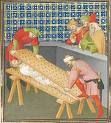

-250 Roman consuls: Lucius Manlius Vulso and Gaius Atilius Regulus. About this year the Roman Warm Period (Climatic Optimum) in Europe and North Am. begins (ends 400 C.E.), causing Theophrastus to write that date trees can grow in Greece but can't set fruit, as in modern times; the mild weather conditions help Hannibal cross the Alps with his elephants. The Carthaginians sue Rome for peace, dragging Regulus along with them; after he puts on a heroic show to dissuade them from ransoming him, he is returned to Carthage and put to death in a spiked barrel; the Romans seize Lilybaeum (Marsala), the Carthaginian naval base at the W tip of Sicily. Ptolemy II recovers the Cyclades. About this time Agron (d. -231) establishes the first Kingdom of Illyria (Albania) (Bosnia), building a modest stone city. Bactrian satrap Diodotus I (d. -210) declares himself independent, and conquers Sogdiana, founding his own dynasty. About this time Greek academic skeptic philosopher Arcesilaus (-316 to -240) founds the Second (Middle) Academy in Athens. About this time Paris in Gaul is founded as Lutetia by the Celtic Parisii in the Ile de la Cite (Île de la Cité), the island in the middle of the Seine River, with the Pont Neuf ("new bridge") spanning the Seine River at the downstream (W) point. About this time the port of Shanghai ("upon the sea") (modern-day pop. 24M/34M) in the Yangtze River Delta in C China on the East China coast is greatly improved by the excavation of the Huangpu (Chunshen) River on the orders of Lord Chunshen (d. -238), PM of the Kingdom of Chu during the Warring States Period of China, causing Shanghai to be nicknamed Shencheng ("City of Shen"). By this time there is a large Jewish community in Ephesus, according to Josephus (Ant. 12.125-6, 166-8, 172-3). By this time wheat (triticum) (bread) displaces emmer (far) (porridge) as the staple of the Roman diet, although Greeks continue to call Romans "porridge eaters". About this time the La Tene (Tčne) Iron Age Celtics invade Britain, and their culture gains predominance, making excellent swords and helmets, jewelry, horse harnesses, and pottery. Architecture: About this time Indian emperor Asoka begins the 40-50 ft.-high Columns (Pillars) of Asoka dedicated to Buddha containing his edicts, incl. at his alleged birthplace in Lumbini, Nepal, exempting the region from taxes; one edict orders hospitals to be built along the routes of travelers, and that they be "well provided with instruments and medicine, consisting of mineral and vegetable drugs, with roots and fruits"; "Whenever there is no provision of drugs, medical roots, and herbs, they are to be supplied, and skilful physicians appointed at the expense of the state to administer them"; too bad, when Buddhism falls ca. 750 C.E., the system of public hospitals and medical schools become kaput. Science: About this time the principles of the lever, compound pulley, and other simple machines are developed by Archimedes. Deaths: Greek historian Timaeus (b. -345) in Sicily; leaves his 40-vol. Histories, covering Greek history to the First Punic War, becoming one of the first Greek works to recognize the importance of Rome, covering the history of Italy and Sicily, using Olympic years and winners of the Stadion, Athenion Archons, Spartan Ephors et al. to compute his chronologies. Greek physician Erasistratus (b. -304) in Asia Minor; buried near Mount Mycale in Ionia.
-249 Peloponnesian gov. Alexander of Corinth (d. -245) revolts from Antigonus II, and holds the peninsula until his death in -245. The naval Battle of Drepanum is a V for Carthage against Rome, which loses 180 of 210 ships, and builds a 3rd fleet of 120 battleships and 800 transports, which they lose partly in battle and partly in a storm. Zhuang Xiang Wang becomes king of the Qin (Ch'in) in China, and brings an end to the Lu Dynasty. Roman consuls: Marcus Claudius Glicia (dictator) and Aulus Atillus Calatinus (dictator) and Publius Claudius Pulcher and Lucius Junius Pullus.

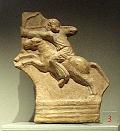
-248 The 133rd Olympiad. Arsaces I (d. -211), new leader of the Parni tribe in E Iran begins a war to oust the Syrians under Antiochus II, defeating and killing Seleucid satrap Andragoras in -238 and capturing Astabene (Astauene); next year he founds the Zoroastrian Parthian (Arsacid) Empire (ends 224 C.E.), SE of the Caspian Sea in modern-day Afghanistan and NE Iran between the Seleucid Kingdom in the W and the Bactrian Kingdom in the E; they inherit a mix of Greek and Persian culture, and become known for their multicultural tolerance; Parthian soldiers are given seven years of physical training then awarded a special belt, and like to wear mustachios; their horse archers become known for their trick of pretending to flee then shooting arrows back at the enemy when their guard is down, AKA the Parthian Shot (parting shot). Ptolemy II recovers Cyrene, independent since -274. Roman consuls: Publius Servilius Geminus and Gaius Aurelius Cotta.

-247 The Achaean League drives the Macedonians from Corinth. Hamilcar ("brother of Melqart") Barca ("lightning") (-275 to -228) is appointed CIC of Carthaginian forces in Sicily, sending naval forces to ravage the coastline of Lucania and Bruttium before establishing himself on 1,970-ft. Mt. Eercte (Hercte) (Mount Pellegino) (W of Panormus) in N Sicily (most beautiful promontory in the world, according to Goethe) (until -244), fortifying his camp, building a harbor for his fleet, and continuing raids on the Italian coast as far N as Cumae. Iranian nobleman Andragoras (Narisanka) (d. -238), Seleucid satrap of Parthia (W Khurasan) revolts against the Seleucids, giving Arsaces his big chance. Roman consuls: Numerius Fabius Buteo and Lucius Caecilius Metellus. Births: Carthaginian Rome-hating gen. Hannibal Barca ("lightning") (d. -182); son of Hamilcar Barca (-270 to -228).
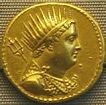

-246 On Jan. 29 Ptolemy II (b. -285) dies, and his son (who as crown prince has already put down a revolt in Cyrenaica) Ptolemy III Euergetes ("benefactor") I (d. -222) becomes king #3 of Egypt's 32nd (Ptolemaic) Dynasty, and soon receives an urgent call for help from his sister (Antiochus II's 2nd wife) Berenice II, who is under siege by Laodice I, beginning the Third Syrian (Laodicean) War (War of Berenice) between Ptolemy III and Seleucus II (ends -241); Berenice II and her infant son are murdered in Antioch before Ptolemy III arrives in Asia Minor, taking Antioch, then moving E to take Babylon and Seleucia-on-the-Tigris; Antiochus II Theos is poisoned by his first (divorced) wife Laodice I in Asia Minor, and her son Seleucus II Callinicus ("gloriously victorious") (-265 to -226) becomes Seleucid king of Syria (to -226). Antigonus II Gonatas of Macedonia reconquers the Cyclades from Ptolemy III Euergetes of Egypt in the naval Battle of Andros. 13-y.-o. Ying Zheng (-259 to -210) becomes emperor of Qin (Ch'in) in China (until -210) under regent Lu Buwei (until -237). Roman consuls: Titus Coruncanius (dictator) and Marcus Fabius Licinius and Manius Otacilius Crassus. Inventions: Ctesibus of Alexandria invents the hydraulis (water organ), a mechanical flute-playing instrument whose wind pressure is regulated by water pressure, becoming the first organ, and him the first organist; it takes until the 6th-7th cent. for bellows to be invented. Births: Egyptian queen (-220 to -204) Arsinoe III Philopator ("father-loving") (d. -204); wife of Ptolemy IV; mother of Ptolemy V Epiphanes. Deaths: Greek Seleucid king (-261 to -246) Antiochus II Theos (b. -286) in Asia Minor (poisoned by Laodice I).
-245 Roman consuls: Marcus Fabius Buteo and Gaius Atilius Bulbus. Eudamidas II dies, and his reformer son Agis IV (-265 to -241) becomes Eurypontid king #25 of Sparta (until -241), becoming known as idealistic but impractical.
-244 The 134th Olympiad. Hamilcar Barca is dislodged from Mount Ercte, and captures the city of Eryx at the base of 750m Mount Eryx (Erice) (modern-day Monte San Giuliano) in W Sicily, trapping the Romans guarding the Temple of Venus at the top while sending his army to siege Drepanum and raiding the coasts of Sicily and Italy with his fleet (until -241). Roman consuls: Aulus Manlius Torquatus and Gaius Sempronius Blaesus.

-243 The Achaean League takes Corinth from Macedonia. King Leonidas II of Sparta goes into exile until -241; his son-in-law Cleombrotus II rules during his absence. Roman consuls: Gaius Sulpicius Gallus and Gaius Fundanius Fundulus.
-242 A praetor peregrinus is appointed to assist the praetor urbanus in lawsuits in which one or both of the litigants are foreigners. Roman consuls: Aulus Postumius Albinus and Quintus Lutatius Catulus.

-241 On Mar. 10 after the exhausted Romans manage to launch a 4th fleet of 200 ships under Gaius Lutatius Catulus, they win the naval Battle of the Aegates (Egadi) Islandsagainst exhausted Carthage under Adm. Hanno off the Aegates Islands W of Sicily, cutting off their African supply bases and winning Sicily, forcing Hamilcar to abandon it; Carthage is doomed. The Third Syrian War (begun -246) ends after a number of low Nile floods cause a famine in Egypt, and Ptolemy III sues Seleucus II for peace; Seleucus II surrenders the coasts of Syria and S Asia Minor, along with some Aegean ports; Seleucus II recognizes his brother Antiochus Hierax (Gr. "falcon") (d. -226) as ruler of Asia Minor. Eumenes I dies, and cousin's son Attalus (Attalos) I Soter (Gr. "savior") (-269 to -197) comes to power in the city of Pergamon in NW Turkey, and defends the city from the dying, er, invading Gauls, taking the title of "savior". Agis IV is executed for attempting agrarian reform (dividing the land into 4.5K equal lots rather than giving it only to the 700 it had fallen to) and trying to introduce the Lycurgan constitution, and his infant son Eudamidas III (-240 to -228) becomes Eurypontid king of Sparta (until -228), with regents ruling in his place. Architecture: The Aurelian Road (Via Aurelia) between Rome and Alsium, then along the SW coast of Italy as far as Cosa is begun; it is eventually extended into Arles in Gaul. Roman consuls: Quintus Lutatius Cerco and Aulus Manlius Torquatus.

-240 The 135th Olympiad. Halley's Comet can be traced back to this year (76-year cycle); it tends to appear four years before a war breaks out? Seleucus II attacks his brother Antiochus Hierax, and the latter secures the aid of Mithridates II of Pontus and the Celtic Galatians; the Galatians crush Seleucus at Ancyra. Sweet dreams are made of these? Carthaginian gen. Hamilcar Barca signs a treaty with Roman Gen. Gaius Lutatius Catulus, ending the First Punic "offensive-defensive" War (begun -264); Sicily (except for Syracuse and one-quarter of Sicily, which are controlled by Hiero II) becomes an "estate" of the Roman people, paying tribute and yielding profit to the victors; Carthage pays a war indemnity of 3.2K talents; there is peace between R and C for 22 years after this war in which both really lose?; but never fear, because after Hamilcar, suffering from lack of support by his govt. reneges on promised pay to some of his African tribal mercenaries from Sicily, they mutiny and begin looting, forcing farmers to quit cultivating the land; after Carthaginian politician Hanno the Great fails to appease them, he summons Hamilcar, who ruthlessly kicks their butts on the Bagrades River (modern-day Medjerda) and relieves the siege of Utica, only to be sieged by the mercenaries under Spendius, defeating them again with help from Numidian chief Naravas, killing 10K and taking 4K POWs, enrolling them in his army or releasing them until he learns that they have been mutilating Carthaginian POWs, then crucifying them by the thousands and capturing their towns. You just know that the Romans stole their higher culture from Greece, but can't pin it down to a year? The Anteclassical Period of Latin (ends -80), known for the writings of Ennius, Plautus, and Terence begins when Lucius Livius Andronicus (-284 to -204), a Greek freedman who had been captured at Tarentum in -272 becomes the first Greek teacher in Rome, adapting Greek comedies and tragedies for performance in Latin, founding Latin lit.; he also translates Homer's "Odyssey" into Latin, giving Romans their first poetry other than hymns and drinking songs? Roman consuls: Gaius Claudius Centho and Marcus Sempronius Tuditanus.


-239 The leap year is introduced into the Egyptian calendar. Antigonus II Gonatas dies, and in the winter his son Demetrius II (d. -229) becomes king of Macedonia (until -229); after he protects Epirus against the Aetolian League, it breaks with Macedonia and allies with the Achaean League. Diodotus I of Bactria allies with Seleucus II against the Parthians and is killed, and his son Diodotus II (d. -230) becomes king of Bactria (until -230). After Hanno quarrels openly with Hamilcar, the latter is promoted to CIC of the Carthaginian army, defeating an army of mercenaries sieging Carthage by driving them into a defile and massacring them, then reconciling with Hanno under pressure of the senate and sieging Tunis, defeating their leader Matho and reducing Utica; Hamicar forms a plan to conquer and found a new empire in Spain to use as a base for a final assault on Rome (begins -237). Roman consuls: Quintus Valerius Falto and Gaius Mamilius Turrinus. Births: Roman poet ("Father of Roman Poetry") Quintus Ennius (d. -170) in Rudiae, Salento; hometown fuses Greek, Latin, and Oscan tongues - Five Ns?

-238 After it revolts, a Roman fleet under plebeian consul Tiberius Sempronius Gracchus Major (the Elder) (first of the gens Sempronia to become consul) lays seige to the Carthaginian province of Sardinia (135 mi. W of the mouth of the Tiber River) and annexes it; he also scores a V over the Ligurians in NW Italy; in spring after receiving support from the senate to make up for the loss of Sicily and Sardinia, Carthaginian gen. Hamilcar Barca goes to Spain with his 9-y.-o. son Hannibal after making him swear eternal enmity against Rome, using the Phoenician colony of Gades as base to take on the Tartessians, Celts, and Iberians in S and W Spain. Demetrius II of Macedonia attacks Aetolia, beginning the War of Demetrius (ends -229). Attalus I begins a war against Hierax and the Galatians (ends -227). Seleucus II expels Arsaces I from Parthia, but withdraws to deal with a revolt in Syria, allowing him to return. A great assembly of priests is held in Canopus, Egypt, leaving the Table of Canopus (Canopus Stone) (Decree of Canopus), which serves as a double-check on the trans. of the Rosetta Stone; discovered in 1866 by Prussian Egyptologist Karl Richard Lepsius. Roman consuls: Publius Valerius Falto and Tiberius Sempronius Gracchus. Births: Macedonian king (-221 to -179) Philip V (d. -179); son of Demetrius II; adopted by his father's cousin Antigonus III Doson. E Numidian (Massylian) king #1 Masinissa (Massinissa) (Massena) (Masensen) (d. -149); Roman ally against Hannibal; husband of Sophonisba, ex-wife of Syphax, and daughter of Hasdrubal.
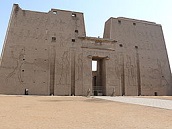
-237 Ying Zheng throws off his regent-PM Lu Buwei and rules by himself (until -210), going on to subjugate all the rival states (Han, Zhao, Wei, Chu, Yan, Qi) and create the first centralized feudal empire in Chinese history, becoming the first real Chinese emperor. Roman consuls: Lucius Cornelius Lentulus Caudinus and Quintus Fulvius Flaccus (2nd time). Architecture: On Aug. 23 the Egyptian Temple of Horus at Edfu on the W bank of the Nile River in Upper Egypt is begun (finished -57).
-236 The 136th Olympiad. Roman consuls: Publius Cornelius Lentulus Caudinus and Gaius Licinius Varus. Births: Roman gen. Publius Cornelius Scipio Major (the Elder) Africanus (d. -183); grandfather (by adoption) of Scipio the Younger (-185 to -129); called Africanus after defeating Hannibal at Zama (-202) in the Second Punic War. Deaths; Chinese philosopher Han Fei Zi (b. 280) in Qin (suicide by poison); leaves Han Feizi, becoming a std. work on Chinese legalism; the Period of One Hundred Schools in China (classical Chinese philosophy) ends.
-235 The doors of the Temple of Janus Geminus in Roman Forum are closed for the first time, indicating that Rome is at peace; next time -30. King Leonidas II of Sparta dies, and reformer Cleomenes III (-260 to -219) becomes Agiad king of Sparta (until -222) after marrying the widow of Agis IV, going on to imitate Agis II and become Sparta's most energetic king, trying to restore the prestige while waging wa against the Achaean League under Aratus of Sicyon. Roman consuls: Titus Manlius Torquatus and Gaius Atilius Bulbus.
-234 The first elementary school opens in Rome. Roman consuls: Lucius Postumius Albinus and Spurius Carvilius Maximus. Births: Roman "novus homo" statesman-historian (redhead) (grey eyes) Marcus Porcius Cato (Lat. "All-Knowing") Priscus (Lat. "the Ancient") Censorius (Lat. "the Censor") Major (Lat. "the Elder") (d. -149) in Tusculum; first Roman to write a history in Latin; gives several speeches all ending with the phrase "Delenda est Carthago" ("Carthago delenda est") (Carthage must be destroyed).
-233 Macedonia is attacked by invaders from the N, causing Demetrius II to break off his attack on Aetolia. Nothatus the Tyrant (d. -213) becomes king of the Picts (Scotland). Roman consuls: Quintus Fabius Maximus Verrucosus and Manius Pomponius Matho. Deaths:

-232 The 137th Olympiad. After the Celtic Galatians in Asia Minor side with renegade Seleucid prince Antiochus Hierax, and the Hellenized cities unite behind him and inflict several defeats on them, they are forced to settle permanently in modern-day Galatia, with the Tolistobogii in the W around their capital Pessinus, the Tectosages in the C around their capital Ancyra, and the Trocmi in the E around their capital Tavium. Agron dies, and the Illyrian Ardiaei throne is occupied by his wife Queen Teuta (Tefta) (d. -227), the "Catherine the Great of Illyria", acting as regent for her son Pinneus; she drives the Greeks off the Albanian coast, then considers piracy as a lawful trade and begins attacking Roman ships in the Ionian Sea. Ashoka the Great (b. ?) dies, and his Mauryan Empire in India begins breaking up into smaller kingdoms, incl. the Andhra (Satavahana) Dynasty in S India in modern-day Andra Pradesh (ends 230 C.E.). Deaths: Indian Buddhist king Asoka (Ashoka) (Sans. "without sorrow") Maurya the Great (b. ?); son of Bindusara Maurya (-297 to -273). Greek Stoic philosopher Cleanthes (b. -331).
-231 Epirus joins the Aetolian and Achaean Leagues against Demetrius II of Macedonia. Roman consuls: Gaius Duilius (dictator) and Gaius Papirius Maso and Marcus Pomponius Matho.
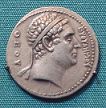
-230 Attalus I crushes the Galatians near Pergamon, taking the title of king. The Dardanians defeat Demetrius II. Diodotus II is killed by usurper Euthydemus I (-260 to -200), satrap of Sogdiana, who becomes king of Bactria (until -200). A new invasion force of Gauls crosses the Alps into Italy, ending the longtime peace between the tribes of Cisalpine Gaul (Po Valley) and Rome, causing the Boii to personally repel them, after which an arriving Roman army turns back. The state of Han is conquered by Ch'in soldiers under King Cheng, becoming the first of six states to fall. About this time oil lamps begin to be used in Greece. Roman consuls: Marcus Aemilius Barbula and Marcus Junius Pera. Births: Greek philosopher Diogenes the Stoic (Diogenes the Babylon) (d. -150) in Seleucia; teacher of Carneades the Academic (-213 to -129). Deaths: Greek skeptic philosopher Timon of Phlius (b. -320). Greek astronomer Aristarchus of Samos (b. -310).
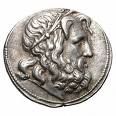
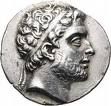
-229 Demetrius II Aetolicus dies, and his Antigonid cousin Antigonus (Antigonos) III Doson (Gr. "going to give", "always promising") (-263 to -221) becomes guardian of Demetrius' 8-y.-o. son Philip V (Demetrius III) (-238 to -179), going on to marry his mother and become king of Macedon (until -179); the War of Demetrius (begun -238) ends; Argos expels pro-Macedonian tyrant Aristomachus and joins the Achaean League; Athens declares independence from Macedonia. War breaks out between Sparta and Achaea. Attalus I of Pergamum drives Antiochus Hierax out of Asia Minor (ends -228). Eurycleides and Mikion are elected rulers of Athens. The Romans declare war on Queen Teuta of Illyrium, and a huge army and navy under the command of Santumalus and Alvinus attacks Albania (Dalmatia), capturing the coastal city of Epidamnos, whose name the Romans don't like because of associations with the Latin word "damnum", causing them to rename it Dyrrachium (Lat. "bad spine", "difficult ridge") for its high cliffs (really named after its founder?); it becomes the landing spot for Romans crossing the Ionian Sea from Brundisium, and the start of the Via Egnatia military road to Thessalonica. Roman consuls: Lucius Postumius Albinus and Gnaeus Fulvius Centumalus.
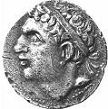
-228 The 138th Olympiad. Hamilcar Barca (b. -275) is KIA in Spain in battle against the Vettones (drowns on the back of an elephant?), and his 2nd son Hasdrubal Barca ("lightning") (-245 to -207) (Hannibal's brother) takes command of the Carthaginian army in Spain, and finishes conquering it, founding the city of Carthago Nova (New Carthage) (Nova Cartagena), located on a peninsula with two excellent harbors and a nearby silver mine; the Romans forbid them to cross the Ebro River. Dalmatia comes under Roman domination. Seleucus II Calinicus gathers an army in Babylonia to recapture Parthia. Cleomenes III defeats the Achaean League under Aratus of Sicyon, then seizes power in Sparta, redivides the land, enfranchises 4K perioikoi, and abolishes the ephorate, forming a larger citizen army. Eudamidas III dies, and Archidamus V (d. -227) becomes Eurypontid king #27 of Sparta. Ziaelas is killed by some Galatian Gauls, and his son Prusias I Chlorus (-228 to -182) becomes king #4 of Bithynia, going on to form a marriage alliance with Philip V of Macedon. The first Roman ambassadors are sent to Athens and Corinth - how long till they sack it? Roman consuls: Quintus Fabius Maximus Verrucosus and Spurius Carvilius Maximus. Births: Roman Gen. Titus Quinctius Flaminius (d. -174); brother of Lucius quinctius Flaminius (d. -170). Deaths: Carthaginian gen. Hamilcar Barca (b. -275) (KIA); dies after allegedly founding the port of Barcelona (originally Barcino) in Spain in 218 B.C.E. (modern-day pop. 1.6M/5.3M).
-227 Archidamus V is deposed by Cleomenes III, who poisons Eurydamidas and installs his Agiad brother Eucleidas (d. -222) becomes Eurypontid king of Sparta (until -222); Cleomenes III of Sparta starts a war with the Achaean League. Arsaces I returns victorious to Parthia after Seleucus II withdraws. Antigonus III Doson takes the throne of Macedonia from Demetrius III (Philip), then makes peace with Aetolia and drives the northern tribes out of Macedonia. Seleucus drives Antiochus Hierax out of Syria to Celt-run Thrace, where he is killed next year. Teuta accepts a peace with Rome, and abdicates and/or dies. Roman consuls: Publius Valerius Flaccus and Marcus Atilius Regulus.

-226 Seleucus II dies, and his son Seleucus III Soter Keraunus (Ceraunus) ("thunderbolt") Soter (Gr. "savior") (-241 to -223) becomes king of Syria (until -223). The 226 B.C.E. Rhodes Earthquake destroys the Colossus of Rhodes, causing it to snap at the knees and fall over onto the land; it also destroys the city of Camirus along with its temple; Ptolemy III offers to pay for the reconstruction of the Colossus of Rhodes until the Oracle of Delphi nixes it; the ruins lay around for the next eight cents. (until 654 C.E.), becoming a tourist attraction, with people wrapping their arms around the fallen thumb for a photo opp. Roman consuls: Marcus Valerius Messala and Lucius Apustius Fullo.
-225 Roman consuls: Lucius Aemilius Papus and Gaius Atilius Regulus. Roman pop.: 5M, incl. 3M-3.5M free, 1.2M-1.7M slaves, and 280K Roman citizens; by 14 C.E. the pop. of Italy increases by 50%, mostly slaves. The Romans decide to partition the Gallic territory of Picenum in the Italian Marche, pissing-off the neighboring Boii and Insubres of Cisalpine Gaul, who hire the Gaesatae (Gael. "spearmen"), a group of naked dangly Gaulish mercenaries living in the Alps near the Rhone River, led by Concolitanus and Aneroestes (Aneroëstes) (d. -225) to help them fight the Romans, the news causing the Romans to make a treaty with Carthaginian gen. Hasdrubal giving him control of Spain to free them to take on the pesky Gauls, with consuls Gaius Atilius Regulus (d. -225) and Lucius Aemilius Papus forming armies, with Papus stationing four legions of Romans (22K men) plus 32K allies in Ariminum, stationing another 54K Sabines and Etruscans under command of a praetor on the Etruscan border, and sending 20K Umbrians and Sarsinates and 20K Veneti and Cenomani to attack the home territory of the Boii, threatening the Insubrian frontier, while Regulus ships off from Sardinia with 50K men and calls on 21.5K Romans and 32K allies in Rome, plus reserve legions in Sicily and Tarentum; meanwhile after 70K madass mainly naked and dangly Celts (incl. 30K Gaesatae) overrun Etruria and march toward Rome (the last serious invasion of Italy by the Gauls), the Romans meet up with them at Clusium (three days march from Rome), causing both sides to set up camps; the 50K-man Gallic infantry then leaves their 20K-man cavalry behind at night with campfires burning while they sneak off to the Etruscan town of Faesulae (modern-day Fiesole) 3 mi. NE of Florence (modern-day Fiesole) and entrench themselves with new fortifications, after which the next morning the cavalry parades out, causing the Romans under Papus to believe they're retreating and follow them to the trap, where 6K are KIA; after the Gauls make the mistake of veering to the coast to make off with their booty, the Romans under Regulus cut them off at Telamon in Etruria (modern-day Talamone in Tuscany), causing the Battle of Telamon (last use of the war chariot in continental Europe), starting with a hill battle that results in Regulus being KIA, and his head taken for a new drinking cup, pissing-off the remaining 75K Romans (incl. 5K cavalry) under Papus, who defeat them after the small er, shields of the Gaesatae in the front prove no match for Roman javelins, causing them to retreat, after which their allies are slaughtered, with 40K casualties and 10K taken POW, incl. Concolitanus; Aneroestes escapes and commits suicide; the Romans engage in human sacrifice before the battle in order to examine the quivering livers of the victims for signs and portents; Papus then goes on a punitive expedition, destroying all Celtic tribes S of the Po River, after which he receives a triumph in Rome - you won't have my mataris to kick around anymore? Cleomenes III of Sparta bests Aratus of Sicyon, causing him to appeal to Antigonus III for help. The Chinese state of Qin (Ch'in) conquers the Chinese state of Wei (founded -403). Lyco (b. -299) dies, and his student Aristo of Ceos (d. -190) succeeds him as dir. #5 of the Lyceum in Athens, leaving Conversations in Love, and a bio. of his master Lyco. About this time Roman historian ("Father of Roman History") Quintus Fabius Pictor writes a Roman History (in Greek), covering from Anaeas to the Second Punic War; the first Roman historian writes in Greek? Deaths: Greek Peripatetic philosopher Lyco (b. -299).
-224 The 139th Olympiad. Syria and Pergamon start a war (ends -221). The Achaean League requests Macedonian aid against Sparta and the Aetolian League. Roman consuls: Lucius Caecilius Metellus (dictator) and Titus Manlius Torquatus and Quintus Fulvius Flaccus (3rd time).

-223 After Seleucus III is murdered during his war with Attalus I of Pergamum, his younger brother Antiochus III (the Great) (-243 to -187) becomes king of Syria (until -187). Archimedes is accused of impiety. Ch'in conquers the state of Chu (Ch'u) (founded -1030). Roman consuls: Publius Furius Philus and Gaius Flaminius.
-222 The Romans conquer N Italy from the Celts, incl. Novara in the Piedmont, and the ancient Celtic town of Mediolanum (modern-day Milan) (Lat. "medio" + "planum" = center of the plain) in the Po River Valley of the 400-mi. Po (Padus) River (longest river in Italy, with source on 12.6K-ft. Mount Viso in the Cottian Alps), which is as little as 1 ft. deep in some places - it's called the Po River because it's a po' excuse for a river? Megalopolis is destroyed by Cleomenes III of Sparta, but is later restated by Achean League leader Philopoemen; a new Hellenic League, consisting of the Achaean League allied with Antigonus III Doson of Macedonia routs the Spartan army in the Battle of Sellasia, and takes possession of Sparta, making it kaput as a political entity; Cleomenes III flees to Egypt to the protection of his patron Ptolemy III; Antigonus abolishes the Spartan kingship, restores the ephors, and forces Sparta to join his league. The election of Roman consuls is moved to the Ides of March (Mar. 15). Ch'in conquers the state of Yan (founded in 11th cent. B.C.E.). Roman consuls: Gnaeus Cornelius Scipio Calvus and Marcus Claudius Marcellus. Deaths: Greek writer Philo of Byzantium (b. -280); leaves Pneumatics, which incl. the first description of a water mill and the problem of doubling the cube. Spartan king Eucleidas (b. ?).

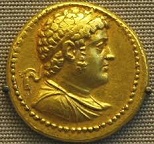
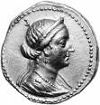
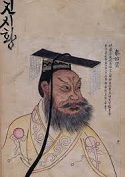
-221 Roman consuls: Quintius Fabius Maximus Verrucosus (dictator) and Publius Cornelius Scipio Asina and Marcus Minucius Rufus. Antigonus III Doson dies, and his adopted son Philip V (-238 to -179) becomes king of Macedonia (until -179), going on to attempt to maintain Macedonian hegemony over the Greek city-states but ultimately blundering them into Roman domination. Ptolemy III Euergetes dies, and his fat lazy son Ptolemy IV Philopator ("father loving") (d. -204) becomes king #4 of Egypt's 32nd (Ptolemaic) Dynasty, imprisoning Cleomenes III; the Eyptian Ptolemaic Dynasty peaks and goes down under this weak king dominated by his chief minister Sosibius, who has his mother, uncle, and younger brother killed while he becomes addicted to orgiastic practices of religion and lit. dilettantism, building a temple to Homer and marrying his sister Arsinoe III Philopator (-246 to -204) while being pussy-whipped by his mistress Agathoclea (-247 to -202), sister of his minister Agathocles (-202). The war between Syria and Pergamon (begun -224) ends with Syria recovering most of the territory lost since -241; the Fourth Syrian War (ends -217) begins between Antiochus III and Ptolemy IV. Hasdrubal (b. -245) is assassinated, and the army chooses his 26-y.-o. lt. and brother-in-law Hannibal as CIC of the Carthaginian army, giving him the tools to implement his desire of revenge against the *!?!* Romans; first he has to finish subjugating Spain, which takes two years. Pretender brothers Molon and Alexander unsuccessfully revolt from Syria in Mesopotamia (ends -220). Ying Zheng conquers the last pesky state of Ch'i (Qi), proclaiming himself emperor Qin Shi Huang Di (Shih Huang-ti) (Shih Hwang-ti) (-259 to -210) of the new think-happy-thoughts Qin (Ch'in) Dynasty (ends -206), ending the Warring States Period in China (begun in -401); all weights and measures are unified; from now until ? China lives in splended isolation, surrounded by sea, malarial jungles, deserts, and mountains, with no agrarian city-possessing neighbor to compete with it. Architecture: The Circus Flaminius is built for the plebeian games by popular leader Gaius Flaminius Nepos - catch Uncle Nasty's show? Science: The heart valves are named by ?.

-220 The 140th Olympiad. Roman consuls: Marcus Valerius Laevinus and Quintus Mucius Scaevola. Hannibal assisted by 40 elephants captures the city of Helmantica (modern-day Salamanca) (pop. 5K) in NW Spain on the Tormes River (120 mi. W of modern-day Madrid) from the Celtic tribe of the Vettones. Antiochus III suppresses Molon and Alexander in Mesopotamia. Spartan king Cleomenes III escapes, then tries to stir up a revolt in Alexandria. Philip V of Macedonia wars against the Aetolian League (until -217). Prusias I Chlorus of Bithynia wars against Byzantium, and defeats the Gauls. Philip V of Macedonia assembles the Hellenic League in Corinth and declares the Social War (ends -217) against the Aetolians, Elis and Sparta, engineered by Aratus of Sicyon. Ariarathes III dies, and his boy son Ariarathes IV Eusebes (the Pious) (d. -163) becomes king of Cappadocia, going on to marry Antiochis, daughter of Antiochus III the Great of Syria and his wife Leodice III, and produce daughter Stratonice (Stratonike), who goes on to marry Eumenes II of Pergamum. Architecture: The Milvian Bridge in Rome is built. The Flaminian Road (Way) (Via Flaminia) from Rome N to Rimini is built about this time. Art: The flaccid, er, reclining Statue of the Dying Gaul is erected by Attalus I in Pergamon about this year to commemorate the big V against them in -241. Births: Roman tragic poet-dramatist-painter Marcus Pacuvius (d. -130); nephew of Ennius. Roman comic poet Caecilius Statius (d. -166).
-219 Hannibal subjugates all Spain between the Tagus and Ebro (Iberus) Rivers, except for the pesky walled Greek colony of Saguntum (Sagunto) in E Spain (18 mi. N of Valencia) S of the Ebro River in the middle of his holdings, which had a "friendship" with Rome and used it to play politics with other Spanish cities, causing him to siege it for 8 mo. before taking it, during which he is severely wounded; using this as an excuse, the Romans eagerly void their agreement with Carthage not to interfere with affairs S of the Ebro River and demand that Hannibal be handed over; when they refuse, the Second Punic War (ends -201) between Rome and Carthage begins; Hannibal recruits Celtic tribesmen from Lacobriga (modern-day Lagos) and other towns in Spain and the Algarve to fight the Romans. Exiled Spartan Agiad king Cleomenes III (b. -260) is slain in Egypt, and an anti-Macedonian faction in Sparta restores the dual kingship; he is succeeded by Agesipolis III (d. -215), grandson of Cleombrotus II as Agid king #31 (last) of Sparta, and Lycurgus (d. -210) becomes Eurypontid king of Sparta. Emperor Shi Huang Di orders Xu Fudong to find the fountain of youth, and he asks for thousands of children and sails eastward; the Chinese believe he lands in Japan and populates the island.

-218 Roman consuls: Publius Cornelius Scipio the Elder and Tiberius Sempronius Longus. Rome elects Publius Cornelius Scipio the Elder (Major) (-236 to -183) as consul to fight the Carthaginians; in the summer Hannibal leaves New Carthage, Spain with an army of 90K foot, 12K cavalry, 15K-20K horses, and a herd of elephants, crosses the Ebro River and the Pyrenees, builds rafts to cross the Rhone River, then crosses the Cottian Alps into Italy over Col de la Traversette SW of Turin in 15 days, fighting snowstorms, landlsides, and hostile mountain tribes, losing thousands of men (all but 26K?) and all but 37 of his elephants, saving his favorite 1-tusked elephant Surus ("the Syrian) (the Syrian), winning a battle against the Ligurians and recruiting new soldiers 'among the friendly Insubres in return for subjugating their enemies the Taurini (in modern-day Turin); he then forces all the Celtic (Cenomani et al.) and Ligurian tribes into his alliance on the Upper Po (Padus) River, reaching 80K foot and 10K cavalry; meanwhile the Boii revolt and siege Mutina (Modena), and all of Gallia Cisalpine turns against the Romans; Scipio the Elder attempts to intercept him, arriving by sea at Marseille three days late, and Hannibal defeats him in two engagements in Nov. at the Battle of the Ticinus River near its confluence with the Po River (near Ticinum AKA Pavia), becoming the first battle of the war on Italian soil and the first battle to employ legion-sized forces; in Dec. (winter solstice) the Battle of the Trebbia (Trebia) River near its confluence with the Po River is a V for Hannibal and his 20K infantry and 10K cavalry over 18K Roman infantry and 20K Italian allies incl. 4K cavalry under consul Tiberius Sempronius Longus (-260 to -210), who is walked into a trap and loses 26K-28K casualties; Scipio then makes the strategic decision to invade Spain and destroy Hannibal's supplies and reinforcements, leaving Hannibal "in the air", able to defeat any Roman army in Italy but unable to conduct sieges or shore up his conquests - like a pinball in a pinball machine? Roman legions begin settling along the de-Celted lower Po River, founding the twin military outposts of Cremona and Placentia (modern-day Piacenza). 420 mi. SE of Milan near the confluence of the Po and Trebia Rivers on the Lombard plain. Roman consuls: Lucius Aemilius Paullus and Marcus Livius Salinator.


-217 On June 22 after initial setbacks in the war, losing much of the Syrian coast, Ptolemy IV of Egypt scores an underdog V against Antiochus III at the Battle of Raphia (Gaza) near Gaza by using some native Egyptian troops, becoming the first known battle between Asian and African elephants, Ptolemy's 73 African elephants vs. Antiochus' 102 Asian elephants; "A few of Ptolemy's elephants ventured too close with those of the enemy, and now the men in the towers on the back of these beasts made a gallant fight of it, striking with their pikes at close quarters and wounding each other, while the elephants themselves fought still better, putting forth their whole strength and meeting forehead to forehead. Ptolemy's elephants, however, declined the combat, as is the habit of African elephants; for unable to stand the smell and the trumpeting of the [Asian] elephants, and terrified, I suppose, also by their great size and strength, they at once turn tail and take to flight before they get near them" (Polybius); Ptolemy used forest elephants, while Antiochus used savannah elephants?; the Syrians lose 10K KIA incl. 300 horse and 5 elephants, and 4K taken POW vs. 1.5K KIA, 700 horse and 16 elephants for the Egyptians, who capture most of the Syrian elephants; the Fourth Syrian War (begun -221) ends with Antiochus retaining only the port of Seleucia on the Syrian coast, but the win boomerangs when it causes a nationalistic awakening in Greek-ruled Egypt?; the battle plus a visit by Ptolemy to Jerusalem are mentioned in 3 Macc. 1. On June 24 after a forced march S through a swamp in Eturia (Tuscany), where he gets an infection that blinds his right eye, Hannibal passes through Fiesole in Tuscany and ambushes and completely destroys a Roman army under Roman consul Gaius Flaminius at the Battle of Lake Trasimenus (Trasimeno), then crosses the Apennines and invades the province of Picenum (on the E coast) (incl. Ancona and capital Asculum Picenum or Ascoli Piceno), followed by Apulia, then recrosses and ravages Campania on the shin, unsuccessfully attempting to seize the seaside resort city of Cumae W of Neapolis (Naples) (where Capuan gov. Virrius tells him the story of Daedalus and Icarus), and the double-walled Umbrian city of Todi in C Italy; the freaked Romans name Quintus Fabius Maximus Verrucosus (the Cunctator or Delayer) (-275 to -203) as the new dictator of Rome, and he decides to fight Hannibal by delaying tactics rather than a head-on fight against those heavy elephants and their big balls, er, soldiers, to give his troops time to recuperate; Hannibal outwits Cunctator on his way back to Apulia, whose pop. are unfriendly to the Romans, then winters at Gerontium; "Unus homo nobis cunctando restituit rem" (One man by delaying tactics restored our republic); meanwhile the Cuntator attacks Arpi (Argyrippa) (Argos Hippium) in Apulia, capturing it in -213; UFOs are sighted in Arpi in the form of parmas (small round metal shields) in the sky. The Social War between Macedonia and the Aetolian League (begun -219) ends with the Peace of Naupactus, allowing Macedonia to secure Illyria against the Romans. The first paid soldiers appear in Rome when troops are needed to be trained for invading Spain; the farmer-soldier begins to give way to the Roman legions? - the beginning of the end for the Celts, who don't keep up with the J uliuses and stay with amateur armies? Zhang Liang (d. -189) (AKA Marquess Wencheng of Liu) ambushes Chinese emperor Qin Shi Huang at Bo Lang Sha, and botches it, but makes a getaway, and later learns to be a master after receiving the Yellow Stone Master's Book as a reward for helping an old man retrieve his shoes. Roman consuls: Quintus Fabius Maximus Verrucosus (dictator) and Gnaeus Servilius Geminus and Gaius Flaminius.
-216 The 141st Olympiad. Roman consuls: Marcus Junius Pera (dictator) and Lucius Aemilius Paullus and Gaius Terentius Varro. An all-new Law and Order on Roman TV? Tired of Fabius' delaying tactics, the Senate replaces him, appointing former consul (-230) Marcus Junius Pera as Rome's last responsible dictator, ratified by the comitia curiata and serving 6 mo., with military jurisdiction limited to Italian territory; Quintus Fulvius Flaccus, having held the office of censor in -231 holds the public office of pontifex maximus this year, followed by praetor urbanus next year. In the spring Hannibal and his 50K-man army (incl. 10K cavalry) takes up a position at Cannae near the mouth of the Aufidus (Ofanto) River in SE Italy (Apulia), then on Aug. 2 nearly annihilates a vastly superior Roman force of 86K men (incl. 6.4K cavalry) under consuls Lucius Aemilius Paulus (d. -160) and Gaius Terentius Varro at the Battle of Cannae (Field of Blood), killing 53K-75K Roman soldiers and 2.7K cavalry and taking 10K POWs while losing only 5.7K of his own men (incl. 200 cavalry); too bad, refusal of his govt. to furnish reinforcements, and lack of siege equipment keeps him from trying to capture Rome itself, and he sieges Neapolis (Naples), but fails to take it, then winters in Capua after they open the gates to him. Roman praetor Lucius Postumius Albinus leads two Roman legions against the Celtic Boii in the Po Valley. After making a treaty with Ptolemy, Antiochus III marches into W Asia Minor to quash the rebellion of his cousin (uncle?) Achaeus (Achaios) (cmdr. of Asia Minor since -223), driving him into Sardis and sieging it for two years before capturing and beheading him in -213; his citadel holds out under his widow Laodice, who has to surrender after a mutiny of her troops.


-215 Roman consuls: Lucius Postumius Albinus and Tiberius Sempronius Gracchus the Younger. On Feb. 8 emperor #7 (since -291) Kourei (b. -342) dies, and next year Kougen (Kogen) (-273 to -158) becomes Japanese Yamato emperor #8 (until -158) - maybe the magic longevity ingredient is wild wolf pussy? While out fighting the Boii, Lucius Postumius Albinus is elected consul for a 3rd time, causing him to head back to Rome; too bad, he is ambushed by some Boii warriors in the Litana Silva Forest in Gallia Cisalpina, and his entire force wiped out, after which he is beheaded and his skull clad in gold and made into a cool sacrificial drinking cup - tell that to the boys in the Flying Fortresses? After ravaging the Roman provinces of Campania and Apulia, a large part of S Italy comes under Hannibal's control, incl. Capua in SW Italy, Rome's #2 city, which becomes a big sore point with them; Crotona revolts from Rome and becomes Hannibal's winter HQ for 3 years; Tiberius Sempronius Gracchus the Younger (d. -212) is elected consul, and gathers a force of volunteer slaves to whom he promises freedom upon victory along with other recruits, and seizes the Campanian coastal city of Cumae, holding it against Hannibal's assault. 30K Roman infantry and 2.8K cavalry under Scipio the Elder arrive in Spain and defeat 25K infantry, 4K cavalry, and 20 elephants under Hannibal's brother Hasdrubal Barca (-245 to -207) in the spring at the Battle of Dertosa (Ibera) on the S bank of the Ebro Riever conquering all of Spain and cutting off Hannibal's supply lines. Hiero II (b. -308) dies after a quarter cent. of peace, and his 15-y.-o. grandson Hieronymus (Hieronymos) (-231 to -214) becomes the last king of Syracuse, getting caught up in the intrigue between Rome and Carthage, allying with what he thinks is the winning team, Carthage, which proves to be the wrong one - where's your nature valley? Agesipolis III of Sparta is deposed by Lycurgus; the Spartan House of Agiad dies. After the big D at Cannae, the Lex Oppia is passed, restricting the amount of bling and expensive clothing a Roman woman can wear, a sign of the growing disparity of wealth caused by all the loot acquired from foreign conquests. China attacks the Huns. Deaths: Japanese Yamato emperor #7 (-291 to -215) Kourei (b. -342) on Feb. 8. Syracuse king Hiero II (b. -308). Greek poet Apollonius of Rhodes (b. -293); leaves the epic poem Argonautica of Orpheus, containing the story of Jason and the Golden Fleece; mentions Ierne (Iernis) (Ireland?), which is later called Hibernia and Juverna by classical writers; according to tradition, Ireland is inhabited by the Nemedians, Fomorians, Firbolgs, and Tuatha De Danann, who are eventually subdued by the Milesians (Scots?).
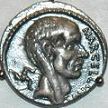


-214 Gracchus the Younger's imperium (consular power) is extended so that he can spend the year in Apulia, with HQ at Beneventum, from which Carthaginian Gen. Hanno unsuccessfully tries to dislodge him. Hannibal's successes against Rome cause Philip V of Macedonia to form an alliance with Carthage, starting the First Macedonian War with Rome (ends -205), with Rome allying with Attalus I of Pergamon; too bad, the Roman fleet in the Adriatic blocks the Macedonians from crossing to Italy to help Hannibal. Hieronymus (b. -230), the last king of Syracuse is assassinated in Leontini, and Syracuse is sieged by the Romans under Marcus Claudius Marcellus (-268 to -208), but it holds out with the brilliant defensive inventions of Alexandrian Museum man and engineer's engineer Archimedes (-287 to -212), incl. giant ship-snatching levers, the catapult (600 ft. range, which can be varied as the ships close in), and a mirror device that sets Roman ships ablaze (Greek Fire), all of which make the Romans think of him as a sorcerer. Chinese emperor Qin Shi Huang Di conquers N Vietnam, dividing it into three commandaries; he then orders construction of the the 1.4K-mi.-long Great Wall of China (Wanli Changcheng) (not really visible from space?) to protect Ch'in from the Huns of C Asia, who have advanced the art of war with ironware, stirrups, the long-range bow, and stiff military discipline. The city of Guangzhou (Canton) (originally Panyu) (modern-day pop. 14M/25M) is founded on the E bank of the Pearl River 75 mi. NNW of Hong Kong and 90 mi. N of Macau by the Qin as a military base for their first unsuccessful invasion of the Baiyue lands of S China; in 226 C.E. after being incorporated into the Han Empire, it becomes the seat of Guang Prefecture, becoming known as the Rice City, City of the Immortals, City of the Five Rams, and City of Flowers. Roman consuls: Quintus Fabius Maximus Verrucosus (4th time) and Marcus Claudius Marcellus (3rd time).
-213 Roman consuls: Gaius Claudius Centho (dictator) and Quintus Fabius Maximus and Tiberius Sempronius Gracchus the Younger. Roman Gen. Marcus Claudius Marcellus sieges Syracuse. Aratus of Sicyon is murdered, and Philopoemen becomes the leader of the aching Achaean League. Chinese emperor Shi Huang Di bans the works of Confucius, and has a massive book-and-scholar BBQ (ends -191). Reutherus (d. -187) becomes king of the Picts (Scotland). Births: Greek skeptic philosopher Carneades the Academic (d. -129) in Cyrene, N Africa; founder of the New Academy; pupil of Diogenes the Stoic, ending up opposing him and denying the existence of absolute truth; teacher of Clitomachus.
-212 The 142nd Olympiad. Publius Licinius Crassus Dives (d. -183) (direct patrilenear ancestor of Marcus Licinius Crassus), a handsome amiable man of distinguished plebeian family and great wealth is surprisingly elected Roman pontifex maximus, serving for life. Syracuse is finally captured and sacked by the Romans under Gen. Marcus Claudius Marcellus, and turned into their govt. seat in Sicily; Archimdedes (b. -287) is killed in Syracuse by a Roman soldier as he is drawing circles in the sand at the beach and telling him "Don't disturb my circles" (Noli tangere circulos meos). Roman consul Tiberius Sempronius Gracchus the Younger is slain by Hannibal's younger brother Mago, and accorded a public funeral by Hannibal. Roman proconsul Quintus Fulvius Flaccus defeats Carthaginian Gen. Hanno, then blockades and sieges Capua in SW Italy, capturing it next year and executing the senior men and selling the rest of the pop. into slavery; after they complain to the Senate, Flaccus' authority is upheld - it was the perfect balance of great taste and weight loss? Hannibal uses inside help to capture Tarentum through a ruse. Scipio the Elder captures Saguntum. Rome secures the support of the Aetolian League and Pergamum in its war against Carthage. Antiochus III of Syria leads an expedition (anabasis) to the East (ends -205), which goes as far as India. Chinese emperor Shi Huang Di orders 460 scholars burned alive in Xian Yang, and banishes his son Prince Fu Su to the Great Wall for appealing for clemency for them. Deaths: Greek super-engineer Archimedes (b. -287) in Syracuse (murdered): "Dos moi pou sto, kai kino ten gen" (Give me a place to stand, and I will move the Earth). Roman consuls: Appius Claudius Pulcher and Quintus Fulvius Flaccus (4th time).

-211 Rome allies with the Aetolian League against Philip V of Macedon. The Carthaginians knock on the doors of Rome ("Hannibal ante portas"), but give up after they fail to take the fortified Roman positions; meanwhile Capua is recaptured by the Romans despite Hannibal's efforts to save it, costing the allegiance of many of his Italian allies. Arsaces I dies, and his son Arsaces II (Artabanus) (d. -185) becomes Arsacid king #2 of the Parthians (until -185). The Roman silver denarius begins to be minted, becoming the standard silver coin; one side always has an emperor, the other side a god. Roman consuls: Publius Sulpicius Galba and Gnaeus Fulvius Centumalus.

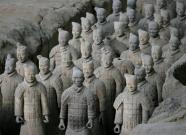

-210 Roman consuls: Quintus Fulvius Flaccus (dictator) and Marcus Valerius Laevinus and Marcus Claudius Marcellus (4th time). Publius Cornelius Scipio the Elder is made Roman cmdr. (gen. extraordinary) of Spain; until the Romans conquered it around 210 B.C.E., Spain is a hodgepodge of tribes from all over the region incl. Celts, Phoenicians, and Greeks. Lycurgus dies, and his son Pelops (-210 to -199) becomes Eurypontid king of Sparta under the regency of the tyrant Machanidas (d. -207). Do the math and save? Chinese emperor Qin Shi Huang Di (Ch'in Shih Huang Ti) (b. -259) dies suddenly on an inspection tour, and his son Hu Hai becomes Qin emperor #2 of China under the name Qin Er Shi Huang Di (Ch'in Er Shih Huang Ti) (Qin Shihuang) (d. -207); to protect him in the afterlife the Terracotta Army of Emperor Qin Shi Huang Di of 7K lifesize figures (soldiers and horses in military rank) (discovered in 1974) is built in the capital of Xi'an in NW China (at the E end of the Silk Road) in the first emperor's memorial; it takes 700K conscripts 38 years to build; it really belonged to his ancestor Empress Xuan, who died in -314?; Qin Er Shi Huang Di orders his daddy's childless concubines to be buried with him (a "very great" number of people); the terracotta army is inspired by Greek art due to the presence of Westerners in China? Architecture: Late in this cent. the Temple of Cybele is built on the Palatine Hill; Vatican City is later built over it - catch the hot chicks behaving badly show? Births: Roman statesman-gen. Tiberius Sempronius Gracchus III (d. -151); has 12 children by wife Cornelius, daughter of Scipio Africanus, all of whom die at an early age except two sons (the famous Gracchi) and a daughter. Roman gen. Quintus Caecilius Metellus Macedonicus (d. -115); eldest son of Quintus Caecilus Metellus; grandson of Lucius Caecilius Metellus; father-in-law of Publius Cornelius Scipio Nasica Serapio and Gaius Servilius Vatia. Deaths: Roman consul-gen. Tiberius Sempronius Longus (b. -260). Chinese Qin emperor #1 Qin Shi Huang (b. -259).

-209 Antiochus III the Great defeats Arsaces II at the Battle of Mount Labus (Lamavu), compels him to pay tribute, and continues his victory tour to parts east. A Roman army led by Marcus Porcius Cato Major (the Elder) (the Wise) (the Censor) (-234 to -149) recaptures Tarentum, again with inside help; it is stripped of its liberty and art treasures, incl. 1.5 tons of gold and the statue of Victory (Nike); 30K Tarantines are sold into slavery. Scipio the Elder suddenly invades and captures New Carthage (Carthago Nova), the Carthaginian capital of Spain. The former Greek town of Genua (Genoa), Italy is destroyed by the Carthaginians, then rebuilt by the Romans for use in their wars against the Ligurians. The Celts are kicked out of Thrace after 70 years (-279) - without a thrace? Chinese PM Zhao Gao (d. -207) plots to seize the throne, forcing emperor Qin Er Shi Huang Di to commit suicide in -207; the first peasant rebellion in Chinese history is led by Chen Sheng and Wu Guang Xing, but they are killed. Mongolian-born Modu Chanyu (Maodun) (-234 to -174) founds the Hun Confederacy (Xiongnu Empire) in the C Asian borderlands of China among the Xiongnu, which threatens the Hans and dominates C Eurasia (until 100 C.E.). Roman consuls: Quintus Fabius Maximus Verrucosus (5th time) and Quintus Fulvius Flaccus (5th time).


-208 The 143rd Olympiad. A severe global environmental downturn occurs; caused by comets? Scipio the Elder defeats Hannibal's brother Hasdrubal Barca (-245 to -207) at the Battle of Baecula in Spain, but fails to stop him from crossing the Pyrenees. Philopoemen (-253 to -183), "the last of the Greeks" becomes gen. of the Achaean League. Antiochus III sieges Euthydemus at Bactra (until -206). The Au Lac Kingdom in Vietnam (begun -258) ends, and the Trieu Dynasty (ends -111) begins when the gov. of one of the three Vietnamese commanderies conquers it and renames it Nam Viet (Vietnam). Roman consuls: Titus Manlius Torquatus (dictator) and Titus Quinctius Crispinus and Marcus Claudius Marcellus (fifth time). Deaths: Roman statesman-gen. Marcus Claudius Marcellus (b. -268).

-207 After he crosses the Alps to help his brother Hannibal, Hasdrubal is surprised, defeated, and slain by the Romans under consul Gaius (Caius) Claudius Nero in the Battle of the Metaurus (Metauro) River on the NE coast of Italy; Hannibal's reinforcements now kaput, he decides to retire to S Italy after learning of the disaster when the severed head of his brother is thrown into his camp - the Roman victory dance? Tyrant (regent) Machanidas of Sparta is murdered at Mantinea by the Achaean League, and the tyrant Nabis (d. -192) becomes regent, then deposes and exiles young Pelops, becoming the last king of Sparta, instituting agrarian reforms (until -204). Qin Er Shi Huang Di commits suicide, and his nephew Zi Ying (d. -206) becomes Qin emperor #3 (last) of China (until Jan. -206), ordering Zhao Gao's death. A guild of poets and actors (incl. Livius Andronicus) is formed to make votive offerings at the Temple of Minerva Medica (Roman vers. of Athena Medicus, based on the Etruscan word Menvra and easily confused with the word "mens" meaning mind, but really first worshiped by the Gauls) on the Aventine Hill in Rome, where they hold a big festival on the Ides of June (June 13), later taking over Mars' festival of the Quinquatrus on Mar. 19-23. Roman consuls: Marcus Livius Salinator (dictator) and Gaius Claudius Nero and Marcus Livinius Salinator.

-206 Hannibal is bottled by the Romans into Calabria in Italy's heel; meanwhile Roman gen. Scipio the Elder wrests Spain from Hamilcar Barca of Carthage at the Battle of Ilipa (Silpia) 10 mi N of modern-day Seville in S Spain, using the new Reverse Cannae formation to outwit them, and conquers Cordoba (Kart-Juba = "city of Juba") (modern-day pop. 326K); Spain now becomes a cash and slave cow for the Barca family of Rome; Scipio founds the city of Italica (5 mi. N of modern-day Seville) nearby for his wounded Roman soldiers, later becoming the birthplace of Roman emperors Trajan and Hadrian; the 8th cent. B.C.E. city Seville on the Guadalquivir River (modern-day pop. 703K/1.5M) is conquered and renamed Hispalis, becoming a market-industrial city, while Italica goes residential; the ancient city of Granada in Bastetania (modern-day pop. 237K) is conquered and renamed Municipium Florentinum Libertanum. The Greeks come to terms with Philip V of Macedonia. Antiochus III raises his siege and makes an alliance with Euthydemus of Bactria. E Numidian (Massylian) king Masinissa (-238 to -149) allies with Rome, and breaks with Hasdrubal, who allies with W Numidian (Masaesyli) king Syphax, who breaks with Rome. The unpopular Ch'in (Qin) Dynasty (founded -221) is overthrown by the Han Dynasty (ends 220 C.E.); Zi Ying is executed; Liu Bang (-256 to -195) and Xiang Yu (-232 to -202) become the first rival emperors of the Xi (Western) Han Dynasty in China under the titles Han Gao Zu and Chu Ba Wang. The Yin Yang School in China is founded by Tsou Yen. Roman consuls: Quintus Caecilius Metellus and Lucius Veturius Philo. Deaths: Spartan king Pelops (in exile).
-205 Philip V of Macedonia signs the Treaty of Phoenice with the Romans, ending the First Macedonian War (begun -215). Scipio the Elder returns to Rome and is elected consul. Antiochus III ends his victory tour (begun -212) by forming an alliance with Euthydemus of Bactria and making a treaty with Indian ruler Sophagaesenus. Lisbon (Olissipo) comes under Roman rule; it is allegedly already 1K-y.-o.; the Celtic Bracarenses tribe controls the area around Braga, Portugal. Roman consuls: Quintus Caecilius Metellus (dictator) and Publius Cornelius Scipio the Elder and Publius Licinius Crassus Dives (d. -183). Plays: Plautus (-254 to -184), Miles Gloriosus (The Vainglorious Soldier) (comedy).
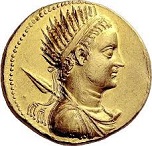


-204 The 144th Olympiad. In summer after building the huge Tessarakonteres ("forty") galley (largest human-powered vessel ever built), Ptolemy IV is murdered along with his wife Arsinoe III (b. -246) in a palace coup led by Philopater's two most powerful ministers Sosibius and Agathocles, who become regents for Ptolemy IV's 5-y.-o. son Ptolemy V Theos Epiphanes (Gr. "god manifest") (-210 to -181), who becomes king #5 of Egypt's 32nd (Ptolemaic) Dynasty, going on to lose most of Egypt's territories in the Aegean and Asia Minor; his coronation is the event described on the Rosetta Stone (-196); too bad, Agothocles soon kills Sosibius, causing the Egyptians and Greeks of Alexandria to rise against him, causing him to hole-up in the palace until his friends mercy-kill him, after which his father Agathocles, mother Oenanthe, and her sisters are dragged out by the mob, stripped naked, and torn limb from limb. Roman gen. Publius Cornelius Scipio the Elder (-236 to -183) invades Africa with an army of 30K men, landing on the coast near Utica; Fabius tries to backstab him in order to cover his own incompetence, and succeeds in restricting him to only the legions that are in Sicily, with 300 of his Spanish army. The seaport of Jaffna in N Ceylon on the Jaffna peninsula is founded by Dravidian Tamils. Roman consuls: Marcus Cornelius Cethegus and Publius Sempronius Tuditanus. Deaths: Greco-Roman poet Livius Andronicus (b. -284); leaves Odysseia, a Latinized version of Homer's Odyssey in Saturnian verse. Egyptian queen (-220 to -204) Arsinoe III (b. -246) in Alexandria (murdered by Agathocles).

-203 The Romans under Scipio the Elder invade Numidia, the back door of Carthage, with the help of E Numidian ally Masinissa, defeating a combined Carthaginian-Numidian army in the Battle of Bagrades (Camp Magni) (Great Plains), burning two Numidian camps full of men, armor, and horses, causing the Carthaginians to send urgent orders to Hannibal to quit Italy and race back by sea to defend them; the Romans sweep down on the 30K-man army (built on a core of 4K Celtiberians) of Carthaginian gen. Hasdrubal Gisco (d. -202) allied with W Numidian Berber king Syphax in the Battle of Utica near modern-day Suq al-Khamis on the Medjerda River in Tunisia; Hasdrubal and Syphax escape; Masinissa falls in love with Syphax's wife (Hasdrubal's daughter) Sophonisba (Sophoniba) (Saphan Baal) and marries her, but Scipio refuses to acknowledge it, insisting that she be surrendered to be used in a triumph in Rome, causing Masinissa to talk her into drinking poison to save herself from the humiliation; the alliance with Masinissa gives the Romans their first superiority in cavalry over the Carthaginians, which proves a big surprise later. Philip V of Macedonia allies with Antiochus III of Syria against Egypt, and begins operations in the Aegean. Roman consuls: Publius Sulpicius Galba Maximus (dictator) and Gaius Servilius Geminus and Gnaeus Servilius Caepio. Births: Greek "The Histories" historian Polybius (d. -118) in Megalopolis, Arcadia; son of Greek politician Lycortas, cavalry cmdr. of the Achaean League, who opposed Roman control of Macedonia and ended up in prison, after which his son is deported to Rome to tutor the two sons of Lucius Aemilius Paulus, becoming friends with Roman gen. Scipio the Younger, a member of the Scipionic Circle, and a true believer in Rome.

-202 On Oct. 19 after an abortive attempt at negotiations by the Romans, Scipio the Elder decisively defeats Carthage and Numidia under Hannibal Barca (-247 to -182) during an eclipse at the Battle of Zama on the Plains of Zama SW of Carthage; Hannibal, having to rely on raw troops, many of whom desert to the Romans, leaving his veterans to be slaughtered, experiences his first defeat, sending word to Carthage: "We have lost not only a battle but a war"; Scipio the Elder gains the surname Africanus. The Macedonian-Syrian treaty results in the Fifth Syrian War between Antiochus III of Syria and Philip V of Macedonia vs. Ptolemy V (ends -200). Philip V of Macedonia grants his ally Prusias I Chlorus of Bithynia the ports of Keios and Myrleia, which he renames Prusias and Apameia (Apamea). Liu Bang defeats Xiang Yu and causes him to commit suicide in Wu Jiang, ruling the Han Dynasty as sole emperor Han Gao Zu. Roman consuls: Gaius Servilius (dictator) and Marcus Servilius Pulex Geminus and Tiberius Claudius Nero.
-201 The Second Punic War (begun -219) ends with a total Roman V; Carthage agrees to allow Rome to annex Spain, to give up all of its naval fleet except 10 vessels, to pay 10K talents, and to agree not to wage war without Rome's permission; never-say-die Hannibal then immediately begins preparing to renew the struggle, amending the constitution, reducing govt. corruption, and fixing city finances; Salamanca becomes a Roman military station on the road from Augusta Emerita (Merida) to Asturica Augusta (Astorga). Philip V of Macedonia is defeated by Theophiliscus of Rhodes, Byzantium, and Attalus I of Pergamon in the Battle of Chios. Seeing their chance, Egyptian natives revolt against boy king Ptolemy V in the Nile Delta. Roman consuls: Gnaeus Cornelius Lentulus and Publius Aelius Paetus. Deaths: Roman poet-playwright Gnaeus Naevius (b. -270); leaves Bellum Punicum, a Latin epic on the First Punic War, plus numerous tragedies and comedies, some adopted from Greek originals and others based on Roman originals.



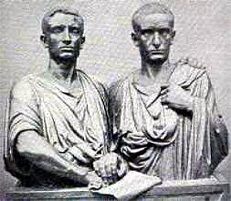



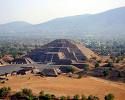
-200 World pop.: 150M-230M. The 145th Olympiad. Roman consuls: Publius Sulpicius Galba and Gaius Aurelius Cotta. Seleucid king Antiochus III of Syria wins the Battle of Panion (Panium) (Paneas) (named after the Greek god Pan) at the foot of Mt. Hermon N of the Golan Heights at the source of the Banias River, chasing the Ptolemies out of the Holy Land (Palestine and S Syria), then seizes Coele-Syria and most of S Asia Minor except Cyprus; the Fifth Syrian War (begun -202) ends after Ptolemy V agrees to marry Antiochus II's daughter Cleopatra I; he doesn't give up his claim to Syria but ends up being assassinated in -180 before he can do anything about it? The Second Macedonian War begins (ends -196) when Philip V refuses a Roman ultimatum to stop attacking Rhodes and Pergamon in Asia Minor, and many Greek states join Rome against him; Attica is ravaged. About this time lead pipe suddenly begins replacing stone and wood aqueducts in Rome. About this time Perigeux (Périgueux) in SW France (modern-day Dordogne, Nouvelle-Aquitaine) is settled by the Petrocorii ("four tribes") from the N, who also establish a camp at La Boissiere until a Roman invasion causes them to flee to the Plain of L'Isle and found the town of Vesunna, leaving Perigeux to the Romans, who Romanize it with ramparts, baths, temples, amphitheatres, and a forum, renaming it Cititas Petrocoriorum by 300 C.E. In this cent. the Indo-European-speaking Venedi (Slavs) inhabit the region SE of the Vistula River and NE of the Carpathian Mts. in the upper basin of the W Bug, Pripet, and Dniester (Dnestr) Rivers, expanding in all directions, eventually (6th cent. C.E.) forming the W Slavs (Czechs, Poles, Slovaks, Moravians), S Slavs (Bulgarians, Serbs, Croats, Slovenes), and E Slavs (Russians, who subdivide into the Great Russians, Little Russians or Ukrainians, and the White Russians or Belorussians). In this cent. the Celtic Helvetii inhabit the W part of Switzerland from the Rhone to the Rhine Rivers, E of the Jura Mts., with capital at Aventicum (modern-day Avenches); Caesar calls them the bravest of the Gallic peoples. About this time the Hypsistarians, who worship the Most High God arise in Greece and Asia Minor (until 400 C.E.); they become gentile wannabe Jews? In this cent. the Moche Culture is founded in the dry deserts of N coastal Peru (until 700), growing maize and cotton, ruled by a wealthy elite dominated by warrior-priests, and becoming the first Am. aborigines to master metallurgy (gold and copper); large irrigation systems, temples, and platforms are built, and royal tombs are built in Sipan (excavated in 1987), incl. a Temple of the Sun (Huaca del Sol) (largest pyramid in the Americas), and Temple of the Moon (Huaca de la Luna) decorated with grotesque images of sacrificial torture-deaths, incl. birds eating living people, crude face lifts for tearing off faces, and other disturbing images; the real thing is done at a nearby site, making the images the first known use of art as documentary? In this cent. the city of Teotihuacan (Teotihuacán) (Nathuatl "birthplace of the gods") is founded in the Valley of Mexico, with a master building plan that is used for the next 6 cents.; the Mexican Sun temple Atetello is built. In this cent. the Nazca Lines (700 C.E.?) on the Pampas de Jumana in Peru are created, featuring drawings of gigantic spiders and other f igures that can only be discerned from high in the air. Potatoes are first grown by the Incas of Peru, Bolivia, and Chile. In this cent. the Iron Age reaches Ulster; agriculture declines for the next four cents. in Ireland. About this time the fair-complected red-haired green-eyed nomadic Turkic Kyrgyz (Kirghiz) (Kyrghyz) ("40 Tribes") people inhabit W Mongolia. In this cent. in the reign (-188 to -141) of Han Dynasty emperor Liu Qi, tea is traded by land over the Silk Road, causing the word "chai" for tea to spread; when the Dutch begin trading tea between Asia and Europe by sea in the 17th cent. C.E., they spread the word "tea". Emperor Han Gao Zu of China makes Chang'an (Changan) in Shaanxi Province near Xi'An at the E terminal of the Silk Road his capital. About this time Roman senator-historian ("the Founder of Historiography") Quintus Fabius Pictor, who fought the Gauls in -225 and also fought in the Second Punic War (-218 to -201), and visited the oracle in Delphi for advice after the defeat at the Battle of Cannae in -216 flourishes, writing a history of the Second Punic War in Greek using Olympiad dating and a Hellenistic style, becoming the first Roman annalist, starting the "ab urbe condita" (from the founding of the city) tradition, making use of the work of Greek historian Diocles of Peparethus, and used as a source by Polybius, Plutarch, Livy, and Dionysius of Halicarnassus; too bad, he is heavily biased on the Roman side, churning out propaganda, as mentioned by Polybius; he dates the founding of Rome as "the first year of the 8th Olympiad", i.e., 747 B.C.E. This cent. is the Golden Age of Roman Drama; too bad, the only plays to survive are 20 by Plautus and six by Terence, all of them fabulae palliatae, comedies based on Greek originals. In this cent. the Etrurian city of Fescennia (Fescennium) N of modern-day Corchiano in C Italy becomes known for vulgar, obscene, and scurrilous verse, causing the term "Fescennine" to be coined - wouldn't you be if you had all them Romans on your butt all the time? About this time the Bichon Frise (Fr. "curly lap dog") dog breed is developed in Spain from the barbet (water spaniel), becoming popular with royalty. Architecture: In this cent. the Ajanta Caves near Bombay, India begin to be richly carved and decorated by Buddhist monks, who use them as temples (until 600 C.E.). Inventions: In this cent. the Romans begin using wax tablets for writing. In this cent. the ox-driven water wheel for irrigation is invented. In this cent. the Carnyx bronx trumpet with an elongated S shape and an open-mouthed boar's or serpent's head bell is produced by the Celts (until 200 C.E.). In this cent. the Batteries of Baghdad are built; used for electroplating? About this time the saddle tree is invented in Asia, a felt-covered wooden frame that redistributes the rider's weight to keep the horse's back from getting sore, without which stirrups won't work. Science: About this time Egyptian-born Greek big brain Eratosthenes of Cyrene (-276 to -194) (head librarian of the Library of Alexandria) determines the circumference of the Earth by measuring noon Sun angles in wells at Syene (Aswan) and Alexandria, coming within 50 mi. of the correct value (approx. 25K mi.), suggesting that the Sun moves around the Earth; he also measures the obliquity of the ecliptic with an error of 7 min. of arc, and maps the course of the Nile River; the southernmost point of Africa is considered the Horn of Africa, taking the Greeks and Romans until the 1st cent. C.E. to discover SE Africa; it takes until 1670 C.E. for Christian Europe to catch back up? In this cent. Illyrian king Gentius allegedly discovers the medicinal (anti-dyspeptic) properties of the gentian (genius Gentiana) plants, found only in high mountain meadows and pastures, with blue or yellow flowers - Ricola? Nonfiction: In this cent. the Apocryphal Book of Tobit (Tobias), Wisdom of Solomon, Book of Baruch, Four Books of Maccabees are probably written, along with Ecclesiasticus (Sirach) by Ben Sira, son of Joshua (Joshua) (Yeshua) (Jesus) ben Sirach, which becomes the earliest witness to a canon of the Jewish books of the Prophets. In this cent. the Hebrew scriptures begin to be trans. into Aramaic, becoming known as the Targumim. In this cent. Greek soothsayer Artemidorus Daldianus (Ephesius) thrives, leaving the 5-vol. Greek work Oneirocritica (The Interpretation of Dreams); not to be confused with the dude who gave Caesar a warning note in -44. In this cent. Greek astronomer Theodosius of Tripolis flourishes, leaving works on the geometry of the surface of a sphere et al. In this cent. Indian guru Patanjali flourishes, compiling the 196 Yoga Sutras, the foundational work of classical (Kundalini?) Yoga. In this cent. the 700-verse Sanskrit Bhagavad Gita (Sans. "Song of the Adorable One") is written, becoming the 6th part of the "Mahabharata"; master archer Arjuna (Sans. "silver, shining") is persuaded by charioteer Lord Krishna to take part in the war between the Pandavas and Kauravas, and kills his unknown brother Karna of the Kauravas. Births: Greek Peripatetic philosopher Critolaus of Phaselis (d. -118); student of Aristo of Ceos.
-199 Ephesus passes to the kings of Pergamon. The Leges Porciae (Porcian Laws), a series of laws granting Roman citizens rights to appeal in capital cases, plus other protections begin to be passed (ends -184). Roman consuls: Lucius Cornelius Lentulus and Publius Villius Tappulus.

-198 Roman consuls: Sextus Aelius Paetus and Titus Quinctius Flamininus. 30-y.-o. Roman gen. Titus Quinctius Flamininus (-228 to -174) is elected consul despite being younger than the constitutional min., and is chosen to replace Publius Sulpicius Galba as CIC of Roman forces for the Second Macedonian War, and he goes on to chase Philip V of Macedon out of most of Greece, then defeat him on June 24 at the Battle of the Aous near modern-day Tepelene, Albania; to keep him from making a quick peace because his consulship is ending, Flamininus is made proconsul to finish the war. Syria becomes part of the Seleucid Empire, and Palestine reverts to Syria; Egypt is out of the Judean picture. Sparta under King Nabis acquires Argos, pissing off the Achaean League, which allies with Rome, and together they set out to conquer the entire Peloponnesus and force Sparta and Messene to join.

-197 The Romans under proconsul Titus Quinctius Flamininus in alliance with the Aetolian League defeat Philip V of Macedonia at the Battle of Cynoscephalae (Dog's Head) in Thessaly between Thermopylae and Pydna, utterly defeating the once-proud Macedonian army and ending its threat in Asia Minor; the Macedonian phalanx holds the Roman legions back until 20 maniples fall upon their rear after the Roman elephants rout the left flank; Flamininus goes on to direct the political affairs of the Greek states from Elateia until -194. Attalus I dies, and Eumenes II Soter ("savior") (-197 to -159) becomes king of Pergamon (Pergamum) (Pergamos) in W Asia Minor, expanding the Library of Pergamon, building the #2 library in the world after Alexandria (200K vols.), improving the preparation of parchment, also building a great altar to Zeus; Antiochus III begins campaigning in Asia Minor and Thrace, conquering the S coast of Asia Minor and making Ephesus his second capital, which causes Eumenes II to complain to Rome. The Romans establish the province of Hispania Citerior (Nearer Spain) along the E coast (modern-day Valencia, Catalonia, Aragon), with capital at Tarraco (modern-day Tarragona), and Hispania Ulterior (Further Spain) in the S (modern-day Andalusia), with capital at Curdoba (modern-day Cordoba), sparking the Iberian Revolt (ends -195); the Romans put down a revolt of the Celtic Turdetani tribe in the Baetis (modern-day Guadalquivir) River Valley in S Farther Spain (Hispania Ulterior), along with other rebel tribes in Nearer Spain (Hispania Citerior), giving them control of a band along the S and E coasts. The seaport of Salernum (modern-day Salerno) (modern-day pop. 133K) in SW Italy on the Gulf of Salerno (29 mi. ESE of Naples) is founded by the Romans. Roman consuls: Gaius Cornelius Cethegus and Quintus Minucius Rufus.

-196 The 146th Olympiad. Okay, bend over and close your eyes? In July Greek-speaking Roman gen. Titus Quinctius Flamininus, the man who kicked Philip V's Macedonian butt gives a memorable Speech at the Isthmian Games in Corinth, proclaiming the "freedom of the Greeks", which causes him to become a great hero to the dumb blondes, and gets his mug engraved on coins, plus deification in some Greek cities; in reality Rome is assuming the protectorate of the Greek states, and is mainly backing the liberty of the aristocrats; the Second Macedonian War (begun -200) ends with Philip V forced to relinquish his conquered Greek cities, surrender his fleet, and pay a 1K-talent indemnity, but his kingdom is left intact as a buffer state between Greece and Illyria, pissing off the Achaean League; Macedonia becomes a Roman ally subject to Roman control of foreign affairs; on the way back to Rome Flamin' Flamininus plunders Sparta and returns with 1.2K freed slaves who had been taken captive in the Second Punic War. Roman praetor Marcus Acilius Glabrio suppresses a slave revolt in Etruria. The Etruscan city of Felsima (modern-day Bologna) is conquered by the Gallic Boii. The black basalt Rosetta Stone is cut, containing parallel texts in Egyptian Hieroglyphics, Egyptian Demotic, and Greek, celebrating the coronation of Ptolemy V Epiphanes, who is married to Cleopatra I, daughter of Antiochus II; discovered in July 1799 by the French under Napoleon. Roman consuls: Lucius Furius Pupurio and Marcus Claudius Marcellus.

-195 Roman consuls: Lucius Valerius Flaccus and Marcus Porcius Cato the Elder. Marcus Porcius Cato the Elder (-234 to -149) becomes Roman consul, and is given command of the whole pesky Spanish peninsula, putting down a rebellion in the NW and lower Ebro River Valley before taking on the Turdetani and Celtiberian tribes in the S. Ptolemy V Epiphanes comes of age, and suppresses the native revolts. Sparta loses Argos and much of Laconia, and is placed under the supervision of the Achaean League. After his war preparations piss-off the Romans, causing them to demand his surrender, Hannibal flees to Asia to the court of Antiochus III the Great of Syria - yo, Adrian?
-194 Roman consuls: Publius Cornelius Scipio Africanus the Elder and Tiberius Sempronius Longus. All Roman forces leave Greece. Marcus Porcius Cato returns to Rome, leaving two praetors in charge of Farther and Nearer Spain; too bad, the pesky native tribes keep rebelling for the next 175 years; meanwhile an incursion of Lusitanians (Lusitani) on the Betis Valley is checked by the troops of Scipio Nasica - guys that sweat a lot need a backup plan? After Eumenes II appeals to Rome for help against Seleucid king Antiochus III, Rome agrees to resolve Pergamon's dispute with Syria. Pozzuoli (on the Bay of Naples) becomes a Roman colony. Han Gao Zu (Liu Bang) dies, and weak 17-y.-o. Han Hui Di (-211 to -188) becomes Xi Han emperor #3 of China (until -188); Queen Han Lu Hou takes over the admin., and kills Prince Zho (Zhao) and his concubine Qi. The best places in Roman theaters are given to the senators. Births: Roman comic playwright Publius Terentius Afer (Terence) (d. -159) in Carthage; actor Lucius Ambivius Turpio performs in all of his plays. Deaths: Greek #1 scientist Eratosthenes of Cyrene (b. -276); becomes blind, then starves himself to death; leaves a Map of the World from his researches in the great library of Alexandria.
-193 Roman consuls: Lucius Cornelius Merula and Quintus Minucius Thermus. The Celtic Boii of the Po Valley are defeated by the Romans under consul Lucius Cornelius Merula in the Battle of Mutina (near modern-day Modena) in N Italy, losing their capital of Bononia (Bologna), after which a large portion of them leave Italy and head back to Bohemia; too bad, since the V cost the Romans too much, the Senate refuses Merula a triumph; Bononia is later resettled by 3K families led by consuls Lucius Valerius Flaccus, Marcus Atilius Seranus, and Lucius Valerius Tappo, becoming one of the leading Roman cities. The Celtic (Cimbri?) Lusitani (Lusitanians) (Belitanians) tribal confederation in W coastal Spain between the Douro and Tagus Rivers (known for their women warriors) begin resisting the Romans. Architecture: The Porticus Aemilia, a warehouse in Rome's new dockyards is built S of the Aventine Hill by Marcus Aemilius Lepidus and Lucius Aemilius Paulus, becoming the first use of Concrete, based on pozzolana, volcanic stone mortar from the new Roman colony of Pozzuoli in the Bay of Naples (two parts pozzolana to one part lime); the addition of seawater makes it stronger over time?
-192 The 147th Olympiad. Roman consuls: Lucius Quinctius Flaminius (d. -170) and Gnaeus Domitius Ahenobarbus. After gen. Titus Quinctius Flamininus goes to Syria to negotiate with Antiochus III, telling him not to interfere with the Greek states, and is told to fork off (Antiochus will leave Greece alone only if Roman does ditto), Antiochus III (aided by Hannibal) crosses over to Greece to aid the Aetolians, causing Rome to declare war (ends -189). King Nabis is assassinated, and Laconicus becomes the last (Eurypontid) king of Sparta; the Spartans are forced into the Achaean League by Rome, and begin to vanish from history, but first they must fight another war with Rome?; Messene and Elis join the Achaean League, giving it control of the entire Peloponnesus. The Aetolians declare war on Rome, and Antiochus III sends a small force to aid them, while the Achaeans and Macedonia support Rome.
-191 Roman consuls: Publius Cornelius Scipio Nasica and Manius Acilius Glabrio. The Romans under gens. Manius Acilius Glabrio and Flamininus defeat Antiochus III at the Battle of Thermopylae on the border between Thessaly and Boeotia, and send him back to Asia; Glabrio begins operations against the Assholians, er, Aetolians. Rome conquers Cisalpine Gaul, leaving the Celts with Transalpine Gaul - they fought for their free-ee-dom? The Roman calendar, which is 4 mo. ahead of the seasons is adjusted. Arsaces II dies, and in 185 Arsaces III Phriapatius (Priapatius) (d. -170) becomes king #3 of Parthia (until -170). Emperor Hui Dui ends the ban on the works of Confucius(begun in -213) - no Huey and Duey for Youey? Plays: Plautus (-254 to -184), Pseudolus; debuts at the Megalesian Festival.


-190 Roman consuls: Lucius Cornelius Scipio Asiaticus and Gaius Laelius. A Seleucid fleet led by Hannibal is defeated by a Rhodian fleet (allied with the Romans) at the Battle of the Eurymedon River. Antiochus III's Syrian fleet is defeated at the naval Battle of Myonnesus, after which in Dec. the Romans under Lucius Cornelius Scipio Asiaticus, brother of Publius Cornelius Scipio Africanus (who serves as his legate) become the first Roman army to invade Asia Minor, defeating the great composite army led personally by Antiochus III at the Battle of Magnesia (between Pergamon and Ephesus in W Lydia), which bankrupts and crushes Syria; the Aetolian League's power vanishes because it had allied with him; Lucius Cornelius Scipio is awarded the surname Asiaticus; after being captured by pirates in -192, Antiochus III of Syria releases Lucius Cornelius Scipio, youngest son of Scipio Africanus Major without ransom before the Battle of Magnesia, causing him trouble with the Senate in -188. Glabro celebrates his triumph against the Macedonians, then runs for censor but withdraws after accusations of embezzlement. Whiny Eumenes II of Pergamon gains control of Ephesus, and it remains in Pergamene control until -133. The defeat of Antiochus III allows Bactrian king Euthydemus and his son Demetrius to begin expanding into the Indus Valley. Pantaleon becomes Greek king of Bactria and India (until -180), becoming the first Greek king to strike Indian coins. Maadikarib Raydan (d. -175) becomes the last king of Haram in S Arabia. Aristo of Ceos (b. ?) dies, and his pupil Critolaus of Phaselis (-200 to -118) becomes dir. #5 of the Lyceum in Athens. The Hellenistic city of Hierapolis in Phrygia in SW Asia Minor is founded by Pergamon king (since -197) Eumenes II on the site of a hot springs, becoming a spa and retirement site. Art: About this time the Winged Victory of Samothrace is carved for the prow of a ship (by Pythokrotos of Lindos?); rediscovered in Apr. 1863 C.E. by French amateur archeologist Charles Champoiseau. Births: Greek #1 astronomer (founder of trigonometery) Hipparchus of Nicaea (d. -120) in Nicaea, Bithynia (modern-day Iznik, Turkey); discoverer of the precession of the equinoxes by observing the bright star Spica in Virgo. Deaths: Greek mathematician Apollonius of Perga (b. -262).
-189 Roman consuls: Marcus Fulvius Nobilior and Gnaeus Manlius Vulso. Exorbitant taxes cause insurrections in Upper Egypt. Roman consul (praetor in -193)Marcus Fulvius Nobilior breaks the power of the Aetolian League and makes the Aetolians into subject allies of Rome, celebrating a magnificent triumph; poet Ennius accompanies him, writing a play about the capture of Ambracia, pissing-off Cato the Censor, who accuses him of compromising the dignity of a Roman gen.; Nobilior goes on to become a fan of Greek art and culture, introducing many masterpieces into Rome incl. The Muses by Zeuxis of Ambracia.

-188 The 148th Olympiad. Roman consuls: Marcus Valerius Messala and Gaius Livius Salinator. The Peace (Treaty) of Apamea causes Antiochus III to pay a large indemnity and surrender his fleet along with Asia Minor, which is divided between Pergamon and Rhodes; Armenia (under Artaxias) and Bactria begin to break away; Antiochus III agrees to turn over Hannibal, but he flees again to the protection of Prusias I Chlorus of Bithynia; Antiochus III's ally Ariarathes IV of Cappadocia obtains favorable peace terms because his daughter Stratonice is betrothed to Roman ally Eumenes II of Pergamon. The jealous Roman Senate, egged on by Marcus Porcius Cato the Censor eggs on two tribunes to prosecute Lucius Cornelius Scipio Asiaticus of misappropriating moneys from Antiochus, and his bro' Scipio Africanus the Elder defends him by tearing up his ledgers and flinging them in the senators' faces, reminding them that his bro' had paid 200K sesterces into the treasury, and crying that they were trying to frame him; nevertheless they go on and prosecute and condemn him, confiscate his property, and try to throw him in prison, which Africanus answers by rescuing him by force. The Spartans revolt and are conquered by the Achaean League under Greek gen. ("the last of the Greeks") Philopoemen (-253 to -183), "the last of the Greeks". Han Hui Di (b. -211) dies, and Han Lu Hou (d. -179) becomes Xi Han emperor #4 of China; Queen Lu Hou stays in charge of the admin., and appoints Chen Ping and Shen Shi Qi as her left and right ministers.

-187 Roman consuls: Marcus Aemilius Lepidus and Gaius Flaminius; Tiberius Sempronius Gracchus III (Major) (-210 to -151), who served on Scipio Africanus' staff in Greece in -190 becomes tribunus plebis (tribune of the people). Antiochus III dies, and his son Seleucus IV Philopater (Philopator) ("father-lover") (-222 to -175) becomes king of Syria (until -175), going on to slowly rebuild its strength. Eumenes II of Pergamon begins a war with Prusias I of Bithynia (ends -183). Reuthra (Rewthra) (d. -173) becomes king of Scotland. Architecture: The Aemilian Road (Way) (Via Aemilia) in NC Italy is built by consul Marcus Aemilius Lepidus, running from Ariminum (Rimini) NW to Placentia (Piacenzia), and later extended across the Po River to Mediolanus (Milan), also to Augusta Praetoria, Segusio, and Aquileia; the Via Flaminia from Rome connects with it at Ariminum. Births: Syrian king Demtrius I Soter (d. -150); son of Seleucus IV Philopater. Greek Stoic philosopher Panaetius of Rhodes (d. -109); mellows Stoicism up into Middle Stoicism.
-186 The Roman Senate investigates and outlaws the cult of Bacchus and the festival of Bacchanalia, associated with those wild tattooed warlike Thracians with dyed hair. Roman consuls: Spurius Postumius Albinus and Quintus Marcius Philippus.
-185 Roman consuls: Appius Claudius Pulcher and Marcus Sempronius Tuditanus. Publius Cornelius Scipio Africanus the Elder is accused of a slew of charges by tribune Marcus Naevius, but on Oct. 18 launches into a eulogy of his achievements on the first day of his trial, then on the 2nd day reminds the good citizens that it is the anniv. of the Battle of Zama, and summons them to follow him to the Capitol to give thanks to the gods and pray that Rome might never lack citizens like himself, which kills the trial; he then passes up the chance to become the first Caesar (dictator for life perhaps?), and beats a strategic retreat into voluntary exile to his country seat at Liternum in Campania. About this year after assassinating the last Mauryan emperor Brihadratha Maura, the Shunga Empire in E-C India (ends -75) is established by Brahmanist About this year Maurya gen. Pushyamitra Shunga (-185 to -149), with capital at Pataliputra; he goes on to cruelly persecute Buddhist monks while performing numerous Ashvamedha (kill or capture my accompanied wandering horse) campaigns to legitimize his rule; the empire goes on to persecute Buddhists and give a big V to the Brahmin priests of Hinduism (named after the Indus River), who ingrain the caste system so deeply that nobody can ever get rid of it? - you stink? Births: Greek Seleucid emperor (-161 to -150) Demetrius I Soter (Gr. "savior") (d. -150); son of Antiochus V Eupator and Laodice IV; husband of Laodice V. father of Demetrius II Nicator and Antiochus VII Sidetes. Roman gen.-statesman Scipio Africanus the Younger (Publius Cornelius Scipio Aemilianus Africanus Numantinus) (d. -129); younger son of Lucius Aemilius Paulus Macedonicus; adopted by his kinsman by marriage Publius Cornelius Scipio, son of Scipio Africanus the Elder, becoming his grandson by adoption.
-184 The 149th Olympiad. Roman consuls: Publius Claudius Pulcher and Lucius Porcius Licinus. Philip V of Macedonia, after reorganizing his finances, opening mines, and defending his N frontiers gets tired of Roman interference based on phony complaints by neighboring states, causing him to go paranoid and begin a campaign to extend his power in the Balkans (until -183). Architecture: Basilica Porcia (burns down in -52), the first basilica and courthouse in the Roman Forum is built by Cato the Elder, beginning the "colonnaded" look, with the Basilica Aemilia (built in -179), Basilica Sempronia (built in -169), and Basilica Opimia (built in -121) (near the Temple of Concord) soon following. Deaths: Roman playwright Plautus (b. -254), leaving the play The Menaechmi (The Twin Brothers).

-183 Roman consuls: Marcus Claudius Marcellus and Quintus Fabius Labeo; Lucius Julius Caesar is elected praetor, and assigned the province of Cisalpine Gaul, with the task of preventing the Transalpine Gauls from building on the site of the seaport of Aquileia, (later Algar) at the head of the Adriatic Sea (25 mi. NW of Trieste), where in -181 a Roman colony is founded as a strongly fortified outpost against the Illyrians, becoming the "second Rome", a center of trade between N and S Europe, with its pop. reaching 500K by the 1st cent. C.E.; too bad, Attila the Hun wastes it in 452 C.E., causing its survivors to hightail it to the lagoons and found Venice, and it ends up with a pop. of only 3K by the late 20th cent. Pisa and Parma become Roman colonies. Philopoemen (b. -253) is captured and poisoned to death by Messenian rebels, and is succeeded as strategos of the Achaean League by Callicrates (d. -149), who is subservient to Rome and allows Sparta to get back on its feet. Pergamon wins its war with Bithynia (begun -187), then begins a war with Pharnaces I of Pontus (d. -169), son of Mithridates III (ends -179), allying with Ariarathes IV of Cappadocia; the Romans send Titus Quinctius Flamininus to demand that officially neutral Prusias I of Bithynia capture Hannibal in order to send him to Rome, causing him to commit suicide next year to avoid being taken POW. Mutina (modern-day Modena) in the Po Valley of Italy a few mi. N of the start of the Apennines (orginally founded by the Etruscans) is refounded as a Roman colony and military base by Marcus Aemilius Lepidus. Architecture: The New Clodian Road (Via Clodia Nova) between Lucca and Florence is built by consul Marcus Claudius Marcellus. Deaths: Greek hero Philopoemen (d. -253) in Messene (poisoned); the last real Greek worthy of the name, according to a Roman. Roman gen. Publius Cornelius Scipio Africanus the Elder (b. -236).
-182 Prusias I Chlorus dies, and his son Prusias II Cynegus "the Hunter" (-182 to -149) becomes king #5 of Bithynia. Roman consuls: Gnaeus Baebius Tamphilus and Lucius Aemilius Paullus. Deaths: Carthaginian gen. Hannibal (b. -247); poisons himself in the Bithynian village of Libyssa (modern-day Gebze) in NW ASia Minor
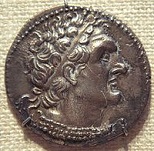
-181 Ptolemy V Epiphanes (b. -210) is assassinated, and his 6-y.-o. son Ptolemy VI Philometor ("loving his mother") (-185 to -145) becomes king #6 of the Egyptian 32nd (Ptolemaic) Dynasty, with his mother Cleopatra I Syra (-204 to -176) as regent. Gracchus III becomes Roman praetor in Spain, going on to bring the wild Celtiberian tribes in C Spain under Roman control. Philip V of Macedonia makes another try to extend his power in the Balkans. Prusias II of Bithynia and Eumenes of Pergamon war with Pharnaces I of Pontus (ends -179). Another "sumptuary law" is passed by the Roman censors to reprimand the obscene consumption of the wealthy. Roman consuls: Publius Cornelius Cethegus and Marcus Baebius Tamphilus.
-180 The 150th Olympiad. The Lex Villia Annalis sets min. ages for Roman magistracies. Bactrian Greeks capture Taxila and Gandhara from the Magadha Kingdom in India. The Etruscan town of Lucca on the Serchio River near the W coast becomes a Roman colony. Roman consuls: Aulus Postumius Albinus and Gaius Calpurnius Piso. Births: Roman politician Publius Licinius Crassus Dives Mucianus (d. -130); son of Publius Mucius Scaevola; brother of Publius Mucius Scaevola (d. -115); adopted by a son of Publius Licinus Crassus Dives (d. -183). Roman satirist (first) Gaius Lucilius (d. -103) in Suessa Aurunca, Compania; becomes friends with Scipio the Younger, serves in the Numantine War (-143 to -134), and becomes a member of the lit. circle of Scipio the Younger; inventor of Roman poetic satire, which is developed by Horace, Persius, and Juvenal.
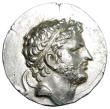
-179 Roman consuls: Quintus Fulvius Flaccus and Lucius Manlius Acidinus Fulvianus. Philip V of Macedonia dies before he can extend his power in the Balkans, and his son Perseus (-212 to -166) becomes the last Antigonid king of Macedonia (until -168); since he had persuaded Philip to execute his pro-Roman brother Demetrius, Eumenes II of Pergamon lays charges against him in Rome, and the handwriting is on the wall? Pergamon wins its war with Pontus (begun -183). Han Lu Hou dies, and after the Lu Clan Extermination, prince of Dai Han Wen Di (Liu Heng) (d. -157) (son of Consort Bo, who has no powerful relatives and is known for humility and thoughtfulness) becomes Xi Han emperor #5 of China, appointing Chen Ping (d. -178) and Zhou Bo (d. -169) as his left and right ministers. Architecture: The Basilica Aemilia in the Roman Forum is built. The Pons Aemilius, the first stone bridge in Rome is begun (finished in -142), later becoming the Ponte Rotto, the oldest Roman stone bridge in Rome. Births: Chinese writer-poet-musician-offical Sima Xiangru (d. -117); developer of the Fu form, which becomes the std. during the Han Dynasty (-206 to 220).
-178 Roman consuls: Marcus Junius Brutus and Aulus Manlius Vulso.
-177 Gracchus III becomes plebeian consul, and crushes a revolt in Sardinia, returning to Rome to celebrate a triumph with a large number of captive (canned?) sardines. Mutina is sacked by the Ligurians, and the Romans go on to rebuild it and turn it into a key center of Cisalpine Gaul on the crossroads between the Via Aemilia and the Via Verona. Roman consuls: Gaius Claudius Pulcher and Tiberius Sempronius Gracchus III.
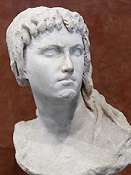
-176 The 151st Olympiad. Cleopatra I dies; Eulaeus and Lenaeus become Ptolemy VI's guardians; his sister Cleopatra II (-185 to -116) becomes his wife, going on to have children Ptolemy Eupator, Cleopatra Thea, Berenice, and Cleopatra III. The Yueh-Chi people of NW China are driven over the Himalayas by the Xiongnu. Roman consuls: Gnaeus Cornelius Scipio Hispallus and Quintus Petillius Spurinus.

-175 Seleucus IV Philopater is murdered by his minister Heliodorus, and his younger brother Antiochus IV Epiphanes ("god manifest") (-215 to -163) becomes king of Syria, soon instituting a policy of "syncretism" which forces all his subjects to abandon their beliefs and customs and become Hellenized, while becoming friendly to Rome; the Jews take it particularly soft, er, hard; Jewish high priest Onias III travels to Antioch to face the accusations of Simon ("listening intently") the Tobiad, overseer of the Jewish temple, only to find out about the change in rule; Onias III is outbid by brother Jason for the position of high priest, and Jason returns to Jerusalem to begin his Hellenization program - if you have a problem with the show, talk to me? Roman consuls: Publius Mucius Scaevola and Marcus Aemilius Lepidus.
-174 Roman consuls: Spurius Postumius Albinus Paullulus and Quintus Mucius Scaevola. Deaths: Roman Gen. Titus Quinctius Flaminius. Hun founder Maodun (b. ?).
-173 After Cato the Elder criticizes them, Greek Epicurean philosophers Alcaeus and Philiscus are banished from Rome. UFOs in the form of a "great fleet in the sky" are observed in Lanuvium 20 mi. SE of Rome. Thereus (d. -161) becomes king of the Picts in Scotland. Roman consuls: Lucius Postumius Albinus and Marcus Popillius Laenas.
-172 The 152nd Olympiad. The Third Macedonian War begins (ends -167) when Perseus of Macedonia declares war on Rome and defeats a Roman army. Onias Menelaus, brother of Simon the overseer of the Temple outbids Jason, brother of Onias III for the Jewish priesthood (until -161). Roman consuls: Gaius Popillius Laenas and Publius Aelius Ligus. Births: Greek Seleucid emperor (-163 to -161) Antiochus V Eupator (Gr. "of a good father") (d. -161).


-171 Roman consuls: Publius Licinius Crassus and Gaius Cassius Longinus. Phraates I dies, and his brother Mithradates (Mithridates) I (-195 to -132) becomes king #6 of Parthia (until -132), going on to establish Parthia as a world power. While Demetrius is campaigning in the Punjab, Eucratides I (the Great) (-171 to -145) declares himself king of Bactria (until -145).
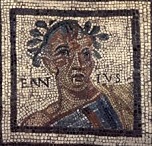
-170 Roman consuls: Aulus Hostilius Mancinus and Aulus Atilius Serranus. The Sixth Syrian War (ends -168) begins when Ptolemy VI's regents launch an invasion of Antiochus IV's realm in Syria. Arsaces III Phriapatius dies, and Arsaces IV, great-grandson of Arsaces I becomes king #4 of Parthia (until -168). About this time Rome begins paving its streets and founding public bakeries; meanwhile the wealthy begin to hide their obscene luxury in suburban villas in Greek Campania. The Nubian language of Meroitic begins to be written; still undeciphered? The Hellenistic city of Antiochia ad Cragum (Antiochia Parva) (Antiochetta) in S Asia Minor on Mt. Cragus (Cragos) on the Mediterranean coast near modern-day Guney, Turkey is founded by Antiochus IV Epiphanes, becoming home to the largest Roman mosaic found in Turkey in modern times. Births: Roman dramatist Lucius Accius (d. -87) in Pisaurum, Umbria; son of a freedman. Deaths: Roman poet Quintus Ennius (b. -239); leaves The Epicharmus, The Euhemerus, The Hedyphagetica, The Saturae, and The Annales, an 18-vol. nat. epic written in Greek dactylic hexameter (of which only 600 lines survive), starting a trend for Roman writers, who give up the lamer native Saturnian meter: "The idle mind knows not what it wants."
-169 Roman consuls: Quintus Marcius Philippus and Gnaeus Servius Caepio. The Lex Voconia, introduced by Quintus Voconius Saxa and supported by Cato the Elder is passed, limiting the amount a Roman woman can inherit in a will; by the end of the cent. propertied women get around the law by selecting a "guardian" as their puppet. Architecture: Gracchus III becomes Roman censor, and builds the Basilica Sempronia near the Roman Forum on land once owned by Scipio Africanus, becoming the 3rd of four basilicas there incl. Basilica Portia, Basilica Aemilia, and Basilica Opimia; in -54 Julius Caesar demolishes it to build his Basilica Julia.
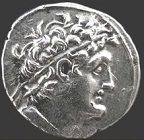
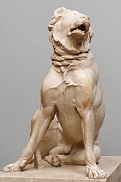
-168 The 153rd Olympiad. Roman consuls: Lucius Aemilius Paullus and Gaius Licinius Crassus. On June 22 King Perseus of Macedonia is defeated by the Romans under consul Lucius Aemilius Paulus Macedonicus (-229 to -160) at the Battle of Pydna on the W side of the Gulf of Thessaloniki, and the city of Thessalonica on the E side surrenders; the battle that proves that the Roman legion is superior to the Macedonian phalanx?; Macedonia falls into Roman hands; the Molossian city of Epirus is sacked; the bronze Molossian Guard Dog Statue is brought to Rome, and praised by Pliny until it is lost in 69 C.E., but a 2nd cent. C.E. stone copy survives, becoming known as the Jennings (Duncombe) (Alcibiades) Dog after it is discovered by Henry Constantine Jennings (1731-1819) in the workshop of Italian sculptor Bartolomeo Cavaceppi (1716-99) in 1753; the Roman Senate's settlement incl. dividing the kingdom into four republics that are heavily restricted from trade or intercourse with each other and with Greece, the deportation of all royal officials, and permanent house arrest of Perseus, breaking the back of the Macedonian Antigonid Dynasty and giving Rome permanent ascendancy in the Hellenic world; Paulus is awarded the title Macedonicus; Paulus' son Scipio the Younger fights by his side at Pydna; a purge of allegedly anti-Roman citizens causes 300K to be deported. That's why I say, hey man, nice shot? On Dec. 25 (winter solstice) violence begins in Jerusalem when the Syrians dedicate the Temple of Jehovah to the worship of Zeus Olympius by order of Antiochus VI Epiphanes, with an altar to Zeus set up on the high altar of Jehovah, causing the Jews to go nonlinear and revolt, stuffing their Hellenization program up their butts, causing Antiochus IV Ephiphanes to respond with ruthless suppression, overrunning Jerusalem and building the Acra Fortress, whose ruins are identified in 2015 C.E. Antiochus IV invades Egypt, and Ptolemy V's cowardice in the war causes the regents to put his younger brother Ptolemy VII Neos Philopator ("father lover") (d. -145) on the throne to rule jointly with him and his sister-wife Cleopatra II; despite his friendliness toward Rome, the Romans "draw a line in the sand" and force Antiochus IV to withdraw, ending the Sixth Syrian War (begun -170); Antiochus IV makes young Ptolemy VI his ward. Arsaces IV dies, and Phraates I (Arsaces IV?) (d. -165), son of Priapatius becomes king #5 of Parthia (until -165), getting mentioned in 2 Maccabees 5:8. Aretas I (d. -140) becomes king of the Nabataeans in modern-day S Jordan, with capital at the rock-walled caravan city of (Sela or Selah) Petra, which features the Treasury, the Monastery, and a huge open platform 1/2-mi. to the S; the city is abandoned in the 7th cent. C.E. After this year the old Roman land tax is no longer levied in Italy, and the only revenue derived from it is from the state domains and through a tax on overseas imports, the revenues from the province of Asia now defraying the expenses of the Roman state; the rich in Rome get richer by squeezing out the free farmers with usury, and running their farms with slave labor to undercut them; Italy slowly turns to sheep and cattle raising, and the uprooted farmers flood the towns, particularly Rome.
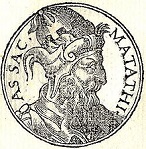

-167 Roman consuls: Quintus Aelius Paetus and Marcus Junius Pennus. The Third Macedonian War (begun -172) ends with Alexander the Great rolling over in his tomb; the Macedonian (Antigonid) kingdom ends, and Macedonia becomes four autonomous districts, each with its own capital city (Amphipolis, Thessalonica, Pella, Pelagonia), paying a moderate yearly tribute; Perseus and his two sons are hauled into Rome as trophies; Roman world domination begins; Macedonians are sold as slaves in Rome, bringing $50-$75 for a male "Alexander" and up to $1K for a female "Olympias". Here they come to save the day? Antiochus IV Epiphanes with the help of his Jewish elites despoils the Jewish Temple and its treasury, sets up a military garrison (the Akra) near the temple, abolishes the observance of traditional Jewish law, decrees that Greek altars be set up in Jewish towns, and establishes a new order of worship called the Cult of the Lord of Heaven, which sacrifies a pig to Zeus on the altar of the Jewish Temple and corrupts the youth with naked uncircumcized gymnastics; just when things look darkest, a hero arose to help them fight for their free-ee-ee-dom to use the good ole Jewish izmel on their boys' dongs, a Jewish Cohen (priest) of Modein (Modiin) (18 mi. NW of Jerusalem), of the macabre line of Hasmon named Mattathias (Mattathiah) Maccabeus (ben Johanan) (the Hasmonean) (d. -165) and his five sons (eldest to youngest) Johanan Maccabeus, Simon Maccabeus (d. -134), Judas Maccabeus (the Hammer) (d. -160), Eleazar Maccabeus (d. -162), and Jonathan Maccabeus (Apphus, Dissembler, or Diplomat) (d. -143), collectively known as the Maccabees (Aramaic "maqqaba" = hammer) (AKA Hasmoneans) balk at Syrian syncretism, kill a Hellenistic Jew who is about to sacrifice to an idol in Mattathias' place, and flee to the mountains, beginning a guerrilla war for the liberation of Judea from the Seleucids and the restoration of the true inch-shorter-and-proud-of-it Jewish religion (ends -163); Judas Maccabeus is designated by his dying father as the leader of the guerrilla forces; the Oniad priest Jason seeks asylum in the Jewish community at Sparta following his failed coup; the Maccabees send ambassadors to Rome seeking an alliance against the Syrians, relying on their contacts with Roman Jews. The Romans kill 500 rebels in Aetolia, and deport 1K hostages from the Achaean League to Italy, incl. Greek historian Polybius (-203 to -118). The Romans make the Greek sacred island of Delos in the Cyclades (birthplace of Artemis and Apollo, where no human is allowed to be born or die) a free port, weakening Rhodes.
-166 Roman consuls: Gaius Sulpicius Galba and Marcus Claudius Marcellus. Perseus, last Antigonid king of of Macedonia (b. -212) dies in captivity in Rome after learning Latin and becoming a notary public. Plays: Terence (-195 to -159), Andria; performed at the Ludi Megalenses in Rome; in 1476 it is performed in Florence, Italy, becoming the first of his plays to be performed in post-antiquity. Deaths: Roman comic poet Caecilius Status (b. 220) in Rome. Macedonian Antigonid king (last) Perseus (b. -212) in Rome (in captivity).

-165 Roman consuls: Titus Manlius Torquatus and Gnaeus Octavius. The Yueh-Chi settle in the Oxus Valley. The Maccabees (Hasmoneans) under Jewish gen. Judas (Judah) Maccabeus defeat four larger Syrian armies in a row with only a few thousand followers, and in Dec. recapture Jerusalem from the Syrians, remove the "horrible abomination" (a dangly uncircumcized statue of Zeus), purify the Temple with a red heifer, and on Dec. 25 rededicate it to Big J (Jehovah) with festivities lasting eight days, giving birth to the 8-day Jewish holiday of Hannukah (Hanukkah) (Chanukah) (John 10:22) (AKA Festival of Lights) after they could only find one cruse of pure olive oil to bless for the ritual, but Big J gives them a miracle and it burns for eight days; the Maccabees rule Palestine until -37. Plays: Terence (-195 to -159), Hecyra (The Mother-in-Law); its debut is cancelled after a rumor that it features boxers and a tightrope walker; in -160 it is finally performed after an attempt to stage it is interrupted by gladiator fans. Births: Chinese royal astrologer (-140 to -110) and historian Sima Tan (Ssu-ma T'an) (d. -110) in Longmen (modern-day Hejin, Shanxi); first person to write Chinese history, passing his unfinished work to his son Sima Qian (-145 to -86).

-164 Roman consuls: Aulus Manlius Torquatus and Quintus Cassius Longinus. The 154th Olympiad sees Leonidas of Rhodes (b. -188) win all three foot race events (incl. the 200m stadion, the 400m diaulos, and the hoplitodromos race in armor, the first ever) in this and the next three straight Olympics, winning 22 gold medals, er, olive wreaths, nine in relays and 12 individual medals, a record which isn't surpassed until Aug. 11, 2016 by Am. swimmer Michael Fred Phelps II (1985-); "the most famous runner" (Pausanias); "He had the speed of a god" (statue of him in Rhodes) - pass the olive oil? A Syrian army of 100K advances to Jerusalem and is repulsed by the Jewish army under Gen. Judas Maccabeus at the Battle of Beth-Zur, causing Antiochus IV Epiphanes to recognize the religious liberty of the Jews; Seleucid forces continue to hold the Acra fortress inside Jerusalem facing the 34-acre Temple Mount; meanwhile Antiochus IV dies during a campaign against the Parthians, and is succeeded by his young nephew Antiochus V Eupator (d. -172 to -161), with Lysias as regent. Ptolemy VI of Egypt is expelled by his brother Ptolemy VII. Gracchus III is sent as a special Roman envoy to Asia Minor, where he establishes friendly relations with a number of native rulers. Births: Syrian Seleucid queen of Syria (-125 to -121) Cleopatra Thea ("the Goddess") Eueteria ("good harvest") (d. -121) in Egypt; daughter of Ptolemy VI (-185 to -145) and Cleopatra II (-185 to -116); wife (-150 to -121) of Alexander Balas, Demetrius II Nicator, and Antiochus VII Sidetes; mother of Antiochus VI Dionysus.
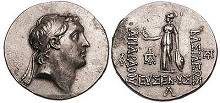
-163 Roman consuls: Tiberius Sempronius Gracchus and Marcus Juventius Thalna. The Roman Senate restores Ptolemy VI and gives the W province of Cyrenaica (Cyrene and Cyprus, the latter known for its licentious worship of Aphrodite) to Ptolemy VII, splitting Egyptian rule; Ptolemy VII only secures Cyrene. Satrap of Media (appointed by Antiochus IV in -175) Timarchos (Timarchus), usurps the Seleucid throne from young tyke Antiochus V Eupator and his regent gen. Lysias (d. -161) (until -160). Ariarates IV dies, and his Roman-educated (Athens-educated?) son Ariarathes V Eusebes Philopator (d. -130) (d. -126?) becomes king of Cappadocia, with capital at Mazaca (modern-day Kayseri); meanwhile Ariarates IV's wife Antiochis's two false sons Orophernes Nicephorus and Ariarathes, whom she put over on him during her childless years are sent into exile. The Jewish Temple fortifications are dismantled and Jewish religious freedom restored. Gracchus III returns to Rome and marries Scipio Africanus' daughter Cornelia, going on to have 12 children, all of whom die at an early age, except his superstar sons the "Gracchi", plus a daughter. Births: Roman statesman Tiberius Sempronius Gracchus IV (d. -133); one of the Gracchi, along with his brother Gaius Sempronius Gracchus (-153 to -121).
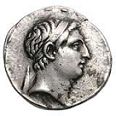

-162 Roman consuls: Publius Cornelius Scipio Nasica Corculum and Gaius Marcius Figulus. Demetrius I Soter (Gr. "savior") (-185 to -150), son of Seleucus IV escapes from detention in Rome to Tripolis with help from historian Polybius, and assumes the throne of Syria, defeating usurper Timarchus, who then sends gen. John Bacchides to Jerusalem and installs Alcimus (Gr. "valiant") AKA Elyaqum (Heb. "El will rise") as high priest (until -159), then returns to Syria, leaving behind a protective force; meanwhile the Battle of Beth-Zechariah sees 50K Seleucids under gen. Lysias defeat 20K Jews and kill Eleazer Maccabeus under a war elephant, after which they siege Jerusalem, but are called back to Antioch, leaving the Jews to worship as they please. Nonfiction: Greek geographer Pausanias of Lydia completes vol. 1 of his 10-vol. Description of Greece, which features his list of the Seven Wonders of the Ancient World, incl. the Great Pyramid of Giza, the Hanging Gardens of Babylon, Colossus of Rhodes, the Lighthouse of Alexandria, the Mausoleum at Halicarnassus, the Temple of Artemis at Ephesus, and the Statue of Zeus at Olympia.
-161 Roman consuls: Marcus Valerius Messala and Gaius Fannius Strabo. Demetrius I Soter defeats his cousin Antiochus V Eupator (b. -172) and gen. Lysias at the Phoenician port of Tripolis (Tripoli) (in modern-day Lebanon), and has them executed, obtaining recognition from Rome; meanwhile Judas Maccabeus grows stronger, and Alcimus petitions for help, causing Demetrius I Soter to send Gen. Nicanor, who loses to Judas at the Battle of Kapharsalama, after which Judas returns to Jerusalem, vents his wrath on the priests, and threatens to destroy the Jewish Temple, after which Judas routs Nicanor's army at the Battle of Beth Horon, and Nicator is KIA. Greek philosophers are banished from Rome again (first time -173). Josina (d. -137) becomes king of the Picts (Scotland). Another sumptuary law is passed in Rome.
Deaths: Greek Seleucid emperor (-163 to -161) Antiochus V Eupator (b. -172).-160 The 155th Olympiad. Roman consuls: Marcus Cornelius Cethegus and Lucius Anicius Gallus. The Syrians under gen. Bacchides defeat the Jewish rebels under Gen. Judas Maccabeus at the Battle of Laisa (Elasa) (Berea) in Beroea (Berea) (ancient Beeroth) (modern-day Bire or Bireh) (10 mi. N of Jerusalem); Judas is KIA, causing Jonathan to become leader of the Maccabees, rallying the troops; unable to defeat him, Bacchides returns to Syria after garrisoning some Jewish towns; unfortunately for the Jews, Judas had sent an embassy to Rome, and it returns after he dies with a treaty which basically gives Rome the right to rule Judea; meanwhile Jewish priest Onias IV goes to Egypt, reads from Isaiah 19:19, and convinces them to erect a Jewish temple in Leontopolis (On) - the original McDonald's franchise? Mas'ud dies, and his son Wahbu (d. -140) becomes the last king of Kaminahu in S Arabia. Nonfiction: Cato the Elder (-234 to -149), De Agri Cultura (Agricultura); oldest surviving Latin lit. encyclopedia. Births: African Numidian king (-113 to -104) Jugurtha (d. -104) in Cirta (modern-day Constantine). Roman senator gen. Quintus Caecilius Metellus Numidicus (d. -91); son of Lucius Caecilius Metellus Calvus (-200 to -135); father of Quintus Caecilius Metellus Pius (-130 to -63); educated in Athens.
-159 Roman consuls: Gnaeus Cornelius Dolabella and Marcus Fulvius Nobilior. Bacchides returns to Jerusalem and makes peace with Jonathan, who becomes gov. of Jerusalem. Inventions: The first water clock (clepsydra) appears in Rome. Births: Roman politician Quintus Mucius Scaevola Pontifex (d. -88); son of Publius Mucius Scaevola (d. -115); father of Quintus Mucius Scaevola Pontifex (-140 to -82). Deaths: Roman playwright Terence (b. -194); wrote six plays, all of which survived to modern times: "I am human, and nothing of that which is human is alien to me" (Homo sum, humani nil a me alienum puto); "Fortune favors the brave" (Fortis Fortuna adiuvat).
-158 Roman consuls: Marcus Aemilius Lepidus and Gaeius Popillius Laenas. On Sept. 2 emperor (since -215) Kogen (b. -273) dies, and Kaika (-208 to -98) becomes Japanese Yamato emperor #9 (until -98) - is it all the unlimited poontang? Syrian gen. Bacchides returns with his army to Palestine, but the Maccabean party has renewed strength and negotiates a treaty; Alcimus the Hellenizing high priest dies of "paralysis"; the priesthood is vacant for seven years. Eumenes II dies, and his 62-y.-o. younger brother (Attalus I's 2nd son) Attalus (Attalos) II (-220 to -138) becomes king of Pergamon (until -138). After Ariarathes V of Cappadocia refuses to obey the Romans and marry his sister, Demetrius I Soter invades and kicks his butt, causing him to flee to Rome, and puts his man Orophernes Nicephorus on the Cappadocian throne; the Romans then intervene and restore Ariarathes V as joint-ruler, but Orophernes is soon expelled. Births: Roman statesman-orator-historian Publius Rutilius Rufus (d. -77); great-uncle of Julius Caesar. Deaths: Japanese Yamato emperor #8 (-215 to -158) Kogen (b. -273) on Sept. 2.
-157 The Syrians recognize Jonathan as the leader of the Jews, and he goes on to unite the Jewish pop. Roman consuls: Sextus Julius Caesar and Lucius Aurelius Orestes. Births: Roman consul Gaius (Caius) Marius (d. -86) in Arpinum; son of a small pleb farmer with equestrian roots; uncle of Julius Caesar.
-156 The 156th Olympiad. Prusias II of Bithynia invades the territories of Pergamon (until -154). Han Wen Di dies, and Prince Liu Sheng becomes Han Jing Di (-181 to -141), Xi Han emperor #6 of China (until -141). Roman consuls: Lucius Cornelius Lentulus Lupus and Gaius Marcius Figulus. Births: Chinese Xi Han emperor #7 (-141 to -87) Han Wu Di (d. -87) on June 30 in Chang'an.
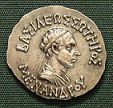
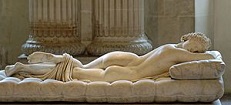
-155 Menander I "the Savior" (Milinda) (d. -130) becomes king of Bactria (until -130), extending his powe from the Kabul River Valley to the Ravi River, Swat River Valley, and Arachosia (modern-day Helmand Province, Afghanistan), patronizing Buddhism. Greek philosophers Diogenes the Stoic (-230 to -150), his student Carneades the Academic (Skeptic) (-213 to -129), and Critolaus the Peripatetic of Phaselis (-200 to -118) come to Rome as envoys from Athens, becoming popular esp. with the youth, raising doubts about the certainty of justice, pissing-off Cato the Elder, who persuades the Roman Senate to ban all Greek philosophers with the soundbyte that if they get infected with Greek lit. they will lose their empire - should have said Jewish lit.? About this time Greek sculptor Polycles sculpts The Sleeping Hermaphroditus, which is placed near the Baths of Diocletian in Rome, along with The Goddess Juno, which is placed in the Portico of Octavia in Rome; the Hermaphroditus is discovered in 1608 and presented to Cardinal Scipione Borghese, who houses it in a special room in his Villa Borghese, and in 1620 pays Gian Lorenzo Bernini to sculpt a buttoned mattress for it; in 1807 it ends up in the Louvre, inspiring Algernon Charles Swinburne's poem "Hermaphroditus" (1863). Roman consuls: Publius Cornelius Scipio Nasica Corculum and Marcus Claudius Marcellus.
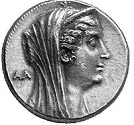
-154 Roman consuls: Lucius Postumius Albinus and Quintus Opimius. The pop. of Massilia (Marseille) appeal to their Roman allies for help against the pesky Oxybii and Decietes (Deciates), who together are known as the Salluvi (Salyes); they are defeated by Roman gen. Quintus Opimius. 10-y.-o. Cleopatra Thea (Gr. "goddess") Euergetis (Gr. "benefactress") (-164 to -121) becomes engaged to her uncle Ptolemy VIII, king of Cyrene, but he ends up marrying her mother (his sister) Cleopatra II. After Pergamon gets help from Ariarathes V of Cappadocia and his son Demetrius, Prusias II of Bythynia is defeated, and withdraws after agreeing to heavy reparations, then sends his popular son Nicomedes II to Rome to try to get them reduced. The Rebellion of the Seven Kings of Wu and Chu, led by Duke Wu takes place in China after Emperor Han Jing Di kills Wu's son Prince Xian (the emperor's cousin) over a game of Liubo. Architecture: The Valerian Road (Via Valeria) across the Appenines to Aternum is begun by Roman censor Marcus Valerius Messalla. Births: Roman statesman Gaius Sempronius Gracchus (d. -121); one of the Gracchi, along with his brother Tiberius Sempronius Gracchus IV (-163 to -133).

-153 On Jan. 1 (new start of the year) Roman consuls begin to assume power. Alexander I Balas (Gr. "lord") (d. -145), pretender son of Antiochus IV Epiphanes marries Cleopatra Thea, then gains Jonathan's support against his rival Demetrius I Soter by offering him the purple and a diadem, making him high priest, and the Jews retain their allegiance to him in the face of counteroffers by Demetrius I; Ptolemy VI Philometer at first supports Alexander against Demetrius I (until -150). Roman consuls: Titus Annius Luscus and Quintus Fulvius Nobilior.
-152 The 157th Olympiad. Jonathan becomes the Jewish high priest despite not belonging to the proper Zadokite family, and establishes friendly relations with Rome. Demetrius I Soter sends his son Demetrius II Nicator to Cnidus as protection against Alexander I Balas. Roman consuls: Lucius Valerius Flaccus and Marcus Claudius Marcellus.
-151 The Achaean hostages are returned. Scipio the Younger goes to Spain as military tribune under consul Lucius Licinius Lucullus. Roman consuls: Aulus Postumius Albinus and Lucius Licinius Lucullus. Deaths: Roman statesman-gen. Tiberius Sempronius Gracchus III (b. -210).
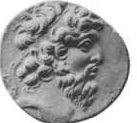
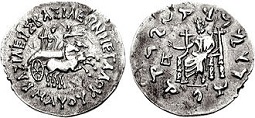


-150 Roman consuls: Titus Quinctius Flaminius and Manius Acilius Balbus. Seleucid emperor (since -161) Demetrius I Soter of Syria (b. -185) is defeated and KIA by pretender Alexander Balas, who becomes king of Syria (until -146); Ptolemy VI Philometer then switches to Demetrius I's son Demetrius II Nicator (-160 to -125), agreeing to take his daughter Cleopatra Thea away from Alexander and give her to him. Mithridates V Euergetes (d. -120), son of Pharnaces I and nephew of Mithridates IV becomes Greek king #7 of Pontus (until -120). About this year the Hasmoneans begin to restore autonomy to Judea, but the Jews begin to split into various sects, incl. the Pharisees (Heb. "divide, separate, set apart") (who accept the written and oral law and advocate democratization of religious practices), the Sadducees (Heb. "tsadduqi" = "right just", after Zadok, first high piest of ancient Israel, Ezek. 40:46) (who reject the oral law and represent the ruling hierarchy, becoming obsessed with separating themselves from whited, er, defilement), and the monk-like ascetic Gnostic Essenes (known for wearing white garments and serving as healers); the Dead Sea Scrolls are begun by clean-freak (daily ablution) Essene monks (Sadducee winer-diners?) in Qumran W of the Dead Sea; "Those Pharisees would purify the Sun itself." The Romans under praetor Servius Galba defeat the Lusitanians in W Spain after springing a clever trap, killing 9K and capturing 20K POWs, who are sold as slaves in Gaul. About this time the Celtic Gaelic-speaking Gaels (Milesians) AKA Sons of Mil begin fleeing Roman incursions in N Spain and S Gaul and settling in Ireland, landing at the mouth of the Boyne River in E Ireland and Kerry in S Ireland, the first group settling in N Leinster and setting up the Kingship of Tara, the latter group settling in Cashel ("stone ringfort") in modern-day County Tipperary. About this time the Gaels begin subjugating the Belgae and Laighins, finally taking over the midlands in 516 C.E. About this time a movement to define a distinct Roman culture in opposition to Hellenism begins, while Roman wealth is busy attracting Greek artists. Fat, deformed Lady (Marchioness) Tai (Dai) (b. -100), wife of the PM to Prince Ch'ang-sha in the Hunan district of C China dies of heart failure brought on by arteriosclerosis and colic (her stomach contains 138 melon seeds); her elaborate tomb at Ma-wang-tui near Hunan is discovered in 1971, her body well preserved in a charcoal-encased coffin, complete with food, clothes, 162 wooden servants and musicians, and a silk banner containing a painting of her; the People's Rep. of China comments that it "shows how brutally the feudal ruling class oppressed and exploited the laboring people". About this time the nomadic E Iranian-Scythian Saka people are pushed by the Yuezhi people W into Sogdiana, crossing the Syr Darya into Bactria, displacing Greeks; meanwhile more Sakas move S to NW India incl. Kashmir, Punjab, Sindh, Haryana, Gujarat, Maharashtra, Uttar Pradesh, Bihar, and Rajasthan, starting with the Indus River Valley in about -88. Inventions: About this time (-150 to -100) the Antikythera Mechanism is created, discovered in 1901 C.E., becoming the world's first computer, computing lunar-solar motions with gears, based on the off-center circle Hipparchos Model of the Moon's elliptical orbit around the Sun; the first astrolabe?; a Roman ship carrying it sinks off Antikythera Island in S Greece about -65, and is recovered in 1900 C.E.; the eclipse prediction is based on Babylonian rather than Greek math, and the astronomical calculations begin in -205; no instruments of comparable complexity are made for 1K years until Baghdad in 900 C.E. after the Romans and Greeks fail to pass on their technology, and the Muslim device is much simpler; designed by Hipparchos of Rhodes? Nonfiction: The First Book of Maccabees is written in the last half of this cent. Art: About this time the strangely Christ-like Laocoon (Laocoön) Group is sculpted by Hagesandros (Agesander), Athenedoros (Athenodorus) and Polydoros (Polydorus) of Rhodes, depicting the brother of Anchises (father of Aeneas), a priest of Poseidon being strangled by sea serpents along with his two young sons Antiphantes and Thymbraeus at the orders of Minerva after he tries to warn the Trojans that the Trojan Horse is a trick, uttering the immortal soundbyte: "Timeo Danaos et dona ferentes" (Beware of Greeks bearing gifts) (I fear Greeks even when they bear gifts); discovered in Rome in 1506 C.E., its anatomical accuracy and depiction of agony wows hard-to-please German critic Gotthold Lessing. Deaths: Greek Seleucid emperor (-161 to -150) Demetrius I Soter (b. -161).
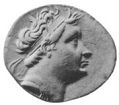

-149 Achaean League head Callicrates dies. After learning of a plot to murder him, Nicomedes II Epiphanes (d. -127), supported by Attalus II of Pergamum revolts against his father Prusias II and executes him, and becomes king #6 of Bithynia (until -127), going on to become a steady ally of Rome, even against Pergamum. The Third Punic War (ends -146) begins after the vicious Roman senators become jealous of the fact that Carthage has regained some kind of prosperty and trade, and encourage Numidia to encroach upon their territory until they are forced to fight, then, declaring that they have broken the treaty, pounce; first Rome demands hostages, the surrender of arms, and then the abandonment of Carthage, telling them to move to a spot at least 10 mi. from the sea (to kill their sea trade); Carthage resists, and Rome attacks, but narrowly avoids disaster as the Carthaginians, seeing the end is near, fight back in a grimly determined manner. Andriscus (Andriskos) (d. -148) ("Pseudo-Philip") ("False Philip"), a fuller from Adramyttium in Aeolis, W Anatolia who claims to be the son of Perseus of Macedon and leads the Fourth Macedonian War against Rome (ends -148); after failing to find a following in Macedonia, he asks for help from Demetrius Soter of Syria, who hands him over the Romans, but he escapes and reappears in Macedonia with an army of Thracians and defeats praetor Publius Juventius, assuming the title of king Philip VI of Macedonia (until -148), becoming the last king of Macedon. Hu Shin produces a Chinese dictionary of 10K chars. Roman consuls: Manius Manilius and Lucius Marcius Censorinus. Deaths: Numidian king Masinissa (b. -238). Roman politician Cato the Elder (b. -234); leaves De Agri Cultura (On Agriculture) (ca. -160); Origines (7 vols.) (ca. -168), becoming the first Latin writer of history, writing abe urbe condita (from the founding of the city of Rome), extolling Roman virtues and claiming that not only Rome but other Italian towns were venerable, thus Romans are superior to the Greeks.
-148 The 158th Olympiad. Roman consuls: Spurius Postumius Albinus Magnus and Lucius Calpurnius Piso Caesoninus. After conquering Thessaly and allying with Carthage, Macedonian pretender Andriscus is defeated 2x by the Romans under praetor gen. Quintus Caecilius Metellus (-210 to -115), causing him to flee to Thrace, whose prince gives him up to the Romans, ending the Fourth Macedonian War (begun -149); Macedonia is made a Roman province, and Metellus is given the agnomen Macedonicus. Another year of failure for the Romans in Carthage causes extreme panic in Rome. Architecture: The Via Postumia (Postumian Road) in N Italy is begun, running from coastal Genua through the mountains to Dertona, Placentia, and Cremona near the Po River, then E to Bedriacum and modern-day Calvatone, branching right to Mantua and left to Verona, crossing the Adige River on the Ponte Pietra, then crossing the Piave River at Maserada sul Piave, ending up in Aquileia, allowing the Romans to eventually conquer Liguria.
-147 Roman consuls: Publius Cornelius Scipio Africanus and Gaius Livius Drusus. The Roman census gives the pop. of the Roman Empire as 322,000. Demetrius II Nicator, son of Demetrius I Soter revolts from Alexander I Balas, and defeats his gen. Apollonius. After Scipio the Younger, favorite of the army and the people is elected consul and invested with the supreme command, the Romans begin a siege of Carthage, cutting off all supplies by land and sea, and building a mole across the harbor. Sparta and Achaea go to war, and the Achaean League revolts from Rome. Mithridates I the Great of Parthia conquers Babylonia and Media from the Seleucids.

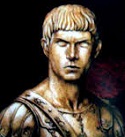
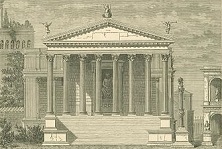
-146 Roman consuls: Gnaeus Cornelius Lentulus and Lucius Mummius Achaicus. The Romans under Quintus Caecilius Metellus Macedonicus defeat the Arcadians at the Battle of Chaeronea; meanwhile the Achaean League under strategos Critolaos of Megalopolis attacks Sparta, but the Romans under consul Lucius Mummius Achaicus and praetor Quintus Caecilius Metellus Macedonicus crush them at the Battle of Scarpheia, where Critolaos is KIA and replaced by Diaeus, followed by the followed by the Battle of Corinth (to avenge an insult made to the Roman embassy there), then destroy Corinth, slaughter the men, and sell the women and children into slavery, then dissolve the Achaean League, substituting oligarchies for democracies, and annex Greece, placing it under the supervision of the Roman gov. of Macedon Macedonicus, who is permanently installed in Thessalonica; once-proud Greece becomes another tribute-paying Roman province, full of people every Equestrian would like to own?; Macedonia's four districts are formed into a koinon by Rome, with capital at Beroea at the foot of Mt. Bermios (seat of the imperial cult); from now on Greeks work as slaves and peddle their cerebral culture to their practical-minded Roman masters, while living in the past in a state of denial? - don't worry, Romans, you'll know what it feels like one day? Starving Carthage resists Scipio the Younger (Publius Cornelius Scipio Aemilianus Africanus Numantinus) (-185 to -129) and his Roman army almost to the last man, the final street fighting lasting six days, but finally capitulates when they are down to 50K out of 500K; the survivors are sold into slavery, the city is sacked and burned to the ground and taken apart stone by stone, the fields plowed and sown with salt, and a curse solemnly invoked upon anyone who dares attempt to rebuild it; the region becomes the Roman Province of Africa, the richest in the Western empire, which lasts until the Vandal invasion of the 5th cent. C.E.; 17-y.-o. Tiberius Sempronius Gracchus IV (b. -163) takes part in the fun, and is the first Roman to scale the city wall; meanwhile Roman gen. Quintus Caecilius Metellus is given a triumph, parading his trophy Andronicus around and receiving the title pf "Macedonicus"; Rome's V over the civilized Western world is complete, and the Roman Empire now consists of seven provinces: Sicily, Sardinia, Corsica, Nearer Spain (N), Further (S) Spain, Gallia Transalpina, Macedonia, and Africa. Ptolemy VI Philometer captures Antioch in support of Demetrius II Nicator, and his Alexander I Balas' wife Cleopatra Thea switches dicks in the middle of a you know what and marries Demetrius II. Architecture: To celebrate his triumph for his V at the Battle of Scarpheia, Quintus Caecilius Metellus Macedonicus builds the Hexastyle peripteral Temple of Jupiter Stator (the Stayer) in the Roman Forum, along with the Temple of Juno Regina in the S half of the Campus Martius near the Circus Flaminius (built -179), and the Porticus Metelli (replaced in -26 by Augustus with the Porticus Octaviae), designed by Greek architect Hermodorus of Salamis from Salamis, Cyprus, becoming the first Roman temple built entirely of marble; too bad, the statues of Jupiter and Hera are set up in each other's temples by mistake; a legend attributes the design to Spartan architect Saurus and Batrachus because of depictions of a lizard (sauros) and frog (batrachos), but no inscriptions. The Forum Boarium (cattle forum) is built in Rome near the Tiber River, with strong Greek influences, incl. a round tholos temple built of imported Attic Pentalic marble. Nonfiction: About this time Megalopolis, Arcadia-born Greek historian Polybius (-203 to -118), who witnessed the sack of Carthage this year and was awed with Roman might begins writing a 40-vol. History of Rome, covering the Roman Repub. from -264 to -146, its wars with Carthage starting in -220, and its rise to top dog status in the Mediterranean world, which becomes instrumental in convincing Greeks to give into the inevitable and change their ways; he champions the idea of factual integrity in historical writing, and proposes the separation of powers in govt., later adopted by Montesquieu and the Am. Founding Fathers; he claims that the pesky Celts are backwards and don't know any Science - playing the Planet of the Apes chimps to the Roman gorillas?


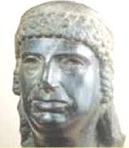
-145 In July debauched Alexander Balas is defeated in Antioch by Demetrius I Soter's son Demetrius II Nicator (Gr. "conqueror") (-160 to -125), who in Sept. becomes king of Syria (until -138), immediately facing several usurpers while Ptolemy VI Philometer marries his daughter (Balas' old wife) Cleopatra Thea, and dies a few days later from wounds sustained in the fighting, and his 16-y.-o. son Ptolemy VII Neos ("new Dionysos") Philopator (Philopater) ("father lover") becomes king #7 of Egypt's 32nd (Ptolemaic) Dynasty, with his mother Cleopatra II as regent; his uncle Physcon then marries her and murders him during the wedding feast, assuming the throne as Ptolemy VIII Euergetes ("benefactor") II Physcon ("fat bellied") (-182 to -116), becoming king #8 of Egypt's 32nd (Ptolemaic) Dynasty: he then marries Cleopatra II's daughter (his niece) Cleopatra III (-161 to -101), who becomes the main player; meanwhile Demetrius II Nicator attacks the Egyptian army - the spark happens? Antiochus V's son Antiochus VI appoints Simon Maccabeus as gov. "from the Ladder of Tyre (Klimax Tyrou) to the borders of Egypt". Architecture: In response to the desecration of the Temple of Jerusalem under Antiochus IV Epiphanes and the supplanting of the legitimate line of Jewish priests by the installation of Alcimus, a Jewish temple is founded in Leontopolis (Gr. "city of the lions") in the Nile Delta, which becomes known as the Land of Onias; it is presided over by priests of the family of Onias IV, and it becomes the only Jewish temple outside of Jerusalem where sacrifices are offered. Births: Chinese Han Dynasty eunuch royal astrologer (-107 to -86) and historian ("the Herodotus of China") ("Father of Chinese Historiography") Sima Qian (Ssuma Ch'ien) (d. -86) in Longmen (near modern-day Hangchen); son of royal astrologer Sima Tan (-165 to -110).
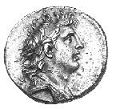
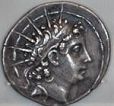
-144 The 159th Olympiad. Roman consuls: Servius Sulpicius Galba and Lucius Aurelius Cotta. Alexander I Balas' general Diodotus Tryphon (d. -138) deposes Demetrius II (who is saved by soldiers from Judah, and flees to Seleucia), and rules in Antioch on behalf of Alexander's 2-y.-o. son Antiochus VI Dionysus (-148 to -141) (until -140). Architecture: The Aqua Marcia, Rome's longest of 11 aqueducts is begun by praetor Quintus Marcius Rex (ancestor of Julius Caesar) using spoils from the conquest of Corinth and Carthage (finished in -140), becoming known for its cold pure water, helping Rome grow into a large city.
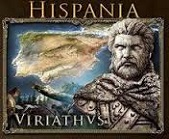
-143 Roman consuls: Appius Claudius Pulcher and Quintus Caecilius Metellus Macedonicus. The Third Numantine War (ends -133) in Numantia (W Spain/Portugal) begins when Lusitanian leader (since -147) Viriathus (-180 to -139) leads a revolt against the Romans, scoring several Vs until his own men murder him in his sleep after the Romans under Macedonicus defeat the Arevaci in NC Hispania; "It seemed as if in that thoroughly prosaic age, one of the Homeric heroes had reappeared." (Theodor Mommsen) Despite supporting him, Jonathan Maccabeus is tricked by jealous Diodotus Tryphon into being captured, then assassinated.
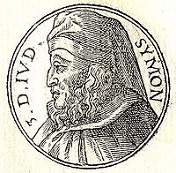
-142 The Roman census gives the pop. of the Roman Empire as 322,442. Jonathan Maccabeus is succeeded as gov. of Jerusalem and high priest by his brother Simon Maccabeus (Thassi) ("the Boss") (d. -135), who expels the Seleucids from Jerusalem and declares Judea an independent nation for the first time since the 8th cent. B.C.E.; the Hasmonean Dynasty begins in Judea (ends -63); Demetrius II affirms Jewish independence and makes an alliance with Simon, freeing Jews from Seleucid taxation; all Seleucid are expelled from the citadel at Jerusalem; a Jewish embassy under Numenius goes to Rome, causing Roman consul Lucius Caecilius Metullus to address letters to a number of countries reaffirming a Roman protective alliance with the Judean Jews (1 Macc. 15:15-24). Scipio the Younger becomes a big man in Rome, gathering around him the Scipionic Circle of brain men (I don't see that in my anatomy textbook?), incl. Greek historian Polybius, Greek philosopher Panaetius, Roman playwright Terence, and Roman satirist Gaius Lucilius; meanwhile he is elected censor, and tries to follow in the footsteps of Marcus Porcius Cato in suppressing luxury and immorality without the benefit of them neat Billy Graham gospel sermons - I'm amazed at how quickly they turn their 15K-rhinestone wardrobe around? Roman consuls: Quintus Fabius Maximus Servilianus and Lucius Caecilius Metullus Calvus.
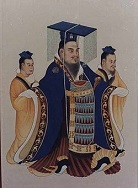
-141 On Mar. 9 Han Jing Di dies, and Liu Che becomes Han Wu Di (-156 to -87), Xi Han emperor #7 of China (until Mar. 29, -87); Han Jing Di is buried in a tomb 95 mi. from Peking in a fabulous jade suit, with 2K plates sewn together with gold wire, along with 2.8K expensive funeral offerings; his wife Tou Wan has to wait until -104 to get her jade immortality suit. Macedonia becomes a Roman province. Taking advantage of the confusion, Mithridates I the Great of Parthia conquers Media and Babylonia; the Parthians, originally from E Iran now own Mesopotamia, reducing the Seleucid kingdom to Syria. Simon is chosen by the congregation (popular assembly) as high priest and ethnarch (civil gov.) of Judea, and both offices are made hereditary in his Hasmonean family. Roman consuls: Gnaeus Servilius Caepio and Quintus Pompeius.

-140 The 160th Olympiad. In summer Diodotus Tryphon kills 7-y.-o. Antiochus VI and proclaims himself king of Syria, becoming the first to use the name Tryphon; Rome doesn't buy it and refuses to recognize the bum. Aretas I dies, and Rabbel I (d. -103) becomes king of the Nabataeans (until -103). Roman consuls: Quintus Servilius Caepio and Gaius Laelius Sapiens. Inventions: About this time Greek #1 astronomer Hipparchus of Nicaea (-190 to -120) discovers trigonometry along with the precession of the equinoxes by observing the bright star Spica in Virgo. Greek Stoic philosopher Crates of Mallus, head of the library of Pergamum creates a Globe of the Earth. Wheel bearings are found on a wagon from this period in Dejbjerg, Jutland. Poetry: About this time Greek epigrammist Antipater of Sidon composes the poem The Seven Wonders of the Ancient World; "I have set my eyes on the wall of lofty Babylon on which is a road for chariots, and the statue of Zeus by the Alpheus, and the hanging gardens, and the Colossus of the Sun, and the huge labor of the high pyramids, and the vast tomb of Mausolus; but when I saw the house of Artemis that mounted to the clouds, those other marvels lost their brilliancy, and I said, 'Lo, apart from Olympus, the Sun never looked on anything so grand'." Births: Chinese Han gen. Huo Qubing (d. -117) in Linfen, Shanxi; half-brother of Huo Guang (d. -68). Roman orator Lucius Licinius Crassus (d. -91). Roman orator Marcus Antonius (d. -87). Roman jurist Quintus Mucius Scaevola Pontifex (d. -82); son of Quintus Mucius Scaevola Augur (-159 to -88). Armenian king (-95 to -55) Tigranes II (the Great) (d. -55); son or nephew of Tigranes I or Artavasdes I; husband of Cleopatra (b. -110), daughter of Mithridates VI of Pontus.
-139 Mithridates I the Great of Parthia conquers Susa and Elam from the Seleucids. Lusitanian leader Viriathus is killed in his sleep by his own men after they had been sent as emissaries to the Romans and sold-out, after which the consul orders their execution, with the soundbyte: "Rome does not pay traitors"; Tautalusnever try to run a racket on a racketeer? An expedition of Zhang Du (d. -114) to the West begins (ends -132). Roman consuls: Gnaeus Calpurnius Piso and Marcus Popillius Laenas. Births: Jewish queen (-76 to -67) Salome (Shelamzion) Alexandra (d. -67).

-138 Roman consuls: Publius Cornelius Scipio Nasica Serapio and Decimus Junius Brutus Callaicus. In July-Aug. Demetrius II of Syria is captured by Mithridates I of Parthia after adding Elam, Persia, and parts of Bactria to his kingdom and making Ctesiphon-Seleucia his capital; after Demetrius II's younger brother Antiochus VII Euergetes Eusebes Soter Sidetes ("benefactor pious savior") (d. -129) sieges him in Dor, Diodotus Tryphon escapes, then commits suicide in Apamea, and Antiochus VII becomes king of downsizing Syria (until -129), turning it around and beginning to restore its power by scoring several Vs against Parthia. Attalus II dies, and his nephew (Eumenes II's son) Attalus (Attalos) III Philometor ("mother loving") Euergetes (-170 to -133) becomes king of Pergamon; he narrows the entrance to the harbor of Ephesus, causing it to silt up? Births: Roman gen.-statesman Lucius Cornelius Sulla Felix (d. -78) in Rome.
-137 Early in the year Antiochus VII's cmdr. Cendebeus is defeated by Simon Maccabeus. The original Inspector Clouseau in the Pink Panther by Henry Mancini? The Roman push into the plains of Spain hits a snag? Roman Gen. Hostilius Mancinus makes an ass of himself at the ancient Celtiberian city of Numantia in NC Spain, is defeated and his 20K-man army put at their mercy, then saved by his quaestor Gracchus IV after the victors refuse to negotiate with anybody but the son of their former benefactor Gracchus III; Mancinus is recalled and replaced by Marcus Aemilius Lepidus Porcina (greatest orator of his age, according to Cicero), but he makes a bigger ass of himself, making war on the peaceful Vaccaei after accusing them of assisting Numantia only to run out of supplies, and is deprived of command in the field, becoming the first Roman gen. thus disgraced; meanwhile the Celtic Gallaeci (Callaeci) tribal confederation in NW Spain (Galicia) is conquered by the Romans under Quintus Servilius Caepio. Cleopatra Thea marries Antiochus VII. Finnanus (d. -107) (fine what?) becomes king of the Picts (Scotland). Roman consuls: Marcus Aemilius Lepidus Porcina and Gaius Hostilius Mancinus.
-136 The 161st Olympiad. The Roman census gives the pop. of the Roman Empire as 317,933. About this year the apocryphal (deuterocanonical) History of Susanna (Heb. "lily"), AKA "Susanna and the Elders", AKA "The Judgment of Daniel", an addition to the Bible book of Daniel is written, becoming one of the first detective stories, where two Jewish elders attempt to frame her on adultery because she won't hook up with them, and Daniel defends her in court, getting them to contradict each other about what kind of tree the adultery was committed under, getting her let off; it gets incl. by the Roman Catholic and Eastern Orthodox Churches in the Book of Daniel as Ch. 13 along with The Song of the Three Holy Children (Young Men), The Prayer of Azariah (Abednego) (in the furnace), and The History of Bel and the Dragon (where Daniel proves that the priests of Bel or Baal sneak into his temple and eat his sacrifces, and later kills a snake by feeding it pitch, hair, and fat, featuring an appearance by Jewish prophet Habbakuk, who brings him some stew in the lion's den) in the Greek Septuagint and Roman Catholic Latin Vulgate (all written in this cent.?), but they are all later omitted from Protestant Bibles.
-135 Roman consuls: Quintus Calpurnius Piso and Servius Fulvius Flaccus. Births: Greek king of Pontus (-120 to -63) Mithridates (Mithradates) VI Eupator Megas (the Great) Eupator Dionysius (d. -63); son of Mithridates V and Gespaepyris. Greek #1 polymath Stoic pansophist philosopher-historian-astronomer-geographer-politician Posidonius "the Athlete" of Apameia (Apamea) (Rhodes) (d. -51) in Apameia on the N Syrian coast near the Orontes River; studies in the Stoic school in Athens under Panaetius; settles in Rhodes in -95.
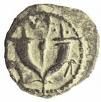
-134 On Jan. 1 Scipio the Younger is elected consul again, and sent to Spain to do it right and conquer Numantia, seat of the Spanish revolt, beginning the Siege of Numantia (ends -133), later turned into a tragedy by Miguel de Cervantes. In Jan. Jewish high priest Simon Maccabeus along with his two eldest of three sons are assassinated by his son-in-law Ptolemy, and after Antiochus VII Sidetes invades Judaea and sieges Jersualem, his surviving son John (Johanan) Hyrcanus I (d. -104), gov. of the Judean coast is recognized as high priest, going on to free Judea from Syrian influence and begin a series of military campaigns to expand Jewish domains. Roman consuls: Gaius Fulvius Flaccus and Publius Cornelius Scipio Africanus Aemilianus the Younger.

-133 Roman consuls: Lucius Calpurnius Piso Frugi and Publius Mucius Scaevola (d. -115). Numantiais is starved into submission, captured, and sacked by Scipio Africanus the Younger, adopted grandson of Scipio Africanus the Elder after a 15-mo. siege, ending the Third Numantine War (begun -143); the Celtic Vaccaei (Vaccei) tribe in the Duero River Valley in NC Spain is conquered; Scipio receives the surname Numantius to add to that of Africanus; Antiochus VII Sidetes sends him lavish presents. Attalus (Attalos) III Philometor dies after he wills the kingdom of Pergamon (Pergamom, Pergamos) (modern-day Bergama) in W Asia Minor to Rome, incl. the city of Ephesus, which becomes the official residence of the gov. of the Roman province of Asia, and Troas, which becomes a Roman colony; Hierapolis becomes a flourishing Roman city; in 2013 C.E. the Ploutonian (Gates of Hades) in Hierapolis is discovered; Attalus II Philadelphus's son Eumenes III Aristonicus (d. -129) starts a revolt (ends -129). Phrygia becomes a Roman province. Gaius Sempronius Gracchus IV (-153 to -121) attempts to arrest the decline of Tarentum by founding a Roman colony there; his older reformer brother Tiberius Sempronius Gracchus IV (-163 to -133) is elected tribune of the people, champions the cause of the common people and small farmers, and gets legislation passed providing for more equitable distribution of public lands, with a 3-man committee consisting of he, his brother Gaius (who is in Spain), and Appius Claudius appointed to handle the distribution, but when his term expires he makes a boo-boo by seeking re-election in violation of the age-old prohibition of two successive terms, causing his aristocratic enemies to spread rumors that he is trying to become a dictator, resulting in a riot in which he is murdered on the night before a scheduled speech on reform of agrarian laws, and his body cast into the Tiber River, after which the Senate issues its first Senatus consultum ultimum (SCU) (Final Decree of the Senate), "let the consuls see to it that the state suffer no harm"; Scipio the Younger, brother-in-law of Tiberius Sempronius Gracchus is a leader of the aristocratic party, and disclaims sympathy for the Gracchi. Science: Chinese alchemists attempt to turn cinnabar into gold. Deaths: Roman statesman Tiberius Sempronius Gracchus IV (b. -163) (murdered).

-132 The 162nd Olympiad. Roman consuls: Publius Popillius Laenas and Publius Rupilius. Mithradates I the Great dies, and his son Phraates II (d. -126) becomes king #7 of Parthia (until -126). Arab Nabataean (Nabatean) found the Osrhoene (Osroene) (Osrohene) Kingdom under the Abgar Dynasty, with capital at Edessa, which lasts till 244 C.E. Architecture: The Popilian Way (Via Popilia) is begun by consul Publius Popilius Laenas, extending the Via Flaminia N along the Adriatic coast to Aquilea (modern-day Venice).
-131 Roman consuls: Lucius Valerius Flaccus and Publius Licinius Crassus Dives Mucianus. The Roman census gives the pop. of the Roman Empire as 318,823. Roman hero gen. Quintus Caecilius Metellus Macedonicus is elected censor, giving a speech proposing to make matrimony mandatory for all citizens in order to halt sexual libertinage, which draws strong popular opposition led by tribune Gaius Altinius Labeo Macerio; a cent. later Augustus orders the speech read to the Senate. Gaius Gracchus returns to Rome, but takes no major part in public affairs and lies low after what they did to his big brother. Publius Mucius Scaevola (d. -115) becomes Roman pontifex maximus, becoming the last to pub. the Annales Maximi, a record of the year's events, which are replaced by the Acta Diurna Populi) (Publica) (Urbana) (Daily Public Records), containing a daily record of all public events in Rome, which are displayed in public places then preserved as historic material. Cleopatra II revolts against Ptolemy VIII and expels him and Cleopatra III from Egypt, causing Ptolemy VIII to hole-up in Cyprus and murder his stepson Ptolemy and his son Ptolemy Memphites, and have the latter's dismembered head, hands, and feet sent to her in Alexandria as a birthday present; Cleopatra II rules Egypt until -127.
-130 Ptolemy VIII leaves Cyprus and returns to Egypt, launching a civil war with Cleopatra II. Antiochus VII Sidetes of Syria expels the pesky Parthians from Babylonia and Media. Ariarathes V of Cappadocia is KIA while helping the Romans fight Aristonicus of Pergamum, causing the Romans to reward him by adding Lycaonia and Cilicia to his dominions; after his ambitious wife Nysa poisons his five other sons, and is stopped by the nobles before she can do in her youngest son Ariarathes VI Epiphanes Philopator (d. -116), he becomes king of Cappadocia (until -116), with Nysa as regent - side effects were usually mild, incl. headaches, nosebleeds, and coughing? Chinese emperor Han Wu Di establishes an admin. with scholars and a civil system. Roman consuls: Lucius Cornelius Lentulus and Marcus Perperna. Architecture: Zhang Du's expedition helps open the 4K-mi. Silk Road, stretching from E China through Edessa to the Mediterranean Sea (finished -115). Births: Greek eclectic philosopher Antiochus of Ascalon (d. -68); pupil of Philo of Larissa and teacher of Cicero; combines Stoicism and Platonism. Roman politician gen. Quintus Caecilius Metellus Pius (d. -63); son of Quintus Caecilius Metellus Numidicus, given the cognomen Pius for endless devotion to his father's attempts to get recalled from exile. Deaths: Roman dramatist-painter Marcus Pacuvius (b. -220).
-129 In spring after demanding restoration of all Seleucid territories in Persia, Antiochus VII is defeated in Ecbatana, Babylonia (Media) by Phraates II of Parthia, and commits suicide in May, permanently losing the lands E of the Euphrates, and causing the Seuleucid Empire, now reduced to Syria and Cilia to begin to collapse; Demetrius II Nicator is sent back to Syria by Parthian king Phraates II and regains the Seleucid throne (until -125). Aristonicus' revolt is suppressed, and Pergamon becomes the Roman province of Asia (Rome's 8th province) (AKA Phrygia), the first city to make an alliance with Rome, and a center of Roman emperor worship. Idumea (S of Judea) is conquered by John Hyrcanus I, and its native pop. of Arabs and others forced to undergo Judaization incl. circumcision; it is then incorporated into the Hasmonean Empire. The Parthian Arsacids establish their winter residence at Ctesiphon (Casiphia), on the left bank of the Tigris River below Baghdad, and revive trade between the Mediterranean and Far East through the city of Dura-Europus on the mid-Euphrates River. Roman consuls: Gaius Sempronius Tuditanus and Manius Aquillius. Births: Greek physician (in Rome) (founder of the Methodic School) Asclepiades of Bithynia (d. -40) in Prusa, Bithynia. Deaths: Greek philosopher Diogenes the Stoic (b. -230). Greek philosopher Carneades the Academic (b. -213). Roman gen.-statesman Scipio Africanus the Younger (b. -185); destroyer of Carthage.

-128 The 163rd Olympiad. Alexander II Zabinas (d. -123), backed by Ptolemy VII Physcon challenges Demetrius II Nicator for the Seleucid throne; meanwhile Demetrius intervenes in the Egyptian civil war on the side of Cleopatra II, but is defeated near Pelusium. John Hyrcanus I destroys the Samaritan temple on Mount Gerizim - the only good Samaritan? Roman consuls: Titus Annius Rufus and Gnaeus Octavius.

-127 Cleopatra II is forced by Ptolemy VIII to flee to Syria, joining her daughter Cleopatra Thea and son-in-law Demetrius II Nicator. Phraaates II dies in battle fighting the Tochari (Scythians)(Sacae) (Sakas), leaving the kingdom devastated and the succession in confusion; Artabanus I (d. -124), brother of Mithradates I becomes king #7 of Parthia (until -124). Nicomedes II dies, and his son Nicomedes III Euergetes (d. 94) becomes king #7 of Bithynia (until -94), going on to become ruler of Paphlagonia on the Black Sea coast between the Parthenius and Halys Rivers. Roman consuls: Lucius Cornelius Cinna and Lucius Cassius Longinus Ravilla; known for the original conspiracy theory soundbyte "Cui bono" (Who benefitted)?

-126 Roman consuls: Marcus Aemilius Lepidus and Lucius Aurelius Orestes. A Roman army under consul Lucius Aurelius Orestes (d. -103) goes to Sardinia to quell another revolt, and Gaius Gracchus tags along as quaestor. Phraates II is KIA in battle against Tochari and Saka nomads from Sakastan (modern-day Sistan in E Iran and S Afghanistan) in the E, and (after his other uncle Bacasis briefly reigns?) his uncle Artabanus II (d. -122), son of Priapatius becomes king #8 of Parthia (until -122). Architecture: The Aqua Tepula aqueduct in Rome is built by censors Gaius Servilius Caepio and Lucius Cassius Longinus, with its source in the Alban Hills only 11 mi. from Rome, known for being lukewarm but not drinkable, causing them to be mixed with waters from the Aqua Marcia; Murphy's Law wins, and it becomes the highest aqueduct, hence the one with the widest distribution, although the one with the poorest quality water, plus the smallest to boot.

-125 Roman consuls: Marcus Fulvius Flaccus and Marcus Plautius Hypsaeus. The Roman census gives the pop. of the Roman Empire as 394,736. King Demetrius II of Syria is conquered by Alexander II Zabinas and the Egyptians near Damascus, and is murdered as he attempts to land in Tyre; he is succeeded by his eldest son Seleucus V, but his mother Cleopatra Thea removes him in favor of the younger son Antiochus VIII Epiphanes Philometor Callinicus Grypus ("God manifest mother-loving gloriously victorious hook-nosed") (-144 to -96). Despite the Senate attempting to keep him from returning to Rome by extending his term as quaestor, Gaius Gracchus returns without authorization. War breaks out between the Romans in Massilia (Marseille) and the Celtic Salluvii (Salyes) tribe on the Druentia Plain (Durance) S Gaul again, causing Roman consul Marcus Fulvius Flaccus to kick some butt this year and next, becoming the first Roman to overcome the transalpine Ligurians in war, returning to Rome in -123 for a triumph. Architecture: The Cassian Way (Via Cassia) in Rome is begun, branching from the Via Flaminia near the Milvian Bridge and passing near Veii in Etruria, joining the Via Aurelia at Luna.
-124 The 164th Olympiad. Artabanus I of Parthia dies in battle against the Tochari (Scythians). Ptolemy VIII and his sister Cleopatra II of Egypt reconcile. Roman consuls: Gaius Cassius Longinus and Gaius Sextius Calvinus.
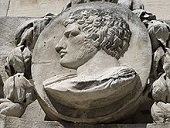
-123 Roman consuls: Titus Quinctius Flaminius and Quintus Caecilius Metellus Baliaricus. Gaius Sempronius Gracchus (-154 to -121) is elected tribune, devoting himself to enforcement of his late brother's agrarian laws despite their being allowed to lapse, following his brother's footsteps by pursuing new legislation for the common people, pissing-off the aristocrats gain. The Romans under gen. Gaius Sextius Calvinus conquer the Celtic Salluvii (Salyes) tribe in S Gaul, causing their king Tutomotulus (Teutomalius) to flee to the protection of the Allobroges tribe, which controls the territory between the Rhone River and Lake Geneva N of Massalia, causing Rome to declare war on them too; the Romans destroy the chief town of the Salluvii and found the Roman colony of Aquae Sextiae (hot springs of Sextius) (modern-day Aix-en-Provence) (modern-day pop. 142K) giving some of the captured territory to Massilia; the Romans also capture Arles in S Gaul from the Salluvii and attempt to build into a commercial city, although it never escapes from the shadow of Massalia. Syrian pretender Alexander Zabinas is conquered and executed. Carthage is rebuilt. Births: Roman statesman gen. Quintus Sertorius (d. -72). Greek physician (founder of the Methodic School) Themison of Laodicea (d. -43); pupil of Asclepiades of Bithynia.
-122 Roman consuls: Gnaeus Domitius Ahenobarbus and Gaius Fannius. Gaius Gracchus is reelected tribune, continuing to get new laws passed, incl. one letting Roman citizens purchase grain at half price, while curbing the power of the Senate and increasing that of the equites, and creates a public works program for the poor to construct and repair roads - the Franklin Roosevelt of ancient Rome? On Aug. 8 the Romans under consuls Quintus Fabius Maximus Allobrogicus and Gnaeus Domitius Ahenobarbus (d. -104) defeat the Celtic Allobroges tribe between the Rhone River and Lake Geneva allied with the Celtic Arverni tribe in Auvergne in S Gaul under king Bituitus (son of Luernios), then parade Bituitus in a triumph in Rome dressed in his silver battle armor, before being sentenced by the Senate to exile in Alba Fucens at the foot of Mt. Velino in C Italy, the captured loot being used by Fabius to build the Fornix Fabianus triumphal arch in Rome across the Via Sacra as it enters the Forum; the Roman province of Gallia Transalpina (Narbonensis) is then created, with capital in Narbonne (founded in -118), becoming the first significant permanent Roman conquest outside the Italian peninsula (N of the Alps), causing them Romans to refer to it as "Provincia Nostra" or just "Provincia", which in modern times becomes Provence; the Celtic Volcae tribe in S Gaul (between Tolosa and Narbo) is conquered by the Romans, along with the Celtic Baleares tribe on the Balearic Islands (where the largest animal is the civet cat), which had been ceded to them in -202; the Astures tribe in NW Spain, the Cantabri tribe W of them, the Arverui tribe NW of Tolosa in S Gaul, and the Gauls N of them are next on the list? Pliny records three suns and three moons appearing at once in Gaul (Pliny, Natural History, Book II, Ch. 32).

-121 Roman consuls: Quintus Fabius Maximus Allobrigicus and Lucius Opimius. Antiochus VIII Grypus poisons his co-regent mother Cleopatra Thea. After the Senate tries to get to him through co-tribune Marcus Livius Drusus Elder (d. -108) by offering the even more radical Leges Liviae reforms which they don't intend to implement in order to piss-off the conservatives, and getting his enemy Lucius Opimius elected consul, Gaius Sempronius Gracchus (b. -153), last of the Gracchi fails to threepeat the tribuneship, is deserted by his supporters, and flees across the Tiber River during a riot, his dead body being found on the Janiculum hill on the W bank the next day, and his reforms are quickly flushed down the cloaca. The Allobrogian border town of Geneva (Gaelic "genawa" = bend, knee) at the Rhone River exit from Lake Geneva (modern-day pop. 199K) is conquered by the Romans. Ultra-ugly Mithridates II the Great (d. -91) becomes king #8 of the Parthian Empire (until -91), becoming the first Parthian ruler to style himself king of kings, claiming descent from the Achaeminids, calling himself Epiphanes ("God manifest") and Philhellen ("friend of the Greeks") on his coinage; under his rule the Parthian Empire reaches its greatest extent. Deaths: Roman statesman Gaius Sempronius Gracchus (b. -154) (murdered).
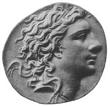
-120 The 165th Oympiad. Mithridates V Euergetes (d. -150) dies, and his son Mithridates VI the Great Eupator Dionysius (-135 to -63) becomes king of Pontus (until -63), with his mother Gespepyris as regent and real ruler (until -115). The Germanic Teutones (Teutoni) ("thiuda" = nation) tribe at the mouth of the Elbe River joins the Germanic (Celtic?) Cimbri tribe, who live in Chersonesus Cimbraica (Jutland Peninsula), and together they begin migrating S into Gaul. Mas'udu becomes king of Lihyan in N Arabia (until -100). Milestones are first used in the Roman Empire. Roman consuls: Gaius Papirius Carbo and Publius Manilius. Births: Roman statesman-gen. Marcus Aemilius Lepidus Senior (d. -77); father of Marcus Aemilius Lepidus Junior (-89 to -13) and Lucius Aemilius Lepidus Paullus. Roman corrupt praetor Gaius Verres (d. -43). Deaths: Green astronomer Hipparchus of Nicaea (b. -190) in Rhodes, Greece. Greek king of Pontus Mithridates V Euergetes (b. -150).
-119 Roman consuls: Lucius Aurelius Cotta and Lucius Caecilius Metullus Dematicus.
-118 Roman consuls: Quintus Marcius Rex and Marcus Porcius Cato Minor. Critolaus the Peripatetic (b. -200) dies, and Diodorus of Tyre and/or Erymneus become heads of the Peripatetic Lyceum in Athens, after which Roman influence pollutes it and the other Greek philosophical schools into becoming eclectic. Architecture: The Via Domitia connecting Rome to its Spanish provinces over the Col de Montgenevre Pass in the Alps is built by Gnaeus Domitius Ahenobarbus. Births: Roman historian (most learned man in Rome) Marcus Terentius Varro (d. -27) near Reate (modern-day Rieti). Deaths: Greek historian Polybius (b. -203). Greek philosopher Critolaus the Peripatetic (b. -200).
-117 Roman consuls: Lucius Caecilius Metellus Diadematus and Quintus Mucius Scaevola. Births: Egyptian king (-80 to -58, -55 to -51) Ptolemy XII Auletes ("the Flutist") Nothos ("the Bastard) (Ptolemy Neos Dionysos Theos Philopator Theos Philadelphos) (d. -51); son of Ptolemy IX Soter II and Cleopatra IV; father of Ptolemy XIII (-61 to -44) and Liz, er, Cleopatra VII (-69 to -30). Deaths: Chinese writer Sima Xiangru (b. -179). Chinese gen. Huo Qubing (b. -117) (plague).


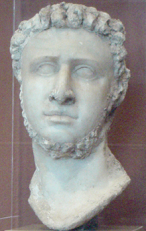
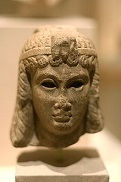

-116 The 166th Olympiad. Antiochus VIII Grypus is deposed and exiled by his maternal half-brother Antiochus IX Eusebes ("the Pious") Cyzicenus ("from Cyzicus"), son of Cleopatra Theo and Antiochus VII, who returns from exile in Cyzicus. Ptolemy VIII Physcon dies, leaving his power to Cleopatra III and any of his sons she might prefer, leaving Cyrene separately to his son Apion, and Cyprus to his son Ptolemy X Alexander I (-107 to -88), who vies for the throne with his other son Ptolemy IX Soter II Lathyrus (Lat. "chick pea") (d. -81); Cleopatra III expels Ptolemy X, and Ptolemy IX becomes king #9 of Egypt's 32nd (Ptolemaic) Dynasty as her co-regent; he marries his sister Cleopatra IV (-138 to -112), but mommy disapproves and replaces her next year with younger sister Cleopatra Selene I (-135 to -69) - kissy and scratchy, I like that? Cappadocian nobleman Gordius murders Ariarathes VI of Cappadocia at the orders of Mithridates VI of Pontus, after which his sister (Ariarathes VI's widow) Laodice rules until Nicomedes III of Bithynia seizes it and marries her, after which Mithradates expels him and restores Ariarathes VI's son Ariarathes VII Philometor ("mother-loving") (d. -101) to the throne of Cappadocia (until -101), with Laodice as regent. Julius Caesar's future uncle Gaius Marius (-157 to -86), son of a small pleb farmer near Arpinum works his way up to gov. of Farther (S) Spain, stopping bandits and becoming rich through mining investments - the Spanish learn the lesson well when they get to the New World? Roman consuls: Quintus Fabius Maximus Eburnus and Gaius Licinius Geta.
-115 Roman consuls: Marcus Aemilius Scaurus and Marcus Caecilius Metllus. Roman consul Marcus Aemilius Scaurus passes yet another sumptuary law to control extravagance - ah, we give up? The Roman census gives the pop. of the Roman Empire as 394,336. Mithridates V of Pontus deposes and imprisons his mother Gespaepyris, and kills off his brothers and marries his sister Laodice, making him a player in the struggle for power in Anatolia (Asia Minor) and the Black Sea, subjugating Colchis then taking on the Scythians under king Palacus, gaining the allegiance of Tauric Chersonesus and the Bosporan Kingdom in the Crimea in return for protection. About this year the flourishing Himyarite (Homerite) tribe of Yemen begins conquering all of S Arabia, moving the capital from Ma'rib to Zafar ("victory") (Redan) by 270 C.E., followed in 537 C.E. by Sana'a; sometime before 522 C.E. the last Yemenite king of Himyar (Homer) visits the oasis in Yathrib (Medina), and they kill his son, pissing him off and causing him to threaten to massacre the pop. and worse, cut down their palms, until two rabbis from the Jewish Banu Qurayza tribe come out and warn him that the town will one day be the home of the prophet of the Arab Quraysh tribe, converting him to Judaism, after which the rabbis do miracles in front of the Yemenis, converting them too; for some strange reason the rabbis recognize the Qaaba as built by Abraham, advising the Yemenis to circle it with shaved heads?; in 25 B.C.E. the Himyarites conquer neighboring Saba' (Sheba), followed in 200 C.E. by Qataban, in 280 C.E. by the Sabaeans, and in 300 C.E. by Hadramaut - sounds like Muslim fake history backdated after their takeover? The Chinese army crosses the Lop Nor dessert, occupies the Tarim basin, and imposes Chinese authority on local rulers. Births: Roman politician, military leader and richest man in Rome Marcus Licinius Crassus (d. -53) becomes rich by setting up the first fire dept. in Rome, which, because he's a Roman aristocrat, is only for putting out fires on his own property; arriving during a fire, he finds the panicked owner standing in front of his villa, and offers to buy it at fire sale prices, then puts out the fire using blankets soaked in vinegar, and fixes it up using his own crew of workers; when he really gets going he runs around to each neighbor and tells him how his villa is about to burn down, and picks them all up for a song too; he uses the money to buy political power, floating interest-free loans and leaning on the debtors for votes - the original Sir Laurence Olivier, greatest actor of his generation? Deaths: Roman gen. Quintus Caecilius Metellus Macedonicus (b. -210). Roman politician Publius Mucius Scaevola (b. ?); brother of Publius Licinius Crassus Dives Mucianus (-180 to -130).
-114 Roman consuls: Manius Acilius Balbus and Gaius Porcius Cato. Births: Roman orator Quintus Hortensius Hortalus (d. -50); known for his perfect memory, his widely-aped way of folding his toga, and his vast wealth and luxurious lifestyle; first to introduce peacocks as a table delicacy in Rome.

-113 Jugurtha (-160 to -104) usurps the throne of the Berber kingdom of Numidia in N Africa (until -104), sacking the capital city of Cirta, pissing-off Rome, which considered the monarchy a loyal ally since the Punic Wars. Ahnuld's ancestors are on the move? The Germanic Cimbri tribe flees Jutland after devastating storms, and reaches Celtic-run Noricum (Carinthia) in modern-day S Austria, coming into first contact with the Romans and winning several Vs, starting a long war allied with the Germanic (Celtic?) Teutons (Teuutones) and Ambrones (ends -101). Roman consuls: Gnaeus Papirius Carbo and Gaius Caecilius Metellus Caprarius.
-112 The 167th Olympiad. Rome declares war on Numidian king Jugurtha, starting the Jugurthine War (ends -106). The Getae of the N Danube River join the Celts to invade Roman possessions in the Balkans. Tripoli in Phoenicia gains the right to mint its own coins. Roman consuls: Lucius Calpurnius Piso Caesoninus and Marcus Livius Drusus.
-111 Antiochus VIII returns from exile, and divides the kingdom with Antiochus IX. The Agrarian Law is passed by the Roman Senate, recognizing that some lands are public while confirming the private land rights of many large landowners. China conquers Nam Viet AKA Viet Nam, ending the Trieu Dynasty (begun -208), and renaming the country Giao-Chi (Jiaozhi), ruling Vietnam for 1K years (until 938 C.E.). Roman consuls: Publius Cornelius Scipio Nasica Serapio and Lucius Calpurnius Bestia.
-110 Roman consuls: Spurius Postumius Albinus and Marcus Minucius Rufus. After claiming that he tried to kill her, Cleopatra III deposes her son Ptolemy IX Lathyrus and replaces him with Ptolemy X Alexander I, but grows tired of him and reverses the choice next year, then reverses the choice again in -107. The Jewish Himyarite Kingdom of Saba in Yemen is founded (ends 525 C.E.). Births: Jewish Pharisee sage Hillel (Heb. "greatly praised") the Elder (d. 10) in Babylon; direct descendant of King David; moves to Jerusalem around -70, spending 40 years in study, then becoming spiritual head of the Jewish people; father of Simeon (Shimon) ben Hillel; grandfather of Gamaliel the Elder (d. 52); great-grandfather of Simeon ben Gamaliel (-10 to 70). Roman Gen. Marcus Petreius (d. 46). Deaths: Chinese historian Sima Tan (b. -165) in Luoyang.

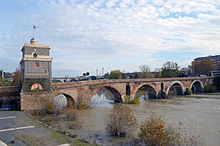
-109 Roman consuls: Quintus Caecilius Metellus Numidicus and Marcus Junius Silanus. Roman consul Quintus Caecilius Metellus Numidicus (-160 to -91) takes experienced military man Gaius Marius (-157 to -86) with him as his legate in his campaign against Jugurtha of Numidia, only to forcibly recalled in -197 by the actions of Marius, becoming his bitter enemy; Numidicus is accompanied to Numidia by his son Quintus Caeciliius Metellus Pius (-130 to -63); the Gracchian Period in Rome ends, and the Marius-Sula Period begins (ends -80). Aemilius Scaurus (-163 to -88) becomes Roman censor, building the Via Aemilia Scauri connecting Placentia, Genoa and Pisa; after the wooden version was built in 206 B.C.E. by consul Gaius Claudius Nero to celebrate the defeat of the Carthaginian army in the Battle of the Metaurus, Scaurus builds the stone Milvian Bridge (Ponte Milvio) across the Tiber River N of Rome; in 63 B.C.E. letters from the Cataline conspirators are intercepted here, allowing Cicero to read them to the Roman Senate the next day and blow their conspiracy; on Oct. 28, 312 C.E. Roman emperor Constantine I defeats his rival Maxentius in the Battle of the Milvian Bridge. Nonfiction: Sima Qian (-145 to -85), Records of the Grand Scribe (130 vols.) (-109 to -91); first universal history of China, covering from the Yellow Emperor to his time. Deaths: Greek Stoic philosopher Panaetius of Rhodes (b. -185).
-108 The 168th Olympiad. China conquers Korea. Roman consuls: Servius Sulpicius Galba and Lucius Hortensius. Births: Roman politician Lucius Sergius Catilina (AKA Catiline) (d. -62).

-107 Roman consuls: Lucius Cassius Longinus and Gaius Marius. The Helvetii cross the Jura Mts. after hearing reports of gold and plunder available in S Gaul and Rome, and defeat a Roman army. Roman statesman-gen. Gaius Marius (-157 to -86) becomes consul, enacting the Marian Reforms, reorganizing legions into separate cohors with landless citizens eligible for military service, and introducing Marius' mules,forked sticks he issues to his soldiers to carry their 50-60 lb. equipment packs in an effort to reduce the size of baggage trains, decreeing that the eagle will be the symbol of the Senate and people of Rome, allegedly because he found an eagle's nest with seven chicks in it as a teenie, predicting that he will be elected consul 7x, going on to become known as "the third founder of Rome". Durstus (d. -98) becomes king of Scotland.
-106 Roman consuls: Quintus Servilius Caepio and Gaeius Atilius Serranus. Tolosa (modern-day Toulouse) in Gaul, home of the Volcae Tectosages is raided by the Romans under Quintius Servilius Caepio, who pillage its temple before the Cimbri rout them, causing the proverb "Habet aurum Tolosanum" to be coined, referring to ill-gotten gains. Gaius Marius establishes the aquila (eagle) as the sole symbol of a Roman legion - how much did he save by switching to Geico? Births: Roman #1 gen and triumvir Gnaeus Pompeius Magnus (Pompey the Great) (d. -48) on Sept. 29 in Rome; father of Gnaeus Pompeius the Younger (-75 to -45) and Sextus Pompeius (-67 to -35). Roman politician-orator and eclectic (Stoic-Skeptic-Peripatetic) philosopher Marcus Tullius Cicero (Lat. "chickpea") (d. -43) on Jan. 3 in Arpinum; brother of Quintus Tullius Cicero (-102 to -43); born into a non-aristocratic family, he uses his brains and talent for oratory to achieve piece-of-the-pie imperium?
-105 Roman consuls: Publius Rutilius Rufus (-158 to -77) and Gnaeus Mallius Maximus. On Oct. 6 the Germanic Cimbri and Teutones wipe out two Roman consular armies at the Battle of Arausio (Orange) on the Rhone River, and remain in Gaul (until -102); after losing his sons in the battle, consul Gnaeus Mallius Maximus is impeached and placed under an "aquae et ignis interdictio" (denial of water and fire), and banished from Rome. Gaius Marius, assisted by Sulla defeats the Numidians after Jugurtha's father-in-law Bocchus I of Mauritania (land of the Mauri or Moors, in NW Africa) betrays him; Jugurtha is captured, paraded in Rome, and executed next year. Tripolis in Phoenicia is granted autonomy (until -64). Births: Roman mime writer Decimus Laberius (d. -43). Galatian Celtic king Deiotarus ("Divine Bull") I (d. -40). Indian king (legendary?) Vikramaditya (d. 15) in Ujjain. Greek historian Lucius Cornelius Alexander Polyhistor (of Miletus) (d. ?) in Miletus; taken POW by Lucius Cornelius Sulla, sold to Cornelius Lentulus, then freed, moving into a house in Laurentum, where he works so hard and so seldom leaves that it finally burns down, taking him with it?


-104 The 169th Olympiad. Roman consuls: Gaius Flavius Fimbria and Gaius Marius. Gaius Marius is elected consul for five years to combat the German threat. John Hyrcanus I dies after switching from the Pharisees to the Sadduccees, and is succeeded as Jewish high priest by his son Judah Aristobulus I (d. -103), becoming the first to take the title of king of the Jews who is not a descendant of David. UFOs are observed in Ameria (Amelia) and Tuder (Todi) in Umbria, Italy. Princess Tou Wan (Douwan) dies, and joins her husband Prince Liu Sheng (d. -141) in her own 208-piece jade suit, which is discovered in 1968; the immortality thing doesn't work, and she crumbles to dust? Architecture: A canal linking Arles to the Mediterranean Sea is built by the Romans. Deaths: African Numidian king Jugurtha (b. -160) in Rome (executed).
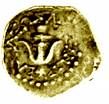

-103 Aristobulus I dies, and his brother Alexander Jannaeus (Jannai/Yannai) (nee Jonathan Alexander) (-126 to -76) succeeds him as Hasmonean king #2 of Judea (until -76), becoming the first to rule as high priest (until -78) as well as king; he offends the Pharisees by being pro-Hellene - and the Pharisees offend Jesus Christ by being pro-Roman? Rabbel I dies, and Aretas II (d. -96) becomes king of the Nabataeans (d. -96). The Cimbri ally with the Teutones again and decide to invade N Italy. Roman consul-gen. Gaius Marius builds a canal connecting the town of Arelas (Arelate) (Arles) in SE Gaul on the left bank of the Rhone River 45 mi. NW of Massilia (Marseille) to the sea, causing it to become a major trading center for the commerce of Gaul, eventually being settled by some of Caesar's legions and going on to pass Marseille and become the #2 wealthiest Roman city after Rome. Roman consuls: Lucius Aurelius Orestes and Gaius Marius. Deaths: Roman satirist (first) Gaius Lucilius (b. -180); leaves 30 books of Satires (Sermones) ("Conversations"), of which 1.3K framentary lines survive, and puts the Romans on their cloud of using trenchant invective, anecdote, dialogue, and fable forms to do as they say, not as they do?


-102 Roman consuls: Quintus Lutatius Catulus (d. -87) and Gaius Marius (-/157 to -86). Early in the year after driving them out of the Alps and causing them to retreat and make a stand on the far bank of the Adige River on the plain, the Cimbri defeat 20K Romans under Quintus Lutatius Catulus in the Battle of the Adige (Atiso) River Valley, after which the Cimbri capture their fort and admire Roman bravery so much that they let them go after taking an oath on a bronze bull and/or escape on their own and capture the bull as a prize, after which Catulus retreats to Rome before setting up another defensive position S of the Po River, while the Cimbri sack Venetia, with Cisalpine Gaul lost to Rome; meanwhile the Romans under consul-gen. Gaius Marius (-157 to -86) defeat and annihilate the Teutones and E Germanic Scirians (Scirii) ("pure-bloods") at the Battle of Aquae Sextiae (Aix-en-Provence) in Gaul (modern-day Aix-en-Provence), and Marius returns to Rome sans his army after hearing of Catulus' defeat, declining to celebrate a triumph; the Romans are surprised to see (naked?) Celtic women, almost as tall as the men, fighting fiercely alongside them - did they show off their bodacious tatas and fur patches? The Han Chinese under emperor Han Wu Di siege and capture Kokand in E Uzbekistan at the SE end of the Ferghana Valley from the Dayuan (Ta-Yuan). Births: Roman gen. Quintus Tullius Cicero (d. -43) in Arpinum (600 mi. SE of Rome); brother of Marcus Tullius Cicero (-106 to -43).
-101 Ptolemy X Alexander I murders his mother Cleopatra III and rules Egypt alone (until -88). Gaius Marius gains his 5th consulship, then with proconsul Quintus Lutatius Catulus defeats the Germanic Cimbri at the Battle of Vercellae (modern-day Vercelli) on the Raudine Plain in Cisalpine Gaul (N Italy); seeing the battle lost, the women kill their children and commit suicide rather than end up as Roman slaves, which doesn't prevent the Romans from killing 140K and capturing 60K incl. many women and children, many of whom join Spartacus in the Third Servile War of -73 to -71; the remaining descendants of the Cimbri and Teutones become the Audatici of Belgium, according to Julius Caesar. After Ariarathes VII gets pissed-off at his father's assassin Gordius, the latter's ally Mithridates VI of Pontus has him assassinated and replaced as king of Cappadocia by his 8-y.-o. son Ariarathes IX Eusebes Philopator (-117 to -89), with guess-who Gordius as regent; meanwhile the nobles of Cappadocia strike back and overthrow him, replacing him with Ariarathes VII's son Ariarathes VIII Epiphanes (until -96). Roman consuls: Manius Aquilius and Gaius Marius.







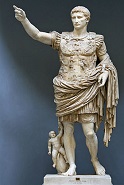

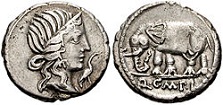





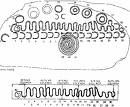
-100 The 170th Olympiad. Chinese Year: Monkey. Roman consuls: Lucius Valerius Flaccus and Gaius Marius (6th time). On Dec. 10 Lucius Appuleius Saturninus is elected tribune after his rival senator Gaius Memmius is beaten to death during a riot by the agents of pro-pleb anti-aristocrat praetor Gaius Servilius Glaucia and/or Saturninus' agents during the voting, after which he and Saturninus commit suicide; Quintus Caecilius Metellus Numidicus is banished from Rome by a conspiracy led by Saturninus and Gaius Marius, causing his son Quintus Caecilius Metellus Pius (-130 to -63) to begin a campaign to get him recalled in -98 by plebeian tribune Quintus Calidius, earning him the cognomen Pius. Mithridates (Mithradates) VI Eupator Megas (the Great) Eupator Dionysius (-135 to -63) of Pontus, having forced the Scythians to accept him as their overlord turns to Anatolia (Asia Minor), negotiating with Nicomedes III of Bithynia to partition Paphlagonia and Galatia; too bad, the pesky Romans are also moving in, and Nicomedes soon sells Mithridates out, causing them to begin a war over control of Cappadocia. In this cent. Ephesus becomes the world capital of the slave trade (till 100 C.E.). In this cent. the Germanic Suevi (Suebi) (Suavi) (Suevians) tribe occupies the region E of the Rhine River, incl. all of C Germany W of the Oder River to the Danube River, incl. the region of Brandenburg. About this time the Indo-European Yuezhi (Yuechi) (Rouzhi) people of C Asia cross the Oxus River, break Bactrian Greek power and contract them to the Hindu Kush and the upper Indus and Swat valleys in W India, where the Sakas (Scythians) and Scytho-Parthians, heretofore retreating from them make mincemeat of them, causing them to veer S, finally settling in NW India by -40, becoming the Kushanas, reaching their peak in the 3rd cent C.E. About this time the first Chinese ships reach the E coast of India. About this time the Irish Dark Age begins (ends 300 C.E.), a period of economic and cultural stagnation, partly caused by a mass export of slaves to Roman Britain? In this cent. Black Pig's Dyke is built by the Ulaid and Cruithin along the S border of SW Ulster and NE Connacht in Ireland. In this cent. the town of Budapest (modern-day pop. 1.8M) is built on the Gellert Hill in Pannonia (Hungary); they call it Ak Ink ("spring rich in water"). In this cent. the city of Tiahuanaco, 2.5 mi. above sea level in Bolivia on the Peruvian border flourishes (until 1000 C.E.). Until the time of the Caesars, all Romans are vegetarians, but later they go for dormice and oysters? - meatless pasta? By this cent. the ability to read ancient cuneiform is lost (until the 19th cent. C.E.). In this cent. Roman playwright Lucius Afranius flourishes, writing 20-30 comedies. In this cent. Jewish Pharisee sages Abtalion (Avtalyon) and Shmaya (Shemaia) (Shemaiah) flourish in Jerusalem; Jewish converts of Gentile descent, descendants of King Sennacherib of Assyria; students of Pharisee sage Simeon (Shimon) ben Shetach (Shatach) (d. -40); known as a zuggot (couple). In this cent. Decimus Laberius (-105 to -43) and Publius Syrus become the most famous Roman writers of mimes with flute accompaniments, the most popular form of Roman dramatic entertainment - read my lips, no new taxes? About this time Greek writer Timachidas of Rhodes flourishes, leaving a work titled "Deipna" (Dinners). In this decade Apicius thrives in Rome, becoming known for his love of luxury incl. good food, going on to get modest-living Roman statesman Publius Rutilius Rufus (-158 to -77) (great-uncle of Julius Caesar) expelled to Smyrna in 92; his name comes to mean gourmand or gourmet, esp. after his namesake Marcus Gavius Apicius (1st cent. C.E.) makes a name for himself, after which the name is used for cookbook titles for cents., incl. Apicius (5th cent. C.E.). In this cent. the Celts begin using the huge, smart, mean Irish Wolfhound as war dogs, for wild boar and wolf hunting, and dog fighting; they almost die out by the middle of the 19th cent. C.E. and are restored in a gentler version. About this time the Romans begin cultivating the apricot, originally found in China. In the time of Caesar the German father of the gods Woden (Oden) (Wodan) allegedly lives near the Sea of Azov, where he builds Asgard, the Garden of the Gods, then conquers N Europe, wanders the Earth seeking wisdom, selling an eye for a drink of the Well of Wisdom, and being scolded by Loki and ignored by Thor, going on to invent letters, teaching humans writing, poetry, arts, and law, and finally calling an assembly of Swedes and Goths and wounding himself in nine places so he could die and return to Asgard as a god; his son Baldur becomes the Norse Christ, enjoying an oath extracted by Frigga from all things that they won't injure him, causing weapons to bounce off, until mischievous Loki discovers that she neglected to extract an oath from mistletoe, and uses it to kill him, causing Baldur's wife Nep to die of a broken heart. Inventions: In this cent. Burmese women and men begin applying fragrant yellowish-white Thanaka paste (made from ground wood) to their skin for cosmetic, anti-sunburn and anti-fungal purposes - and as a shave cream? In this cent. the roller bearing is invented in Germany or France. By this cent. the Romans are using cement to construct buildings, incl. high-rise urban tenements, and vaulted and terraced sanctuaries, such as at Praeneste 23 mi. ESE of Rome. In this cent. (last cent.?) the Coligny Calendar, a 60 in. x 42 in. bronze plaque is made by the Celts in Gaul, displaying a lunar calendar where months begin with the full moon, off about 1.5 days every 30 years, compared to 0.25 days every 30 years for the Julian Calendar; days start at sunset, and each 15 nights is a Celtic week, either the bright week or the dark week; the new year starts on Nov. 1, when the Celts celebrate Samhain (Samain) (pr. SOW-in) (summer's end), burning bonfires after the harvest while wearing horrible masks to scare away the evil spirits of the dead, and getting off on burning thousands of men, women, and children alive in giant Wicker Man structures. Art: About this time Greek sculptor Agasias of Ephesus (son of Dositheus) sculpts the life-sized 78-in (199cm) Borghese Gladiator in Ephesus; found in 1610 in Anzio S of Rome in the ruins of a seaside palace of Emperor Nero on the site of ancient Antium. In this cent. the 6.7' (203 cm) statue of Venus de Milo on the Greek volcanic island of Milo (Melos) (most SW island of the Cyclades) is sculpted; discovered in 1820 C.E. In this cent. Buddhist cave temples are built in Dambulla in Ceylon (Sri Lanka), containing huge figures of Buddha. About this time the Great Stupa is built in Sanchi, India. Nonfiction: In this cent. the Septuagint (Lat. "seventy"), a Greek trans. of the Hebrew scriptures made by Hellenistic Jews in Alexandria (begun -275) is completed (by -50). About this time mysterious Greek writer Pseudo-Scymnus leaves the work Periodos to Nicomedes, a geography of the known world written in iambic trimeter and dedicated to a King Nicomedes of Bithynia. About this time the 8-vol. Charaka (Sansk. "wanderer") Samhita Sanskrit manual on Ayurveda medicine is written, stating that good medical practice requires a patient, physician, nurse, and medicines, with the physician's job being to "explore the dark interior of the body with the lamp of knowledge", requiring him to express joy and cheer towards those who can respond to treatment, masterfully avoid and save time in cases where the patient suffers from incurable disease, while being compassionate towards all; the nurse must be knowledgeable, skilled at preparing formulations and dosage, sympathetic towards everyone, and clean; the patient is responsible for being positive, have the ability to describe how he or she feels, and remember and respectfully follow the physician instructions. Births: Roman #1 gen.-dictator (epileptic) Gaius Julius (Gr. "child of Jove") Caesar (Lat. "hairy") (d. -44) on July 12/13 [Cancer]; first baby delivered by Caesarean Section; the name of the Roman month Quinctilis is changed in his honor; husband (-84 to -69) of Cornelia Minor (-97 to -69); father of Julia (-76 to -54). Roman equestrian plebeian statesman (gov. of Macedonia) Gaius Octavius (d. -59); husband of Atia Balba Caesonia (-85 to -43) (niece of Julius Caesar); father of Augustus (Octavian) (-63 to 14); a friend of the Jews. Roman gen. Titus Labienus (d. -45) (b. -99 or -98?). Judean gov. Antipater (Antipas) I the Idumean (Idumaean) (d. -43); husband of Cypros; father of Phasael, Herod I the Great (-73 to -4), Joseph, Pheroras, and Salome. Roman biographer Cornelius Nepos (d. -25) (b. -110?) in Hostilia (near Verona), Cisalpine Gaul.
-99 Roman consuls: Aulus Postumius Albinus and Marcus Antonius. Emperor Han Wu Di orders Li Ling to attack the Huns with only 5K soldiers; it must not have been enough, since he is badly defeated? Births: Roman Epicurean poet-philosopher Titus (Lat. "defender") Lucretius Carus (Lat. "beloved") (d. -55).
-98 On Apr. 9 emperor (since -158) Kaika (b. -208) dies at age 111 after a reign of 59 years, and Sujin (-148 to -30) becomes Japanese Yamato emperor #10 (until -30) - are all these longevity champ emperors like Rosemary's Baby? Evenus (Eugenius) I (d. -79) becomes king of the Picts (Scotland). Roman consuls: Quintus Caecilius Metellus Nepos and Titus Didius. Deaths: Japanese Yamato emperor #9 (-158 to -98) Kaika (b. -208) on Apr. 9; dies at age 111 after a reign of 59 years.
-97 Roman consuls: Gnaeus Cornelius Lentulus and Publius Licinus Crassus.


-96 Roman consuls: Gaius Cassius Longinus and Gnaeus Domitius Ahenobarbus. The 171st Olympiad. Antiochus VIII Grypus is murdered by his favorite Heracleon, and his claims are inherited by his son Seleucus VI Epiphanes Nicator (Gr. "god manifest conqueror") (d. -95), who becomes Seleucid king of Syria (until -95). Tigranes II the Great (-140 to -55) becomes king of Armenia (strategic high road between Parthia and Syria), and in -83 to -78 founds the S capital city of Tigranocerta (Tigranakert), populating it with colonists forceably relocated from Cappadocia, becoming the strongest state E of Rome. Ptolemy VIII Physcon's son Apion leaves Cyrene to Rome in his will, but it takes until -75 to annex it. Obodas I (d. -87) becomes king of the Nabataeans (until -87). Mithdridates VI the Great of Pontus defeats Ariarathes VIII and exiles him, then restores his son Ariarathes IX to the throne of Cappadocia, and sends an embassy to Rome to get him recognized, lying that he is really a son of Ariarathes VI and Laodice; too bad, the Romans don't buy it.








-95 Roman consuls: Lucius Licinius Crassus and Quintus Mucius Scaevola. New Roman consuls Lucius Licinius Crassus (-140 to -91) and Quintus Mucius Scaevola Pontifex (-140 to -82) obtain passage of the Lex Licinia Mucia, removing certain groups from the citizen rolls and banishing them for obtaining Roman citizenship "illegally", aggravating anti-Roman sentiment among its allies, leading to the Social War in -90. Seleucus VI defeats Antiochus IX near Antioch, and the latter commits suicide; Antiochus IX's son Antiochus X Eusebes Philopater ("pious father loving") (d. -93) defeats Seleucus VI, who flees to Cilicia and dies; Seleucus VI's brother (4th son of Antiochus VIII) Demetrius III Eucaerus (Gr. "well-timed") Philopator (d. -88) seizes Damascus; Antiochus VIII's sons Philip I Philadelphus and Antiochus XI Epiphanes Philadelphus continue the war, but Antiochus XI dies in the Orontes River, and Philip I continues the war with Antiochus X. The Romans grant liberty to the Cappadocians and authorize them to depose Ariarathes IX, but Mithridates VI the Great of Pontus fights back and takes over, then is thrown out and Ariarathes VIII restored; the Romans then offer them the chance to become a republic, but they turn it down, and after allowing to choose their own king pick Ariobarzanes I Philoromaios ("lover of Rome") (until -62). Gotarzes I (d. -87) assumes power over parts of Parthia in opposition to Mithradates II. Civil war rocks Judea (until -87), with the rebels supported by Seleucid king Demetrius III Eucareus attempting to overthrow Hasmonean king of Judah (since -103) Alexander Jannaeus; Nabataean king (-96 to -85) Obodas I (d. -85) defeats the Hasmoneans under Alexander Jannaeus at the Battle of the Golan Heights, then ambushes them E of the Sea of Galilee using camel cavalry, getting even for their loss of Gaza and forcing Moab and Gilead E of the Dead Sea to be returned. Births: Egyptian queen Cleopatra V Tryphaena (d. -57); wife of Ptolemy XII. Roman incorruptible statesman and Stoic philosopher Marcus Porcius Cato (Lat. "all-knowing") Uticensis the Younger (d. -46) in Rome; great-grandson of Cato the Elder (-234 to -149).
-94 Nicomedes III dies, and his son Nicomedes IV Philopator becomes king #9 (last) of Bithynia (until -74). 47-y.-o. Tigranes II the Great marries 16-y.-o. Cleopatra (Gr. "father's glory") of Pontus (-110 to -57), daughter of Mithridates VI of Pontus, cementing a Hellenic alliance between Armenia and Pontus, with an agreement for Tigranes to extend his empire to the E while Mithridates VI goes W (Anatolia and Europe). Roman consuls: Gaius Coelius Caldus and Lucius Domitius Ahenobarbus. Births: Chinese Western Han emperor (-87 to -74)Zhao Han Di (d. -74).
-93 Antiochus X is KIA while fighting the Parthians in Commagene, leaving Demetrius III Eucaerus and Philip I to fight for control of Syria. Civil war rocks Judea (until -87), with the rebels supported by Seleucid king Demetrius III Eucareus attempting to overthrow Hasmonean king of Judah (since -103) Alexander Jannaeus; Nabataean king (-96 to -87) Obodas I (d. -85) defeats the Hasmoneans under Alexander Jannaeus at the Battle of the Golan Heights, then ambushes Alexander Jannaeus E of the Sea of Galilee Roman consuls: Gaius Valerius Flaccus and Marcus Herennius. Births: Roman politician Publius Clodius Pulcher (d. -52) in Dec.; changes the spelling from Claudius to be more cool with the plebs, who he has adopt him.
-92 The 172nd Olympiad. Roman consuls: Gaius Claudius Pulcher and Marcus Perperna. The Romans aid Nicomedes III of Bithynia in defeating Mithridates VI of Pontus in Cappadocia again. Births: Roman Caesar assassin Gaius Trebonius (d. -43).
-91 Plebeian tribune Marcus Livius Drusus Junior (son of Marcus Livius Drusus Elder) proposes a comprehensive reform program incl. a grain and colony bill, mixed senatorial-equestrian juries, and Roman citizenship for Roman allies; too bad, he is murdered, his laws voided, and next year the allies, led by the Marsi begin the Roman Social War (Marsic War) (War of the Allies) (Italian War) (ends -88), forming their own Repub. of Italia, which declares war on Rome, even though Latin, Etruscan, and Umbrian communities remain loyal. UFOs in the form of golden orbs are seen in Spoletium in Umbria, Italy. Roman consuls: Sextus Julius Caesar and Lucius Marcius Philippus. Births: Chinese Han emperor (-74 to -49) Xuan (Xuandi) (Chin. "responsible") (Bingyi Liu) (d. -49); great-grandson of emperor Wu (-156 to -87). Deaths: Roman senator Quintus Caecilius Metellus Numidicus (b. -160) in Rome; dies after his son Quintus Caecillius Metellius Pius gets him returned from exile in -99, gaining the cognomen Pius for it. Roman orator Lucius Licinius Crassus (b. -140).




-90 Roman consuls: Lucius Julius Caesar and Publius Rutilius Lupus. Gaius Marius is driven out of Rome by Sulla. Socrates the Good (Chrestus), brother of Nicomedes IV of Bithynia allies with Mithridates VI the Great of Pontus and kicks his bro's butt, causing him to flee to Rome, after which the Romans intervene and restore him. Lucius Julius Caesar secures passage of the Lex Iulia (Julia), which grants citizenship to all Roman allies in Italy who have not joined the revolt, as well as to those who lay down their arms; they are enrolled in only eight tribes to reduce their voting power; the pop. of the summer resort town of Tivoli (18 mi. NE of Rome) acquires Roman citizenship. Orodes I (d. -77), son of Mithridates II expels Gotarzes I and reunites the Parthian Empire. Alexander Jannaeus builds the hilltop fortress of Machaerus at Mukawir, 15 mi. SE of the mouth of the Jordan River E of the Dead Sea (known as the place where Salome danced and demanded John the Baptist's head on a platter). The original National Greekographic? Greek Stoic polymath philosopher-historian Posidonius "the Athlete" of Apamea (Rhodes) (-135 to -51) sets out on a mission to visit the "wild" Celts of the forests and mountains of W Europe, producing his History of the Wild Celts (later lost), which becomes a Roman bestseller; he says that the Celts are sophisticated people who perform highly ritualized human sacrifice, compose beautiful poetry, and give their Celtic women greater freedom than even the Romans (incl. the right to be a warrior), and falsely claims that they are cannibals; Caesar reads it and now knows what his life work will be, namely, to kill or enslave them all and steal everything they've got to make himself a millionaire and big man who's spread civilization to the less fortunate?; once nice thing, the Celts have no written language, so the survivors won't later stink Rome up with bestselling exposes? Births: Roman consul Aulus Hirtius (d. -43). Greek historian Diodorus Siculus (of Sicily) (d. -21) in Agyrium, Sicily.
-89 The Roman army led by Sulla regains control of Italy; Strabo and Sulla celebrate triumphs abroad in Rome; the war drags on until next year, with 50K KIA on each side and Italy devastated. All free inhabitants of Italy become Roman citizens; Verona becomes a Roman colony, and a municipium in -49; the Venice-like Etruscan marshy lagoon city of Ravenna is accepted as a federated town. Roman consuls: Gnaeius Pompeius Strabo and Lucius Porcius Cato. Births: Roman patrician and triumvir (last pontifex maximus of the Roman Repub. )Marcus Aemilius Lepidus Junior (d. -13); son of Marcus Aemilius Lepidus Senior (-120 to -77); brother of Lucius Aemilius Lepidus Paullus.



-88 The 173rd Olympiad. The Roman Social War (begun -90) ends. Demetrius III Eucerus is captured and killed by the Parthians, leaving Philip I as sole ruler of Syria, but Antiochus XII Dionysus (d. -84), a son of Antiochus VIII claims the throne of Syria and seizes Damascus; Mithradates II the Great of Parthia dies after defeating the Scythians along with Artavasdes, king of Armenia Major and stabilizing the kingdom's E boundaries; too bad, Tigranes II the Great of Armenia sees his chance, invading Parthia and devastating Nineveh (Ninus) and Arbela. After Rome puts him up to it, Nicomedes IV of Bithynia raids the territory of Mithridates VI the Great of Pontus, and gets his butt kicked, causing him to flee to Rome again, after which Mithridates VI signs a decree at Ephesus ordering all Romans in Asia put to death, causing 80K-100K to be massacred, launching the First Mithridatic War (ends -85); Pergamum joins the revolt against Rome, causing Marc Antony to later (-40) give its beloved library to rival Alexandria; Lucius Cornelius Sulla Felix (-138 to -78) becomes consul of Rome and is placed in command of the war against Mithridates VI; when Marius aces him out of the job with the help of Roman tribune Sulpicius Rufus, Sulla marches on and seizes Rome, kills Sulpicius and exiles Marius to Africa, beginning the "royal rule of Sulla"; he then marches on Greece after Athens rises against Roman rule, and Epicurean philosopher Aristion (Athenion?) (d. -86) is elected ruler of Athens (until -86). The people of Alexandria expel Ptolemy IX Alexander I for having too close ties with the Jews, and restore his exiled brother Ptolemy IX Soter II Lathyrus (d. -81), who in Oct. defeats Ptolemy X Alexander and becomes the 10th king of Egypt's 32nd (Ptolemaic) Dynasty (until -80); Ptolemy IX then marries his daughter Cleopatra Berenice III (-120 to -80) to legitimize his rule, and in Dec. he defeats and kills Gen. Chaereas. The E Iranian nomadic Sakas (Shakas) (displaced Scythians) come through the Bolan Pass and occupy the entire Indus River region as far E as Mathura, led by Zeus-worshiping Saka king Maues (Moga) (d. -60), who grants tolerance to Buddhism and Hinduism; he goes on to conquer Indus River cities incl. Taxila in Punjab and the Gandharas capital Pushkalavati; his queen is Machene. Roman consuls: Lucius Cornelius Sulla and Quintius Pompeius Rufus. Deaths: Roman politician Quintus Mucius Scaevola Augur (b. -159).


-87 Roman consuls: Lucius Cornelius Cinna and Gnaeus Octavius. On Mar. 29 emperor (since Mar. 9, 141) Han Wu Di (b. -156) dies, and Han Zhao Di (-94 to -74) becomes Xi Han emperor #8 of China. On Aug. 6 Chinese astronomers record seeing Halley's Comet; Tigranes II the Great of Armenia puts a symbol on his crown featuring a star with a curved tail, indicating that he saw it too? Lucius Cornelius Cinna (d. -84) becomes consul, but his pushing of the Sulpicinian voting rights measure results in riots, followed by expulsion from Rome; he asks Marius for aid, and the latter lands in Etruria, raises an army, sacks Ostia and captures Rome; Sulla's supporters are executed. Roman gen. Lucius Cornelius Sulla forces Mithridates VI out of Greece and recovers most of it, sieging Athens and Piraeus in the fall (until Mar. 1, -86); Sulla supporter Quintus Lutatius Catulus commits suicide after being persecuted by Marius' supporters; Athinias becomes the 61st and last elected ruler of the republic of once great but doomed Athens, which is in anarchy. After winning a 6-year civil war against Seleucid king Demetrius III Eucaerus, Hasmonean ruler Alexander Jannaeus crucifies 800 mostly Pharisee Jewish rebels in Jerusalem after having their wives and children executed in front of them while he dines with his concubines. Obodas I dies, and his brother Aretas III (d. -62) becomes king of the Nabataeans. Births: Roman poet Gaius Valerius Catullus (d. -54). Deaths: Roman dramatist Lucius Accius (b. -170). Chinese emperor (-141 to -87) Han Wu Di (b. -156) on Mar. 29 in Chang'an. Roman orator Marcus Antonius (b. -140). Nabataean king (-96 to -87) Obodas I (b. ?); buried in the Negev in a placed named Avdat in his honor; his big Vs over the Hasmoneans and Greeks cause his people to start worshiping him as a god.

-86 The Roman census gives the pop. of the Roman Empire as 463K. In Jan. after Marius and Cinna are elected consuls for Rome, Marius goes mad, begins a massacre, and dies suddenly, and is replaced by Lucius Valerius Flaccus. On Mar. 1 after Aristion burns the Odeum so that they can't use its timber for storming the Acropolis, the Romans under Sulla capture and sack Athens, kill Aristion, and destroy most of the buildings and fortifications, stealing anything they can get their hands on, leaving Greece in ruins; one good thing, Sulla turns onto the Greek tripartite cult of Isis, Horus, and Osirus (Serapis), and introduces it into Rome, where it catches on and becomes one of the most popular cults, although later consuls are forced to curb its licentious priestly rites - a big black lady stops the show? A Roman embassy returns impressed with Egypt's apparent wealth. The Seleucids under Antiochus XII Dionysus invade Nabataea. Births: Roman Gen. Gaius (Caius) Cassius Longinus (d. -42) on Oct. 3; brother-in-law of Marcus Junius Brutus. Roman historian-politician Sallust (Gaius Sallustius Crispus) (d. -35) in Amiternum. Deaths: Roman gen. Marius (b. -157) in Jan. Chinese Han Dynasty eunuch historian Sima Qian (b. -145); dies after being castrated in -99 for urging the emperor to go light on defeated Gen. Li Ling, becoming the 2nd person to write Chinese history, leaving Records of the Grand Historian (Chin. "Shiji" = Scribe's Records) (130 vols.) (526K Chinese chars.), the first universal history of China, covering 2.5K years from the Yellow Emperor to Han Emperor Wu, presented as a series of bios., which were started by his royal astrologer (-140 to -110) father Sima Tan (Ssu-ma T'an) (-165 to -110).

-85 Roman consuls: Cinna and Gnaeus Papirius Carbo (-130 to -82) (Marius' #1 general). The Romans sack Thebes. The First Mithridatic War (begun -88) ends with Mithridates VI suing for peace and being allowed to remain king of Pontus as a Roman vassal after paying a heavy fine; brain man Lucius Cornelius Alexander Polyhistor (of Miletus) (-105 to -35) is captured by Sulla during the war and brought back to Rome to become his children's tutor, going on to become the TLW of the 1st cent. B.C.E., living like a hermit and churning out a giant Historyscope in his house in Laurentum, working hard and seldom leaving it until it finally burns down, taking him with it, along with his work - what's bothering me, what's bothering me, what's bothering me? Inventions: A seed-planting machine is invented in China - by Je-to-tul? Births: Numidian king (-60 to -46) Juba I (d. -46); son of Hiempsal II; father of Juba II (-52 to 23). Roman politician-gen. (Caesar assassin) Decimus Junius Brutus Albinus (d. -43) on Apr. 27 (b. -81?); son of Decimus Junius Brutus and Sempronia Tuditani; distant cousin (son?) of his prey Julius Caesar; adopted by Aulus Postumius Albinus; called Decius in Shakespeare's "Julius Caesar". Roman aristocratic senator "Et tu, Brute" (Caesar assassin) Marcus Junius (Quintus Servilius Caepio) Brutus (d. -42) in Rome; Cato's nephew and son-in-law; distant cousin (son?) of Julius Caesar. Roman breed mare Atia Balba Caesonia (d. -43); niece of Julius Caesar (daughter of his sister Julia Caesaris); wife of Gaius Octavius (-100 to -59); mother of Augustus (Octavian) (-63 to 14) and Octavia Minor (-69 to 11) - atta baby, make me a Caesar son? Roman gen. Tiberius Claudius Nero (d. -33); son of Drusus Claudius Nero I (b. -105); descendant of Appius Claudius Caecus (-340 to -273); husband of Livia Drusilla (-58 to -29); father of Tiberius (-42 to 37) and Nero Claudius Drusus (-38 to -9); grandfather of Germanicus (-16 to 19), Julius Caesar Drusis (-13 to 23), Livia Julua (-13 to 31), and Claudius; great-grandfather of Caligula (12-41); great-great-grandfather of Nero (15-68). Deaths: Chinese sage Ssuma Ch'ien (b. -145); leaves the Shih Chi (Historical Record) - raw history?
-84 The 174th Olympiad. Roman consuls: Lucius Cornelius Cinna and Gnaeus Papirius Carbo. Sulla recaptures Ephesus and slaughters all the leaders of the rebellion; Cinna is KIA in a mutiny. Nicomedes IV is restored to the throne of Bithynia, and Rome increases its control. The Battle of Canada S of the Dead Sea is a V for the Nabataeans under Aretas III; Antiochus XII Dionysus is KIA, and his army flees and dies of starvation in the desert; the Nabataeans go on to conquer Damascus. Julius Caesar marries Cornelia (Lat. "like a horn") Minor (-97 to -69), daughter of his uncle Gaius Marius' partner Lucius Cornelius Cinna, making him a member of the Populares (popular party).

-83 Roman consuls: Lucius Cornelius Scipio Asiaticus and Gaius Norbanus. After an insurrection expels Philip I from Antioch, Tigranes II the Great of Armenia is invited to take the throne of Syria (until -69), conquering Phoenicia and Cilicia, ending the Seleucid Empire (begun -323); Tigranes II the ahem, Great now rules an empire stretching from the Caspian Sea to the Mediterranean Sea, bordered by the Kingdom of Pontus on the N and the Parthian Empire on the S, and takes the title of king of kings, never appearing in public without four kings attending him, and causing Cicero to utter the soundbyte: "He made the Republic of Rome tremble before the prowess of his arms"; his S border reaches to Ptolemais (Akko), and his NW border to the Pontic Alps in NE Asia Minor; he becomes the first Armenia ruler to mint coins, with Big KOK wearing an Armenian tiara with ear flaps, and Tyche (Fortuna) of Antioch on the reverse, with river god Orontes at her feet. Speaking of great? Handsome Roman gen. Gnaeus Pompeius Magnus (Pompey the Great) (-106 to -48) (who supposedly resembles the statues of Alexander the Great) campaigns successfully in Africa, then demands a triumph, but old Sulla balks until Pompey threatens to go to the people and the army, commenting "More people kneel to the rising sun than to the setting Sun", causing Sulla to relent; Pompey tries to enter Rome with a chariot drawn by a pair of elephants, but has to switch to the usual four horses when they can't squeeze through the city gates; he chooses his own title of Pompey the Great, after Alexander the Great, causing rival Marcus Licinius Crassus to ask, "Great compared to what?" The Temple of Jupiter on the Capitoline Hill in Rome is destroyed by fire. Births: Roman military leader and gonad slave Marc (Mark) Antony (Marcus Antonius) (Lat. "invaluable") (d. -30) on Jan. 14 in Rome.
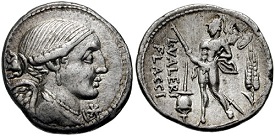


-82 Roman consuls: Gnaeus Papirius Carbo and Gaius Marius. Sulla having been declared enemy of the people in Rome, suffect consuul Lucius Valerius Flaccus (d. -85) (serving out the term of Gaius Marius) is sent to replace him, but is killed by his lieutenant, and Sulla begins a march on Rome from Brundisium; Sulla's opponents in Sicily are defeated by Pompey; the V at the Battle of the Colline Gate on Nov. 1 and the fall of Praeneste end the internal war, with Sulla victorious over the younger Marius; Marcus Licinius Crassus (-115 to -53) commands the left wing of Sulla's army at the Colline Gate; as an enemy of his uncle Gaius Marius, Sulla orders Julius Caesar to divorce Cornelia, but he refuses and leaves Rome. Roman gen. Quintus Sertorius (-123 to -72), leader of the Marians ("the new Hannibal") begins a revolt in Spain (ends -72), and establishes a Roman-style senate of 300 members, becoming popular with the natives, who present him with a white fawn, which allegedly gives him advice straight from goddess Diana. The Getae and Dacians form a large state between the middle Danube River and the Bug River from the Black Sea to the Pannonian Plains under new king Burebista (d. -44) of the Gaetae. Architecture: The oldest extant amphitheater at Pompeii is built. Births: Gallic Celtic chieftain Vercingetorix (d. -46). Deaths: Roman jurist Quintus Mucius Scaevola Pontifex (b. -140); assassinated in the Temple of the Vestal Virgins, becoming the first Roman pontifex maximus to be publicly murdered; leaves 80 vols. of Roman civil law codes organized by Greek logical categories.
-81 Sulla is appointed Roman dictator for life, and chooses the name Felix, meaning lucky; he then begins enacting constitutional reforms - get in the zone, Auto Zone? In Dec. Ptolemy X Alexander dies, and his daughter-wife Cleopatra Berenice III (-120 to -80) (daughter of Ptolemy IX Lathyrus and Cleopatra Selene I) becomes king #11 of Egypt's 32nd (Ptolemaic) Dynasty (until -80); Ptolemy IX reclaims the throne, but dies at the end of the year, and she goes on to rule for 6 mo., becoming popular with the people. Roman consuls: Gnaeus Cornelius Dolabella and Marcus Tullus Decula.


-80 The 175th Olympiad. Roman gen. Sulla appoints Ptolemy XI Alexander II (d. -80) as king #12 of Egypt's 32nd (Ptolemaic) Dynasty, and his older stepmother Cleopatra Berenice II is forced to marry him, but 19 days later he murders her, causing an angry Alexandrian mob to lynch him, and Ptolemy IX's llegitimate son (by an Alexandrian Greek concubine) Ptolemy XII Neos Dionysos Theos Philopator Auletes (Gr. "flute player") Nothos (Gr. "bastard") (-117 to -51) becomes king #13 of Egypt's 32nd (Ptolemaic) Dynasty (until -58), marrying his sister Tryphaena, who becomes Cleopatra V Tryphaena (-95 to -57). Sulla conquers the Oscan-Samnite town of Pompeii; he also plunders Faesulae (Fiesole) and establishes a military colony there. Julius Caesar becomes an ambassador to the court of Nicomedes IV of Bithynia, allegedly becoming lovers, causing Caesar to become known as the "queen of Bithynia", which is later used to slam him. Roman gen. Quintus Sertorius begins the Sertorian War (ends -72) against dictator Sulla, and (in -57?) captures Ebora (Evora) (Évora) (Gael. "of the yew trees") (AKA Liberalitas Julia) (modern-day pop. 56K) in Portugal 68 mi. SE of Lisbon, where a Roman aqueduct and temple of Diana are later built, organizing the tribes of Hispania and Lusitania to form an independent province and launch guerrilla war; Julius Caesar later renames the 8th cent. B.C.E. settlement of Olissipo (Lisbon) (Phoenician "Alis-Ubo" = safe harbor) in the Tagus River estuary (modern-day pop. 545K/2.8M) (allegedly founded by Odysseus on his way home from Troy) to Felicitas Julia. About this time the town of Durocorteron (Durocortorum) ("round fortress") 80 mi. ENE of Paris is founded as the capital of the Gallic Remi tribe, who go on to ally with Julius Caesar in his conquest of Gaul in -58 to -51, receiving special favors, reaching a pop. of 30K-100K; it later becomes the city of Reims (Rheims) (modern-day pop. 187K). About this time the inscription SPQR (Senatus Populusque Romanus) (the Senate and People of Rome) begins appearing on Roman monuments. About this time the Anteclassical Age of Latin (begun -240) ends, and the Golden Age of Latin begins (ends 14), known for poets like Maro, Flaccusm, and Naso (Virgil, Horace, and Ovid). Roman consuls: Lucius Cornelius Sulla and Quintus Caecilius Metellus Pius.
-79 Sulla (d. -78) resigns after his constitutional reforms are enacted - when else has a dictator just decided to quit? Evenus I is killed by his bastard son Gillus (d. -77), who usurps the crown and becomes king of the Picts. Lucullus imports the first cherry trees from Asia Minor to Rome about this year. Roman consuls: Appius Claudius Pulcher and Publius Servilius Vatia.
-78 Roman consuls: Marcus Aemilius Lepidus Senior and Quintus Lutatius Catulus. Sulla (b. -138) dies, and Marcus Aemilius Lepidus Senior (-120 to -77) becomes consul with backing by Pompey, and works for the Populares, seeking to undo Sulla's reforms; he tries to prevent Sulla from being buried in the Campus Martius but Pompey overrides him; after consuls he gets in a catfight with co-consul Catulus, the Senate steps in and makes them swear not to fight, then sends Lepidus to become gov. of Cisalpine Gaul, where he raises an army, hoping to return with it; meanwhile he pardons those exiled by Sulla, tipping-off the Senate that he's trying to foment a civil war; meanwhile Julius Caesar returns to Rome. The German Marcomanni tribe (a Suevic people) occupies modern-day Bohemia. The custom of stretching canvas above a Roman theater is introduced. Deaths: Roman gen. Sulla (b. -138) in Puteoli, Campania (near the Solfatara sulfur field); dies of a fever while writing his memoirs.

-77 Orodes I dies, and former king (-93 to -87) Sinatruces (Sinatruk) (-157 to -70), brother of Mithradates II becomes the king #9 of Parthia, reestablishing the order of succession. Roman aristocrat Lucius Sergius Catilina (AKA Catiline) (-108 to -62) becomes quaestor - launching a leaving on a jet plane don't know when I'll be back again oh baby I hate to go career? Marcus Aemilius Lepidus Senior is recalled from Cisaline Gaul, and does the expected, returning with an army, but he is defeated and killed by his optimate co-consul Quintus Lutatius Catulus with the help of Pompey the Great at the Campus Martius; Lepidus' partner, Marcus Junius Brutus (father of Caesar's murderer) remains in the fortified city of Mutina (modern-day Modena) in Italy, and Pompey marches to fight him, but the surrenders without a fight after being starved out, and Brutus Sr. flees to Regium Lepidi, where is killed by Pompey's man Geminus; Pompey then goes to Spain to quell the Marian revolt; meanwhile Roman gen. Marcus Perpenna Vento (d -72) brings a Roman army and a flock of Roman nobles to join Quintus Sertorius in Hispania, and when Pompey arrives, big man Sertorius calls him Sulla's schoolboy, and raises the city of Lauron (a Roman ally) in full view of Pompey's helpless army, then in -75 almost captures the sucker Pompey at the indecisive Battle of Sucro, then in -75 fights another indecisive battle against the united forces of Pompey and Metellus at the Battle of Saguntum in E Spain, causing Pompey to request reinforcements from Rome. Evenus II (d. -60) becomes king of the Picts (until -60). Julius Caesar leaves Rome again to go to Rhodes to study rhetoric under anti-Semitic Anatolian-born rhetoric king Apollonius Molon (Molo of Rhodes), teacher of glib Cicero (-106 to -43), whose motto is "Delivery, delivery, delivery" - that makes Caesar a Rhodes scholar? Roman consuls: Mamercus Aemilius Lepidus Livianus and Decimius Junius Brutus. Deaths: Roman statesman Publius Rutilius Rufus (b. -158) in Smyrna. Roman statesman-gen. Marcus Aemilius Lepidus (b. -120). Parthian king Orodes I.


-76 The 176th Olympiad. Alexander Jannaeus (b. -126) dies, and is succeeded by his wife Salome (Shelamzion) Alexandra (-139 to -67), who designates her eldest son Hyrcanus II (d. -30) as high priest but rules as queen (2nd in Jewish history), and allies herself with the Pharisees (her hubby was a Sadducee), making her reign their high point. The Romans under Quinntus Sertorius destroy the Iberian town of Edeta N of modern-day Valencia, Spain on top of Sant Miquel hill, building a new city at the bottom of the hill, which becomes Lliria (LlĂria). Roman consuls: Gnaeus Octavius and Gaius Scribonius Curio. Births: Roman orator-poet-historian Gaius Asinius Pollio (d. 5).
-75 Roman consuls: Gaius Aurelius Cotta and Lucius Octavius. Mithridates VI of Pontus takes advantage of the revolt in Hispania to invade Phrygia, and is stopped by the Romans. Julius Caesar is taken hostage by pirates on the Aegean Sea and held for ransom for more than 1 mo. Roman proconsul of Macedonia Gaius "Quintus" Scribonius Curio (-90 to -49) invades the Balkan Peninsula, going as far as the Danube River, driving out the Scordisci, Dardanians, Dacians, and other tribes, then returning without garrisoning the area. Vasudeva (d. -66), minister of last Shunga ruler (since -83) Devabhuti assassinates him, ending the Shunga Dynasty (begun -185) and founding the Kanva Dynasty (ends -30) after disguising a daughter of his slave woman as his queen to claim the throne, ruling from Magadha in E India while minting coins in Vidisha in C India; Vasudeva goes on to become a patron of the arts; he is succeeded by Bhumimitra (-66 to -52), Narayana (-52 to -40), and Susarman (-40 to -30). Births: Roman politician gen. Gnaeus Pompeius the Younger (d. -45); elder son of Pompey the Great (-106 to -48) and 3rd wife Mucia Tertia; brother of Sextius Popeius (-67 to -35). Chinese Han emperor (-48 to -33) Yuan (Yuandi) (Chin. "discerning") (Shi Liu) (d. -33). Roman prefect of Egypt Gaius (Publius) Petronius (d. -19).
-74 Roman consuls: Marcus Aurelius Cotta and Lucius Licinius Lucullus. Roman ally Nicomedes IV dies, bequeathing the kingdom of Bithynia in NW Asia Minor to Rome, and it becomes a Roman province, incl. Pamphylia, Lycia and the S part of wild Pisidia (SW Galatia N of the Taurus Mts.); the N part of Pisidia remains part of Galatia; the city of Antioch near the border between Pisidia and Phyriga comes live into the view. Mithridates VI of Pontus invades Phrygia again, and sieges the Roman-controlled town of Cyzicus, after which the Romans under Lucius Licinius Lucullus (-118 to -56) (known for his wealth and luxury and for commanding the Roman fleet) arrive and defeat him at the Siege (Battle) of Cyzicus; he then invades up-for-grabs Bithynia and defeats Murena, starting the Third Mithridatic War (ends -63); meanwhile Pontian troops under Eumachus invade Phrygia, and are driven out by Celtic Roman ally Deiotarus (Deiotaros) ("Divine Bull") Philoromaios ("lover of Rome") I (-105 to -40) of Galatia. Cyrene is annexed by Rome. The Basque tribes of Navarre on the S slopes of the W Pyrenees in Iberia (the easiest side to cross the Pyrenees into Gaul) are conquered by the Romans, becoming part of the Roman province of Hispania Citerior ("Nearer Spain"), later Tarraconensis and Caesaraugustanus. Han Zhao Di (b. -94) dies without an heir, and on July 18-Aug. 14 Prince Liu He of Changyi (d. -59) becomes Xi Han emperor #9 for 47 days before being deposed and labelled the Marquess of Haihun (Chin. "maritime incompetence") by minister Huo Guang (d. -68) for the good of the state (first deposition in Chinese history), and rags-to-riches commoner Xuan (-91 to -49), whose grandfather Liu Ju committed suicide after being accused of witchcraft in -91 becomes Xi Han emperor #10 of China (until -49), going on to lower taxes and open up the govt. and fill it with capable ministers. Deaths: Chinese Western Han emperor (-87 to -74) Han Zhao Di (b. -94).

-73 Roman Thracian slave Spartacus (-109 to -71) revolts from his Roman gladiatorial school owner Lentulus Batiatus in Capua near Mt. Vesuvius, and gathers a slave army of 70K men led by 70-80 gladiators in Campania to stomp noble Roman butt and steal from the rich to give to the poor, starting the Third Servile War (ends -71), while romancing non-frigid slave babe Varinia to Aram Khachaturian's stirring Adagio from Spartacus and Phrygia? Julius Caesar returns to Rome. Mithridates V the Great of Pontus is defeated again by the Romans under Lucius Lucullus at the Battle of the Rhyndacus River in NW Asia Minor, and he is made gov. of the Roman province of Cilicia, continuing the war for eight years while trying to keep his soldiers from rebelling from his harsh discipline. Roman consuls: Gaius Cassius Longinus and Marcus Terentius Varro Lucullus. Births: Judean king (-39 to -4) Herod I the Great (d. -4) in Idumea; 2nd son of Antipater I the Idumean and Cypros (a Nabatean); husband of Doris, Mariamne I, Mariamne II, Malthace, Cleopatra of Jerusalem; father of Antipater II, Prince Alexander, Prince Aristobulus IV, Princess Salampsio, Herod Philip I, Herod Antipas, Herod Archelaus, Olympias the Herodian, Prince Herod, and Herod Philip II.

-72 The 177th Olympiad. Roman consuls: Gnaeus Cornelius Lentulus Clodianus and Lucius Gellius Publicola. The slave revolt of Spartacus reaches its zenith, with his slave army reaching 120K men, and after two attempts to breach the Alps negotiating with Cilician pirates of coastal S Asia Minor N of Cyprus; Cato the Younger (-95 to -46) volunteers to fight in the Roman army against Spartacus to support his brother Ceapio, a tribune working for proconsul Lucius Gellius Poplicola (Lat. "friend of the people"), the cmdr. who has scored the biggest V against Spartacus so far. Roman rebel gen. Quintus Sertorius is assassinated at a banquet by jealous Roman officers led by Perpenna Vento, and the Marian revolt in Spain is quashed by Pompey and Metellus, ending the emerging independent Roman republic in Hispania. The Romans launch a retaliatory strike against the Getae (Getae) (Gets) (Goths?) across the Lower Danube River, but become "frightened by the darkness of the forests" and withdraw; the original Goths come from the 1.2K-sq.-mi. island (biggest in the Baltic) of Gotland (Gottland) (Gothland) 44 mi. off the SE coast of Sweden? The Suevi (Suebi) (Sueves) (Suevians) (Suavi), a tribe from Germany (Upper Saxony) between the Oder and Elbe Rivers (Lusace), known for their Sonnenwald (sacred wood of the Semnones), human sacrifices, topknots, and superior valor cross the Upper Rhine (Rhein) under King Ariovistus and invade Gaul (Gallia). A Roman army led by proconsul of Macedonia Marcus Terensius Varro Lucullus defeat the Bessi in Thrace, with Strabo later calling them the fiercest of the independent Thracian tribes dwelling on and around Mt. Haemus, "brigands among brigands" who are "addicted to plunder"; their capital is in Sinotova (near modern-day Pazardzhik, Bulgaria). Deaths: Roman statesman gen. Quintus Sertorius (b. -123) (assassinated at a banquet by Marcus Perpenna Vento while on the verge of establishing an independent Roman repub. in Hispania, after which Pompey and Metullus crush his army).


-71 Roman consuls: Publius Cornelius Lentulus Sura (d. -63) and Gnaeus Aufidius Orestes. After building a 40-mi.-long system of ditches and walls to fence them in, the Third Servile War (begun -73) is put down by six legions (32K men) Gen. Pompey the Great (Gnaeus Pompeius Magnus) and Sen. Laurence Olivier, er, Marcus Licinius Crassus (-115 to -53) ("Some people like oysters and some people like snails; I like both oysters and snails, how about you, handsome?") in S Italy near the headwaters of the Siler River; Spartacus slays his horse at the start of the battle, declaring that if he wins he will have many Roman horses to choose from, and if he loses he won't need one; Crassus' army crushes Spartacus' main force of 50K while losing only 1K+, and drives the 5K stragglers into Pompey's army; Spartacus is wounded in one leg and drops to his knees, fighting until he is KIA, after which is body is never found; 6K slaves are taken POW and crucified along the Appian Way from Capua to Rome - I'm Spartacus! I'm Spartacus? Everybody's Spartacus? Hmmm... His unjust death judges Rome itself, making him the first Christ? Births: Chinese empress (-48 to -33) Wang Zhengjun (Ziaoyuan) (d. 13) in Yuancheng (modern-day Handan), Heibi.

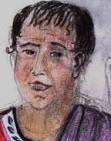

-70 Roman consuls: Marcus Licinius Crassus and Gnaeus Pompeius Magnus. The Roman census gives the pop. of the Roman Empire as 910K. Pompey the Great and Marcus Licinius Crassus, heroes of the Servile War are elected as consuls, although Pompey takes all the credit and rides in a triumphal procession while Crassus watches (while his fire dept. hoses him down?); Gaius Octavius (-100 to -59) (father of Emperor Augustus) is elected questor; the Roman Repub. begins collapsing, and is superseded by military dictatorships, ending with emperor you know who by -30. Sinatruces dies, and his son Phraates III (d. -57) becomes king #10 of Parthia (until -57). Super-corrupt Roman gov. of Sicily (since -74) Gaius Verres (-120 to -43) returns to Rome, trying to buy his way out of it with his 40M sesterces until young Marcus Tullius Cicero (-106 to -43) successfully prosecutes him and gets him exiled to Massilia (Marseille), launching his career. Births: Roman gen. Publius Cornelius Dolabella (d. -43); husband of Tullia Ciceonis (-79 to -45) (daughter of Marcus Tullius Cicero). Roman poet ("the Roman Homer") Virgil (Vergil) (Publius Vergilius Maro) (d. -19) in Andes (suburb of Pietole near modern-day Mantua) in N Italy; educated in Cremona, Milan, Rome, and Naples; patronized by Gaius Clinius Maecenas (b. -70), spending most of his life in the Naples area; makes his villa tax-exempt by interring a fly complete with pallbearers and lengthy eulogies? Roman statesman (advisor to Augustus) Gaius Clinius Maecenas (d. -8) on Apr. 15; of Etruscan descent; patron of Horace and Virgil.






-69 Roman consuls: Quintus Caecilius Metellus Creticus and Quintus Hortensius Hortalus. Julius Caesar is elected quaestor for Spain; meanwhile his future sugar britches love babe Cleopatra VII is coming out of the chute, while Ptolemy XII deposes Cleopatra V and becomes sole ruler, bribing the Romans to keep Egypt from being annexed - I picked up all the garbage and checked off all the names? The Romans under Gen. Lucius Licinius Lucullus defeat Mithridates VI the Great of Pontus, whose outdated chariots prove ineffective, then chase him into vast Armenia to take him on along with his ally and son-in-law Tigranes II the Great, defeating them on Oct. 6 at the Battle of Tigranocerta (capital of Armenia) after Tigranes' non-Armenian guards open the gates to the Romans; Tigranes sends a rescue force of 6K cavalry to rescue his wives and treasure; Armenia comes under Roman influence; Pompey installs Antiochus XIII Asiaticus as king of Syria; the Parthians and Romans reestablish the Euphrates River as their border. Births: Egyptian Ptolemaic pharaoh (-51 to -30) (last) ("the Serpent of the Nile") (the Queen of Denial?) (redhead?) Cleopatra (Gr. "father's glory") Philopator ("love of country") VII (d. -30) (whose portrait bears a striking resemblance to actress Elizabeth Taylor's horse National Velvet?) in Jan. [Capricorn]; daughter of Cleopatra V (-95 to -69) and Ptolemy XII (-117 to -51); wife of Julius Caesar (-100 to -44); mother of Caesarion (-47 to -30); a direct incestuous descendant of Alexander the Great's gen. Ptolemy I Soter (-367 to -283), she is not Egyptian, but mainly Macedonian, with some Greek and Persian (Cleopatra not the horse)?, and has a prominent (Roman) nose; first member of her family to learn the Egyptian language and adopt Egyptian religious beliefs, with Isis as her patron goddess, finally claiming to be her incarnation; goes through the last three kings Ptolemy XIII (-51 to -47), Ptolemy XIV (-47 to -44), Ptolemy XV (-44 to -30); "For her beauty, as we are told, was in itself not altogether incomparable, nor such as to strike those who saw her", but no man could resist the "sweetness in the tones of her voice" (Plutarch); "Cleopatra's nose, had it been shorter, the whole face of the world would have been changed" (Blaise Pascal) - she would be born in 69 and die before reaching 40, setting the bar for future blonde glam queens Jean Harlow (1911-37), Marilyn Monroe (1926-62) (26/62 is pretty close to -69?), Jayne Mansfield (1933-67), Anna Nicole Smith (1967-2007), et al.? Roman breed mare Octavia Thurina Minor (d. -11); sister of Augustus (Octavian) (-63 to 14); half-sister of Octavia Thurina Major (daughter of Gaius Octavius and Ancharia); grand-niece of Julius Caesar; 4th wife of Marc Antony (-83 to -30). Deaths: Roman matron Julia; wife of Gaius Marius.
-68 The 178th Olympiad. Roman consuls: Lucius Caecilius Metellus and Quintius Marcius Rex; Catiline becomes praetor. On Oct. 6 a combined Armenian-Pontian army of 70K are defeated by Roman gen. Lucullus in the Battle of Artaxata, causing Tigranes II the Great and Mithridates VI to flee, while inflicting heavy Roman losses which cause Roman troops to stage three mutinies by next year after the bum Lucullus had forced many of his men to serve beyond the required 20 years, and endless marches over barren terrain give them ideas? Syria is granted to Antiochus XIII Dionysus Philopator Kallinikos (Asiaticus) (d. -64), son of Antiochus X and the last of the Seleucids, who is installed at Antioch, and Philip I's son Philip II claims the throne. Julius Caesar wins a post with the Roman army in Spain, using it to develop a rep. as a daring officer; at this time Roman Spain is divided into Hither Spain (NE) and Farther Spain (SW); the town of Pamplona (Pampeluna) in N Spain on a tributary of the Ebro River 11 mi. NW of Saragossa is first mentioned. Deaths: Greek eclectic philosopher Antiochus of Ascalon (b. -130) in Syria. Chinese Western Han statesman Huo Guang (b. ?); half-brother of Huo Qubing (-140 to -117); known for deposing emperor Liu He for the good of the state; the Huo Guang Mausoleum is built in 139-92 C.E..

-67 Roman consuls: Manius Acilius Glabrio and Gaius Calpurnius Piso. The Arabian prince of Emessa kills Antiochus XIII by treachery, but Philip II is unable to secure his rule of syrupy Syria. The illness of Pharisee Queen Salome Alexandra (b. -139) causes her to appoint her Pharisee son Hyrcanus II as king, but his Sadducee younger brother John Aristobulus II (d. -49) declares himself king even before her death, and starts the Judean Civil War, backed by Roman gen. Pompey, bribing Hyrcanus II to relinquish his claims as king and retain the priesthood, until Antipater the Idumean (-100 to -43) (father of Herod I the Great) convinces him to renege and fight for the throne. The Lex Gabinia, passed by the popular assembly and bypassing the Senate gives Pompey a 3-year command to lead 500 ships to clear the Mediterranean (Mare Nostrum) ("Our Sea") of pirates, who had become so bold as to sail to the mouth of the Tiber 15 mi. from Rome; he sweeps them out of the W half of the ocean in 40 days, and in 49 more corners then in the Aegean, sinks their ships, destroys their island strongholds, and pacifies their homeland of Cilicia; meanwhile Roman gen. Lucullus withdraws from N Armenia and plunders Nisibis, held by Tigranes II's brother, but fails to capture either Tigranes the Great or Mithridates VI, causing him to be recalled to Rome and replaced by hot Pompey, with the task of defeating Mithridates VI and Tigranes the Great; meanwhile a Parthian army led by Phraates III, joined by Tigranes III, younger son of Tigranes II sieges Gordyeyne in order to replace his daddy, but daddy is too smart for that and runs for the hills after fortifying the capital of Artaxata until Phraates III gives up sieging it and withdraws, allowing Tigranes to come down and drive Tigranes IOI to the arms of Pompey, while Tigranes II recovers much of his former territory, while Mithridates VI returns to Pontus with an army of 8K men. 33-y.-o. Julius Caesar weeps when he recalls that at the same age Alexander the Great had conquered all those cool countries, and all he has is this toga? Catiline becomes gov. of the Roman province of Africa (until -66). Births: Roman gen. Sextus Pompeius Magnus Pius (d. -35); son of Pompey the Great (-106 to -48) and 3rd wife Mucia Tertia; brother of Gnaeus Pompeius (-75 to -45). Deaths: Jewish queen (-76 to -67) Salome Alexandra (b. -139).
-66 The Romans capture Crete, and make it a province. By popular acclaim after his V over the Mediterranean pirates, the Lex Manilia, spoken for by Cicero causes mean lame-ass Lucullus Pompey (Ganaeus Pompeius) to be replaced as Roman cmdr. in Syria by Pompey, who advances into Armenia with Tigranes III, causing Tigranes II the Great to surender and retain his kingdom in return for surrendering his conquests and paying 6K talents of silver, and allowing his so to be sent to Rome as a hostage; meanwhile Mithridates VI flees to the Caucasus, while Lucullus returns to Rome, spending the rest of his life in wealth and luxury in his villas in Tusculum and Neapolis, and his house and gardens in Rome, entertained by artists, poets and philosophers - spending too much on utility bills? Huo conspires unsuccessfully to overthrow the Han Dynasty in China. Roman consuls: Manius Aemilius Lepidus and Lucius Volcacius Tullus.
-65 Cato the Younger is elected Roman quaestor, going on to prosecute previous questors for corruption, gaining popular acclaim. The Nabataeans under Aretas III siege Jerusalem. Tripolis (Tripoli) in Phoenicia (modern-day Lebanon) loses its autonomy and is organized as a Roman province. Julius Caesar becomes curule aedile, in charge of public celebrations, borrowing money from Crassus to stage lavish shows, feasts, and processions, incl. filling an arena with 320 pairs of gladiators. Roman consuls: Lucius Manlius Torquatus and Lucius Aurelius Cotta. Births: Roman "Epodes" lyric poet Horace (Quintus Horatius Flaccus) (d. -8) on Dec. 8 in Venusia; of Sabellian ancestry. Judean princess Salome (d. 10 C.E.); daughter of Antipater the Idumean and Cypros; sister of Herod I the Great (-73 to -4). Deaths: Greek king of Pontus (-120 to -63) Mithridates VI (b. -135).
-64 The 179th Olympiad. Catiline leads the Catiline Conspiracy to get all debts cancelled (novae tabulae), planning an armed revolt after being defeated in the Senate (ends -63) - the cat's away and the mice will play? Pompey the Great pursues Mithridates VI of Pontus to the Crimea, where he commits hari-kari next year, ending the Third Mithradatic War (begun -88); Pompey then marches through the former Seleucid domains and ends the Seleucid monarchy, making Syria a Roman province (ends 636 C.E.); Pompey sends Scaurus to Jerusalem to force a Nabataean retreat, and conquers the Nabataeans, but allows them to retain their independence while having to pay tribute; Lebanon is governed as part of Syria, Beirut becomes the most important city, and Aramaic replaces the Phoenician language; the kingdom of Pontus is dismantled, and part of it is allowed to exist as the old Kingdom of Bosporus (founded -438). Pompey rewards Deiotarus I of Galatia for his aid by giving him the title of king plus some territory in E Pontus, to which the Senate grants him most of Galatia and Lesser Armenia. Roman consuls: Lucius Julius Caesar and Gaius Marcius Figulus. Births: Roman architect-statesman gen. (Octavian's chief advisor) Marcus Vipsanius Agrippa (Lat. "born feet-first") (d. -12) in Arpino (Istria?) (Asisium?).



-63 Roman consuls: Gaius Antonius and Marcus Tullius Cicero; Cato the Younger, young Turk of the Optimates conservative party in the Senate is elected tribune of the plebs, helping Cicero deal with the Catiline Conspiracy. Roman #1 gen. Gnaeus Pompeius Magnus (Pompey the Great) (-106 to -48) invades Palestine, quashes the Judean Civil War (begun -67) between two brothers, Aristobulus II (d. -49) (elder) and Hyrcanus II (d. -30), who vied for both the kingship and high priesthood, and captures Jehovah-town Jerusalem, taking the crown from Hyrcanus II and ending the Hasmonean Dynasty; (after having a row of stiff-necked Jewish priests executed?) Pompey pompously enters the Jewish Temple, parts the 30 ft. x 30 ft. x 4 in. Holy Curtain and enters the Holy of Holies, finding it empty of Jehovah and his Shekinah (holy presence), making him believe that he proved Jehovah a fraud and/or that Zeus has destroyed him, giving the pagan Roman Empire its fatal hubris?; Pompey restores the high priesthood to Hyrcanus II, also making him ethnarch, responsible to the Roman gov. of Syria; Judea becomes part of the Roman province of Syria, with its territory greatly reduced, and is now in its last days as the blood flows every time a Messiah arises? - if the Jesus story is fiction, this is when they'd start thinking it out? Pompey reorganizes Palestine, giving the Hellenistic cities special status and protection, allowing them to mint their own coins and exercise limited self-govt., causing them to form the Decapolis (Gr. "ten cities"), consisting of Damascus (northernmost), Philadelphia (Rabbah) (modern-day Amman) (southernmost) (25 mi. NE of the Dead Sea), Raphana (Abila?), Scythopolis (Beth-shean) (westernmost), Gadar, Hippo (Hippos) (on the E shore of the Sea of Galilee), Dion, Pella, Galasa (Gerasa) (modern-day Jarash), and Canatha (Kenath) (easternmost), with all of them except Scythopolis lying W of the Jordan River. Catiline is tried for extortion, gets pissed-off and participates in a plot to assassinate the consuls and seize power and become a king; after Publius Cornelius Lentulus Sura (d. -63) (stepfather of Marc Antony) (notorious for his private life, which got him ejected from the Senate) spoils the plot by negotiating with the Allobrogian ambassadors, causing Publius Cornelius Lentulus Spinther (d. -48) to hand him over, Marcus Tullius Cicero "the Orator" (-106 to -43), who is finally elected consul this year shows why he is a wise choice by exposing the Catiline Conspiracy and delivering two memorable Catilinarian (Catiline) Orations in the Senate, with the Latin soundbyte "Quousque tandem abutere, Catlina, patientia nostra?" (How long now, Catiline dear, will you abuse our patience?), causing Catiline's conspirators to be arrested and executed without trial despite Julius Caesar arguing for life exile and Drusus Claudius Nero (-105 to ?) (descendant of censor Appius Claudius Caecus and father of Tiberius and Nero Claudius Drusus) arguing for life imprisonment, while Catiline digs in for a last stand as the bulk of his army deserts him; the Caesar-Cicero feud begins. Brogitarus (Brogitarix) (d. -36) becomes co-ruler of Galatia with his father-in-law Deiotarus I (until -50). Mithridates VI flees to Crimea and tries to get his eldest son Machares (d. -6ew), regent of the Bosporan Kingdom to aid him, but when he refuses he has him killed, taking the throne for himself and making preparations to take on Roman gen. Pompey the Great, causing his youngest son Pharnaces II (-97 to -47) to rebel and lead Roman exiles in the Pontic army against him, causing Mithridates VI to flee to his citadel in Panticapaeum and commit suicide. Speaking of the poor getting poorer while the rich get richer? Pompey's conquests and reorg. of the east causes Roman revenues to increase from 50M to 135M denarii, besides making him rich. The Hellenistic Period in Archaeology ends, and the Roman Period in Archeology begins (ends 325 C.E.). Inventions: Marcus Tullius Tiro (d. -4), a freed slave of Cicero who became his confidential secy. for 36 years invents the first system of verbatim shorthand, made up of 5K symbols (incl. the @ symbol), which is used for the next 600 years, lost, then rediscovered by German scholars in the late 15th cent. C.E. and used to record the speeches of Martin Luther. Births: Roman emperor #1 (-27 to 14) Gaius Julius Caesar Octavianus (Octavian) (Gaius Octavius Thurinus) (AKA Augustus, "revered or exalted or illustrious one") (-63 to 14) on Sept. 23 in Rome; son of Gaius Octavius (-100 to -59) and Atia Balba Caesonia (-85 to -43) (niece of Julius Caesar, making him his grandnephew); brother of Octavia Minor (-69 to -11); adopted by Julius Caesar in -44; father of Julia Major (-39 to 14) - eight inches up his what? Greek geographer-historian and Stoic philosopher Strabo (d. 24) in Amaseia, Pontus (modern-day Amasya, Turkey); Georgian mother. Deaths: Mithridates VI of Pontus (b. -131); dies after he flees to the Crimea and has a slave kill him to avoid being captured by Gen. Pompey's troops. Roman senator gen. Quintus Caecilius Metellus Pius (b. -130).

-62 Roman consuls: Decimus Junius Silanus and Lucius Licinius Murena. In Jan. after fleeing to Fiesole and blocked in his attempt to flee to Gaul by Quintus Metellus Celer and Gaius Antonius Hybrida (who is stricken with gout and passes command to master of horse Marcus Petreius) Catiline and his 10K men are defeated in the Battle of Pistoria (modern-day Pistoia) in Etruria (21 mi. NW of Florence), with Catiline seeing all is lost and flinging himself into the enemy to die a hero's death; Pistoia later becomes known as the birthplace of pistols (pistola) (1540 C.E.)? - bang bang, you're dead, not butchered like cattle? In Dec. up-and-coming Publius Clodius Pulcher (-93 to -52) becomes involved in the Bona Dea (Lat. "Good Goddess") Scandal when he dresses in drag and sneaks into the mysteries of the Virgin Bonea Dea ("Good Goddess") in the house of pontifex maximus Julius Caesar, causing rumors of an affair with his wife Pompeia, causing him to be tried but get off after bribing the jury; Caesar divorces her to avoid the appearance of impropriety, and he and Clodius become enemies. Pompey the Great leads his legions along the Euphrates River to the Caspian Sea, conquering new territory for Rome and earning comparisions with Alexander the Great. Aretas III dies, and Obodas II becomes king of the Nabataeans for a few mo. Architecture: Caesar's rival Pompey builds the Curia of Pompey, which later becomes the entrance to the Theater of Pompey. King Antiochus I Theos of Commagene builds a mountaintop sanctuary on Mount Nemrut near modern-day Adiyaman Province, Turkey in SE Asia Minor flanked by 26-30-ft.-tall statues of himself plus various gods and animals; by modern times only some heads remain. Deaths: Roman politician Catiline (Lucius Sergius Catilina) (b. -108) near Pistoria (KIA).
-61 Roman consuls: Marcus Valerius Messala Niger and Marcus Pipius Piso Frugi Calpurnianus. Julius Caesar becomes gov. of Spain. Publius Clodius Pulcher becomes quaestor in Sicily, then returns and renounces his patrician rank, getting adopted as a pleb by Publius Fonteius in -59 and changing his name from Claudius to Clodius. Pompey returns to Rome from his Asian campaign with a huge treasure, disbands his army, and after asking the Senate to postpone consular elections celebrates his 2-day Third Triumph, followed by two years of snubs from the aristocratic Senate, led by Cato the Younger, which refuses to ratify his eastern settlement or grant his demands for land for his veterans.




-60 The 180th Olympiad. After Julius Caesar sells the idea, and Cicero rejects it, Pompey and Crassus end their rivalry, swear eternal friendship, and form the First Triumvirate to counter the power of the Roman aristocratic party, who call it the Three-headed Monster; Marcusw Licinius Crassus (-115 to -53) is supported by the publicani, Pompey the Great (Gnaeus Pompeius Magnus) (-106 to -48) by the military, and Julius Caesar (-100 to -44) by the populace; the Senate no longer decides affairs, but instead Crassus' dining room is where the action's at?; Caesar orders the proceedings of the "Acta Senatus" ("Commentarii Senatus") (daily transactions of the Senate, gathered by actuarii) to be pub. on bulletin boards "in albo" (upon the white), becoming the first album; Caesar has a variety of horses, but always picks a white one with a fake toe above the hoof, which was considered lucky; he names them Toes. Octavian puts down a revolt in Thurii by slaves left over from the Spartacus and Catiline revolts, and becomes Roman gov. of Macedonia. Obodas II dies, and his son Malichus I (d. -30) becomes king of the Nabataeans. Juba I (-85 to -46) becomes king of Numidia in North Africa (until -46). Ederus (d. -12) becomes king of the Picts. About this time the Romans make Helmantica (modern-day Salamanca) in the Roman province of Lusitania in NW Spain a civitas (political community) on the Via de la Plata (Silver Way) trade route, which connects with Emerita Augusta (modern-day Merida) to the S, and Asturica Augusta (modern-day Astorga) to the N, building it a large bridge over the Tormes River. Architecture: About this time the Shropshire Road in Britain is built, becoming an advanced engineering product? Roman consuls: Lucius Afranius and Quintus Caecilius Metellus Celer. Births: Greek historian-rhetorician (in Rome) Dionysius of Halicarnassus (d. 7) in Halicarnassus, Caria, Asia Minor; comes to Rome in -29. Roman rhetorician Lucius Annaeus Seneca Major (the Elder) (d. 37) in Cordoba (Cordova), Spain; father of Seneca Minor (-4 to 65).
If only the whole world were a Twinkie?
-59 After Octavian wins a V against the Thracian Bessian tribe and dies on en route to Rome to stand for election as consul, Julius Caesar is elected consul, and gets Pompey's eastern settlement and veteran land bill passed after having his enemy Cato the Younger dragged out of the Senate by lictors in the middle of a speech against him, causing one senator to state that he'd rather be in jail with Cato than in the Senate with Caesar; Caesar then helps Crassus' business friends (publicani) (the knights) get an unfavorable tax contract remitted, and secures the Lex Vatinia, giving him govenership of the provinces of Cisalpine Gaul and Illyricum for five years (later the province of Gallia Narbonensis); Pompey marries his new friend Caesar's daughter Julia ("youthful") (-76 to -54). On Dec. 10 Publius Clodius Pulcher is elected tribune of the plebs, going on to distribute free grain once a month and make other pro-pleb reforms. New widow Ata Balba Caesonia (mother of 4-y.-o. Augustus) marries Lucius Marcius Philippus, a descendant of Roman king Ancus Marcius and supporter of Julius Caesar. Gui Jui fights an invasion of China by the Huns. Chinese gen. Zheng Ji (d. -49), first protector-gen. of the Western Regions builds an irrigation canal. The city of Florentia (Firenze) (modern-day Florence) in N Italy on the Arno River 143 mi. NW of Rome (modern-day pop. 383K) is founded at the foot of the hill on which Faesulae (modern-day Fiesole) was founded as a retirement community for veterans of Julius Caesar's army, and since it's on the Via Cassia between Rome and the north it rapidly becomes a commercial center. The oldest written reference to tea. Roman consuls: Gaius Julius Caesar and Marcus Calpurnius Bibulus. Births: Roman historian Titus Livius Patavinus (Livy) (d. 17 C.E.) (b. -64?) in Abano (near Patavium, modern-day Padua) in N Italy; of the same clan as Augustus' wife Livia; spends most of his life in Rome, where he hunkers down and writes a 142-vol. history, bragging how great it is. Deaths: Roman statesman Gaius Octavius (b. -100) dies en route to Rome to stand for election as consul in the same bedroom where his son Augustus later dies?
-58 Roman consuls: Lucius Calpurnius Piso Caesoninus and Aulus Gabinius. Publius Clodius Pulcher (-93 to -52), tribune of the plebs introduces the Leges Clodiae (Clodian Laws), threatening anyone who executes a Roman citizen sans trial with exile, aimed at his enemy Cicero. About this time Julius Caesar coins the term "Germanic" for the tribes living N of the Rhine, and "Celtic" for the tribes living S of the Rhine; Gallia Transalpina (Galla Ulterior) (which looks like a giant smorgasboard to the Romans) is split between three main nations, the tall, fair, gregarious Celtic Belgae (Belgi) (Gael. "sacred tree") tribe in the N (to the Rhine), the rest of the Celts in the middle, and the dark-complected Tarbelli in the SW (Aquitaine), who prefer to fight in small bands; "Physically the Celts are terrifying in appearance with deep-sounding and very harsh voices. In conversation they use few words and speak in riddles, for the most part hinting at things and leaving a great deal to be understood. They frequently exaggerate with the aim of extolling themselves and diminishing the status of others. They are boasters and threateners, and given to bombastic self-dramatization, and yet they are quick of mind and with good natural ability for learning" (Diodorus Siculus, Book 5); the major Celtic tribes in Belgian Gaul (Gallia Belgica) in NE Gaul are the seafaring Menapii in N Gaul in the mouth of the Rhine River S along the Scheldt River, with main city of Cassel near Tarwanna, the Nervii (of Germanic origin?) S of them (E of the Scheldt River), the Morini (Gael. "people of the Sea") on the NW coast based in Boulogne-sur-Mer and Tarwanna (Tervanna) (modern-day Therouanne), and the Caleti (Caletes) on the coast of modern-day Normandy, the Remi in NE Gaul between the Mosa (Meuse) and the Matrona (Marne) (incl. the town of Durocorter or Reims), the Suessiones (Suessones) in W Gallia Belgica between the Oise and Marne Rivers centered around Soissons, the Meldi ("honey people") on the Marne River (near modern-day Meaux), the Catuvellauni N of the Sequana (Seine) River, the Treveri (Treviri) in the lower Moselle River Valley, the Mediomatrici S of the Treveri W of the Vosges River, with capital at Divodurum (modern-day Metz), the Lingones at the headwaters of the Seine and Marne Rivers, with capital at Andematunnum ("fortress of the great bear") on the Marne River near modern-day Langres, the coastal 5-tribe confederation of Armorica (Aremorica) (Celt. "near the sea") between the Seine and Loire Rivers, incl. the Osismii ("deer people") in Finis Terrae (Lat. "ends of the Earth") in Brittany with capital at Vorgium (modern-day Carhaix) (known for trading with Ireland and Britain), the Redones (Rhedones) on the Liger (Loire) River, with capital at Condate (modern-day Rennes), the Veneti in the Brittany Peninsula, the Venelli (Veneli) (Unelli) in the Cherbourg Peninsula, the Sequani in the Arar (Saone) Rivver Valley of the Doubs in the Jura Mts. (modern-day Franche-Comte) (known for their smoked ham), the Helvetii in W Switzerland (composed of the Verbigeni, Tigurini, Toygenoi, and one other subgroup), the Carnutes and Senones N of the Liger (Loire) River (modern-day Chartres, Orleans and Blois) (political and reigious center of Gaul), the Pictones (Pictavi) along the Bay of Biscay in W Gaul (most civilized and independent Celtic tribe?), the Bituriges ("rulers of the world", "perpetual kings") S of the Liger (Loire) River, with capital at Burdigala (Bordeaux) on the Garunna (Garonne) River, the Decetiae on island in the Loire River at the confluence with the Aron River in modern-day Decize; Aedui (Haedui) (Hedui) between the Liger (Loire) and Arar (Saone) Rivers (modern-day Burgundy) (known for being friendly with the Romans), the Santones (Santoni) (Santii) in modern-day Saintonge around the town of Saintes, the Arverni in Auvergne around the town of Gergovia (modern-day Clermont-Ferrand), the Ruteni ("blondes") in Aveyron (known as producers of lead), the Lemovices (Lemovici) in modern-day Limousin and Poitou, the Volcae and Tectosages (Tectosagii) in S Gaul, the Vulgientes (Vordenses) in SE Gaul, with capital at Apt, which Caesar changes to Apta Julia and beautifies; the Allobroges inhabit the Rhone Valley, incl. the key town of Lugdunum (modern-day Lyons) at the estuary of the Rhine River at the confluence of the Rhodanus (Rhone), Saone and Liger (Loire) Rivers, along with Cularo (modern-day Grenoble) on the Isere River 75 mi. SE of Lugdunum; the Vocantii (whose patron goddess is Andarta, goddess of fertility) inhabit the Rhone Valley and Alps to the S of the Allobroges; Gallia Cisalpina (Galla Citerior) (Po River Valley) is inhabited by the Celtic Boii, along with the Cenomani (Aulerci Cenomani) and Insubres (Insubria) of Insubria (modern-day Lombardy) (founders of Mediolanum or Milan); Gallia Provincia (Provence) (Province), the SE neck around the Mediterranean coast between the Alps and Pyrenees features the towns of Tolosa (Toulouse), Carcaso, Narbo (Narbonne), Massila (Marseille), Arelate (Arelas) (Arles), and Valentia; Flanders (Vaanderen), the region around the city of Bruges is inhabited by Celts; the Parisii inhabit Paris and the Seine Valley; Carnac on the Gulf of Morbihan in S Brittany 20 mi. SE of Lorient has the Carnac Stones, 1,991 granite menhirs arranged in 11 parallel rows, with a curved row of 18 stones at one end; about 1.5 mi. from Carnac Le Bosseno (a group of mounds) contains the remains of Caesar's Camp. In the spring Julius Caesar the Celt-Killer, proconsul in Gaul, using Narbonensis in the S as a base begins a series of annual campaigns in Gaul, first conquering the Suebi and killing their chieftain Ariovistus after all 370K of them begin a mass migration from W Switzerland to S Gaul under German pressure, right into Caesar's lap, and after killing 120K he orders the rest to return to their homeland and submit to Roman rule; he then strikes deeper into Gaul, and they come out swinging naked with short stabbing swords and fight for their free-ee-ee-dom, almost destroying his armies, but he holds on and kicks their butts with superior military org. and discipline in eight campaigns of the Gallic Rapes, er, Gallic Wars (end -50), making use of the fact that they have a 2-front war going on with the Germans across the Rhine River to divide and conquer, systematically exterminating them and setting Gaul up for Roman colonization while stealing their wealth to make himself rich; he eventually kills 1M of 10M, and enslaves another 1M; Caesar conquers Vesontio (modern-day Besancon) on the Doubs River (47 mi. E of modern-day Dijon), the principal town of the Sequani; meanwhile after a 3-year planning period, 260K Helvetii (mainly women and children?), led by Orgetorix strike out toward Gaul with the intention of (conquering it?) and settling among the Santoni between Poitiers and Bordeaux, using scorched earth tactics and gaining recruits as they go, reaching 200K-365K total (incl. 16K-40K warriors), reaching Geneva, only to find that Caesar and his 30K-man army have beat them to it and dismantled the bridge, after which they bypass him by going N over the Jura Mts. and ravaging the lands of the Aedui, who call on Caesar for aid, then crossing the Saone River; too bad, Caesar ambushes the last quarter of their forces on the E bank, incl. the Tigurini, and after negotiations fall through, the Helvetii defeat Caesar and continue their journey, while the rest of Caesar's army is stalled waiting for grain shipments, which are held up by the Aedui because its chieftain Dumnorix is the hubby of Orgetorix' daughter; after Caesar catches back up with them, he defeats them at the Battle of Bibracte (one of the 12 biggest towns in decentralized Gaul, which has no king and no capital city, and revolts civilized Romans with tales of the equality of women?), slaughtering and enslaving 250K and capturing most of their baggage as they flee to the lands of the Lingones on the Langres Plateau; after waiting three days to soften them up (or to lick his wounds), and ordering the Lingones not to help them, Caesar accepts their surrender and allows the remaining 110K to return home on the condition (foedus) that they supply fighting men on request; too bad, they lose their foederati status when they support Vercingetorix in -52; the Gauls are later discovered to be running 400+ gold mines (Caesar's real reason for invading?), and Caesar wastes no time glutting the Roman market with 70 tons of gold, causing prices to drop 25% as the Romans begin minting gold coins for the first time since ?; Caesar got his clue from the fact that despite an ideal climate, the Gauls imported their wine from Rome, revealing their wealth? In Sept. after riots in Alexandria, Ptolemy XII Auletes flees to Rome with Cleopatra VII to seek military aid, and his wife Cleopatra V Tryphaena rules Egypt jointly with their daughter Berenice IV Epiphaneia (-77 to -55) and Cleopatra VI Tryphaena (until -55); in 57 B.C.E. Berenice IV is forced to marry Seleucus VII Kybiosaktes ("tuna fish gutting work"), but soon has him strangled, ditches Cleopatra V and Cleopatra VI and rules alone, then marries high priest Archelaus, alleged son of Mithridates VI of Pontus, but doesn't share royal power. The original Fight Club? Cyprus is annexed to Rome by Cato the Younger, who was sent there to get him out of the way of the Triumvirate, and he goes on to prove how incorruptible he is, raising 7K silver talents for the Roman treasury without pocketing a shekel; too bad, his air tight accounting books are lost at sea, causing him almost to be charged with extortion, but later the Senate recognizes him with an extraordinary praetorship and other privileges, all of which he refuses as unlawful; meanwhile Publius Clodius Pulcher gets the property of rival Cicero confiscated, and burns down his house on the Palatine Hill and auctions off the land to himself under an alias; after Julius Caesar leaves for Gaul, he becomes master of Rome, with his own personal gang of street thugs under the guise of collegia (clubs), promising free grain, while his opponent, tribune Titus Annius Milo runs his own thugs to combat them. Births: Roman Claudian (Lat. "lame") House breed mare Livia Drusilla (d. 29) on Jan. 30; daughter of Marcus Livius Drusus Claudius and Aufidia; mother of Tiberius and Drusus; grandmother of Germanicus and Claudius; great-grandmother of Caligula and Agrippina the Younger; great-great-grandmother of Nero; Augustus' wife of Tiberius Claudius Nero) (-85 to -33) (her cousin) (-42) and Augustus (-39).


-57 Early in the year Julius Caesar imposes a protectorate on the Gaulic Carnutes (modern-day Chartres), with puppet king Tasgetius (Tasgetios) (Tasgiitios) (d. -54); too bad, the Gauls don't go for him and assassinate him in early -54; meanwhile a tribal coalition of the Belgae incl. the Veliocasses (Velocasses) resist the Romans. Exiled Ptolemy XII Auletes visits Cyprus and Rome seeking support for a comeback, then gives up and heads for Ephesus. Parthian King Phraates III is murdered by his sons Orodes II (d. -37) and Mithridates III (d. -54), who fall out with each other and start a civil war. An attempt to recall Cicero from exile is attempted by a tribune, pissing-off his enemy Publius Clodius Pulcher, who sends his street gang on Milo's and attacks the workmen rebuilding Cicero's house at public expense, then assaults Cicero publicly in the street and sets fire to the house of Cicero's brother Quintus Tullius Cicero. Perea ("the country beyond") (E of Judea on the E side of the Jordan River) becomes an admin. district under Rome. The Jewish fortress of Machaerus is destroyed by the Romans, A shortage of grain in Rome causes the Senate to give Pompey a special command (cura annonae) to supervise the supply. Beginning of the Silla (Shilla) Dynasty in SE Korea (ends 935 C.E.); the smallest of the Three Kingdoms of Korea (Paekje, Koguryo), it goes on to conquer the other two by 668 C.E. Tibet establishes an empire. Roman consuls: Publius Cornelius Lentulus Spinther and Quintus Caecilius Metellus Nepos. Deaths: Egyptian queen Cleopatra V Tryphaena (b. -95) (d. -69/-68?).
-56 The 181st Olympiad. Roman consuls: Gnaeus Cornelius Lentulus Marcellinus and Lucius Marcius Philippus. Caesar's legate Quintus Titurius Sabinus is sent with three legions to subdue the Belgic Venelli, Curiosolitae, and Lexovii of Normandy, led by Viridovix (Gael. "virile"), winning a decisive V and obtaining their submission. Mutual jealousies force the First Triumvirate to meet at Caesar's suggestion at the Lucca Conference in Lucca on the S border of Cisalpine Gaul, and it is agreed to give Gaul to Caesar, Spain to Pompey, and Syria to Crassus; meanwhile loose cannon Publius Clodius Pulcher becomes curule aedile, and tries to get his rival Milo impeached for public violence for defending his house against attacks by Clodius' own gang; after more street fights the matter is dropped.

-55 Roman consuls: Marcus Licinius Crassus (2nd time) and Gnaeus Pompeius Magnus (Pompey) (2nd time). In July after bribing Roman gov. of Syria Aulus Gabinius and agreeing to support Pompey, who is in Alexandria in Mar., Ptolemy XII Auletes returns to Alexandria with some Roman troops and kicks Berenice IV's butt and has her beheaded after her hubby Archelaus is KIA. Hermaeus, the last Indo-Greek king is defeated. Aulus Gabinius, influenced by Antipater the Idumean imposes a settlement on Judea; Antipater dominates political life in Judea by managing Hyrcanus II's relations with Rome. The Roman sponge-wipers meet the Celtic leaf-and-twig wipers on Britain's Shit River and kick each other's ass and anus? Meanwhile the Triumvirate shows its first cracks? Julius Caesar's command is extended for another five years, and Pompey and Crassus are given matching 5-year proconsular commands, Pompey in Nearer and Farther Spain, and Crassus in Syria; Crassus sails to govern his new province of Syria with seven legions, but Pompey sends legates to govern his, while returning to Rome to plot and jockey for position in the crumbling triumvirate; Caesar continues his kill-da-Celts program where he left off, and on Aug. 26 after learning that the Celts in Britain are supporting the resistance in Armorica, he crosses the Channel and invades Britain via the White Cliffs of Dover (Dubris), where he encounters Dover Castle on the E end, then invades Kent and fights the Celtic Catuvellauni tribe N of the Thames River, with capital at Devil's Dyke near Wheathampstead in Hertfordshire), led by king Caswallon (Cadwallon) (Cassivellaunus) (d. -48) (earliest known British king), then quickly withdraws; the region N of the Thames River E of the Catuvellauni is inhabited by the Celtic Trinovantes (Trinobantes) tribe (most powerful tribe in Britain), and the region W of them by the Belgae; Caesar builds a bridge across the Rhine River between modern-day Koblenz (Coblenz) and Andernach; meanwhile the Belgic Menapii, who had been driven by Caesar into the swamps and forests around the mouth of the Rhine River are attacked by a Germanic invasion across the Rhine, defeated, and driven back further; "Sixty winters ere that Christ was born, Caius Julius, emperor of the Romans, with eighty ships sought Britain. There he was first beaten in a dreadful fight, and lost a great part of his army. Then he let his army abide with the Scots, and went south into Gaul. There he gathered six hundred ships, with which he went back into Britain. When they first rushed together, Caesar's tribune, whose name was Labienus, was slain. Then took the Welsh sharp piles, and drove them with great clubs into the water, at a certain ford of the river called Thames. When the Romans found that, they would not go over the ford. Then fled the Britons to the fastnesses of the woods; and Caesar, having after much fighting gained many of the chief towns, went back into Gaul." - Anglo-Saxon Chronicle. About this time the Roman settlement of Avaricum 145 mi. S of Paris in Gaul is founded at the confluence of the Yevre and Auron Rivers in the territory of the kaput Biturges, later becoming the French town of Bourges. About this time Commius of the Atrebates tribe in the Artois region of N Gaul flees to Britain, declaring himself king of a territory covering parts of modern-day Hampshire, West Sussex, and Berkshire, with capital at Calleva Atrebatum in modern-day Silchester. Architecture: Pompey's Theater, the first permanent theater in Rome is built next to the Curia of Pompey, featuring a covered arcade housing rooms containing art and other works collected by Pompey on his campaigns. Nonfiction: Cicero (-106 to -43), On the Orator (De Oratore); set in -91, about Marcus Antonius Orator; "To be ignorant of what happened before one was born is to remain ever a child." Births: Romman grammarian Marcus Verrius Flaccus (d. 20); brings up Augustus' grandsons Gaius Julius Caesar (-20 to 4) and Lucius Caesar (-17 to 2). Deaths: Armenian king Tigranes II the Great (b. -140). Roman poet-philosopher Titus Lucretius Carus (b. -99); leaves De Rerum Natura (On the Nature of Things); expounds his Epicurean doctrine of the Universe in poetic form to Roman readers, based on atomism and guided by fortuna (chance); the first description of persistence of vision, which later makes motion pictures possible; full text rediscovered in 1417 by Poggio Bracciolini.

-54 Roman consuls: Appius Claudius Pulcher and Lucius Domitius Ahenobarbus. Cato the Younger is elected praetor in Rome, going on to work with his Optimates faction in the Senate to force a wedge between Pompey and Caesar, while demagogue Publius Clodius Pulcher stirs up the street rabble; meanwhile the Roman aristocrats begin resisting the Triumvirate, causing Rome to head towards anarchy, with constant thug street wars, while Pompey's wife Julia dies, along with his ties to Caesar, and glory-seeking but bumbling Marcus Lincinus Crassus marches off to fight the Parthians before his consulship is up; Cicero defends politician Gnaeus Plancius on a charge of raping a 12-y.-o. actress in Atina, and Cicero gets him off by pointing out to the all-male court that boys will be boys and/or that she made him doing it by flaunting her body on the stage, with the soundbyte: "O how elegantly must his youth have been passed! The only thing which is imputed to him is one that there was not much harm in." Orodes II's Gen. Suren defeats and executes Mithradates III in Seleucia, and Orodes II becomes sole king of Parthia (until -37). Caesar crosses the Rhine River to kick a little German butt, then invades Britain again in the summer, taking almost half of the island and receiving the submission of six tribes in the east, incl. the Iceni (Eceni), and Caswallon's tribe the Catuvellauni, along with an agreement to pay tribute; military occupation is not attempted; his advance is impeded by pointed stakes driven into the bed of the shitty, muddy, marshy river (which eventually turns into a silver stream flowing between green banks) by the Britons, which the Celts call the Tamesis (Gael. "dark") River, which rises from four headstreams in the Cotswold Hills of Gloucestershire in S-C England; during the Renaissance it is renamed the Thames River according to the erroneous theory that the Celts came from the Thymans River in Epirus Greece; Caesar names the Pennine Mts. after the Apennine Mts. in Italy?; it takes 90 more years for the Romans to subdue the country under Emperor Claudius; Caesar's war chariots feature scythes tied to the ends of the axles, mowing down the terrified Celts; Caesar likes the captured Celt horses so much that he sends a bunch back to Rome, after which they are in much demand throughout the empire; after returning from Britain and running low on food, Caesar disperses his eight legions to squeeze the native tribes for food despite a poor harvest, and in Dec. a Roman legion and five cohorts under legates Quintus Titurius Sabinus and Lucius Aurunculeius Cotta (d. -54) build the Roman fort of Aduatuca between the Meuse and Rhine Rivers to sit out the winter, but two weeks later the starving Eburones, led by co-kings Ambiorix (young) and Catuvolcus (Cativolcus) (d. -53) (old) surprise-attack their well-stocked fort, almost taking it until the Spanish horse cavalry comes out and disperses them; the tricky Gauls then convince the Romans that the Germans are coming over the Rhine River and offer them safe passage to either of two nearby Roman forts, and after they fall for it they ambush and massacre them, pissing-off Caesar bigtime and causing him to decide to wipe out all the Belgae once and for all. Architecture: Tiring of the congestion, Julius Caesar begins building the walled Forum Romanum Magnum (Julian Roman Forum), E of the Capitoline and N of the Palatine Hill, with a large Temple to Venus Genetrix (patroness of his ancient family) in the center, dedicated in -46 by Julius Caesar - I want to kiss it goodbye? Nonfiction: Cicero (-106 to -43), On the Republic (De Republica), containing Scipio's Dream. Births: Jewish queen Mariamne (Mariamme) I (d. -29); Herod's 2nd wife; daughter of Alexander and Alexandra; sister of Aristobulus III; great-granddaughter of Alexander Janneus and Alexandra Salome on both sides - a babe in the woods? Deaths: Greek Lesbian lover, er, lover of Lesbia Catullus (b. -87).



-53 Roman consuls: Marcus Valerius Messala Rufus and Gnaeus Domitius Calvinus. On Feb. 13 the Gallic Carnutes of Cenabum (Genabum) 80 mi. SW of Paris on the Loire River massacre all the Roman traders as well as one of Caesar's officers, spreading into a gen. Gallic (Gaullic) (Gaullish) Revolt (ends -51), led by Vercingetorix (-82 to -46) (Gael. "king of the warriors") of the Arverni tribe in Auvergne, who is proclaimed at Bebracte; remembering the humiliation of Brennus in -387, Caesar arrives with 50K soldiers for his final revenge tour on the pesky Belgae, and burns Cenabum, kills the men and enslaves the women, then distributes the booty to his soldiers to finance his conquest of Gaul; in 275 C.E. Cenabum is rebuilt by Aurelian and named Aurelianum (modern-day Orleans); meanwhile the Belgic Nervii and Eburones under Ambiorix and Catuvolcus attack a Roman legion under Quintus Tullius Cicero (-102 to -43) (brother of the orator Marcus Tullius Cicero), but Caesar arrives in time to save the day, going on to devastate all the Belgian territories, causing Catuvolcus to poison himself while cursing Ambiorix, who slips across the Rhine River with his men and disappears without a trace; what's left of the Belgae begin a slow Latinization process, evolving into the modern-day Walloons (OE "wealh" = foreigner) in S and SE Belgium and nearby parts of France. On May 6 in the hot hot Syrian summer the Battle of Carrhae (Harran) near modern-day Harran, Turkey sees a horde of mustachioed Zoroastrian Parthians (awarded a special belt after seven years of physical training) under Spahbod (Gen.) Surena (Suren) (Soren) (-84 to -53) surround and defeat 40K Romans under bungling golden-armored Marcus Lincinus Crassus with 1K cataphracts (armored nobles on armored horses) supported by 9K horse archers, shocking the Roman infantry by keeping beyond reach until they wear them out, then giving them a lesson on the Parthian Shot with their hi-tech double-recurved bows, culminating in leading a large part of the Romans into a killing trap, with 20K Romans KIA and 10K taken POW; dumbo Crassus is murdered at a fake truce conference where he thinks he can buy his way out with gold, only to have molten lead poured down his throat and his head cut off for the Parthian king, after which his successor Gaius Cassius Longinus (-86 to -42) has trouble barely saving the scattered remnants of his army; many Aquilae (legionary eagles) (Roman standards) are lost, which is a great humiliation to these proud ass-kickers, causing them to launch a long-term war to regain them; meanwhile Parthia regains Mesopotamia; the battle opens Rome up to silk for the first time, and fatally weakens the Roman Repub. The original Rome-o and Julius-ette? Pompey returns to the aristocratic party in Rome, wanting to be sole consul; Caesar's Roman gang leader Publius Clodius Pulcher runs street wars in Rome against the gang run by Pompey's gang leader Milo, causing the Senate to ask Pompey to round up all the gangs with his troops and play the hero. Deaths: Roman sen.-gen. Marcus Licinius Crassus (b. -115) (kicker of Spartacus' butt) in Syria (KIA by the Parthians).


-52 The 182nd Olympiad. Roman consuls: Quintus Caecilius Metellus Pius Scipio and Gnaeus Pompeius Magnus. Victorious Roman gen. Pompey (Ganaeus Pompeius Magnus) (-10 to -48) is elected consul, and tries to gain popularity by putting on bigger shows in the arenas, building the first stone theater in Rome, and a public garden inside a square of new public bldgs., incl. the Curia of Pompey, a meeting hall for the Senate featuring a larger-than-life Statue of Pompey the Great in the Forum of Augustus playing Alexander the Great, but retaining Pompey's unique "curly quif" of hair at the center of his forehead?; his rival Julius Caesar is later assassinated under the statue. Ptolemy XII Auletes makes Cleopatra VIII his co-ruler. In Sept. the Pan-Gallic Rebellion of 52 B.C.E. sees Arvernian leader Vercingetorix (b. -82) and 70K (200K?) Celts from 28 tribes incl. 3K Veliocasses hole-up in an impregnable wooden hill fort in Alesia (Alisia) near modern-day Dijon in C France, but after the young inexperienced Vercingetorix makes the mistake of sending his cavalry off to get reinforcements, Caesar fixes his wagon by building two concentric 11+-mi. rings of earthworks in five weeks, allowing him to siege the fort while keeping neighboring Celts from aiding him; when Vercingetorix releases the aged, women, and children, Caesar refuses to let them pass and instead waits for the gates to open so he can take the fort, causing them to be trapped outside until they all starve; despite 250K Celtic troops arriving, they can't get through the Roman defenses, and after the fort is taken, Vercingetorix is kept in a pit for five years, then used in a triumph before being strangled, with the Romans making a copy of the -241 Greek statue called "The Dying Gaul"; a Roman legion under future traitor Gen. Quintus Labienus (d. -39) conquers Ile de la Cite (modern-day Paris) after the Parisii settlers burn their houses; the Romans found a colony on the site of modern-day Orleans in NC France 69 mi. SW of Paris (modern-day pop. 114K); over the next decades a new town named Lutetia Parisii (modern-day Paris, pop. 2.2M/12.4M) is built on the left bank of the Rhine, which grows to a pop. of 12K-20K mainly on the left bank of the Seine River, while the Romans wipe out all traces of Celtic presence in Gaul; in Mar.-Apr. 2006 C.E. remains of a road and several houses, one with under-floor thermal heating are discovered on the Sainte-Genevieve Hill (Montagne Sainte-Geneviève) on the left bank. Births: Mauretanian king (-26 to 23) Juba II (d. 23) in North Africa; only child of Juba I (-85 to -46); husband of Cleopatra Selene II (-40 to -6), daughter of Cleopatra VII and Mark Antony; father of Ptolemy of Mauretania (-13 to 40). Deaths: Roman politician Publius Clodius Pulcher (b. -93) on Jan. 18 near Bovillae on the Appian Way; dies in a fight between his gang and Milo's as they pass by chance.

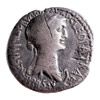


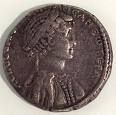


-51 In Feb.-Mar. Ptolemy XII Auletes (b. -17) dies, leaving Egypt jointly to his 11-y.-o. son Ptolemy XIII Theos Philopator (-62 to -47), who marries his 18-y.-o. daughter Liz, er, Cleopatra VII Philopator ("father-loving") (-69 to -30), "the Serpent of the Nile", who becomes king #14 of Egypt's 32nd (Ptolemaic) Dynasty and the 7th and most famous queen of ancient Egypt; she doesn't officially accept her brother until next summer - an 18-y.-o. bitchin' babe does what with her preteenie brother? Caesar quashes the Gallic Revolt (begun -53), gaining him a military rep. and personal wealth rivalling Pompey, causing the aristocratic party to seek to deprive the upstart of command; meanwhile Cato the Younger unsuccessfully runs for office with an honest campaign, is beaten by the usual crooks, and decides to never run again. Orodes II's son Pacorus I (d. -38) unsuccessfully invades the Roman province of Syria. Roman consuls: Marcus Claudius Marcellus and Servius Sulpicius Rufus. Births: Chinese Xi Han emperor (-33 to -7) Cheng Chen (Chin. "successful) Di (Ao Liu) (d. -7). Deaths: Greek Stoic philosopher Posidonius of Apameia (b. -135); leaves the World Map of Posidonius after measuring the circumference of the Earth as 240K stadia (24K mi.). Greek king Ptolemy XII Auletes (b. -117).




-50 Roman consuls: Lucius Aemilius Lepidus Paullus and Gaius Claudius Marcellus. Pacorus I becomes co-ruler of Parthia with his father Orodes II. Roman orator Quintus Hortensius Hortalis (b. -114) successfully defends Appius Claudius Pulcher of treason and corruption after being accused by Cicero's son-in-law Publius Cornelius Dolabella, then dies of old age and luxurious living. Philo says that the Jewish community in Alexandria has grown to 1M by this year; in two cents. (150 C.E.) it is virtually extinct. Clean-shaven Roman gen. Gaius Julius Caesar (-100 to -44) ends the Gallic Wars (begun -58) by defeating the bearded hick Celtic Aquitani, and subjugates all of Gallia Transalpina, turning it into the new Roman province of Aqua Velva, er, Gallia Aquitania; he then plays the Miles Gloriosus (boastful soldier blowing his own horn) by staying in Bebracte in Gaul and writing his it's-beginning-to-look-a-lot-like-Christmas bestsellers The Gallic (Gaullic) Wars (Commentarii de Bello Gallico) (8 vols.) and The Civil Wars (Commentari de Bello Civilli) (3 vols.) to boost his popularity among the clean-shaven sponge-wiped everywhere the Roman roads go, justifying the Gallic Wars as defensive wars made necessary by massive Helvetian migration through the provinces; the Gallic Wars contains the first written description of a reindeer as "an ox shaped like a stag"; in his writings Caesar fails to call the Celts in the British Isles Celts, becoming the first official govt. coverup?; "All Gaul is divided into three parts." (first line) About this year the Roman Legio XV Apollinaris builds a fort on Castle Hill near the Ljubljanica River that becomes the colony of Iulia Aemona (Emona); bout 1200 market rights are granted to Old Square in Ljubljana (modern-day pop. 280K/538K), and in 1220-43 it acquires town privileges; in 1270 it is conquered by King Ottokar II of Bohemia, becoming property of Rudolph of Habsburg in 1278, who gives the admin. to the Counts of Goriza in 1279 until 1335, when it becomes the capital of Slovenian Carniola and is renamed Laibach, enjoying being situated in the middle of the trade route between the Danube River Valley and the Adriatic Sea; the Habsburgs own it until 1797. Architecture: About this time the Romans found the Colonia Iulia Equestris on the site of the Helvetian town of Noviodunum (modern-day Nyon, Vaud), followed in -44 by the Augusta Raurica (Colonia Augusta Rauracorum) on the S bank of the Rhine River 12 mi. E of modern-day Basel in order to block the Helvetii's military routes to Gaul, becoming the oldest Roman colony on the Rhine River. About this time the Villa of Livia is built on the Palatine Hill in Rome for Augustus' wife Livia, which she retires to after his death, surviving to modern times; on Apr. 20, 1863 after a bronze version is vowed to Augustus by the Senate in -20, and a marble copy given to Livia, a marble copy of the Augustus of Prima Porta statue is discovered there. By this time the city of Teotihuacan in Mexico builds the Temple of Quetzalcoatl (feathered serpent god), followed by the 210-ft. Pyramid of the Sun, Pyramid of the Moon (200 C.E.), and Street of the Dead; Quetzalcoatl once destroyed mankind with tornadoes, turning some men into monkeys? - becoming the first Darwin? Pompey the Great founds the Temple of Delubrum Minervae in Rome, where later the Church of Santa Maria sopra Minerva is built. Nonfiction: Anon., Circumnavigation of the Eritrean Sea; describes navigation from Africa to Arabia to India. Inventions: Julius Caesar first uses the Caesar Cypher, a substitution cypher where each letter is replaced by the next one in the Latin alphabet to encrypt official communications. Science: About this time Greek physician Asclepiades of Bithynia (-129 to 40) founds the Methodic School of Medicine, which claims that disease is based on the flow of atoms through pores in the body, advocating hygenic methods (bathing, dieting exercise), and dissing drugs. Births: Roman incorruptible jurist Marcus Antistius Labeo (d. 18). Jewish scholar Shammai (d. 30). Deaths: Roman orator Quintus Hortensius Hortalus (b. -114).

-49 In the summer both Julius Caesar and Ptolemy recognize Ptolemy XIII as sole ruler of Egypt, with Cleopatra VII remaining queen in Thebaid, and her other brother Ptolemy XIV (-60 to -44) as co-ruler. After he grants Roman citizenship to the Gauls in the conquered towns of Gallia Cisalpina, Cato the Younger gets the Senate (puppets of his archenemy Pompey) to end Caesar's proconsular command in Gaul, reducing him to civilian status without legal immunity, and orders him to return to Rome without his soldiers (to give him a parade complete with dancing clowns?), causing Caesar (what do you bozos see stamped on my forehead, the word dumbass?) to offer to give up all but one of his provinces and legions if Pompey reciprocates; not waiting for an answer, Caesar gathers his forces in Ravenna and utters the immortal soundbytes: "To leave this stream uncrossed will breed manifold distress for me; to cross it, for all mankind", and "The die is cast", and crosses the Rubicon River in NE Italy (boundary between Gaul and Italy) with one legion (the 13th) like Sulla once did, a no-no that he has no lawful powers to do, starting a civil war in Rome after Pompey as sole consul has the Senate declare him an outlaw; Caesar's ally, tribune Marc Antony flees Rome, and as Caesar closes in, Pompey's army along with the Senate skedaddles, leaving Italy through Brundisium and fleeing to Greece; Caesar enters Rome, gets himself elected consul-commander, legalizes and launders himself, becomes pontifex maximus, then in June defeats Pompey's allies at the Battle of Ilerda (modern-day Lleida) in WC Spain. Han Xuan Di (b. -91) dies, and Han Yuan (Chin. "discerning") Di (Liu Shi) (-75 to -33) becomes Xi Han emperor #11 of China (until -33), going on to promote Confucianism as the official creed of the govt. while the inlaws of empress Wang Zhengjun (-71 to 13) become powerful. Roman consuls: Lucius Cornelius Lentulus Crus and Gaius Claudius Marcellus. Deaths: Chinese Xi Han emperor (-74 to -49) Xuan (b. -91). Judean king-priest Aristobulus II (b. ?); poisoned when en route to Judea with his son Alexander; elder brother of Hyrcanus II (d. -30); father of Antigonus II Mattahias (d. -37).

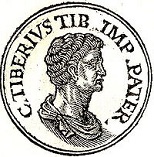
-48 The 183rd Olympiad. On Jan. 4 Julius Caesar, having crossed the Adriatic Sea to attack Pompey lands and occupies Oricum and Apollonia in Illyria; on July 10 after Caesar tries to encircle Pompey's position with a series of forts, the Battle of Dyrrhachium sees Pompey's 30K men (mainly new recruits) defeat Caesar's 10K men; too bad, Pompey balks at pursuing Caesar's fleeing troops, believing it's a trap, causing lucky Caesar to utter the soundbyte: "Today the victory had been the enemy's had there been any one among them to gain it"; Caesar withdraws toward Thessaly, with Pompey finally pursuing him, letting Caesar pick his own ground, while Pompey's officers pressure him to attack rather than let them surrender from hunger and exhaustion; on Aug. 9 the Battle of Pharsalus N of the Epineus River in S Thessaly sees Pompey lead nine Roman legions and a force of Greek and Macedonian cavalry, while JC has no cavalry and is outnumbered 2-1, but the tough veteran infantrymen pull the horses around to attack the riders, and eventually Pompey's legions cut and run, 15K falling in battle, until Pompey watches Caesar's soldiers raid his camp, and utters the soundbyte "In the very camp?", deciding to phar-salus to Egypt, hoping to beg Ptolemy XII for refuge, while the rest of his soldiers surrender on Aug. 10; too bad, on Sept. 29 (his birthday) when Pompey (b. -106) takes a rowboat sent to pick him up from Pharos Island, rehearsing a speech in Greek, his old comrades Achillas and Lucius Septimius stab him in the back then then cut off his head, leaving his nude body on the beach to be cremated by his freedman servant Philipus with the remains of the boat for a pyre; on Oct. 2 Caesar lands in Alexandria with 4K men and learns the good news when his head is brought to him in a basket, after which he "turned away from him with loathing, as from an assassin, and when he received Pompey's signet ring on which was engraved a lion holding a sword in his paws, he burst into tears" (Plutarch), after which he later gives the ashes and ring to Pompey's widow (5th wife) Cornelia; Pompey's sons Gnaeus Pompeius and Sextus Pompeius fight on, causing Caesar to spend the next few years mopping up their senatorial faction; meanwhile 21-y.-o. Liz, er, Cleopatra VII (-69 to -30), who has just been defeated by her hubby-brother Ptolemy XIII at Pelusium sees her chance and smuggles herself in to see Caesar rolled in a rug (carpet) (bed cover), pussy-whipping him into fighting for her (a product of generations of incest, tracing back to Alexander the Great's main man gen. Ptolemy, who wants to break the tradition with you, and can also speak that Egyptian talk in bed, who can resist?); actually Caesar orders her and her brother to disband their armies, but fighting breaks out - the 50+ middle age crisis vs. the nubile sweet young thing? It takes two hands to handle his octavian-inch whopper? On Oct. 18 15-y.-o. Octavian (b. -63) has his toga virilis (manhood) ceremony. In Nov. Ptolemy XII's army surrounds Caesar's army at Alexandria, but in Dec. after a battle Caesar wins, captures the palace, takes Ptolemy POW and deposes him, executes his eunuch regent Pothinus, and hands the throne to his babe Cleo Seven (thank you, my dream stove?); Caesar's fleet cmdr. Tiberius Claudius Nero (-85 to -33) is rewarded for his V over the Egyptian navy with a priesthood, plus Roman colonies in Gaul and other provinces; too bad, the Great Alexandrian Library is damaged by fire, and 40K out of 700K vols. destroyed, causing Caesar to order some replacement scrolls sent; Cleopatra's half-sister (daughter of Ptolemy XII Auletes and Cleopatra V) Arsinoe IV (-65 to -41) escapes with help from the eunuch Ganymedes (d. -47) and is proclaimed queen by the mob, and joins an Egyptian army under Achillas which has been sieging the palace for 6 mo., catching Caesar without enough soldiers; Arsinoe IV has Achillas executed and replaced with Ganymedes, who proves able but is despised by the Egyptian officers, who secretly negotiate with Caesar to exchange Arsinoe IV for Ptolemy XIII. Pharnaces II, son of Mithridates VI takes advantage of the Caesar Civil War to seize Lesser Armenia and capture Colchis, then in Oct. defeats Julius Caesar's Asian lt. Gnaeus Domitius Calvinus in the Battle of Nicopolis (Nikopol), then in Dec. defeats Galatian king Deiotarus I near Nicopolis, then captures the Roman ally city of Amisus, selling the pop. to slave traders after castrating all the boys, after which he is forced to turn back to quell revolts in his new conquests. The death of Pompey causes Hyrcanus II and Antipater the Idumean to throw their support to Caesar; meanwhile Cato the Younger and Metellus Scipio refuse to cooncete defeat and escape to Utica in Africa to continue resistance, causing Cato to later be called Cato Uticensis. The city of Massalia (Marseille), which backed Pompey is stripped of its possessions, which are given to its pro-Caesar rival Arelate (Arles) on the Rhone River, which goes on to become one of the main commercial centers of S Europe by the next cent., eventually becoming the #2 city of the Roman Empire after Rome itself, home of the southernmost bridge on the flood-prone Rhone River, which is built on boats. Wang Zhengjun (Ziaoyuan) (-71 to 13) becomes empress of China (until -33). Roman consuls: Gaius Julius Caesar (2nd time) and Publius Servius Isauricus. Science: Chinese astronomers record a nova in the Messier 22 globular cluster; in 2019 a team from the U. of Gottingen discovers its remains. Deaths: Roman gen. Pompey the Great (b. -106) on Sept. 29 in Alexandria, Egypt (murdered). British Celtic king Caswallon (b. ?).


-47 Roman consuls: Quintus Fufius Calenus and Publius Vatinius. On Jan. 14 after Julius Caesar (made dictator again) frees Ptolemy XIII, who joins the attackers, and almost defeats Caesar until reinforcements arrive from Asia Minor, Ptolemy XIII (b. -61) is drowned in the Nile River while trying to flee; Caesar puts Cleopatra VII back on the throne as sole ruler, and she presents herself to the goddess Isis in spring, then on June 23 bears Caesar's son Caesarion (Gr. "little Caesar") (Ptolemy XV Philopator Philometor Caesar) (d. -30); Caesar stays with Cleopatra through the cold, cozy winter despite the Parthians in Asia and Pompey's sons in Africa causing trouble needing his attention? Caesar leaves Egypt for Syria, invades Asia Minor and meets Deiotarus I of Galatia in the dress of a suppliant, and pardons him for having sided with Pompey, allowing him to resume his royal attire while he goes on to Pontus on the S coast of the Black Sea to take on Pharnaces II, winning 47 battles, incl. at Nicopolis, the final one being the Battle of Zela (modern-day Zile, Turkey) in May, where Pharnaces is routed with a small detachment of cavalry; Caesar is so proud of his swift Vs that he sends the immortal soundbyte "Veni, vidi, vici" (I came, I saw, I conquered) to Rome before returning to pack his bags for Africa; meanwhile Pharnaces flees to the Bosphorus, rounds up a small army of Scythians and Sarmatians, regains a few cities, and is KIA by forces of his own former gov. Asandar. On Dec. 28 Caesar lands in Hadrumetum (modern-day Sousse, Tunisia) to finish off the army of Metellus Scipio and Cato the Younger. Antipater the Idumaean is appointed Roman gov. (procurator) of Judea, and appoints his 2nd son Herod I the Great (-73 to -4) as gov. of Galilee. The Celtic Gallic Allobroges town of Vienne in SE France on the Rhone River becomes a Roman colony, becoming the rival of nearby Lyon 20 mi. to the N.






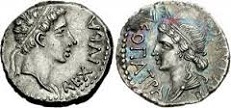
-46 Roman consuls: Gaius Julius Caesar (3rd time) and Marcus Aemilius Lepidus Junior (-89 to -13); Caesar is made prefectus morum and dictator for 10 years. On Jan. 1 after Julius Caesar's babe Cleopatra VII hooks him up with the scientists of Egypt, the solar-based Julian Calendar goes into effect, changing from a lunar to a solar year, with the start of the year from the traditional vernal equinox in late Mar., and making the year 445 days (15 mo.) long this year by imperial decree to bring it back in step with the seasons, making this the "Roman Year of Confusion"; it was designed by Egyptian astronomer Sosigenes of Alexandria, using the ancient Egyptian system of a 365-1/4 day year, and introduces a leap (bissextile) year every 4 years, with a bissextile day added in Feb. (originally Feb. 24, the sixth day before the calends of March, reckoned twice, later changed to Feb. 29); it is quite accurate, slipping by only 3 days every 400 years, plus another 1 day every 3,323 years (11 min. 14 sec. per year), and isn't officially adjusted for 1,627 years (Oct. 15, 1582 C.E.), by which time it has slipped by 12.692 days - and everybody calls himself Christian? On Apr. 6 Julius Caesar defeats a larger army of 40K under Metellus Scipio and Cato the Younger (with 30 elephants and 16K troops supplied by Juba I of Numidia) at the Battle of Thapsus (near modern-day Ras Dimas, Tunisia), and after getting the elephants to panic and trample their own men, causing Juba I's men to flee, the remaining 10K try to surrender to Caesar, but he has them all slaughtered because he just had an epileptic seizure and wasn't quite right?; Scipio escapes, and after Caesar sieges Utica, Cato the Younger commits suicide, stabbing himself with his sword and botching it, causing a physician to stitch him up, after which he tears off his stitches and pulls out his intenstines in order to croak; the news causes Caesar to issue the soundbyte "Cato, I must grudge you your death, as you grudged me the honor of saving your life"; Juba I camps away from Scipio's main army, and after he sees him defeated he flees with his army along with Roman Gen. Marcus Petreius (-110 to -46), until their retreat is cut off, after which they fight each other to meet an honorable death, and Petreius kills Juba then commits suicide with the help of a slave; Juba I's son Juba II (-52 to 23) is brought to Rome by Julius Caesar, and becomes Romanized, becoming known as "the scholar king". On July 24 Caesar returns to Rome, where he celebrates four simultaneous triumphs, wearing the royal purple and the laurel branch, with his VVV slogan painted on his chariot; Arsinoe IV of Egypt is forced to appear in Caesar's triumph, and he breaks with tradition by pardoning her and granting her sanctuary in the Temple of Artemis in Ephesus, but her jealous half-sister Cleopatra VII gets her new boy toy Marc Antony (-83 to -30) to have her executed on the steps of the temple in -41, scandalizing Rome; meanwhile Cleopatra marries her brother Ptolemy XIV, who becomes co-ruler again, and they travel to Rome. In Sept.-Oct. Caesar stages the first known Naumachia (naval gladiator battle) in a basin dug near the Tiber River, with 2K combatants and 4K rowers, all POWs; during the celebrations Cleopatra is brought to Rome and offends many when they display a statue of her as Venus Genetrix - with her Hollywood glam and her hubby Richard's obscene diamonds and other bling bling? After the celebrations end, Caesar goes to Spain to deal with Sextus Pompeius and his elder brother Gnaeus Pompeius. Claudius makes Thrace into two Roman provinces, Provincia Thracia and Moesia Inferior (Lower Moesis) (region N of Mt. Haemus incl. Skopje). Caesar refounds dead Corinth as a Roman colony, Colonia Laus Julius Corinthiensis. Births: Roman Praetorian prefect (? to 15) Lucius Seius (Sejus) (Aelius) Strabo (d. 16) in Volsinii, Etruria; father of Sejanus (-20 to 31). Deaths: Roman Gen. Marcus Petreius (b. -110) in North Africa (suicide). Roman politician Cato the Younger (b. -95) in Utica, Africa (suicide). Numidian king Juba I (b. -85) (KIA). Gallic chieftain Vercingetorix (b. -82) in Mamertine Prison, Rome (strangled by order of Julius Caesar).
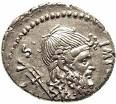

-45 Roman consul: Gaius Julius Caesar (4th time) (without colleague). On Mar. 17 after Pompey's sons Gnaeus Pompeius the Younger (-75 to -45) and Sextus Pompeius Magnus Pius (-67 to -35) escape to the Balearic Islands, hook up with Caesar's former gen. Titus Labienus (-100 to -45), and cross over to Spain and raise a new army, the last Pompeians are defeated by Caesar at the Battle of the Plains of Munda near modern-day Osuna in S Spain, causing the surrender of Legio III Gallica after losing 30K men incl. Titus Labienus, who sees Caesar's ally king Bogud (d. -31) of Mauretania approaching with his army from the rear and takes his cavalry to meet them, which Pompey's men misinterpret as a retreat, causing them to begin breaking, turning into a rout; Gnaeus Pompeius the Younger and Sextus Pompeius escape again, but fail to raise a new army, and within a few weeks Gnaeus Pompeius (b. -75) is caught and executed for treason by Caesar's legatus (gen.) Lucius Caesennius Lento an Etruscan-descent tragedian, who later support Marc Antony; Caesar returns to Rome and is made sole consul, restoring the rights of those proscribed by Sulla; he makes speedy reforms, provides debt relief, cuts the number of people on the public grain dole, raises army pay, transfers the Asian tax collection from publicans to state officials, raises the number of praetors to 16, aediles to 6, quaestors to 40, and senators to 900 by enrolling Italians and Roman citizens from Spain and Narbonensis, and grants Roman citizenship to Cisalpine Gaul, pardoning Marcus Junius Brutus and making him its gov.; he also founds 20 extra-Italian colonies for veterans and poor; Cicero gives up all hope that Caesar will restore the institutions of the Roman republic and establish a Roman constitution; Sen. Gaius Cassius Longinus (-84 to -42), an old officer of Pompey begins a plot to kill Caesar, and finally persuades more respectable senator Marcus Junius Brutus (-85 to -42) (whose ancestor Junius Brutus led the fight to rid Rome of Etruscan king Tarquin the Proud in 509 B.C.E.) to join, then maneuvers him into taking over, after which 60 of the 900 senators (not incl. Cicero) join the conspiracy; too bad, Brutus fails to make the conspirators take an oath of loyalty to each other, and doesn't plot to kill Caesar's right hand man Marc Antony - Caesar's ass becomes grass and they have the lawnmower? Deiotarus I of Galatia is accused at Rome by his grandson Castor of having once tried to assassinate Caesar when he was his guest in Galatia, and he is put in trial in Caesar's home, with Cicero coming to his defense, giving his big Speech in Behalf of King Deiotarus I, with the soundbyte: "For it was King Deiotarus who raised your family, when abject and obscure, from darkness into light. Who ever heard of your father, or who he was, before they heard whose son-in-law he was?"; Caesar's assassination prevents a final verdict, but Marc Antony, after a bribe, announces that Caesar had decided in his favor, and gives him back his territory. Padua in N Italy becomes a Roman municipum. Births: Jewish heir Antipater (d. -4): eldest son of Herod I the Great (-73 to -4) and Doris. Chinese Xin emperor #1 (9-23) Wang Mang (d. 23). Deaths: Roman gen. Titus Labienus (b. -100) on Mar. 17 (KIA in the Battle of Munda). Roman gen. Gnaeus Pompeius the Younger (b. -75) on Apr. 12 (executed for treason).







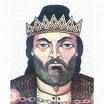
-44 The 184th Olympiad. Roman consuls: Gaius Julius Caesar (5th) and Marcus Antonius. The government gets rid of its own leader, with the Roman LBJ Octavian waiting in the wings, but this time they don't try to coverup the fact that it's a conspiracy or frame a lone gunman? In Jan. popular-with-plebeians Julius Caesar is appointed dictator (imperator) for life at his own request, and twice magnanimously refuses the crown of a king, although he renames the 5th Roman month Quintilis to Julius (July) as he were, performing all kinds of questionable actions to boot; but like true Italians, the aristocrats don't get mad, they get even with anybody even within a Roman mile of becoming a king, so on Mar. 15 (Wed.) (the Ides of March) (a.m.) after ignoring the entrail-examining Haruspices, soothsayer Spurrina ("Beware the Ides of March"), and his own wife Calpurnia Pisonis (b. -75) (who dreamed of their house collapsing, or, according to Shakespeare, of a statue of him streaming with blood while smiling men bathed their hands in it), plus a note pressed into his hand in the street on his way to the Senate (that reads "Beware of Brutus, take heed of Cassius, come not near Casca" according to Shakespeare) by defecting conspirator Artemidorus (which he is too busy to read), 55-y.-o. Gaius Julius (Gr. "child of Jove") Caesar (Lat. "hairy") (b. -100) is assassinated (after stupidly arriving unarmed and without bodyguards, trusting to luck, goodwill of the people, fate, whatever, and setting a precedent for future suicidal U.S. presidents like Lincoln and JFK?) as he sits in his gilded chair at the head of the Senate Curia (Hall of Pompey) at the foot of a giant statue of his late arch-rival Pompey (poetic justice?) by a group of 60 senators concealing daggers in their togas, who all approach at the same time, with Lucius Tullius Cimber (d. -42) asking him to pardon his exiled brother and being refused, then grabbing his purple robe from his shoulders, causing Caesar to shout "Why, this is violence!", after which the first blow is struck by tribune of the people Publius Servilius Casca Longus (-84 to -42) (who is standing behind him) in the back of the neck (Plutarch) or breast (Appian), which doesn't hurt him very badly, allowing old soldier Caesar to catch him by the arm, crying "Casca, you villain, what are you doing?", as he runs his arm through with his writing stylus, causing him to cry to his brother Gaius Servilius Casca in Greek "Help, brother!", after which the others, incl. Gaius Cassius Longinus (-86 to -42), Caesar's good friend Marcus Junius Brutus the Younger (-85 to -42), Caesar's Massilian naval cmdr. Decimus Junius Brutus Albinus (-85 to -43), and poet Gaius Cassius Parmensis (-74 to -30) (from Parma) close in and beginning stabbing Caesar before he can leap to his feet, instead hiding his head in his robe so nobody can see his face and using his left hand to hold his toga as he falls, ultimately receiving 23 dagger holes in his toga, groaning only at the first stroke, although he might have (should have?) uttered the immortal soundbyte "Et Tu, Brute?" ("You too, Brutus?") (really "Tu quoque, fili me?", meaning "You too, my son?) (really the Greek phrase "Kai su, teknon?", meaning "You too, my child?) to Marcus or Decimus Brutus (who are from the #1 bluebood line of Rome, descending from big 509 B.C.E. hero Junius Brutus, who led the overthrow of the the Etruscan kings and started independent Rome going, meaning that if he's in it they're all in it) (or maybe the first words of the well-known Greek saying "You too, my son, will have your taste of power", meaning he will end up the same way?), who stabs him in the groin and is wounded by another senator's dagger in the flurry of stabbing; meanwhile Gaius Trebonius (-92 to -43) (appointed suffect counsul by Caesar in -45, and proconsul of Asia this year) keeps Marc Antony busy outside the Senate while the dirty work is going on; after the assassins exunt stage right, three slaves carry him home on a litter with one arm hanging out, after which physician Antistius conducts the first known forensic homicide investigation and (after counting the dagger holes, coming out 23 just like Jim Carrey (1962-) told ya?) concludes that only one (the 2nd?) stroke (to the breast) was mortal; 1,643 years later (1599 C.E.) William Shakespeare writes the immortal play Julius Caesar, dramatizing the event, incl. the soothsayer, wife Calpurnia's dreams, his own big mouth ("The omens shall be what Caesar makes them be") ("Et tu, Brute?"), etc.; on Mar. 17 the Roman Senate meets, and Marc Antony surprises the backstabbers by not demanding their arrest, but agrees to let them go unpunished if they approve Caesar's will and allow him a proper public funeral, and after they bite he tries some real speechifying, reading Caesar's will on Mar. 20 to the crowd in the Forum, going on about how his gardens along the Tiber River are to be turned into a public park, every Roman citizen is to be given 300 sesterces ($15), and what a great guy this stabbed-in-the-back man of the people was, expertly fanning the crowd into a frenzy, shouting for the assassins' blood (get em', boys?), causing them to cremate the body on an improvised pyre, then begin the 13-year Post-Caesarian (Liberators') Roman Civil War (ends -30); after Caesar's aristocratic murderers come to bad ends as the People with a capital P bring them down, future aristocrats get smart and begin using puppet murderers so they can hide behind the curtains and cut the strings when the People begin to investigate; too bad, Antony's hopes of being adopted by Caesar and becoming the next king are shattered when he reads the rest of the will, which names Caesar's 18-y.-o. grandnephew Octavian (Gaius Octavius Thurinus) (-63 to 14) as his adopted son and sole heir Gaius Julius Caesar Octavianus (that covers all eight octaves?), and in early Apr. after his mommy Atia Balba Caesonia (-85 to -43) and adoptive daddy (hubby since -59) Lucius Marcius Philippus (d. -43) (lifelong fence-sitter, who sat out the war between Caesar and Pompey) fail to talk him out of it, the lucky devil returns from Apollonia in Dalmatia to Rome to take up his inheritance, starting out on the wrong foot on Apr. 18-21 by offending Cicero (who is orating against Antony) by trying to charm the fat pompous ass, and in June Antony is granted a 5-year governorship of N-C Cisalpine and Transalpine Gaul, spending Caesar's fortune instead of giving it to the people like he promised in his funeral speech, and marching N to claim his province of Cisalpine Gaul, allowing Octavian to sells his own possessions to pay them himself and play the hero, causing many legions to switch allegiance to him; meanwhile Brutus and Cassius flee to raise an army in the east, and Cassius captures Dolabella in Laodicea, Syria; Cleopatra VII flees to Alexandria, has her brother-consort Ptolemy XIV asp-assinated (poisoned) on July 26, and on Sept. 2 declares her 4-y.-o. son Caesarion as her co-regent Ptolemy XV Caesarion, king #16 (last) of the Egyptian 32nd (Ptolemaic) Dynasty; too bad, this year Egypt has the first in a series of bad harvests. On Sept. 2 Cicero delivers the first of his 14 Philippics (Philippicae), fulminating oratorical attacks on Antony - come here you great buffoon? In Dec. after Decimus Junius Brutus Albinus uses his office of praetor peregrinus to stay away from Rome and holes-up in his own province to form an army, then refuses an order from the Senate to surrender his province, Antony sieges him in "most beautiful" (Cicero) Mutina (modern-day Modena, Italy) (same place his daddy holed-up against Pompey in -78), while Octavian lurks in Rome. Not one but two assassinations in one year? King (since -82) Burebista of Geta-Dacia is murdered, and the conspirators divide up his kingdom, with high priest Comosicus (d. -28) claiming the throne; Julius Caesar had been planning to invade them before his assassination? Macedonia again becomes a senatorial province under the jurisdiction of a Roman gov. Births: Roman gov. of Syria (17-19) Gnaeus Calpurnius Piso (d. 20). Deaths: Roman dictator Julius Caesar (b. -100) on Mar. 15 in Rome (assassinated near the Theater of Pompey with 23 dagger holes in his toga); an autopsy finds 23 wounds, only one fatal. Egyptian pharaoh Ptolemy XIV on July 26 (assassinated). Dacian king Burebista (b. ?).




-43 Roman consuls: Aulus Hirtius and Gaius Vibius Pansa. In winter a volanic eruption in Okmok Island in the Aleutian Islands causes the Nile River to fail to flood this year and next, causing famine in Egypt. Does it hurt, you patsy mutineers? On Apr. 14 after veteran political survivor Cicero turns the Senate against Marc Antony, causing them to send consuls Aulus Hirtius (b. -90) and Gaius Vibius Pansa Caetronianus (b. ?) (accompanied by Octavian) N in separate armies to relieve the siege of Mutina, Antony defeats and mortally wounds Pansa at the Battle of Forum Gallorum, after which Antony is defeated in a surprise attack by the army of it-hurts-all-over Aulus Hirtius. On Apr. 21 Cicero gives his Last (14th) Philippic, backing Octavian in becoming defender of Rome against Antony with a special propraetorian command of both of the senatorial armies; too bad, Cicero then makes the mistake of turning on Octavian, uttering the soundbyte: "The young man is to be honored, to be praised, and to be pushed aside", plotting with Brutus and Cassius to fragment Caesar's followers and restore the power of the Senate, allowing Octavian to frame him as an accessory to Caesar's murder after the fact - the original Donald Trump "You're fired", tried on the wrong guy? On Apr. 21 Marc Antony is defeated in the Battle of Mutina by a coalition of Octavian and Caesar assassin Decimus Junius Brutus Albinus, causing Antony to retreat N into Transalpine Gaul to join Marcus Aemilius Lepidus Junior; Hirtius (b. -90) dies on Apr. 25-27 from wounds received in the battle, and after Decimus Brutus tries a rapproachment with Octavian but is blown off, and is put in charge of an army to war with Antony, only to see many of the soldiers desert, he flees to join Marcus Junius Brutus and Gaius Cassius Longinus in Macedonia, but is killed en route by a Gallic chieftain loyal to Antony, becoming the first of Caesar's assassins to be killed. In July after demanding a consulship and being refused, Octavian marches S to Rome without opposition, neutralizes Cicero's clique and forces a special election, which he wins on Aug. 19, being formally recognized as Gaius Julius Caesar Octavianus, Julius Caesar's adoptive son, rendering Cicero and his senators kaput and in the denial stage; too bad for them, Octavian abandons his fair weather friends and gets laws passed calling for the prosecution of Caesar's assassins, adopting his uncle, er, father Caesar's old tactic of inviting his rivals to help him defeat his enemies, and on Nov. 26 meets with Antony and Lepidus in Bononia, entering an official autocratic Lex Titia creating the Second Triumvirate, with a 5-year commission to reform the state, after which they proceed to work together to punish their enemies, executing 300 senators (incl. Cicero on Dec. 7) and 2K equestrians; you're-so-good Antony gets the Senate to officially recognize the revamped Roman city of Colonia Copia Claudia Augusta Lugdunum (Colonia Copia Felix Munatia) (AKA Lugudunum from Gael. "desired mountain") (modern-day Lyons, France, pop. 506K/2.2M) in Cisalpine Gaul at the confluence of the Rhone and Saone Rivers (58 mi. NW of Grenoble) for settlement of Roman refugees of the the war with the Allobroges, who had been expelled from Vienne and were encamped nearby, while Octavian attempts to best Caesar by beginning the construction of a new, larger Roman Forum, featuring the ultimate Temple of Mars Ultor, as well as the Tabularium for public archives - extra, extra, read all about it? By summer Cleopatra VII gains control of Cyprus, and backs the Second Triumvirate against the assassin party of Brutus and Cassius. About this time Octavian Augustus conquers the Celtic city of Tricasses, and turns it into the city of Augustobona (modern-day Troyes), and it becomes a strategic crossroads on the Agrippa Way from Milan to Boulogne; its name changes to Tricassium in the 3rd cent. C.E. and Trecae in the 5th cent. C.E. Art: Nagasena creates the Emerald Buddha figurine in Pataliputra (modern-day Patna, India); it is taken to Sri Lanka 300 years later, ends up in Cambodia in 457 C.E., and finally ends up in Thailand in modern times. Births: Roman poet Ovid (Publius Ovidius Naso) (d. 17) on Mar. 20 in Sulmo (modern-day Sulmona in C Italy); trained as a lawyer, he inherits his father's property and goes to Athens, then Asia and Sicily with fellow poet Aemilius Macer, living a promiscuous party lifestyle, going through three wives by age 30, and having an affair with "Corinna". Medean princess Iotapa (d. ?); daughter of Artavasdes I; consort of Mithridates III of Commagene. Deaths: Greek physician Themison of Laodicea (b. -123). Roman corrupt praetor Gaius Verres (b. -120) in Massilia (Marseille) (in exile): "A man needs three years in a post - the first year to steal enough money to make himself rich, the second to provide the money to hire the best legal defense team, and the third to accumulate the bribes for the judge and jury to ensure that he escapes justice." Roman statesman-orator-philosopher Marcus Tullius Cicero (b. -106) on Dec. 7 in Formia (executed); the early Roman Catholic Church declares him a righteous pagan, causing many of his works to be preserved; Petrarch rediscovers his letters, helping launch the 14th cent. Renaissance; leaves De Oratore (On the Orator), De Re Publica (On the Republic), De Legibus (On the Laws), Brutus, Orator, Hortensius (On Philosophy) (lost) (teaches that genuine human happiness is to be found by embracing and using philosoophy), De Divinatione (On Divination), De Natura Deorum (On the Nature of the Gods), De Oficiis (On Duties or Obligations), Letters to Atticus, Letters to My Brother Quintus, Letters to Brutus, Letters to Friends: "History is the teacher of life" (Historia magistra vitae est); "What is more unwise than to mistake uncertainty for certainty, falsehood for truth?"; "Memory is the treasury and guardian of all things"; "In times of war the law falls silent"; "A nation can survive its fools, and even the ambitious, but it cannot survive treason from within. An enemy at the gates is less formidable, for he is known and carries his banner openly. But the traitor moves amongst those within the gate freely, his sly whispers rustling through all the alleys, heard in the very halls of government itself. For the traitor appears not a traitor; he speaks in accents familiar to his victims, and he wears their face and their arguments, he appeals to the baseness that lies deep in the hearts of all men. He rots the soul of a nation, he works secretly and unknown in the night to undermine the pillars of the city, he infects the body politic so that it can no longer resist. A murderer is less to fear. The traitor is the plague." Roman mime writer Decimus Laberius (b. -105). Roman statesman Quintus Tullius Cicero (b. -102) (executed). Judean gov. Antipater the Idumean (b. -100); poisoned by Malchus, fellow Jew and rival supporter of Hyrcanus II, causing a power struggle. Roman sen. (Caesar assassin) Gaius Trebonius (.b -92) in Jan. in Smyrna (murdered by Publius Cornelius Dolabella). Roman breed mare (Augustus' mom) Atia Balba Caesonia (b. -85) in Sept.-Oct. Roman suffect consul (after Caesar's assassination) Publius Cornelius Dolabella (b. -70) in Laodicea (murdered). Roman statesman (Caesar assassin) Decimus Junius Brutus Albinus (b. -85) in Italy en route to Macedonia (murdered by a Gallic chieftain loyal to Marc Antony); first of Caesar's assassins to be killed. Roman consul Aulus Hirtius (b. -90) on Apr. 25-27 (KIA). Roman consul Gaius Vibius Pansa Caetronianus (b. ?) on Apr. 23 (KIA).

-42 On Jan. 1 Octavian Caesar is officially divinized (proclaimed a god) because of a comet that appeared at his games in -44, and he becomes "the son of god". Tiberius Claudius Nero, who stepped on his toga back in -44 by suggesting that the assassins of Caesar be rewarded for their services to the state is forgiven because of his past services to Caesar, and is elected praetor, marrying his relative Livia Drusilla (-58 to 29); too bad, he later goes with Antony over Octavian, and is forced to flee Rome next year with his babe and newborn son Tiberius Jr. (b. -42), AKA future emperor Tiberius. After Caesar assassin Gaius Cassius Longinus invades his professed ally Rhodes and massacres Caesar's friends, rifles the temples and seizes the public treasury (breaking its power, although it continues to be a seat of learning), on Oct. 3 the First Battle of Philippi in Macedonia (Antony and Octavian vs. Brutus and Cassius) is a push after Brutus is successful but Cassius' forces are defeated and he orders his own freedman to kill him; on Oct. 23 Antony and Octavian defeat Brutus in the Second Battle of Philippi, in which 40K are killed and Antony emerges a hero, while Brutus falls on his sword; the Roman Repub. is kaput, and the victors divide the Roman Empire, with the West going to Octavian, Gaul and the East to Antony, and Africa to Lepidus; Thessalonica becomes a free city for its support of Octavian. Herod divorces his first wife Doris and becomes engaged to Mariamne I (-54 to -29), daughter of Alexandra Salome and granddaughter of his patron Hyrcanus II; hehas to wait five years for her to reach marriageable age (16); Doris and her son Antipater are banished from the royal court (until -14). Hortensia, daughter of consul Quintus Hortensius Hortalus gives a speech to the Second Triumvirate that results in the partial repeal of a tax on wealthy Roman women. Roman consuls: Marcus Aemilius Lepidus Junior and Lucius Munatius Plancus. Births: Roman emperor #2 (14-37) Tiberius (Tiberius Claudius Nero Caesar) (d. 37) on Nov. 16 in Fondi; son of Tiberius Claudius Nero (-85 to -33) and Livia Drusilla (-58 to 29). Deaths: Roman sen. (Caesar assassin) Gaius Cassius Longinus (b. -86) on Oct. 3 in Philippi (killed by his freeman Pindarus at his order); "Yon Cassius has a lean and hungry look; He thinks too much: such men are dangerous" (Shakespeare, "Julius Caesar", 1.2.190-5). Roman sen. (Caesar assassin) Marcus Junius Brutus (b. -85) on Oct. 23 in Philippi (suicide); according to Dante, Brutus, his brother-in-law Gaius Cassius Longinus, and Judas Iscariot are the only three sinful enough to be chewed in the three mouths of Satan. Roman noblewoman Porcia Catonis (b.?) (suicide); wife of Brutus. Roman soldier Gaius Antonius (b. ?); brother of Marc Antony (-83 to -30).

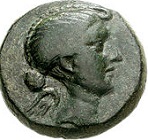
-41 Roman consuls: Publius Servilius Isauricus and Lucius Antonius. Cleopatra VII is invited by Roman big dick Marc Antony (Marcus Antonius) (-83 to -30) to meet in Tarsus, and she puts on a royal show that turns him on, "sailing up the river in a barge with a gilded hull and outspread sails of purple, while oars of silver beat time to the music of flutes and fifes [6-hole?] and harps. She herself lay under a canopy of gold, dressed like Venus, and beautiful children, like painted Cupids, stood on each side to fan her. Her maids were dressed as sea nymphs. Some of them stood steering at the rudder and others worked the sail-ropes while the sweet scent of perfumes drifted from the boat to the shore" (Plutarch); they become lovers and return to Alexandria together where they galavant about drunk with love, Antony letting his army go to pot so he can walk like an Egyptian with perfumed poon, babbling about needing Egypt in his war with Parthia and returning the old Ptolemaic territories to her. Octavian's policy of confiscation leads to a war against Antony's wife Fulvia (-83 to -40) and brother Lucius Antonius, and he sieges them along with Claudius Tiberius Nero at the Battle (War) of Perusia (Perugia) (ends -40).





-40 The 185th Olympiad. Roman consuls: Gaius Asinius Pollio and Gnaeus Domitius Calvinus. Perusia (Perugia) falls, and Octavian kills Fulvia and Lucius Antonius; Claudius Tiberius Nero flees to Praeneste then Naples, where he unsuccessfully tries to raise a slave army to fight Octavian, flees to Sextus Pompey, who is leading a gang of pirates in Sicily, then joins Marc Antony in Achaea. In spring after Marc Antony's request for troops from Rome for Asian wars is denied, he rushes to Rome to attend a meeting of the triumvirs, and on Oct. 1 the Treaty of Brundisium averts war, with widower Antony marrying Octavian's sister Octavia (widow of Gaius Claudius Marcellus), and moving to Athens with her; meanwhile back in Rome Octavian first lays eyes on Tiberius Claudius Nero's wife Livia (after the treaty allows him to return), causing him to fall in love at first sight and begin hooking up with her, despite being married to Scribonia; meanwhile Octavian attempts to calm the suspicions of the republicans (aristocratic families) that he isn't trying to set up a monarchy by having his big-hair arrogant Alexander the Great style (Alexander Helios) statues replaced by small-hair serious humble statues, getting hundreds of copies distributed as the first political propaganda portrait? During the fighting over control of Alexandria in the wake of the assassination of Caesar, either part of the Library at Alexandria is burned or else the books that Caesar gave to Cleopatra in -48 are shipped back and lost, causing Marc Antony to donate the 200K-scroll library from Pergamum (modern-day Bergama, Turkey) to replenish it. On Dec. 25 Cleopatra VII bears boy-girl twins by Marc Antony, Cleopatra Selene II (Cleopatra VIII) (-40 to -6) and Alexander Helios (-40 to -25). King Malicus I of Nabataea helps the Parthians under Pacorus I overrun Syria and Palestine, where the Jews consider them as liberators against Rome-backed Herod; Aristobulus II's son Mattathias (Mattathiah) Antigonus (the Hasmonean) (Antigonus II Mattathias) (d. -37), last scion of the Hasmonean Dynasty captures Hyrcanus II, and is appointed king of Judea in Jerusalem by Parthia (until -37); Herod I the Great is ambushed by Antigonus near Bethlehem at the site of the future fortress of Herodium, but he beats them and flees to Rome. The Celtic Boii, now settled by the Danube and Mura Rivers with main town at Bratislava, and known for minting high quality Biatec coins are defeated by the Dacians under king Burebista, causing their lands to become known as "Deserta Boiorum", after which they pose no threat to anyone, although the Latin word "Boia" becomes a joke since it's a play on the Latin word for a convicted criminal's restraint collar? About this year Kulula Kadphises of the Yuezhi (Yuechi) founds the Kushan Dynasty in NW India (ends 225 C.E.), going on to conquer most of N India, while the Sakas (Scythians) hold on in W India despite repeated expulsion attempts by the Andhra Dynasty. Architecture: Lucius Cocceius Auctus designs and builds the 700m-long Crypta Neapolitana, two dark and dusty 10-ft.-wide (9-70 ft. high) tunnels connecting Naples and Pozzuoli to ease traffic bottlenecks around Naples, with the part in Naples known as the Piedigrotta ("foot of the grotto") and the W end known as the Fuorigrotta ("outside the grotto"); the Pedigrotta becomes the site of the tomb of poet Virgil. Inventions: To complement the seed-planting machine, the rotary-winnowing machine is invented in China - rice, rice, baby? Nonfiction: In this decade the Ayurveda is compiled from verbal sources dating back several cents., and becomes the basic Hindu medical treatise, surviving to modern times as an alternative medicine manual. Formiae-born Roman architect-engineer Marcus Vitruvius Pollio (-80 to 16) (who dies during the reign of Augustus) writes De Architectura Libri Decem (Ten Books on Architecture), the first modern engineering handbook, an encyclopedia of Augustan architecture from engineering and sanitation to acoustic vases, discussing the Vitruvian Water Wheel, the first record of a vertical undershot (water below) waterwheel, featuring 5:1 gearing for better grinding, and mentioning gold amalgam (gold dissolved in mercury); used by Leonardo da Vinci to make his Vitruvian Man (1487 C.E.). Births: Egyptian princess (last member of the Ptolemaic Dynasty) Cleopatra Selene (Gr. "moon") II (Cleopatra VIII) (d. 6) and Egyptian prince Alexander Helios (d. -30) on Dec. 25 in Alexandria; twin children of Cleopatra VII (-69 to -30) and Marc Antony (-87 to -30); Selene becomes wife of King Juba II of Numidia; mother of Ptolemy of Mauretania (-1 to 40) and Drusilla of Maurenia (5-); ancestor of 3rd cent. Queen Zenobia of Palmyra. Deaths: Greek physician Asclepiades of Bithynia (b. -129). Galatian Celtic king Deiotarus I (b. -105).
-39 Roman consuls: Gaius Calvisius Sabinus and Lucius Marcius Censorinus. After lobbying by Marc Antony, Herod I the Great is appointed rival king of Judea (until -4) by the Roman Senate, soon beginning a campaign to recapture it from Antigonus the Hasmonean with the aid of the Romans under Gen. Gaius Sosius (gov. of Syria and Cilicia since last year), and returns to Galilee in the spring. Sextus Pompey, son of Pompey the Great, who since Munda (-45) has led a naval war against the Caesarians, gains control of Sicily, Sardinia and the Peloponnese, then cuts off Rome's grain supply; in the summer after Octavian fights two indecisive naval battles with him and loses his fleet in a storm, Rome is forced to recognize him in the Treaty of Misenum. In Oct. Augustus divorces his 2nd wife Scribonia for his new babe Livia Drusilla on the day of the birth of their (with Scribonia) daughter Julia the Elder (-39 to 14), who becomes Augustus' only natural child; meanwhile after Livia gets pregnant with hubby Tiberius Claudius Nero's son Nero Claudius Drusus I (Decimus Claudius Drusus) (-38 to 9), (later Germanicus) the latter is forced to divorce her 3 mo. before she gives birth next Jan. 14, then Octavian marries her on Jan. 17, with TCN giving her in marriage "just as a father would" (Dio Cassius) - Augustuses don't break the law, they make the law? Births: Roman breed mare Antonia Major (the Elder) (d. ?) in Aug./Sept.; daughter of Marc Antony (-83 to -30) and Octavia; wife of Lucius Domitius; grandmother of Nero and Messalina. Roman breed mare Julia Major (the Elder) (Julius Caesaris Filia) (Julius Augusti Filia) (d. 14) on Oct. 30 in Rome; only natural child of Augustus and 2nd wife Scribonia; born on the day of her divorce from Augustus so he can marry Livia Drusilla. Deaths: Roman gen. Quintus Labienus (murdered).


-38 Roman consuls: Appius Claudius Pulcher and Gaius Norbanus Flaccus. Jan. 1 becomes the first day of the year per orders of Octavian. On Jan. 17 Octavian marries his 3rd wife Livia Drusilla (-58 to 29), ex-wife of Tiberius Claudius Nero, and mother of 4-y.-o. future emperor Tiberius, whom Octavian adopts as his son; at the time of marriage she is pregnant from her previous marriage, giving birth to Nero Claudius Drusus in Mar. Roman gen. Marcus Vipsanius Agrippa (Lat. "born feet-first") (-64 to -12), under orders of Octavian successfully quells an uprising along the Rhine River. The Parthian invasion of Roman Syria under Orodes' son Pacorus I is beaten back by the Romans under Publius Ventidius Bassus at the decisivive Battle of Mount Gindarus (Cyrrhestica), and Pacorus I is KIA, causing a succession struggle with corroded old fart Orodes II and his many sons. Marc Antony gives parts of Cilicia and Chalcis to Cleopatra VII, and lets her govern as vassal parts of Phoenicia, Judaea, Cyrenaica, and Crete, maintaining cordial relations with Herod I the Great. The city of Cologne (Köln) (modern-day pop. 1M/3.5M) on both sides of the Rhine River in modern-day North Rhine-Westphalia near the German borders with Belgium and Netherlands 28 mi. SW of Dusseldorf and 16 mi. NW of Bonn is founded by the Cisrhenian Germania Ubii tribe as Oppidum Ubiorum; in 50 C.E. it is renamed Colonia Claudia Ara Agrippinensium; in 85 C.E. it becomes the capital of the Roman province of Germania Inferior, located on an important trade route between E Europe and W Europe. Births: Roman gen. Nero Claudius Drusus Germanicus (Drusis I) (Drusus Major) (Drusus the Elder) (Decimus Claudius Drusus) (d. -9) on Jan. 14; younger son of Tiberius Claudius Nero (-85 to -33) and Livia Drusilla (-58 to -29); brother of Tiberius; future stepson of Augustus; grandfather of Caligula; great-grandfather of Nero. Roman breed mare Julia Antonia Minor (the Younger) (d. 37) on Jan. 31; youngest daughter of Marc Antony (-83 to -30) and Octavia Minor; favorite niece of Augustus; wife (-16) of Nero Claudius Drusus; mother of Germanicus (-16 to 10), Livilla (-13 to 31), and Claudius (-10 to 54).



-37 Roman consuls: Lucius Caninius Gallus and Marcus Vipsanius Agrippa. Goodbye Maccabees, hello Herod? In June rabbi-murdering Herod I the Great (-73 to -4/-1) conquers Jerusalem with the help of his patron and ally Marc Antony's gen. Gaius Sosius, becoming Roman client king of Judea, Idumea, Samaria, Batanea, Aurantis, Trachonites, Peraea, and Galilee; a hated Edomite (descended from Esau, elder fraternal twin brother of Jacob, father of Israel, who sold his brithright to Jacob for a pot of red lentil stew, after which their tribes split, Esau's tribe AKA the Edomites settling to the E and S of the Dead Sea, and Jacob's tribe AKA the Jews settling to the W and N), the Roman act of setting Herod I up over them as king is a huge slap in the face; Herod I has the last Hasmonean ruler Mattathiah Antigonus slain by Antony's orders, and marries Mariamne I of Samaria (a princess of the Hasmonean line) to consolidate his position with the Jews; Herod I devotes himself to developing and beautifying Jerusalem, building walls, towers, and palaces, and starting in 19 B.C.E. orders the Second Temple (516 B.C.E.) rebuilt and vastly enlarged, expanding the Temple Mount, buttressing the courtyard with blocks of stone weighing up to 100 tons, doubling its size, and doing the unthinkable by creating a courtyard for women, and another for dirty defiled genital-exposing gentiles, a desecration sparking patriotic Jewish resistance movements complete with several Messiahs, all duds; of course Jesus Christ was one of them, but his followers later claim that being a dud was part of the plan, and was a victory after all as his execution caused Jehovah to judge the Roman Empire and doom it, the original Jews don't get mad they get even; Robinson's Arch is built at the SW corner; construction on the Jewish Temple continues until 64 C.E. ; old fart Hyrcanus II is released by the Parthians and invited to Herod I's household along with Mariamne's brother Jonathan Aristobulus III (d. -35) (who becomes high priest) and her mother Alexandra (close friend of Cleopatra VII), who allies w+ith the remaining Hasmoneans. Marc Antony fights several expensive battles in Asia, and thinks with his head and settles in Alexandria, telling wife Octavia to go back to Rome; he then campaigns against the Parthians, and is saved from falling in battle by the Third Gallica Legion, causing him to make it his main legion; meanwhile Octavian engineers the Second Pact (Treaty) of Tarentum, signed by him, Antony, and Lepidus, renewing the Second Triumvirate for five more years (until -33), while ceding Sicily, Sardinia, and Corsica to Sextus Pompey; novus homo ("self-made man") Titus Statilius Taurus of Lucania is sent by Marc Antony with a fleet to aid Octavian in his war against Sextus Pompey. Phraates IV (d. -2), son of Orodes II becomes king of Parthia after killing his corroded father and 30 brothers. The Koguryo (Goguryeo) Dynasty in N Korea (ends 668 C.E.) is founded by king Dongmyeong. Architecture: Marcus Vipsanius Agrippa creates the Portus Julius (Iulius) in Puteoli (modern-day Pozzuoli) near Naples, which becomes the home port for the Roman western imperial fleet (Classis Misenensis). Poetry: Virgil (-70 to -19), Ten Bucolics (Ecologues); his first major work, modeled after Theocritus' "Idyls"; the Fourth Ecologue predicts the birth of a child who will usher in a golden age of peace and prosperty, later taken by Christians to mean Jesus Christ. Deaths: Jewish ruler Antigonus II Mattathias (executed by order of Marc Antony). Parthian king Orodes II.


-36 The 186th Olympiad. Roman consuls: Marcus Cocceius Nerva and Lucius Gellius Publicola. Octavian's fleet under Marcus Vipsanius Agrippa (-64 to -12) defeats rebel Sextus Pompey (Sextus Pompeius Magnus Pius) (-67 to -35) (youngest son of Pompey the Great by 3rd wife Mucia Tertia) at the naval Battle of Mylae in Aug. and the naval Battle of Naulochus on Sept. 3 in Sicily, cementing Octavian's rule over the Roman Empire; Sextus Pompey flees to Greece, where he is executed; Lepidus half-heartedly supports Octavian, then attempts to take over Sicily, is deserted by his troops, kicked out of the Triumvirate and kept in luxurious captivity in Rome until his death; the new troops double Octavian's legions to 22; Octavian and Antony split Roman territory between them east-west, and Antony invades Parthia, but bogs down and fails to take Phraapsa (capital of Media Atropatene), then retreats to Egypt, losing 22K men in his retreat through Armenia, then rejects Octavia's offer of aid in favor of his main squeeze Cleopatra VII, who gives him a 3rd child, marrying her even though still married to Octavia - I tell my wife I love her but she never believes me 'cause she doesn't love herself? In Oct.-Dec. the Battle of Zhizhi in Taraz, Kazakhstan on the Talas River is a V for the Han under Gan Yanshou and Chen Tang over Zhizhi Guduhou Chanyu (Xiongnu), who is KIA. Brogitarix dies, and his son Amyntas (d. -25) becomes the last king of Galatia (until -25). Poetry: Virgil (-70 to -19), The Georgics (Art of Husbandry) (-36 to -29); a farming manual, modeled after Hesiod, which makes him the #1 Roman poet, and gives all Romans their fairy tale of really being rural agriculturists - enjoy your early morning rush with a sausage McMuffin with egg? Births: Jewish prince Alexander (d. -7); son of Herod I the Great (-73 to -4) and Mariamne I. Egyptian prince Ptolemy Philadelphus (d. -29) in Aug./Sept. in Antioch, Syria; 3rd (last) child of Cleopatra VII (-69 to -30) and Marc Antony (-83 to 30). Roman breed mare Vipsania Agrippina; daughter of Marcus Vipsanius Agrippa (-64 to -12) and Pomponia Caecilia Attica.

-35 Roman consuls: Lucius Cornificius and Sextus Pompeius. Octavian campaigns in Illyricum (Illyria) (ends -34), and declares it a Roman province; he invades Pannonia and occupies Siscia (Sisak). The town of Orange in SE France on the Rhone River (13 mi. N of Avignon) is founded by veterans of the Second Gallica Roman legion on the site of the Celtic town of Arausio (named after a Celtic water god), also the scene of a big battle in -105; they also call it Colonia Julia Firma Secundanorum Arausio. Poetry: Horace (-65 to -8), Satires, Vol. 1 (first work); pub. after serving as an officer in the defeated repub. army at the Battle of Philippi in -42 and becoming friends with Octavian's right-hand-man Maecenas, becoming "a well-mannered court slave" (John Dryden), and "master of the graceful sidestep" (Quintillian), establishing his rep as #1 poet of the Augustan Age. Births: Jewish prince Aristobulus (d. -7); son of Herod and Mariamne I. Deaths: Greek historian Alexander Polyhistor (b. -105) in Laurentum (dies in a house fire, after which his wife commits suicide); leaves History of the World (42 vols.) (lost), Succession of Philosophers (lost) (mentions the Pythagorean advice to not eat beans), and History of the Jews, which also gets lost. Roman sen. Sextus Pompeius (b. b. -67) in Miletus (executed). Judean high priest Jonathan Aristobulus III (b. ?) (drowned).
-34 Roman consuls: Marcus Antonius and Lucius Scribonius Libo (replaced by Aemilius Lepidus Paullus). Octavian, accompanied by Titus Statilius Taurus pacifies Dalmatia, Illyricum, and Pannonia, founding the town of Emona (modern-day Lyublyana) on the Sava River, with Taurus left behind to command troops stationed there; meanwhile Octavian's rival Marc Antony conquers Armenia, expels the Parthians from Syria and Palestine and celebrates a triumph in Alexandria with Cleopatra VII, where Cleo Baby is called "the New Isis" and "Queen of Kings"; in the fall the Donations of Alexandria are pub., naming his children by Cleopatra VII, Alexander Helios (-40 to -29), Cleopatra Selene II (Cleopatra VIII) (-40 to -6), and Ptolemy Philadelphus (-36 to -29) as kings and queens with various eastern Roman territories distributed to them, and declaring Octavian a usurper of the rightful heir Caesarion, while visions of a new world order dance in their heads; Marc Antony sets Cleopatra VII up as pharaoh of Egypt, and she proceeds to piss-off the pop. by enacting the first-ever Egyptian tax on beer - they're playing our song? In 34 B.C.E. 6-y.-o. Alexander Helios (-40 to -25), son of Marc Antony and Cleopatra, and pretender to the thrones of Armenia, Media, and Parthia is betrothed to his 9-y.-o. distant relative Princess Iotapa (b. -43), daughter of Median king Artavasdes I, who ends up with the party of Marc Antony until his death in -30, then marries Mithridates III of Commagene - your baby is how old, two? Deaths: Roman historian Sallust (b. ?).
-33 Roman consuls: Imperator Caesar Augustus (Octavian) (1st time) and Lucius Volcacius Tullus. Han Yuan Di (b. -75) dies, and his son Prince Ao becomes Han Chengdi (-51 to -7), Xi Han emperor #12 of China (until -7), going on to let the Wang clan close its grip on power while corruption and greed plague his govt. Deaths: Chinese Han emperor (-48 to -33) Yuan (b. -75). Roman sen. Tiberius Nero (b. ?); father of emperor Tiberius.
-32 The 187th Olympiad. Roman consuls: Gnaeus Domitius Ahenobarbus and Gaius Sosius - is that like the Soshs and the Greasers? Introducing Alexandria Hydrocolor lipstick from Olive Garden? The Triumvirate runs out again and is not renewed; in July after Antony divorces Octavia for Cleo you know who, stirring anti-Egyptian feelings, the Roman Senate declares war on Marc Antony and Cleopatra VII, and Octavian turns the Antonian consuls and 300 senators to him, then gets the West to swear an oath of allegiance to him as dux (military leader), publishing Antony's alleged will bequeathing the East to Cleopatra to cement their loyalty - the Western World is in the balance because of a skirt? Architecture: The new Temple of Neptune on the Campus Martius near the Circus Flaminius is begun by consul Gnaeus Domitius Ahenobarbus in honor of his naval V at Philippi over Gnaeus Domitius Calvinus.
-31 Roman consuls: Imperator Caesar Augustus (2nd time) and Marcus Valerius Messala Corvinus. On Sept. 2 after Octavian is elected consul and declares war against Cleopatra, Octavian's admiral Marcus Vipsanius Agrippa defeats Antony and Cleopatra VII at the naval Battle of Aspium, er, Battle of Actium, a promontory in NW Greece in the Ionian Sea; each side has 500 war ships and 40K legionaries (with Titus Statilius Taurus switching sides and commanding Octavian's land force), but Antony's soldiers believe he has been bewitched (pussy-whipped?) and many refuse to fight, incl. Antony's land forces, which surrender to Taurus; Antony's ally Herod the Great claims he can't help him because he has to keep the Nabateans in check; Cleopatra breaks through a line of Octavian's ships to avoid capture (thinking Antony is dead?), and Antony thinks with his head (nose?) and runs after her, leaving most of his fleet behind, insuring a big D, after which Herod sticks to his dental plan called avoidance and goes to Rhodes to offer his loyalty to Octavian, becoming his close brown-nosing friend; the D is really a tactical V since it allows Antony and Cleo to break out of an isolated position at Actium?; either way, Octavian now controls the East. Architecture: The Roman fortress of Masada near the Dead Sea is completed.

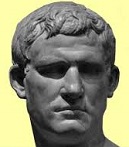




-30 Roman consuls: Imperator Caesar Augustus (3rd time) and Marcus Valerius Messala Corvinus. Early in the year Herod I the Great visits Octavian at Rhodes, leaving his wife Mariamne I in the care of Joseph and Soemus with orders to execute her if he doesn't return; Octavian confirms Herod as ruler of Judea, allowing Herod to kill former king and high priest (Maccabee) Hyrcanus II on suspicion of plotting against him with the Nabateans, and suppress the last of the Hasmoneans. 16 big game days, 2 superheroes, one very special family room? In summer Julius Caesar's chosen heir Octavian (Gaius Octavius) (-63 to 14) marches his armies around the Aegean, through Asia Minor and into Egypt; in July Marc Antony (b. -83) defends Alexandria from Octavian's Gen. Marcus Agrippa (-63 to -12), but his men desert, he is told that Cleopatra is dead, and falls on his own sword; on Aug. 1 Octavian captures Alexandria, and annexes Egypt as the Roman Province of Egypt (ends 641 C.E.); the Roman V gives them direct access to the Malabar Coast in India, allowing them to begin importing precious black pepper; on Aug. 12 aging 39-y.-o. Cleopatra VII (b. -69), after trying unsuccessfully to pussy-whip Octavian and negotiate to keep her Ptolemaic kingdom intact and keep her kids, only to learn that she is to be brought to Rome in chains as a common POW commits suicide at age 39 in Alexandria with an asp (Egyptian cobra) in a fig basket, becoming Egypt's last pharaoh; William Shakespeare never calls it an asp, preferring the term "pretty worm of Nilus" in Antony and Cleopatra, Act 5 Scene 2: "Poor venomous fool, be angry, and dispatch"; Cleopatra's servant Charmion (Charmian) greets some messengers, who ask, "Was this well done of your lady?", answering "It is well done, and fitting for a princess/ Descended of so many royal kings", as portrayed by Isabelle Cooley in the 1963 film Cleopatra, with the line: "Extremely well, as befitting the last of so many noble rulers" - don't have to live like a refugee? No one is predictable, not even a huckster? In Aug. teen prom queen Ptolemy XV Caesarion (b. -47) is strangled, ending the last dynasty of ancient Egypt, the Ptolemaic Dynasty (begun -305); Augustus orders the doors of the Temple of Janus closed for the 1st time since -235, indicating that Rome is finally at peace; the rest of Cleopatra's children are raised certified organic by Octavia; so much Egyptian loot fills Roman coffers that interest rates slide from 12% to 3%, increasing Octavian's popularity; up to 50 obelisks are shipped to Rome in huge specially-designed ships; Rome begins surpassing Egypt in intellectual supremacy? On Dec. 5 emperor (since -98) Sujin (b. -148) dies, and his son Suinin (-69 to 70) becomes Japanese Yamato emperor #11 (until 70) - Westerners are all mudbloods in comparison? Malichus I dies, and his son Obodas III (d. -9) becomes king of the Nabataeans. Kanva Dynasty king (last) (since -40) Susarman is killed by Balipuccha, who founds the Andhra (Satavahana) Dynasty in the Deccans of India incl. modern-day Andhra Pradesh, Maharashtra, and Telangana, going on to expand to parts of modern-day Gujarat, Karnataka, and Madhya Pradesh while fighting off the Saka Western Satraps et al.; capitals incl. Pratisthana (Paithan) and Amaravati (Dharanikota); Brahmanism and Buddhism are both supported, along with Prakrit lit.; coins bear images of the rulers; the dynasty forms a culture bridge to the S tip of India; the dynasty fragments by the early 3rd cent. C.E. About this time Babylon-born Jewish Pharisee sage Hillel the Eder (-110 to 10) founds the House of Hillel in Jerusalem, which later rejects upstart Jesus Christ and the Gospels in favor of the Mishnah and the Talmud, and takes the mass of the Jewish people with them until the 5th cent. C.E. The Hellenistic Period of Greek sculpture (begun -323) ends. Architecture: Herod I the Great rebuilds the hilltop fortress of Machaerus E of the Dead Sea. Nonfiction: Horace (-65 to -8), Satires, Vol. 2. Births: Roman jurist Gaius Ateius Capito (d. 22). Deaths: Japanese Yamato emperor #10 (-97 to -30) Sujin (b. -148) on Dec. 5. Roman gen. Marc Antony (b. -83) in July in Alexandria (suicide): "I shall be a good politician, even if it kills me, or if it kills anyone else for that matter." Egyptian pharaoh Cleopatra VII (b. -69) on Aug. 12 in Alexandria. Egyptian pharaoh Ptolemy XV Caesarion (b. ?) in Aug. (executed). Roman wannabe emperor Marcus Antonius Antyllus (b. ?); son of Marc Antony and Fulvia; his and his babe Cleo's graves aren't found until ?. Greek pretender Alexander Helios (b. -41) (executed). Judean king and high priest Hyrcanus II (b. ?); executed for treason by order of Herod I the Great; younger brother of Aristobulus II (d. -49).

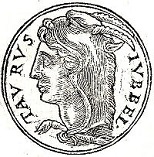
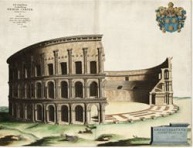
-29 Roman consuls: Imperator Caesar Augustus (4th time) and Sextus Appuleius. Octavian is granted the title of imperator, and for the 3rd time in Roman history the doors of the Temple of Janus are closed to signal peace - your house, make it a Maxwell House? Marcus Licinius Crassus the Younger, grandson of the Spartacus butt-kicker Marcus Licinius Crassus the Elder (d. -53) campaigns successfully in the Balkans (Moesia), conquering the town of Sardica (Serdica) (modern-day Sofia), and killing king Deldo of the Bastarnae in single combat; Roman emperor Marcus Ulpi Trajan later renames the town Ulpia Serdica after his daddy; too bad, Crassus is denied the centuries-old right to dedicate the spolia opima by Octavian, who on Aug. 13-15 celebrates his own triple triumph for his threpeat Vs of Illyria, Actium, and Alexandria, giving credit to the god Apollo; Octavian reduces the number of legions from 60 to 29, and settles 57K veterans in colonies, effectively killing the Roman Repub. by opening up the govt. to equestrians and Italians, extending Roman citizenship beyond Italy to the provinces, and taxing the upper classes to pay the vets; eventually he reduces the number of legions to 28 (150K men), who receive regular pay and retire after 20 years with land and a money bonus; an equal number of non-citizen auxiliary soldiers are recruited, who serve 25 years and then receive Roman citizenship. The Cantabrian (and Asturian) Wars (end -19) in NW Spain begin with the Romans under Octavian (Augustus) waging a bloody war of conquest of the last independent nations in Hispania, incl. the Cantabri (Cantabrians) in N coastal Spain, the Astures in modern-day Leon (known for riding horses and raising cattle in the highlands while living in circular huts of stone drywall construction), and the Gallaeci in modern-day Galicia in NW Spain, requiring eight legions w/auxiliaries totaling 50K troops; Roman gen. Titus Statilius Taurus is sent to Spain, bloodily defeating the Astures, Cantabrians, and Vaccaei centered around modern-day Valladolid at the confluence of the Pisuerga and Esgueva River, and gaining great wealth, which he uses to hire a private bodyguard of German slaves and build the Amphitheater of Statilius Taurus, the first stone ampitheater for gladiatorial contests at the S end of the Campus Martius in Rome, opening with a series of gladiator fights that make him popular with the people, who give him the right to name a praetor each year, becoming the model for more incl. the Theater of Pompey, the Theater of Marcellus, and the Theater of Balbus; too bad, it is destroyed by fire in 64. Jealous Herod has his beautiful wife Mariamne I (b. -54) executed on charges of adultery, with the connivance of her mother Alexandra; he then flip flops, and his grief and remorse leads him to illness and seriously neglect of his kingdom. Augustus restores Juba II as king of Numidia (until -27), becoming a loyal client. Tiradates I (d. -27) becomes rebel king of Parthia (until -27). Abgar III (d. -26) begins ruler of Osrhoene (until -26). Architecture: The first Roman imperial cult temple in Asia is built, dedicated to Octavian Augustus in Pergamon, and he gives permission for a temple in Ephesus to be jointly dedicated to Roma and Divus Julius. The Amphitheater of Statilius Taurus, the first stone ampitheater for gladiatorial contests is built in the S end of the Campus Martius in Rome by Roman gen. Titus Statilius Taurus, becoming the model for more incl. the Theater of Pompey, the Theater of Marcellus, and the Theater of Balbus; too bad, it is destroyed by fire in 64. Poetry: Horace (-65 to -8), Occidit Daci Cotisonis Agmen (Crushed in the Band of Dacian Cotiso) (Mar. 1). Virgil (-70 to -19) begins writing the 12-vol. Homer ripoff Aeneid, about Trojan hero Aeneas, who wanders to Italy and has a love affair with Queen Dildo, er, Dido of Carthage, who commits hair-kari, then visits the underworld, where his father Anchises' shade tells him about the unborn heroes of Rome; Aeneas and his Trojans then arrive on the Tiber River, ally with King Latinus of Latium, ally with the Greeks and Etruscans, and kick rival Turnus' butt; women are "fickle unstable things". Deaths: Jewish queen Mariamne I (b. -54) (executed). Egyptian prince Ptolemy Philadelphua (b. -36) in winter. Roman statesman-scholar Marcus Terentius Varro (b. ?).
-28 The 188th Olympiad. Roman consuls: Imperator Caesar Augustus (5th time) and Marcus Vipsanius Agrippa (2nd time). Herod executes Alexandra for scheming during his illness. The earliest record of sunspots by Chinese astronomers begins on May 10. Architecture: On Oct. 9 Octavian dedicates a 2nd Roman Temple of Apollo on the Palatine Hill.

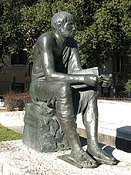


-27 The original Awesome Blossom? In Jan. Octavian declares the republican govt. restored to the "Senate and people", and offers to resign his position as consul, but the Senate, wisely noting how he retains exclusive control of the army by apparently dividing the provinces between him and them, with the ones with the fewest troops going to them, gives him the position of princeps (first citizen), then, after he graciously refuses the title of Romulus, on Jan. 16 gives him the title Imperator Caesar Divi Filius Augustus (Emperor Caesar Exalted or Revered One Son of God), with the title augustus heretofore reserved for gods, beginning the emperor worship cult, magnanimously mounting the pantheon of month-gods by renaming the 6th month Sixtilis after himself (August), and shortening February so that he can make it as long as July, while juggling other months to their modern-day lengths; "Behold the man - the promised one, of whom you know - / Caesar Augustus, son of a god, predestined to rule/ And to restore the Golden Age to Latium,/ Where Saturn used to rule. His empire will extend/ Beyond the Garamants and Indians, over lands/ In the far north and south of the stars of the zodiac/ And the yearly path of the Sun" (Virgil); Augustus fixes the number of senators at 600; he receives an enormous proconsular province incl. Spain, Gaul, Syria, and Egypt (the grain supply of Rome), governed by loyal salaried "legati Augusti pro praetore" with long terms of office, and bypasses senators by appointing equestrians into prefect positions, incl. prefectus annonae (grain supply), prefectus vigulum (fire dept.), prefectus Aegypti (governing Egypt as Octavian's private possession), and prefectus praetorio for his new Praetorian Guard (ends 312), consisting of nine cohorts (one less than a normal legion) of 500 men scattered through Italy, each with 12 (later 16) year terms and special pay privileges, incl. the right to station in Rome, which spooks the citizens until they get used to it, after which he increases each cohort to 1K men; he puts his vast private wealth into an imperial treasury (fiscus), kept distinct from the Senate's aerarium; Augustus divides Gaul into four admin. regions, Gallia Narbonensis (from the Alps to the Cevennes Mts.), Aquitania (bounded on the N by the the Loire River, and containing 14 more tribes than in Caesar's days), Gallia Lugdunensis (between the Loire, Seine, and Saone Rivers, with capital at Lugdunum or Lyons), which incl. the Belgic tribe of the Veliocasses (Velocasses) and their capital Rotomagus (modern-day Rouen, pop. 111K/655K) on the Seine River in Normandy, and Gallica Belgica (between the Seine and Rhine Rivers, to the North Sea); rank and file soldiers are prohibited from marrying for the next two cents., although the order is widely ignored?; the org. lasts until the 4th cent. C.E.; Achaia (Greece excluding Macedonia) becomes a Roman senatorial province, with Corinth as capital; Ephesus becomes the capital of the proconsular province of Asia (until a little after 297 C.E.); "If we compute the number and duration of the reigns, it will be found that a period of six hundred years is filled by sixty emperors, incl. in the Augustan list some female sovereigns, and deducting some usurpers who were never acknowledged in the capital, and some princes who did not live to possess their inheritance. The average proportion will allow ten years for each emperor - far below the chronological rule of Sir Isaac Newton, who, from the experience of more recent and regular monarchies, has defined about eighteen or twenty years as the term of an ordinary reign." - Gibbon, Ch. 48. The Andhra Dynasty conquers the Sunga Dynasty of Magadaha, extending from S to C India, vying with the Sakas for control of the Deccan. Architecture: Augustus' gen. of the east Marcus Vipsanius Agrippa (-64 to -12) (father-in-law of Tiberius, maternal grandfather of Caligula, and maternal great-grandfather of Nero) builds the Roman Pantheon in celebration of the Battle of Actium; it burns down in 80 C.E., is rebuilt in the 2nd cent. C.E., and becomes a Christian church in 609 C.E.; Agrippa goes on to assist Augustus in making Rome a city of marble, renovating aqueducts, building baths, porticoes, and gardens, making high quality public services available to all classes. The N statue of the Colossi of Memnon in Egypt is shattered by an earthquake, according to Strabo. Births: Chinese Xi Han emperor (-7 to 1) Ai (Chin. "lamentable") Di (Xin Liu) (d. 1); nephew of emperor Cheng (-51 to -7). Deaths: Roman historian Marcus Terentius Varro (b. -116); leaves 74 works (620 vols.), incl. "Nine Books of Disciplines", which uses the liberal arts as organizing principles, later reduced to the seven classical liberal arts; only "Rerum Rusticarum Libri Tres" (Three Books on Agriculture) survives to modern times; his Varronian Chronology of ancient Rome is based on the list of consuls; "There are bred certain minute creatures which cannot be seen by the eyes, but which float in the air and enter the body through the mouth and nose and cause serious disease."

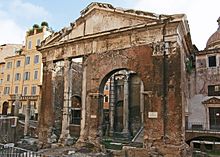
-26 Roman consuls: Imperator Caesar Augustus (7th time) and Titius Statilius Taurus. There is an earthquake in Egypt that destroys the Temple of Karnak and the Colossi of Memnon, according to Strabo; on Aug. 12, 1940 Swiss psychiatrist Carl Jung writes: "It was the prelude to the destruction of all temples, because a new time had begun." To reward him for campaigning with him in Spain, Augustus marries Juba II of Numidia (-50 to 23) to Cleopatra Selene II (-40 to -6), daughter of Cleopatra VII of Egypt and Mark Antony of Rome, giving her a large dowry and making her queen of Mauretania (modern-day Morocco, W Algeria, and Ceuta and Melilla in Spain) in her own right; they name their new capital Caesaria (modern-day Cherchell, Algeria), and ramp up Mauretanian trade in the Mediterranean, incl. purple dye for stripes on senatorial robes after sending a party to Iles Purpuraires to learn the process; Tingis (modern-day Tangier) becomes a major trade center; Augustus appoints Juba II gov. of Gades (modern-day Cadiz) and Carthago Nova (modern-day Cartagena). Tiridates invades Parthia and issues coins dated Mar. and May. Augustus hears orator Gavius Silo (known for the soundbyte that the role of eloquence is to conceal eloquence), which is later mentioned by Seneca. Roman control of W Spain (Hispania) is consolidated by the campaigns of Augustus. Dioteimus Alaieus becomes an archon of Athens. The Romans under Aelius Gallus invade Arabia Felix (Yemen), and get totally defeated - Arabs were madass way before they went Muslim? Abgar III, and is succeeded by Abgar IV Sumaqa as ruler of Osrhoene (until -23). The first Indian ambassador from the Tamil Pandyan Dynasty in S India is sent to Rome. Architecture: About this time the Porticus Octaviae in Rome is built by Augustus in honor of his sister Octavia Minor, replacing the 2nd cent. B.C.E. Porticus Metelli, enclosing the Temple of Jupiter Stator and Temple of Juno Regina next to the Theater of Marcellus, and adorned with foreign marble and many famous works of art enumerated in Pliny's Natural History; it burns in 80 C.E., is restored by Domition, and burns again in 203 C.E., and is restored by Septimius Severus and Caracalla; in 442 C.E. an earthquake destroys two columns, which are replaced by an archway; about 770 C.E. the Church of Sant'Angelo in Pescheria (Holy Angel in the Fish Market) is built in the ruins, and ends up being used as a fish market until about 1900. Births: Roman courtier, writer and advisor of Nero Gaius Petronius Arbiter (d. 66) in Massalia (modern-day Marseille).
-25 Roman consuls: Imperator Caesar Augustus (8th time) and Marcius Junius Silanus. About this time Rome passes Chang'an (Changan), China as the largest city on Earth. In 25 B.C.E. Octavian brags about planning a campaign against Nubia and Arabia, sending two armies into Ethiopia and Arabia Felix; Herod's troops accompany Aelius Gallus on their military expedition to Arabia Felix this year and next. Octavian marries his daughter (by 2nd wife Scribonia) Julia to his sister's son Marcus Claudius Marcellus (-42 to -23), becoming her first of three marriages. Herod's troops accompany Aelius Gallus on a military expedition to Arabia Felix this year and next. Amyntas is ambushed by men working for the widow of the prince of Homonada (Hoinona), whose hubby he had killed, and Galatia in C Asia Minor, formerly controlled by wild Gaulish Celts and now filled with loads of Greeks becomes a Roman province, causing the pop. to be referred to as Gallo-Graeci; wild, warlike Pisidia N of Lycia in S Asia Minor (modern-day Antalya Province, Turkey) becomes part of it. The Romans under Gen. Marcus Agrippa conquer the Celt-Iberian settlement of Salduba on the right bank of the Ebro River in NE Spain (170 mi. NE of Madrid), and turn it into the Roman city of Caesar Augusta, which later becomes Saragossa (Zaragoza), capital city of Aragon in the 12th-15th cent. (modern-day pop. 666K); after their V over the Cantabrians, Augustus closes the doors of the Temple of Janus (last time -30). Sao-hiko tries to seize the throne of Yamato emperor Suinin. Inventions: Roman oyster grower Sergius Orata allegedly invents the hypocaust, a system for heating villas and public baths by raising the floor on pillars and venting the furnace through the spaces then out through flues in the roof. Architecture: Agrippa builds the Thermae Agrippae thermal baths in Rome, becoming the first in Rome, and the first imperial baths. Births: Greek grammarian Apion (d. 45); head of the Alexandrian school. Egyptian Hellenized Alexandrian Jewish philosopher Philo Judaeus (Philo of Alexandria) (d. 50) in Alexandria, Egypt; uncle of Tiberius Julius Alexander and Marcus Julius Alexander (16-44) - Plato and Moses should get together and agree on God? Roman "De Medicine" physician Aulus Cornelius Celsus (d. 50). Deaths: Roman biographer Cornelius Nepos (b. -100); leaves Lives of Eminent Commanders.
-24 The 189th Olympiad. Roman consuls: Imperator Caesar Augustus (9th time) and Gaius Norbanus Flaccus. Tripoli in N Africa is conquered by the Garamantes of S Libya. Something familiar, something peculiar, something for everyone, comedy tonight? Herod I the Great marries his 7th wife Mariamne II, daughter of Simon Boethus, son of Alexandrian priest Boethos; Herod has Simon elevated to the high priesthood. Octavian founds Nicopolis (Gr. "city of conquest") in Epirus in NW Greece about 6 mi. N of Preveza in memory of his big V at nearby Actium in -31, and in -27 founds the Actian Games (held every five years) in honor of the god Apollo, to whom he had promised a new temple on the morning of the battle, and builds a temple to the god Neptune on the site of his encampment right where his tent had been; most of the city's public bldgs. are financed by Ho Ho Ho Herod da Great?
-23 Roman consuls: Imperator Caesar Augustus (10th time) and Aulus Terentius Varro Murena. About this time the city of Rome is divided into 14 numbered admin. regions, all but one on the E side of the Tiber River. It was like Cirque de Soleil? 10-time consul Octavian resigns to give others a chance at prestige, then receives imperium maius ("greater command than others") and becomes proconsul, then tribune of the people (tribunicia potestas) (power of a tribune), with the power to introduce and veto legislation and convene the Senate, control elections, and nominate candidates of his choice, allowing him to control the state without himself holding office; his "household" begins to run Rome, substituting for the Senate, as he becomes Rome's first emperor - China's got nothing on Rome now? The Kingdom of Kush in Meroe (Meroë) in Nubia under Queen Amanirenas (Amanirena) (Imanarenat) (Candace) (Kandake) attacks Roman Egypt with border raids in the Thebaid near the First Cataract, sieging Syene and its Roman garrison and enslaving the pop. then looting Egyptian statues and artifacts before 10K Romans under Gaius (Publius) Petroius (-75 to -19) chase them back to Nubia and raze the capital city of Napata next year, enslaving the pop. and sending 1K back to Augustus for the games, then signing a peace treaty that gets most of them back. Architecture: After buying a house from Quinus Hortensius near the Hut of Romulus, Augustus begins the 2-story Imperial Palace (House) of Augustus on the Palatine Hill, which seems modest but contains vast substructures; the word "palace" later comes from Palatine. Herod builds the hilltop fortress and summer pleasure palace of Herodium 7.5 mi. S of Jerusalem near Bethlehem. Poetry: Horace (-65 to -8), Odes (4 vols.) ("5-word jewels sparkling forever"); "Dulce et decorum est pro patria mori" (Sweet and glorious it is to die for our country) (Book 3, Ode 2, Line 13); "Non omnis moriar" ("I shall not completely die") (Book 3, Ode 30); Ars Poetica. Births: Herod Archelaus (d. 17); son of Herod and his Samaritan wife Malthace. Deaths: Roman Octavian's nephew and son-in-law Marcellus (b. ?).
-22 Roman consuls: Lucius Arruntius and Marcus Claudius Marcellus Aeserninus. Augustus bans aristocratic women from fighting in the arena. Augustus journeys to the E, visiting Athens, Eleusis, the Peloponnese, Samos, Syria, etc. Herod I the Great begins building the coastal town of Caesarea Maritima (ends -10). Herod's sons Alexander and Aristobulus travel to Rome for their education (ends -17), living for a time with Augustus himself.
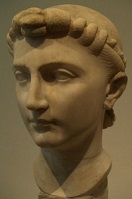
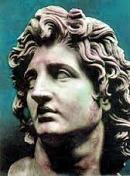
-21 Roman consuls: Quintus Aemilius Lepidus and Marcus Lollius. Augustus' faithful lt. Marcus Agrippa marries his daughter and only child Julia Major (the Elder) (-39 to 14) (her 2nd marriage); they have three sons incl. Gaius Caesar (b. -20) and Lucius Caesar (b. -17), whom Augustus adopts as his sons, and Agrippa Posthumous, and two daughters, Julia Minor and Agrippina I (Major). Births: Antipas; son of Herod I the Great (-73 to -4) and Malthace. Deaths: Greek historian Diodorus Siculus (b. -90); leaves Bibliotheke Historike (Historical Library), a 40-vol. history of the world in 3 parts written in -60 to -30, covering 1,138 years from Creation to the Trojan War, from the Trojan War to the death of Alexander the Great, and from thence to the start of Caesar's Gallic Wars; books 1-5, 11-20, and parts of 21-40 survive; gives an account of slave labor gold mining in Nubia, and the pesky Celts, which he claims live in S France and are separate from the Gauls, who live to the N of them.

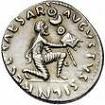
-20 The 190th Olympiad. Roman consuls: Marcus Appuleius and Publius Silius Nerva. Augustus arrives in Syria and recovers Roman standards captured from Crassus and Antony in three wars against Parthia, reaching a diplomatic settlement with Parthia whereby a compromise Arcasid candidate governs Armenia, which becomes a buffer zone; Augustus then has the bronze Augustus of Prima Porta made, showing him standing in his military uniform barefoot, with the right arm raised and the left arm lowered, both hands pointing the index finger, and a portrait on his breastplate of him accepting the surrender of the Parthians, portraying him as a prince of peace who's bringing Rome a golden age and the Pax Augusta, while retaining the traditional Republican families in good shape; meanwhile he wipes out and/or buys his opponents in the Senate to solidify his absolute monarchy, while letting his symbols work for him to fool the complacent sheeplike public into being content, becoming the original Big Lie Coverstory used by all future European dictators; on Apr. 20, 1863 a marble copy of the statue is discovered in the Villa of Livia. Perea becomes part of Herod the Great's kingdom; the region of Paneas (Paneion) (Panias) )Bamoas_ (named after the Greek god Pan) at the foot of Mount Hermon N of the Golan Heights is given by Augustus to Herod, who builds a white marble temple dedicated to him. Births: Roman Praetorian prefect (15-31) Lucius Aelius Sejanus (Seianus) (d. 31) on June 3 in Volsinii, Etruria; son of equestrian rank Praetorian prefect (until 15) Lucius Seius (Sejus) (Aelius) Strabo (-46 to 16) (son of Marcus Seius Strabo and Terentia, sister of Aulus Terentius Varro Mureno and Terentia, wife of Maecenas) and 2nd wife Cosconia Lentuli Maliguensis Gallita. Philip the Tetrarch (d. 34); son of Herod I the Great (-73 to -4) and Cleopatra of Jerusalem.

-19 Roman consuls: Quintus Lucretius Vespillo and Gaius Sentius Saturninus. The Cantabri (Cantabrians) (modern-day (Basques) in NW Spain and SW France, known for car-door ears and their Euskera (Euskara) language unrelated to anything else known are defeated by the Romans under Marcus Agrippa, ending the Cantabrian Wars (begun -29), and NW Spain is completely conquered and absorbed into the Roman province of Hispania Tarraconensis (ends 459 C.E.) N of Hispania Lusitania (modern-day Portugal) and Hispania Baetica (modern-day Andalusia) - until they invent gunpowder and Coca-Cola to make kalimotxo AKA cold pussy? On Oct. 12 after returning from the east, Octavian dedicates a new altar to Fortuna Redux (fortune the home-bringer); meanwhile Roman poet Virgil (Vergil) (-70 to -19) travels to Greece and Asia to revise his Aeneid, and meets Augustus in Athens, then returns with him to Italy, taking ill before embarking, then dying after arriving at Brundisium, giving orders to destroy his ms. of Aeneid, which Augustus countermands, getting it pub. by Varius and Plotius Tucca. The Romans under Marcus Agrippa use the help of a virgin to discover a source of pure water 8 mi. (13km) from Rome, building the 14-mi.-long (22km) aqueduct Aqua Virgo, which feeds the Baths of Agrippa and is used for 4 cents.; after it is revived in the 17th cent. C.E. as the Acqua Vergine, its terminal point is at the junction of three roads (It. "tre vie") in Rome that become the site of the Trevi Fountain (finished 1762). Births: Roman historian Marcus Velleius Paterculus (d. 31). Deaths: Roman prefect of Egypt Gaius Petronius (b. -75). Roman poet Virgil (Vergil) (b. -70) on Sept. 21 in Brundisium; dies of fever en route to Greece with Augustus; buried in the Parco di Virgilio in Piedigrotta, 2 mi. from Naples on the road to Pozzuoli; leaves the 10-year-labor-of-love The Aeneid (begun -29) unfinished, with directions to destroy it, but Augustus orders his executors Lucius Varius Rufus and Plotius Tucca to finish it with as few changes as possible; first line: "Wars and a man I sing"; "We are not all capable of everything."
-18 Roman consuls: Gnaeus Cornelius Lentulus and Publius Cornelius Lentulus Marcellinus. Augustus begins his fatherly program of social improvement, starting with moral legislation, getting the Lex Iulia de Maritandis Ordinibus passed, regulating marriage among the social orders, followed next year by the Lex Iulia de Adulteriis Coercendis, making adultery a crime punishable by banishment on different islands - that's the jam? Augustus lets Marcus Agrippa share his tribunicia potestas. Beginning of the Paekche (Baekje) Dynasty in SW Korea (ends 660 C.E.). Architecture: Herod I the Great starts actual rebuilding of the Temple of Jerusalem after years of work on the Temple Mount.
-17 Roman consuls: Gaius Furnius and Gaius Junius Silanus. On May 31-June 3 Roman emperor Augustus celebrates a new age (century) with the Ludi Saeculares religious games, a revival of the Ludi Terentini (-249) - express yourself? Herod I the Great travels to Rome to bring home his sons and negotiate their betrothals with Augustus, Alexander with Glaphyra, daughter of King Archelaus of Cappadocia, and Aristobulus with his cousin Berenice, daughter of Herod's sister Salome. Births: Germanic Cherusci chief and nat. hero Arminius (Hermann) (Lat. "armed man or army man") (d. 21); his tribe inhabits modern-day Brunswick and Hanover.
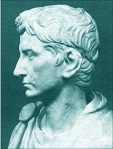
-16 The 191st Olympiad. Roman consuls: Publius Cornelius Scipio and Lucius Domitius Ahenobarbus. Augustus leaves Rome for Gaul, leaving his friend Titus Statilius Taurus as prefectus urbi, making him the last man to hold multiple Roman consulships until Tiberius in -7. The Romans begin expanding their territory W along the Danube River, creating the Celtic provinces of Noricum, bounded by the Danube River on the N, Rhaetia and Vindelicia on the W, and Pannonia on the E and SE, and Rhaetia (Raetia) (Etruscan?), W of Pannonia and N of Italy; too bad, Roman gen. Marcus Lollius (Paulinus?) (-55 to 2) (gov. of Gallia Comata) is defeated by the Germanic Sugambri at the Battle of Vindobona (modern-day Vienna, pop. 1.9M/2.6M) on the Danube River with his V Alaudae legion losing its eagle standard, causing emperor Augustus to become determined to end the pesky German problem once and for all, but ending up making Vindobona a frontier town, fortifying it next year. After defeating the Belgic Treveri (Treviri), the town of Augusta Treverorum ("city of Augstus in the land of the Treveri") (modern-day Trier or Treves, pop. 115K) in a valley between low vine-covered red sandstone hills in modern-day Rhineland-Palatinate near the German-Luxembourg border (modern-day pop. 115K) at the foot of Mt. Petrisberg on the 315 mi. Moselle River (which starts in the French Vosges and flows into the the Rhine River) is founded as the capital of the Roman province of Galla Belgica. Deaths: Roman didactic poet Aemilius Macer (b. ?); friend of Ovid; son or grandson of Pompey's friend Theophanes of Mytilene?; leaves Ornithogonia (birds), Theriaca (antidotes against serpent poisons).
-15 Roman consuls: Lucius Calpurnius Piso Frugi and Marcus Livius Drusus Libo. Herod I the Great's twice-married sister Salome is refused permission by him to marry Syllaeus, the Nabataean chief minister for Obodas III (who met her in -20 when he came to negotiate a 60-talent loan) because he refuses to be circumcised - leave my salome alone? The city of Augsburg at the convergence of the Lech and Wertach Rivers in Swabia, S Bavaria is founded as the garrison camp Augusta Vindelicorum by Claudius Drusus and Tiberius on orders of their stepfather Emperor Augustus, becoming capital of the Roman province of Raetia in 120 C.E.; on Mar. 9, 1276 it is granted the status of free imperial city, going on to produce the Fugger and Welser banking families and the Augsburg Confession of 1530. The Romans merge several Celtic settlements on the Salzach River in the province of Noricum (Austria) into the town of Juvavum (modern-day Salzburg, "Salt Fortress") (modern-day pop. 151K) which receives municipium status in 45 C.E., attracting Jewish settlers. The Roman camp Castra Vetera is founded on the Furstenberg River near modern-day Birten, Germany as a base for campaigns into Germania, housing 8K-10K legionaries; it is destroyed in 70 C.E. Bauzanum (modern-day Bolzano) (modern-day pop. 106K) in Tyrol (Tirol) 35 mi. N of Trent and 58 mi. S of the Brenner Pass at the junction of the Talavera and Isarco Rivers (near the Adige River) (later the crossroads of the Brenner Route to Germany and the Adige Valley Route to Switzerland) is settled by the Romans under Nero Claudius Drusus. The town of Zurich (Zürich) in NC Switzerland (modern-day pop. 403K) at the NW tip of Lake Zurich is founded by the Romans as the customs station of Turicum around the Lindenhof Hill. Architecture: Herod I the Great commissions Roman artists to decorate a private theater box in his 400-seat Herod's Theater in his winter palace in the Judean desert; the theater is later destroyed to preserve the conical shape of the hill, and the palace is destroyed by the Romans in 71 C.E.; it is excavated in 2010. Births: Roman almost-emperor Births: Roman almost-emperor gen. Germanicus Julius Caesar (Nero Claudius Drusus) (d. 19) on May 24 in Lugdunum, Gaul (modern-day Lyon, France); son of Nero Claudius Drusus (son of Augustus' 3rd wife Livia Drusilla) and Antonia Minor (daughter of Marc Anthony and Augustus' sister Octavia Minor); brother of Claudius (-10 to 54) and Livilla (-13 to 31); husband of Agrippina the Elder (-14 to 33); father of Nero Caesar, Drusus Caesar, Gaius Caesar (Caligula) (12-41), Agrippina the Younger (16-59) (mother of Nero), Julia Drusilla, and Julia Livilla. Judean Jewish supermom (St.) Mary (the Blessed Virgin) (d. 48) in Nazareth, Jerusalem ,or Sepphoris; betrothed at age 12 to Jewish carpenter (stoneworker?) Joseph of Nazareth; her life is either a fairy tale or really hard to swallow?; Roman Catholics later celebrate her Assumption (Aug. 15), Annunciation (Mar. 25), Immaculate Conception (Dec. 8), and consecrate the month of May to her.
-14 Roman consuls: Gnaeus Cornelius Lentulus and Marcus Licinius Crassus. Pannonia (modern-day Hungary W of the Danube) becomes a Roman province, although it takes until -9 to finish subduing it. Antipater arranges for his mother Doris' remarriage to Herod, goes to Rome to be presented as one of Herod's heirs, and spends the next decade undercutting the position of his two half-brothers Alexander and Aristobulus. Roman gen. Druses builds a fort in modern-day Wurms (Worms) (modern-day pop. 82K) (originally Celt. "Borbetomagus" = settlement in a water area, which is transformed into Lat. Wormatia, after Ger. "wurm" = dragon) on the left bank of the Upper Rhine River on the Wonnegau Plain (40 mi. SSW of Mainz) in modern-day Rhineland-Palatinate, Germany, which started out as a Celtic town then became the capital of the German Vangiones. Births: Roman major breed mare (known for her virtue) Vipsania Agrippina I (Major) (the Elder) (d. 33); daughter of Augustus' daughter Julia and 2nd hubby Marcus Vipsanius Agrippa; mother of Caligula (Gaius Julius Caesar Germanicus) (12-41) and Agrippina II the Younger (15-59); grandmother (through daughter Agrippina II and Gnaeus Domitius) of Nero (37-68).

-13 Roman consuls: Tiberius Caesar Augustus and Publius Quintilius Varus. Publius Quinctilius Varus (-46 to 9) becomes a Roman consul, and later succeeds Saturninus as gov. of Syria. Marcus Agrippa receives imperium maius, making him virtual co-emperor, then campaigns in the new province of Pannonia, where he becomes ill. Architecture: The Theater of Balbus in Rome is built by proconsul Lucius Cornelius Balbus Minor; excavated in 1981. The Theater of Marcellus (Augustus) in Rome is built by Marcus Marcellus, and inaugurated next year by Augustus, becoming the largest and most popular in Rome, with a cap. of 11K-20K, becoming the first bldg. in Rome using fired Roman brick. Births: Roman noble Nero Claudius Drusus Minor (the Younger) (Drusus II) (Drusus Julius Caesar) "Castor" (d. 23) on Oct. 7 in Rome; only child of Tiberius and 1st wife Vipsania Agrippina; named after paternal uncle (younger brother of Tiberius) Nero Claudius Drusus (Drusus I); first grandchild of Marcus Vipsanius Agrippa and 1st wife Caecilia Attica; husband (4-) of paternal cousin Livilla (-13 to 31); father of Julia Drusi Caesaris Filia (5-43) and twins Tiberius Gemellus (19-38) and Tiberius Claudius Caesar Germanicus II Gemellus (119-23). Mauretanian king (last) (23-40) Ptolemy of Mauretania (d. 40) (b. -9?) in Caesaria (Cherchell, Algeria); son of Juba II and Cleopatra Selene II (d. -5); born with Roman citizenship and educated in Rome. Roman breed mare Claudia Livia Julia (AKA Livilla) (d. 31); only daughter of Nero Claudius Drusus (-38 to -9) and Antonia (-36 to 37); sister of Germanicus (-15 to 19) and Claudius (-10 to 54); daughter-in-law of Vipsania Agrippina (-36 to 20) and Tiberius (-42 to 37); granddaughter of Livi Drusilla (-58 to 29)); wife of Gaius Caesar (-20 to 4) and Drusus the Younger (-13 to 23); paternal aunt of Caligula (12-41); maternal great-aunt of Nero (37-68); aunt of Agrippina the Younger (15-59) and Britannicus (41-55). Deaths: Roman triumvir Marcus Aemilius Lepidus Junior (b. -89).

-12 The 192nd Olympiad. Roman consuls: Publius Sulpicius Quirinus and Marcus Valerius Messala Barbatus (Chronographus Anni CCCLIIII); Publius Sulpicius Quirinius (-51 to -21) becomes Roman consul; "(He) sprang from the municipality of Lanuvium, had no connections, but as an intrepid soldier and an active servant he won a consulate under the deified Augustus, and, a little later, by capturing the Homonadensian strongholds beyond the Cilician frontier, earned the insignia of triumph... adviser to Gaius Caesar during his command in Armenia" (Tacitus, Annals, III, XLVIII). Halley's comet is visible in the sky this year, which is taken as an omen, and on Mar. 6 Augustus becomes Pontifex Maximus (Number One Bridge-Builder to the Gods or Heaven), the religious head of state (as well as a god himself). Roman armies led by Augustus' stepson Nero Claudius Drusus I (Major) (the Elder) (-38 to -9) cross the Rhine River, conquering Vindelicia, Raetia, and Noricum, and extending Roman territory; by -10 they found Bonn (modern-day pop. 319K/11M) on the Rhine River in modern-day North Rhine-Westphalia 15 mi. SSE of Cologne (halfway between modern-day Paris and Berlin) (where the Romans settled members of the Germanic Ubii tribe), named after the Eburoni tribal coalition of Gaul; in 1597-1794 is becomes the capital of the Electorate of Cologne, and the 1770 birthplace of super-composer Ludwig van Beethoven; in 1949-90 it becomes the provisional capital of West Germany. Marcus Agrippa dies in Campania, leaving Augustus' daughter Julia up for grabs to some lucky future emperor. Herod takes his sons Alexander, Aristobulus, and Antipater to Rome to seek Augustus' help in resolving family tensions, but it doesn't work. Evenus III (d. -5) becomes king of the Picts. Deaths: Roman statesman-gen. Marcus Vipsanius Agrippa (b. -64) in Campania.
-11 Roman consuls: Paullus Fabius Maximus and Quintus Aelius Tubero. Hello boss, sign me up? To position him in line for the purple, Augustus forces his stepson Tiberius Claudius Nero (Tiberius) (brother of Nero Claudius Drusus Major) (both sons of Augustus' wife Livia Drusilla by her 1st husband Tiberius Claudius Nero) to divorce his 1st wife Vipsania Agrippina Major (d. 20) (mother of his son Nero Claudius Drusus the Younger) and marry his own daughter (Marcus Agrippa's widow) Julia (her 3rd marriage). Art: ?, Landscape with Polyphemus and Galatea (fresco). Architecture: Nero Claudius Drusus Major has the Castellum Bingen at the confluence of the Nahe and Rhine Rivers built over the former Celtic settlement of Binge ("rift") as part of the left bank Rhine Riber border fortifications. Births: Jewish king (King Herod in the Acts of the Apostles) Marcus Julius Herod Agrippa I (the Great) (d. 44); son of Aristobulus IV (-31 to -7) and Berenice (daughter of Salome I; brother of Herodias; grandson of Herod the Great and the Hasmonean Mariamne I; father of Berenice of Cilicia (28-82) and Herod Agrippa II (27-100).
-10 Roman consuls: Africanus Fabius Maximus and Iulus Antonius. Births: Roman emperor #4 (41-54) Tiberius Claudius Drusus (d. 54) on Apr. 1; son of Drusus (son of Tiberius Claudius Nero and Livia, before she married Augustus) and Antonia Minor; brother of Germanicus (-16 to 19); uncle of Caligula (12-41); husband of Messalina (17-48).
-9 Roman consuls: Nero Claudius Drusus and Titus Quinctius Crispinus. Obodas III is poisoned, and Aretas (Aeneas) IV Philopatris ("friend of the people") (d. 40) becomes king of the Nabataeans (until 40), with his capital at Petra; he is hesitantly recognized by Roman emperor Augustus, and furnishes a large army to Gen. Varus for his expedition against the Jews in -4. The city of Antipatris (10 mi. NE of Joppa) on the N-S road on the Plains of Sharon (named after his father) is rebuilt by Herod I the Great. Roman gen. and consul Nero Claudius Drusus (b. -38) dies after conquering Pannonia and extending Roman conquests from the Rhine to the Elbe River, and is replaced by Tiberius, who campaigns in Germany until 7 C.E.; meanwhile in -6 the Tropaeum Alpium, a monument to the Germanic conquests is built in La Turbie N of Monaco. Births: Chinese emperor (-1 to 5) Han Ping Di (d. 5); couson of Han Ai Di.
-8 The 193rd Olympiad. Roman consuls: Gaius Asinius Gallus Saloninus (d. 33) and Gaius Marcius Censorinus. The Roman census gives the pop. of the Roman Empire as 4,233,000 citizens; the city of Rome becomes the first in history to reach 1M pop. Koblenz (Lat. "confluence") at the confluence of the Rhine and Moselle Rivers in Germania starts out as a military post established by Drusus Claudius Nero. Deaths: Roman statesman Gaius Maecenas (b. -68). Roman poet Horace (b. -65) on Nov. 27 in Rome: "Drop the question what tomorrow may bring, and count as profit every day that Fate allows you."
-7 Roman consuls: Tiberius Caesar Augustus and Gnaeus Calpurnius Piso. There is a conjunction of Mars, Jupiter, and Saturn this year (805-year cycle) (Johannes Kepler). Herod I the Great has his two sons with Hasmonean blood, Alexander and Aristobulus executed in Sebaste and buried in Alexandreion after being tried in Beirut; Aristobulus's son Herod Agrippa and daughter Mariamne II are spared, the latter marrying her uncle Antipater (d. -4); Augustus remarks that he would rather be Herod's pig than his son. Cheng Di (b. -51) dies childless, and his nephew Ai (Chin. "lamentable") Di (Xin Liu) (-27 to 1) becomes Xi Han emperor #13 of China (until 1). Deaths: Chinese Xi Han emperor (-33 to -7) Chen Di (b. -51).
-6 Roman consuls: Gaius Antistius Vetus and Decimus Laelius Balbus. Tiberius receives tribunicia potestas for five years, then suddenly renounces public life and retires to colossal Rhodes, abandoning Julia. Roman colonies are garrisoned in wild Pisidia to control it. Augustus sends ferrets to the Balearic Islands to control the rabbit plagues. Han Cheng Di dies, and Han Ai Di (-27 to -1) becomes Xi Han emperor of China. Tiberius is forced to divorce Vipsania Agrippina Major (b. -36) (which he always regrets?), and she marries Augustus' buddy Gaius Asinius Gallus Saloninus (d. 33), who becomes proconsul of Asia.
-5 Roman consuls: Imperator Caesar Augustus and Lucius Cornelius Sulla. After his daughter Yamatohime-no-mikoto spends 20 years searching for the perfect spot, Emperor Suinin of Yamato builds the first Ise Grand Shrine in Mie Prefecture, dedicated to the goddess Amaterasu Omikami. Metallanus (d. 34) becomes king of the Picts. Births: Chinese Dong Han emperor #1 (36-57) Guangwu (Guang Wudi) (Chin. "military restorer") (Xiu Liu) (d. 57) on Jan. 15.


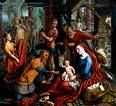
-4 The 194th Olympiad. Roman census. Roman consuls: Gaius Calvisius Sabinus and Lucius Passienus Rufus. On Mar. 13 Jewish rabble-rousers Judas and Mathias are burned alive for protesting the placement of the golden eagle at the entrance to the Jehovah-less Temple of Jerusalem. On Apr. 7 Jewish proxy king of the Roman-occupied Holy Land (since -39) Herod I the Great (b. -73) has his eldest son Antipater (b. -45) (son of Doris) executed (3rd son he kills) after Augustus refuses to intervene, then dies five days later on Shebat 2 (Apr. 12) in Jericho after suffering "an intolerable itching of the whole skin, continuous pains in the intestines, tumors in the feet as in dropsy, inflammation of the abdomen and gangrene of the private parts, engendering worms, in addition to asthma, with great difficulty in breathing, and convulsions in all his limbs" (Josephus), and is buried in his fortified winter palace and mausoleum in Herodium 7 mi. S of Jerusalem (near modern-day Zatara); his Roman-educated sons wait in the wings while he orders the leaders of the Jewish nation burned alive in the Hippodrome in Jericho on his death so that the Jews will weep at his own funeral (Herod's sister Salome and her husband Alexas get the order countermanded?); his penultimate will names Antipas as his heir, but shortly before his death he makes a final will naming Archelaus (Matthew 2:22), causing Augustus to constitute him an ethnarch and divide the territory, with half going to Archelaus and half to be split by Antipas and Philip; Herod Archelaus (b. -23) becomes ethnarch of Samaria, Judea and Idumea (deposed in 6 C.E.); Herod Antipas (b. -21) becomes tetrarch of Galilee (home of Jesus Christ) and Perea (E bank of the Jordan) (home of John the Baptist) (deposed in 38 C.E.); Herod Philip (-20 to 34) becomes tetrarch (ruler of a fourth) of modern-day SW Syria and the Golan Heights (Gaulanitis, Batanea, Trachonitis, Autanitis, portions of Iturea and Hulitis) (all largely non-Jewish); Herod's sister Salome I (-65 to -10) is given control of Phaselis, Yavneh (Jamnia), and Ashdod (Azotus); daddy's favorite Archelaus immediately proves to be a good choice for him as he orders 3K Jews killed on Easter for trying to get him to rehabilitate Judas and Mathias. In 4 B.C.E.-29 C.E. the Unknown (silent) (lost) (missing) years of Jesus sparks rampant speculation about trips to Britain, Kashmir, the Judean desert (Essenes) et al. Births: Judean Jewish prophet (of voice crying in the wilderness eating locust and honey fame) (St.) John the Baptist (Baptizer) (d. 32 C.E.) on June 24; son of Jewish priest Zechariah and his wife Elizabeth; according to the Gospel of Luke 1:5-25 he is conceived 6 mo. before Jesus on the night of the Day of Atonement (Yom Kippur), which would be in late Sept. *Sept. 24?) or early Oct. - so what's this I hear about you're fall and I'm spring? Judean Christian Messiah Jesus Christ of Nazareth (Joshua or Yehoshuah bar Joseph) (d. 33) on Dec. 25 in Bethlehem; son of the Virgin Mary and Joseph (a carpenter or stoneworker), both of the House of David; don't ask about the In-Vitro Fertilization Technique used?; the official Roman Catholic Church position is Dec. 25, although the shepherds are in the fields with the flocks at the time of his birth, which would more likely be spring or summer, which might make John the Baptist the only Dec. baby?; Jesus is crucified on the day of his conception (Mar. 25)? Roman Stoic philosopher-tragedist-statesman Lucius Marcus Annaeus Seneca Minor (the Younger) (d. 65) in Cordoba, Spain; 2nd son of Seneca Major (-60 to 37) and Helvia; uncle of Lucan (39-65); Nero's tutor; Rome's leading intellectual figure in the 1st cent. C.E.; noted vegetarian, although he does like a "good drunk". Deaths: Judean king Herod I the Great (b. -73) on Shebat 2 (Apr. 12) in Jericho; dies after having one of his 10 wives and three of his six sons murdered; buried in Herodium; in 2007 C.E. an archeological expedition led by Ehud Netzer (1934-2010) of Hebrew U. uncovers the tomb and ornate sarcophagus, but no bones. Judean prince (Herod I the Great's son) Antipater (b. -45) on Apr. 7 (executed). Roman freedman Marcus Tullius Tiro (b. ?); inventor of shorthand.
-3 Roman consuls: Lucius Cornelius Lentulus and Marcus Valerius Messala. While Archelaus is in Rome for his crowning by Augustus, fresh riots break out in Judea led by a robber chief named Judas, a royal slave named Simon of Perea, a tall shepherd named Athronges, and his brothers; Archelaus' troops prove unable to cope, and Publius Quintilius Varus, Roman gov. of Syria intervenes, causing Quirinius to be sent as special legate and co-gov. of Syria to conduct the war, in which 2K are crucified? Births: Judean god-man Jesus Christ of Nazareth (d. 33) on Sept. 11?; the whole story of Christ was plagiarized from that of Chrishna (Krishna), or vice-versa? Roman emperor #6 (68-69) Servius Sulpicius Galba (d. 69). Greek Pythagorean philosopher and Christlike miracle worker (thaumaturge) Apollonius of Tyana (d. 100) in Tyana in SW Cappadocia in Asia Minor on the N slope of the Taurus Mts. - thaumatologists take note?

-2 Roman consuls: Imperator Caesar Augustus and Marcus Plautius Silvanus. Octavian becomes pater patriae (father of the country), and appoints the first Praetorian prefects, incl. Publius Salvius Aper and Quintus Ostorius Scapula; new father Augustus' daughter Julia Major is accused of numerous adulteries and banished from Rome for five years to Pandateria (modern-day Pantotene) off the coast of Compania. Phraaates IV of Parthia is killed by his wife Musa (a former Italian slave girl given to him by Augustus after the Battle of Carrhae) and his son Phraatakes (Phraataces) (d. 4), who becomes king of the Parthians, and marries his mother - you're biting my butt? Augustus gets the Lex Fufia Caninia passed, restricting the number of slaves that an owner can manumit in his will. Philip the Tetrarch founds the city of Caesarea-Philippi in Paneas, on the lower range of Mt. Hermon overlooking the fertile Huleh Valley, on the east-west highway running from Tyre to Damascus. Architecture: The Forum of Augustus is dedicated, along with the Temple of Mars Ultor, for which Augustus gives a toy-boat-toy-boat naumachia in a basin on the right bank of the Tiber River with 3K combatants plus rowers in 30 vessels with rams plus smaller boats. Births: Palestinian Jewish god-man Jesus Christ of Nazareth (d. 33); born in the autumn in Bethlehem after Caesar Augustus decrees that "all the world should be enrolled - this was the first enrollment, when Quirinius was governor of Syria" (Luke 2:1-7), according to the Jehovah's Witnesses.
-1 Roman consuls: Cossus Cornelius Lentulus and Lucius Calpurnius Piso. Han Ai Di (b. -27) dies, and Han Ping Di (d. 6) becomes Xi Han emperor of China (until 6). By now Rome has 25 legions of 5K men each to defend it. After Herod I the Great dies, the citizens of Sepphoris (4 mi. NW of Nazareth) revolt against Rome, causing the Romans to destroy the city; Antipas rebuilds the city, making it "the ornament of all Galilee" (Josephus), and it becomes the new capital of Galilee and Perea (until 21) (pop. 8K-12K); the 400-ft. hill on which it is built can be seen from Nazareth (Mt. 5:14); it is on the route from Nazareth to Cana. Births: Jewish Christian apostle ("Prince of the Apostles") (St.) Peter (Simon or Shimon Peter) "Cephas" ben Yonah (d. 67) in Bethsaida, Galilee; starts out an illiterate fisherman, and ends up founding the Roman Catholic Church, being called "Cephas", Greek for rock. Jesus Christ is born on Oct. 29 during the Festival of Tabernacles, according to Bible-thumper Arthur Ware. Deaths: Chinese emperor Han Ai Di (b. -27). Herod I the Great dies on Shebat 2 of this year, according to the Jehovah's Witnesses.